Preface
ATLAS.ti 22 User Manual
Copyright © by ATLAS.ti Scientific Software Development GmbH, Berlin. All rights reserved.
Document version: 22.2.0.225 (23.11.2022 12:56:17)
Author: Dr. Susanne Friese
Copying or duplicating this document or any part thereof is a violation of applicable law. No part of this manual may be reproduced or transmitted in any form or by any means, electronic or mechanical, including, but not limited to, photocopying, without written permission from ATLAS.ti GmbH.
Trademarks: ATLAS.ti is a registered trademark of ATLAS.ti Scientific Software Development GmbH. Adobe Acrobat is a trademark of Adobe Systems Incorporated; Microsoft, Windows, Excel, and other Microsoft products referenced herein are either trademarks of Microsoft Corporation in the United States and/or in other countries. Google Earth is a trademark of Google, Inc. All other product names and any registered and unregistered trademarks mentioned in this document are used for identification purposes only and remain the exclusive property of their respective owners.
Please always update to the latest versions of ATLAS.ti when notified during application start.
About this Manual
This manual describes the concepts and functions of ATLAS.ti 22.
It is not required that you read the manual sequentially from the beginning to the end. Feel free to skip sections that describe concepts you are already familiar with, jump directly to sections that describe functions you are interested in, or simply use it as a reference guide to look up information on certain key features.
For users with no prior knowledge of ATLAS.ti, we do, however, recommend that you especially read through the first part of this manual in order to become familiar with the concepts used by ATLAS.ti and to gain an overview of the available functions. These are the chapters: The VISE Principle, ATLAS.ti - The Knowledge Workbench, and Main Steps in Working with ATLAS.ti.
Further, to set up a project, we recommended that you read:
- Main Steps in Working with ATLAS.ti
- Starting ATLAS.ti
- The ATLAS.ti Interface
- Adding Documents
- Project Management
For all basic-level work like creating quotations, coding, and writing memos, consult the chapters under the main heading:
- Entity Managers
- Exploring Data
- Working With Quotations
- Coding Data
- Auto-coding Data
- Working With Comments And Memos
- Working With Groups
Advanced functions are described under:
The sequence of the chapters follows the steps that are necessary to start and work on an ATLAS.ti project: First, the main concepts that ATLAS.ti utilizes are explained; next, an overview of all available tools is provided. These introductory and more theoretically-oriented parts are followed by more practically-oriented chapters providing step-by-step instructions. You will learn how to manage your data and how to set up and start a project. Once a project is set up, the basic functions such as coding, text search, auto-coding, writing memos, etc. become relevant. Conceptual-level functions such as the network editor, the Query Tool and the Co-occurrence Explorer build on the data-level work (at least in most cases) and are therefore described last.
The section Useful Resources offers some useful advice on how to get support and where to find further information on the software.
Video tutorial: What's New in ATLAS.it 22
How to Use this Manual
This manual is intended for:
- Those who have no prior knowledge of ATLAS.ti
- Those who have worked with a previous version.
Some general familiarity with concepts and procedures relating to the Windows operating system and computing in general (e.g., files, folders, paths) is assumed.
This is largely a technical document. You should not expect any detailed discussion of methodological aspects of qualitative research other than cursory statements from this manual.
Useful Resources for Getting Started
To those seeking in-depth instruction on methodological aspects, the ATLAS.ti Training Center offers a full complement of dedicated ATLAS.ti training events worldwide, both through online courses and face-to-face seminars in nearly all parts of the world. Visit the Training Center at https://training.atlasti.com.
ATLAS.ti Account and Licence Activation
For further information on Multi-User License Management, see our Guide for License Holders & Administrators.
Requesting a Trial Version
Go to https://my.atlasti.com/ to create an account.
Confirm your email address.
Request a trial license by clicking on Trial Desktop.
This brings you to the Cleverbridge Website.
Enter the required information and download the software.
If you do not want to download the software immediately, you can always do this later in your ATLAS.ti account. To do so, select My Applications.
The trial version can be used for 5 active days by one person on one computer within a period of 3 months. At the end of the test period, you can continue to use ATLAS.ti with limited functionality. If your project contains more than 10 documents, 50 quotations or 25 codes, you can no longer save any changes. Thus, ATLAS.ti then becomes a read-only version.
You can initiate the purchase of a full licence from your ATLAS.ti account. After activating the licence, and the program can be used again at full capacity. You can also continue to work on your project without any data loss.
You cannot install a trial version again on the same computer.
Activating a Licence
You need to make an online connection at least once to activate your licence. Once the account it activated, you can work offline and no further online connection is required. Please note, if you are using a seat that is part of a multi-user licence, you will blog the seat if you are offline.
If you have purchased an individual license from the ATLAS.ti web shop, your license has been added to your account. The next step is to activate it.
Similarly, if you are a member of a team of users under a multi-user license, you have received a license key, an invitation code, or invitation link from the person who manages the license.
The ATLAS.ti License Management System allocates seats of multi-user license dynamically. This means, you are assigned the first free seat under your license. If all seats are occupied, you will be allocated the next seat that opens up.
Log in to your ATLAS.ti account.
Navigate to License Management (the default page) and enter either the license key, or the invite code that you were given by the license owner/license manager.
Click Activate License.
Start ATLAS.ti on your computer and click Check For Updated License and follow the on-screen instructions to complete a few easy steps to activate your license.
Your installation is now activated, and you can start using ATLAS.ti.
Accessing Your Account from within ATLAS.ti
On the opening screen, click on the user avatar. If you have not added a picture yet, it will show the first two letters of your account name.
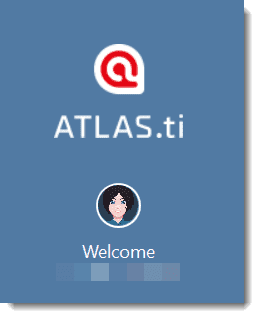
Click on Manage Account. This takes you to the login screen. Enter your log-in information (email and password) to access your account.
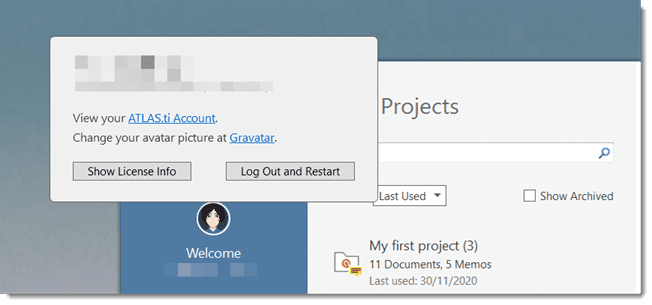
Logging Out
It is important to understand that the installation of ATLAS.ti is independent of the licencing of the software. You can have ATLAS.ti installed on as many computers as you want. A single-user licence gives you the right to use it on two computers, e.g. your desktop computer at the office and your laptop at home; or your Windows computer and your Mac computer; or the Cloud version and a desktop version. If you want to use ATLAS.ti on a third computer, or if you get a new computer, make sure you log out at the computer that you do no longer want to use. If you have been invited to use a multi-user license, you will have one seat for the time when using ATLAS.ti.
There are two ways how to log out to free a seat:
Click on the user avatar in the welcome screen and click Log Out and Restart.
If you forgot to log out in ATLAS.ti, you can always access your user account via a web browser:
Go to https://my.atlasti.com/. Enter your email address and password to log in.
Select the Log Out option at the bottom left above your avatar in your ATLAS.ti account.
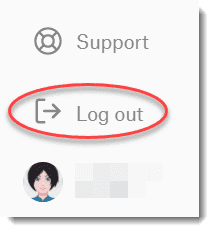
Working Off-Line
When starting ATLAS.ti, it checks whether you have a valid licence. If you know that you won't have online-access for a given period, you can set your licence to off-line work for a specified period.
If you have a licence that does not expire, the maximum off-line period is four months. If you have a lease licence, the maximum period is dependent on the expiration date of your lease. This means, if your licence expires in 1 month, you cannot set the offline period to an additional 3 months.
To set your licence to off-line use, select Options on the Welcome Screen.
Click on the ATLAS.ti icon to review your current licence settings and select a period for offline availability.
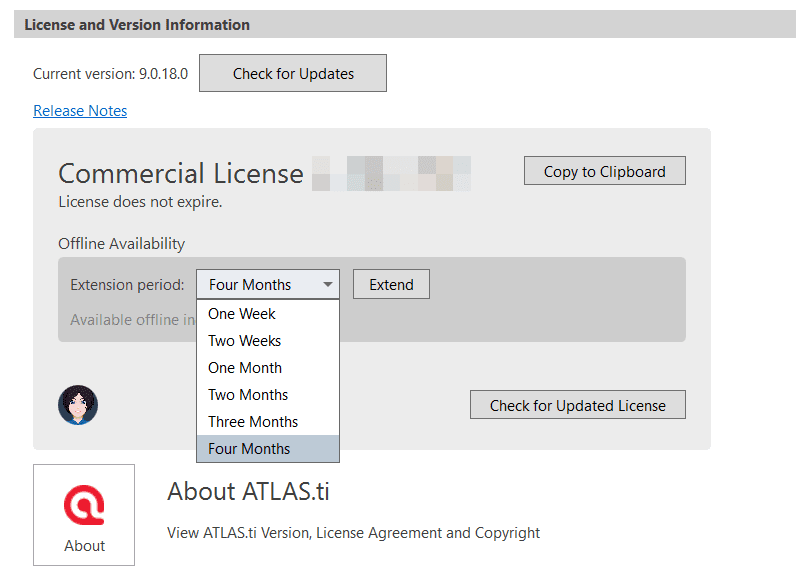 After the period expired, you need to connect to the Internet again to verify your licence.
After the period expired, you need to connect to the Internet again to verify your licence.
Limited Version after Licence Expiration
Once the trial period or a time limited licence expire, the program is converted into a limited version. You can open, read and review projects, but you can only save projects that do not exceed a certain limit (see below). Thus, you can still use ATLAS.ti as a read-only version.
You cannot install a trial version again on the same computer.
Restrictions of the Limited Version
- 10 primary documents
- 50 quotations
- 25 codes
- 2 memos
- 2 network views
- auto backup is disabled
Introduction
ATLAS.ti is a powerful workbench for the qualitative analysis of larger bodies of textual, graphical, audio, and video data. It offers a variety of tools for accomplishing the tasks associated with any systematic approach to unstructured data, i.e., data that cannot be meaningfully analyzed by formal, statistical approaches. In the course of such a qualitative analysis, ATLAS.ti helps you to explore the complex phenomena hidden in your data. For coping with the inherent complexity of the tasks and the data, ATLAS.ti offers a powerful and intuitive environment that keeps you focused on the analyzed materials. It offers tools to manage, extract, compare, explore, and reassemble meaningful pieces from large amounts of data in creative, flexible, yet systematic ways.
Video Tutorial: Overview of ATLAS.ti 22 Windows.
The VISE Principle
The main principles of the ATLAS.ti philosophy are best encapsulated by the acronym VISE, which stands for
- Visualization
- Immersion
- Serendipity
- Exploration
Visualization
The visualization component of the program means directly supports the way human beings think, plan, and approach solutions in creative, yet systematic ways.
Tools are available to visualize complex properties and relations between the entities accumulated during the process of eliciting meaning and structure from the analyzed data.
The process is designed to keep the necessary operations close to the data to which they are applied. The visual approach of the interface keeps you focused on the data, and quite often the functions you need are just a few mouse clicks away.
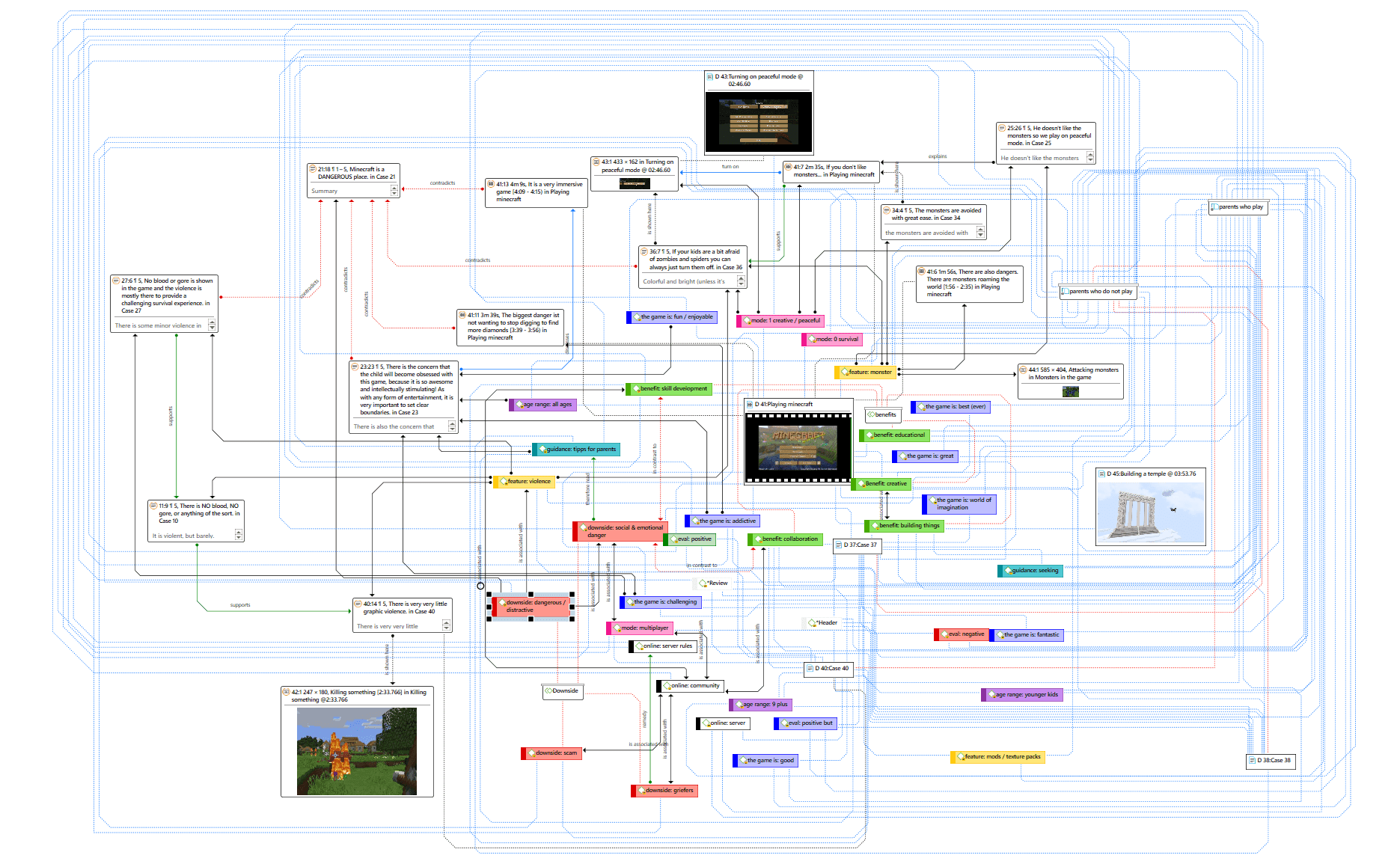
Immersion
Another fundamental design aspect of the software is to offer tools that allow you to become fully immersed in your data. No matter where you are in the software, you always have access to the source data. Reading and re-reading your data, viewing them in different ways and writing down your thoughts and ideas while you are doing it, are important aspects of the analytical process. And, it is through this engagement with the data that you develop creative insights.
Serendipity
Webster's Dictionary defines serendipity as a seeming gift for making fortunate discoveries accidentally. Other meanings are: Fortunate accidents, lucky discoveries. In the context of information systems, one should add: Finding something without having actually searched for it.
The term serendipity can be equated with an intuitive approach to data. A typical operation that relies on the serendipity effect is browsing. This information-seeking method is a genuinely human activity: When you spend a day in the local library (or on the World Wide Web), you often start with searching for particular books (or keywords). But after a short while, you typically find yourself increasingly engaged in browsing through books that were not exactly what you originally had in mind - but that lead to interesting discoveries.
Examples of tools and procedures ATLAS.ti offers for exploiting the concept of serendipity are the Search & Code Tools, the Word Clouds and Lists, the Quotation Reader, the interactive margin area, or the hypertext functionality.
Exploration
Exploration is closely related to the above principles. Through an exploratory, yet systematic approach to your data (as opposed to a mere bureaucratic handling), it is assumed that especially constructive activities like theory building will be of great benefit. The entire program's concept, including the process of getting acquainted with its particular idiosyncrasies, is particularly conducive to an exploratory, discovery-oriented approach.
Areas of Application
ATLAS.ti serves as a powerful utility for qualitative analysis of textual, graphical, audio, and video data. The content of these materials is in no way limited to any one particular field of scientific or scholarly investigation.
Its emphasis is on qualitative, rather than quantitative, analysis, i.e., determining the elements that comprise the primary data material and interpreting their meaning. A related term would be "knowledge management," which emphasizes the transformation of data into useful knowledge.
ATLAS.ti can be of great help in any field where this kind of soft data analysis is carried out. While ATLAS.ti was originally designed with the social scientist in mind, it is now being put to use in areas that we had not really anticipated. Such areas include psychology, literature, medicine, software engineering, user experience research, quality control, criminology, administration, text linguistics, stylistics, knowledge elicitation, history, geography, theology, and law, to name just some of the more prominent.
Emerging daily are numerous new fields that can also take full advantage of the program's facilities for working with graphical, audio, and video data. A few examples:
- Anthropology: Micro-gestures, mimics, maps, geographical locations, observations, field notes
- Architecture: Annotated floor plans
- Art / Art History: Detailed interpretative descriptions of paintings or educational explanations of style
- Business Administration: Analysis of interviews, reports, web pages
- Criminology: Analysis of letters, fingerprints, photographs, surveillance data
- Geography and Cultural Geography: Analysis of maps, locations
- Graphology: Micro comments to handwriting features.
- Industrial Quality Assurance: Analyzing video-taped user-system interaction
- Medicine and health care practice: Analysis of X-ray images, CAT scans, microscope samples, video data of patient care, training of health personal using video data
- Media Studies: Analysis of films, TV shows, online communities
- Tourism: Maps, locations, visitor reviews
Many more applications from a host of academic and professional fields are the reality. The fundamental design objective in creating ATLAS.ti was to develop a tool that effectively supports the human interpreter, particularly in handling relatively large amounts of research material, notes, and associated theories.
Although ATLAS.ti facilitates many of the activities involved in qualitative data analysis and interpretation (particularly selecting, tagging data, and annotating), its purpose is not to fully automate these processes. Automatic interpretation of text cannot succeed in grasping the complexity, lack of explicitness, or contextuality of scientific or everyday knowledge. In fact, ATLAS.ti was designed to be more than a single tool - think of it as a professional workbench that provides a broad selection of effective tools for a variety of problems and tasks.
ATLAS.ti - The Knowledge Workbench
The image of ATLAS.ti as a knowledge workbench is more than just a lively analogy. Analytical work involves tangible elements: research material requires piecework, assembly, reworking, complex layouts, and some special tools. A well-stocked workbench provides you with the necessary instruments to thoroughly analyze and evaluate, search and query your data, to capture, visualize and share your findings.
Some Basic Terms
To understand how ATLAS.ti handles data, visualize your entire project as an intelligent container that keeps track of all your data. This container is your ATLAS.ti project.
The project keeps track of the paths to your source data and stores the codes, code groups, networks, etc. that you develop during your work. Your source data files are copied and stored in a repository. The standard option is for ATLAS.ti to manage the documents for you in its internal database. If you work with larger audio or video files, they can be linked to your project to preserve disk space. All files that you assign to the project (except those externally linked) are copied, i.e., a duplicate is made for ATLAS.ti's exclusive use. Your original files remain intact and untouched in their original location.
Your source data can consist of text documents (such as interview or focus group transcripts, reports, observational notes); images (photos, screenshots, diagrams),audio recordings (interviews, broadcasts, music), video clips (audiovisual material), PDF files (papers, brochures, reports, articles or book chapters for a literature review), geo data (locative data using Open Street Map), tweets from a Twitter query, and social network comments.
Once your various documents are added or linked to an ATLAS.ti project, your real work can begin. Most commonly, early project stages involve coding different data sources.
Selecting interesting segments in your data and coding them is the basic activity you engage in when using ATLAS.ti, and it is the basis of everything else you will do. In practical terms, coding refers to the process of assigning codes to segments of information that are of interest to your research objectives. We have modeled this function to correspond with the time-honored practice of marking (underlining or highlighting) and annotating text passages in a book or other documents.
In its central conceptual underpinnings, ATLAS.ti has drawn deliberately from what might be called the paper and pencil paradigm. The user interface is designed accordingly, and many of its processes are based on - and thus can be better understood by - this analogy.
Because of this highly intuitive design principle, you will quickly come to appreciate the margin area as one of your most central and preferred work space - even though ATLAS.ti almost always offers a variety of ways to accomplish any given task.
General Steps when Working with ATLAS.ti
The following sequence of steps is, of course, not mandatory, but describes a common script:
-
Create a project, an idea container, meant to enclose your data, all your findings, codes, memos, and structures under a single name. See Creating a New Project.
-
Next, add documents, text, graphic, audio and video files, or geo documents to your ATLAS.ti project. See Adding Documents.
-
Organize your documents. See Working With Groups.
-
Read and select text passages or identify areas in an image or select segments on the timeline of an audio or video file that are of further interest, assign keywords (codes), and write comments and memos that contain your thinking about the data. Build a coding system. See Working With Comments And Memos and Coding Data - Basic Concepts.
-
Compare data segments based on the codes you have assigned; possibly add more data files to the project. See for example Retrieving Coded Data.
-
Query the data based on your research questions utilizing the different tools ATLAS.ti provides. The keywords to look for are: simple retrieval, complex code retrievals using the Query Tool, simple or complex retrievals in combination with variables via the scope button, applying global filters, the Code Co-occurrence Tools (tree explorer and table), the Code Document Table, data export for further statistical analysis. See Data Analysis and Data Export For Further Statistical Analysis.
-
Conceptualize your data further by building networks from the codes and other entities you have created. These networks, together with your codes and memos, form the framework for emerging theory. See Working With Networks.
-
Finally, compile a written report based on the memos you have written throughout the various phases of your project and the networks you have created. See Working With Comments And Memos and Exporting Networks.
For additional reading about working with ATLAS.ti, see The ATLAS.ti Research Blog and The ATLAS.ti conference proceedings.
Main Concepts and Features
You need to be familiar with the concepts of documents, quotations, codes, and memos as the overall foundation when working with ATLAS.ti, complemented by a variety of special aspects such as groups, networks, and the analytical tools.
Everything that is relevant for your analysis will be part of your ATLAS.ti project residing in the digital domain. For instance, the data you are analyzing, the quotations as your unit of analysis, the codes, the conceptual linkages, comments and memos, are all part of it. One obvious advantage of this container concept is that as user you only have to deal with and think of one entity. Activating the ATLAS.ti project is the straightforward selection of a single file; all associated material is then activated automatically.
The most basic level of an ATLAS.ti project consists of the documents you are analyzing, followed closely by the quotations (= selections from these document). On the next level, codes refer to quotations. And comments and memos - you meet them everywhere. Your ATLAS.ti project can become a highly connected entity, a dense web of primary data, associated memos and codes, and interrelations between the codes and the data. To find your way through this web, ATLAS.ti provides powerful browsing, retrieval and editing tools.
You can access information about each of these tools using the links below:
Documents and Document Groups
Documents represent the data you have added to an ATLAS.ti project. These can be text, image, audio, video or geographic materials that you wish to analyze. Working with text data includes importing survey data, importing data from a reference manager for a literature review, importing twitter data, using interview or focus group data, reports in text or PDF formats, observational notes, etc. For more information, see Supported file formats.
Document groups fulfill a special function as they can be regarded as quasi dichotomous variables. You can group all female interviewees into a document group named "gender::female," all male interviewees into a group named "gender::male." You can do the same for different professions, marital status, education levels, etc. See Working with Groups for further information
Document groups can later in the analysis be used to restrict code-based searches like: "Show me all data segments coded with 'attitude towards the environment' but only for females who live in London as compared to females who live in the countryside."
You can also use document groups as a filter, for example to reduce other types of output, like a frequency count for codes across a particular group of documents.
This is explained in more detail in the section Code Document Table.
Quotations
A quotation is a segment from a document that you consider to be interesting or important.
Usually, quotations are created manually by the researcher. However, for repetitive words, phrases or structural information like speaker units, the Search & Code tools can be used. With any of the tools you can automatically segment the data and assigns a code to them.
Although the creation of quotations is almost always part of a broader task like coding or writing memos, quotations can also be created without coding. They are called "free" quotations.
If you for instance are using discourse analysis or an interpretive approach to analysis, or if you work with video data, free quotations can be your starting point for analysis, rather than to code the data right away. See Working with Quotations, and the ATLAS.ti Quotation Level.
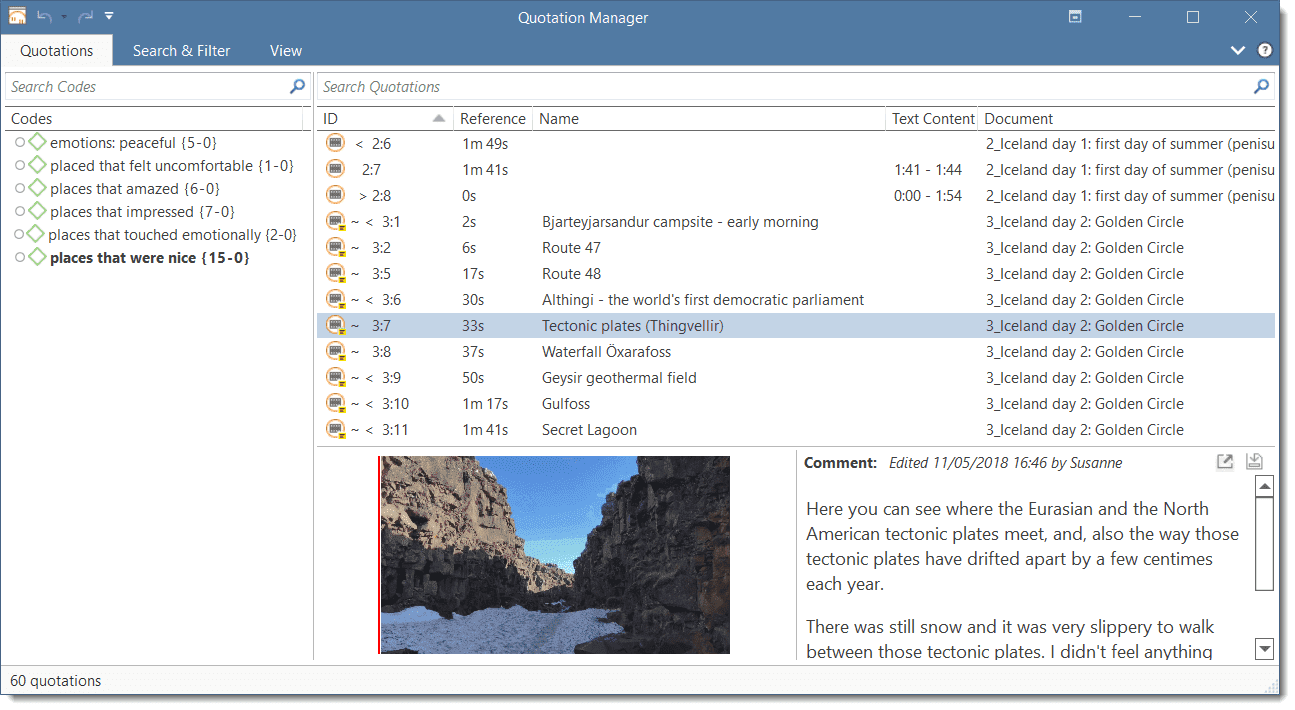
Codes
The term code is used in many ways. First, we would like to define what that term means in qualitative research, and then in ATLAS.ti.
Coding means that we attach labels to data segments that depict what each segment is about. Through coding, we raise analytic questions about our data from […]. Coding distills data, sorts them, and gives us an analytic handle for making comparisons with other segments of data.
Charmaz (2014:4)
Coding is the strategy that moves data from diffuse and messy text to organized ideas about what is going on.
(Richards and Morse, 2013:167)
From a Methodological Perspective
-
Codes capture meaning in the data.
-
Codes serve as handles for specific occurrences in the data that cannot be found by simple text-based search techniques.
-
Codes are used as classification devices at different levels of abstraction in order to create sets of related information units for the purpose of comparison.

The length of a code should be restricted and should not be too verbose. If textual annotations are what you want, you should use quotation comments instead.
Keep code names brief and succinct. Use the comment pane for longer elaborations.
From a Technical Perspective
Codes are short pieces of text referencing other pieces of text, graphical, audio, or video data. Their purpose is to classify data units.
In the realm of information retrieval systems, the terms "tag", "keyword", or "tagging" are often used for "code" or "coding."
Further information can be found in the sections Coding Data and Working With Codes.
References
Charmaz, Kathy (2014). Constructing Grounded Theory: A Practical Guide Through Qualitative Analysis. London: Sage.
Richards, Lyn and Janice M. Morse (2013, 3ed). Readme first: for a user’s guide to Qualitative Methods. Los Angeles: Sage.
Memos
Writing is an important part of analysis in qualitative research. When using software, it is easy to fall into the code trap. Always remember that coding the data is only a means to an end, to think, retrieve, and query data (Corbin and Strauss, 2015; Richards, 2009; Richards and Morse, 2013).
Memos are a bit more than just a short scribbled note in the margin area:
Memos [...] are working and living documents. When an analyst sits down to write a memo or do a diagram, a certain degree of analysis occurs. The very act of writing memos and doing diagrams forces the analyst to think about the data. And it is in thinking that analysis occurs (Corbin and Strauss, 2008: 118).
Writing is thinking. It is natural to believe that you need to be clear in your mind what you are trying to express first before you can write it down. However, most of the time, the opposite is true. You may think you have a clear idea, but it is only when you write it down that you can be certain that you do (or sadly, sometimes, that you do not) (Gibbs, 2005).
Memos thus represent analytical work in progress, and you can later use them as building blocks for your research report (see Friese, 2019). It is probably not by accident that Juliet Corbin includes a lot about memo writing in the third edition of Basics of Qualitative Research; she wants to show readers how it can be done. In a talk at the CAQD 2008 Conference about the book, she linked the poor quality of many of today’s qualitative research projects to a failure to use memos. Along the same lines, Birks et al. (2008) devotes an entire journal article to memo writing, criticizing the limited exploration of its value in most qualitative methodologies.
Freeman (2017) states that it is one of the challenges facing novice researchers to understand that writing is inseparable from analysis. We would like to encourage you do it: write a lot already while you code and later when you query the data. If you do it, you will find out why it is useful - but you've got to do it. As Freeman put it: The challenge for novice researchers is: “Needing to do analysis to understand analysis” (2017:3).
When you need more input regarding how to write memos see, for example, the third edition of Basics of Qualitative Research by Corbin and Strauss (2008/2014), Wolcott (2009), Charmaz (2014) or Friese (2019).
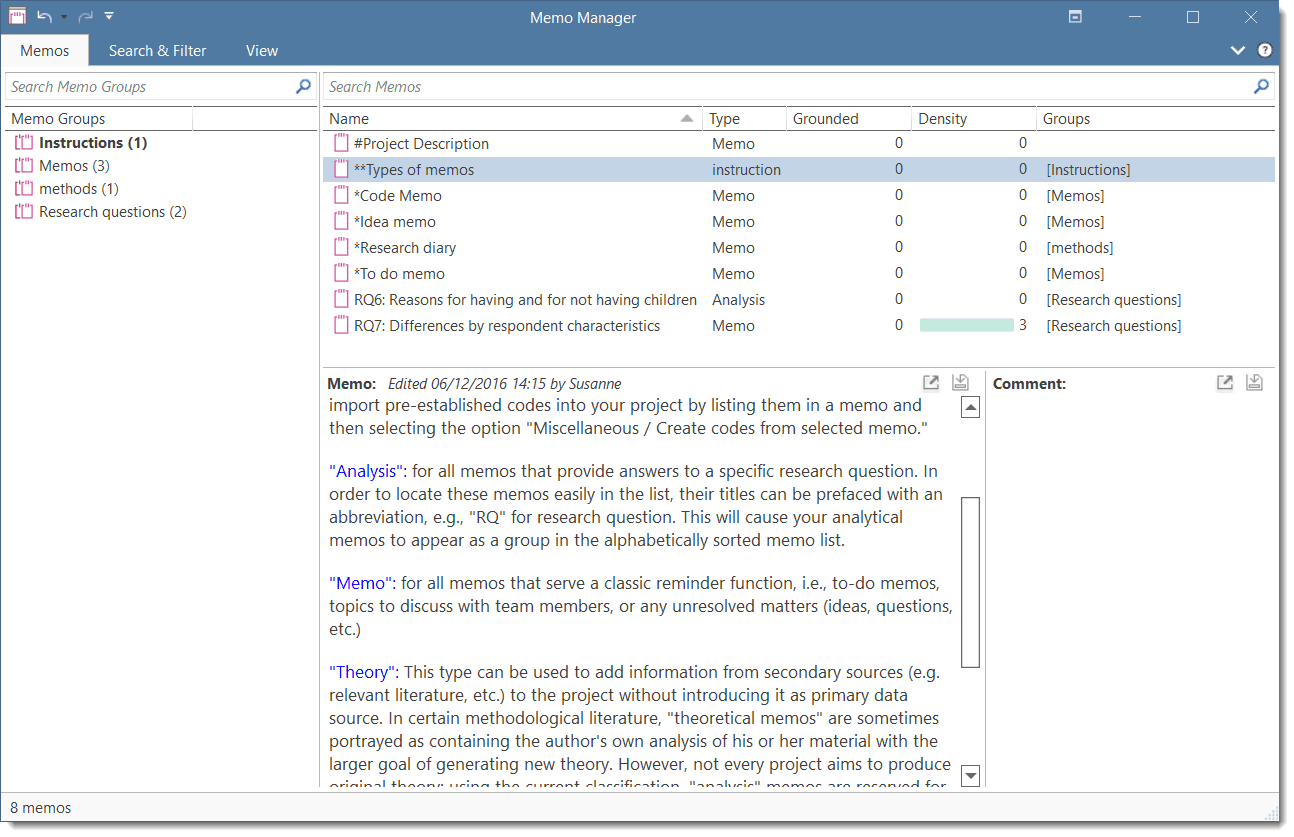 In technical terms,
In technical terms,
-
A memo in ATLAS.ti may stand alone, or it may be linked to quotations, codes, and other memos.
-
Memos can be sorted by type (method, theoretical, descriptive, etc.), which is helpful in organizing and sorting them, or by creating memo groups.
-
Memos may also be included in the analysis as secondary data by converting them into a document. Then they can also be coded.
For more information, see Working with Comments and Memos.
References
Birks, Melanie; Chapman, Ysanne and Francis, Karin (2008). Memoing in qualitative research: probing data and processes, Journal of Research in Nursing, 13, 68–75.
Charmaz, Kathy (2014). Constructing Grounded Theory: A Practical Guide Through Qualitative Analysis. London: Sage.
Corbin, Juliet and Strauss, Anselm (2008/2015). Basics of Qualitative Research: Techniques and Procedures for Developing Grounded Theory (3rd and 4th ed.). Thousand Oaks, CA: Sage.
Freeman, Melissa (2017). Modes of Thinking for Qualitative Data Analysis. NY: Routledge.
Friese, Susanne (2019). Qualitative Data Analysis with ATLAS.ti (3. ed.), London: Sage.
Gibbs, Graham (2005). Writing as analysis. Online QDA.
Richards, Lyn and Morse, Janice M. (2013). Readme First for a User’s Guide to Qualitative Methods.
Richards, Lyn (2009). Handling qualitative data: a practical guide (2. ed), London: Sage.
Wolcott, Harry E. (2009). Writing Up Qualitative Research. London: Sage.
Comments
You can write comments for all entities in ATLAS.ti. Comments - different from memos - are always directly connected to the entity you write them for. Memos are independent stand-alone entities that have a name and a type. Memos can be grouped and can also have comments on their own.
Writing comments is similar to scribbling notes in the margin of a paper, or attaching sticky notes to things. Comments can be written for documents, quotations, codes, memos, networks, all types of groups, and for relations.
See Working with Memos and Comments for further detail.
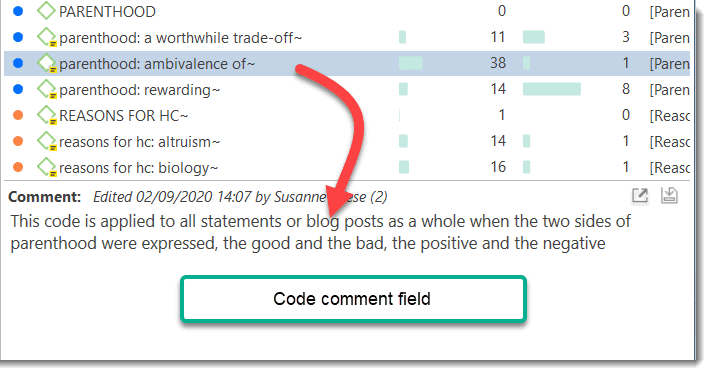
Groups
Groups in ATLAS.ti are filter devices.
Document groups can be regarded as attributes or variables. It is possible to combine them using logical operators like AND and OR, for instance to retrieve and analyze data from female respondents living in NYC. This would an AND combination of two document groups.
Code groups serve as a filter for codes. They can for instance be used to filter all codes that need to be aggregated if you have been coding very detailed and in the process of generated too many codes.
Code groups are not a kind of higher order code. It is NOT recommended using them as categories. For further information see Building a Code System.
For more information on groups, see Working with Group.
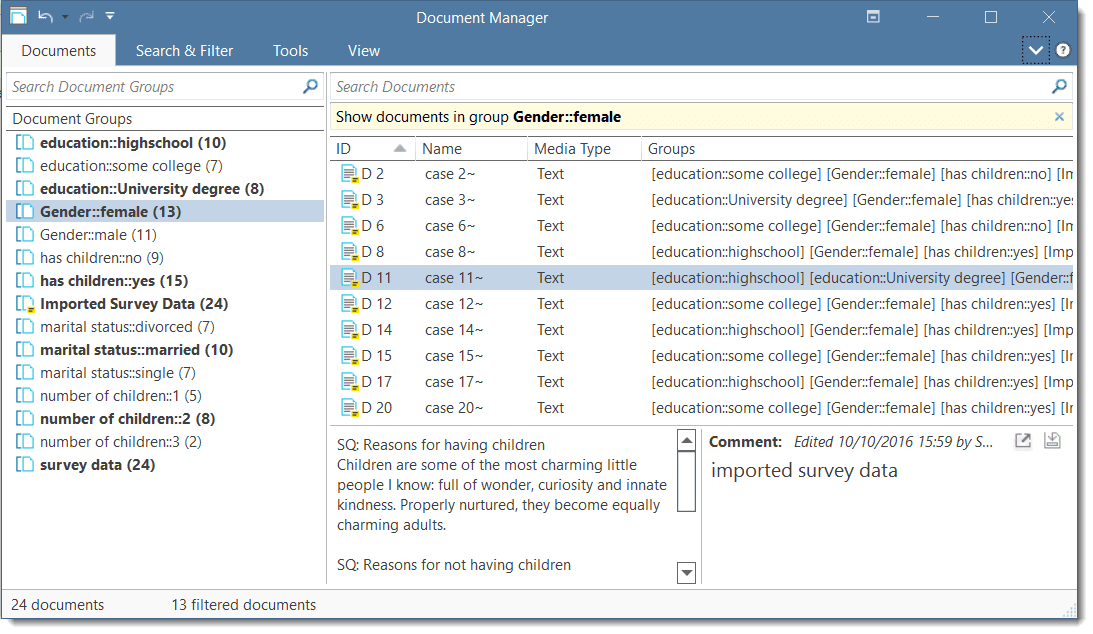
Networks
Networks allow you to conceptualize your data by connecting sets of related elements together in a visual diagram. With the aid of networks you can express relationships between codes and quotations; and you can link other entities like and memos, documents and groups. Also networks themselves can be "nodes" in a network.
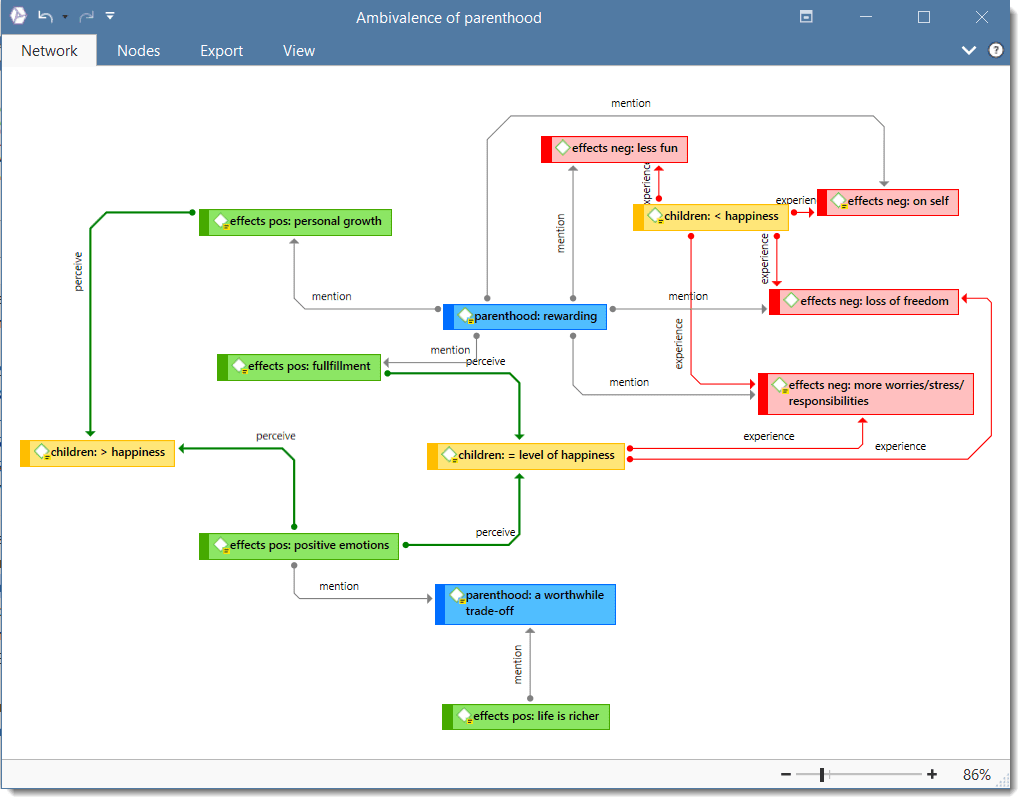
Nodes, Links and Relations
A node is any entity that is displayed in a network . You can change their look and move them around in the network editor.
A link is a line that allows you to connect two entities.
Relations allow you to name a links between two codes or between two quotations.
Network Manager
The Network Manager contains a list of all saved networks that you have crated. It can be used to access a network, to delete existing networks, or to write and edit comments. See Network Manager.
Network Editor
The network editor displays and offers all editing capability to construct and refine networks. In addition, it allows the visual creation and traversal of hypertext structures.
Link Manager
The Link Managers provide an overview of all code-code links and of all hyperlinks you have created. See Link Manager.
Relation Manager
The Relation Manager allows you to modify existing relations or to create new relations. See Creating New Relations.
Find more information on the network function see Working with Networks.
Tools for Exploring Text Data
ATLAS.ti offers a number of tools that you can use to explore your textual data:
- Word clouds and word lists for documents, quotations, and codes. See Creating Word Clouds and Creating Word Lists.
- the Search & Code Tools. These tools offer a combination of text search and auto coding:
- Text search: search for a words, word fragments including synonyms. Logical combinations using AND and OR operators are also possible. See Text Search.
- Expert search: the expert search allows for advances searches using regular expressions (RegEx). With RegEx you can use pattern matching to search for particular strings of characters rather than constructing multiple, literal search queries. See Expert Search.
- Named Entity Recognition (NER): seeks to locate and classify named entities in text into pre-defined categories such as persons, organizations, locations, or miscellaneous. You can review all hits and code them with the suggested categories. See Named Entity Recognition.
- Sentiment Analysis: is the interpretation and classification of positive, negative and neutral statements within text data using text analysis techniques. Sentiment analysis models detect polarity within a text (e.g. a positive or negative opinion),within the whole document, paragraph, sentence, or clause. It has multiple applications. For instance, it can be used for customer satisfaction analysis or for all forms of evaluations, e.g. also student evaluation of courses. See Sentiment Analysis.
Analysis
ATLAS.ti contains multiple powerful, dedicated analytical tool to help to make sense of your data.
Cross-Tabulation of Codes (Code Co-occurrence)
The Co-occurrence Explorer and Table show where you have applied codes in an overlapping manner. Rather than determining the codes yourself, you can ask ATLAS.ti which codes overlap. The output can be viewed in form of a tree view or a table. The table provides a frequency count of the number of co-occurrences and a coefficient measuring the strength of the relation. Since a coefficient is only appropriate for some type of data, its display can be activated or deactivated. It is also possible to directly access the data of each co-occurrence. See Code Co-Occurrence Tools.
Code-Document Table
The Code Document Table counts the frequency of codes across documents. Aggregated counts based on code and document groups are also available. Optionally, the table cells can also contain the word counts for the quotations per code across documents or document group. The table can be exported to Excel. See Code Document Table.
Query Tool
For more complex search requests, the Query Tool is at your disposal. Here you can formulate search requests that are based on combinations of codes using one or a combination of 14 different operators, Boolean, semantic and proximity operators. See The Query Tool.
Global Filters
Global filters are a powerful tool to analyze your data. Global filters have an effect on the entire project, and you can compare and contrast your data in all kind of different ways. Effects and connections that were hidden before can now be seen and patterns emerge. For more information, see Applying Global Filter.
Smart Codes
A Smart Code is a stored query, thus provides an answer to a question (in the best case) and typically consists of several combined codes. See Working With Smart Codes.
Smart Groups
Smart groups are a combination of groups. For instance, if you want to compare answers of female respondents from rural areas with female respondents from urban areas, you would create two smart groups that you either use directly in a Code-Document Table, or as filter in a code query. Smart code groups can be used if you frequently need a combination of certain codes. See Working With Smart Codes.
Team Tools
Often researchers work in teams to collect and analyse data. ATLAS.ti is uniquely suited for collaborative work. A number of special tools and features support efficient work in a team. For further information see the chapter on Team Work.
For collaborative real time coding, you may want to take a look at the ATLAS.ti Web version. ATLAS.ti web projects can be imported to the desktop version to make use of the advanced analysis tools, and the network function.
Project Merge
When you work in teams, you usually split the project into subprojects. In the desktop version you need to work asynchronously. The project merge tool unites all subprojects again. For more information see Merging Projects.
Clean up Redundant Codings
Redundant codings are overlapping or embedded quotations that are associated with the same code. Such codings can result from normal coding but may occur unnoticed during a merge procedure when working in teams. The Codings Analyzer finds all redundant codings and offers appropriate procedures to correct it. See Finding Redundant Codings.
Coder Icons in the Margin Area
You can switch the view in the margin area to display an icon for each user instead of the code icon. This way you can see while browsing through the data who applied which code.
Inter-Coder Agreement
ATLAS.ti allows for a qualitative and quantitative comparison of the codings of various coders. If you are interested in calculating a coefficient, ATLAS.ti offers the following: percent agreement, Holsti, and Krippendorff's family of alpha coefficients. See Inter-coder Agreement.
User Administration
ATLAS.ti automatically creates a username for each user when logging in. Each entity that is created is stamped with this username. This is a prerequisite for collaborative work, so you can see and compare who did what. You can rename existing users, create new user accounts, delete users and switch users. See User Accounts for more information.
Please note that synchronous team work is not supported in the desktop version. Each team member works in his or her own project file, and these need to be merged from time to time.
Use ATLAS.ti Web if you want to work with your team at the same project at the same time.
Export
Word / PDF
There are output options for each of the main entities in ATLAS.ti: Documents, quotations, codes, and memos and within the various tools. All reports are user configurable, and you can decide which type of content to include. See Creating Reports.
Excel Export
You find an Excel Export option in each Manager and quotation list. In addition, the results of the Code Co-occurrence Table and the Code Document Table can be exported in Excel format. See Creating Excel Reports.
Print Documents with Margin
You can print or export coded text documents in PDF format as you see them on the screen including the paragraph numbering. See Print with Margin.
QDPX Exchange Format For Projects
The QDPX format is a QDA-XML standard for exchanging projects between different CAQDAS packages. The project exchange format was launched March 18, 2019. You can see all participating programs on the following website: https://www.qdasoftware.org. See QDPX Universal Data Exchange.
SPSS / PSPP Export
You can export your coded data as SPSS syntax file. This file can also bes used the in free basic PSPP version. When executed in SPSS or PSPP, your quotations become cases and your codes and code groups variables. In addition, further identifying information in form of variables is provided like the document name and number for each case, start and end position and creation date. These variables allow you to aggregate your data in SPSS if needed. See SPSS Export.
If you need a less detailed output, see Code Document Table. The table provides an output that is already aggregated by documents or document groups.
Generic Statistic Export for R, SAS, STATA, etc.
You can export your coded data as Excel file for further analysis in any statistical package. Quotations become cases and codes and code groups variables. In addition, further identifying information in form of variables is provided like the document name and number for each case, start and end position and creation date. See Generic Export For Further Statistical Analysis.
Image Files
- Networks can be saved in various graphic file formats (jpg, png, tiff, gif, bmp). See Exporting Networks.
- Word clouds can be exported as jpg files. See Word Clouds and Word Clouds and Word Lists.
- The results of the Code Co-occurrence and the Code Document Table can be visualized in form of Sankey Diagrams. See Visualization of the Code Co-occurrence Table and Visualization of the Code Document Table.
Main Steps in Working with ATLAS.ti
Data and Project Management
A first important but often neglected aspect of a project is data and project management. The first step is data preparation. You find more information on supported file formats in the section Supported File Formats.
Apart from analyzing your data, you also manage digital content, and it is important to know how the software does it. For detailed information, see the section on Project Management.
If you work in a team, please read the following section: Team Work.
Two Principal Modes of Working
There are two principal modes of working with ATLAS.ti, the data level and the conceptual level. The data level includes activities like segmentation of data files; coding text, image, audio, and video passages; and writing comments and memos. The conceptual level focuses on querying data and model-building activities such as linking codes in networks, in addition to writing some more comments and memos.
The figure below illustrates the main steps, starting with the creation of a project, adding documents, identifying interesting things in the data and coding them. Memos and comments can be written at any stage of the process, whereas there is possibly a shift from writing comments to more extensive memo writing during the latter stages of the analysis. Once your data is coded, it is ready to be queried using the various analysis tools provided. The insights gained can then be visualized using the ATLAS.ti network function.
Some steps need to be taken in sequence. For instance, logic dictates that you cannot query anything or look for co-occurrences if your data has not yet been coded. But other than that there are no strict rules.
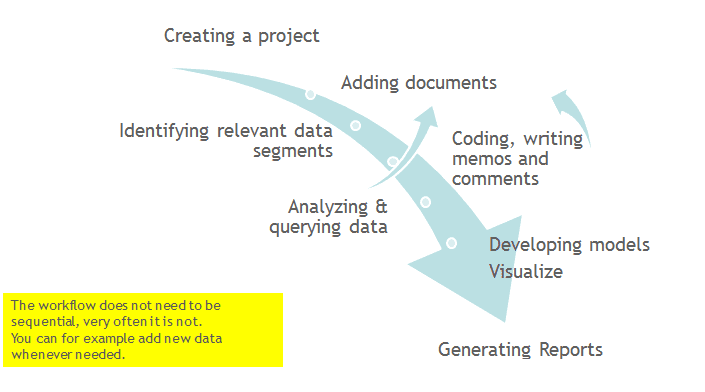
Data Level Work
Data-level activities include Exploring Data using word clouds and word lists, segmenting the data that you have assigned to a project into quotations, adding comments to respective passages note-making/annotating, linking data segments to each other called hyperlinking in ATLAS.ti, and coding data segments and memos to facilitate their later retrieval. The act of comparing noteworthy segments leads to a creative conceptualization phase that involves higher-level interpretive work and theory-building.
ATLAS.ti assists you in all of these tasks and provides a comprehensive overview of your work as well as rapid search, retrieval, and browsing functions.
Within ATLAS.ti, initial ideas often find expression through their assignment to a code or memo, to which similar ideas or text selections also become assigned. ATLAS.ti provides the researcher with a highly effective means for quickly retrieving all data selections and notes relevant to one idea.
Conceptual Level Work
Beyond coding and simple data retrieval, ATLAS.ti allows you to query your data in lots of different ways, combining complex code queries with variables, exploring relationships between codes and to visualize your findings using the network tool.
ATLAS.ti allows you to visually connect selected passages, memos, and codes into diagrams that graphically outline complex relations. This feature virtually transforms your text-based work space into a graphical playground where you can construct concepts and theories based on relationships between codes, data segments, or memos.
This process sometimes uncovers other relations in the data that were not obvious before and still allows you the ability to instantly revert to your notes or primary data selection. - For more detail, see Querying Data and Working With Networks.
Welcome Screen
When you open ATLAS.ti, you see the Welcome Screen. It is divided into three parts:
Welcome Screen (left-hand side)
On the left-hand side, you find licence information, you can create a new project or import an existing project, and you can access Options.
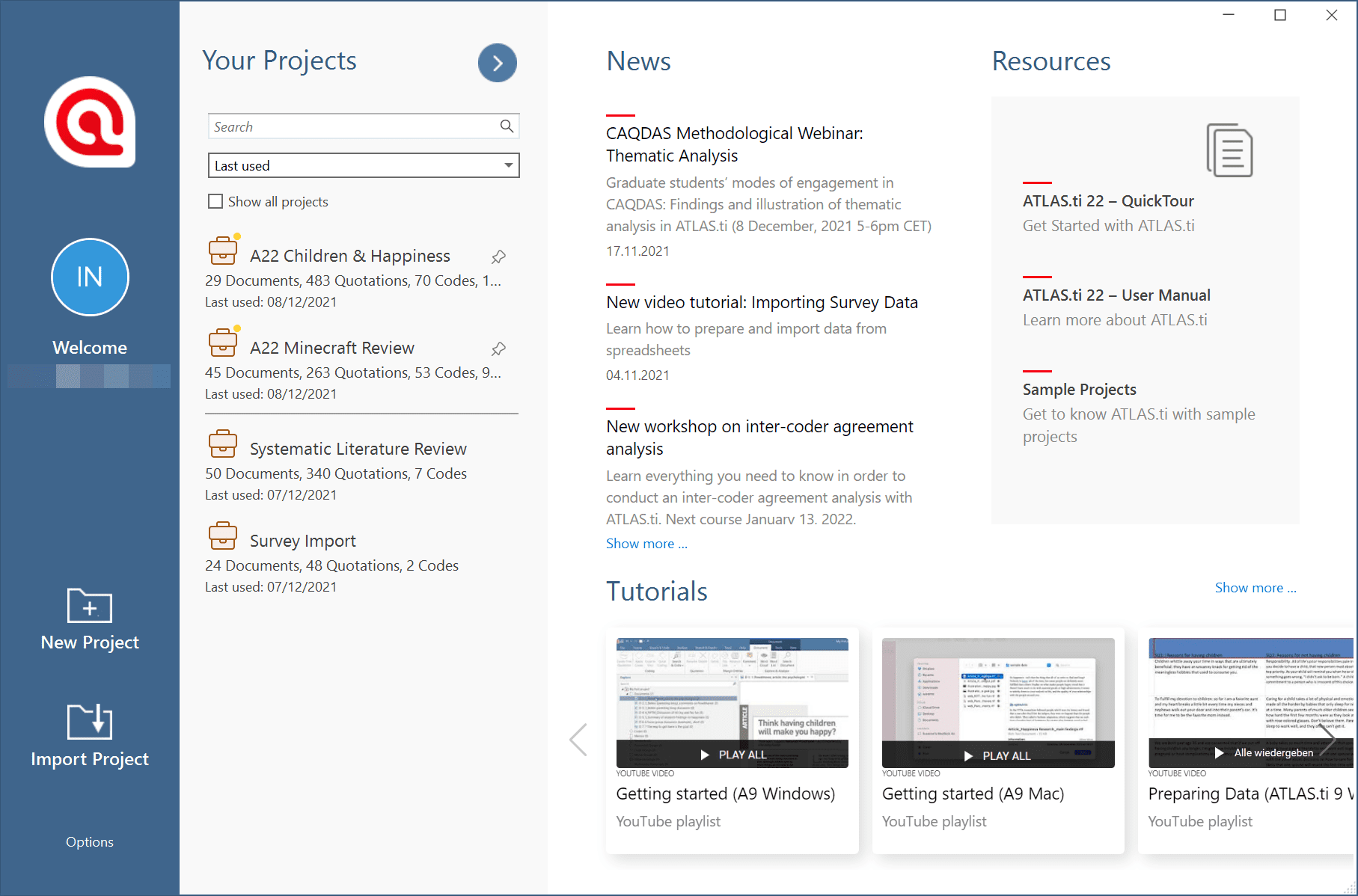
Welcome Screen (middle section)
In the middle section you can see and access all of your projects. If you have lots of projects, the search field will help you to locate a project.
You can sort projects by name, created, last modified, and last used.
Context menu for projects
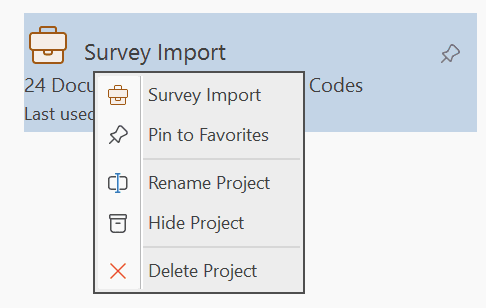
If you have lots of projects, you can hide those that you do not need at the moment. You can switch between showing all projects or only those that are currently not hidden. See the Show all projects option.
Other options in the context menu are to open a project, to pin it to the favorite list, to rename a project, or to delete a project. A pinned project is listed in a separate section above the list with all other projects.
If you delete a project, it is deleted permanently. It cannot be recovered. If you still want to have access to the project at a later time, make sure that you export it first and store a project bundle file at a secure location.
Welcome Screen (right-hand side)
On the right-hand side of the Welcome Screen, you have access to useful information and resources:
- News about current workshops, updates, newsletters, interesting articles, etc.
- Resources Quick Tour, User Manual and sample projects
- Video Tutorial: Learn ATLAS.ti quickly by watching our video tutorials that walk you through the entire process from project creation to analysis and reporting step by step.
If you rather use this space to view the list of your projects, you can click on the button with the right-arrow.
If you want to see the screen with the news and resources again, click on the button with the left-arrow.
Creating a New Project
Video Tutorial: Creating a project and adding data. If you just started ATLAS.ti,
In the opening window on the left-hand side of the screen click on the button: Create New Project.
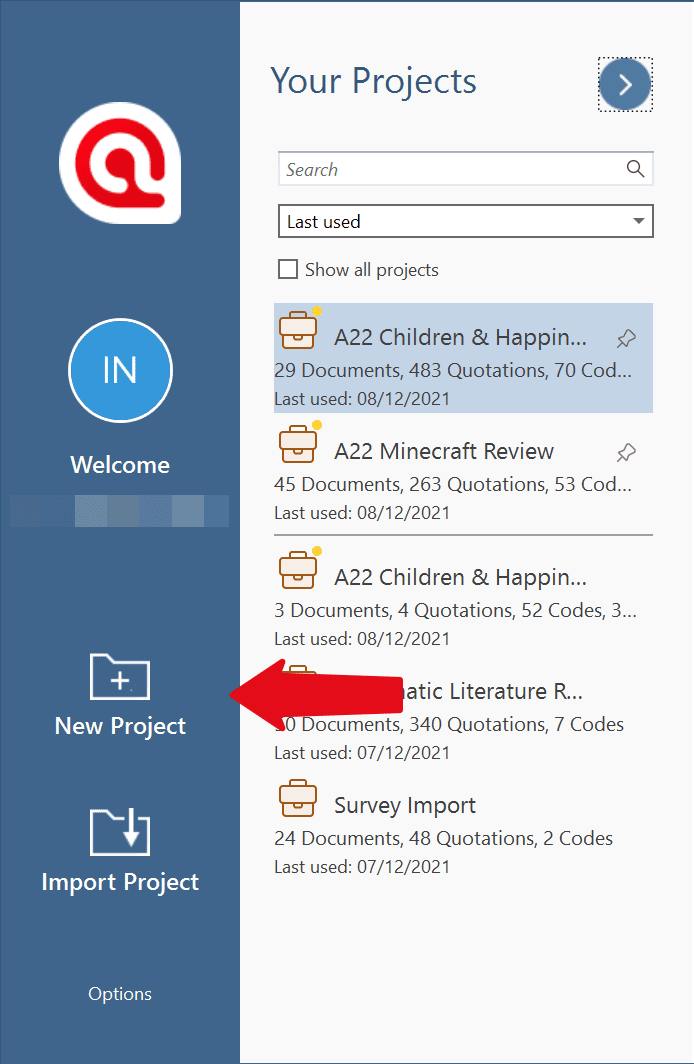
Enter a name for the project, optionally a comment, and click on Create.
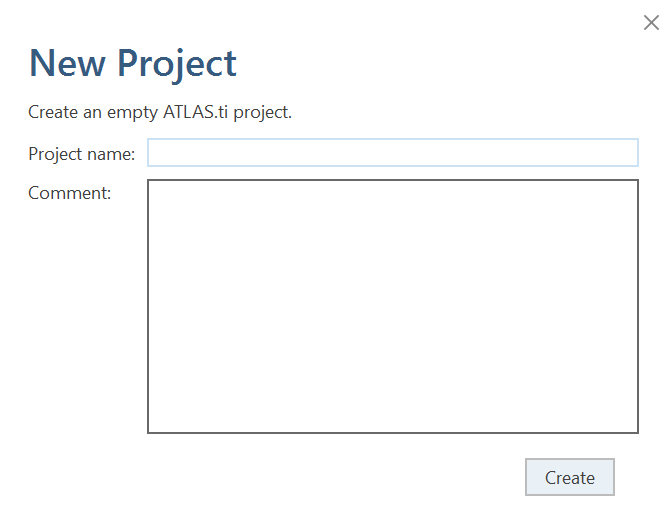
If a project is already open,
click on File > New to open the backdrop. From there select Create New Project. Enter a name for the project, optionally a comment, and click on Create.
Importing an Existing Project
The following project types can be imported:
| Version | File Type |
|---|---|
| Version 22 | Project Bundle |
| ATLAS.ti Web | Project Bundle |
| Version 9 | Project Bundle |
| Version 8 | Project bundle |
| Version 7 | Transfer bundle or copy bundle |
| Version 6 and older | Copy bundle |
Project Exchange format | QDPX
Exported projects from the Ipad or Android apps can also be imported. ATLAS.ti Cloud projects can currently not be imported into the desktop version.
How to Import Projects
If you just started ATLAS.ti,
Select the Import Project option on the right-hand side of the opening screen.
If ATLAS.ti is already open,
Select File > New and from there the Import Project option.
Options
- You have the option to rename the project before importing. This is useful for team project work and if you do not want to overwrite an existing version.
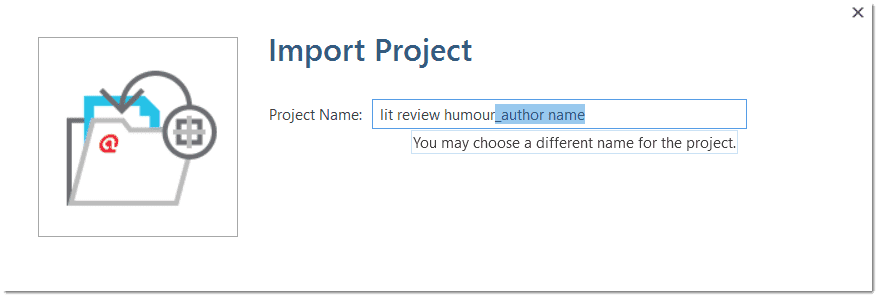
- If the project that you are importing already exists in your library, you have the choice to either overwrite the existing project with the version you are importing, or whether you want to rename the project that you are importing.

If the project contains Linked Media Files
If the project contains linked media files, and the files have not been included in the bundle, you can relink them. This requires that you have a copy of the file on your computer, or a file that is accessible on an external drive or server.
In the example shown below, the source for document 23 is a video that is available in the library. The source for document 26 is a linked video and needs to be relinked in order for it to be displayed in ATLAS.ti:
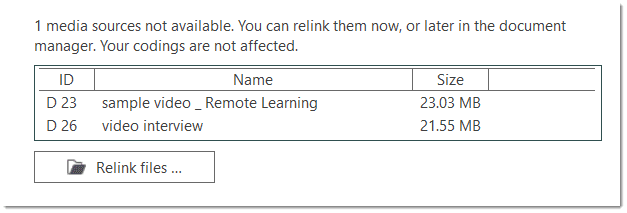
You can also decide not to relink the files at this stage and proceed with importing the files. The linked multimedia documents are still listed under Documents, but you cannot load them. They will appear gray in the Document Manager.
If you double-click on a multimedia file that is not available, ATLAS.ti gives you the option to repair the link. This means, you point ATLAS.ti to the folder where the multimedia file is stored, so that it can be relinked to your project.
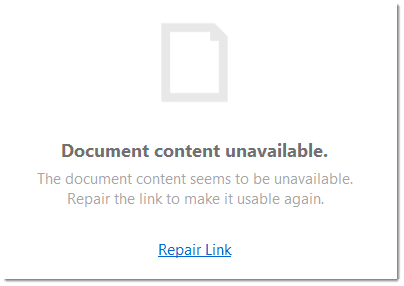
The ATLAS.ti Interface
When you open a project, you see the ribbon on top, the project navigator on the left-hand side and the ATLAS.ti logo in the middle of the working area.
At the top of the screen, you see the title bar where the name of the current project is displayed. It also includes the Save, Undo and Redo functions on the left-hand side.
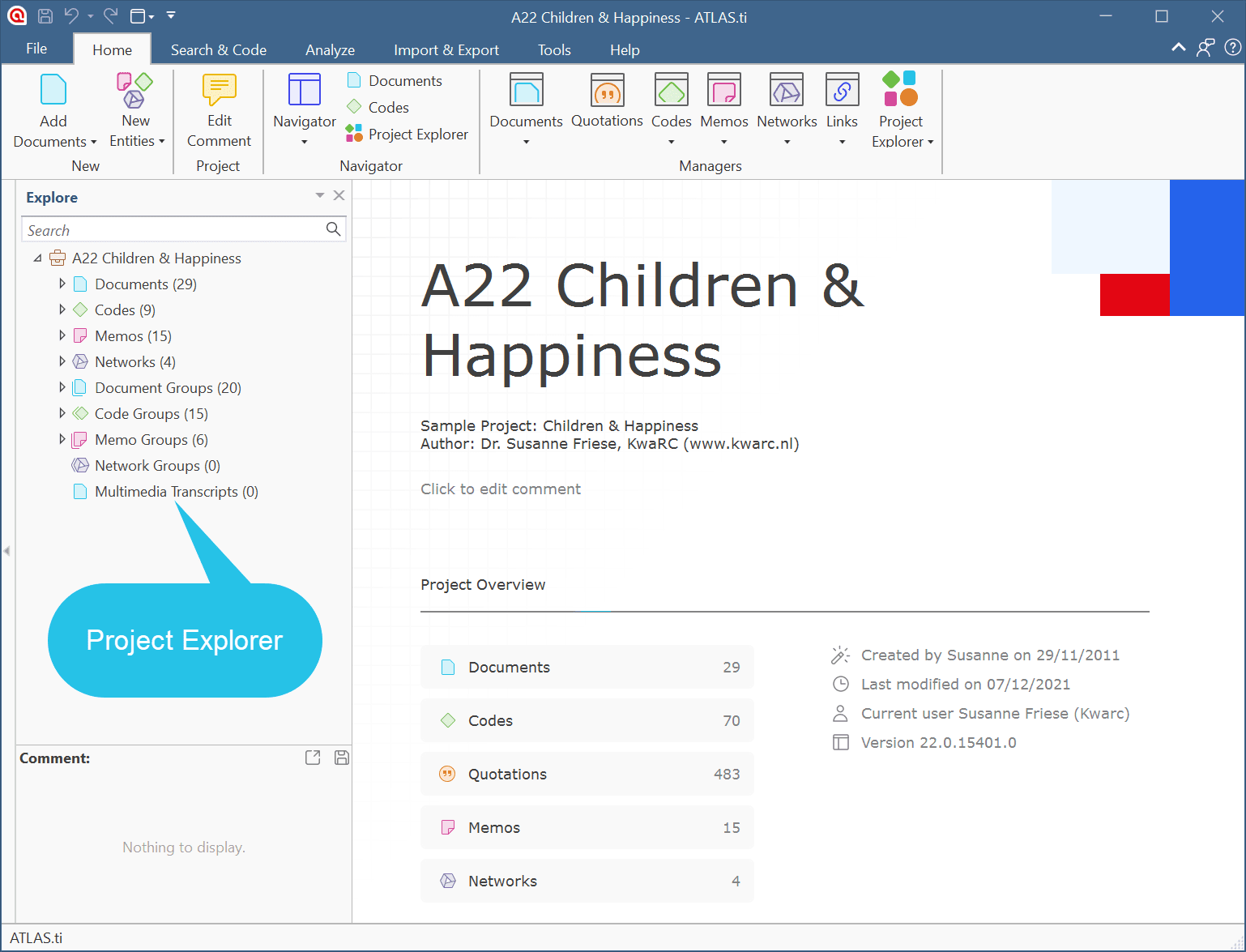
You are probably familiar with ribbons from other contemporary Windows software that you use. A ribbon is a graphical control element in the form of a set of toolbars placed on several tabs. They are grouped by functionality rather than object types. Ribbons, in comparison, use tabs to expose different sets of controls, eliminating the need for numerous parallel toolbars. This highly improves the workflow and makes it easier for users to see which functions are available for a given context.
The ATLAS.ti Ribbon
The six core tabs in ATLAS.ti are:
- Home
- Search & Code
- Analyze
- Import & Export
- Tools
- Help
Depending on the function you are using, additional contextual tabs will appear. These will be highlighted by a colored box at the top of the ribbon.
The Home ribbon is the starting point for most projects. You can start here to add documents to a project, create new codes, memos and networks. You can open various navigators to be displayed in the navigation area on the left-hand side of the screen and access all entity managers.

The Search & Code tab allows searching through text data by different criteria:
- You can enter search expressions including synonyms
- You can let ATLAS.ti identify entities for you
- You can search for positive, negative, or neutral sentiments.
- You can let ATLAS.ti identify concepts for you.
You can explore data through word cloud and word lists, applying stop and go lists, or reducing finds to 'parts of speech'.

The Analyze tab offers a number of advanced functions to analyze your data after coding. See Querying Data.

The Import & Export ribbon offers a number of import option for specific data types:

- Twitter data. See Working with Twitter Data.
- Data from Evernote. See Support File Types.
- Literature stored in reference managers like EndNotes, Mendeley, etc. ATLAS.ti supports EndNote XML and BibTex. See Working with Reference Manager Data.
- Survey data from Excel. See Working with Survey Data.
- Social Network Comments
Further you can import and export code books and document list with their groups. See Importing and Exporting Code Lists and Importing and Exporting Document Groups.
If you are interested in a mixed-method approach, you can generate a SPSS syntax file for further quantitative analysis of your qualitative coding, or export a generic version in form of an Excel file for import in R, SAS or STATA. See Data Export for Further Statistical Analysis.
The Tools ribbon holds tools for user management (see User Management) and for cleaning up your project by finding and removing redundant codings. See Finding Redundant Codings.

Via the Help ribbon you can access our support resources including Live Chat.

File Menu / Backstage
Under File you find all options that concern your project, like creating a new project, open existing projects, saving and deleting projects, creating a snapshot (=copy) of your project, exporting and merging projects. See Project Management.
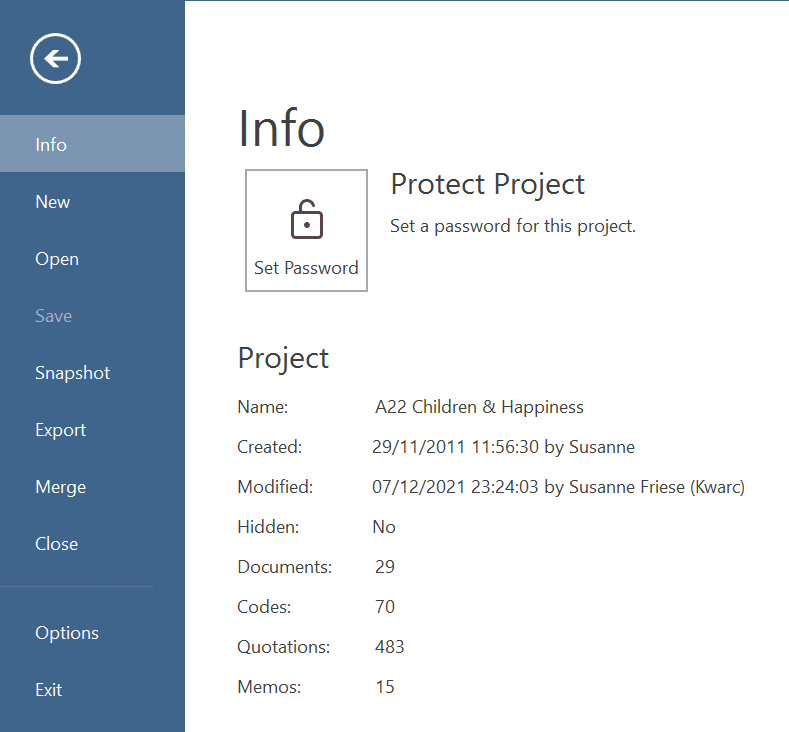
Software Navigation
In the following it is explained how to work with the various entities and features in the main work space. If you want to click along, you may want to open the Children & Happiness sample project.
After you downloaded the project bundle file, import it. See Importing An Existing Project .
When you open a project, the Project Navigator opens automatically on the left-hand side. From the main branches you can access documents, codes, memos, networks and all groups. If you are looking for something in particular, you can enter a search term into the search field. If you open the branches of the various entities, they will only show you items that contain the search term.
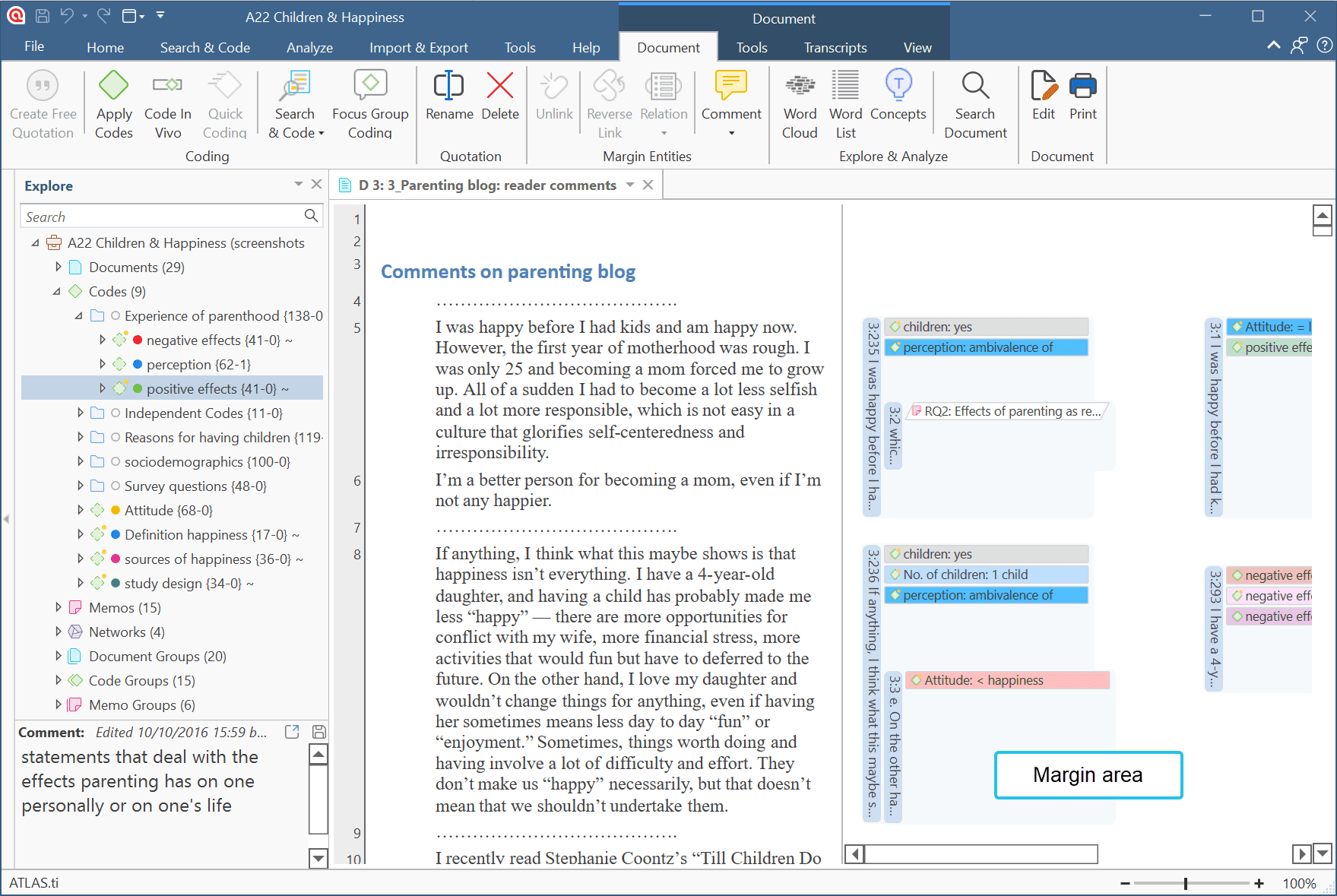
To open a branch, click on the triangle in front of each entity.
When double-clicking a main branch, the respective manager of the selected entity type is opened. See Entity Managers.
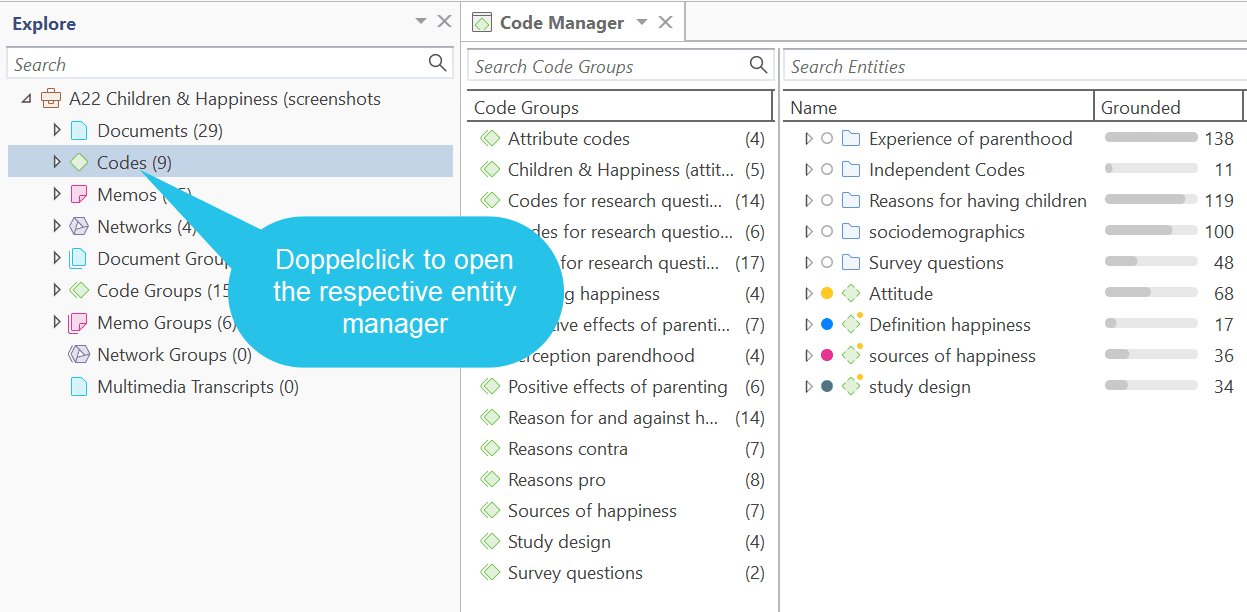
-
Under the main Documents branch, you see all documents. Below each document, you can access all quotations of a document.
-
Under the main Codes branch, you see the folders, categories, subcodes and independent codes. For further information see: Basic concepts
-
Under the main Memos branch, you see the list of all memos. On the next level, you see all linked entities, which for memos can be other memos, quotations and codes.
-
Under the main Networks branch, you see the list of all networks. On the next level, you see all entities that are contained in the network.
-
Under the Groups branches, you see the list of all groups and below each group, the list of all members of the selected group.
If an entity has a comment, this is indicated by a yellow dot attached to the entity icon.
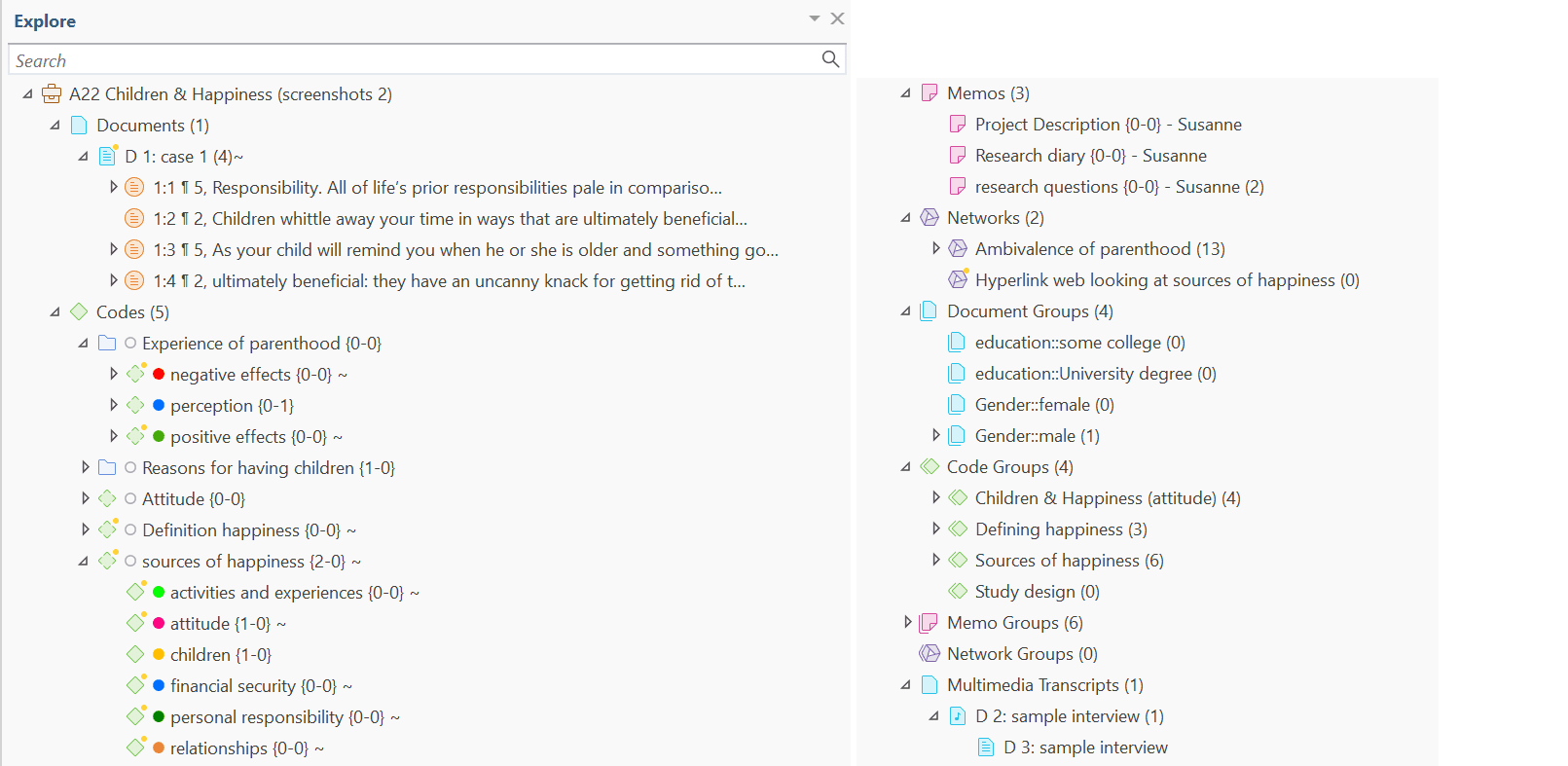
Browsers
In addition to the Project Navigator that contains all project items, you can open browsers that only contain one entity type. Browsers are available for documents, quotations, memos and networks.
To open one of the browsers, click on the drop-down arrow of the Navigator button. As the documents and codes browsers are frequently needed, you can also launch them directly from the navigator group.
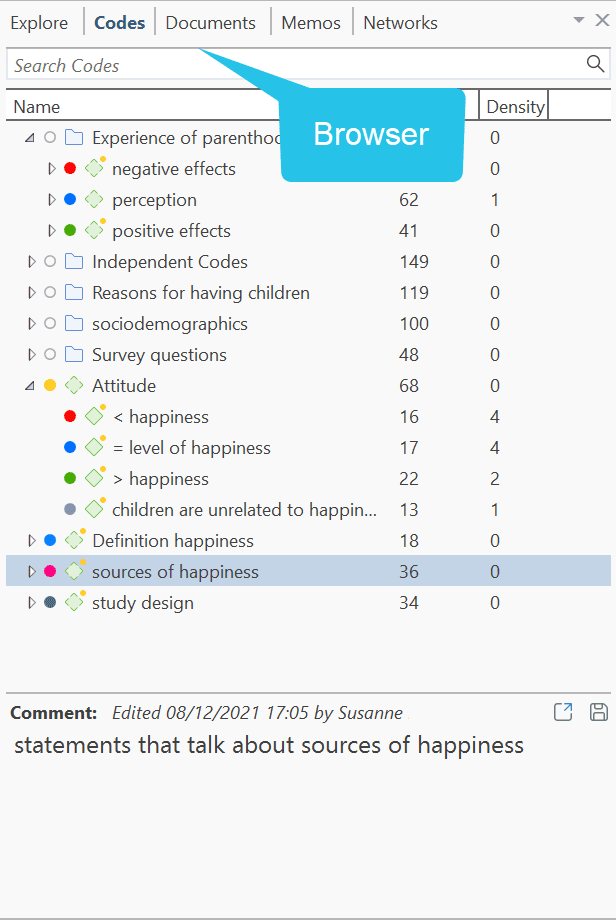 The single entity browsers open in tabs next to the Project Navigator. Each browser also has a search field on top. This facilitates working with long lists.
The single entity browsers open in tabs next to the Project Navigator. Each browser also has a search field on top. This facilitates working with long lists.
Context Menus
Each item in the navigation panel has a context menu, which means a context-sensitive menu opens when you right-click. Depending on the entity that you click, each context-menu will be slightly different.
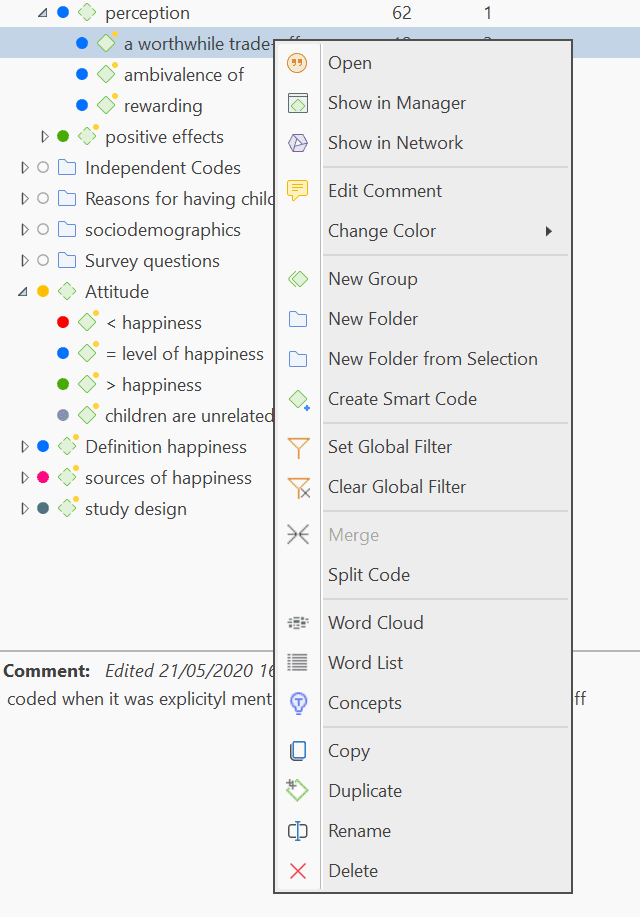
Working with Docked and Floated Windows
When you first open a manager or other windows, they will be opened in floating mode. All windows can however also be docked. Depending on what you are currently doing, you may prefer a window to be docked or floated. Once you have docked a window, ATLAS.ti will remember this as your preferred setting for the current session. This is how you do it:
Open the Code Manager by clicking the Codes button in the Home Tab.
To dock this window, click on the fourth icon from the right (left of the minimize button).
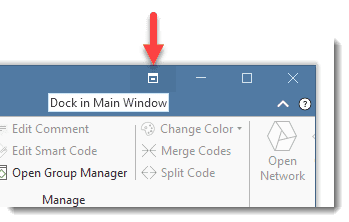
To float a window , click on the dropdown arrow next to the manager name and select Float.
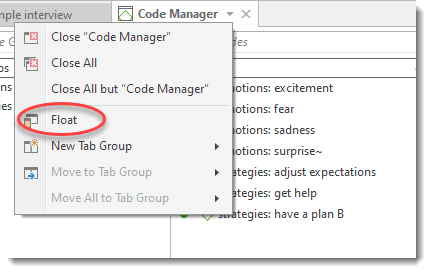
Always On Top
A floating window disappears in the background if you click outside the window. If you prefer the window to stay on top of other windows, right-click on the button at the top left of the window and select the option Always On Top.
Working With Tabs and Tab Groups
When you load documents or open managers, networks and memos, they are displayed in tabs next to each other. Depending on what you do, it is more convenient to see certain items side-by-side in different tab groups. This is how you do it.
Load for instance two documents. You do this by opening the document tree in the navigation area on the left-hand side and double-click a document.
When double-clicking on two or more documents, they are loaded into different tabs in the main work space. The tab of the currently loaded document is colored in white.
To move one of the documents into a new tab group, click on the down arrow next to the document name in the header and select New Tab Group > Right.
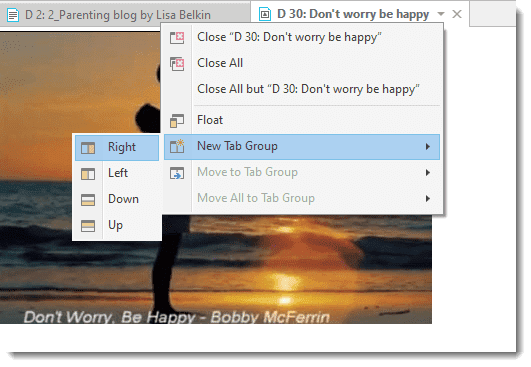
You have the option to move it into a tab group to the right, left, down or up.
This can also be done with any other items you open, be it a list of codes, a memo, or a network. You can individualize your work space as it suits your needs. An example is shown below.
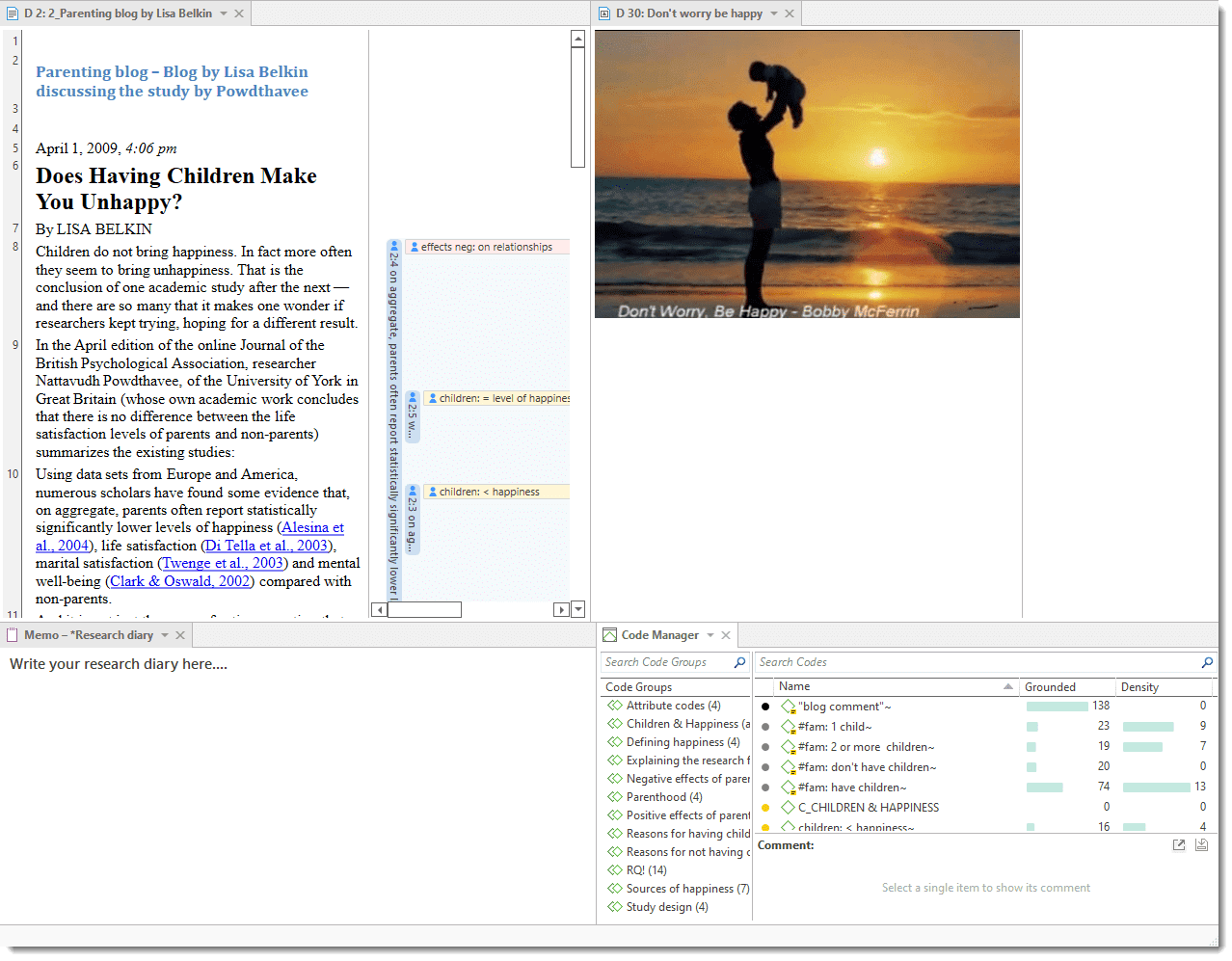
The Six Main Entity Types
The six main entity types in ATLAS.ti are:
All entity types have their own manager. See Entity Managers. The Entity Managers allow access to the entities and provide several options and functions.
To open a manager, double-click on the button in the ribbon.
Entity Managers are child or dependent window of the main editor. Child windows have some common properties:
-
They are closely related to the parent window 'knows' about changes in the child window, like the selection of an item, and vice vera.
-
They can be resized and positioned independently of their parent window.
-
They are minimized when the parent window is minimized, and they are restored with their parent window.
-
They are closed when the parent window is closed.
-
However, child windows do NOT move with the parent window.
Miscellaneous Goodies
You can copy the content of every entity, be it a document name, a group name, a code, memo or quotation name, or a node in a network and paste it into an editor or a network.
If you copy an entity name from a list into an editor, the name is pasted.
If you copy a node and paste it into an editor, the name of the node is pasted.
If you copy the name of an entity and paste it into a network, it is pasted as node. If links already exist, they will be shown immediately.
Entity Managers
There is a separate manager for each of the six entity types: Documents, Quotations, Codes, Memos, Networks, and Links. The Entity Managers allow access to the entities and provide several options and functions. As there are differences among the various entity types, you find a section on each of the managers.
Launching an Entity Manager
To open for instance the Document Manager, click on the Documents button in the Home tab. To open the Quotation Manager, click on the Quotations button; to open the Code Manager click on the Codes button, and so on.
An alternative way is to double-click on Documents, Codes, Memos, etc. in the Project Explorer in the navigation panel on the left.
The managers open as floating windows, but all windows can be docked as well. See Software Navigation.
Each manager contains a list of the entities it manages, and some detailed information about them. At the bottom of the list, you find a comment field in each manager and in some managers, also a preview field.
In the Document and Quotation Manager you can preview the content of either the selected document, or the selected quotation. In the Memo Manager, the memo content is shown next to the comment field.
Another common element is the filter area on the left-hand side, which can be used to quickly access and filter the elements listed in the managers via groups or codes. They allow immediate access to fundamental activities like selecting codes, groups, creating groups and smart groups, and setting local and global filters. This allows a much more effective integration into the work flow and saves a lot of mouse movements and clicks. It is also possible to run simple Boolean queries in entity managers.
You can activate or deactivate the filter area by selecting the first option in the View tab, which is to show or hide entity groups. See View Options below.
The Split Bar
The relative size of the side panel, list, preview and comment pane can be modified by dragging the split bar between the panes. The cursor changes when the mouse moves over the split bar. You can re-size the adjacent panes by dragging the split bar to the desired position.
The Status Bar
You find a status bar at the bottom of the window when the Manager opens in floating mode, or at the bottom of your screen when the manager is in docked mode. It shows the number of items listed in the manager.
Selecting Items in an Entity Manager
A single click with the left mouse button selects and highlights an item in each of the Entity Managers.
Double-clicking an item selects the entity and invokes a procedure depending on the type and state of the entity.
For multiple selections, you can use the standard Windows selection techniques using the Ctrl or Shift key.
To jump to a specific entry in the list, first select an item and then click the first, second and subsequent letters of a word to jump to the entry in the list. For example, suppose a number of codes begin with the two letters 'em' as in emotions typing 'em' will jump to the first of the EMotion ... codes. Every other character typed advances the focus to the next list entry unless a matching name cannot be found.
Avoid long delays between entering characters. After a certain system-defined timeout, the next character starts a new forward search.
Searching
In the filter area and all entity lists, you find a search field.
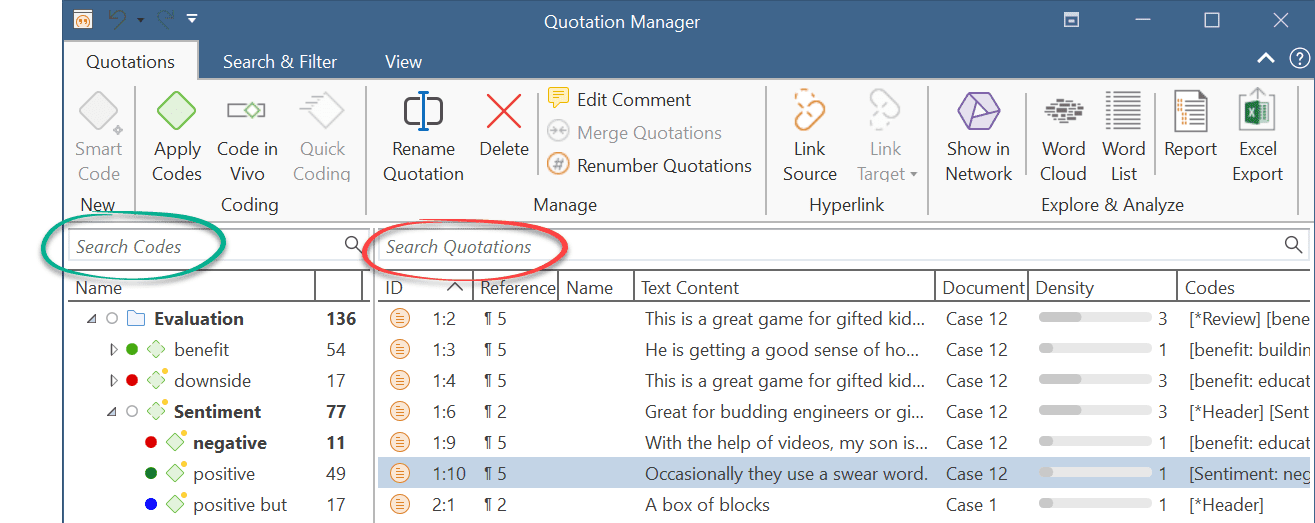
Use the search field to search for either documents, quotations, codes or memos in the respective managers.
If you enter a search term, all objects that include the term somewhere will be shown in the list. For example, if you enter the term children in the code manager, all codes that include the word children somewhere in the code name will be shown.
Remember to delete the search term if you want to see all items again.
Incremental Search: This feature is available in the list pane of all Entity Managers. Select any number of items in the list and type in an arbitrary sequence of characters into the search field to jump to a subsequent list entry matching this sequence.
Context Menus
The list and text panes offer context-sensitive popup menus. The context menus contains a portion of the commands that you also find in the ribbon.
Sorting and Filtering
The Entity Managers permit comfortable sorting and filtering. With a click on a column header all items are sorted in ascending or descending order based on the entries in the selected column.
When creating entity groups, you can also use them to filter the list of items in a manager. When selecting a group, only the members of the selected group are shown in the list. When selecting multiple entities, you can combine them with the operators 'AND' or 'OR'. See Simple Boolean Queries in the Quotation Manager .
In all managers but the Links Manager you find both a View, and a Search & Filter tab. In the Document and Code Manager, there is an additional Tools tab.
View Options
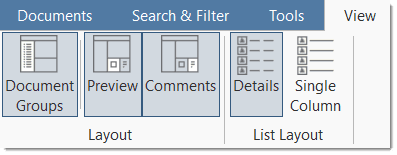
In the View tab, you can activate or deactivate the filter area, the preview field (if available) or the comments. In addition, you can switch between Detail and Single Column view.
The Code Manager offers two additional view options, a cloud and bar chart view of the codes. See Code Manager for more detail.
Search & Filter Options

The search allows you to search through the entire content of documents, quotations or memos, through entity names and comments, or entities created or written by a selected author. The search term can contain regular expression. See Regular Expressions (GREP).
The search option in managers is restricted to the respective entity type.
Further options are to set or remove global filters, and to filter by selected criteria:
- today
- this week
- only mine
- commented
The Document Manager
The Document Manager helps you to organize your data, to group documents or to filter them.
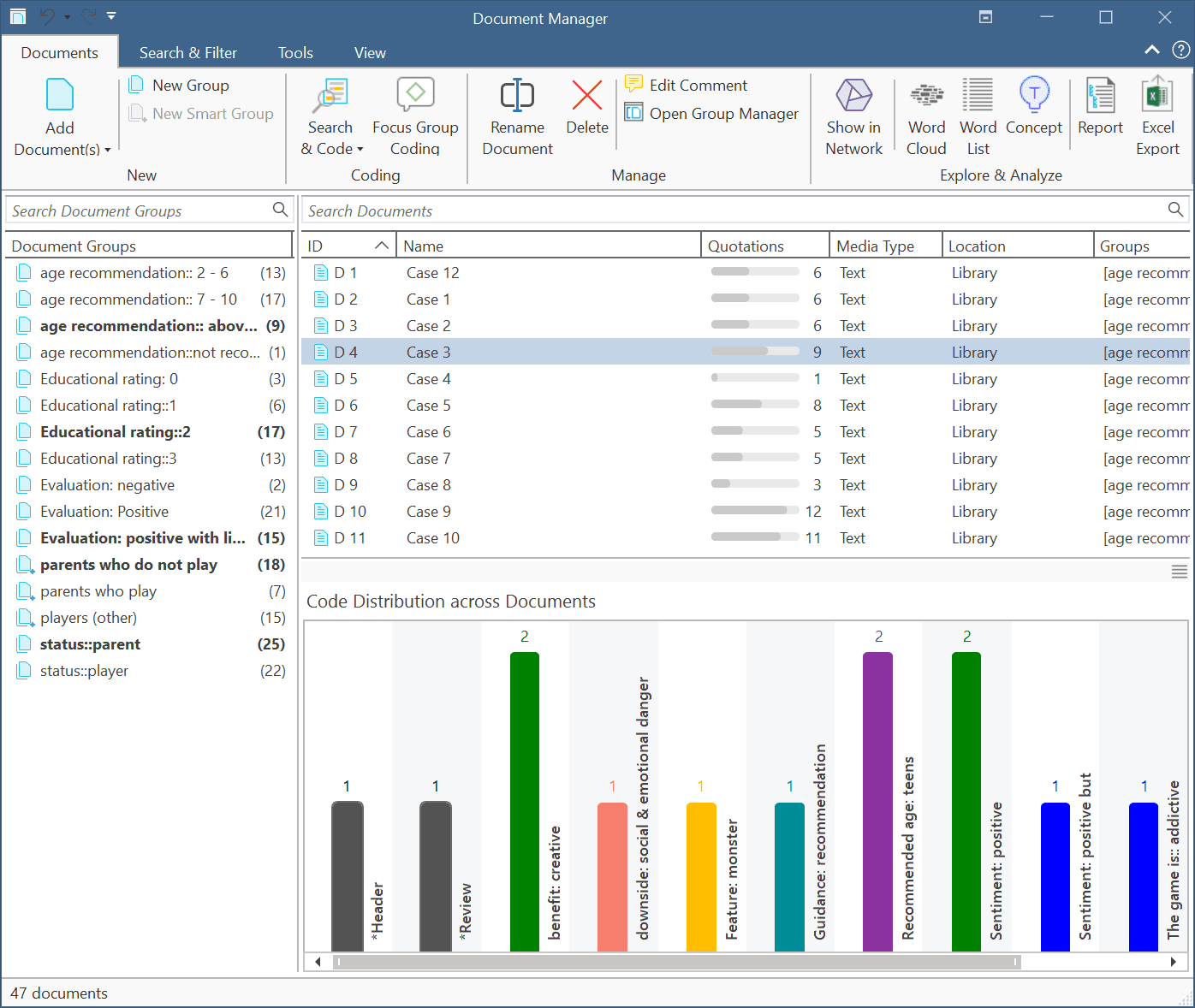
Further you can access:
-
the Search & Code tools if you want to code your data automatically
-
the focus group coding tool to auto code speaker units or other structural information on your data.
-
the word clouds or word lists for exploring your documents.
-
you can search for concepts.
-
You can create reports or view geo locations in Google Maps.
Status Bar: The status bar at the bottom of the screen shows how many documents there are in the project. ID: The first column shows the blue document icon, and the document number. The document number is a consecutive number given to the document by ATLAS.ti when it is added to a project.
Name: The default name is the file name of the original source file that you added to the ATLAS.ti project. You can rename each document if you prefer a different name.
Location: Here you see whether a document is stored in the ATLAS.ti library or whether ATLAS.ti opens it from a linked location. For further information see Adding Documents.
Below the document list you see a Code Distribution across Documents. You can switch between seeing a document preview or the bar charts.
Filter
Click on one or more document groups in the filter area on the left to set a local filter. This means only the items in the manager are filtered.
If you want to filter the entire project, right-click on a document group to set a global filter. See Applying Global Filters For Data Analysis.
The Document Manager Ribbon

From left to right:
Add Document(s): Add a new document to your project. See Adding Documents.
New Group: Create a new document group.See Working With Groups.
New Smart Group: Smart Groups are a combination of existing document groups using Boolean operators. See Working With Smart Groups for further detail.
Search & Code: Here you can directly access the various search and code functions offered by ATLAS.ti to automatically code your data. See Search & Code for further information.
Focus Group Coding: You can automatically code all speaker units in a focus group. See Focus Group Coding for further information. This option can also be used to code data units in other type of structural data.
Rename: When adding a document to an ATLAS.ti project, the default name is the file name. You can change this name internally in ATLAS.ti. It does not change the name of data file.
Delete: Remove selected document(s) from a project. This is a permanent deletion. It also means that all coding done on the document(s) is deleted. You can revert the action using UnDo, but only within the currently active session.
Edit Comment: Open a text editor for writing or editing a comment for a selected document. See Working With Comments And Memos.
Open Group Manager: See Working With Groups.
Open Network: Open a network on the selected document(s). The network only contains the document and does not display links yet. This option is for instance useful if you want to compare cases. See Analytic Functions in Networks.
Word Cloud: Word Clouds visualize the frequency of words. The more frequent a word occurs, the larger the word is displayed in the image. Word Clouds are an exploratory tool that allow you to gain quick inside into your data. It can be the basis for auto coding and further analysis. See Creating Word Clouds.
Word List: This function allows you to generate a list of all words that occur in selected documents. The list can be sorted in alphabetic order or by frequency. You can export it to Excel for further data crunching. See Word Lists.
Concepts: Let ATLAS.ti find concepts in your data that you then can review and autocode. See Find Concepts.
Report / Excel Export: Reports can be created as text file (Word, PDF), or in Excel format. All reports are customizable. See Creating Reports.
Many of the options available in the ribbon are also available from the context menu of a document.
Tools Tab

Renumber Documents: When adding documents to a project, they are numbered by ATLAS.ti in consecutive order. If you remove one or more documents, this may result in gaps. Use this option to close these gaps.
You can also use this option to re-order documents the way you want them to be ordered. To achieve this, rename the document in a way so that sorting them by name results in the order you want them to be in. Next click on the 'name' column to sort the documents by name and then select the 'renumber' option. The document numbers will then follow the alphabetical order. See also Managing Documents.
Renumber Quotations: Selecting this option will close any gap in the numbering of quotations.
Each quotation that you create has an ID. The ID consists of the document number, and a number indicating the chronological order when the quotation was created. For example, the ID 3:12 means that this quotation is in document 3 and that it was the twelfth quotation that was created in this document.
If you delete quotations or modify them, the ID does not change. If you delete a quotation with the ID 3:11, this does not mean that quotation 3:12 automatically becomes quotation 3:11. Such an automatism is not always desired. If you for instance have already started the writing process and made reference to some quotations using their ID, you would not want ATLAS.ti to change the IDs automatically.
If you do want all quotations to be numbered in sequential order, you need to evoke it manually by selecting the Renumber Quotations option.
Import Transcript: This option is available after you have added a multimedia document (audio or video). If you have a transcript with timestamps for this document, you can add it as transcript. The transcript and multimedia document are synchronized via the time marks. See Importing Multimedia Transcripts.
Document Export: This option allows you to export your documents as external data files. Text files are exported as Word docx files, all PDF. image and multimedia files in their original format.
Repair Link: If you have linked an audio or video file to a project, and the link is no longer valid, you can repair the link using this option.
Remove Codings: You can use this option if you want to unlink all codes from all quotations. This means all quotations and all codes remain in the document, but none of the quotation is coded. This is useful at times for team projects and inter-coder agreement analysis.
Browse Geo Location; All geo documents are based on Open Street Map or Bing. If you want to see a geo-location in Google Maps, you can use this option. See Working With Geo Docs.
Duplicate document(s): This allows you to create an exact copy of one or more documents with all quotations, codes, links, ect. This can be useful if for instance you want to code a document based on different aspects. This option will allow you to split a document, also when it is already coded. You duplicate it first, then (entering edit mode) you delete the second part of one document, and the first part in the other.
Search & Filter / View Tab
As these tabs are the same in all manager, they are discussed here Entity Manager.
Quotation Manager
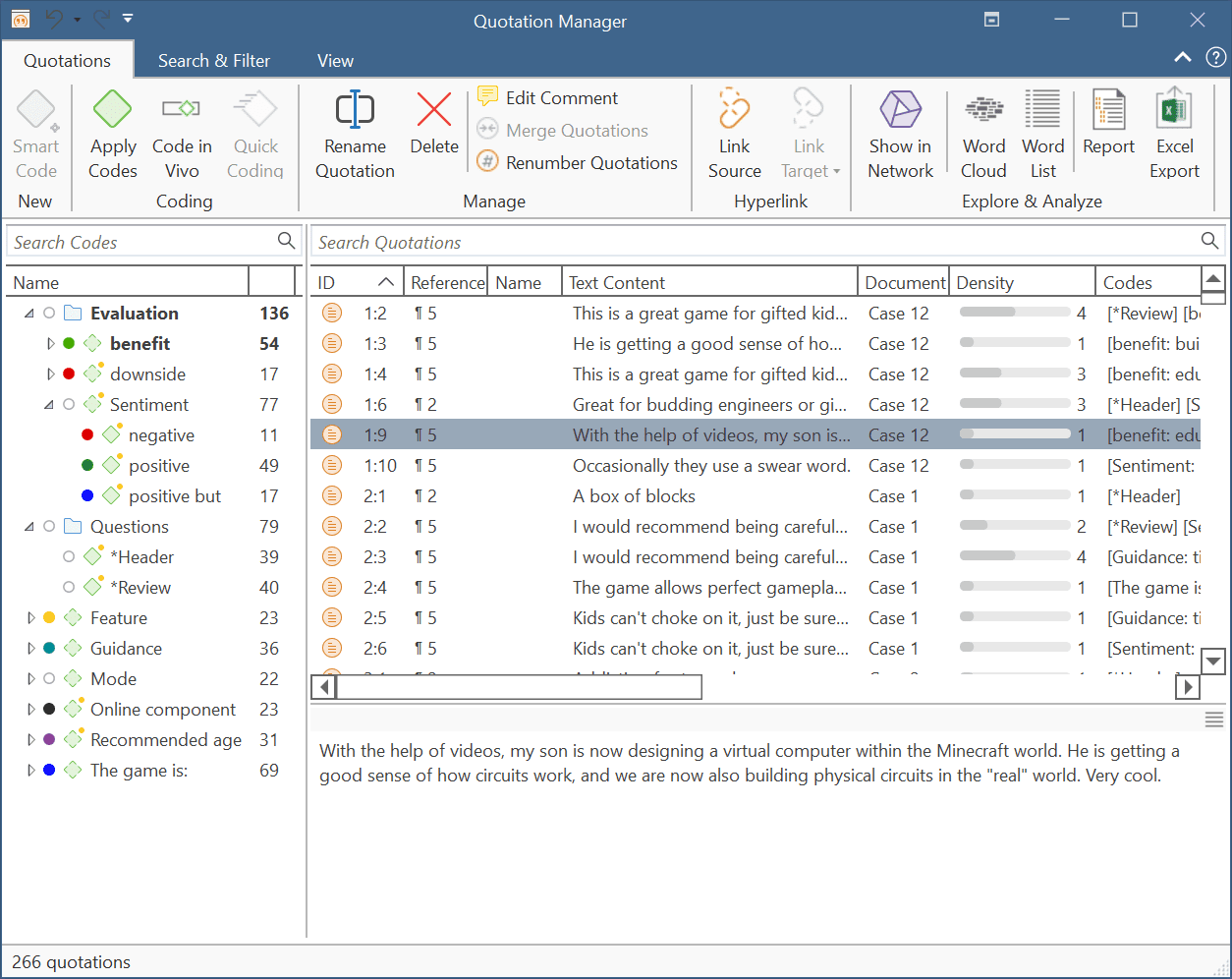 The Quotation Manager can be used for retrieving and reviewing data by codes, creating smart codes, writing comments, creating reports, or opening networks. When working with multimedia and geo data, it is useful to rename quotation names as titles for audio- or video segments or for location names for geo data. See Working with Quotations.
The Quotation Manager can be used for retrieving and reviewing data by codes, creating smart codes, writing comments, creating reports, or opening networks. When working with multimedia and geo data, it is useful to rename quotation names as titles for audio- or video segments or for location names for geo data. See Working with Quotations.
Quotation Reference
ID: The ID consist of two numbers best explained by an example: An ID 3:10 means that the quotation comes from document 3, and it is the 10th quotation that was created in this document. Quotations are numbered in chronological and not in sequential order.
Reference: The reference indicates the location of the quotation in the document, e.g., paragraph 12 - 13. For audio and video documents, the reference gives the start position in h:m:s. For geo quotations, the geo-location is provided.
Indicator of Hyperlinks: Brackets (< or >): indicate that the quotation is a start anchor or target for a hyperlink. For further information see Working with Hyperlinks.
Position in the Document: Start / End / Extent
If you scroll a bit to the right, you find information about start and end position of a quotation in the document, and the total length of a quotation. The measure that is used is dependent on the media type:
Start / End
- Text quotation: number of paragraphs
- Text PDF: page number in ATLAS.ti plus number of characters on the page
- Graphic quotation: upper left coordinates / lower right coordinates
- Audio quotation: hours:minutes:seconds: milliseconds
- Video quotation: hours:minutes:seconds: milliseconds
- Geo quotation: n/a
Extent
- Text quotation: total number of paragraphs
- Text PDF: total number of pages covered
- Graphic quotation: height in pixel of the quotation's rectangle.
- Audio quotation: hour:minutes:seconds:milliseconds
- Video quotation: hour:minutes:seconds:milliseconds
- Geo quotation: n/a
Adding Quotation Names
Name: The name field initially is empty. You can enter a name for each quotation, e.g., to enter a title, a description for an image quotation, or a geo-location. See also Working with Quotations.
Selection Behaviour
A single-click selects a quotation. If you have written a comment for the selected quotation, it is displayed in the at the bottom of the window.
A double-click on a quotation loads its document (unless already loaded) and displays its content in context.
Multiple Selection: You can select more than one quotation at a time, either to delete them, to attach codes, to open a network on them, or to create output.
Drag & Drop
By dragging one or more quotations onto other quotations, you create hyperlinks. See Working with Hyperlinks for further information.
Filter
Click on one or more codes in the filter area on the left to view only quotations linked to the selected code(s).
By default the quotation preview is shown in the bottom pane of the window. You can switch to the comment pane, by clicking on the burger menu at the top right-hand side of the pane.
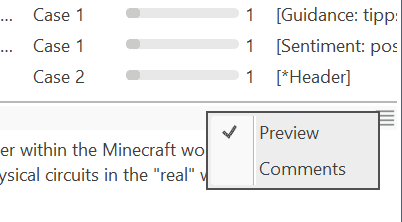
Status Bar: The status bar at the bottom shows how many quotations there are in the project.
Quotation Manager Ribbon

From left to right:
Smart code: After selecting codes in the side panel of the Quotation Manager you can create smart codes. See Working with Smart Codes.
Code in Vivo: In-vivo coding creates a quotation from the selected text AND uses the selected text as the code name.
Apply Coding: Coding a selected data segment with a new or existing code. See Coding Data.
Quick Coding: Coding with the last used code.
Rename Quotation: You have the option to enter a name for each quotation. This is useful for interpretive analysis approaches, e.g., to summarize the quotation content or to use it as 'initial code' when using Charmaz's constructive grounded theory approach. It is also useful when working with multimedia data to describe the multimedia content in words.
Delete: Removes the quotation and all codings and other links from the project.
Edit Comment: Open a text editor for writing or editing a comment for a selected quotation. See Working With Comments and Memos.
Merge Quotations: You can merge two or more quotations. The new quotation boundary can either be the boundary of a selected target quotation, or it can be expanded to include all selected quotations.
Renumber Quotations: This eliminates all gaps in quotation numbering due to deletion and renumbers all quotations in sequential order as they occur in the document.
Link Source: Uses the selected quotation as source in the process of creating a hyperlink. See Creating Hyperlinks.
Link Target: Click to select the selected quotation as target in the process of creating a hyperlink. See Creating Hyperlinks.
Open Network: Open a network on one or more selected quotations. See Opening an ad-hoc Network.
Word Cloud: Word Clouds visualize the frequency of words. The more frequent a word occurs, the larger the word is displayed in the image. In the Quotation Manager you can create word clouds for selected quotations. See Creating Word Clouds.
Word List: This function allows you to generate a list of all words that occur in selected quotations. The list can be sorted in alphabetic order or by frequency. You can export it to Excel for further data crunching. See Word Lists.
Report / Excel Export: Reports can be created as text file (Word, PDF), or in Excel format. All reports are customizable. See Creating Reports.
Search & Filter / View Tab
As these tabs are the same in all manager, they are discussed here Entity Manager.
Code Manager
The Code Manager is frequently used to:
- create and modify codes
- to code data segments via drag & drop
- to set code colors
- to retrieve coded data segments
- to organize them in code groups
- to merge and to split codes
- to filter them
- to review them in networks
- to review its content using word clouds and word lists
- to create reports.
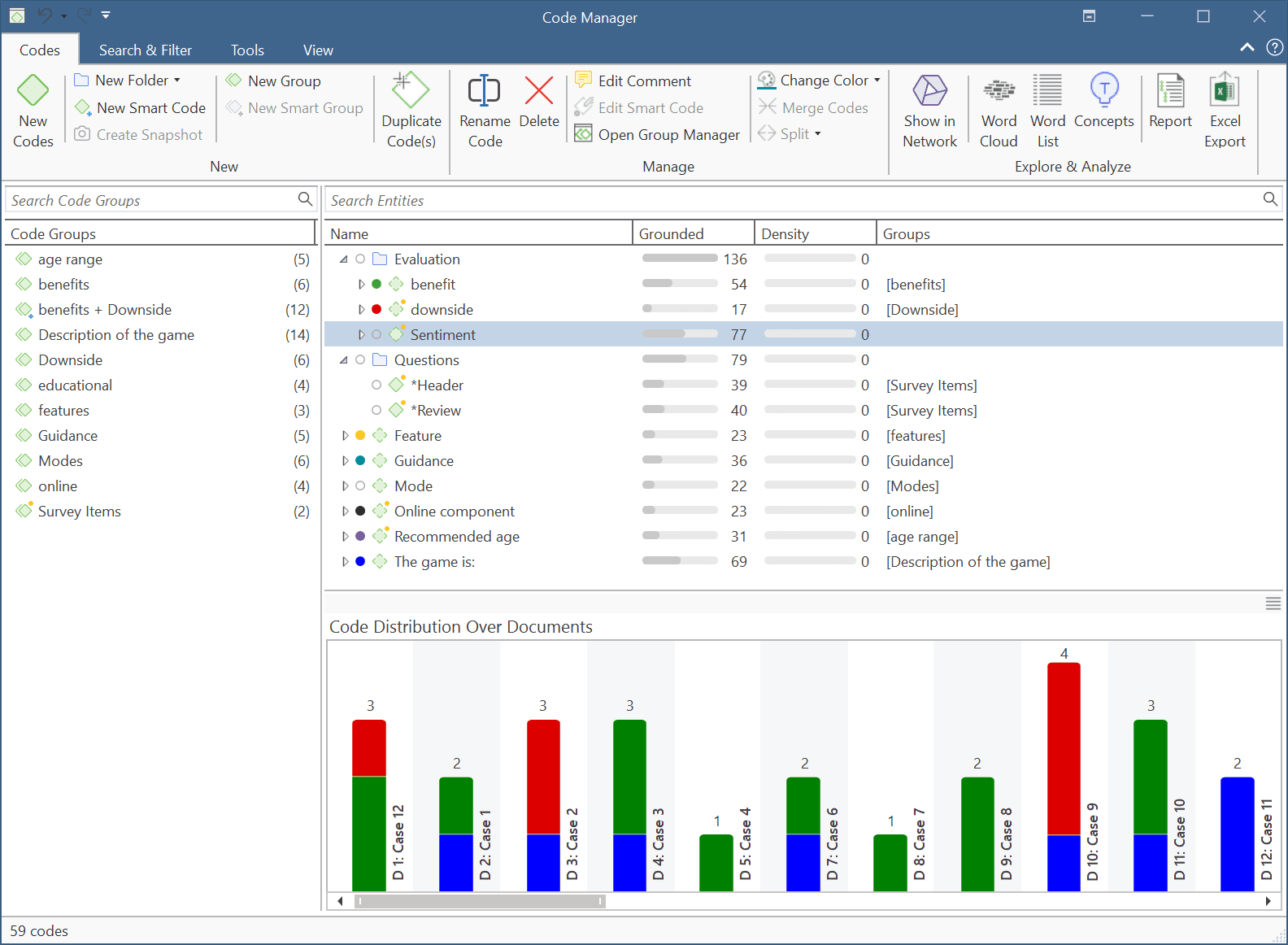
In the bottom pane below the code list, you can either view the code comments or a diagram. For more information about the diagram, see Code Distribution Over Documents.
To change between comment and diagram view, click on the burger menu on the top right-hand side of the diagram.
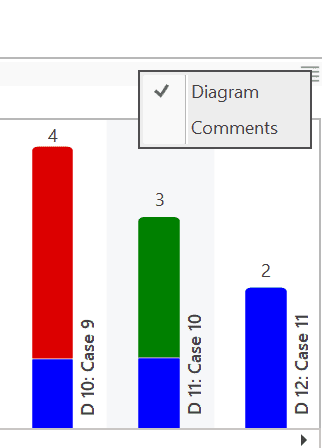
Good to know
Groundedness: Code frequency or groundedness. It shows how many quotations are linked to a code.
Density: Number of linkages to other codes. See Linking Nodes.
Colors: If you add code colors, a colored circle is displayed in front of the code icon and name. Code colors also have an effect on the display of code nodes in networks. See Working with Networks.
If you do not want to see all columns, right-click on a column header and deselect, what you do not want to see.
Selection behaviour
A double click on a code opens the list of linked quotations in the Quotation Reader You can browse through the list of quotations and view them highlighted in the context of its document. If there is only one quotation linked to a code, it will immediately be highlighted in the context of its document.
Single-click: Selects a code. If you have written a definition for the selected code, it is displayed in the comment pane below the list. Once selected, the code can be used for drag & drop coding, or you can add it to a code group via drag & drop. Multiple Selection: You can select more than one code at a time by holding down the Ctrl or Shift key. This is useful to:
- delete multiple codes
- to code a data segment with multiple codes
- to open a network that includes all selected codes
- to create reports based on the selected codes
- to assign multiple codes to a code group or to remove them from a group
- to create a new code group based on the selected codes
Drag & Drop
You can use the Code Manager as a convenient tool for coding by dragging codes onto a highlighted piece of data. If you drag codes onto another code within the same list pane, code-links will be created. If you drag a code on top of another code in the margin area, it will be replaced.
Filter
Click on one or more code groups in the filter area on the left to set a local filter. This means only the items in the manager are filtered. If you want to filter your entire project, then you need to set a global filter. See Applying Global Filters for Data Analysis.
Status Bar: The status bar at the bottom shows how many codes there are in the project.
Code Manager Ribbon

From left to right:
New Codes: Create one or more new codes.
New Folder:
New Smart Code: If you select two or more codes in the Code Manager, you can create ORed smart codes i.e., a smart code that combines all selected codes with the OR operator. For further information see Working with Smart Codes .
Create Snapshot: You can create a 'snapshot' of a smart code to turn it into a regular code again with real links to quotations. The word snapshot indicates that it conserves the state of the smart code. See Creating Snapshot Codes.
New Group: Create a new code group based on a selection you have made.
New Smart Group: Smart Groups are a combination of existing groups using Boolean operators. For further information see Working with Smart Groups.
Duplicate Code(s): This option duplicates an existing code with all it links. It is a 1:1 clone of the original. Before the code splitting function became available it was a helpful first step for splitting. Now this is no longer necessary. However, you might find some other usages for it. See Working with Codes.
Rename Code: When building a code system it is often necessary to rename a code.
Delete: Delete selected code(s).
Edit Comment: Open a text editor for writing or editing a comment for a selected code. See Working with Comments and Memos.
Edit Smart Code: A smart code is a saved query. If you want to see the query that the smart code is based upon or edit it, use this option. For further information see Working with Smart Codes .
Open Group Manager: Open the Group Manager for Codes. See Working with Groups for more detail.
Change Color: Select a color for one or more selected codes.
Merge Codes: This option allows you to merge two or more codes into one code. If the codes have a comment, it will be added to the merged code. In addition, information about which codes were merged will be added to the comment of the merged code as an audit trail. Also see Merging Codes.
You need to select multiple codes (i.e., all codes that you want to merge) in order for the Merge option to become selectable.
Split:
Split Code: The split code function supports you in developing sub codes for a category. See Splitting a Code.
Split into Subcodes:
Show in Network: Opens an ad-hoc network on the selected code that shows all existing links. See Opening ad-hoc Networks.
Word Cloud: Word Clouds visualize the frequency of words. The more frequent a word occurs, the larger the word is displayed in the image. Word Clouds are an exploratory tool that allow you to gain quick inside into your data. If you create a word cloud for selected codes, it shows you the frequencies of the words that are coded with the code(s). See Creating Word Clouds.
Word List: This function allows you to generate a list of all words that occur in the quotation sof the selected code(s). The list can be sorted in alphabetic order or by frequency. You can export it to Excel for further data crunching. See Word Lists.
Concepts: Let ATLAS.ti find concepts in your data that you then can review and autocode. See Find Concepts.
Report / Excel Export: Reports can be created as text file (Word, PDF), or in Excel format. All reports are customizable. See Creating Reports.
Tools Tab
Import / Export Codebook: A codebook including codes and code colors, code definitions and code groups can be imported or exported in two formats: Excel and the QDPX exchange format. See Importing & Exporting Code Lists and QDPX Universal Data Exchange.
Find Redundant Codings: It can happen that you code a longer segment and then within this segment you code a segment using the same code again. This is redundant.
ATLAS.ti can find all those instances for you to help you clean up your coding. It is a helpful option when working in teams where redundant codings may occur after merging. See Finding Redundant Codings .
Search & Filter
The options under the Search tabs are the same as in all other managers, and are discussed here: Entity Manager.
View Tab
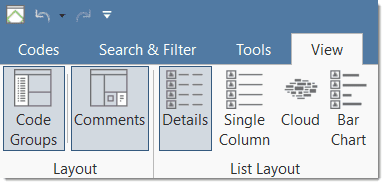
The above image shows the default options: You see the code groups on the left-hand side, the comment field below the code list, and the code list in 'Details' view.
Code Cloud
Click on the button Cloud to visualize your code list in form of a word cloud:
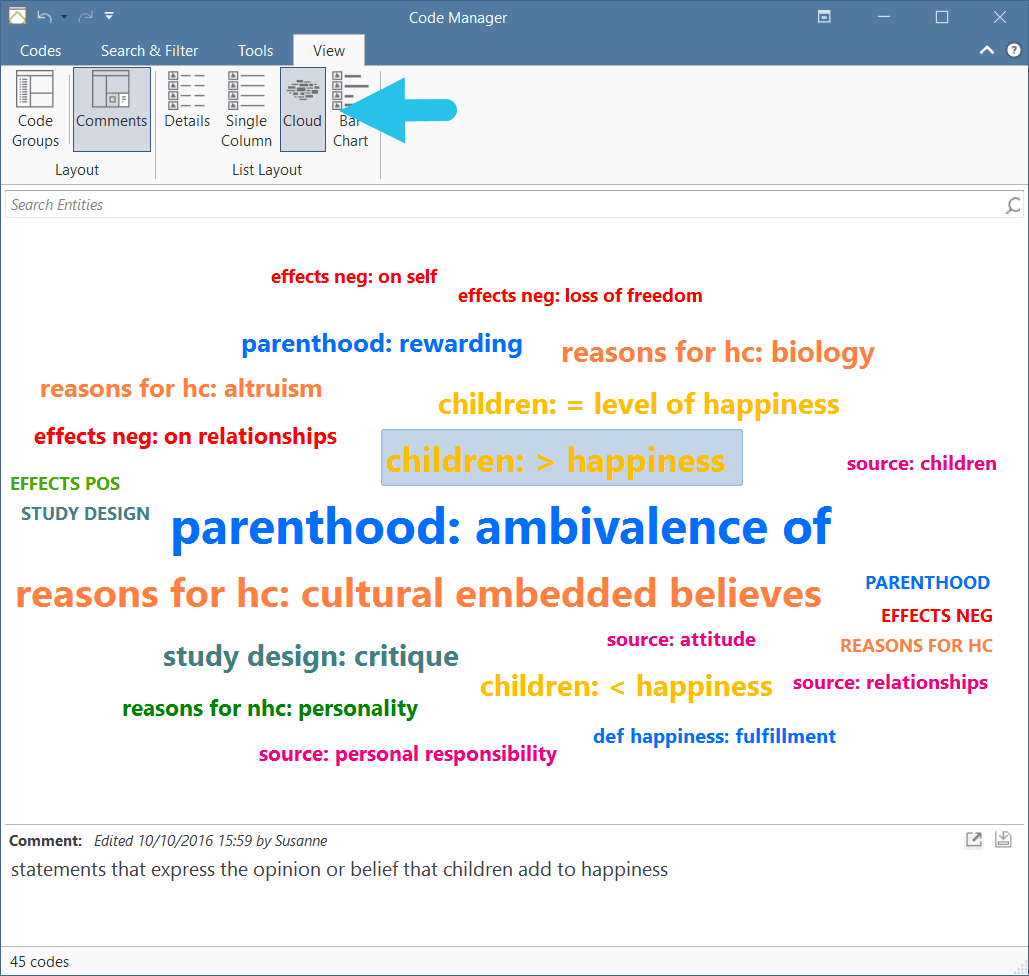
If you right-click on a code, the same context menu opens as in 'Details' view. Thus, in the cloud view you can start the same actions as in the regular view. You can for instance rename codes, split or merge codes, or open a network on one or multiple codes.
Code List as Bar Chart
Select Bar Chart to visualize your code list in form of a bar chart:
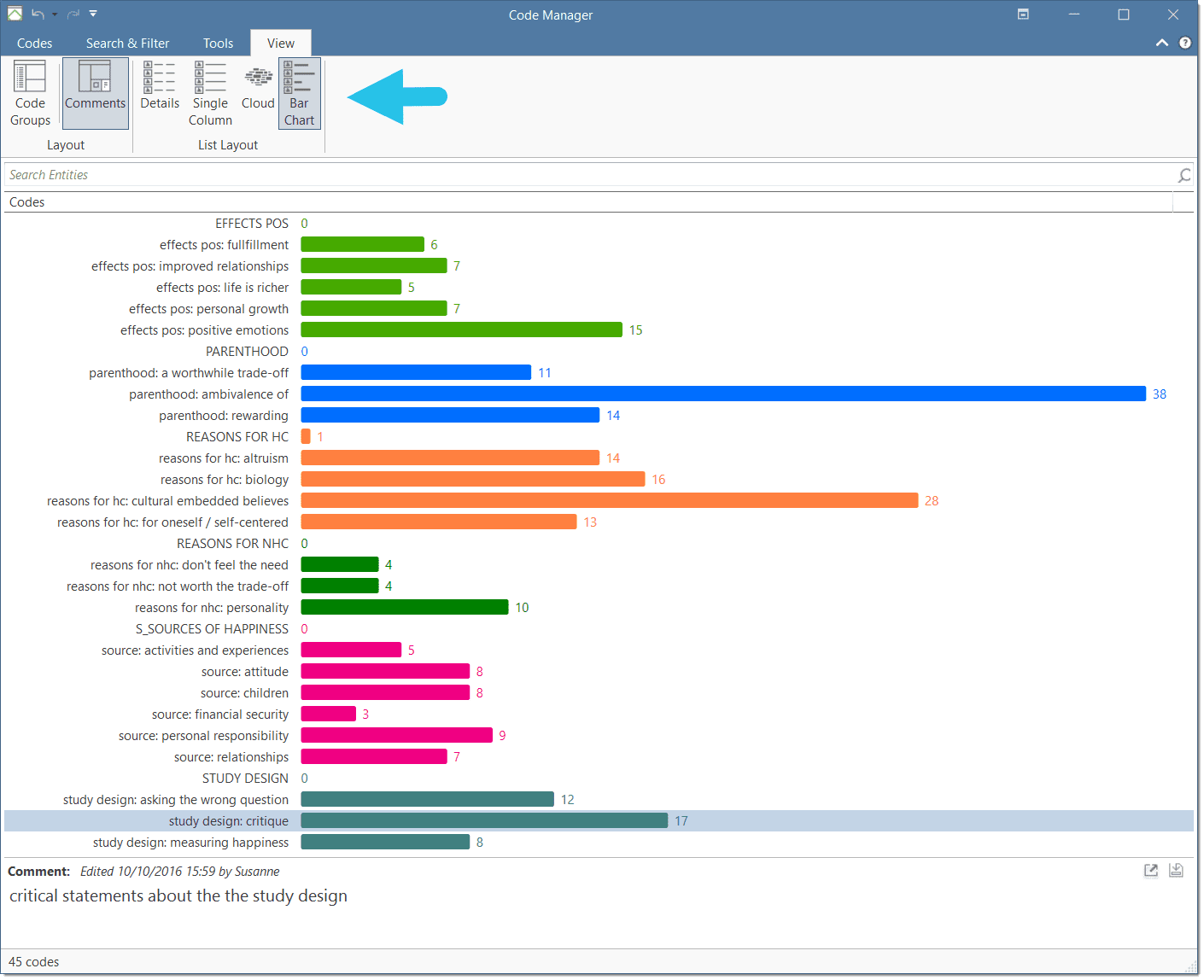
The codes in the bar chart view also have a context menu. Thus, also from here, you can start the same actions as in standard view. Select multiple codes if you want to merge codes.
Relation Manager
The Relation Manager is used to review the properties of existing relations, to edit existing relations, or to create new relations. You can switch between relations for code-code links and relations for hyperlinks. As the column information and the ribbon options are the same for both, below you find only one description. For further information see Working With Networks.
You can access the Relation Manager from within networks or via the drop-down option of the Links button in the Home ribbon.
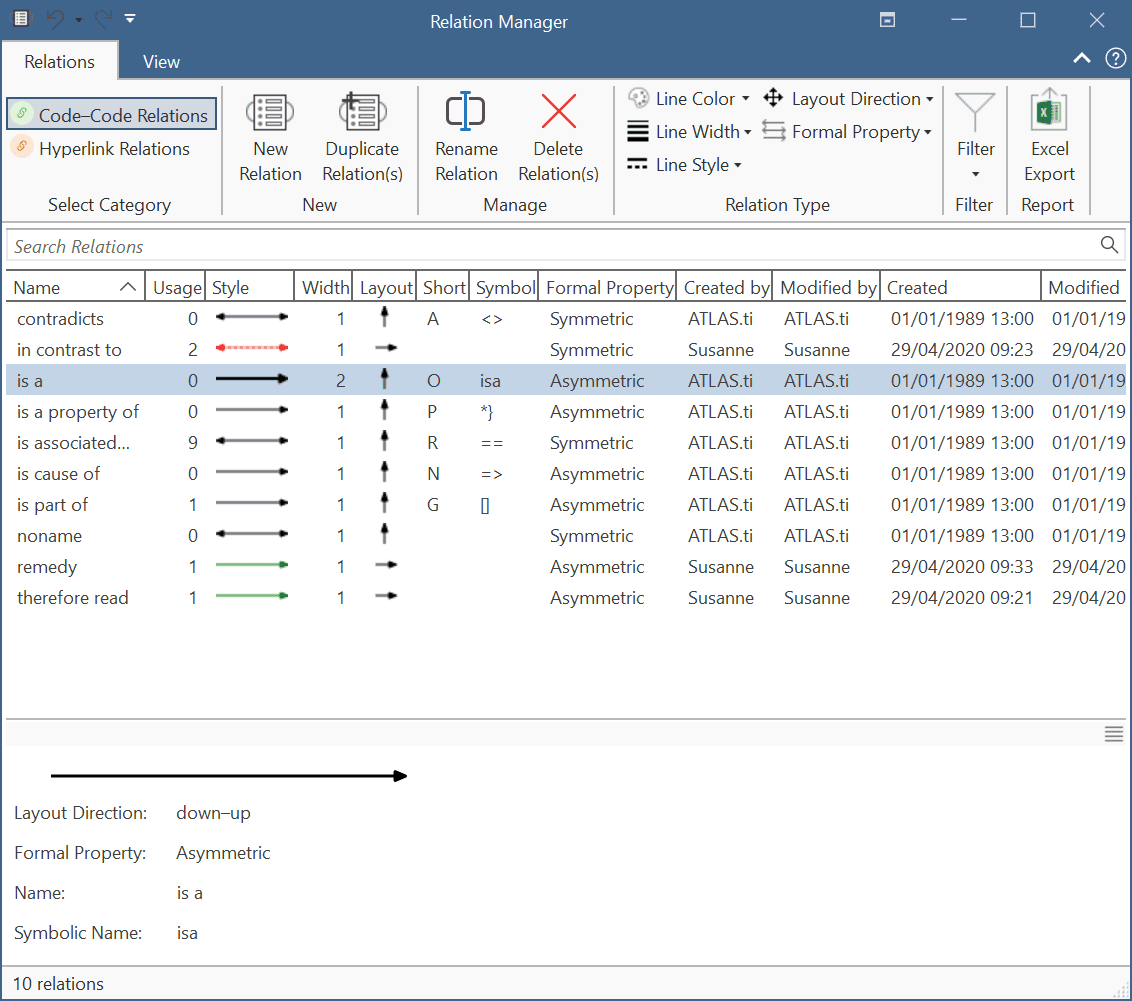
Usage: Number of times it is used in the project.
Style: Preview of line: direction, color, width and property (directed, non-directed)
Layout: Automatic layout direction if you open a network on an entity.
Short: Short name as an alternative to the full name. You can either display full names, short names or the symbolic name for all relations in a network.
Symbol: Symbolic name as an alternative to the full name. You can either display full names, short names or the symbolic name for all relations in a network.
Formal Property: The formal property of a relation: symmetric or asymmetric. See About Relations.
Relation Manager Ribbon

From left to right:
New Relation: Select to create a new relation.
Duplicate Relation(s): Duplicate a relation, e.g., if you want to create a new relation based on an already existing relation with a few modifications.
Rename Relation: Select a relation and rename it.
Delete Relation(s): Select on or more relations that you want to delete.
Line Color: Select the line color.
Line Width: Select the line width.
Line Style: Select the line style(solid or dashed).
Layout Direction: Select the layout direction. If you open an ad-hoc network, the layout directions are used to position the nodes in the network.
Formal Property: Select the property for the relation. Options are: symmetric (non-directed) and asymmetric (directed). This is further explained in the section About Relation
Filter: You can filter relations based on the following options: created today, created this week, created by yourself, or all relations that have a comment. An additional option is to invert the filter.
Excel Export: You can export the information you see in the manager as Excel table.
View Tab
As the View tab is the same in all manager, it has been described here Entity Manager.
Link Manager
The Links Manager lists all existing code-code links and all existing hyperlinks (links between two quotations). It is frequently used to review, modify or comment these links. You can switch to view the list of Code-Code Links and the list of Hyperlinks.
Link Manager Columns for Code-Code Links
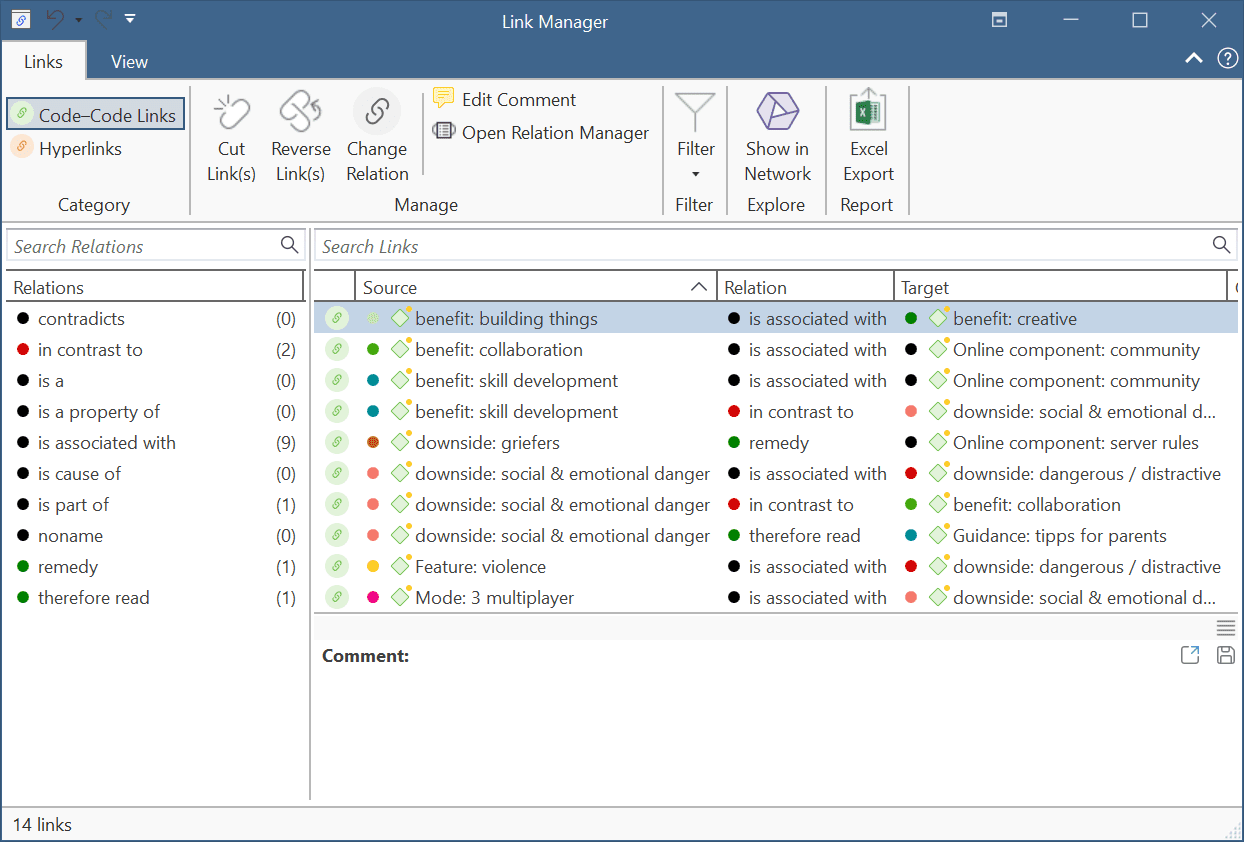
The information provided for each code-code link consists of:
Source: The start position of a link. This is relevant for directed (asymmetric and transitive) links.
Relation: Relations can be used to name a link. This is possible for code-code links and for links between quotations (hyperlinks). See the section on Working with Networks for more detail.
Target: The end position of a link.
Created by: The name of the user who created the link.
Modified by: The name of the user modifying the link.
Created / Modified: Date and time when a link was created and modified.
In the side panel on the left-hand side you see the list of all available relations and how often they have been used (number in parentheses). Click on one or more relations in the side panel filter the list of links.
Link Manager Columns for Hyperlinks
The information provided for each hyperlink consists of:
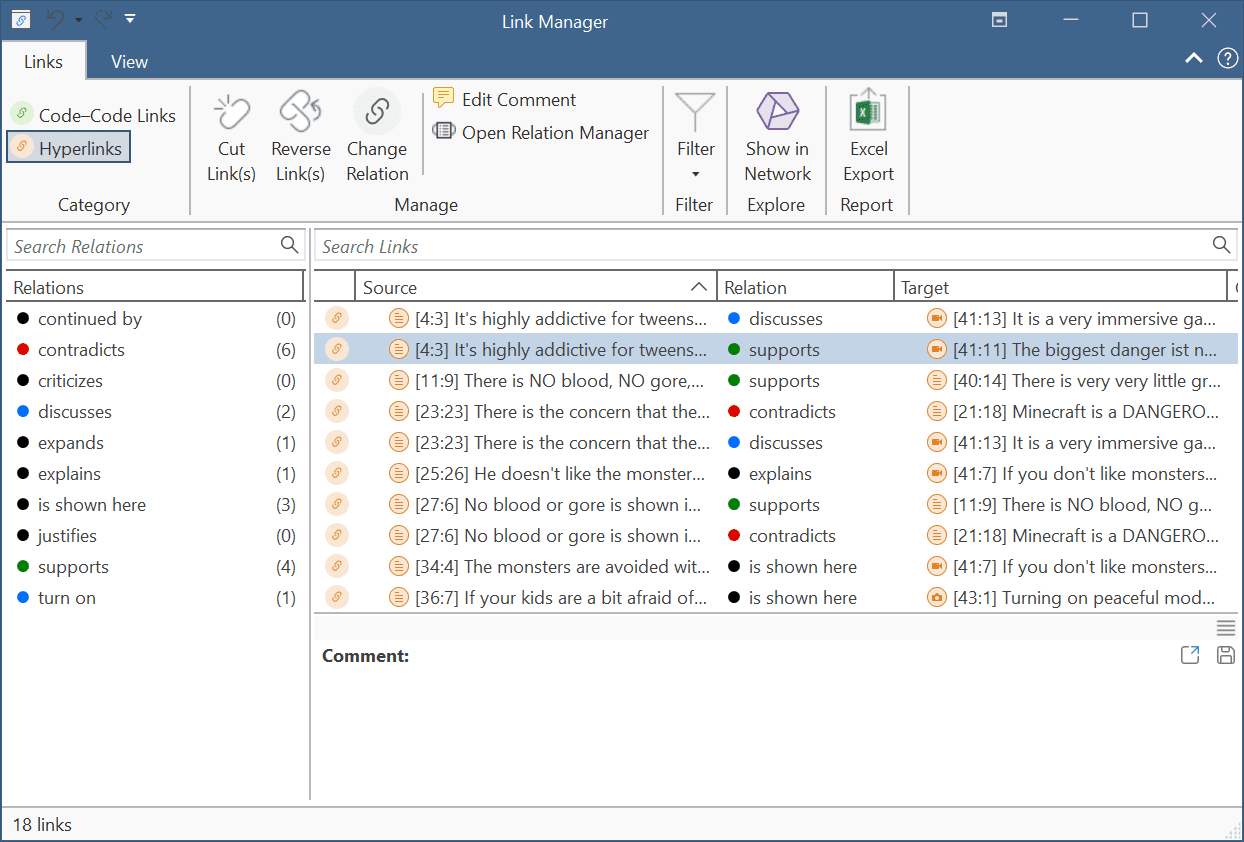
Source: The start position of a hyperlink. This is relevant for directed (asymmetric and transitive) links.
Relation: Relations can be used to name a hyperlink. See the section on Working with Hyperlinks for more detail.
Target: The end position of a hyperlink.
Created By: The name of the user who created the hyperlink.
Modified By: The name of the user modifying the hyperlink.
Created / Modified: Date and time when a hyperlink was created and modified.
In the side panel on the left-hand side you see the list of all available relations for hyperlinks and how often they have been used (i.e., number in parentheses). If you click on one or more relations, all hyperlinks will be filtered by the selected relations.
Link Manager Ribbon

The ribbon is the same for Code-Code and hyperlinks.
From left to right:
Cut Link(s): Cutting the link between selected codes or quotations.
Flip Link(s): Change source and target of selected link.
Change Relation: Change the relation of a selected link.
Edit Comment: Open a text editor for writing or editing a comment for a selected link.
Open Relation Manager; You can access the Relation Manager from here, if you want to create or modify a relation. See Creating New Relations.
Filter: You can filter links by selecting a relation in the filter area on the left. The Filter button in the ribbon offers some additional options: you can invert the filter, or filter by links created today, created this week, created by yourself, or by all links that have a comment.
Open Network: Open a network on the selected link(s). See Open ad-hoc Network.
Excel Export: You can export the information you see in the manager as Excel table.
View Tab
As the view tab is the same in all manager, it is discussed here: Entity Manager.
Memo Manager
The Memo Manager is used to keep track of your writing. You can create, read and review, comment, sort and organize, and group your memos. Further options are to view a memo and its connection in a network, or to turn a memo into a document for further analysis.
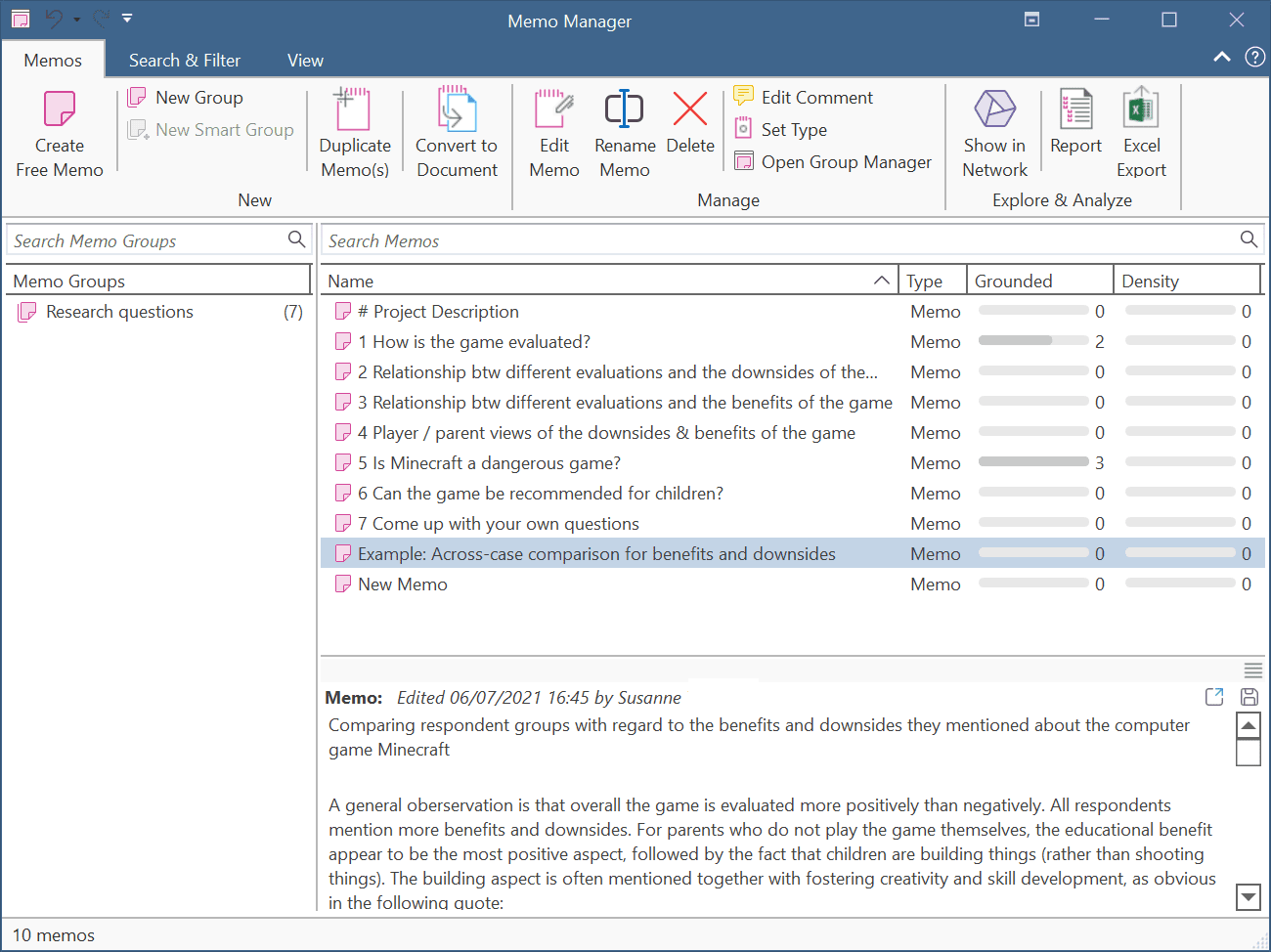 Groundedness: Number of quotations to which a memo is connected.
Groundedness: Number of quotations to which a memo is connected.
Density: Number of codes and other memos to which the memo is connected.
Double-click opens the memo editor as floating window. This window can be docked into the currently active region.
Ctr + Double-click opens the list of quotations that are linked to a memo.
Drag & Drop
You can attach a memo to a quotation by dragging it onto the quotation in the document or the margin area.
A memo can also be dragged to a quotation, code or memo in the Project Explorer or any other list. Vice versa, you can also drag quotations, codes or memos from any list or from the margin area to a memo to link it.
Filter
Click on one or more memo groups in the filter area on the left to set a local filter. This means only the items in the manager are filtered.
Status Bar: The blue status bar at the bottom shows how many memos there are in the project.
Memo Manager Ribbon

From left to right:
Create Free Memo: Create a new memo.
New Group: Create a new memo group based on the selection you have made.
Create Smart Group: Smart Groups are a combination of existing groups using Boolean operators. For further information see Working with Smart Groups
Duplicate Memo(s): Duplicate an existing memo. Maybe it became to long, and you want to split it into two memos.
Convert to Document: If you want to code a memo, or create quotations to hyperlink selected passages from a memo to other data segments, you can convert a memo into a project document.
Edit Memo: Open text pane for writing the contents of a memo in a full-fledged text editor.
Rename Memo: Change the name of a selected memo.
Delete Memo(s): Delete selected memo(s).
Edit Comment: Open a text editor for writing or editing a comment for a selected memo. See Working With Comments And Memos.
Set Type: The default memo type is "memo". This can be changed to a user defined type. Memos-types can be used to sort and organize memos.
Open Group Manager: Open the Memo Group Manager. See Working With Groups for more detail.
Open Network: Open a network on the selected memo(s) that show all other entities the memo is linked to. See Opening an ad hoc Network.
Report / Excel Export: Reports can be created as text file (Word, PDF), or in Excel format. All reports are customizable. See Creating Reports.
Search & Filter / View Tab
As these tabs are the same in all manager, they are discussed here: Entity Manager.
Network Manager
The Network Manager is frequently used to create and open networks, to rename, comment and group them.
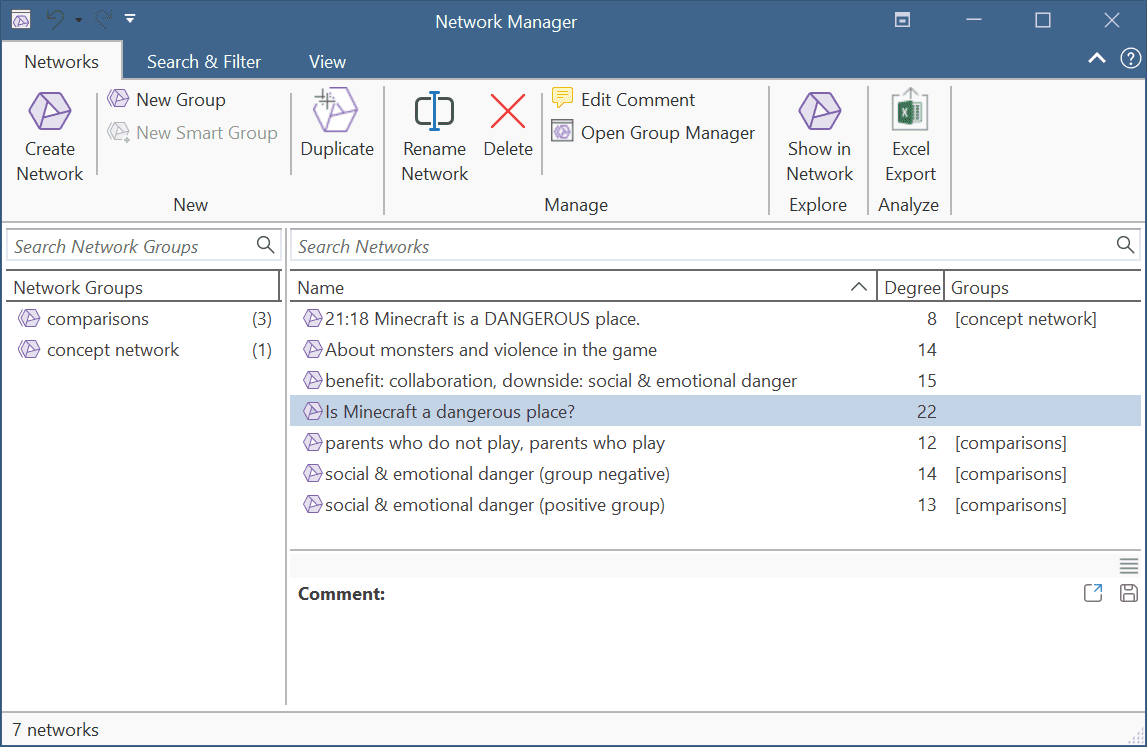
Degree: Number of nodes in a network.
Double-click opens the network editor as floating window. This window can be docked into the currently active region.
Drag & Drop: You can add a network as node to a network editor, or assign selected networks to a group via drag & drop.
Filter: Click on one or more network groups in the filter area on the left to set a local filter. This means only the items in the manager are filtered.
Status Bar: The Status Bar shows how many networks there are in the project.
Network Manager Ribbon

From right to left:
Create Network: Create a new network.
New Group: Create a new network group based on the selection you have made.
New Smart Group: Smart Groups are a combination of existing network groups using Boolean operators. This option is only available to offer consistent choices in all managers. You may not even feel the need to create network groups, let alone combining them using smart groups :-).
Duplicate: Duplicates the selected network. This option is useful it you want to create a spin-off of an already existing network where parts of the existing network is still relevant, and you want to build on it further.
Rename Network: Change the name of an existing network.
Delete: Delete selected network(s).
Edit Comment: Open a text pane for writing or editing a comment for a network in a full-fledged text editor.
Open Group Manager: Open the group manager for networks.
Show in Network: Opens the network
Excel Export: Exports the information displayed in the Network Manager.
Search & Filter / View Tab
As these tabs are the same in all manager, they are discussed here: Entity Manager.
Supported File Formats
In principle, most textual, graphical, and multimedia formats are supported by ATLAS.ti. For some formats, their suitability depends on the state of your Windows system. Before deciding to use an exotic data format, you should check if this format is available and if it is sufficiently supported by your Windows system.
Textual Documents
The following file formats are supported:
| Format | File Type |
|---|---|
| MS Word | .doc; .docx; .rtf |
| Open Office | .odt |
| HyperText Markup Language | .htm; .html |
| Plain text | .txt |
| other | .ooxml |
Text documents can be edited in ATLAS.ti. This is useful to correct transcription errors, to change formatting, or to add missing information. When adding an empty text document to an ATLAS.ti project, you can also transcribe your data in ATLAS.ti. We however recommend using a dedicated transcription tool or use automated transcriptions. You can add transcripts with timestamps and synchronize them with the original audio or video file. For this you use Multimedia Transcripts.
Transcripts
ATLAS.ti supports virtually all transcription apps and services, and also allows you to transcribe within ATLAS.ti, or import transcripts that you wrote yourself. See Transcription for more details.
PDF files (Text and Graphic)
PDF files are perfect if you need the original layout. When PDF was invented, its goal was to preserve the same layout for onscreen display and in print.
If the PDF file has annotations, they are displayed in ATLAS.ti. However, they cannot be edited.
When preparing PDFs, you need to pay attention that you prepare a text PDF file and not a graphic PDF. If you do the latter, then ATLAS.ti treats it as a graphic file, and you cannot search it or retrieve text.
When scanning a text from paper, you need to use character recognition software (OCR, frequently provided with your scanner) in order to create a text PDF file. Another option is to apply character recognition in your PDF reader/writer software.
When you retrieve text from a coded PDF segment the output will be rich text. Thus, you may lose the original layout. This is due to the nature of PDF as mentioned above. It is a layout format and not meant for text processing.
PDF with annotations / Word files with comments
If you have made annotations in Word or PDF files, ATLAS.ti will turn the highlighted area into a quotation. The text of the annotation will be added as a comment to the quotation.
If you added handwritten drawings or comments, those will be imported as image quotations (in ATLAS.ti Windows currently only supported for PDF documents).
-
Imported comments from Word will be coded with the code Imported comments.
-
Imported comments from PDF documents will be coded with the code Imported annotations.
PDF documents with annotations imported in ATLAS.ti
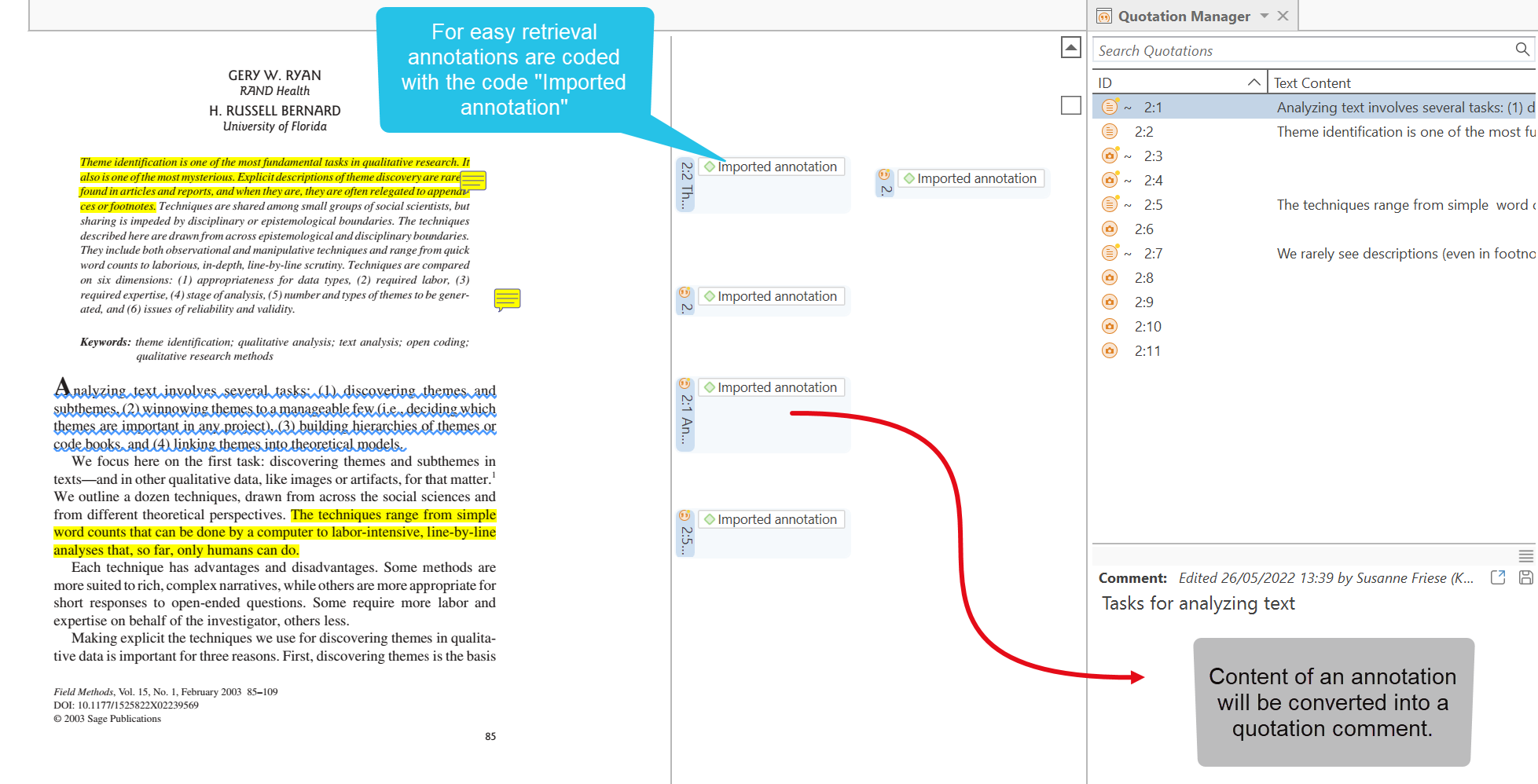
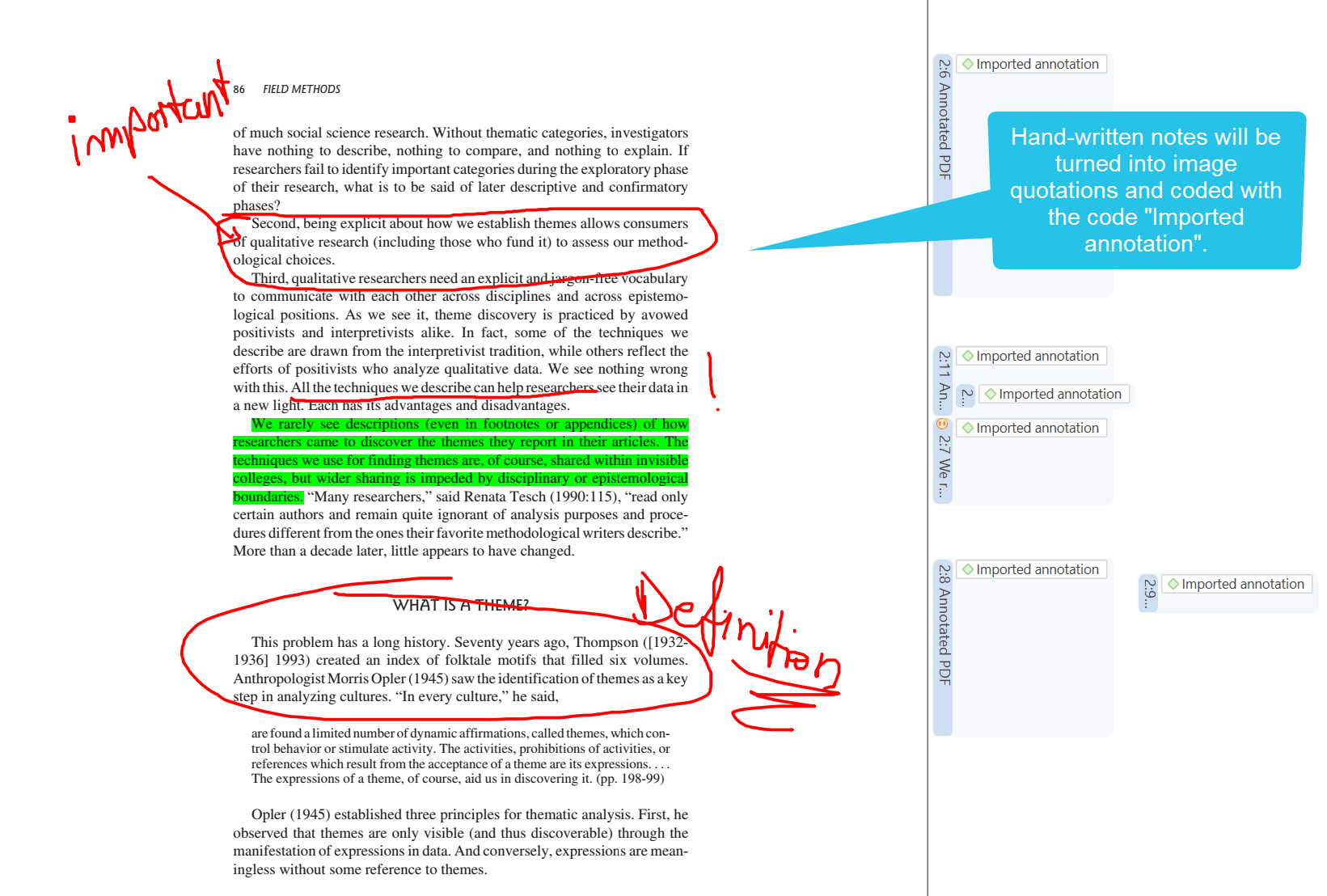
Word document with comments
Perhaps you first read a transcript in Word and write initial coding ideas as comments in the margin. If you add this transcript to ATLAS.ti, all commented segments will already be marked as quotations.
Open the Quotation Manager alongside the document, so you can read the comments you wrote. Based on your comments you can begin with your coding work. Go through each quotation, open the coding tool and create new codes, or apply existing ones.
Another option is to prepare an Excel table based on the comments you wrote and import it as your initial code list. See Immporting a codebook.
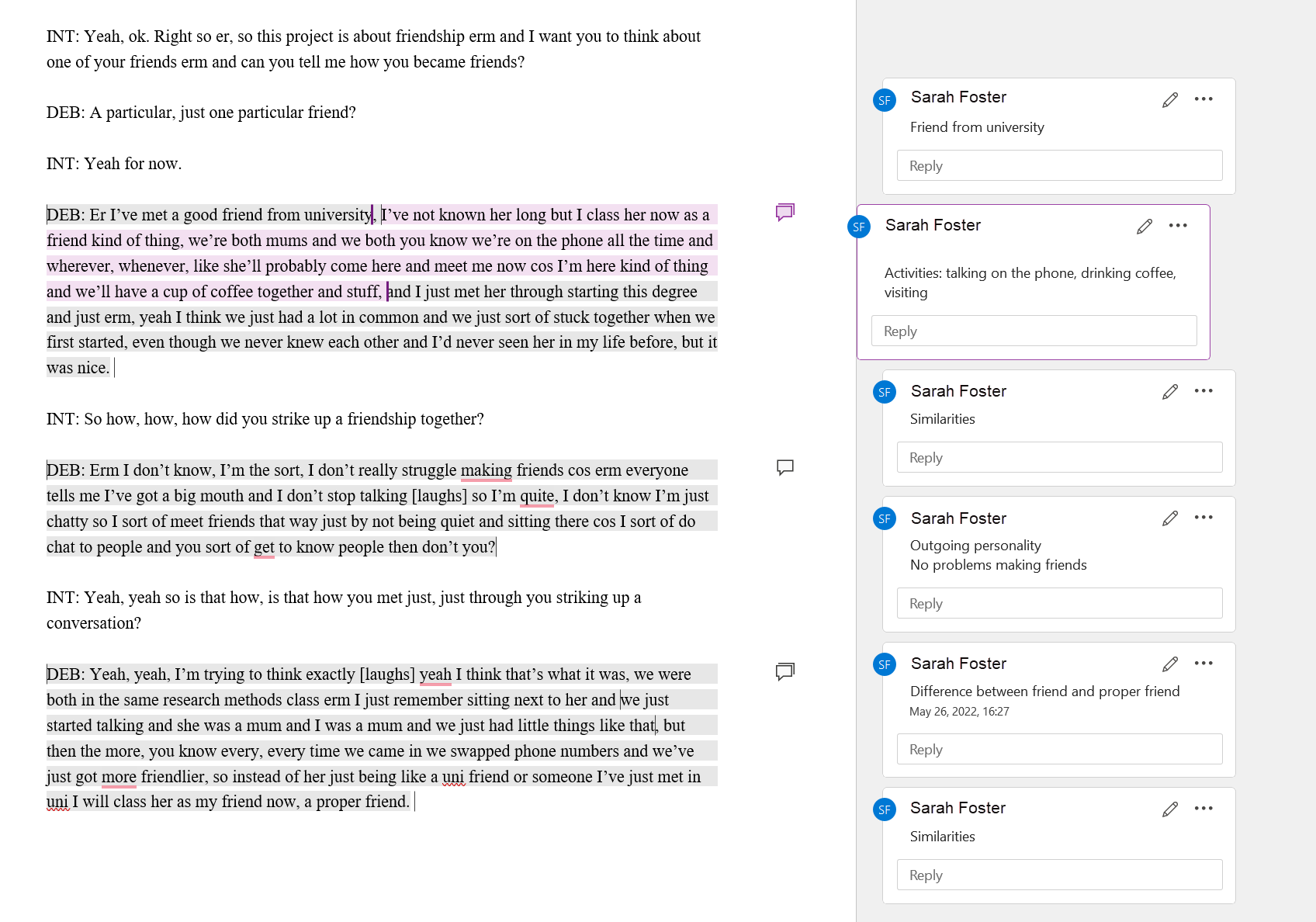
In the image below you see, how it looks like when this document is imported in ATLAS.ti:
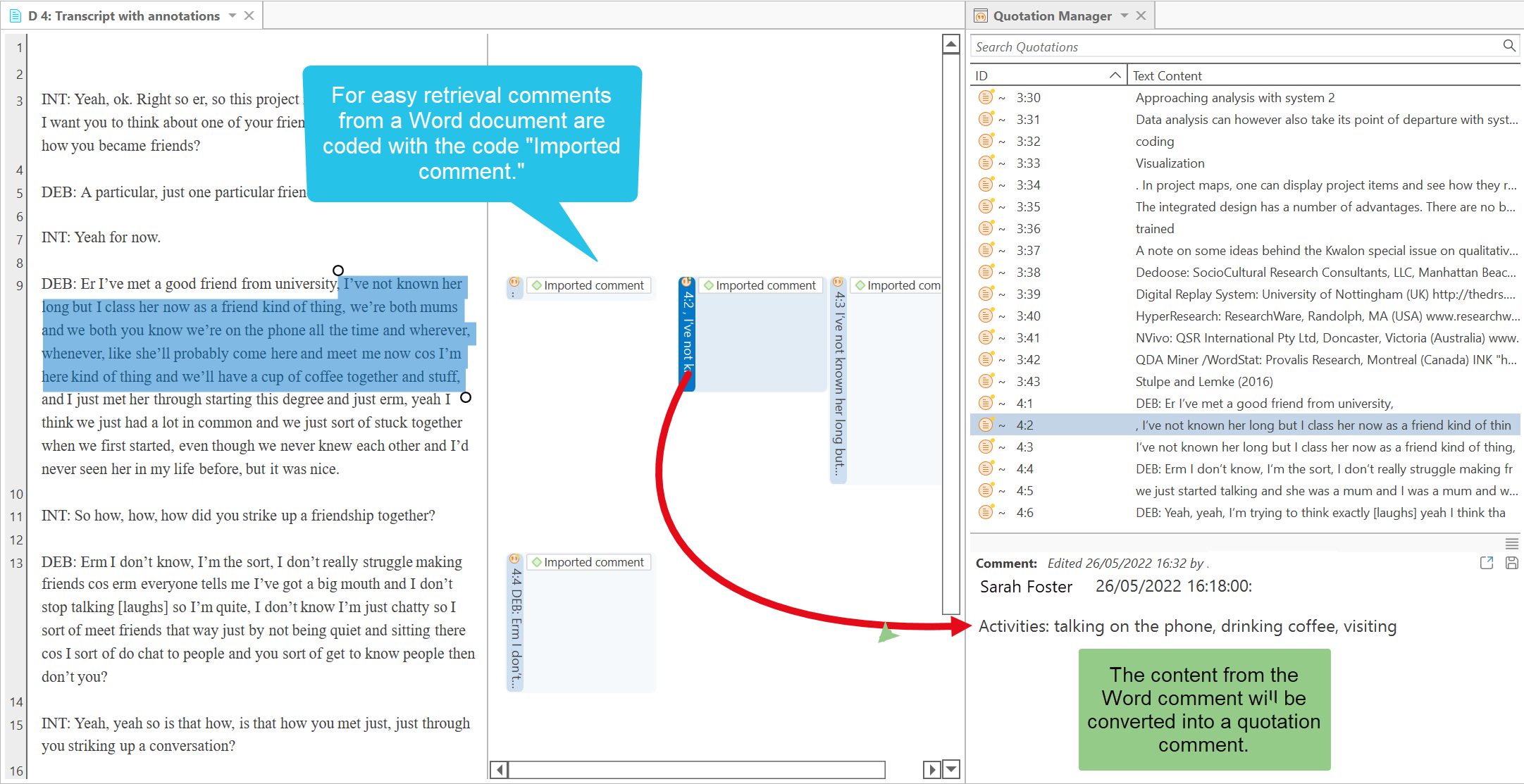
PDF files with bookmarks
If your PDF documents have bookmarks, you can also use them in ATLAS.ti.
Load a PDF document that has bookmarks.
In the contextual ribbon for Documents, click on View and activate Show Bookmarks:

You can use the bookmarks to navigate through your PDF document:
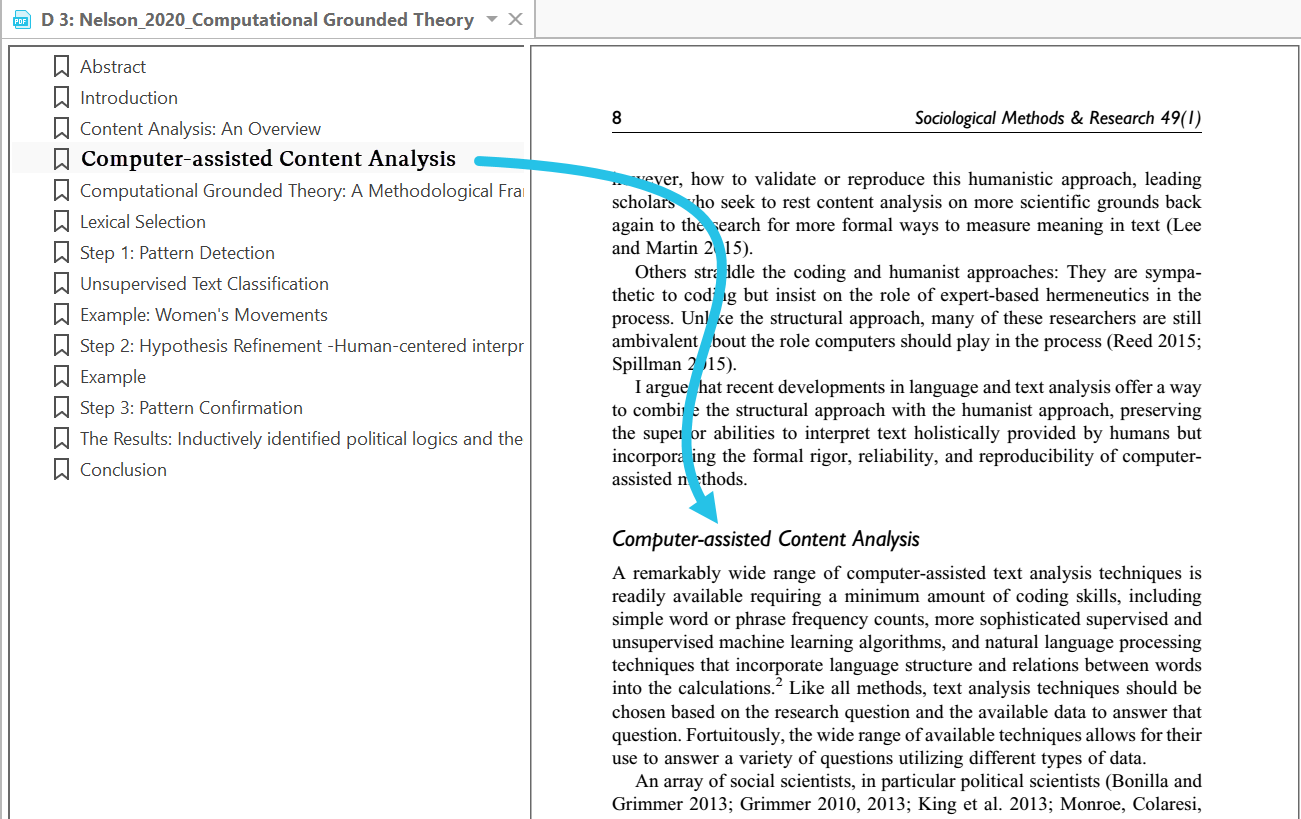
PDF files (eBooks, PowerPoint, Spreadsheets, Visio, Draw)
The following file types will be transformed into PDF files, when adding them to an ATLAS.ti project:
- Ebooks (.mobi)
- Excel (.xls and .xlsx) and Libre Office Calc (.ods) spreadsheets
- Powerpoint (.ppt and .pptx)
- Libre Office Impress (.odp) presentations
- Visio (.vsd and .vsdx) and Libre Office Draw (.odg) documents
Images
Supported graphic file formats are: bmp, gif, jpeg, jpg, png, tif and tiff.
Size recommendation: Digital cameras and scanners often create images with a resolution that significantly exceeds the resolution of your screen. When preparing a graphic file for use with ATLAS.ti, use image-processing software to reduce the size so that the graphics are comfortably displayed on your computer screen. ATLAS.ti does resize the images if they are too big. But this requires additional computer resources and unnecessarily uses space on your computer hard disk.
To resize and image manually, you can use the zoom function via the mouse wheel or the zoom button in ATLAS.ti.
Audio- and Video Documents
Supported audio file formats are: aac, m4a, mp3, mp4, wav. Supported video file formats are; 3g2, 3gp, 3gp2, 3gpp, asf, avi, m4v, mov, mp4, wmv For audio files, our recommendation is to use *.mp3 files with AAC audio, and for video files *.mp4 file with AAC audio and H.264 video. These can be played both in the Windows and in the Mac version. More information is available here. As video files can be quite sizable, we recommend linking video files to an ATLAS.ti projects rather than to import them. See Adding Documents for further information.
Geo Documents
When you want to work with Geo data, you only need to add a new Geo Document to your ATLAS.ti project. This opens an Open Street world map. When you click on the option Query Address, you can navigate to a specific region or location on the map. For more information, see Working With Geo Docs.
Social Network Comments
ATLAS.ti imports Excel files generated by exportcomments.com. You can use the service for free to export up to 100 comments per link. For a small fee, you can use the service for three days to download the data you need. This also allows you to export nested comments.
Supported social networks are:
- YouTube
- TikTok
- VK
- Twitch
- Discord
For further information see Importing Social Network Data.
Survey Data
The survey import option allows you to import data via an Excel spreadsheet (.xls or .xlsx files). Its main purpose is to support the analysis of open-ended questions. However, this option can also be used for other case-based data that can easily be prepared in form of an Excel table.
In addition to the answers to open-ended questions, data attributes (variables) can also be imported. These will be turned into document groups in ATLAS.ti. For more information, see Working With Survey Data.
Reference Manager Data
In order to support doing a Literature Review with ATLAS.ti, you can import articles from reference managers. The requirement is that you are using a reference manager that can export data as Endnote XML file like Endnote, Mendeley, Zotero, or Reference Manager.
If your reference manager cannot export data in Endnote xml format, you can export data in RIS or BIB format and use the free version of Mendeley or Zotero to produce the xml output for ATLAS.ti.
See Working With Reference Manager Data.
You can collect data from Twitter searching for keywords, hashtags, users, etc. ATLAS.ti can collect tweets that are not older than one week !
You need to sign in with your own Twitter account to import twitter data to ATLAS.ti. See Working With Twitter Data.
Evernote
If you collect and store you data using Evernote, you can directly import files and folders from Evernote. See Bring out the best in Evernote with ATLAS.ti Windows.
Supported formats are:
| Evernote Export | File Type |
|---|---|
| Evernote 2.x database | .enb |
| Evernote exported XML data | .enex |
| Evernote database | .exb |
| Evernote data | .reco |
| Evernote handwritten notes and sketches | .top |
| Evernote for Google Android note file | .enml |
Adding Documents
Video Tutorial: Creating a project and adding data.
What happens when you add documents to a project
All documents that you add to a project are copied, and the copies become internal ATLAS.ti files. This means, strictly speaking, that ATLAS.ti no longer needs the original files. However, we strongly recommend that you keep a backup copy of your original source files.
When you add documents to a project, they are stamped with a unique ID. This ID allows ATLAS.ti to detect if documents are the same when merging different projects.
What happens when you add documents to a project
All documents that you add to a project are copied, and the copies become internal ATLAS.ti files. This means, strictly speaking, that ATLAS.ti no longer needs the original files. However, we strongly recommend that you keep a backup copy of your original source files.
As audio and video files can be quite sizable, you have the option to create an external reference to the files. This means the multimedia documents remain at their original location and are accessed from there. Preferably, these files should not be moved to a different location. If the files need to be moved, you need to re-link the files to your project. ATLAS.ti will alert you, if there is an issue, and a file can no longer be accessed.
Important for team projects
When you work in a team and want to work on the same documents, it is important that one person is setting up the project and adds all documents and codes that should be shared. The reason for this is that all all entities are stamped with a unique ID when they are created. This ID allows ATLAS.ti to detect if entities are the same when merging projects.
If the same documents (or codes) are added on different computers to different projects, then they all have different IDs. Rather than being merged when you merge all projects, they are added. Thus, the merged project contains duplicates. You can merge duplicated codes yourself, but you cannot merge duplicated documents! If this happens, you need to manually transfer all coding that has been done from the duplicated documents. See Team Work for further information.
How to add documents
Click on the Add Documents button in the Home tab, click on the drop-down arrow, or drag- and-drop them from the Windows Explorer either onto the document display area or the ribbon.
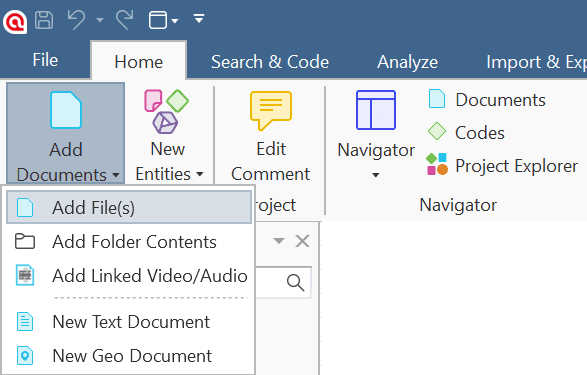
Click on "Add Documents" to select individual files. If you want to add entire folders or link larger multimedia files (audio / video) to your project, click on the dialog box launcher and select the appropriate option.
All added or linked documents are numbered consecutively starting with D1, D2, D3 and so on.
Linking video files
As video files can be quite sizable, you have the option to link them to a project instead of adding them. This means they remain at their original location and are accessed from there. Preferably, these files should not be moved to a different location.
If the files need to be moved, you need to re-link the files to your project. ATLAS.ti will alert you, if there is an issue, and a file can no longer be accessed. You find a Repair Link option in the Document Manager under the Document Manager > Tools Tab.

You can of course also import iranscripts; see Importing Transcripts. Or prepare your own transcripts.
Sort Order of Documents
The default sort order is by name in alphabetical order. You cannot change the order of the documents by dragging them to a different position. However, it is possible to change the order of the documents by renaming and then renumbering them. See User-defined document sort order.
Size Restrictions
Theoretically, size restrictions do not play a major role due to the way ATLAS.ti handles documents. However, you should bear in mind that your computer's processing speed and storage capacity may affect the performance.
Excessively large documents can be uncomfortable to work with, even when you have an excellently equipped computer.
For textual documents, the number and size of embedded objects may cause extraordinarily long load times. There is a high likelihood that if a textual document loads slowly in ATLAS.ti, it would also load slowly in Word or WordPad.
For very long texts or multimedia files, scrolling to exact positions can be cumbersome.
Please keep those issues in mind when preparing your files.
A Word about "Big Data"
Please keep in mind that the focus of ATLAS.ti is to support qualitative data analysis and to a lesser extent the analysis of qualitative data.
Big data is a buzz word nowadays, and a lot of big data often comes as text or images, hence could be considered qualitative. ATLAS.ti, however, is not suited for true big data analysis, which is not the same as qualitative data analysis.
As point of orientation, coding can be supported using the auto coding feature. However, you still need to read and correct the coding, and most coding in ATLAS.ti is done while the researcher reads the data and creates or selects and applies a code that fits.
A project is too large if you have so much data that you need to rely on a machine to do all the coding for you, and you cannot read what has been coded yourself. While we are adding natural language processing tools to ATLAS.ti as well as continuously improving performance for large projects, these tools are designed to help you as a researcher, not replace the human. While it may sometimes seem otherwise, computers still can't think.
Transcription
You can prepare your own transcripts in ATLAS.ti, or import transcripts that have been created elsewhere.
ATLAS.ti's allows you to incorporate transcripts from virtually any transcript service or app. Whether you're using a commercial transcription service, doing manual translation yourself, or employing an automated speech-to-text system, ATLAS.ti can import the data.
Supported formats are VTT, SRT, TXT, DOCX, and RTF.
ATLAS.ti can automatically detect and code speakers in VTT files that include speaker information.
Some of the services and apps that can export compatible formats:
- AmberScript
- Descript
- Easytranscript
- ELAN
- eStream
- Express Scribe
- f4 & f5 transcript
- Go Transcribe
- Happy Scribe
- HyperTRANSCRIBE
- Inqscribe
- Microsoft Teams
- oTranscribe
- Otter.ai
- Panopto
- Rev
- Scribie
- Simon Says
- Sonix
- Speechmatics
- Spoken ONLINE
- Temi
- Transana
- Transcribe by Wreally
- TranscribeMe!
- Transcriber Pro
- Transcriva
- Transkripto
- Trint
- Uitgetypt.nl
- Vimeo
- Vocalmatic
- Voicedocs
- WebEx
- YouTube
- Zoom
Supported timestamps for TXT, RTF, and DOCX transcripts
When writing your own transcripts, you can choose to use specialized transcription software (recommended), write the transcript inside ATLAS.ti, or even simply write the software in the text editor or word processor of your choice.
When hand-writing your transcripts, please choose one of the below formats to ensure maximum compatibility with ATLAS.ti.
| Format | Exported by |
|---|---|
| #hh:mm:ss-x# | Easytranscript, f4 & f5transcript |
| [hh:mm:ss] | Transcribe |
| [hh:mm:ss.xx] | HyperTRANSCRIBE, Inqscribe, Transcriva |
| [hh:mm:ss.xxx] | HyperTRANSCRIBE, Inqscribe, Transcriva |
| (h:mm:ss.xx) | Transana |
| hh:mm:ss | Transcriber Pro |
Importing Transcripts
A multimedia transcript in ATLAS.ti consists of two documents: an audio or video file plus an associated transcript.
In the Home ribbon, click on Add Documents, then Import Transcript.
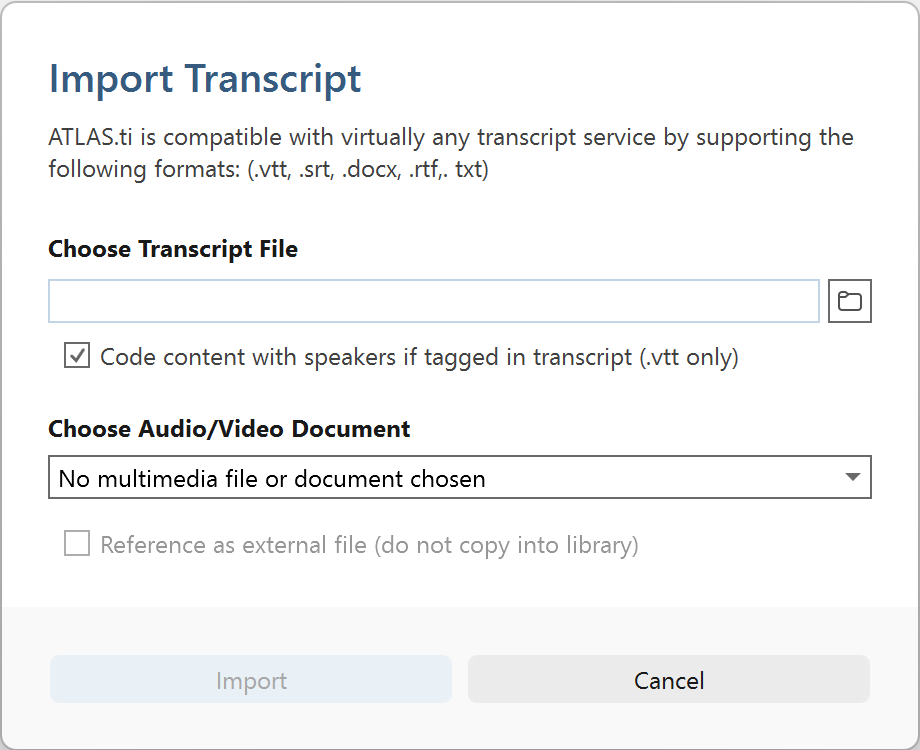
Click the folder button in the top right to choose the file that contains the transcribed text.
Some VTT files contain speaker information. Leave the checkbox "Code content with speakers" checked, and ATLAS.ti will automatically insert speaker names into your text file, and code spoken passages with the appropriate speaker name, if the file contained speaker information.
Click the bottom dropdown to choose the audio or video file. You can either import a file off your computer or associate a multimedia document that is already part of your project.
If you have an audio or video file with the same name as the transcript in the same folder, ATLAS.ti will have automatically filled out the bottom dropdown after you chose the transcript file. You can still click to choose a different file.
Click Import. Done!
See Working with Multimedia Transcripts for next steps.
Preparing your Own Transcript
A multimedia transcript in ATLAS.ti consists of two documents: an audio or video file plus an associated transcript. The first step is to add the audio or video file to a project. Then you can associate one or multiple transcripts with the document.
Step 1 - Add an Audio or Video File
To add an audio or video file: click on the Add Documents button in the Home ribbon; or select the link option from the dropdown menu: Add Documents > Add Linked Video/Audio.
For more information see: Add a multimedia file to your project.
Step 2 - Create a Word file
Create a new document in Word or a text editor of your choice, and save it under a meaningful name like "TR _Tim Miller_m_t_south_58"
(TR = transcript; Tim Miller = interviewee name or pseudonym; m = male; south = from region south; 58 = age 58).
Step 3 - Associate the Word File
Open the multimedia document, select the Tools tab in the toolbar, and from there Import Transcript. Select the document that you have prepared in step 2.
The transcript will be imported into the project and loaded next to the multimedia file, and you see a new entry in the Project Explorer under the Multimedia Transcripts branch.
Step 4 - Begin to transcribe
Click on the Edit button.
inst
Start playback of the multimedia file, and listen to as much as you can remember. Pause the audio or video recording.
Start typing the transcript in the space on the right-hand side.
Repeat.
Click on the Save button in the edit toolbar from time to time. When you close the edit mode without saving, ATLAS.ti will remind you.
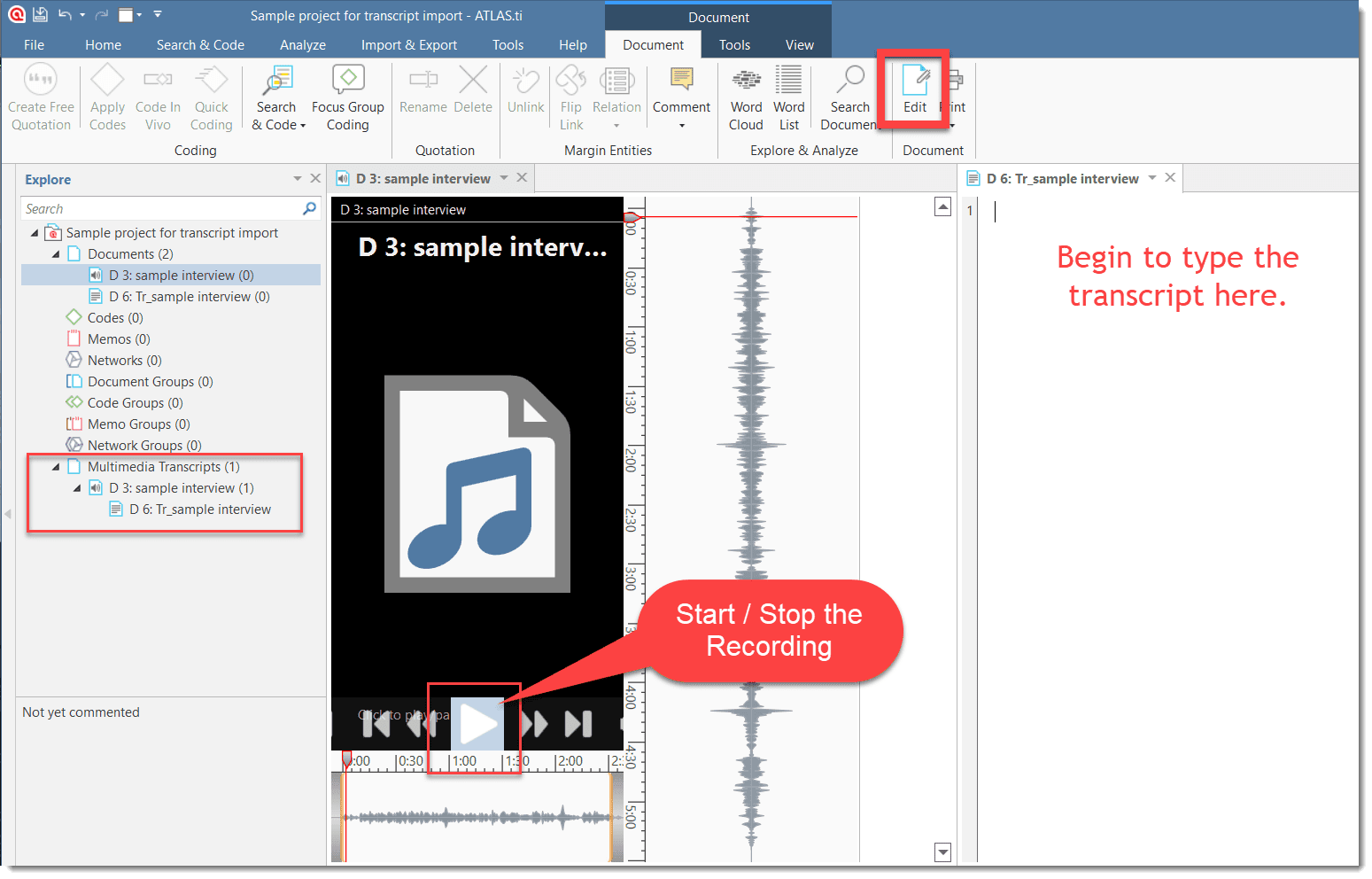
Working with Multimedia Transcripts
A multimedia transcript consists of two documents: an audio or video file + an associated transcript.
Opening Transcripts
In contrast to ordinary documents, transcripts are found at the very bottom of the project explorer on the left-hand side of your main window, in the Multimedia Transcripts section.
Synchronized Scrolling
When opening a multimedia transcript, synchronized scrolling is activated by default. This means when you play the multimedia file, the text segment in the transcript between two timestamps is highlighted while the multimedia file is playing – and when you reposition the text cursor, the multimedia document seeks to the associated time.
Note that positioning will only be as good as your timestamps. Most transcripts won't have timestamps that are good enough for word-accurate synchronization.
If the document does not contain timestamps, ATLAS.ti estimates the synchronization based on the length of the multimedia file and the transcript. You can add time stamps for a better synchronization. See below for further information on how this is done.
Timestamp List
You see a list of time stamps in the audio or video document pane. If you want to see more or less, you can grab the header with your mouse and pull it up or down.
You can quickly navigate through the document by selecting timestamps from this list, and start playback at the appropriate time by double-clicking.
Editing Timestamps
To see the timestamps, click on the Edit Timestamps button in the Document ribbon.
The timestamps are indicated by green markers.
You can modify the position of an existing timestamp, add new ones, or delete timestamps.
Moving a Timestamp
Simply drag the green marker to reposition the timestamp. Note that you cannot reorder timestamps this way, so you can only drag between the surrounding timestamps.
Adding a Timestamp
In the transcript, put the cursor at the position where you want to add the time stamp. In the multimedia document, position the play-head (red line) to the corresponding position. In the toolbar, click Add Timestamp.
Deleting a Timestamp
Select a timestamp in the list, right-click and select Delete.
Deleting an Association
Open the Multimedia Transcripts branch in the Project Explorer, right-click on either transcript or the multimedia file, and select Disconnect.
This does not remove the document from the project. The multimedia file and transcript are still available in the Documents branch, but they are no longer associated.
If you want to remove an associated document from the project, you need to delete the association first.
Working With Reference Manager Data
ATLAS.ti is frequently used for assisting with literature reviews. See for example:
video tutorial Literature Review with ATLAS.ti 22 Windows & Mac
You may have collected lots of articles in a reference manager. Not all of these articles will be relevant for the literature review for a particular research or paper you are writing. Thus, create a collection of 50 to 200 articles in your reference manager for further coding and analysis in ATLAS.ti.
You can import EndNote XML files or bibtex files. This should allow you to import data from almost all reference managers.
Importing Reference Manager Data
To start importing the file into ATLAS.ti, select the Import & Export tab and the button Reference Manager.
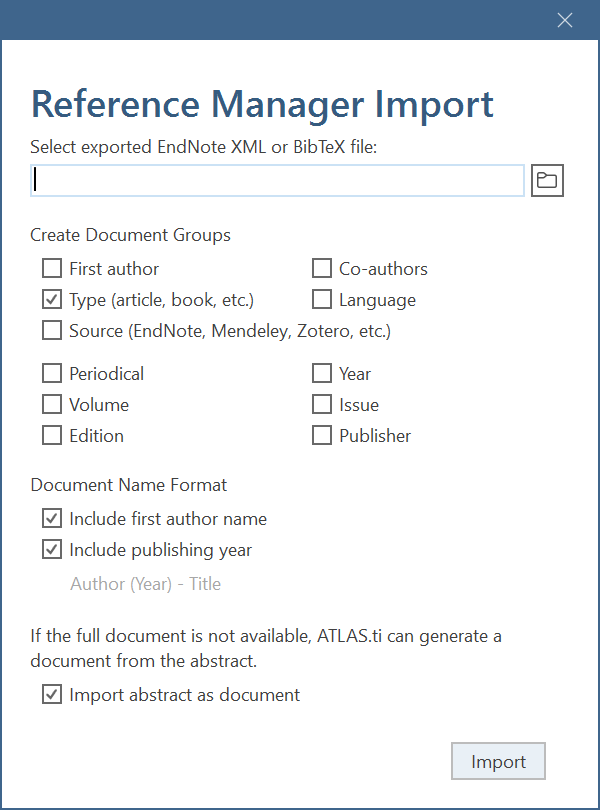
If your reference manager does not export the PDF files into a separate folder, make sure that the PDF files are stored at the locations indicated in the XML or bibtex files. Usually this will be the library of your reference manager.
ATLAS.ti can create document groups for you based on the following metadata:
- First authors
- Co-authors
- Publication type (journal article, book, book chapter, etc.)
- Language
- Source - If you import documents from more than one reference manager, it is useful to group documents by source, so that you know where they were coming from.
- Periodical
- Year
- Volume
- Issue
- Edition
- Publisher
Document name format
The default name for the document in ATLAS.ti is the name of the document as it used in the Reference Manager. For easier sorting and organization, you can choose to add the name of the first author, and the publishing year to the document name (recommended).
If the full document is not available
If only the document abstract is available and not the full document, you can select to import the abstract as a document.
If you have written a note about the document in your Reference Manager, this note will be imported as document comment.
Make your selections.
Click on the file loader icon and select the XML or bibtex file that you have exported from your reference manager.
Inspecting the Imported Documents
Open the Document Manager
The imported documents are sorted by author and year in alphabetical order, if you selected this option. Further, document groups are created from all options that were selected.
The text entered as note in the reference manager is imported as document comment. If the URL of a document is available, it will also be added into the comment field.
Importing Social Network Comments
Video Tutorial: Importing social network comment. Social networks provide a powerful reflection of the structure and dynamics of the modern society. Often it is not a single tweet or post that is interesting, but the reactions and interactions of the social network users. There are many applications for analysing user comments such as: social movements, brand communities, marketing campaigns, political discourse, discourses on currently relevant topics within a given community or society, understanding your audience, or even shit-storms.
ATLAS.ti imports Excel files generated by exportcomments.com. You can use the service for free to export up to 100 comments per link. For a small fee, you can use the service for three days to download the data you need. This also allows you to export nested comments.
Supported social networks are:
- YouTube
- TikTok
- VK
- Twitch
- Discord
Look for a post on social networks whose comments you want to analyse. Copy the URL.
Go to exportcomments.com, enter the URL and download the comments.
Go to ATLAS.ti and select the Import & Export tab and from there the Social Network Comments button.
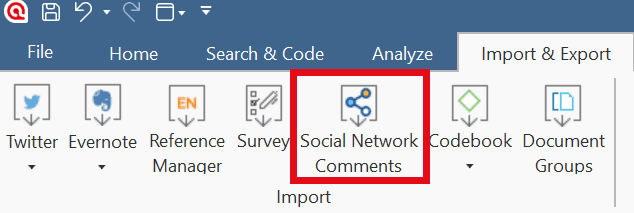
Select the Excel file you exported from exportcomments.com and click Open.
ATLAS.ti codes all users automatically and creates categories for each social network. All automatically generated codes are grouped into a code group (Codes from social media comment import).

This is how the document after import could look like. The title and a screenshot of the video that is being discussed have been added to the document:
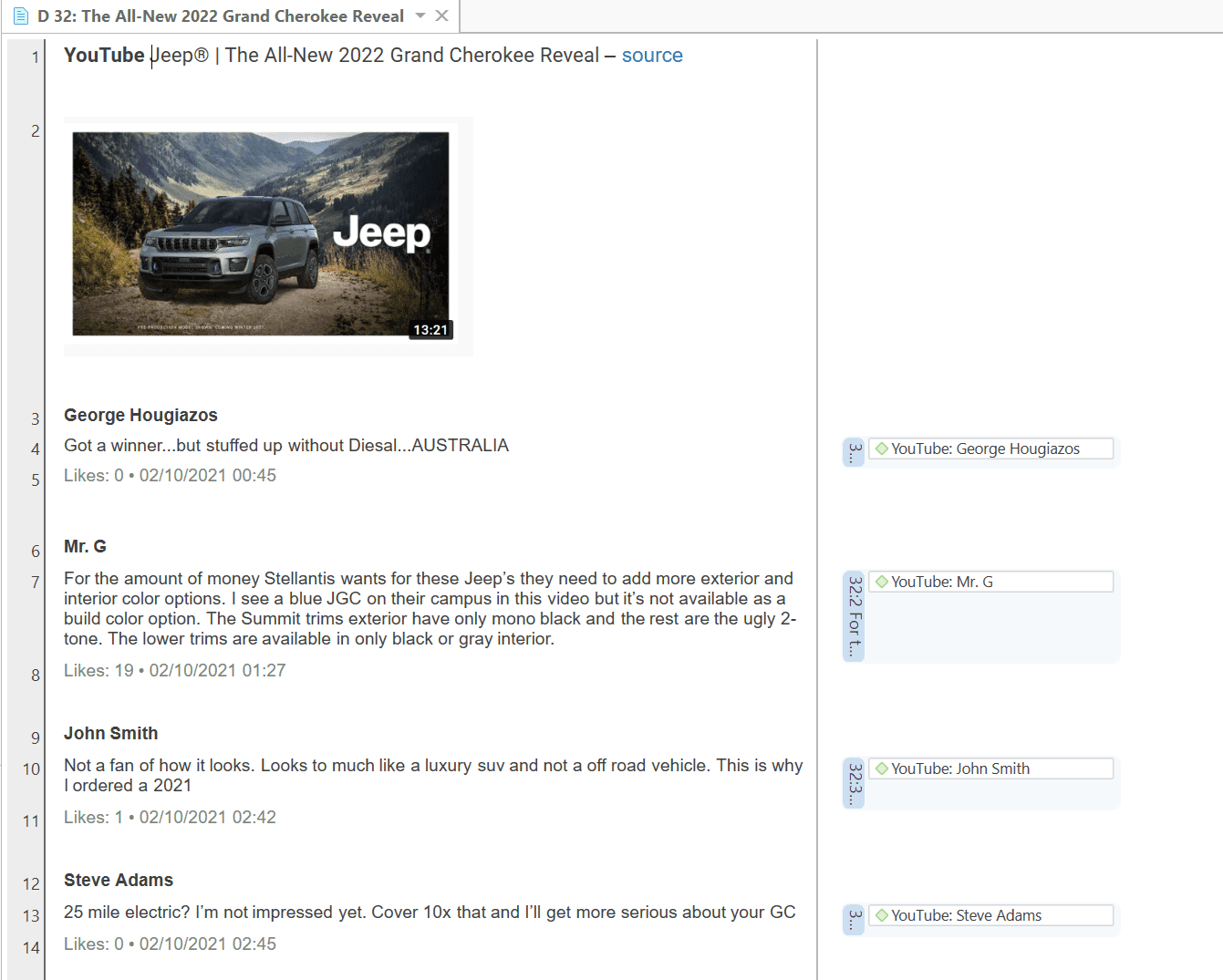
A possible next step is to run a sentiment analysis:
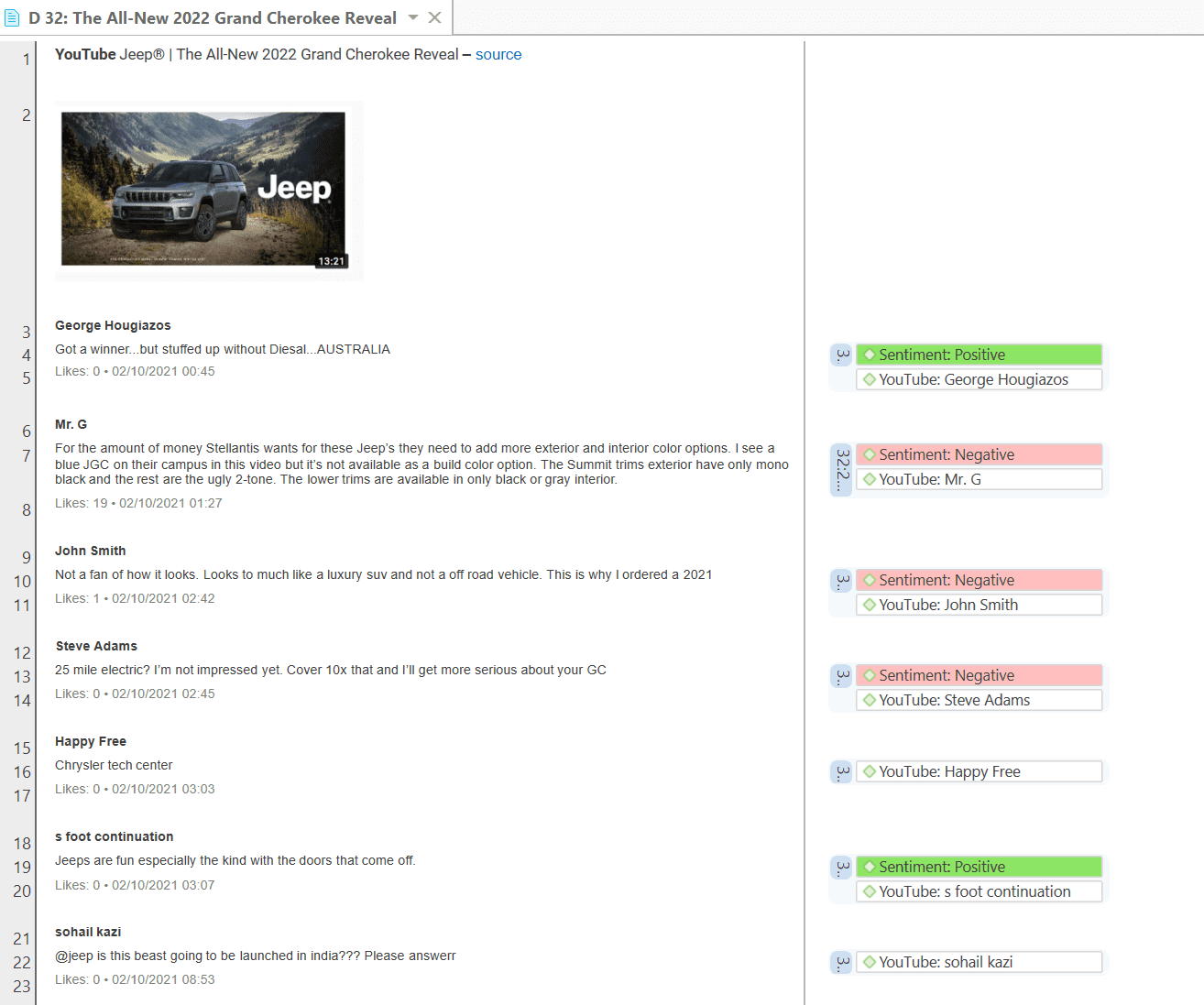
Importing data from Evernote
Evernote is a note-taking software that helps you create and organize digital notes—and keeps them synced across all your devices. You can use it as a digital filing cabinet to organize all your notes, whether they're field notes if you engage in a research project, strategic plans for work, meeting notes, notes for project planning, PDF documents that you found online, websites, photos or videos that you took with your mobile devices, or audio notes.
To import all or a selection of data you have collected in Evernote,
Select the Import & Export tab in the main ribbon and from there Evernote.
Sign in to your Evernote account and authorize ATLAS.ti to access your account.
Select what you want to import. ATLAS.ti recognizes the folder structure that you have build in Evernote and will group the documents accordingly creating document groups in ATLAS.ti.
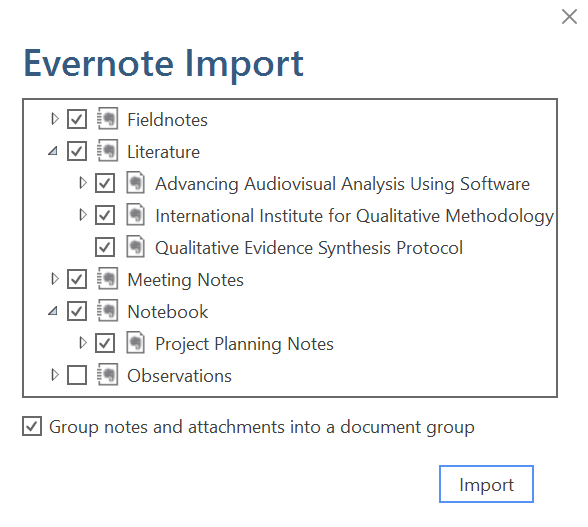
Document Manager after import:
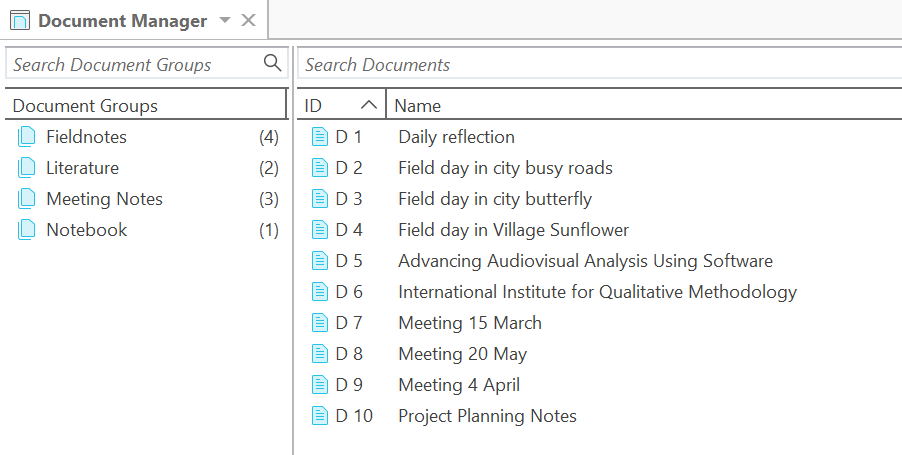
Working With Survey Data
Video Tutorial: Importing Survey Data. These days, most surveys are conducted online. A positive side effect is that (a) all data is immediately available in a digital format and (b) respondents often do write lengthy answers to open-ended questions. If you work with surveys from the analog world, chances are, they will end up in an Excel™ spreadsheet at some point. Regardless how your surveys originate, ATLAS.ti can handle them once they exist in that format.
Online surveys can be created using a number of tools. What most of these tools have in common is that the let you export your data as Excel™ file. When importing such an Excel file via the Survey Import option in ATLAS.ti, a wizard will guide you through the import process, and you can decide which information from your survey should be included, which questions should be turned into document groups for comparative analysis, and which questions will make up the body of the data.
In addition to the answers to open-ended questions, demographic information like age, profession, or age group, answers to single choice questions (yes/no, or offering more than two options) and answers to multiple choice questions can be imported. Within the framework of ATLAS.ti these are mapped in the form of document groups, one group per value.
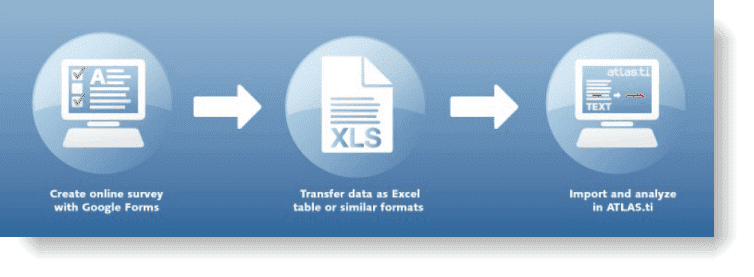
A survey broadly consists of the name of the survey, the questions, and the answers for each respondent. Questions can be of different type:
- Single choice between two (yes/no) or more options
- Multiple choice
- Open-ended
Within the framework of ATLAS.ti these concepts are mapped as follows:
| Survey Concept | ATLAS.ti Concept |
|---|---|
| Open-ended question | Code (and code comment) |
| Answer to an open ended question | Content of a quotation (data) |
| Single Choice question | a document group for each value |
| Multiple Choice question | a document group for each value |
ATLAS.ti automatically codes each open-ended question with the information provided in the header. As this is usually the question, the code name would be very long. Therefore, you can split it into code label and comment. The recommendation is to use the question number as code label and the text of the full question as comment. In order to do this you add two columns (::) between question number and question, as in: 'Question 1::Tell me about the highlights of your last vacation'.
Data are imported case-based. This means each row of the Excel™ table that is imported from the online survey tool is transformed into a document.
Click here to learn how to Import Survey Data.
Importing Survey Data
If you import the same table repeatedly, rows with already existing documents are ignored. This way, you do not have to wait until the last respondent has filled out the questionnaire.
When importing the same data again with updated information, you can only import new cases (i.e. rows in Excel), but not new questions (i.e. columns in Excel).
Select the Import & Export tab and then the Survey button.
Inst
Select the Excel file to be imported and click Open.
A wizard opens that guides you through the next steps:
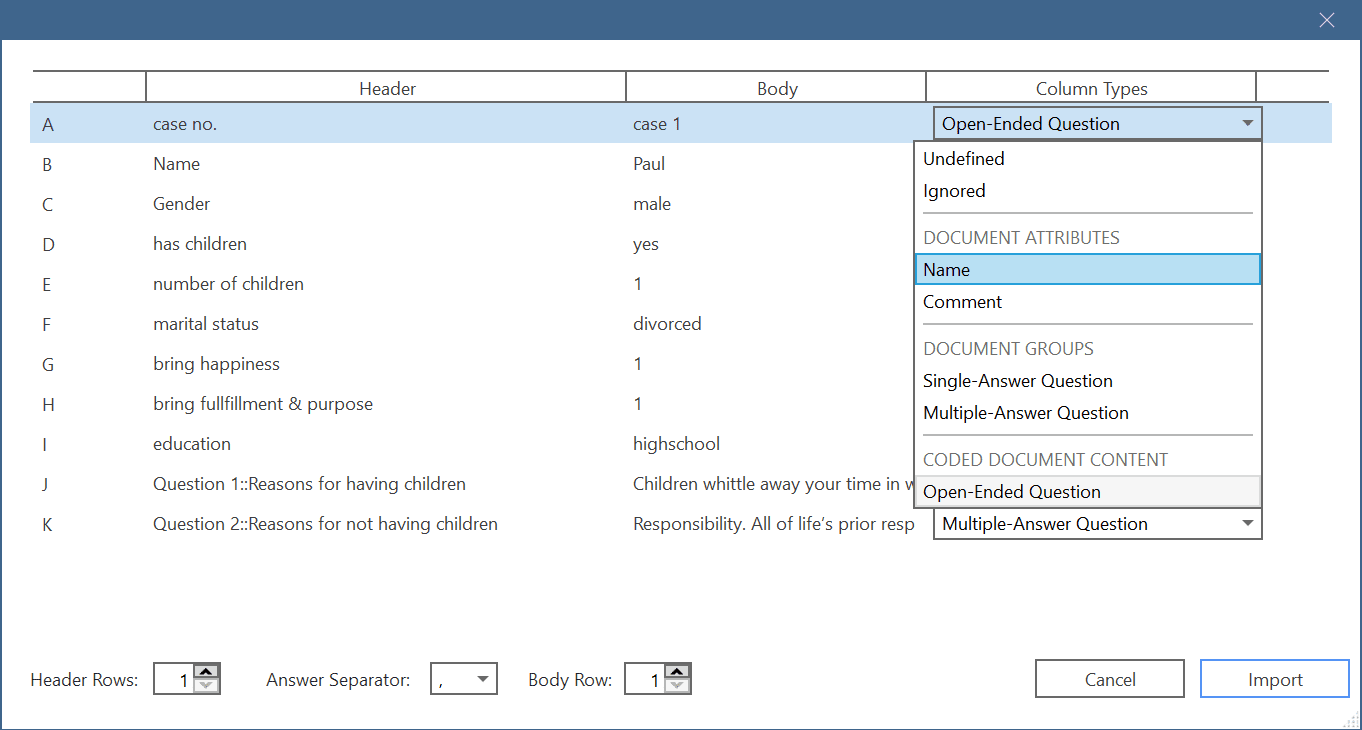 For each table column you can decide whether it should be transferred into a document attribute, a document group, or content of a coded document. You can also exclude columns.
For each table column you can decide whether it should be transferred into a document attribute, a document group, or content of a coded document. You can also exclude columns.
Undefined: ATLAS.ti tries to make an educated guesses for each column. If this is not possible, then 'undefined' is entered. You then need to select a suitable option. The data cannot be imported if some columns are set to 'undefined'.
Ignored: Select if you do not want to import this column. We recommend that you clean up your table beforehand in Excel and remove everything that you don't want to import to ATLAS.ti. This will facilitate the import.
Document Attribute: name: use the content of each cell in this column as document name. You can also select more than column to make up the name as shown in the example here. If both 'case no.' and 'Name' are chosen to become the document name, the document name will be 'case 1 Paul', 'case 2 Anne', 'case 3 Toni', etc. You can use the Body row option in the toolbar at the bottom of the wizard to move through the contents of each row.
Document Attribute: comment: Use the information in this column as document comment.
Document Group: single-answer question: If you have a question where you ask respondents to indicate their marital status, and the possible answer choices are: single, married, divorce, then ATLAS.ti creates a document group for each of these values:
- martial status::single
- marital status::married
- marital status::divorce
Document Group: multiple-answer question Use this option, if respondent can give multiple answers to one question. For example: "What are your favorite flavors of ice cream? Select any that you like." ATLAS.ti will create a document group for each answer choice. The default answer separator is a comma (,). See the bottom section of the wizard. Adjust the separator, if a semicolon (;) is used.
Coded document content: open-ended question: All answers that should become part of the body of the document.
Toolbar

Header Rows
Some survey apps use two header rows as header, like Survey Monkey for instance. This means, your Excel output could look like this:

If this is the case, you need to change the header rows from 1 to 2. Below you see an example:
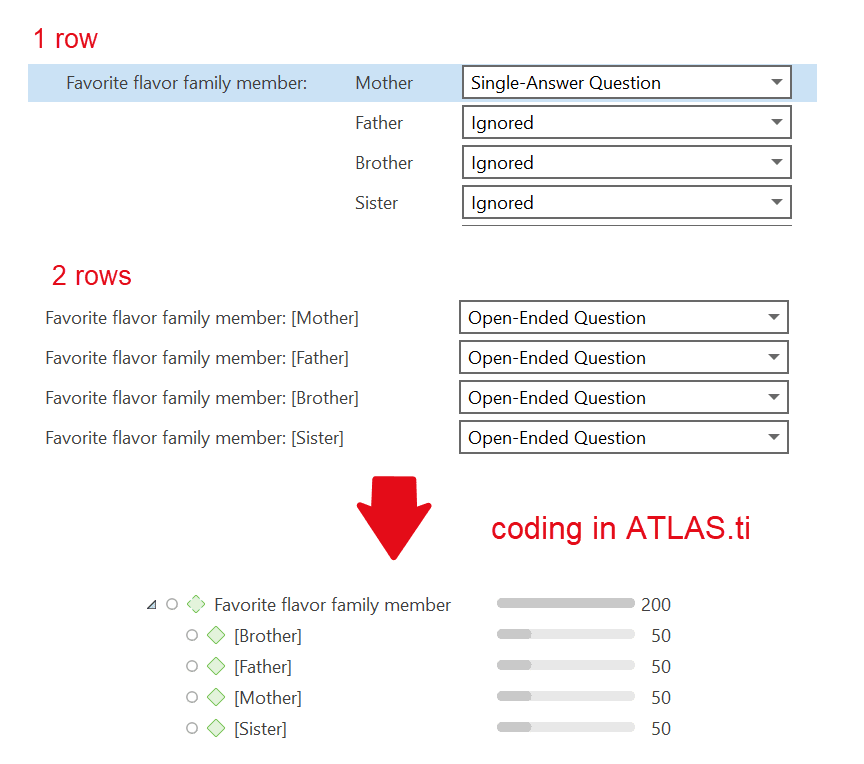
Inspecting Imported Survey Data
Open the Document Manager and take a look at what has been added to the project:
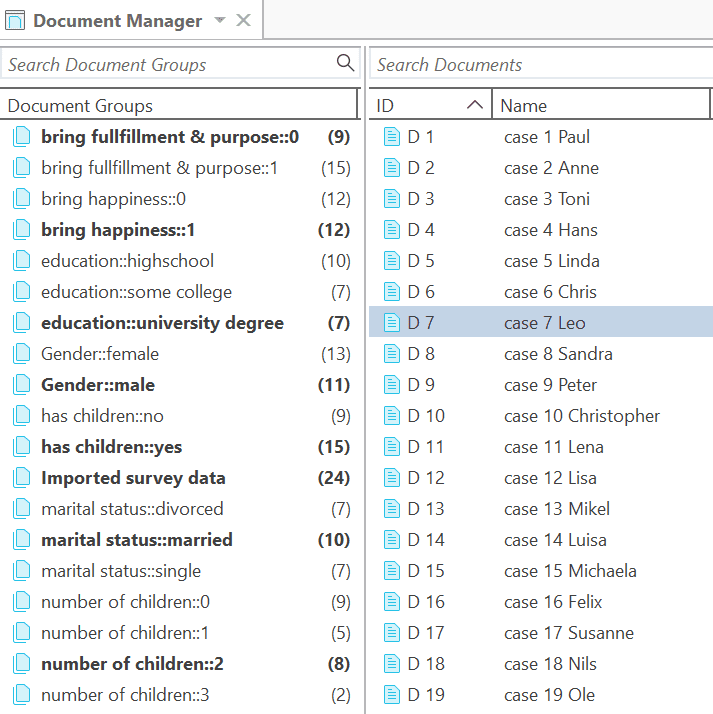 Document names: If you do not specify a name for each case, the default is case 1, case 2, case 3 and so on. In the example shown here, the case no. and the name is used as document name.
Document names: If you do not specify a name for each case, the default is case 1, case 2, case 3 and so on. In the example shown here, the case no. and the name is used as document name.
Document groups: Based on the information provided in the Excel table, document groups are created. The highlighted respondent 'case 7 Leo' in the example has a university degree, is a male, is married, and has 2 children. He answered the question: 'Do children fulfillment & purpose' with yes.
ATLAS.ti automatically creates a group that contains all survey data in case you work with data from multiple sources.
Data: The document text for each case consists of the answers to the open questions. Each answer is automatically coded with the information provided in Excel. The code can just be the question number or a longer label.
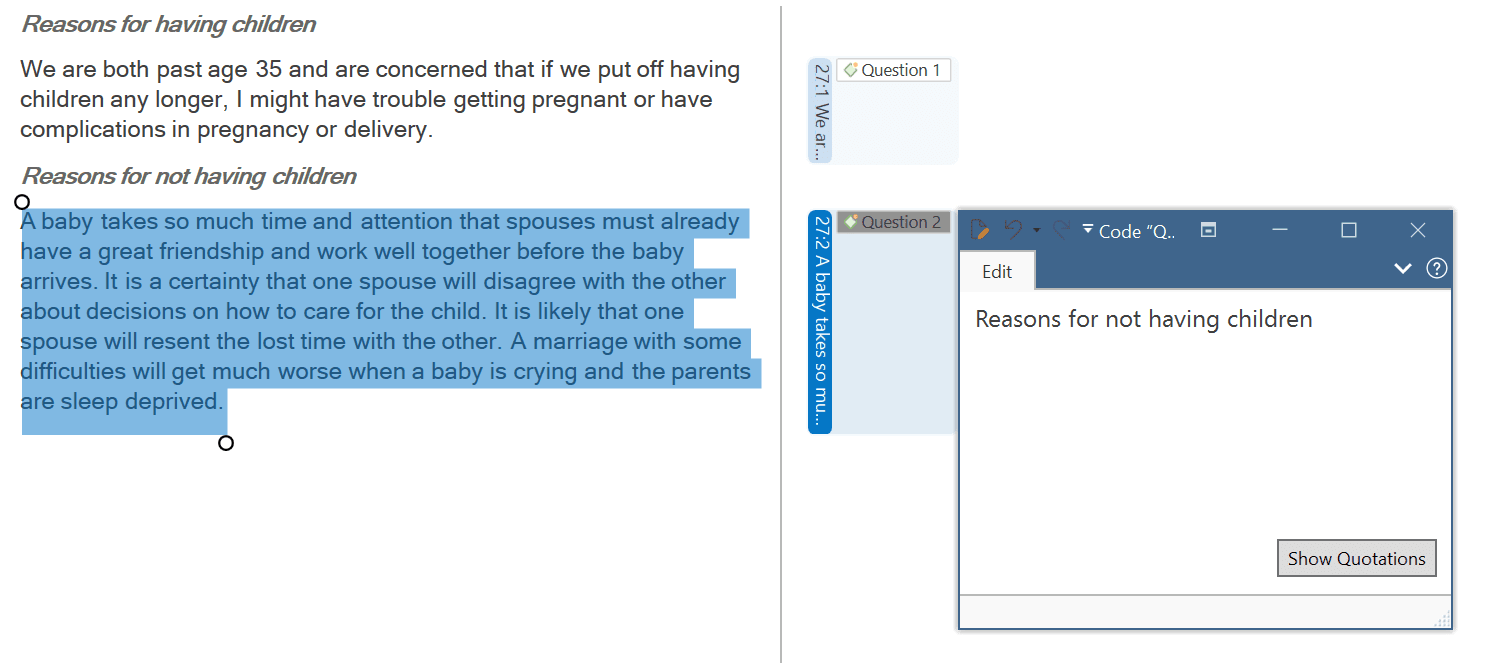 You can now begin to add some more detailed coding for each question. Useful tools that help you to quickly gain insights into your data are sentiment analysis and letting ATLAS.ti look for concepts.
You can now begin to add some more detailed coding for each question. Useful tools that help you to quickly gain insights into your data are sentiment analysis and letting ATLAS.ti look for concepts.
For a comparative analysis based on the document groups that have been created, you can use the Code Document table:
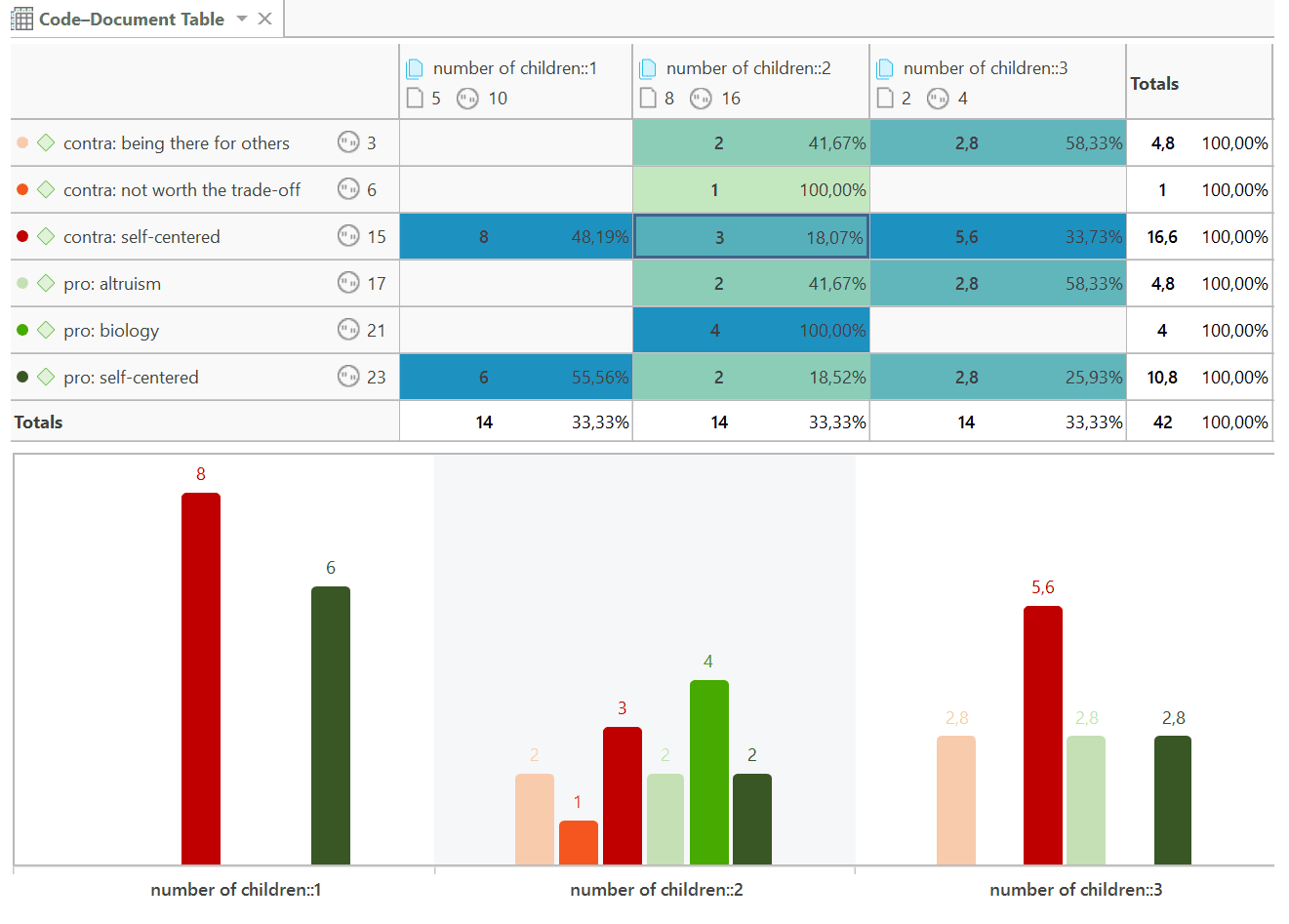 The image above shows a comparison of respondents with 1, 2, and 3 children. Compared are the kind of reasons they give pro and contra having children.
The image above shows a comparison of respondents with 1, 2, and 3 children. Compared are the kind of reasons they give pro and contra having children.
Analyzing Survey Data
-
Analyzing survey data requires that you know how to code. See Working With Codes.
-
You may want to explore the data first by creating Word Clouds or Word Lists, see Exploring Data and by using the auto coding feature. See Search & Code.
-
After coding, further analysis options that are often used with survey data are:
- the Code-Document Table
- the Query Tool in combination with the Scope option
- the Code Co-occurrence Table
Importing Twitter Data
You need a Twitter account to use this function.
To import Twitter data, select the Import & Export tab and then the Twitter button.
If you do this for the first time, you have to authorize ATLAS.ti to access your account by entering your username and password.
Note that you only will be able to import tweets from the past week. Further, as the final selection is done by Twitter and not within our control, queries at different times, or on different computers may result in different tweets. There is also a rate limit set by Twitter. This means you can make 180 requests within a time period of 15 minutes.
Enter a query. You can also look for multiple hashtags or authors by using OR. For example: #WorldAidsDay|#HIV|#Aids.
Next, select whether you want to import the most recent or the most popular tweets and whether to include re-tweets, images and profile images.
After you have made your select, click Import Tweets.
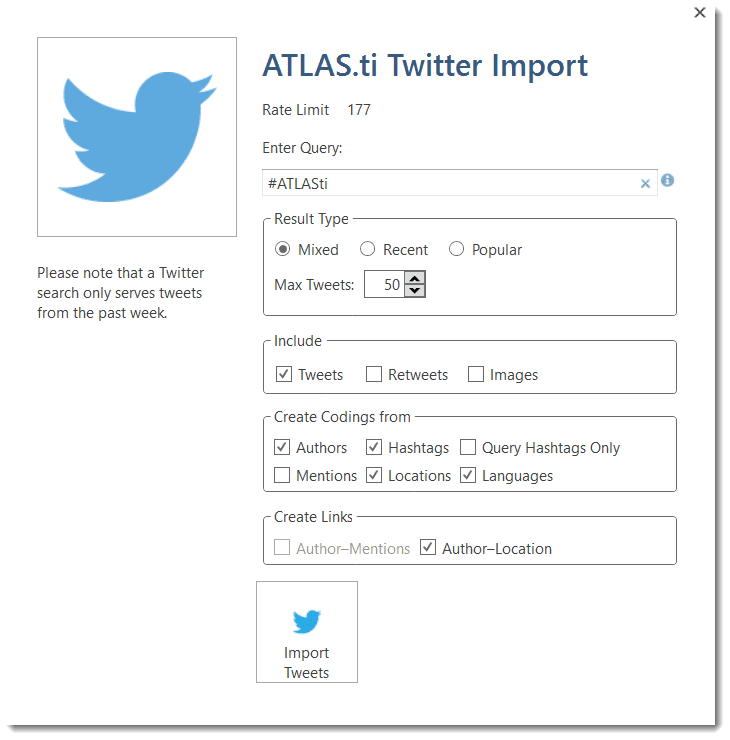
Automatic Coding and Linking for Tweets
The imported data is automatically coded based on the selection you make:
Tweets often contain many more hashtags than the original one that you searched for. Coding all hashtags often results in great many codes.
You can choose to code:
- only the queried hashtags.
- the author
- all mentioned Twitter users
- the location
- the language.
An automatic link can be created between:
- authors and locations
- authors and mentioned Twitter users.
These linkages can be visualized using ATLAS.ti networks.
Inspecting Imported Twitter Data
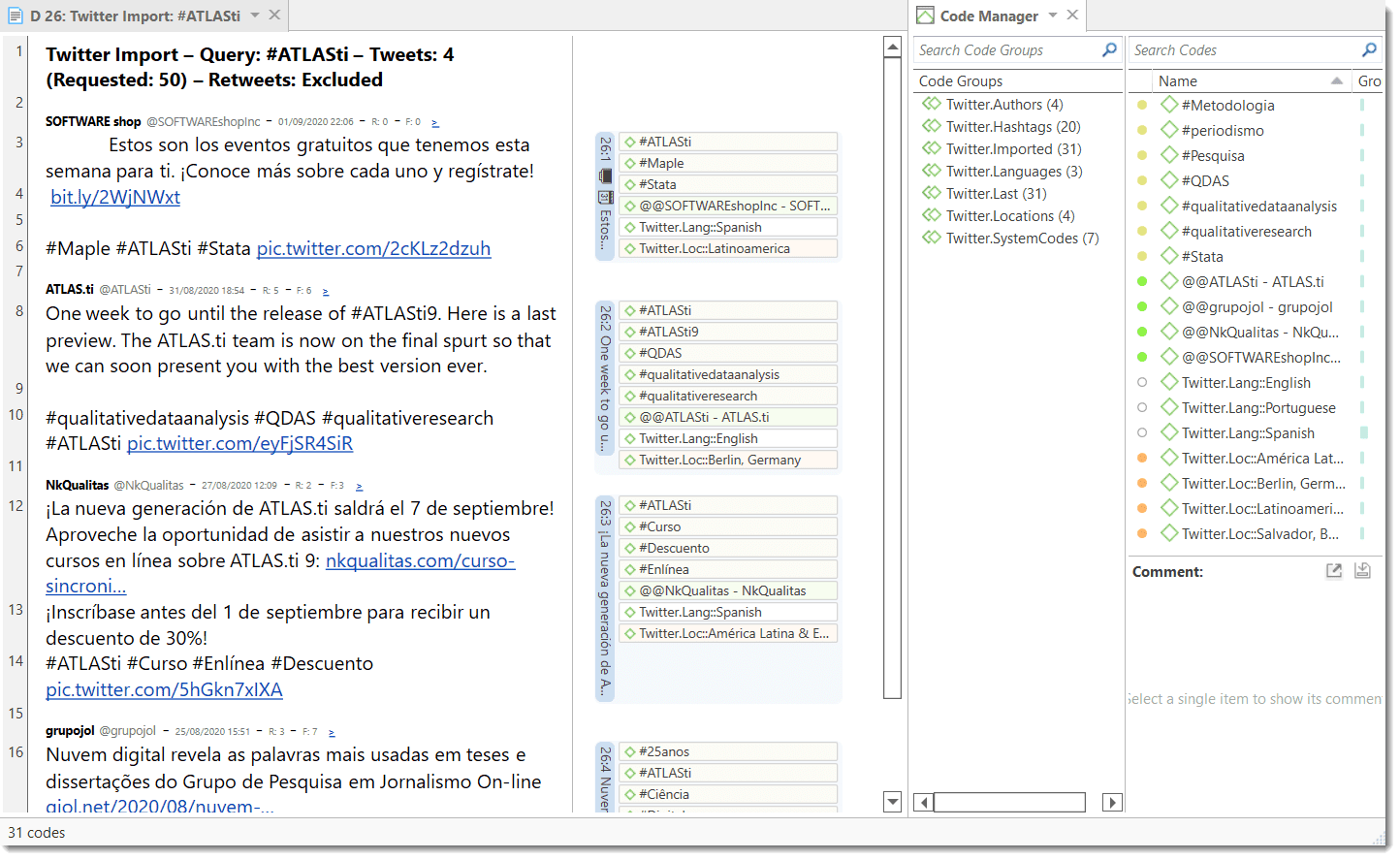
Load the document with imported tweets.
On the top of the document, you can read how many tweets and retweets were imported and how many you requested. Each tweet is coded with the selection you have made.
Open the Code Manager to inspect the code and code groups that have been created.
The code groups help you to navigate through your codes. By clicking on the code group Twitter: Languages, for instance, you can immediately see how many and which languages are used in the tweets you imported.
Adding a Geo Document to a Project
ATLAS.ti uses Open Street Map or Bing Map / Big Satellite Map as its data source for geo documents. Even though there is only one data source, you can also use more than one geo docs in your project, e.g. to create distinct sets of locations, to simulate tours, to simply tell different stories.
To add a geo document to the project, go to the Home tab, look for the Add Documents button, click on the dropdown arrow and select New Geo Document.
A new document is added and if you open it you see the world map. The default name is "New Geo Document". You may want to rename it, so it better describes your analytic intention.
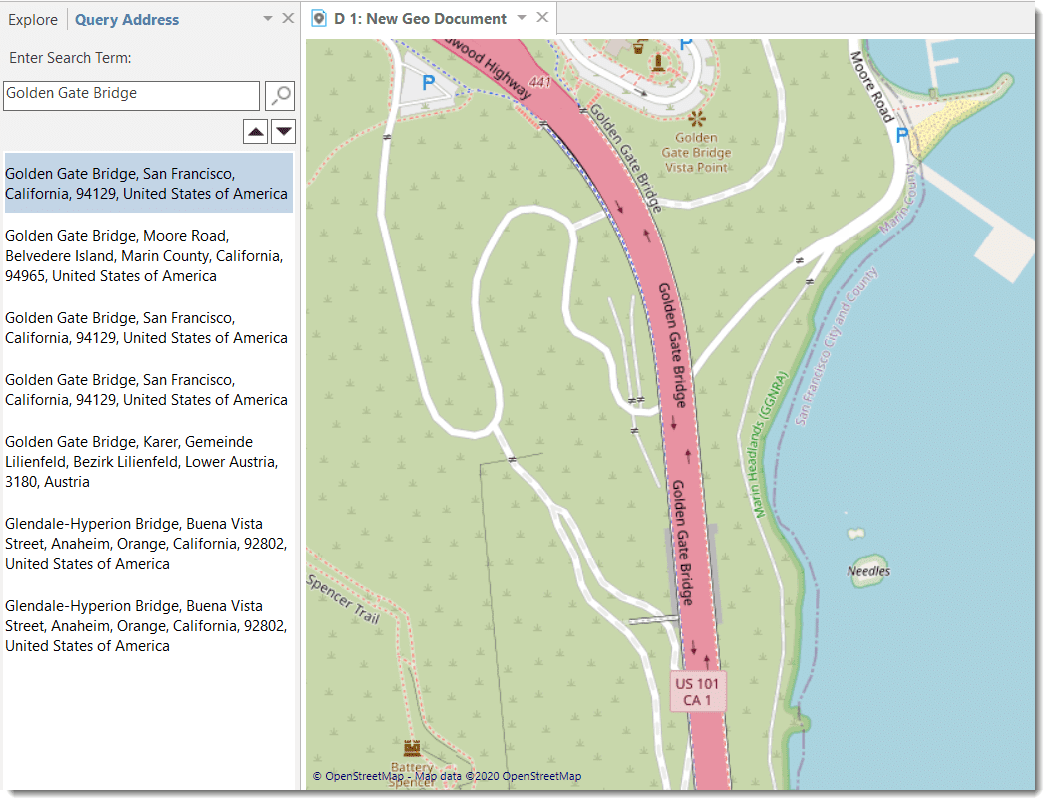
Finding a Location
The first thing you probably want to do is to query an address:
In the Document tab, click on the button Query Address.
A new tab opens in the navigator on the left. Enter a search term.
The map immediately displays the location that fits the search term and adds a place mark.
Changing the View from Open Street Map to Bing
If you prefer to use Bing Map or Bing Satellite Map,
Select the contextual Tools Tab and change the Map Type in the section Maps.
For further information, see Working with Geo Data.
Working with Geo Documents
Change Map Type
Under the tools tab, you can change how you want to view your geo document. Options are:
- Open Street Map
- Road Map (Here - Map Data)
- Satellite Map (Here - Map Data)
Creating Geo Quotations
For more general information on quotations, see Quotation Level and Working with Quotations.
Creating a Geo quotation is not much different from creating other type of quotations. The only difference is that the quotation is just one location on the map - the place mark, and not a region.
Right-click on the place mark and select the option Create Free Quotation (or click on the Create Free Quotation button in the Document ribbon).
To create further quotations:
inst
Either enter a new address and search for a location of interest, or left-click a point of interest on the map to set a place mark.
Right-click and select Create Free Quotation from the context menu.
If you move your mouse over a quotation, a text window opens displaying information about the quotation like the name, the author, when it was created, any codes and memos that are attached to it, the longitude and latitude and the address.
Display of Geo Q
Geo quotations can be access in the margin area, the Quotation Manager, the Project Explorer, and from within networks. Geo quotations are displayed as follows:
-
The quotation icon shows a place mark.
-
In the Project Explorer, the Quotation Reader and Manager and all reports, geo quotations are referenced in decimal degrees, e.g. LAT 48.859911° LON 2.377317°. In addition, the Quotation Manager shows a preview of the Geo location. You may want to consider renaming Geo quotations, e.g. by adding the name of the location to the coordinates. Another option is to add a comment. See also Working with Multimedia Quotations.
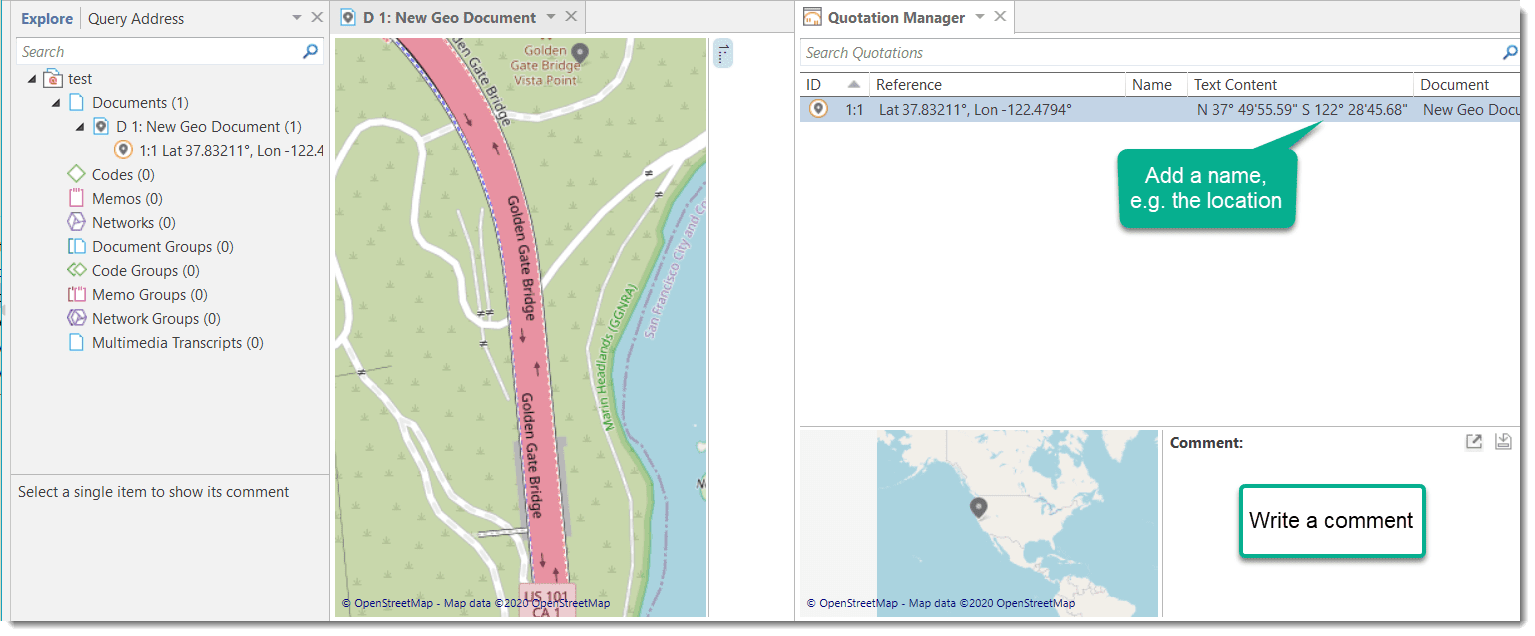
Activating Geo Quotations
Select a Geo quotation in any of the following places and double-click:
- margin area
- Quotation Manager
- Project Explorer
- Network
The quotation will be displayed in context.
An activated place mark is colored in orange. Non-activated place marks are colored in gray.
Modifying a Geo quotation
To modify a Geo quotation, activate it, so it is highlighted in orange.
Move the place mark to a different location. The quotation follows along.
Coding Geo Quotations
For more general information on coding, see Coding Data.
You can also create a quotation and link a code to it in one step, or code an existing quotation:
Set a place mark or select an existing quotation, right-click and select the option Apply Codes (or click on the equivalent coding buttons in the Document ribbon).
All other drag-and-drop operations described for coding also apply.
Creating a Geo
You can create a snapshot from the geographic region that is currently shown on your screen. This snapshot is automatically added as a new image document.
The advantage of the image is that you can select a region as quotation and not only a single point on a map. Further you can browse the Geo location in Google Maps (see below).
Open a Geo document.
In the toolbar, click Snapshot.
A new document is created. The default name is: 'Geo Snapshot @ longitude:latitude' of the last selected location.
As a snapshot results in an image document, you can also handle it like an image document. See for example Creating Image Quotations.
Browsing Geo Locations in Google Map
Create a Geo snapshot.
In the contextual Tools tab, selecting the button Browse Geolocation
This opens Google Maps in your default browser outside of ATLAS.ti.
Managing Documents
Whenever the content of a document needs to be displayed, printed, or searched, it accesses its data source and loads the content. This request is often triggered indirectly, e.g., by displaying a quotation. The following lists a few procedures that directly or indirectly load the content of a document:
- Activating a document in the Project Explorer or the Document Manager.
- Activating a quotation in a Navigator, the Quotation Manager or the Quotation Reader.
- Selecting a quotation for an activated code or memo.
- Activating a hyperlink in the margin area.
Loading Documents
Select a document in the Project Explorer and double-click. It will be loaded in the next available tab.
Alternatively:
Double-click a document in the Document Manager. (To open the Document Manager double-click on the main document branch in the Project Explorer.)
Editing Documents
To edit a document, click on the Edit button in the toolbar. The ribbon changes, and you see all editing option that are available.
inst
To leave edit mode, click on the button Exit Edit Mode.
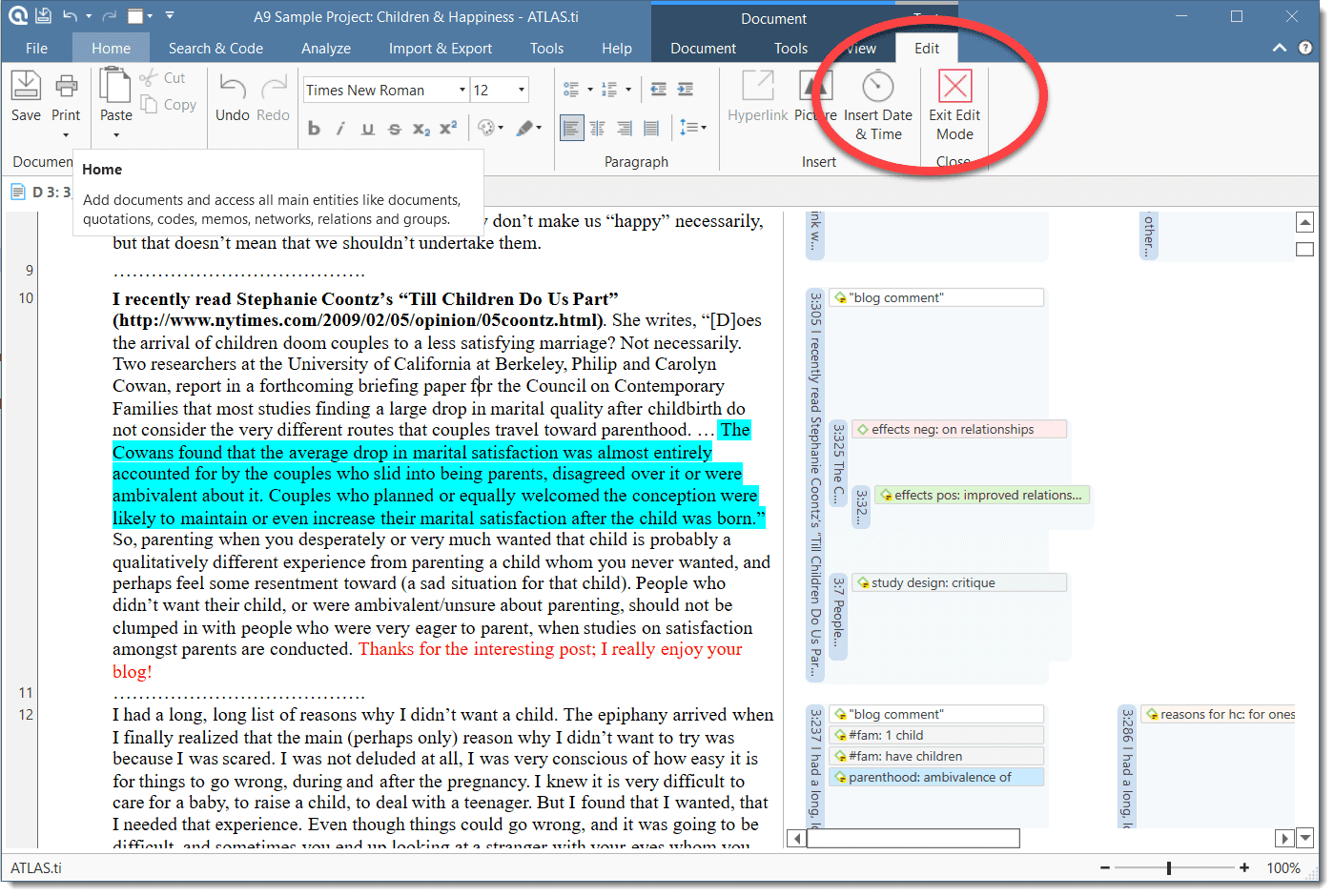
We recommend not do stay in edit mode while coding. You may accidentally modify text while highlighting text segments for coding.
When working in a team, we strongly recommend not to edit text. If team members edit the same document, you will lose one version when merging the project. If text needs to be modified, it should only be edited in the Master Project by the project administrator.
Renaming Documents
Right-click a document in the Project Explorer or Document Manager and select the Rename option from the context menu.
Alternatively:
Select a document and press the F2 key.
Renaming a document in ATLAS.ti does not change the name of the original source file. As described above under Adding Documents, documents are copied into the ATLAS.ti library when adding them to an ATLAS.ti project, and ATLAS.ti no longer needs the original source files.
Deleting Documents
If you accidentally have added documents or want to remove them from your project for other reasons, you can remove them.
Select one or multiple documents in the Project Explorer or the Document Manager, right click and select Delete.
If you delete a document by mistake, you can always use the Undo option in the Quick Access toolbar.
After deleting documents, the consecutive numbering may be off. To renumber documents in consecutive order again, select the Tools tab in the Document Manager, and from there the Renumber Documents option.
Duplicating Documents
If you need a document for different purposes, e.g. you want to view it from different angles and want to code different aspects; or if you want to associate it with different transcripts, you can duplicate a document. All work that you have done so far in the document, like the document comment you have written, all quotations and their comments, all hyperlinks, all linked codes and memos will be duplicated as well,
Open the Document Manager and select one or more documents that you want to duplicate.
Click on the Tools tab and select Duplicate Document(s)
The duplicated document(s) will be added at the end of the list of documents. They have the same name as the original document(s) plus a consecutive number in parentheses.
In terms of project size, the file(s) in the library are not duplicated. The duplicated document uses the same source file as the original document.
Renumbering all Documents
This option becomes useful after you removed one or more documents from a project. This results in gaps in the sequence of document numbers. You may remove these gaps by renumbering all documents using the Renumber Documents option.
Open the Document Manager.
inst
Select the Tools tab and from there: Renumber Documents.
User-defined Document S
If the documents are not listed in the order you want them to be listed as by default, you can impose your own sort order. This is how you do it:
Rename the documents in a way that when sorted in alphabetic order by name, they show up in the order you want them to be.
Click on the Name column in the Document Manager to resort the documents.
Check whether the documents are now in the correct order.
Select the Renumber Documents option from the Tools tab.
It is not necessary to renumber documents for working with ATLAS.t! However, it might be useful for your own work organization, and it can give reports a cleaner appearance.
Project Management
Opening a Project
To open a project, click on a project in the list of projects on the Welcome Screen, or if a project is already open, and you want to open another one, select File > Open.
Saving a Project
To save a project, click on the Save icon in the Quick Access toolbar, select File > Save, or use the key combination Ctrl+S. The project is saved as internal ATLAS.ti file in the ATLAS.ti library. The default location for the library is the application folder on your computer. See Where Does ATLAS.ti Store Project Data?
It is possible to either change the default location for the ATLAS.ti library or to create new libraries. See About ATLAS.ti Libraries.
If you want to save an external copy of your project, you need to export it. See Project Export.
Renaming a Project
You can rename projects from the welcome screen, either when you start ATLAS.ti or when closing all projects.
To rename a project:
Select a project on the welcome screen. Right-click on a project and select the option Rename Project.
Deleting
You can delete projects from the welcome screen, either when you start ATLAS.ti or when closing all projects.
To delete a project:
Right-click on a project and select the option Delete Project from the context menu
You will be asked to confirm the deletion as this is a permanent action that cannot be undone.
Password Protection
To set a password for your project, you need to load it first.
Select File > Info.
Click on the Set Password button and follow the instructions on the screen.
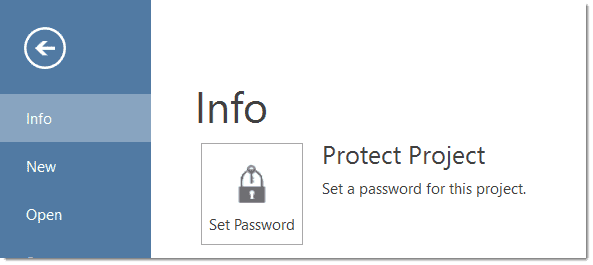
ATLAS.ti Scientific Software GmbH does not save your passwords. We cannot access, read or recover your password. If you cannot remember your password, you can no longer access your project!
ATLAS.ti Project Data is Saved to a Library
Working with the ATLAS.ti Library
The default location for ATLAS.ti project files is on the C drive. If it is not possible for all users to work on the C drive, either because of institutional restrictions or the C drive is already full and there is not enough space, there is an option to create a custom location where your ATLAS.ti-data are saved. Important to know
-
Each user works within her or his own ATLAS.ti library.
-
Each user can define where the ATLAS.ti library should be located. This location can be on your computer, on a server, or an external drive.
-
It is not possible to use a cloud sharing service like Dropbox because the specific way in which such systems work can jeopardize the integrity of the ATLAS.ti library.
-
It is possible to work with multiple libraries. Theoretically, you could create a new empty library every time you start a new project. This, however, requires careful data management on your part as you need to keep track where all of these different libraries are located.
Changing the Library Location
When you start ATLAS.ti, select Options at the bottom left of your screen. If a project is already open, you need to close it. You cannot change the location of the library, if a project is currently open.
Select Application Preferences > ATLAS.ti Library location > Switch Library.
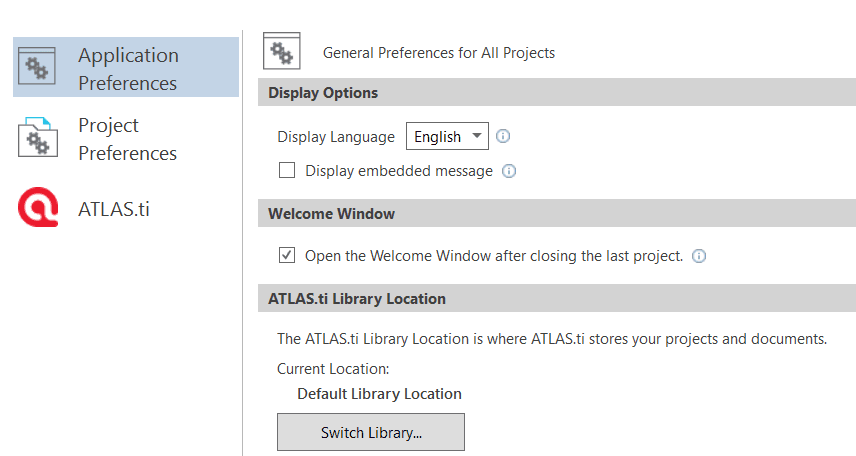
A wizard opens that guides you through the process. The next choice you need to make is whether you want to open an existing library, move the library to a different location, or create a new empty library.
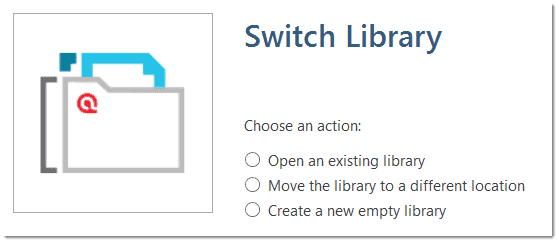
Moving the Library to a Different Location: Chose this option if you want or need to move your current library to a different location, e.g. because you do no longer want to work on the C drive. It is possible to keep a copy of the library at the old location.
Creating a New Library: This option allows you to create a new library at a location of your choice. If you already have projects, none of these will be moved over into the new library. To fill this library, you either create new projects from scratch, or you import project bundle files that you previously exported from other libraries.
Open an existing library: Chose this option if you work with multiple libraries, and you want to gain access to an already existing library at a different location.
After you made your choice, click Next.
-
If you selected to open an existing library: Select the location for this library
-
If you selected to move the library: Select the location where you want this library to be. You can keep a copy of the actual state of the library at the current location. Just keep in mind that this copy is not updated if you continue your work using the library at the new location.
-
If you selected to create a new empty library: Select where this new library shall be created. After confirming the new location, your opening screen will be empty, and you can begin to fill it with new projects.
A note from the Help Desk: We know that your project data is very valuable to you and that you do not want to lose it. Therefore, please select a sensible location for the ATLAS.ti library. For instance: Do not store it on the desktop. You probably have a folder where you store all project related data. If you cannot or do not want to use the ATLAS.ti default location, we recommend that you create a sub-folder for your ATLAS.ti related work within your project folder, and within this sub-folder, a dedicated folder for your library. Make sure your project folder is included in any automated back-up routine of your computer!
Creating a Project Backup
ATLAS.ti 22 projects cannot be used in previous versions.
Please export your projects on a regular basis and store the bundle files in a safe location. In case something happens to your computer, you still have a copy of your project to fall back on!
To create a backup of your project, you need to export it and save it as project bundle file on your computer, an external drive, a server or cloud location.
A project bundle file serves as external backup of your project independent of the ATLAS.ti installation on your computer.
-
The project bundle file contains all documents that you have added or linked to a project, and the project file that contains all of your coding, the codes, all memos,comments, networks and links. Large audio or video files can be excluded from the bundle.
-
Project bundle files are also used to transfer projects between computers. They can be read by both ATLAS.ti Mac and Windows. See Project Transfer.
-
If your project contains linked documents, they can be excluded when creating a project bundle file. See "Creating Partial Bundles" below.
Exporting a Project
To export your project to either save it as backup or to use it for transferring it to a different computer:
Select File > Export.
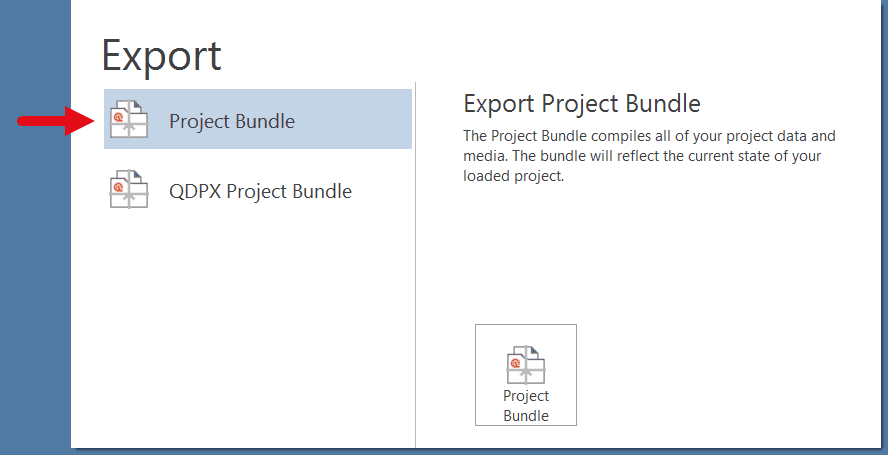
Click on the Project Bundle button.
If your project does not contain multimedia files, the Windows File Manager opens. If it does contain multimedia files, see Exporting partial bundle files.
The default name for the bundle will be the project name plus the name of the currently logged-in user and the date: project name (user name YYYY-MM-DD). You can rename the project bundle file at this stage, which however does not change the name of the project that is contained within the bundle.
Select a name and location where you want to store the project and select Save.
Think of the project bundle file like a bag that contains your project. Putting a different label on the outside of the bag does not change anything that is inside, which is your project with all your coded segments, comments, memos, networks, etc. and all documents that have been added to it. When you import the project bundle, the project name after import will still be the original name. If you want to rename the project file, you need to do this either during the process of importing the project, or on the opening screen. See Project Management.
![]()
Exporting a partial bundle if your project contains multimedia files
If your project contains large multimedia files, you can exclude those. This reduces the size of the bundle file. When preparing a partial project bundle, make sure you also back up the multimedia files that you excluded from the bundle. If you import the project at a later stage, you can relink excluded files to the project during or after import.
If your export a project that does contain multimedia files, the following window opens:
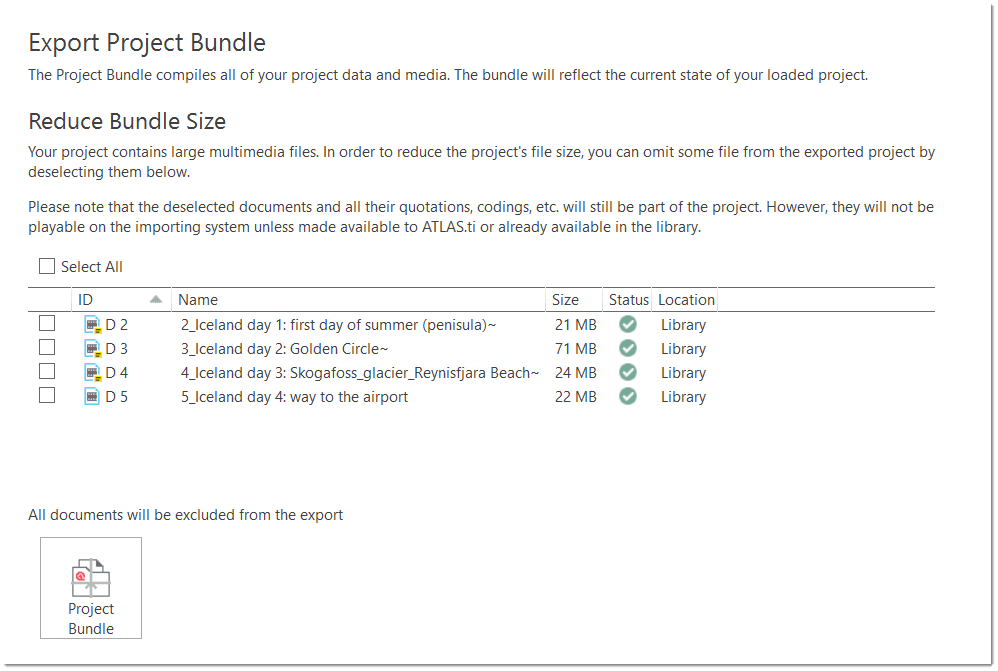
Deselect all files that should NOT be included in the bundle, then click on the Project Bundle button.
Project Transfer
You can transfer ATLAS.ti 22 projects to the web version and vice versa, ATLAS.ti web projects to ATLAS.ti 22. The latter is the recommended option - begin your work in the Web version, especially if you are interested in synchronous coding with a team. If you want to use the functionality of the desktop version, export your project and import it into the desktop version. If you transfer a desktop project to ATLAS.ti web, the formatting of document changes as online you work in a browser. Therefore, you cannot set up a mixed team work project where some people work in the desktop version and others in the web version.
ATLAS.ti 22 projects cannot be used in previous versions.
In order to transfer a project to a different computer, e.g., to share it with team members, you need to create a project bundle file.
A project bundle file contains all documents that you have added or linked to a project. In addition, it contains the project file with all codings, codes, memos, comments, networks, and links.
To create a project bundle file:
Select File > Export.

If your project does not contain multimedia files, the Windows File Manager opens. If your project does contain multimedia files, see Creating Partial Bundle Files.
Click on the Project Bundle button.
The default name for the bundle will be the project name plus the name of the currently logged-in user and the date: project name (user name YYYY-MM-DD). You can rename the project bundle file at this stage, which however does not change the name of the project that is contained within the bundle.
Select a name and location where you want to store the project and select Save.
Think of the project bundle file like a bag that contains your project. Putting a different label on the outside of the bag does not change anything that is inside, which is your project with all your coded segments, comments, memos, networks, etc. and all documents that have been added to it. When you import the project bundle, the project name after import will still be the original name. If you want to rename the project file, you need to do this either during the process of importing the project, or on the opening screen. See Project Management.
![]()
Creating a Project Snapshot
A project snapshot is a copy of the internal ATLAS.ti project file. Reasons for creating a snapshot are:
- to preserve certain stages of your project to review it later.
- as fall-back version before a merge, in case something turns out different from what you expected, and you have already saved the merged project. See Project Merge.
- as a copy of your project that you want to use as template for another project.
- as a copy of your project to prepare for inter-coder agreement analysis. See Inter-coder Agreement.
When creating a snapshot, ATLAS.ti automatically adds the following to the project name: (Snapshot YYYY-MM-DD hh:min:sec). You can, however, also enter any other name.
To create a snapshot,
Select File > Snapshot.
Accept the default name or enter another unique name, and click Create Snapshot.
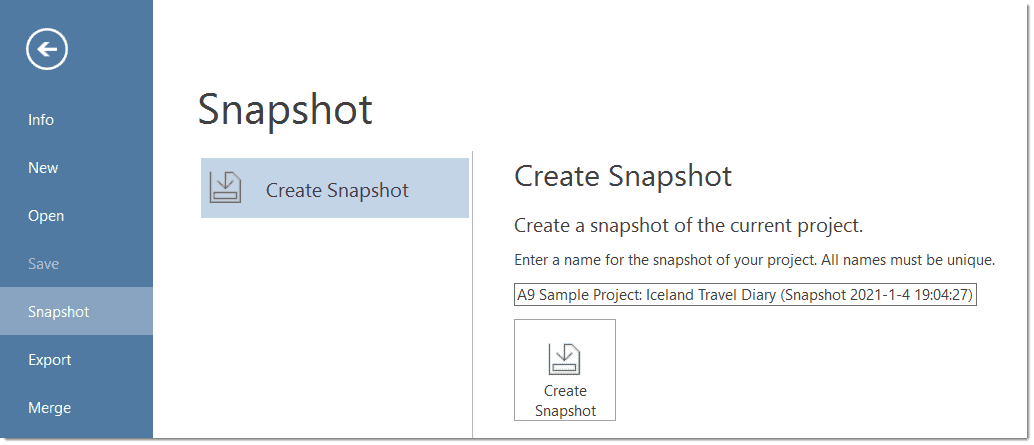
Just like ATLAS.ti project files, snapshots are saved internally in the ATLAS.ti environment. A snapshot has the same ID as the project from which it is created.
Where Does ATLAS.ti Store Project Data?
By default, ATLAS.ti projects and all documents that you add to a project are stored in a sub folder called Scientific Software in the application folder on your computer.
The application folder in Windows is called: AppData and can be found under your user account's home folder. Within the sub folder Roaming, you find folders from a number of different applications, also for ATLAS.ti.
The AppDataRoaming folder is a hidden folder and can either be accessed by entering the full path name or by typing %appdata% into the Windows 10 search field. If the username is "Mary." the full path would be:
C:\Users\Mary\AppData\Roaming\Scientific Software\ATLASti.22
The ATLAS.ti library is a system folder and not meant for user access. Files in this folder cannot be used outside ATLAS.ti!
If you need to change the default location for the library, see Working with the ATLAS.ti Library.
Default Locations for Files and Text Analysis Models
You can check which default location are used by your installation of ATLAS.ti as follows:
When you start ATLAS.ti, select Options at the bottom left of your screen. If a project is already open, you need to close it. You cannot change the location of the library, if a project is currently open.
Select Application Preferences and look for the section ATLAS.ti Default File Location.
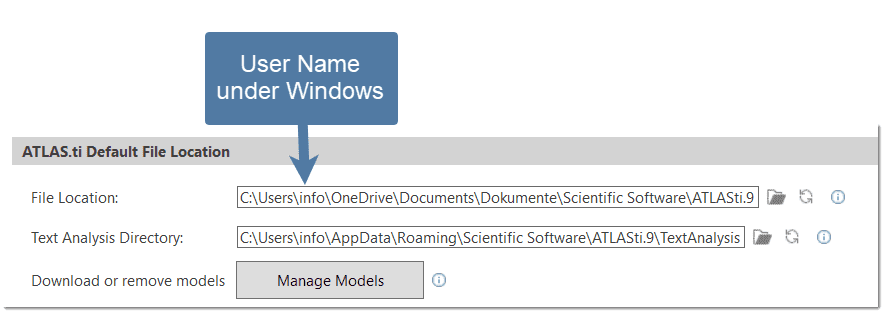
Working With Groups
Groups in ATLAS.ti help you to sort, organize and filter the various entities. Groups are available for documents, codes, memos, and networks.
Common to all groups are:
- An entity can be sorted into multiple groups. For example if you sort a document into the group gender::female, it can also be sorted into other groups like location::urban, or family status::single.
- If you click on a group in a manager, you activate a filter (see below). Then only the items that are in the selected groups are displayed.
- You can combine groups using Boolean operators. See for example Exploring Coded Data.
- You can save a combination of groups for further re-use in form of a smart group.
- You can set groups as global filter.
There are no groups for quotations, as codes already fulfil this function. Codes group quotations that have a similar meaning. Therefore instead of groups, you see the codes in the side panel of the Quotation Manager.
Application of Docume
Video Tutorial: Organizing documents and document groups. Often data come from different sources, locations, respondents with various demographic backgrounds etc. To facilitate the handling of the different types of data, or to compare respondents based on sociodemographic characteristics, they can be organized into document groups. You can also use document groups for administrative purposes in team projects if different coders should code different documents. You can then create a group containing all documents for coder 1, another group containing the documents for coder 2 and so on.
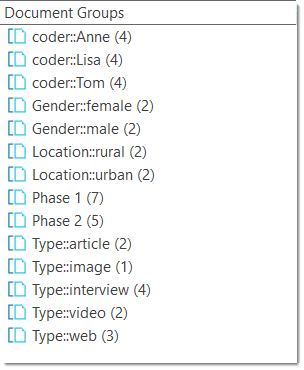 Another application is the use of document groups for analytic comparisons in the Code Document Table.
Another application is the use of document groups for analytic comparisons in the Code Document Table.
 Document Groups are also useful as global filters for instance for Code Co-occurrence Analysis.
Document Groups are also useful as global filters for instance for Code Co-occurrence Analysis.
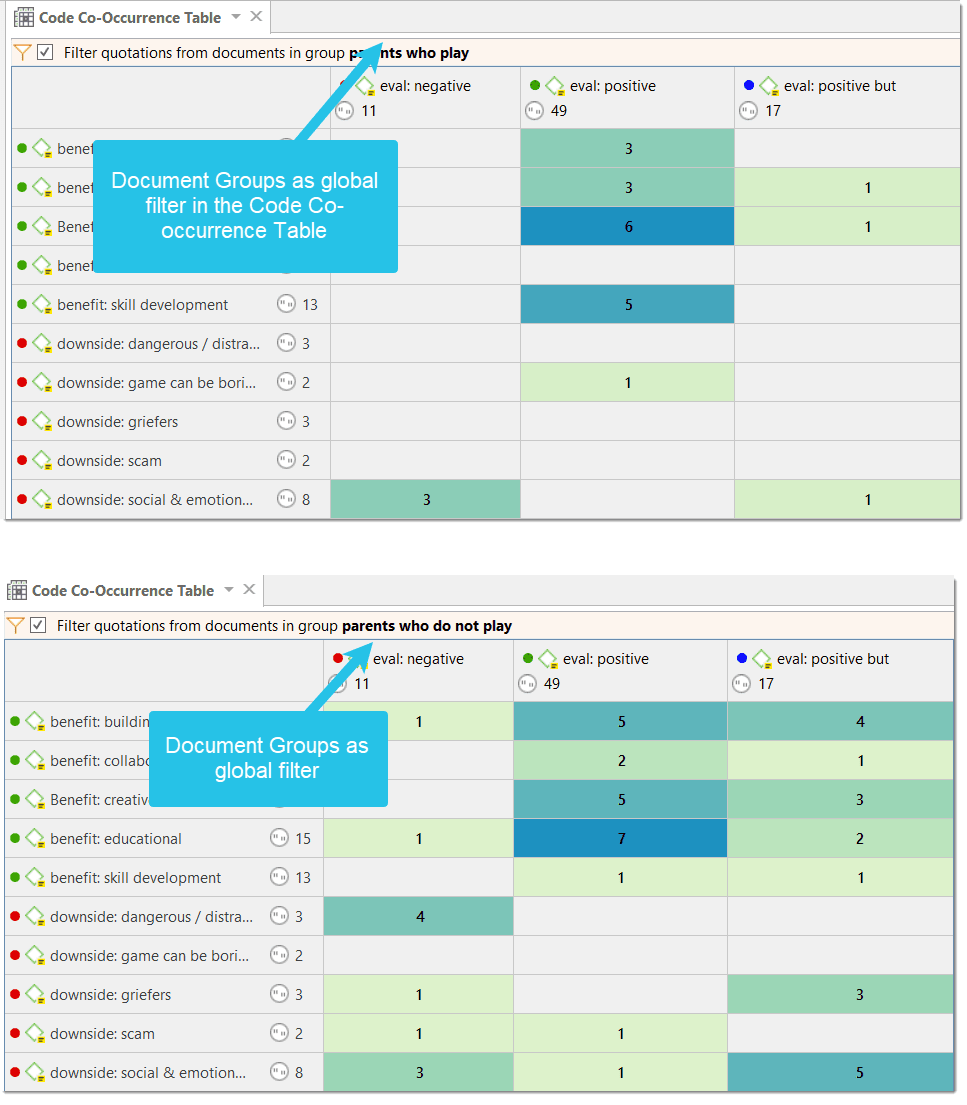
Document groups can also be added to Networks and you can show which codes have been applied to which group.
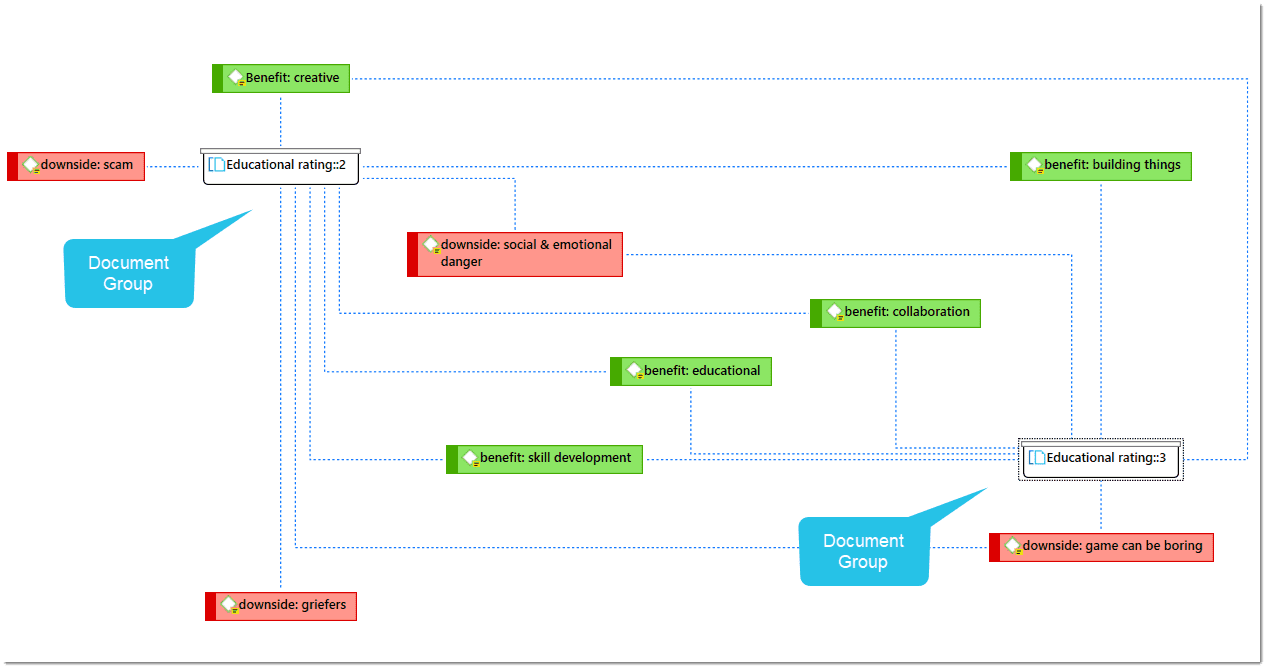
Application of Code Groups
Code groups can be used to sort and organize codes in the Code Manager. Code groups facilitate the navigation of codes in the Code Manager as local filter.
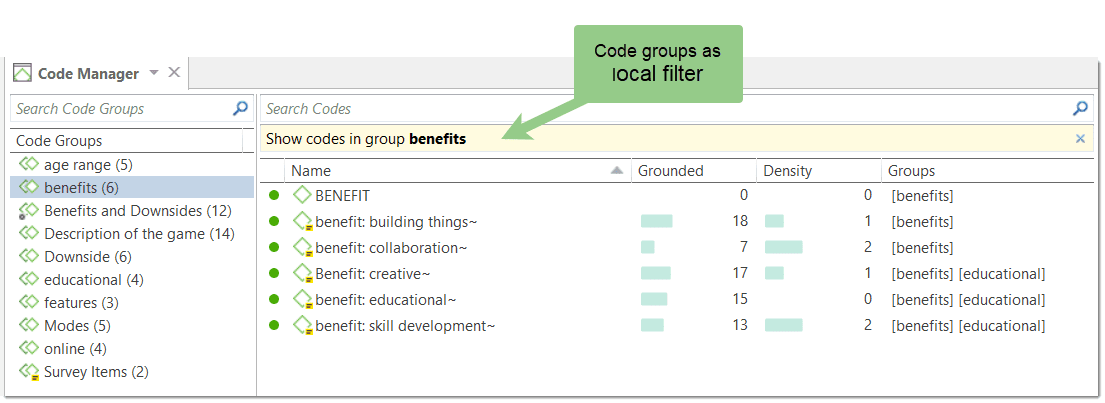 Code groups can be used as global filters in analysis.
Code groups can be used as global filters in analysis.
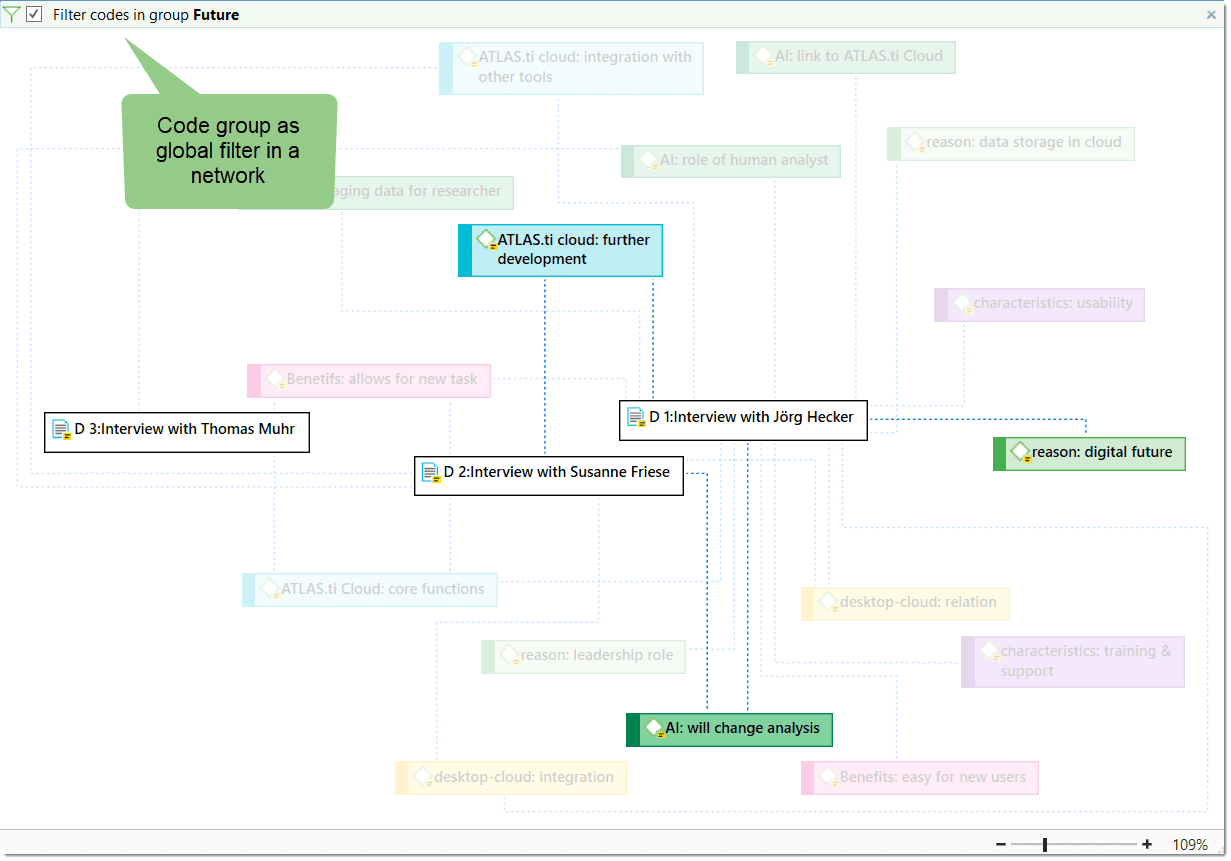
Code groups can also be used in the Code Document Table for case comparisons.
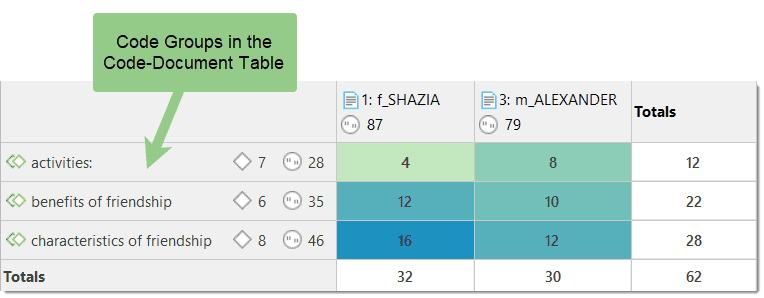
Users often mistake code groups as a kind of higher order code, which they are not. They do however can be quite useful in building a coding system.
Application of Memo Groups
Memo groups come in handy if you have written lots of memos. You could for example group memos by function: methodological notes, team memos, research diaries, analysis.
If you have multiple memos that contain answers to one research question, you can group all those memos.
If you have multiple memos that contain input for a particular section in the research report, you may want to create a memo group for those.
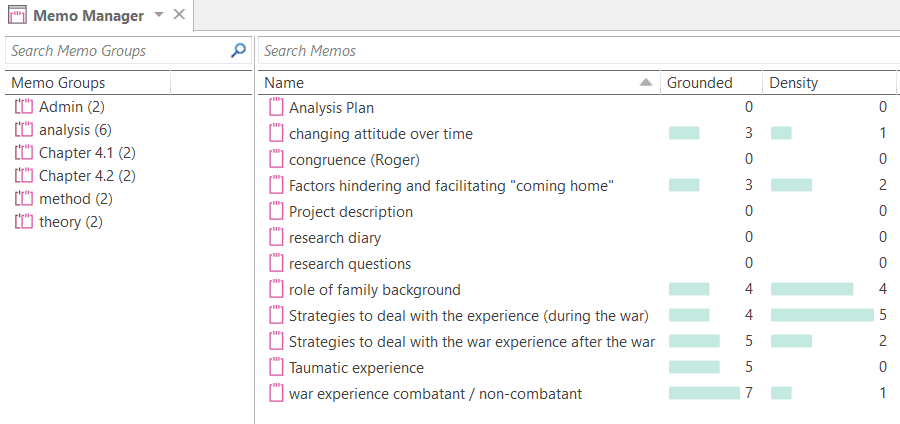
You find more information on working with memos here: Memos and Comments.
Groups as Filters
Groups are listed in the filter area of the document, code, memo and network manager.
Click on one or more groups to filter the list of items. If you want to select multiple groups hold down the Ctrl key.
Once you have set one or more groups as filter, a yellow bar appears above the entity list indicated that a) a filter has been set, and b) which one.
To reset the filter to see all entities again, click the X on the top right-hand side of the yellow bar.
It is also possible to run simple AND and OR queries:
As soon as you select more than one group, you see the word any in blue in the filter bar. This means the default operation is to combine the items of the selected groups with OR.
If you want to filter by the intersection of two or more groups, click on the word "any" and change it to all. This is the Boolean AND operator.
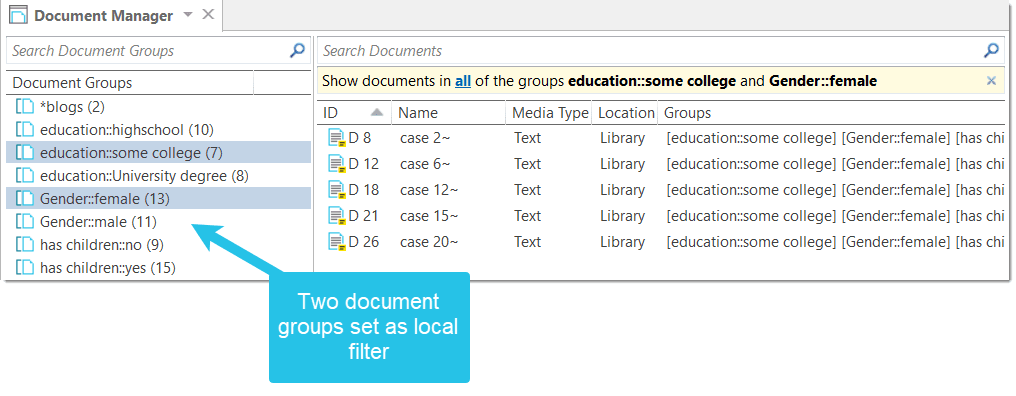
An example would be to filter by all female respondents who live in an urban region. This requires that you have grouped the documents by these two criteria:
- education::some college
- Gender::female The same options are available for all entity types.
Creating and Renaming Groups
You can create groups in various ways and at various places in the software.
Creating Groups in a Manager
Open the Document Manager, e.g. with a click on the Documents button in the Home tab.
Select several documents and drag-and-drop them into the side panel on the left. Use the common Windows selection technique (hold down the Ctrl- or Shift key).
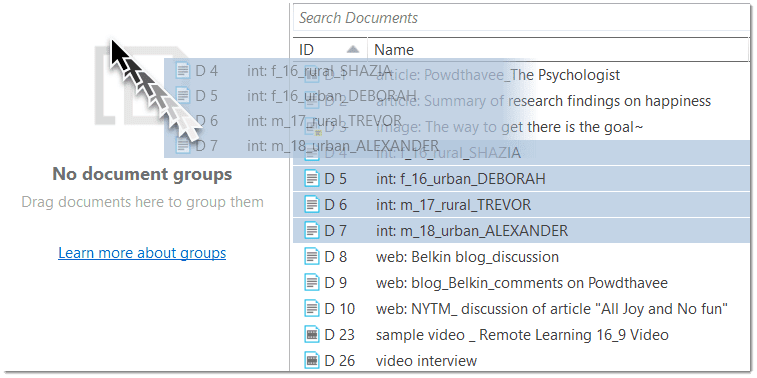
Enter a name for the group and click Create.
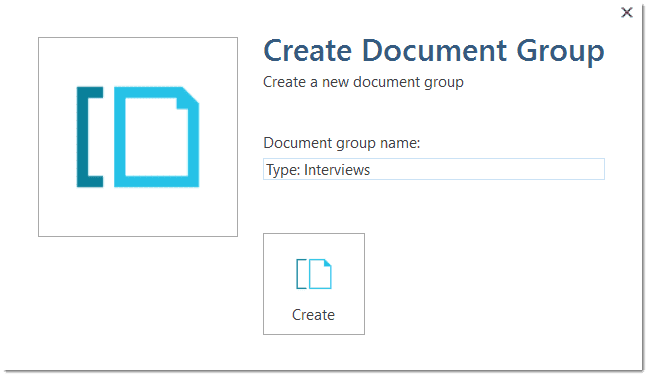
Another way to create groups in a manager is:
To select a number of entities in a manager, right-click and select the option New Group from the context menu.
Enter a name for the group and click Create.
Creating Groups in the Project Explorer
Select a number of entities in a branch of the Project Explorer, right-click and select the option New Group from the context menu.
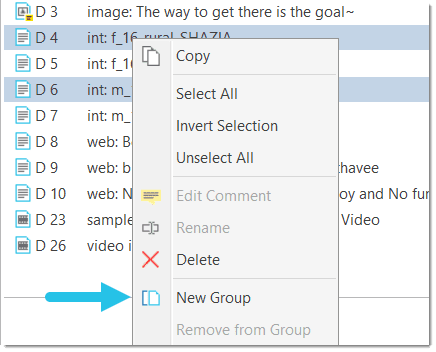
Creating Groups in a Group Manager
Open the Group Manager by double-clicking on a group in the Project Explorer.
Alternatively:
In the Home tab, click on the drop-down for documents, codes, memos or networks and select the respective Group Manager.
In the Group Manager:
Select the button New Group and enter a name.
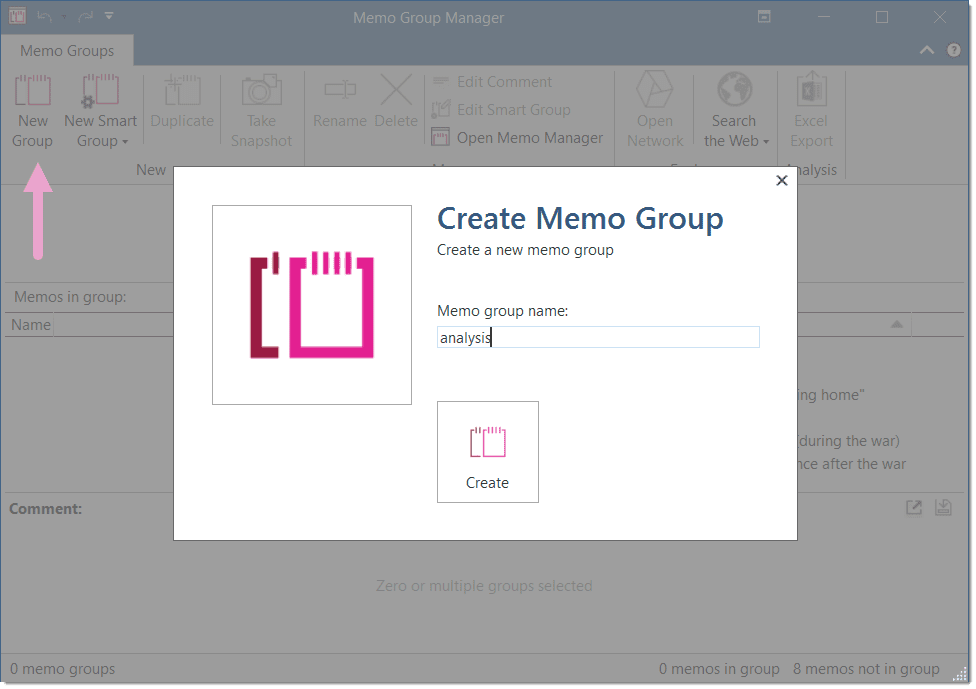
Next select on ore more items on the right-hand side in the pane: 'Documents / Codes / Memos / Networks not in group' and move them to the left-hand side 'Documents / Codes / Memos / Networks in group' by clicking on the button with the left arrow (<). You can also double-click each item you want to move.
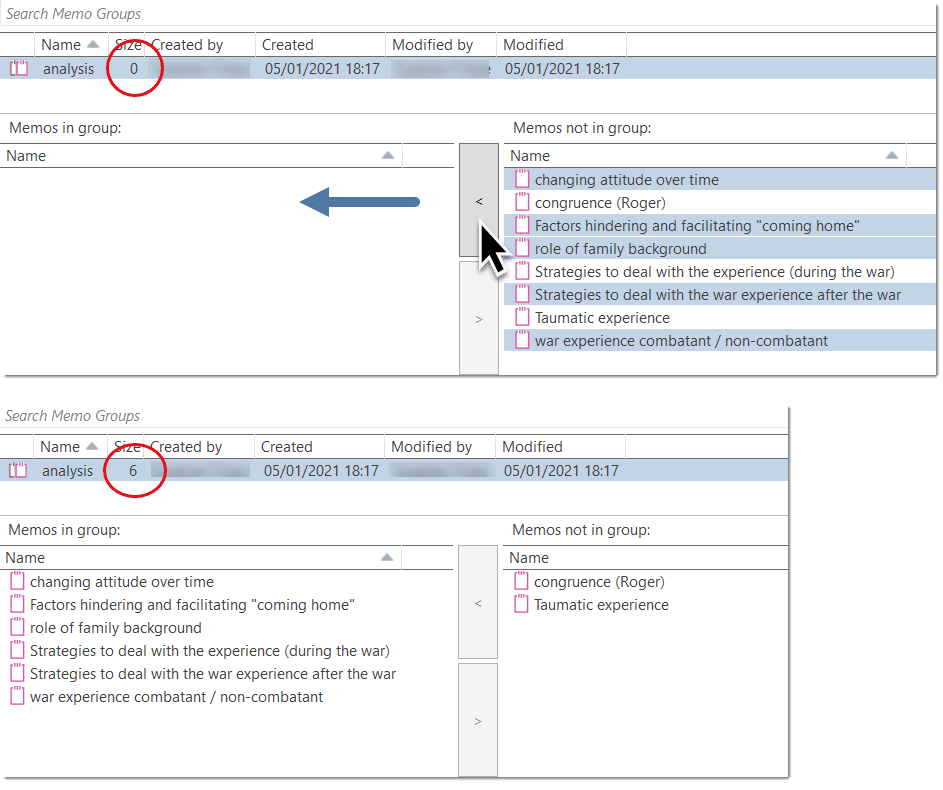
Creating Document Groups in the Query Tool
At times, you first need to code the data to find relevant information like years of working experience, special skills, attitudes about something, relationship to other people, etc. For this you need an option to create document groups based on query results.
You can create groups based on queries - thus based on information that you have coded. See Creating Document Groups From Results.
Renaming a Group
Select a group in the Group Manager and click on the Rename option in the ribbon.
Right-click on a group and select the Rename option from the context menu.
Select a group and press F2. This opens the 'Rename dialogue'.
Removing Group Members / Deleting Groups
Removing Group Members
You can remove group members at four different locations:
Project Explorer
Open the branch for a group, select one or more items that you do not want to have in the group, right click and select Remove from Group from the context menu.
In Managers
Open a Manager and select a group.
Select one or more items in the list that you do no longer want to have in the group, right click any of the selected items and select Remove from Group from the context menu.
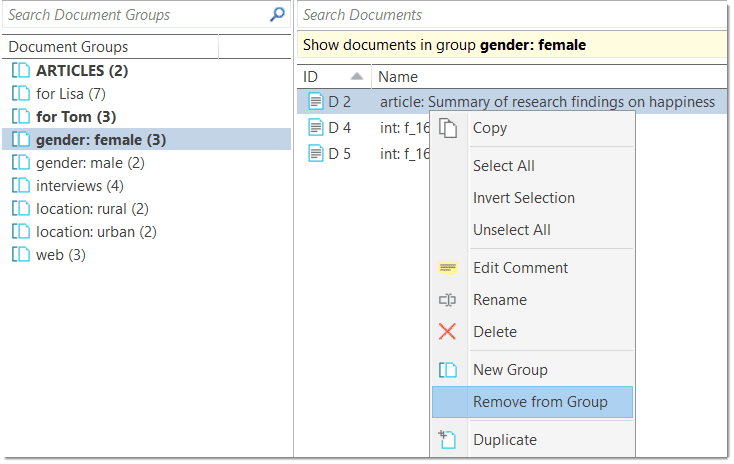
Filter Area in Managers
Open a Manager and select a group.
Select one or more items in the list that you do no longer want to have in the group, right-click on the group and select Remove from Group in the context menu.
Removing Group Members in the Group Manager
Open the Group Manager by double-clicking on a group in the Project Explorer.
Alternatively:
In the Home tab, click on the drop-down for documents, codes, memos or networks and select the respective Group Manager.
inst
Next select on ore more items on the left-hand side in the pane: 'Documents / Codes / Memos / Networks in group' and move them to the right-hand side 'Documents / Codes / Memos / Networks not in group' by clicking on the button with the right arrow (>). You can also double-click each item you want to remove.
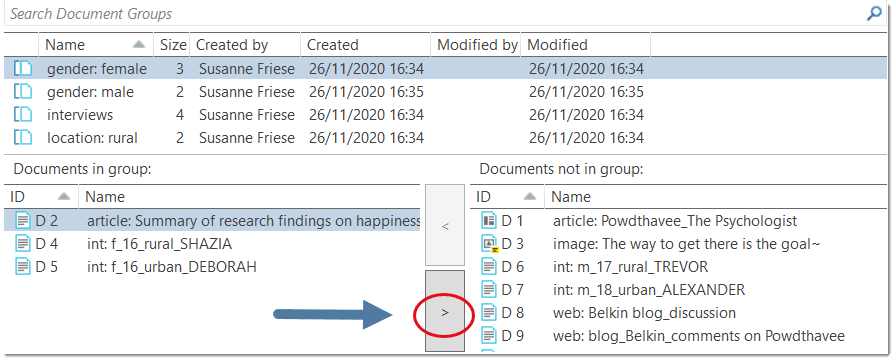
Deleting Groups
Select one or more groups in the Project Explorer or the side panel of a manager.
inst
Right-lick and select Delete from the context menu.
It is also possible to delete a group in a Group Manager. In Group Managers you can only delete one group at a time.
Importing & Exporting Document Groups
You can export and import the list of documents and their groups to and from Excel.
Exporting the data gives you an overview of all your document groups and their members. It can also be used as a starting point to prepare an Excel file for import.
You may want to import a Document Group table, if you already have an Excel file with information about each document like gender, education levels, location, etc.
The content of the Document Group Table consists of the following:
- First column: document name.
- Second and subsequent columns: document groups or document attributes
As document groups in ATLAS.ti are dichotomous, the document groups are listed in the columns, and the cells contain a 0 if the document is not in the group, and a 1 if the document is in the group.
If you do not follow the ATLAS.ti naming conventions (see below), the table will look as follows:

If you use the ATLAS.ti naming convention for document groups: attribute name::attribute label or value, then ATLAS.ti uses the attribute name as column header and the attribute label or value for each cell. For instance, if you have the following groups:
- education::high school
- education::some college
- education::University degree
- gender::male
- gender::female
- has children::yes
- has children::no
- marital status: single
- marital status: married
- marital status: divorced
- number of children:1
- number of children:2
....the Excel table looks as follows:

Exporting Document Groups to Excel
Select the Import & Export tab in the ribbon and from there the Document Groups button with the up arrow.
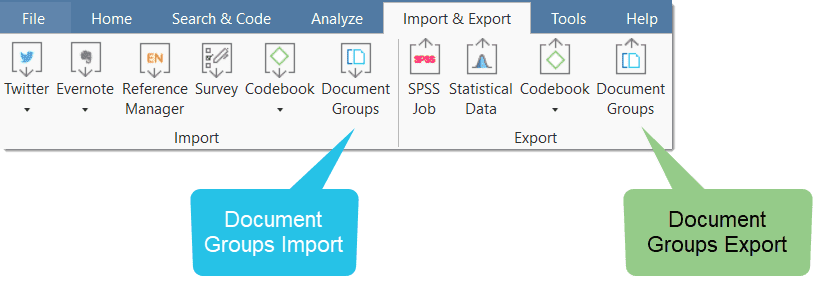
This opens a File Manager. Select a location for saving the Excel file. Accept the default name or change it. Select Save.
tip
If you use the naming convention for document groups as shown above, then the table shows the more conventional format with attributes / variables as column header and the various values for each variable in the table cells.
Importing Document Groups from Excel
If you want to prepare a table for import, the easiest way is to export a table first. This way you generate a table that already contains all document names in the order as they occur in ATLAS.ti
Export a document group table (see above).
Add the document attributes as column headers. See examples below.
-
If there are multiple values for a variable, add the prefix #.
-
If you do not add a prefix, a document is assigned to the group if the cell value is 1.
Enter the values for each document in the table cells.
-
if there is no entry in a cell, the document is not assigned to a group.
-
if two or more values of the same attribute apply to the document, then enter the values separated by a coma.
In the following you see two examples:
| Document Name | #gender | #age group | likes chocolate | #favorite drink |
|---|---|---|---|---|
| doc 1 | male | 1 | 1 | cola |
| doc 2 | female | 2 | milk,beer | |
| doc 3 | female | 2 | 1 | juice |
| doc 4 | male | 1 | tea, coffee, cola | |
| doc 5 | male | 3 | 1 | coffee |
Save the table in Excel.
Example Excel table ready for import to ATLAS.ti:
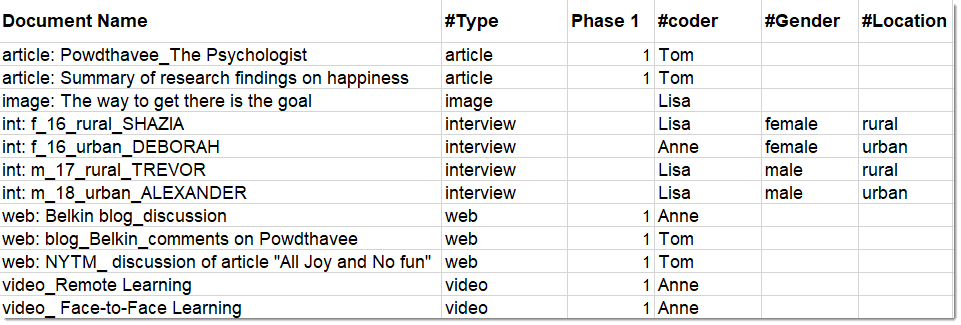
Import Document Groups Table
Select the Import & Export tab in the ribbon and from there the Document Groups button with the down arrow.

This opens a File Manager. Select the Excel file and click Open.
tip
If you want to add new groups even though a few groups already exist, you can proceed as described. Just leave existing groups in the table. ATLAS.ti will recognize them and does not create them anew.
The ATLAS.ti Quotation Level
Christine Silver, expert in computer assisted qualitative data analysis software, explains the ATLAS.ti quotation level as follows:
"When you create a quotation, you’re marking a segment of data that can later be retrieved and reviewed. You might know, right at that point how and why it’s interesting or meaningful, in which case you can immediately capture that – by re-naming it, commenting on it, coding it, linking it to e.g. another quotation, or a memo. If you don’t yet know, you can just create the quotation, and come back and think about it later, perhaps when you have a better overview of the data set in its entirety and are ready to conceptualise meaning in relation to your research objectives."
"One of my favourite things about ATLAS.ti is that quotations can be visualised and worked with in a graphical window, i.e., the ATLAS.ti networks. The content of quotations can be seen within the network, and quotations can be linked, commented upon, and coded in that visual space. This is very useful if you like to work visually or are used to analysing qualitative data manually with highlighters, white-boards, post-it notes etc. Networks can also be used as visual interrogation spaces – for example to review quotations which have more than one code attached, which is very powerful. Everything you do in the network is connected throughout the ATLAS.ti project."
The ATLAS.ti quotation level offers an extra layer of analysis. In ATLAS.ti you are not required to immediately code your data as in most other CAQDAS software. You can first go through your data and set quotations, summarize the quotations in the quotation name and write an interpretation in the comment field. See Working with Quotations. This is useful for many interpretive analysis approach for the process of developing concepts. Once you have ideas for concepts you can begin to code your idea.
This prevents you from falling into the coding trap, i.e. generating too many codes. Codes that can be applied to only one or two segments in your data are not very useful. Code names should be sufficiently abstract so that you can apply them to more than just a few quotations.
You will also see later in the analysis process that you find that none of the further analysis tools like the Code Document Table or the Code Co-occurrence Table seem to be very useful.
If you find yourself generating 1000 or more codes, take a look what you can do with quotations instead. Based on that develop codes on a more abstract level allowing you to build a well-rounded code system.
Creating Quotations in Text Documents
When you code data, quotations are created automatically. See Coding Data.You can however also create quotations without coding. To do so:
Highlight a section in your text, right click and select the option Create Free Quotation. Alternatively, you can also select the equivalent button in the ribbon.
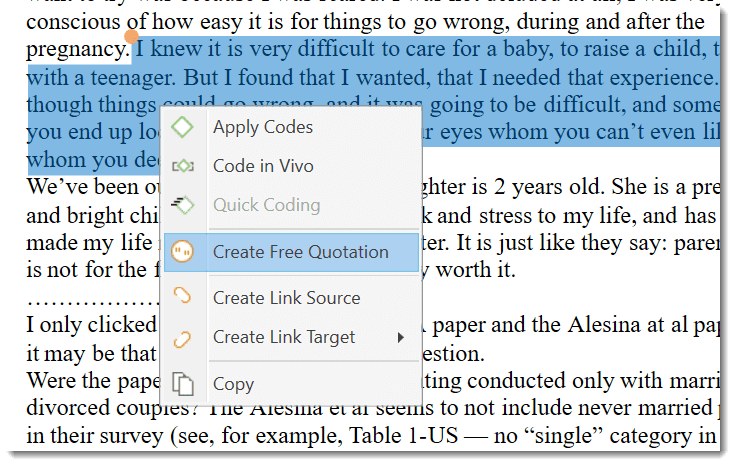
Once a quotation is created, you see a blue bar in the margin area and an entry in the Quotation Manager and the Document tree in the Project Explorer.

Quotation ID
Each quotation has an ID, which consists of two numbers:
-
The ID 8:1 means that the quotation was created in document 8, and it is the first quotation that was created in this document.
-
The ID 3:10 means that the quotation comes from document 3, and it is the 10th quotation that was created in this document.
Quotations are numbered in chronological and not in sequential order. If you want to change this order, see the next section:
Changing the Chronological Order of Quotations
The quotation ID numbers quotations in the chronological order when they have been created. For various reasons, at times users want the quotations to be numbered in the sequential order as they occur in the document.
When you delete quotations, the numbering is not automatically adjusted. Instead, they are gaps. Renumbering the quotations also closes those gaps.
To renumber quotations:
Open the Quotation Manager and select the Renumber Quotations option in the ribbon.

Adding Quotation Names
Being able to name each quotation has a number of useful applications.
- It allows you to quickly glance through your quotations in list view.
- You can use the name field to paraphrase a quotation as required by some content analysis approaches, or to write a short summary.
- You can use the name field for fine-grained coding (line-by-line Grounded Theory coding; initial coding in Constructive Grounded Theory, or as required by other interpretative approaches) instead of applying codes. If you already apply codes during this phase, you will end up with too many codes that are useless for further analysis. See Building a Code System.
- Adding titles to multimedia quotations. See Working with Multimedia Data.
To add a name to a quotation, right-click on a quotation in the margin area, the Project Explorer, the Quotation Manager or in the Quotation Reader and select Rename.
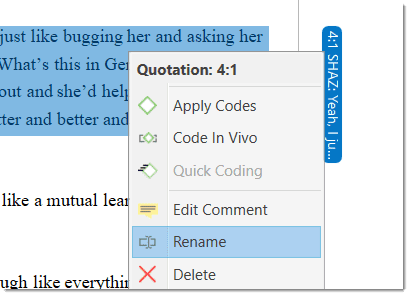
If you select a quotation in the Quotation Manager, you see a preview of the quotation in the panel below the quotation list. This applies to all data file formats.
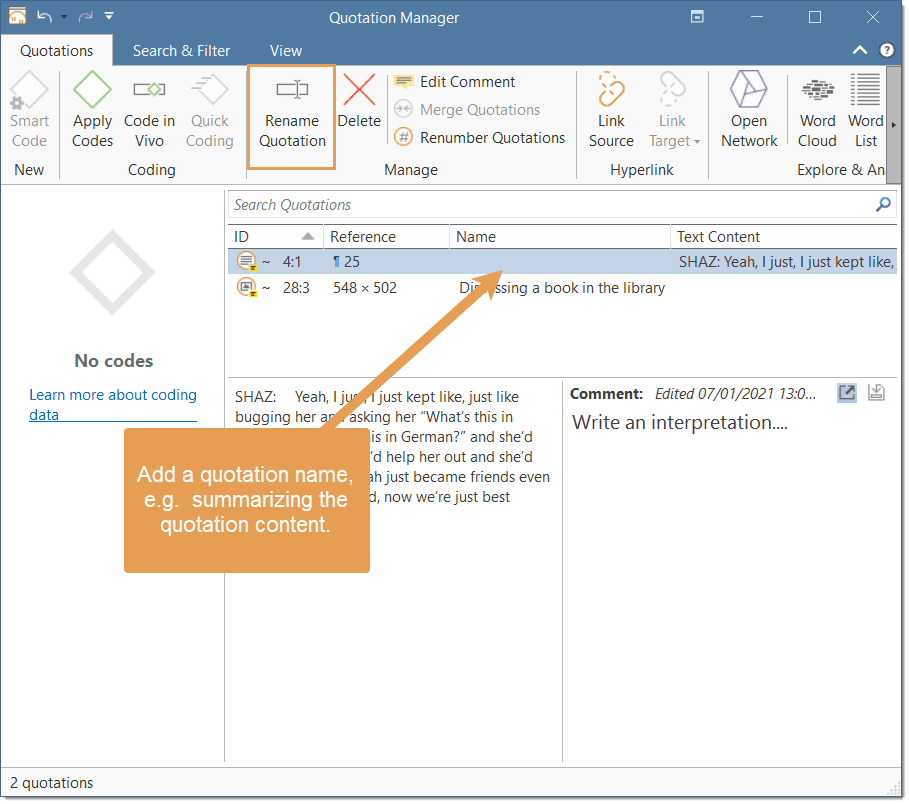
Resize a Quotation
Modifying the length of a quotation is easy.
If you select a quotation, e.g. by clicking on the bar in the margin area, you see a white circle at the beginning and at the end of the quotation. Move the start or end position to a different location depending on whether you want to shorten or lengthen the quotation. This applies to all media types.
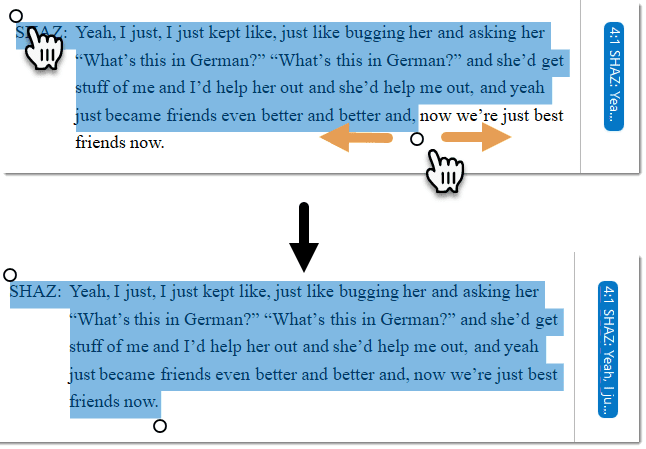
Creating Quotations in PDF Documents
A text PDF file can contain images as well, like picture, graphs or tables. In ATLAS.ti you can create quotations for text and images in PDF documents.
Text selection: Select the text just like you do in a Word file. Make sure you place the cursor right next to a letter.
Selecting a graphical element: Like selecting an area in a graphic file, draw a rectangular area with your mouse. See also Creating Graphic Quotations.
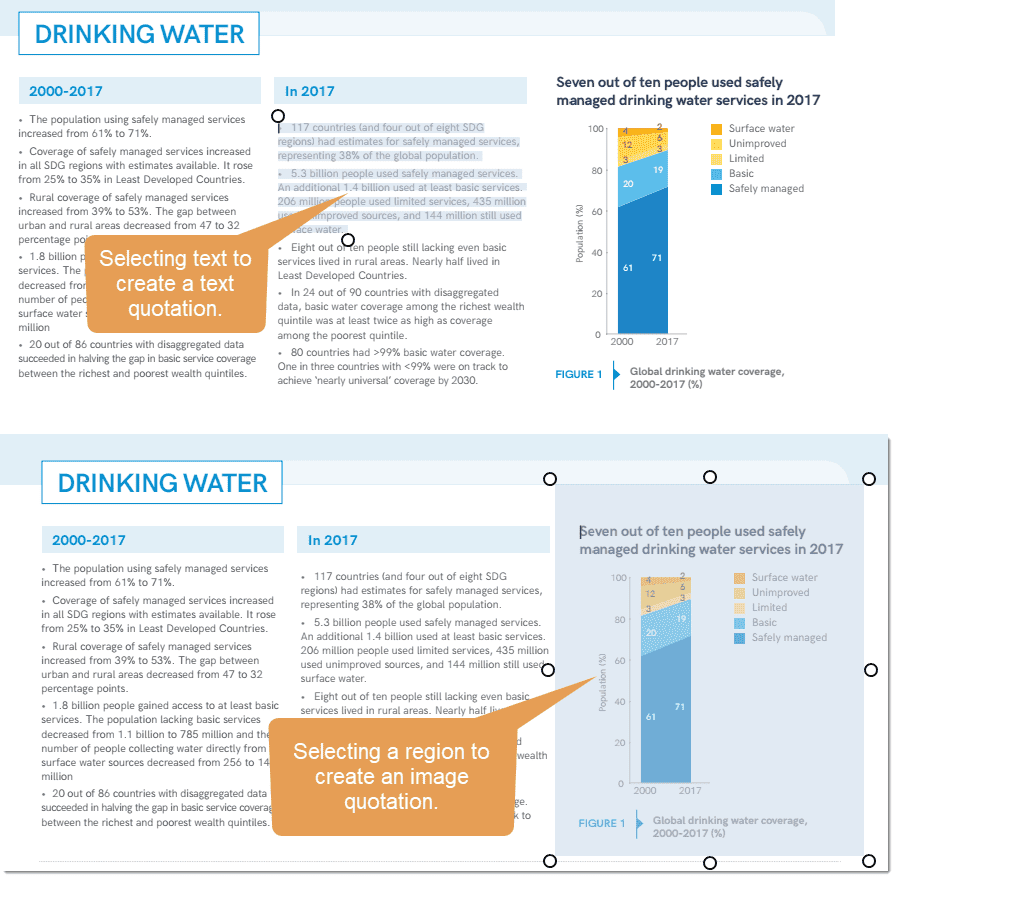
Select a segment in the PDF document, right click and select the option Create Free Quotation. Alternatively, you can also select the equivalent button in the ribbon.
PDF files can be text or image files. Sometimes users accidentally add an image PDF and wonder why they can only create graphic quotations and cannot select text. If this happens, you need to re-create the PDF file, e.g. by letting an OCR scanner running over your PDF image file. In a lot of PDF creators these days this is an option in the software, no additional physical scan is needed.
How to create quotations in audio and video documents, see Creating Multimedia Quotations.
How to create quotations in image documents, see Creating Image Quotations.
Creating Quotations in Image Documents
If you work with pictures, video or geo snapshots, or PDF image documents:
Move the mouse pointer to the upper left corner of the rectangular section that you are going to create, hold down the left mouse button and drag the mouse to the lower right corner of the rectangle. Release the mouse button. You have now created a selection, and the rectangle will be highlighted.
Right click and select the option Create Free Quotation. Alternatively, you can also select the equivalent button in the ribbon.
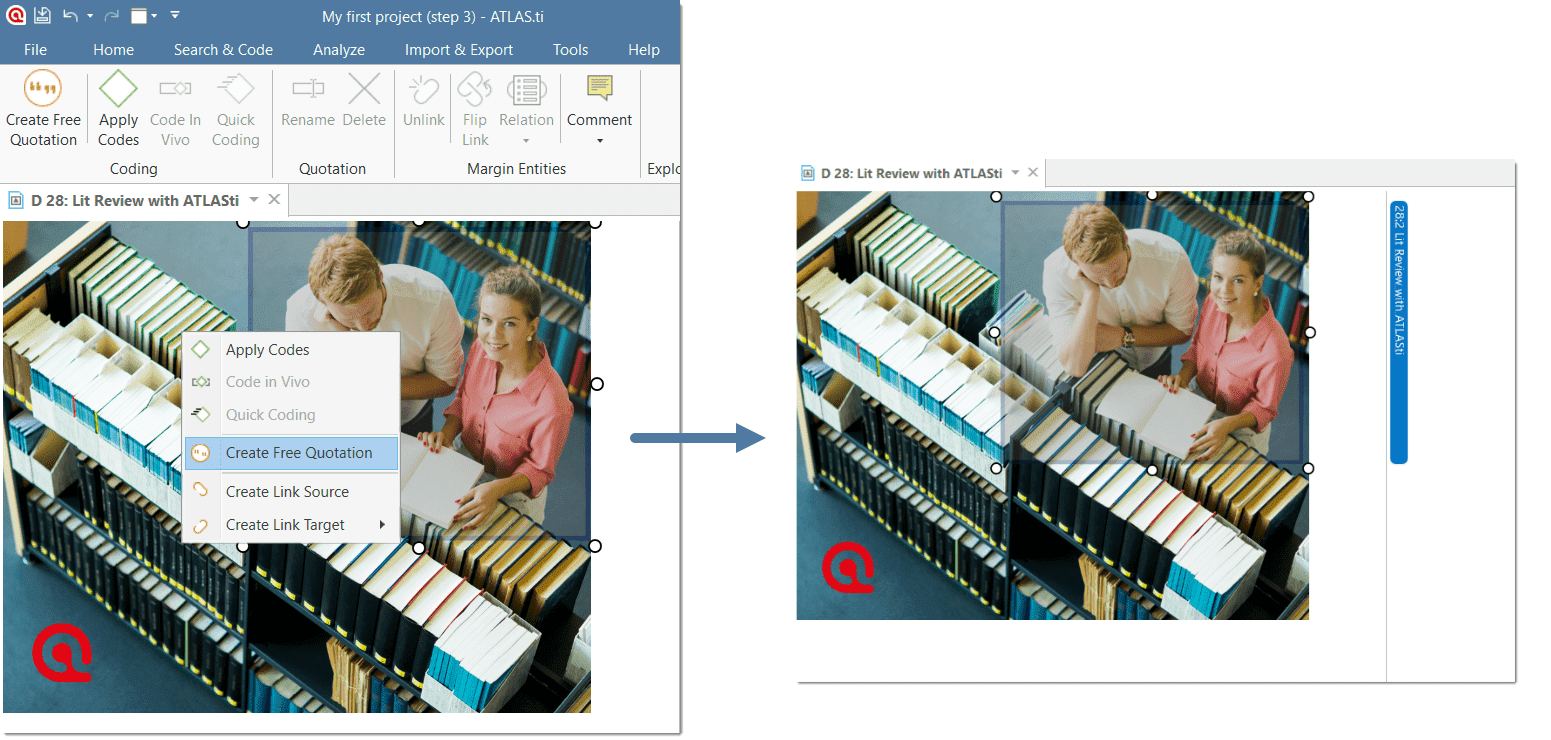
inst
To modify an image quotation, just re-size the rectangle.
You can preview graphical quotations in the Quotation Manager; they can be inserted into networks, and they are included as graphical snippets in reports.
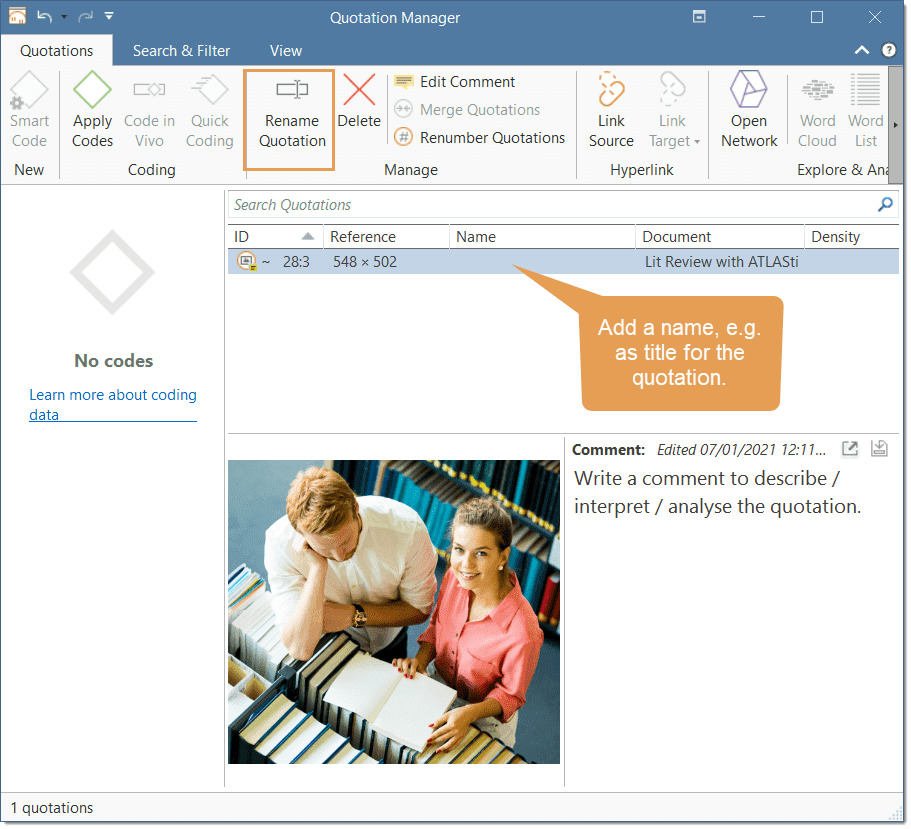
Creating Quotations in PDF Documents
A text PDF file can contain images as well, like picture, graphs or tables. In ATLAS.ti you can create quotations for text and images in PDF documents.
Text selection: Select the text just like you do in a Word file. Make sure you place the cursor right next to a letter.
Selecting a graphical element: Like selecting an area in a graphic file, draw a rectangular area with your mouse. See also Creating Graphic Quotations.

Select a segment in the PDF document, right click and select the option Create Free Quotation. Alternatively, you can also select the equivalent button in the ribbon.
warn
PDF files can be text or image files. Sometimes users accidentally add an image PDF and wonder why they can only create graphic quotations and cannot select text. If this happens, you need to re-create the PDF file, e.g. by letting an OCR scanner running over your PDF image file. In a lot of PDF creators these days this is an option in the software, no additional physical scan is needed.
Working with Multimedia Data
In this section, the following options are discussed:
- Creating multimedia quotations
- Creating multimedia quotations while listening to the audio file or viewing the video file
- Display of multimedia quotations
- Coding multimedia quotations
- Activating and playing multimedia quotations
- Adjusting the size of multimedia quotations
- Renaming a multimedia quotation
- Capturing video snapshots as image documents for further analysis
Creating Multimedia Quotations
You can also immediately code multimedia files. However, as especially video files contain so much more information as compared to text, it is often easier to first go through and segment the audio or video file, i.e. creating quotations before coding.
To create an audio or video quotation, move your mouse pointer on top of the audio waveform and mark a section by clicking on the left mouse button where you want it to start. Then drag the cursor to the end position. The times of the end and start positions are shown, as well as the total length of the segment.
As soon as you let go of the mouse, a quotation is created, and you see the blue quotation boundary in the margin area
If you want to make a selection first and then create a quotation, you can change the default settings. See Project Preferences. If you deactivate Automatically create new quotation on selection, to create a quotation you need to hoover with the mouse over the selection and click Create Quotation.
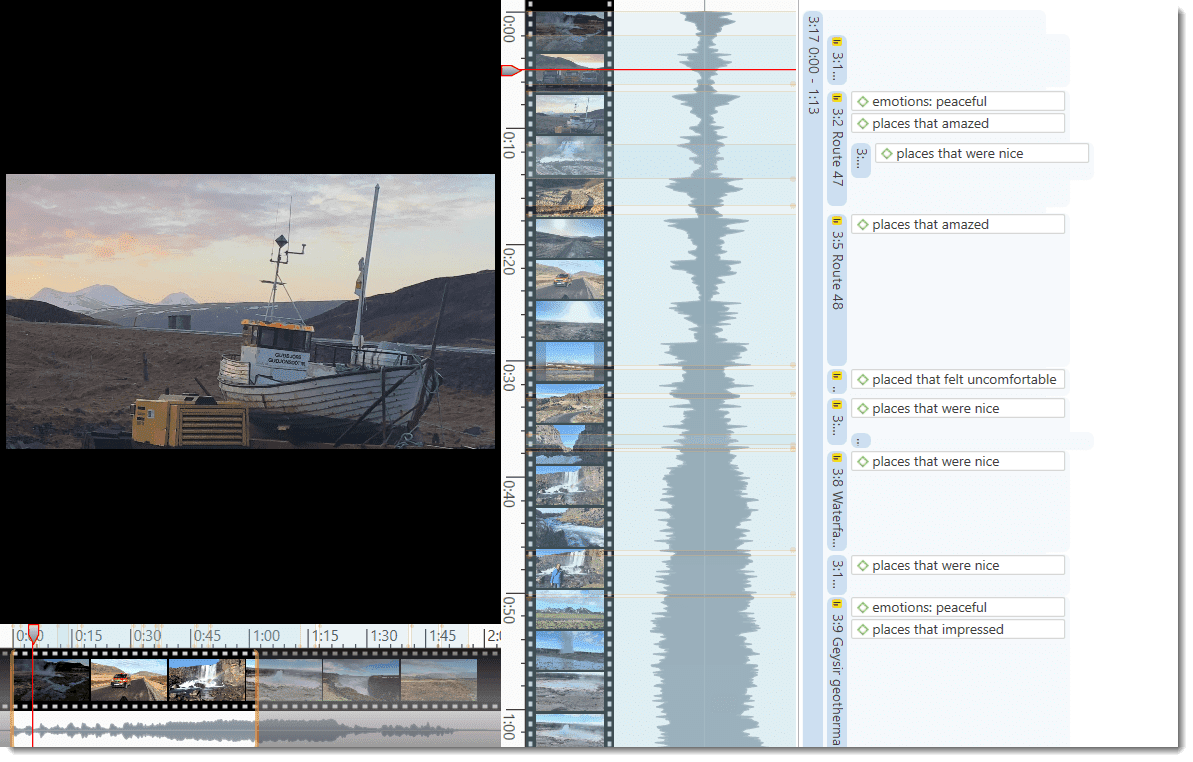
Creating Multimedia Quotations while Listening / Watching
You can also create an audio or video quotation while listening to or viewing a document. For this, you can use the buttons Mark Position and Create Quotation buttons in the toolbar; or the short-cut keys (see below).
Using the Ribbon Buttons
inst
Play the video. If you find something interesting that you want to mark as a quotation, click Mark Position. This set the start position. To set the end point and create a quotation, click Create Quotation.
Continue listening / watching and setting quotations.
Using Short
To mark the start position: use (<) or (,)
To create a quotation: use (>) or (.)
Which short-cut key to use depends on your keyboard. Use those keys where you do not have to use Shift.
Play the video. If you find something interesting you want to mark as a quotation, click on the (,) or the (<) key. This sets the start position.
To set the end position and create a quotation, click on the (.) or (>) key.
-
A new quotation will be listed in the Quotation Manager, the Project Explorer or Quotation Browser. The quotation ID consists of the number of the document plus a consecutive count in chronological order by time when a quotation was created in the document. The quotation ID 15:5 for examples means that this is a quotation in document 15, and it was the 5th quotation that was created in the document.
-
After the ID you see the quotation reference, which is the start position of the audio or video quotation. The name field is empty. You can for instance add a short title for each multimedia quotation, see below.
-
Depending on the media type, the quotation icon changes.
Audio and video quotations can be easily recognized by their special icon.
Coding Multimedia Quotations
Coding multimedia quotations is not different from coding text or image documents:
Right-click the quotation and select Apply Codes. For further information see: Coding Data.
Activating and Playing Multimedia Quotations
In the Margin Area
To play the quotation, double-click on the quotation bar, or hoover over the audio waveform with the mouse and click on the play icon.
You can move the play-head with the mouse to any position within an audio or video file.
From other Places
- You can double-click on a multimedia quotation in the Project Explorer, the Quotations Browser or the Quotation Manager to play it in context.
- You can preview a multimedia quotation in the preview area of the Quotation Manager.
- You can preview a multimedia quotation if it is part of a hyperlink. See Working with Hyperlinks.
Adjusting the Size of Multimedia Quotations
To adjust or change the length of the quotation, drag the start or end position to the desired position.
Renaming a Multimedia Quotation
When you create audio or video quotation, the name field is empty. You can enter a name for instance to add a short description of what the audio or video quotation is all about.
Right-click on the quotation in the margin area or in the Quotation Manager and select the Rename option. This allows you to create a meaningful text output of coded audio and video segments.
Use the comment area to add further information, e.g. describe the segment and offer a first interpretation
See also Making Use of Quotation Name and Comment for Analytical Purposes.
See Example Reports for an instruction on how to create reports for named and commented multimedia quotations.
Capturing Snapshots of Video Frames as Image Documents
If you want to analyze particular frames of your video in more detail, you can capture a snapshot.
Move the play head to the desired position in the video.
Click on the camera icon in ribbon, or right-click on the video and select the option Capture Video Frame.
The snapshot is automatically added as a new image document to your project. See Creating Quotations im Images for further information on how to work with image files.
Working with Quotations
Video Tutorial: Working with quotations.
Making Use of the Quotation Names and Comments for Analytical Purposes
You can use the quotation name field for paraphrasing or summarizing the content of textual quotations, as a title for video and image quotations, or for entering the location for geo quotations.
The quotation name can also be used for instance for the phase of line-by-line coding in Grounded Theory, or for initial coding in Constructive Grounded Theory, or for other inductive approaches. Instead of generating too many codes on a descriptive level, the quotation name can be used for this type of coding.
Open the Quotation Manager into a new tab group next to the document you are currently working on. See Working with Tabs and Tab Groups.
Create a quotation in the document. This quotation will also be added to the Quotation Manager.
Right-click on a quotation in the Quotation Manager and select Rename, or select F2, or select the rename button in the ribbon of the Quotation Manager.

The example below shows an example where a name was added to add titles for video quotations:
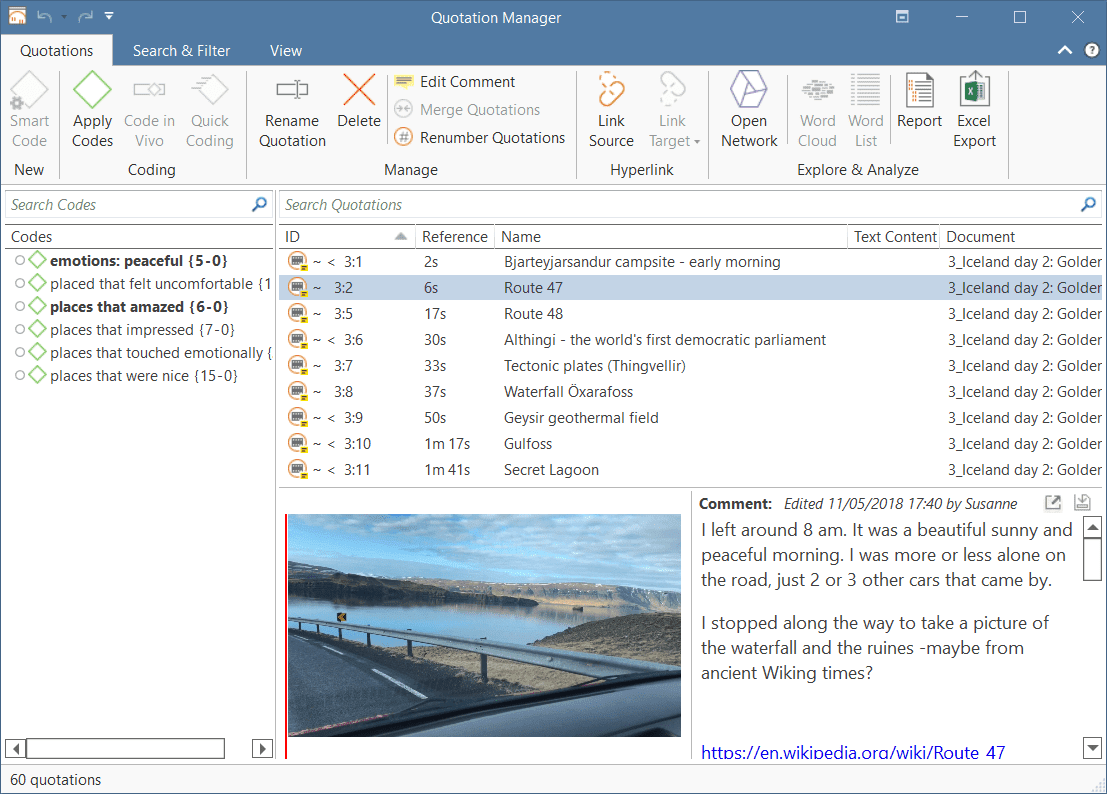
Further interpretations can be written into the comment field of the quotation. Below you see an example where this feature was used extensively for a grounded theory analysis.
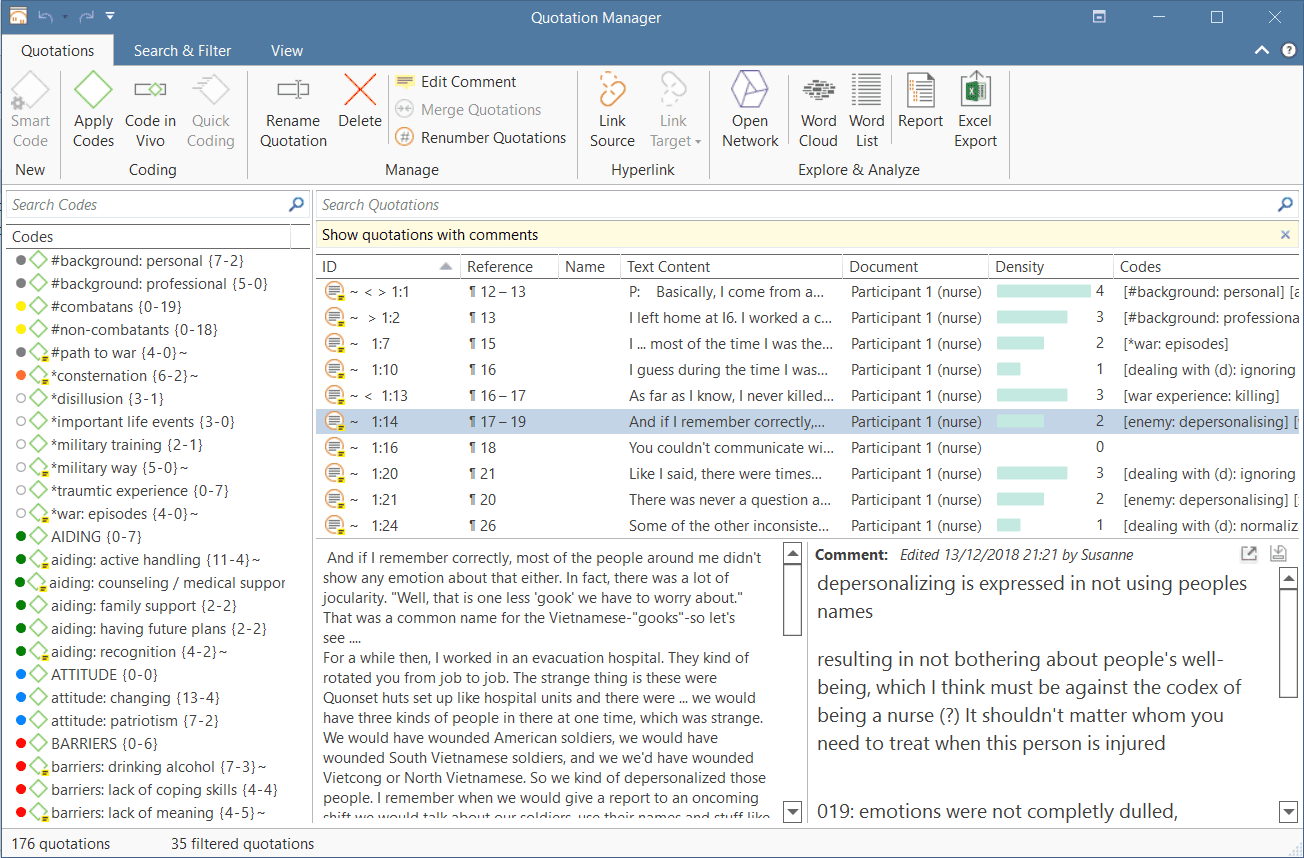
If you are interested to read more about this study, you can read the following paper CAQDAS and Grounded Theory Analysis, or the book chapter: Grounded Theory Analysis and CAQDAS: A Happy Pairing or Remodeling GT to QDA.
See Example Reports for an instruction on how to create reports for named and commented (multimedia) quotations.
Reviewing Coded Quotations and Modify Coding
There are several ways how to review coded quotations:
-
Double-click on a code anywhere. This opens the Quotation Reader - or gives an option to open the Quotation Reader.
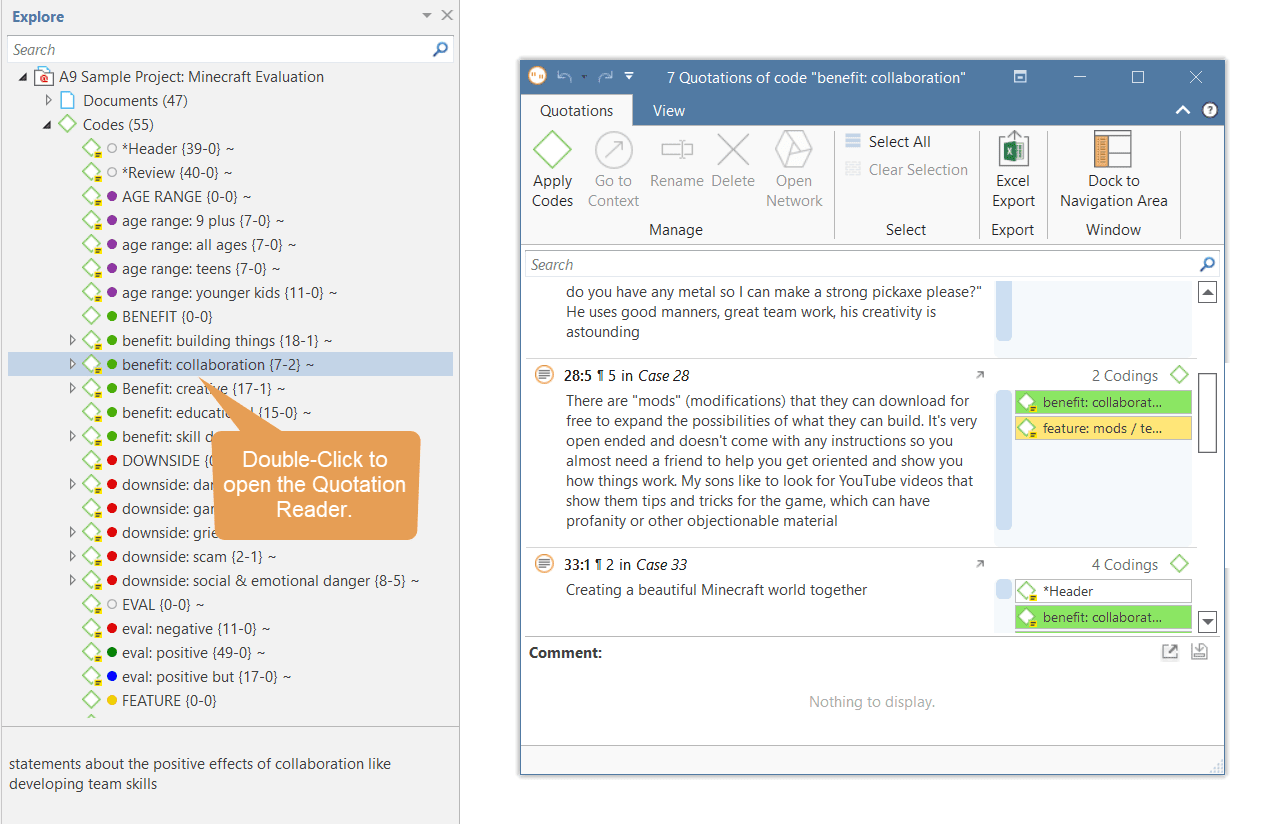
-
Open the Quotation Manager and select a code in the side panel.
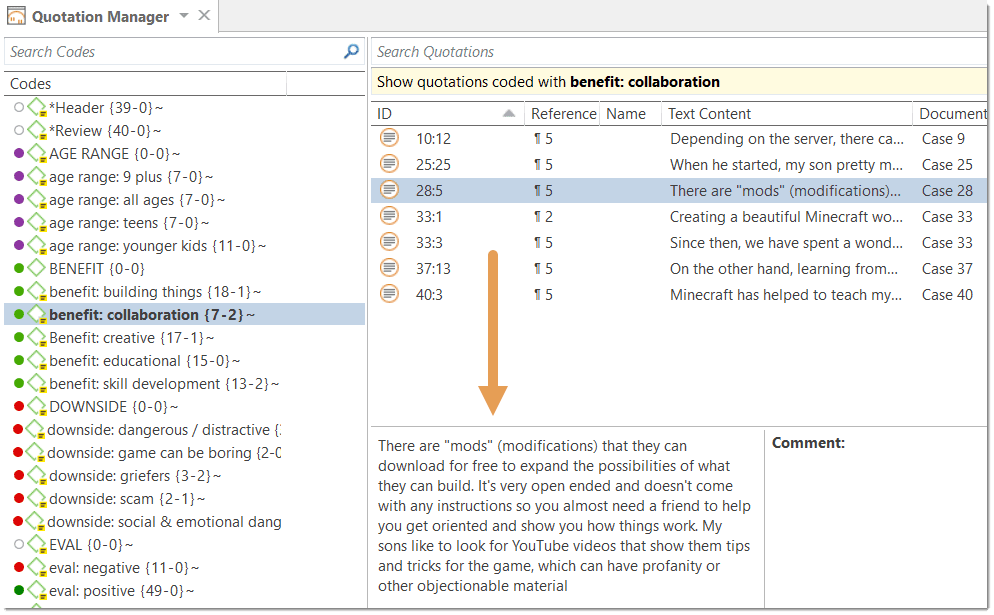
-
Create a query in the Query tool, a Code Document Table, or a Code Co-occurrence Table and review quotations in the result lists.

For further information, see Quotation Reader.
Displaying Quotations in Context
Displaying quotations in context means that you can view a quotation that is listed in a browser or a list in the context of the original data.
-
Double-click on an entry in the Quotation Manager.
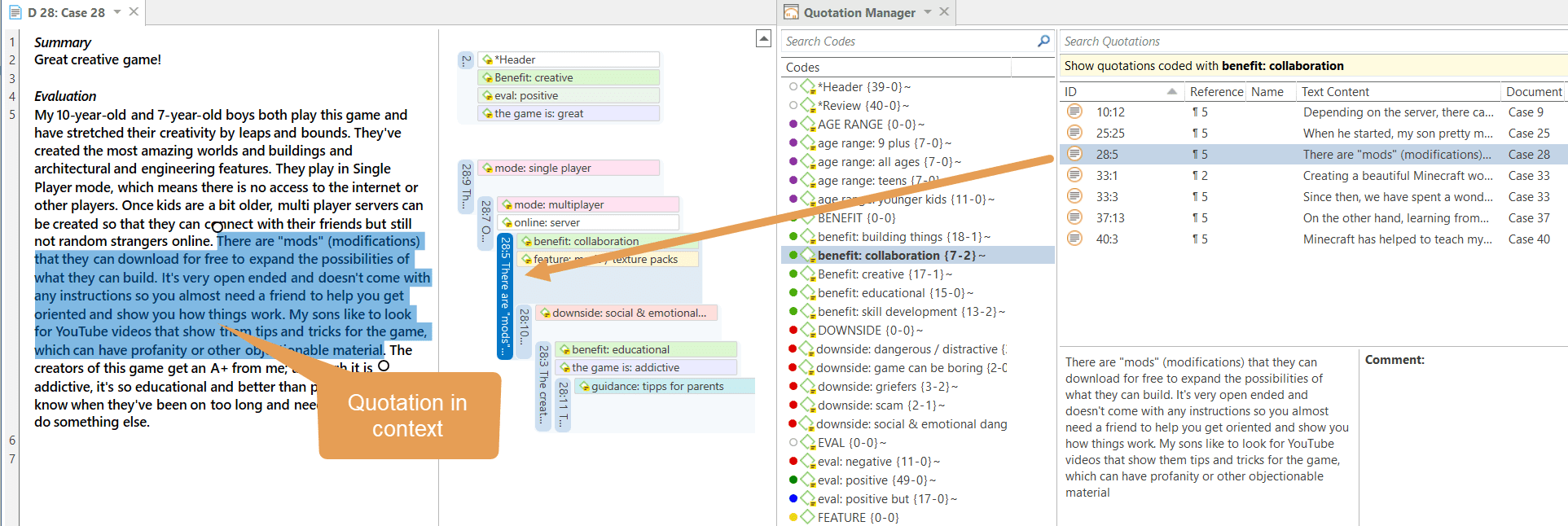
-
Click on the quotation bar in the margin area.
-
Double-click on the quotation in the Document sub-branch in the Project Explorer.
-
Once you have coded data, quotations can also be retrieved via their codes. See Quotation Reader.
-
Quotations can be activated in networks. See Working With Networks.
-
Quotations can be activated from a result list of a project search (see Project Search).
Deleting Quotations
To delete a single quotation, right-click on a quotation and select the Delete option from the context menu.
This option is available in all browsers, windows and lists where you see quotations, i.e. the Project Explorer, the Quotation Reader, the Quotation Manager, in a network, or the margin area.
Deleting a quotation does not delete the data itself. Think of quotations like a layer on top of your data. Deleting this layer does therefore not delete the underlying data. However, all other existing links like links to codes, memos or hyperlinks will be removed when deleting a quotation.
Referencing Quotations
It may be useful to reference quotations in your memos or comments, or in documents you write in other apps.
You can do all of that by simply copying a quotation from anywhere, and pasting them into your text. Drag and drop will also work. And in a memo or document, you can also just hover over the paragraph numbers and click the button that appears there to pick quotations to insert.
When inside a text document, ensure you copy the quotation and not just the text by right-clicking the quotation in the margin.
The quotations that you insert in this way include the full text, reference, and a clickable link that will open the quotation in its document, so you can see it in context. This even works from outside ATLAS.ti!
When collaborating in a team, you can also send your colleagues a link to a quotation by pasting it into your messaging app of choice – provided they have a copy of the same project on their computer that contains that quotation.
Changing the Chronological Order of Quotations
The quotation ID numbers quotations in the chronological order when they have been created. For various reasons, at times users want the quotations to be numbered in the sequential order as they occur in the document.
When you delete quotations, the numbering is not automatically adjusted. Instead, they are gaps. Renumbering the quotations also closes those gaps.
To renumber quotations:
Open the Quotation Manager and select the Renumber Quotations option in the ribbon.

Coding Data - Basic Concepts
“Coding means that we attach labels to 'segments of data' that depict what each segment is about. Through coding, we raise analytic questions about our data from […]. Coding distills data, sorts them, and gives us an analytic handle for making comparisons with other segments of data” (Charmaz, 2014:4).
“Coding is the strategy that moves data from diffuse and messy text to organized ideas about what is going on” (Richards and Morse, 2013:167).
"Coding is a core function in ATLAS.ti that lets you “tell” the software where the interesting things are in your data. ... the main goal of categorizing your data is to tag things to define or organize them. In the process of categorization, we compare data segments and look for similarities. All similar elements can be grouped under the same name. By naming something, we conceptualize and frame it at the same time" (Friese, 2019).
Independent Code / Category Code / Subcode
ATLAS.ti 22 offers you new ways to organize your codes in the code system. If you do not have the need to organize your code into a hierarchy of higher and lower order codes, you can work with independent codes. If you want to create a hierarchy of codes, you can make use of category codes and subcodes. If some codes do not fit in any category, they can just remain independent codes.
An additional way to organize your codes are folders. You can add independent codes and categories with their subcodes to folders. Folders can also contain other folders.
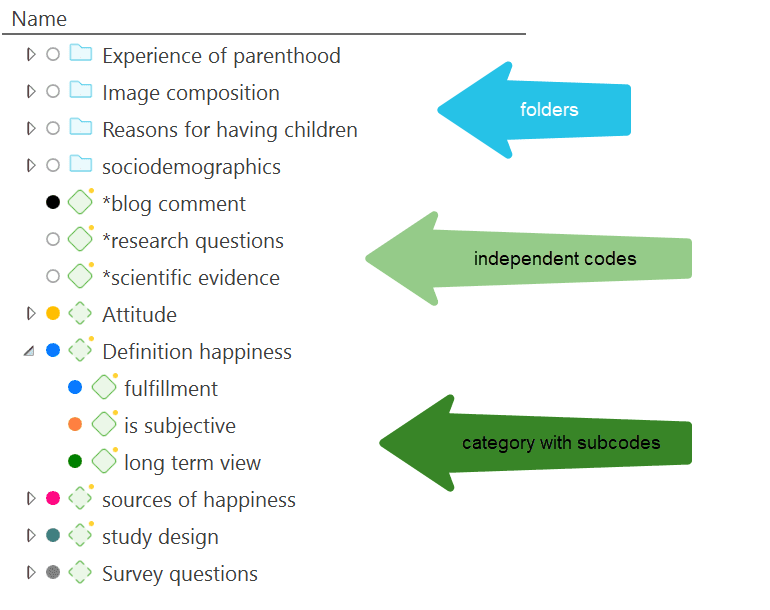 Below each of these types are explained in more detail:
Below each of these types are explained in more detail:
Independent code: If you start coding your data, and you begin with creating some new codes, those will be independent first level codes. They remain independent codes until you add them to a category as subcode. The groundedness of an independent code is the number of quotations coded by it.
Free code: A free code is also an independent code, but one that has not (yet) been used for coding. Its groundedness is zero and it has no subcodes.
Category Code: A code becomes a category, when you drag & drop codes underneath it. These can be independent codes or subcodes that you move from a different category. The category itself does not code quotations. Therefore, you can only insert other codes as subcodes underneath if the code is not linked to quotations.
The reason for this is that via the category code you can retrieve all quotations from all sub codes. So, if you want an aggregated view of your data, just select the category. If you could apply the category code and its subcodes to the same quotations, you would get duplicated quotations. This is prevented by not allowing the category code to be used for coding.
The groundedness of a category code is the number of quotations coded by all of its subcodes. Since you can apply several codes to the same quotation, the total for a category can differ from simply adding up quotations for all subcodes. Both sums are only equal, if you use subcodes in a mutual exclusive manner, as for example required for inter-code agreement analysis
For all previous ATLAS.ti users, because the category code can retrieve all quotations from its subcodes, the semantic operators SUB, UP and SIBLING are no longer needed and have been removed from the query tool.
Subcode: A subcode is a code that is sorted under a category code. No further subcodes can be created under subcodes. The reason for this is methodical rather than technical. Each code should only appear once in a code system. See: How to build a code system. If you use a deeper hierarchy, you will likely start duplicating and even multiplying codes at the lower levels. Not only does this make your code system long and difficult to maintain, it also prevents you from performing effective comparative analysis.
Folder: Folders help you organize your codes. You can move independent codes and categories with their subcodes into folders. A folder can also contain folders, as many as you want. Folders cannot be used to code data.
The number behind a folder, is the number of quotations coded by independent codes or sub codes that are contained within the folder. As you can apply multiple codes to the same quotation (i.e., multi-value coding), the total can be different from adding up all the numbers for all independent and all subcodes.
How Groundedness is Counted
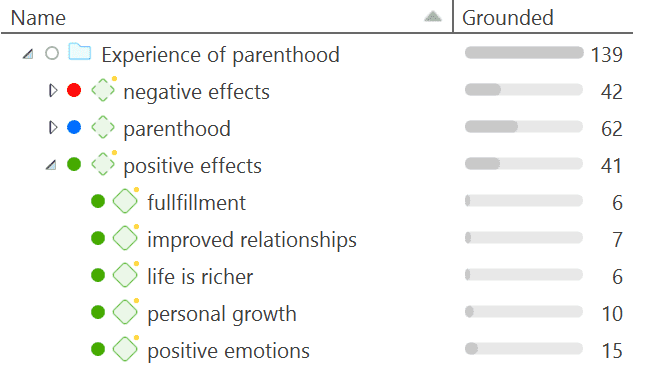 Independent Code: The groundedness of an independent code is the number of quotations coded by it.
Independent Code: The groundedness of an independent code is the number of quotations coded by it.
Category Code: The groundedness of a category code is the number of quotations coded by all of its subcodes. Since you can apply several codes to the same quotation, the total for a category can differ from simply adding up quotations for all subcode. Both sums are only equal, if you use subcodes in a mutual exclusive manner, as for example required for inter-code agreement analysis
The image above shows the category positive effects. Adding up the quotations coded by all subcodes, the sum is 44. The groundedness for the category however is 41. This means there are 3 quotations that are coded with more than one of the subcodes. This is illustrated in the image below:
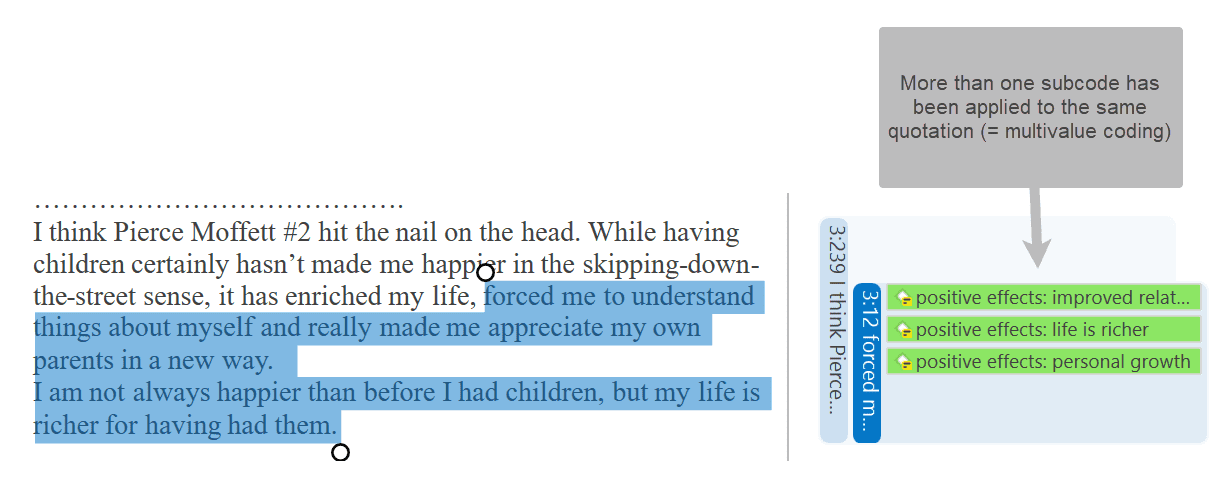 Subcode: The groundedness of a subcode is the number of quotations coded by it. For example, the subcode life is richer is coding 6 quotations.
Subcode: The groundedness of a subcode is the number of quotations coded by it. For example, the subcode life is richer is coding 6 quotations.
Folder: The groundedness of a folder is the number of quotations coded by independent codes or subcodes that are contained within the folder. As you can apply multiple codes to the same quotation (i.e., multi-value coding), the total can be different from adding up all the numbers for all independent and all sub codes or categories. In the above example the folder Experience of Parenthood has a groundedness of 139 quotations. This is lower than the sum for the three categories contained in the folder (42 + 62 + 41 = 145). Again, this means that some quotations are coded by more than one of the codes in the folder. Counted are only unique quotations and not the number of codings.
How Density is Counted
The code density is unrelated to the code hierarchy and the number of codings. Density is defined as the number of linkages between two codes. You can link two codes to each other via drag-and-drop, or as recommended, in a network. See the chapter on networks for further information.
Creating and Applying Codes
Video Tutorial: How to code data.
Creating New Codes without Coding
You can create codes that have not (yet) been used for coding. Such codes are called "free" codes. See Coding Data - Basic Concepts. This can for example be useful when ideas for codes come to mind during normal coding work and that cannot be applied to the current segment but will be useful later. If you already have a list of codes, possibly including code descriptions and groupings elsewhere, you can use the option: Importing A List Of Codes.
In the Home tab, click on New Entities and from the drop-down menu select New Code(s). The short-cut key combination is Ctrl+K.
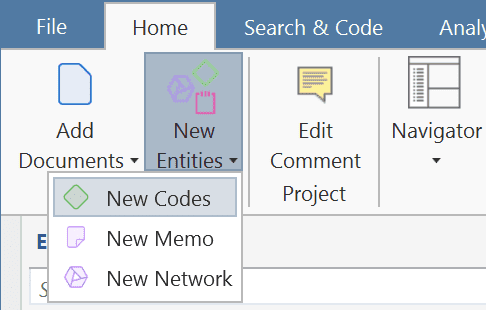
You can also create new codes in the Code Manager.
Click on the button New Codes in the ribbon of the Code Manager.
Coding with a New Code
Open a document and highlight a data segment, i.e., a piece of text, audio or video data, an area in a graphic document, or a location in a geo document.
Right-click and select Apply Codes, or use the short-cut Ctrl+J, or click on the 'Apply Codes' button in the ribbon.
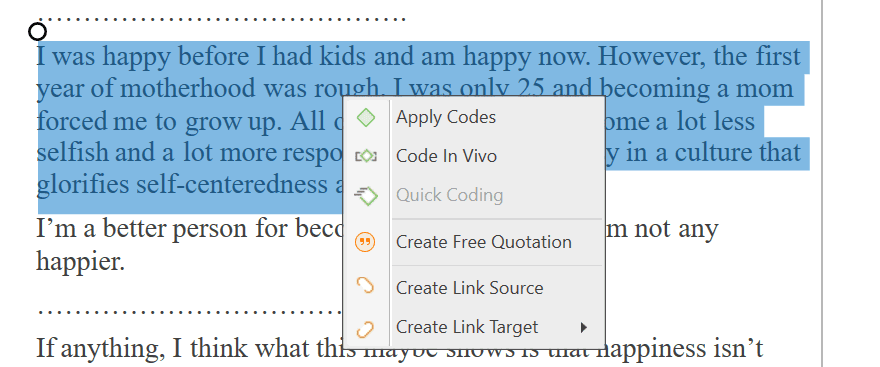
Enter a name and click on the plus button or press enter. After the code is created, you can enter a definition in the comment field.
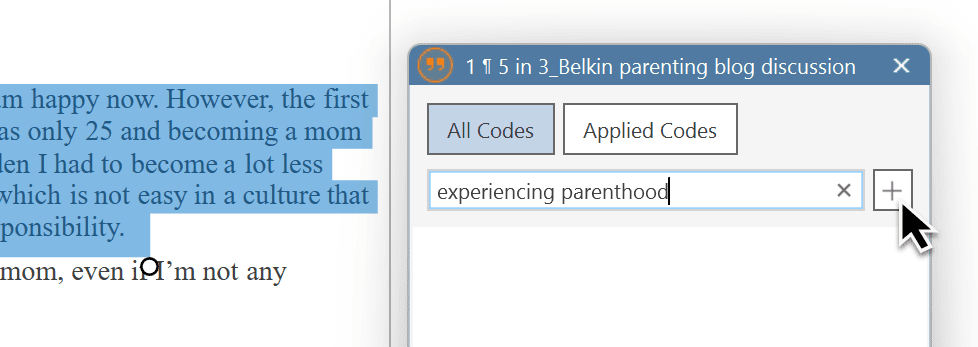 You can continue to add more codes, or simply continue to select another data segment. The dialogue closes automatically.
You can continue to add more codes, or simply continue to select another data segment. The dialogue closes automatically.
for more information on working with data other than text, see Working With Multimedia Data and Working With Geo Docs.
Code In-Vivo
Use in-vivo coding when the text itself contains a useful and meaningful name for a code.
In-Vivo coding can only be applied to textual primary documents.
In-vivo coding creates a quotation from the selected text AND uses the selected text as the code name. If the selected text's boundaries are not exactly what you want for the quotation, modifying the quotation's "spread" is often the next step after creating the in-vivo code. See Working with Codes > Modifying the length of a coded segment.
Select a segment in a text document, right-click and select Code in Vivo, or the corresponding button in the ribbon (Windows) / toolbar (Mac).
"Over-dependence on in-vivo codes ... 'can limit your ability to transcend to more conceptual and theoretical levels of analysis and insight' (Saldana, 2009:77). Where they are descriptive and unique to one person, the coder needs to move on from them quite quickly to generate a more analytical code." (Bazeley, 2013:166).
Display of Coded Data Segments in the Margin Area
The coded segment is displayed in the margin area. A blue bar marks the size of the coded segment (= quotation), and the code name appears next to it. When coding data in this way, a new quotation is created automatically, and the code is linked to this quotation.

The yellow post-it within the code icon indicates that a comment has been written for this code.
Applying Existing Codes
Existing codes can be applied using the Coding Dialogue or via Drag & Drop.
Using the Coding Dialogue
Highlight a data segment, right-click and select Apply Codes, or simply double-click on the quotation.
 It is easy to quickly jump to the code you are looking for by entering the first few letters of the code in the search field.
It is easy to quickly jump to the code you are looking for by entering the first few letters of the code in the search field.
Select one of the existing codes, click on the plus button or press Enter.
Drag-and-Drop Coding
Drag-and-Drop Coding is possible from the following locations:
- the Codes branch from the Project Explorer
- the Code Browser in the navigation panel.
- the Code Manager
At the end of this chapter, you find other Drag-and-Drop options that are also available for your convenience.
Drag & Drop Coding from the Code Browser
To open the Code Browser, go to the Home ribbon and select Codes from the Navigator section. The search field in the Code Browser facilitates handling a longer code list. Rather than scrolling the list, you enter the first letters of a code.
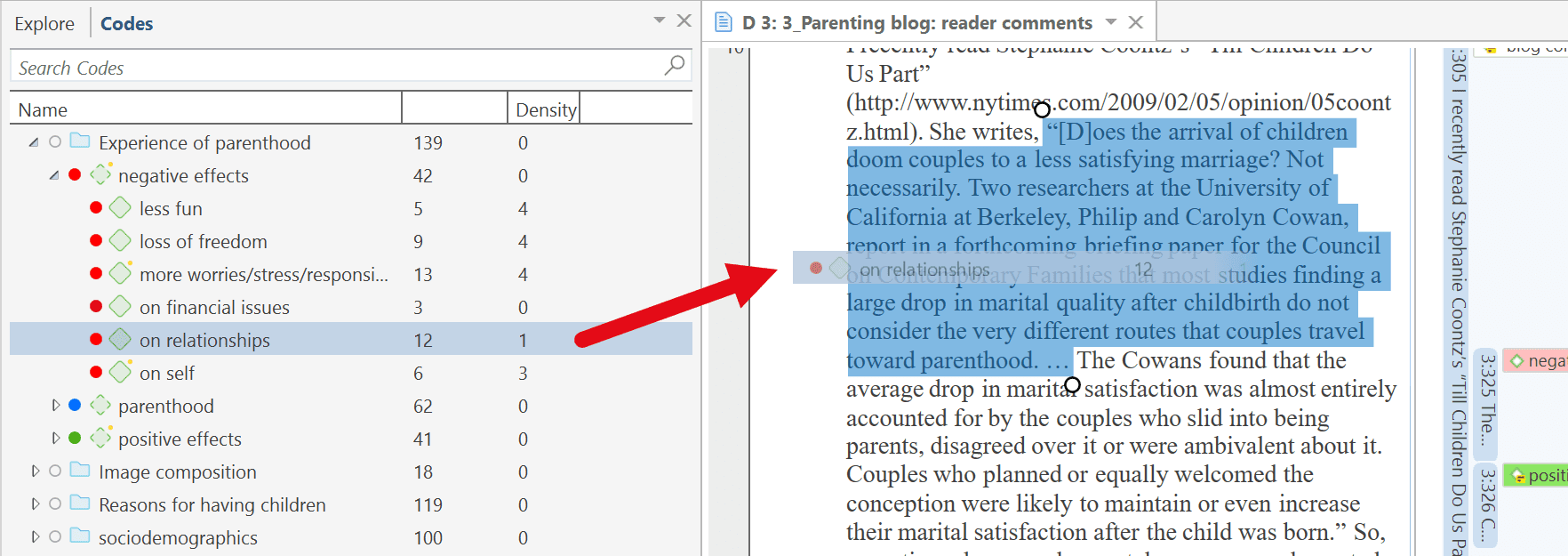
Highlight a data segment, select one or more codes from the code list and drag the code onto the highlighted data segment.
By the way, in case you were wondering, code density is not a value that is calculated by the software. It goes up, when the researcher begins to link codes to each other. See Working With Networks.
Drag & Drop Coding from the Code Manager
When using the Code Manager for drag & drop coding, it is recommended to place it next to the data you are coding into a new tab group. See Working With Docked And Floated Windows. You can quickly access codes using code groups to filter the code list, or by using the search field. In the Code Manager you can see and edit code comments.

Highlight a data segment, select one or more codes from the code list and drag the code onto the highlighted data segment.
Quick Coding
Quick Coding assigns the last used code to the current data segment. This is an efficient method for the consecutive coding of segments using the most recently used code.
Highlight a data segment or click on an existing quotation.
Right click and select Quick Coding from the context menu, or use the short-cut Ctrl+L. Another option is to click on the Quick Coding button in the ribbon.
Document Ribbon when Coding

Create Free Quotation: Use of you want to create a quotation without coding it.
Apply Codes: Opens the Coding Dialogue.
Code In vivo: In-vivo coding creates a quotation from the selected text AND uses the selected text as the code name.
Quick Coding: Quick Coding assigns the last used code to the current data segment.
Search & Code: You can access the four Search & Code functions from here:
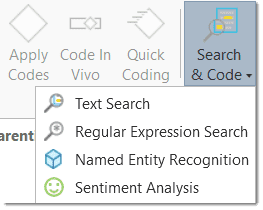
Focus Group Coding: You can start the Focus Group Coding function from here.
Rename: This allows you to rename a selected quotation.
Delete: Select a code in the margin area or a quotation. Only the quotation will be deleted.
Unlink: You can unlink codes from a quotation, or a hyperlink using this option.
Reverse Link: Reverses the link of a selected hyperlink.
Relation: Opens the Relation Manager.
Comment: Click the drop-down arrow and select which comment you want to view or edit.
Word Cloud: Creates a word cloud from the document.
Word List: Creates a word list from the document.
Concepts: Searches for concepts in your data to review and autocode. See Concept Search.
Search Document: Searches the content of the document.
Edit: Starts edit mode, so you can modify the content of the document. When selected the ribbon changes, and you see the available edit options:

Print: Click on this option if you want to print the document as you see it on your screen including the margin area. After clicking this option, the following printer dialog opens:
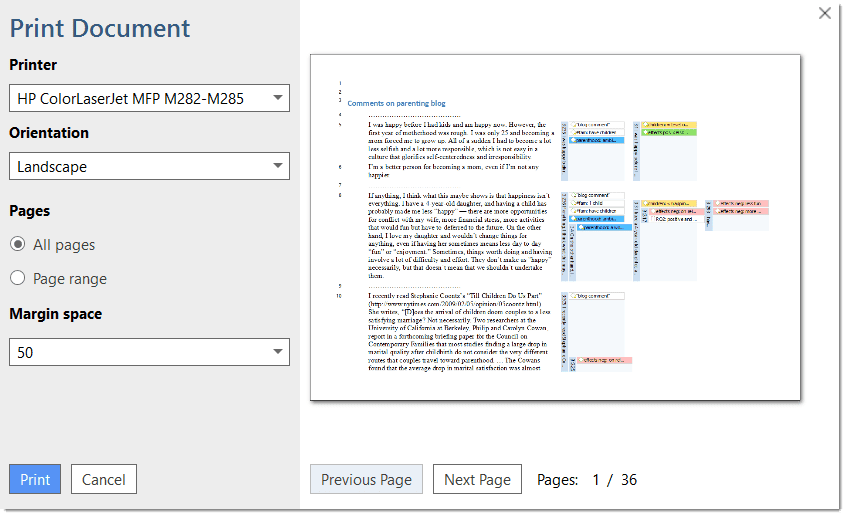
Printer: Select if you want to send the output to a printer or whether you want to save it as PDF document.
Orientation: The default selection is 'Landscape', as this is likely the best option to see the document and all codes in the margin area.
Margin space: Under 'Margin space', you can adjust the width of the margin if you need more or less space.
Pages: You can print all pages, or a page range.
With the 'Previous' and 'Next Page' buttons you can preview all pages.
The print with margin option is available for text, PDF and image documents.
Keyboard Shortcuts For Coding
| Coding | Short-Cut |
|---|---|
| Create Free Code | Ctrl+K |
| Apply Codes | Ctrl+J |
| Quick Coding | Ctrl+L |
| Code In-Vivo | Shift + Ctrl + V |
More Drag-And-Drop Options
-
You can drag-and-drop quotations in the Quotation Manager to a code in the side-panel in the Quotation Manager.
-
You can drag-and-drop quotations from the Quotation Manager to a code in Code Manager.
-
You can drag-and-drop one or more codes to a quotation in the Quotation Manager.
-
You can drag-and-drop one or more codes to a quotation in the Quotation Browser in the Navigation Panel.
-
You can drag-and-drop quotations from the Quotation Browser to a code in Code Manager.
-
You can drag-and-drop quotations from the Quotation Browser in the Navigation panel to a code in side panel of the Quotation Manager.
Writing Code Comments
Code comments can be used for various types of purposes. The most common usage is to use them for a code definition. If you work in teams, you may also want to add a coding rule, or an example quote. If you work inductively, you can use code comments to write down first ideas of how you want to apply this code. You can also use it to write up summaries of all segments coded with this code and your interpretation about it. There are several ways to write a code comment.
- Adding a code comment when creating a new code in the coding dialog:
Enter a new code name and click on the + to create the code. Now you can enter a description or code definition in the comment field.
- Select a code in the Project Explorer or the Code Browser. The comment field is shown below the list.
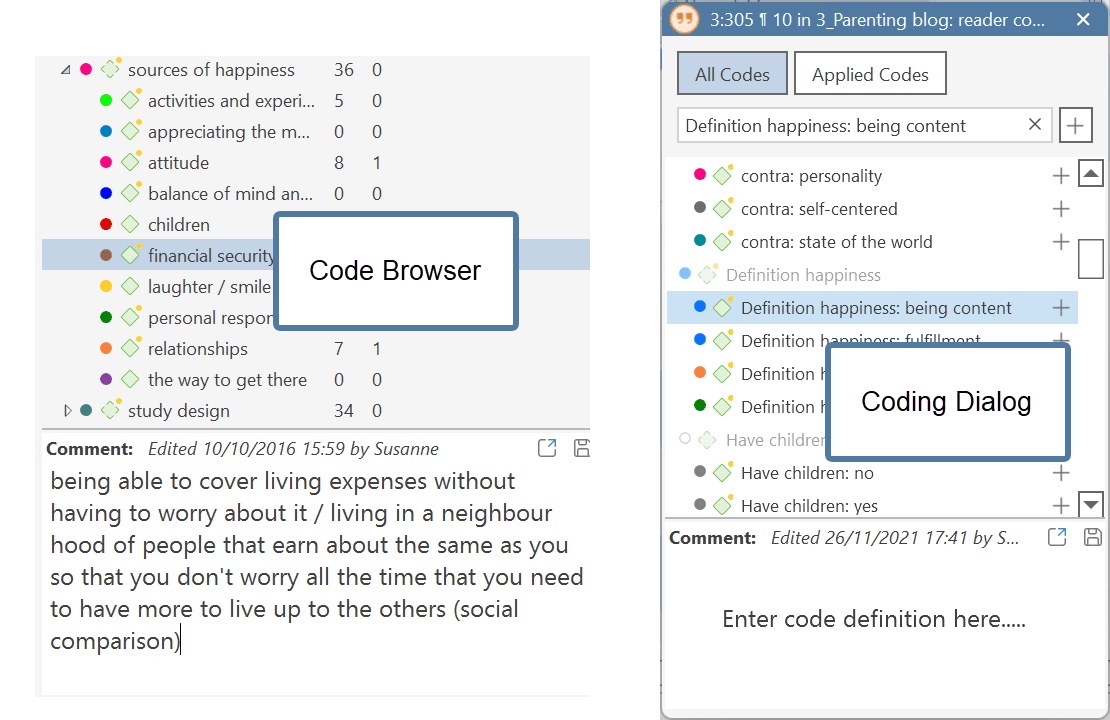
- In the margin area, you can double-click on a code to open the editor for writing a comment editor. Another option is to right-click on a code and select the Edit Comment option from the context menu. You can also click on the Edit Comment button in the ribbon of the contextual Code tab.
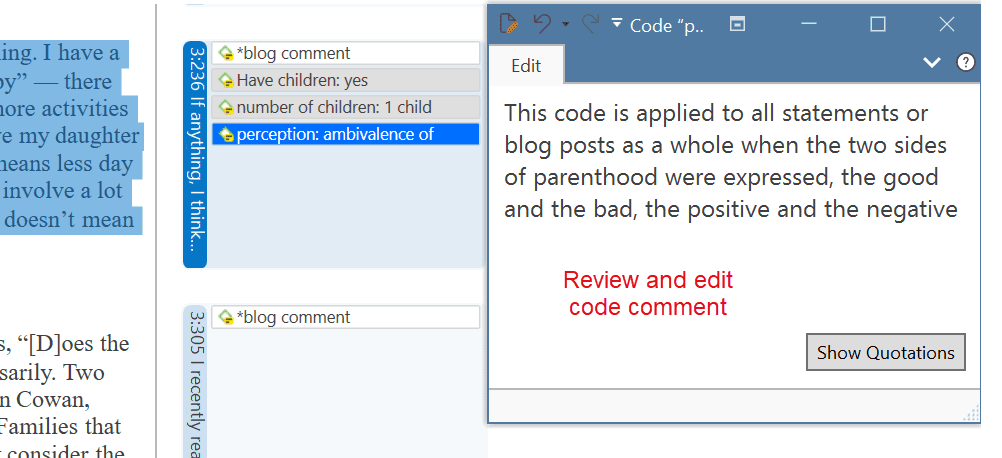
- In the Code Manager is open, you can use the comment field at the bottom of the window. Note that you can switch between seeing bar charts or the comments.
Another option is to right-click on a code anywhere and select the Edit Comment option from the context menu.
All codes that have a comment shows a little yellow dot on top right-hand side of the code icon.
Working with Codes
Modifying the Length of a Coded Segment
Select the quotation by clicking on the quotation bar or code in the margin area. Then move the handle in form of a little white circles to the right or left, or up and down, depending on whether you want to shorten or lengthen the quotation.
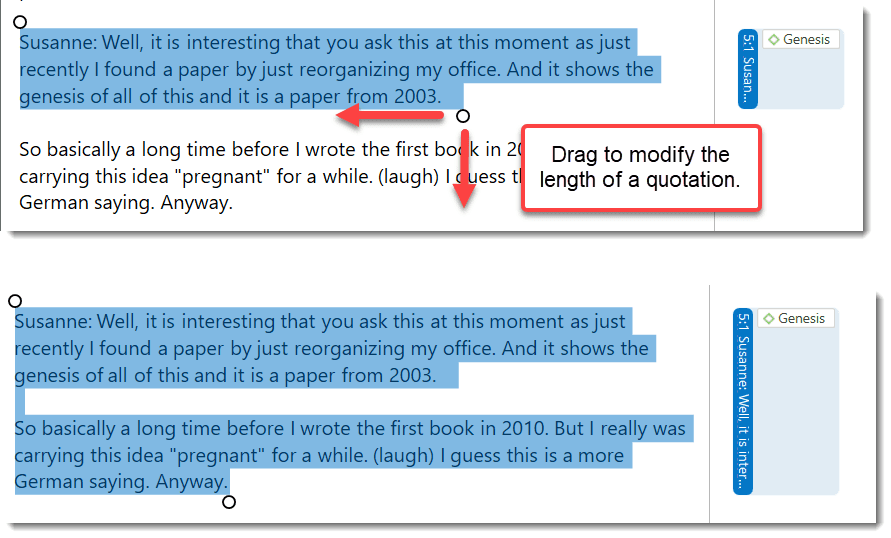
Removing a Coding
This option is the reverse function of coding. It removes the links between codes and quotations. Unlike the delete function, neither codes nor quotations are removed; only the association between the code, and the quotation is removed.
In the Margin Area
Right-click on the code in the margin area and select the option Unlink from the context menu.
In the Coding Dialogue
Double-click on quotation in the margin area. This opens the Coding Dialogue. Click on Applied Codes to quickly see which codes have been applied to the quotation. Click on the button with the minus (-) to remove a code.
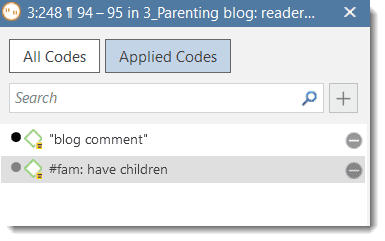
Replacing a Code via Drag & Drop
If you want to replace a code that is linked to a data segment:
You can drag and drop another code from either the Project Explorer, Code Browser, or the Code Manager on top of it.
Adding, Changing and Removing Code Color
Via the ribbon
To change the code color, select one or multiple codes in the Code Manager and click on the Change Color button in the Code ribbon. Select one of the offered colors.
To remove code color, select one or multiple codes in the Code Manager, click on the Change Color button in the Code tab and click on Remove color.
Code color can also be modified in a network. See Further Options in Networks.
Via the context menu
Select one or multiple codes in the Code Manager, the Project Explorer or Code Browser, right-click and select Change Color from the context menu. Select one of the offered colors.
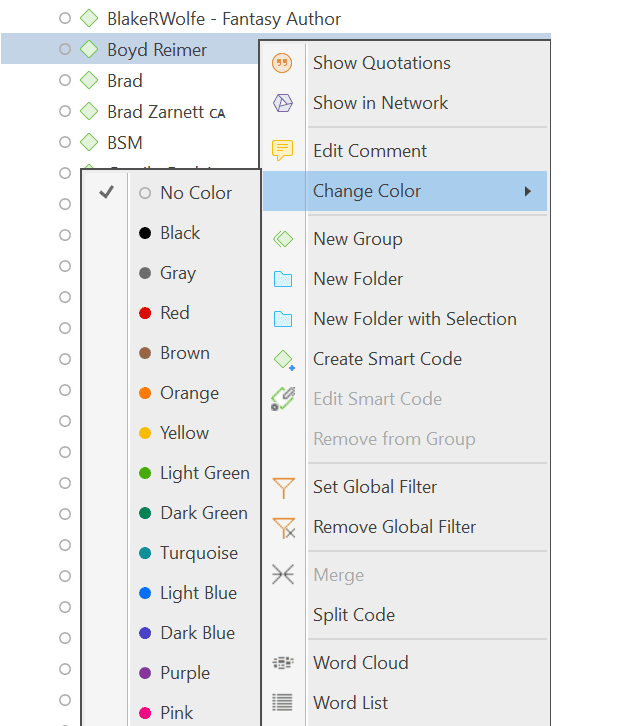
The default color palette is suitable also for colorblind people. Additional colors can be added if you import a list of codes from Excel. See Importing code lists.
Renaming a Code
Right-click on a code in the margin area and select the Rename option from the context menu.
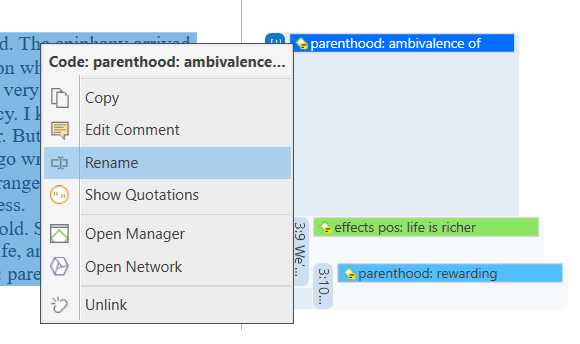
Other places where you can rename a code are:
In the Project Explorer, the Code Browser, or Code Manager, right-click on a code and select the Rename option. In the Code Manager, you can also click the Rename button in the ribbon. Another option is to click the F2 key.
Deleting One or Multiple Code(s)
In the Project Explorer, the Code Browser, or Code Manager, right-click on a code and select the Delete option. In the Code Manager, you can also click on the Delete button in the ribbon.
About Renaming, Deleting and Unlinking Codes
Renaming and deleting codes are procedures that seem trivial, but understanding the scope of these operations can be a problem for new users. For both operations you must understand, that there is only ONE code, for example 'source of happiness: children' in a given project, even if you applied this code many times.
In the margin are, you may see the code appear many times while scrolling through your document. In fact, you are seeing the codings for this code. Technically speaking, these are links between a quotation represented by a blue bar and the code, represented by its name and icon.
Removing a coding in the margin area (i.e., unlinking the code) is like erasing a word in the margin of a paper document with an eraser. It only affects one coding, i.e., one specific occurrence of the code. All other occurrences of the same code are untouched. The effect of the operation is local.
By renaming or removing a code from a project, you are affecting every occurrence of the code throughout the entire project. The effect is global. Renaming the code will instantly change all the code links in the margin to reflect the new name. Deleting it will remove all occurrences in the margin (and from all other contexts in which it was engaged, like networks, groups, etc.).
Duplicating a Code
It is also possible to duplicate codes with all its linkages. The duplicated code is a perfect clone of the original code including color, comment, code-quotation links, code memo links and code-code links. Duplicating a code can be a useful option to clean up or modify a code system.
To duplicate a code, open the Code Manager, select one or more codes, right-click and select the Duplicate Code(s) option from the context menu. Another option is to select the Duplicate Code(s) button in the ribbon. The clone has the same name as the original code plus a consecutive number, i.e., (2).
This option is also available in the Network Editor. See Further Options in Networks.
Writing Code Comments
Code comments can be used for various types of purposes. The most common usage is to use them for a code definition. If you work in teams, you may also want to add a coding rule, or an example quote. If you work inductively, you can use code comments to write down first ideas of how you want to apply this code. You can also use it to write up summaries of all segments coded with this code and your interpretation about it. There are several ways to write a code comment.
- Adding a code comment when creating a new code in the coding dialog:
Enter a new code name and click on the + to create the code. Now you can enter a description or code definition in the comment field.
- Select a code in the Project Explorer or the Code Browser. The comment field is shown below the list.

- In the margin area, you can double-click on a code to open the editor for writing a comment editor. Another option is to right-click on a code and select the Edit Comment option from the context menu. You can also click on the Edit Comment button in the ribbon of the contextual Code tab.

- In the Code Manager is open, you can use the comment field at the bottom of the window. Note that you can switch between seeing bar charts or the comments.
Another option is to right-click on a code anywhere and select the Edit Comment option from the context menu.
All codes that have a comment shows a little yellow dot on top right-hand side of the code icon.
Retrieving Coded Data
Video Tutorial: Retrieving coded data.
From the Project Explorer, Code Manager or Code Browser
Double-click a code. This open the Quotation Reader and you can review all codings.
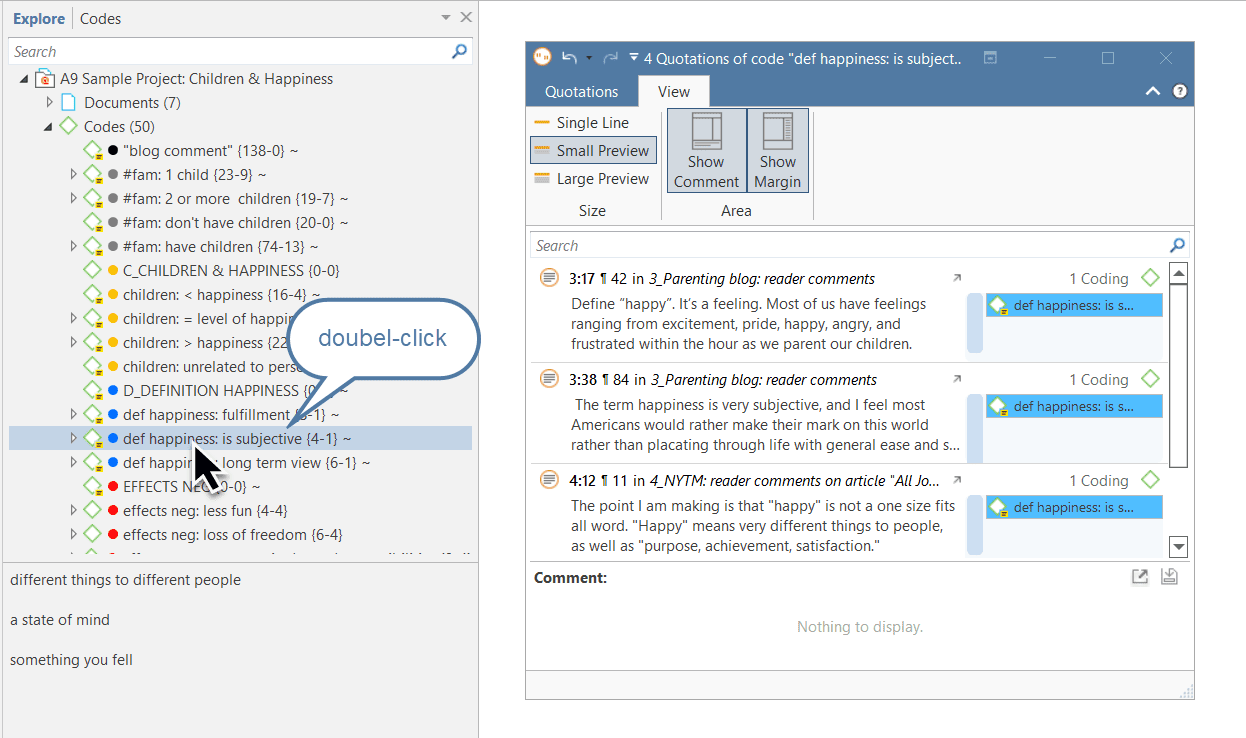
If you prefer to read the data in context, you can dock the Quotation Reader to the right or left-hand side of your screen in single line format. To do so:
Select the option Dock to Navigation Area in the ribbon:


Simple Retrieval in the Margin Area
If you double-click on a code in the margin area, the comment field opens. From there you can access the quotations coded with the code.
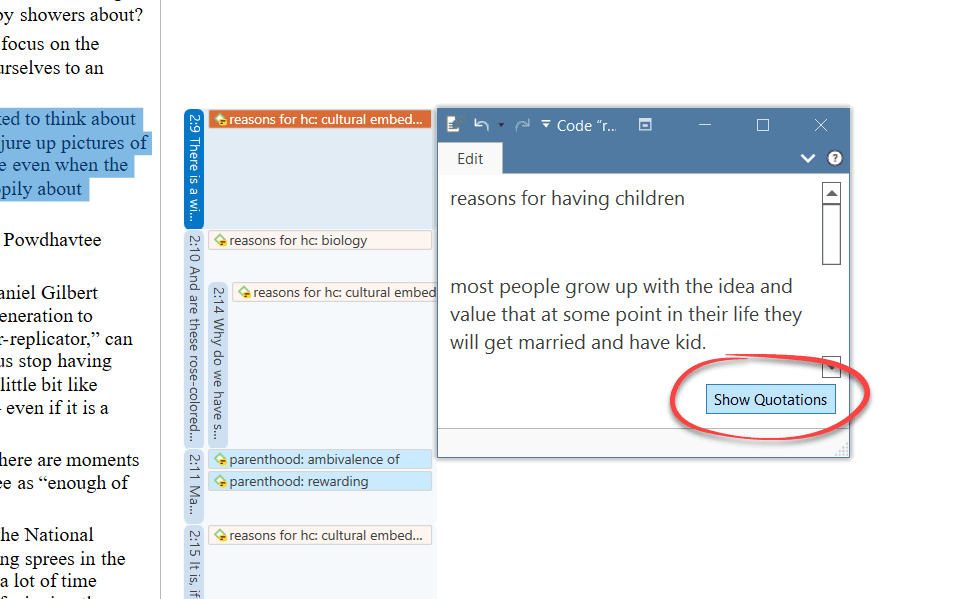
Simple Boolean Queries in The Quotation Manager
Open the Quotation Manager.
Select a code in the filter area. If you have a long list of codes, you can enter a few letters into the Search Code field to reduce the list to only the codes you are looking for:
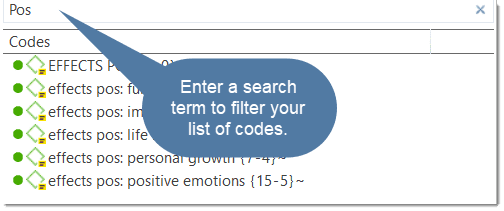
The list of quotations only shows the quotations of the selected code. If you click on a quotation, it will be shown in the preview area. If you double-click, the quotation will be shown in the context of the document.
The yellow bar on top shows the code(s) you are using as filter.
When selecting two or more codes in the side panel, the filter is extended to an OR query: Show quotations coded with of ANY of the codes.....
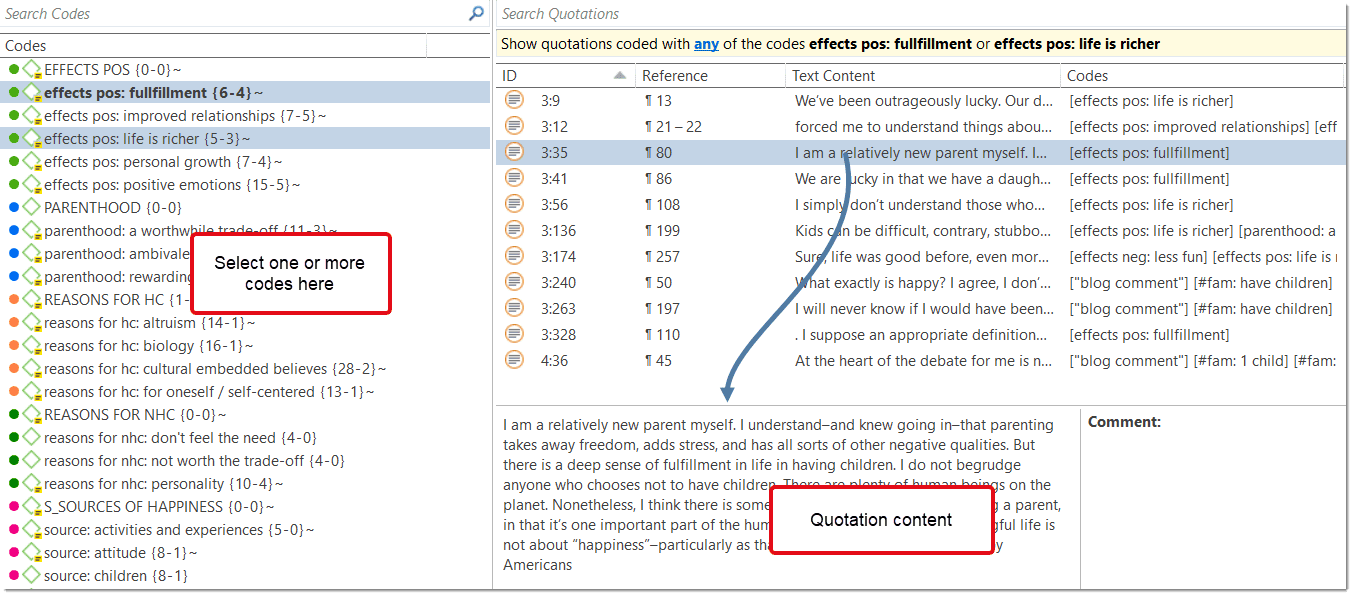
Click on the blue underlined any operator. This opens a drop-down, and you can change between ANY and ALL.

-
ANY: Show all quotations linked to any of the selected codes.
-
ALL Show quotations where all the selected codes apply. This means that two or more codes have been applied to the exact same quotation.
If you want to export the results, click on either the Report or Excel Export button in the ribbon. Find more detail see Creating Reports.
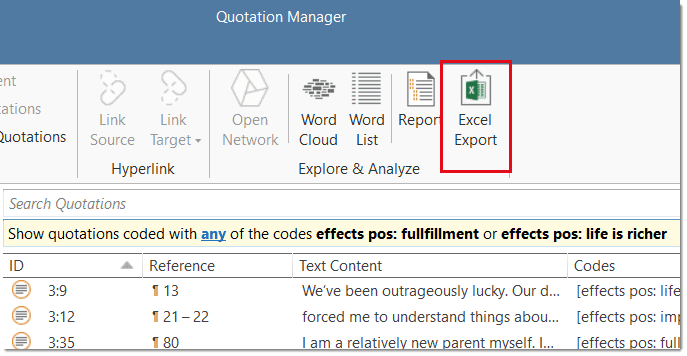
Creating Categories and Subcodes
Video Tutorial: Building a code hierarchy. If you want to sort your codes into higher and lower order codes, you can make use of categories and subcodes. An additional way to organize your codes are folders. Folders can contain other folders. This gives you multiple levels of organizing your codes. Only independent codes and subcodes can contain coded data. The reason for this is methodical rather than technical. If you use a deeper hierarchy, you will likely start duplicating and even multiplying codes at the lower levels. Not only does this make your code system long and difficult to maintain, it also prevents you from performing effective comparative analysis. Below we quote just one of the many authors who offer this advice:
"If you have a typical project of moderate complexity, it should require no more than 10 top-level [parent] categories" to cover the topic [...]. Furthermore, most code systems do not go more than two or three levels deep. If they do, it is likely that the categories being used are no longer true subcategories of the higher-order categories they are under; and, on a practical level, it becomes inconvenient for the coder to remember, locate, and effectively use them" (Bazeley, 2013. p. 183).
See also: How to build a code system.
An additional way to organize your codes are folders. You can add independent codes and categories with their subcodes to folders. Folders can also contain other folders. This allows you to group codes under themes or topics that are too abstract anyway to be used for coding.
Below is an example showing a 3 level hierarchy, illustrated using the ATLAS.ti network function:
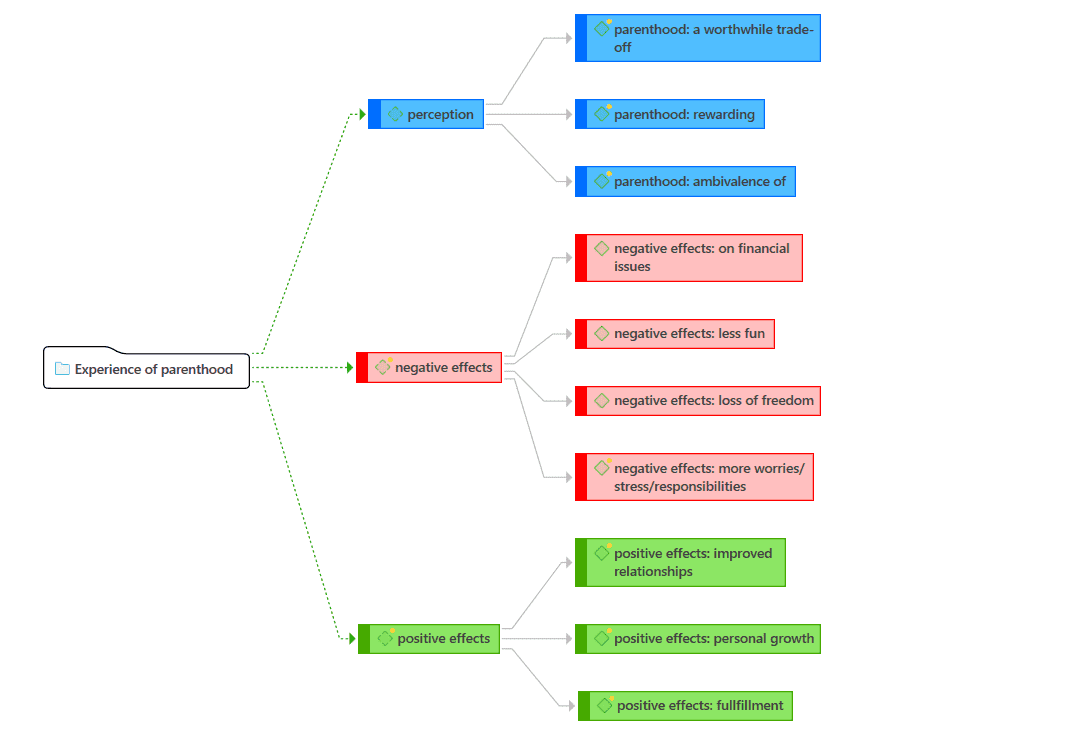
Creating Categories with Subcodes
There are two ways to create a category: by moving codes via drag & drop under a free code, or by splitting a code that already has codings.
Moving Codes under a Free Code
Create a new code.
Select one or more codes in the code list using the common selection techniques for multi selections.
Drag the codes to the newly created code. A context menu opens. Select the first option: Build Code Hierarchy:
Once you have added subcodes to an independent code, it becomes a category. The code icon changes. See image below.
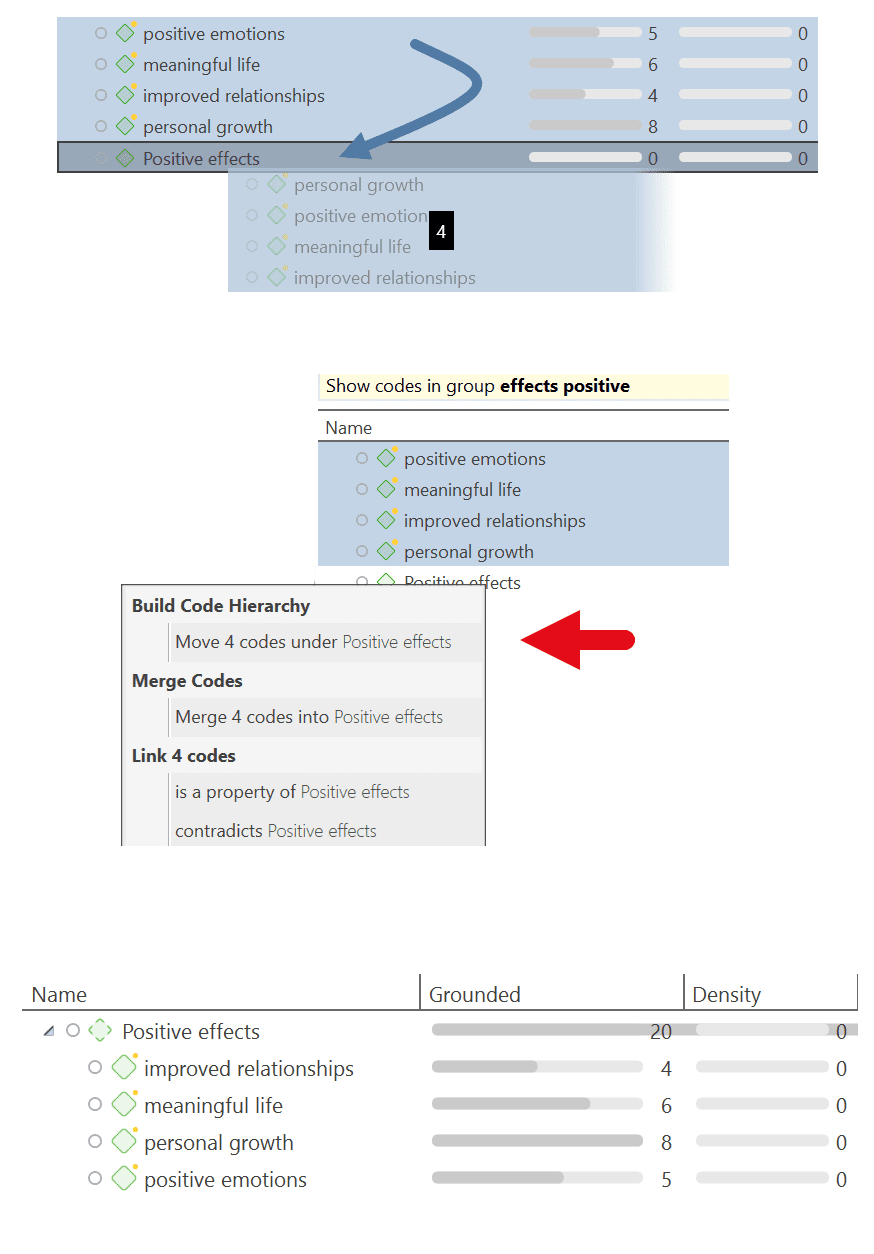
Creating a Category via Splitting
Select a code that you want to split into subcodes.
Right-click and select the option Split into Subcodes, or click on the dropdown next to Split in the ribbon and select Split into Subcodes from there. The Split Code tool opens.
Click on Add Codes to enter the labels for the subcodes. After entering the first code, press the down arrow to move to the next entry field to enter the second label, and so on. Once you are done, click on Add.
By default, a subcode with the name Undecided is added to the first column of the table. All quotations are added to this subcode. The next step is to assign the quotations to the new subcodes you have created. If a quotation does not fit into any of these subcodes, you can just leave it in the subcode 'Undecided'.
This is how you assign the quotations to one or more subcodes:
Select a quotation. Its content is shown at the bottom of the screen. Assign the quotation by clicking on the checkbox of the subcodes that apply.
To speed up the process, you can press the number keys (1,2,3, usw.) to assign the selected quotation to subcode 1, 2, 3, usw.
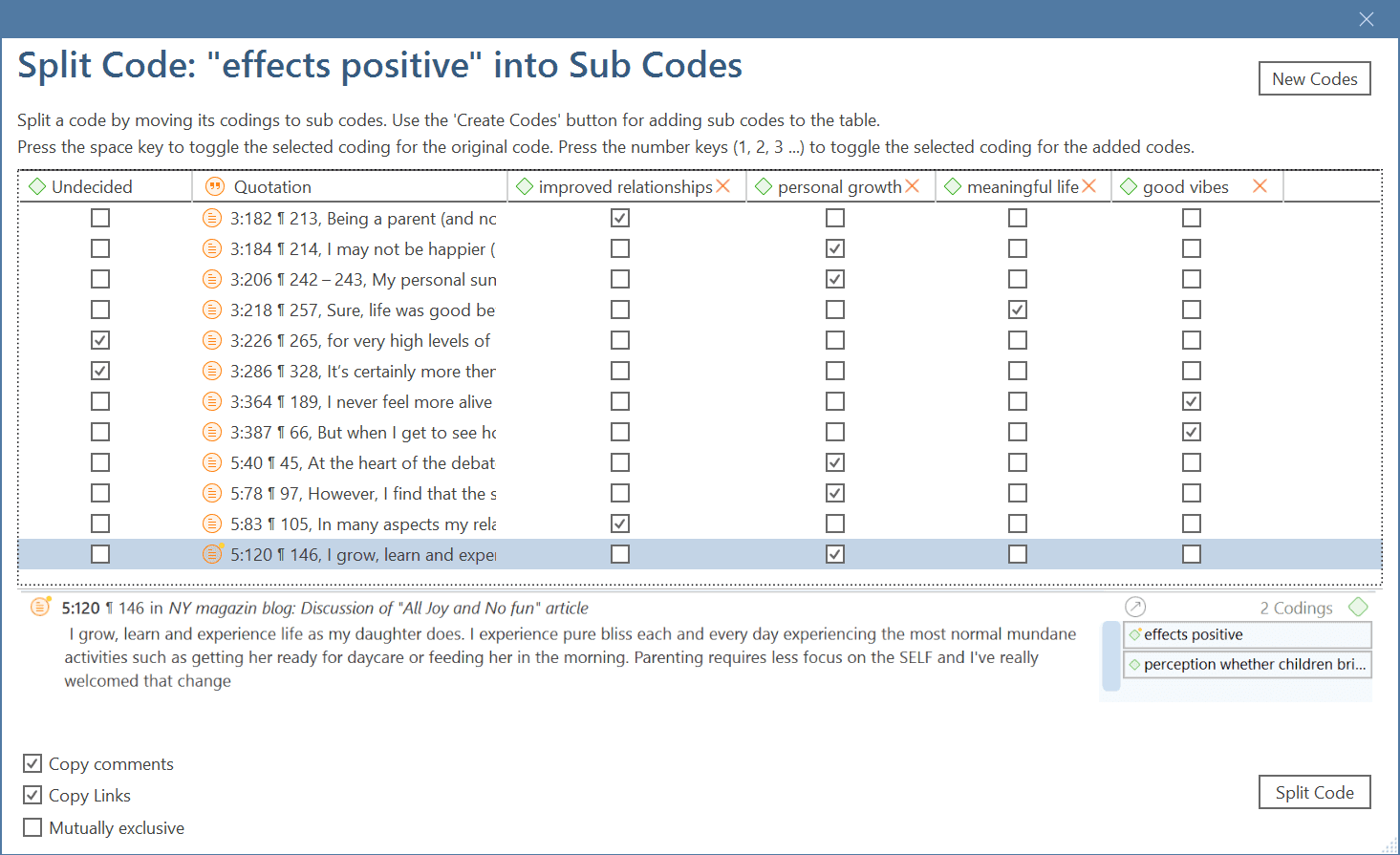
Mutually exclusive: If you do not want to allow that a quotation is coded with two of the subcodes, activate the option Mutually Exclusive. This is a requirement for some content analysis approaches and for calculating inter-coder agreement. See Requirements for Coding.
Once all quotations have been assigned to one or more subcodes, click on Split Code. The code that you split will be turned into a category. This is indicated by the changed code icon. If you click on the drop-down arrow in front of the code, you can expand the category to see the subcodes.

The groundedness of a category code is the number of quotations coded by all of its subcodes. Since you can apply several codes to the same quotation, the total for a category can differ from simply adding up quotations for all subcodes. Both sums are only equal, if you use subcodes in a mutual exclusive manner.
Creating category and subcodes in the coding dialog
When double-clicking on a quotation in the margin, or when highlighting a data segment and selecting the Apply Codes option from the context menu, the coding dialog opens. You can create a new category with a subcode directly here in the dialog, or add a new subcode to an existing category.
Adding a category with subcode
In order to create a category code with a subcode, you simply have to enter as label: category name: subcode name:
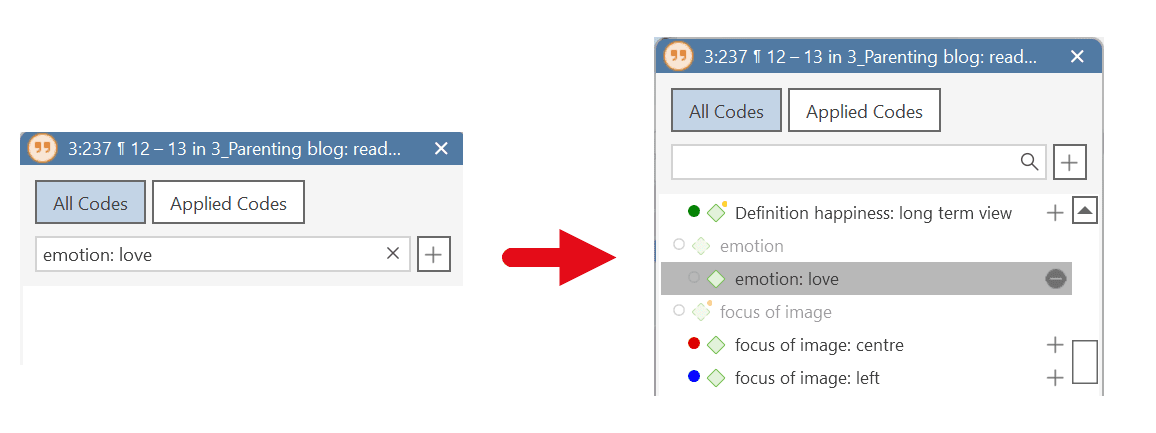
Adding a new subcode to an already existing category
Start typing the name of the category code. This filters the code list.
Select one of the existing sub codes, highlight the subcode name and type over the new name, or delete that part of the name first and then add the new subcode name.
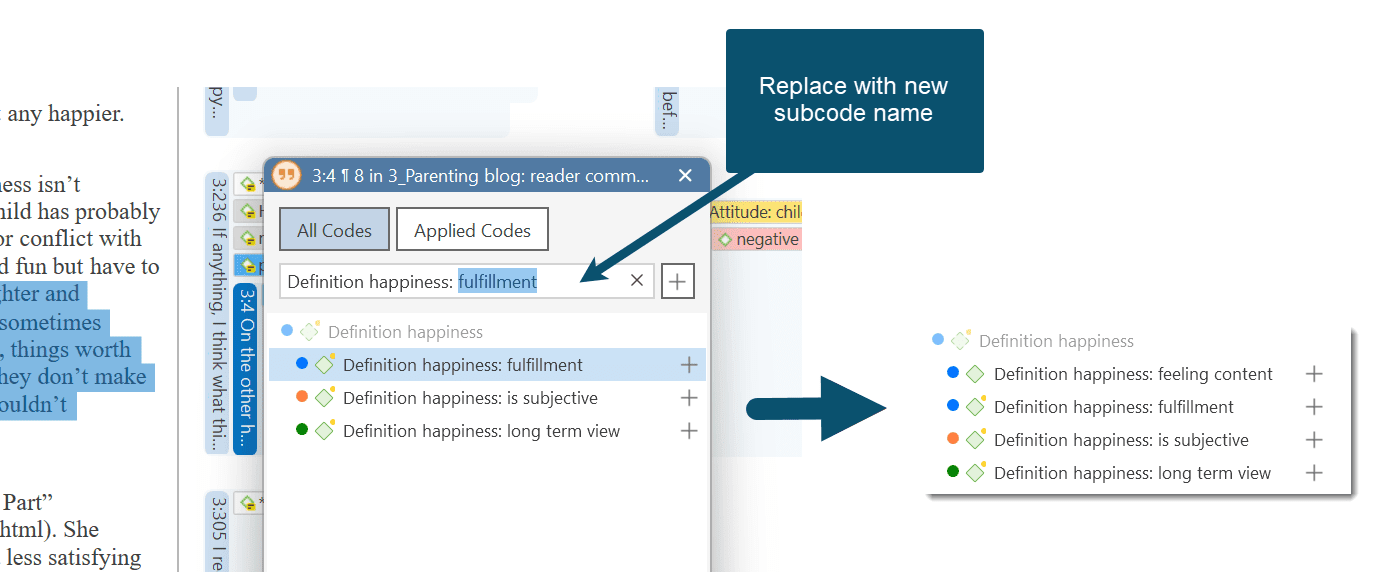
Easy coding with subcodes of a category
There is a very easy way to apply subcodes to your data via drag & drop coding.
Highlight a section of your data and drag & drop a category code from other the project explorer, code browser or code manager onto the text.
A window pops up showing you the list of subcodes. Select one of the subcodes to code.
If you select an existing quotation and one or more subcodes of the selected category have already been applied, this is indicated by a check mark.
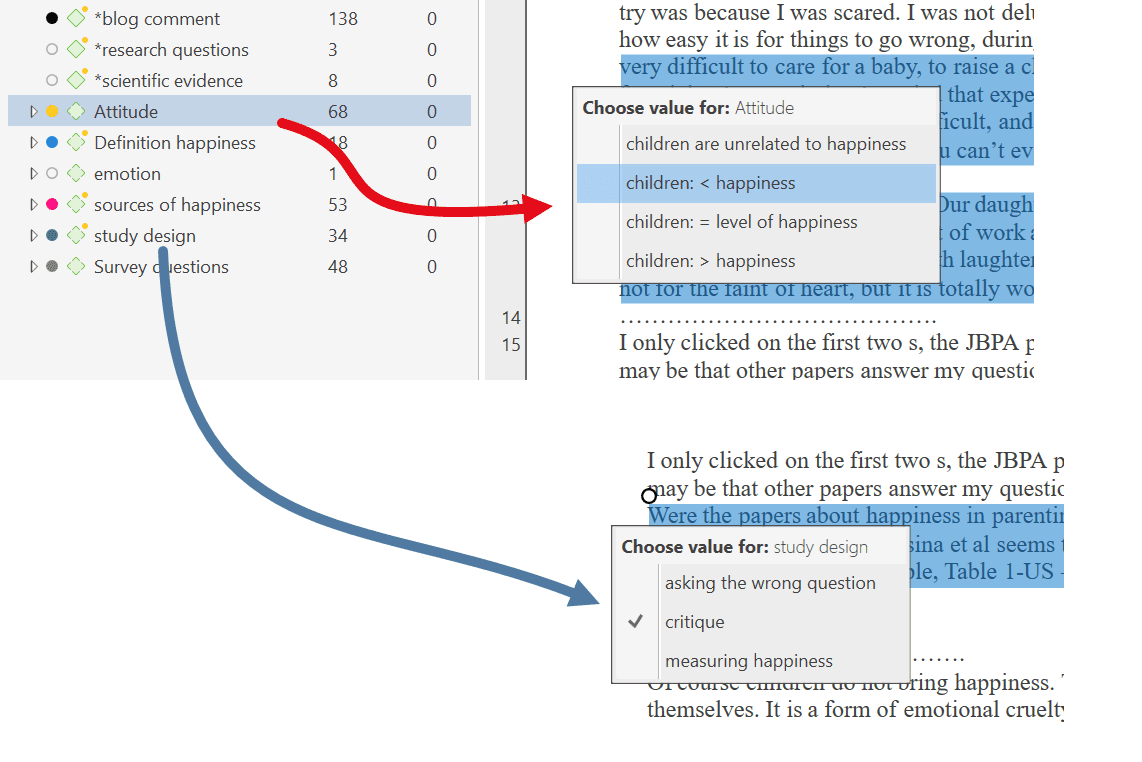
How to move subcodes out of a category
You have two options, you can move subcodes from one category to another category via drag & drop.
If you want to move subcodes out of a category to the first level, they become independent codes again. If you move all subcodes, the category code also becomes an independent code again.
Highlight the subcodes you want to move and drag them to the left side until you see a black vertical line, then drop:
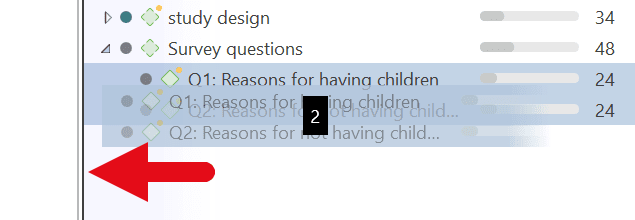
The subcodes will be sorted into your code list in alphabetic order. The groundedness of the category wil be adjusted. In the example illustrated below, all subcodes were moved out of the category; the category has become an independent code with groundedness 0:
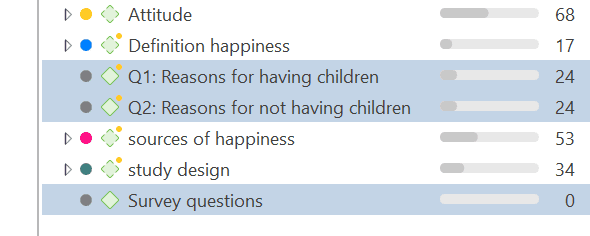
Organizing Codes in Folders
Independent codes or categories with their subcodes can be organized into folders. In contrast to code groups, a code or a category cannot be in more than one folder. The folder structure is hierarchical, code groups are not.
Folders can be contained in other folders. There might be projects that require a fourth level of organization. Below you find an example with three levels. See also the recommendations in the chapter How to build an effective code system.
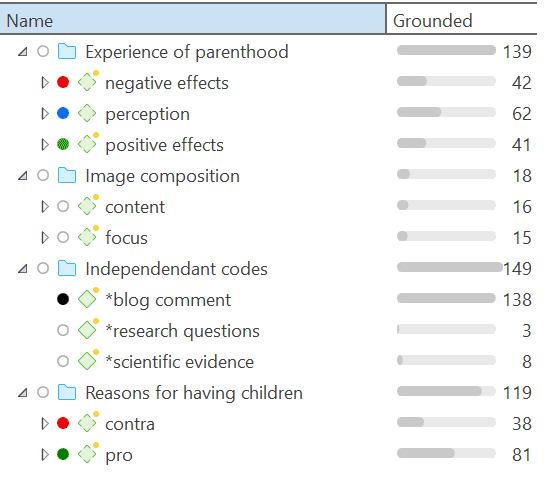
How to create folders
In the Code Manager ribbon, click on the New Folder icon.
Or:
Select one or more codes or categories, right-click and select the option New Folder with Selection from the context menu.
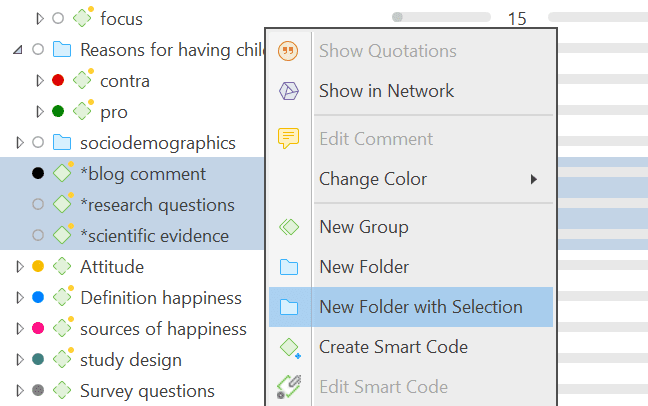
If you delete a folder, all content in the folder is also deleted.
How to move items between folders or out of a folder
You have two options: You can move independent codes, categories, or subcodes from one folder to another folder via drag & drop. The second option is to highlight all items that you want to move, and drag them to the left side until you see a black vertical line; then drop.
Exploring Coded Data
To explore the words that have been used in the quotations linked to one or more codes, you can create a word list or word cloud. Word lists and word clouds are described in detail in the section Exploring Data.
To create a Word Cloud or Word List, right-click on a code or code group somewhere in your project and select either the word cloud or word list option from the context menu. Another option is to use the ribbon button in the Code Manager.
You can also create a Word Cloud or Word List for selected quotations:
Open the Quotation Manager, select one or more codes in the side panel to retrieve their quotations. Click the Word Cloud or Word List button in the Quotation Manager ribbon.
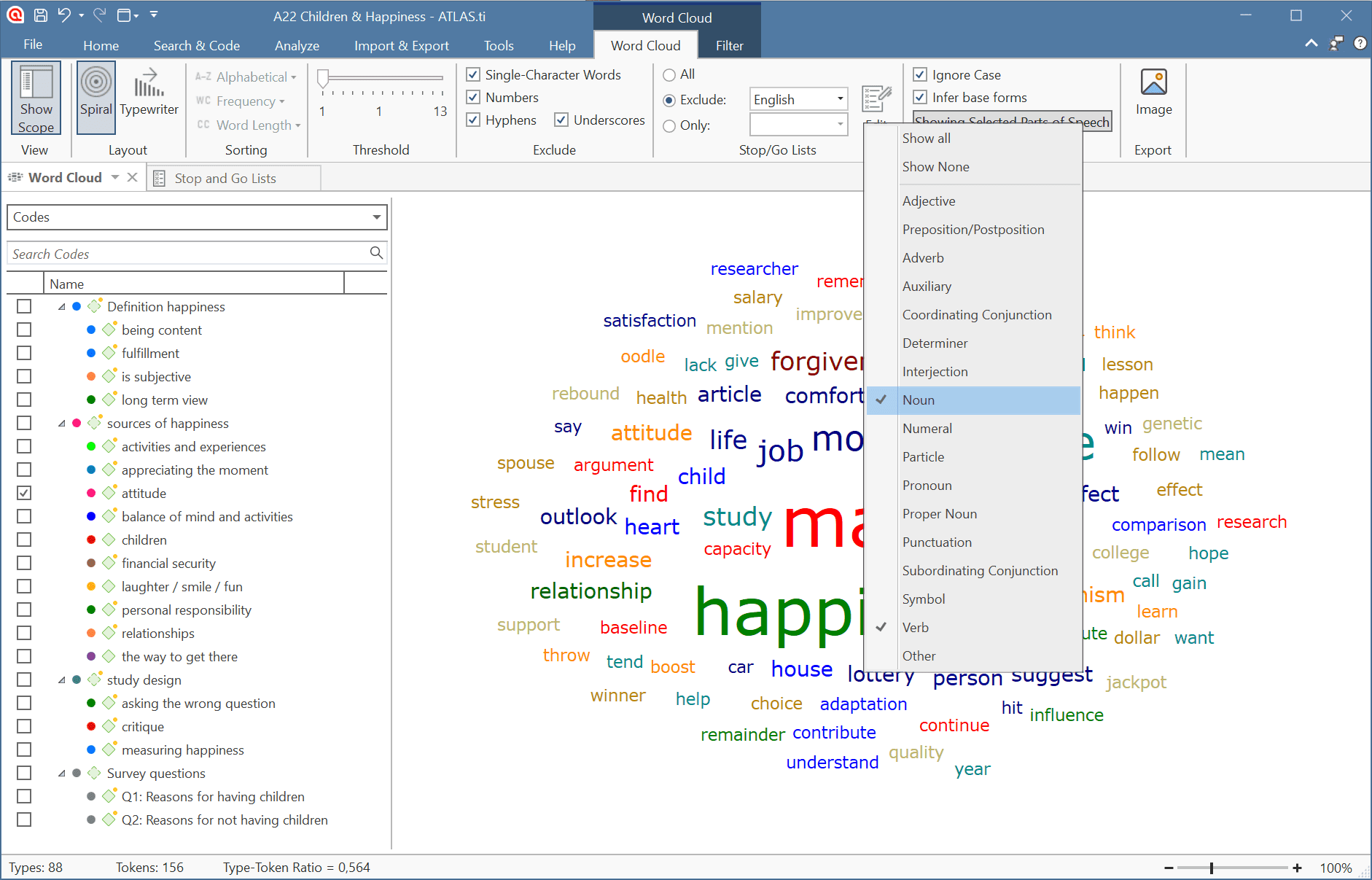
You can aggregate the words by activating the two options 'Ignore Case' and 'Infer base forms'. The latter summarizes for instance 'child' and 'children', or 'bring', 'brings' and 'brought'. If you use this option you can hoover over a word, and it will tell you which words have been combined under the term.
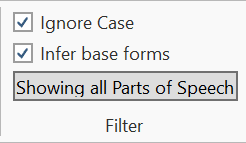
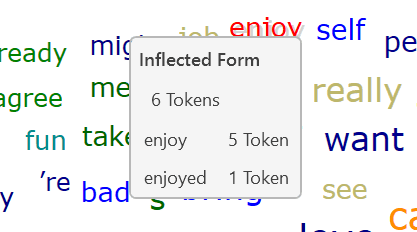
Parts of Speech
You can also select to only display words that belong to a certain category of words, the so-called 'parts of speech'.
A part of speech is a term used in traditional grammar for one of the main categories into which words are classified according to their functions in sentences, such as nouns or verbs. Also known as word classes, these are the building blocks of grammar.
Commonly listed English parts of speech are noun, verb, adjective, adverb, pronoun, preposition, conjunction, interjection, numeral, article, or determiner.
Noun
Nouns are a person, place, thing, or idea. They can take on a myriad of roles in a sentence, from the subject of it all to the object of an action. They are capitalized when they're the official name of something or someone, called proper nouns in these cases. Examples: pirate, Caribbean, ship, freedom, Captain Jack Sparrow.
Pronoun
Pronouns stand in for nouns in a sentence. They are more generic versions of nouns that refer only to people. Examples: I, you, he, she, it, ours, them, who, which, anybody, ourselves.
Verb
Verbs are action words that tell what happens in a sentence. They can also show a sentence subject's state of being (is, was). Verbs change form based on tense (present, past) and count distinction (singular or plural). Examples: sing, dance, believes, seemed, finish, eat, drink, be, became
Adjective
Adjectives describe nouns and pronouns. They specify which one, how much, what kind, and more. Adjectives allow readers and listeners to use their senses to imagine something more clearly. Examples: hot, lazy, funny, unique, bright, beautiful, poor, smooth.
Adverb
Adverbs describe verbs, adjectives, and even other adverbs. They specify when, where, how, and why something happened and to what extent or how often. Examples: softly, lazily, often, only, hopefully, softly, sometimes.
Preposition
Prepositions show spacial, temporal, and role relations between a noun or pronoun and the other words in a sentence. They come at the start of a prepositional phrase, which contains a preposition and its object. Examples: up, over, against, by, for, into, close to, out of, apart from.
Conjunction
Conjunctions join words, phrases, and clauses in a sentence. There are coordinating, subordinating, and correlative conjunctions. Examples: and, but, or, so, yet, with.
Articles and Determiners
Articles and determiners function like adjectives by modifying nouns, but they are different from adjectives in that they are necessary for a sentence to have proper syntax. Articles and determiners specify and identify nouns, and there are indefinite and definite articles. Examples: articles: a, an, the; determiners: these, that, those, enough, much, few, which, what.
Some traditional grammars have treated articles as a distinct part of speech. Modern grammars, however, more often include articles in the category of determiners, which identify or quantify a noun. Even though they modify nouns like adjectives, articles are different in that they are essential to the proper syntax of a sentence, just as determiners are necessary to convey the meaning of a sentence, while adjectives are optional.
Interjection
Interjections are expressions that can stand on their own or be contained within sentences. These words and phrases often carry strong emotions and convey reactions. Examples: ah, whoops, ouch, yabba dabba do!
Open and Closed Word Classes
The parts of speech are commonly divided into open classes (nouns, verbs, adjectives, and adverbs) and closed classes (pronouns, prepositions, conjunctions, articles/determiners, and interjections). The idea is that open classes can be altered and added to as language develops and closed classes are pretty much set in stone. For example, new nouns are created every day, but conjunctions never change.
In contemporary linguistics, the label part of speech has generally been discarded in favor of the term word class or syntactic category. These terms make words easier to qualify objectively based on word construction rather than context. Within word classes, there is the lexical or open class and the function or closed class.
Source: The 9 Parts of Speech: Definitions and Examples
In ATLAS.ti, you can select one or more of the following parts of speech:
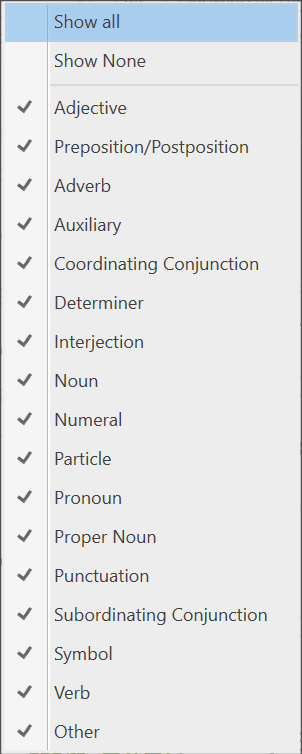
All other options are explained in the chapter Exploring Text Data
Merging Codes
Video Tutorial:
You may begin your coding very close to the data generating lots of codes. In order not to drown in a long list of codes, you need to aggregate those codes from time to time, which means merging and renaming them to reflect the higher abstract level. Another reason for merging is that you realize that two codes have the same meaning, but you have used different labels.
Moving all low frequency codes under a category code to "clean up" is not a good solution. You may start by using descriptive labels for independent codes, but you need to aggregate them at some point, usually after having gone through your first few sources. If you have too many of those low frequency codes, you create a proliferating coding system that becomes unmanageable (Bazeley, 2013). In addition, it will also not be very useful for your analysis.
There are a few exceptions as always. Codes with low frequencies that capture an exceptionally insightful thought, for instance, don't and also should not be merged. There should only be a few of those and not dozens or hundreds.
This is how you do it:
Select two or more codes in the Code Manager and drag them to the code where you want to merge them into. A menu opens. Select the second option Merge code ... into ...
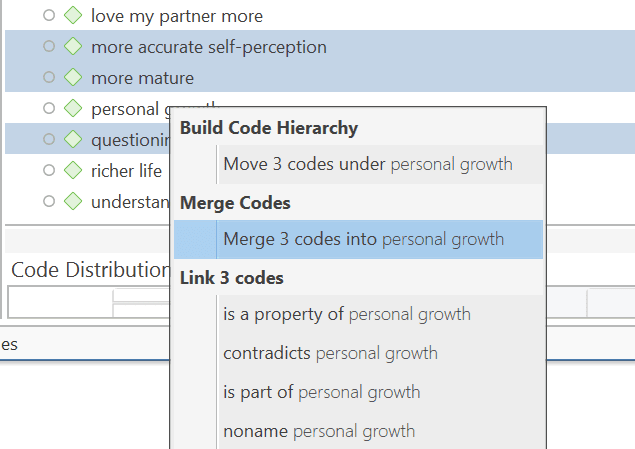
A comment is automatically inserted into the target code that provides an audit trail of which codes have been merged. If the codes that are merged had a comment, these comments are also added to the target code.
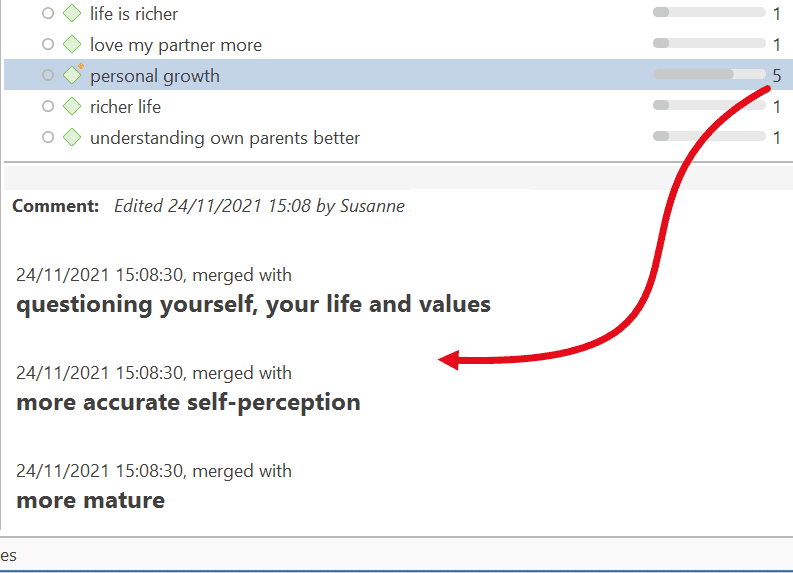 Another option is to select the Merge Codes option from the context menu, or the ribbon.
Another option is to select the Merge Codes option from the context menu, or the ribbon.
Select two or more codes in the Code Manager and click on the Merge button in the ribbon (or right-click and select the Merge option from the context menu).
Next, select the target code into which all other codes should be merged, and click on the Merge Codes button.
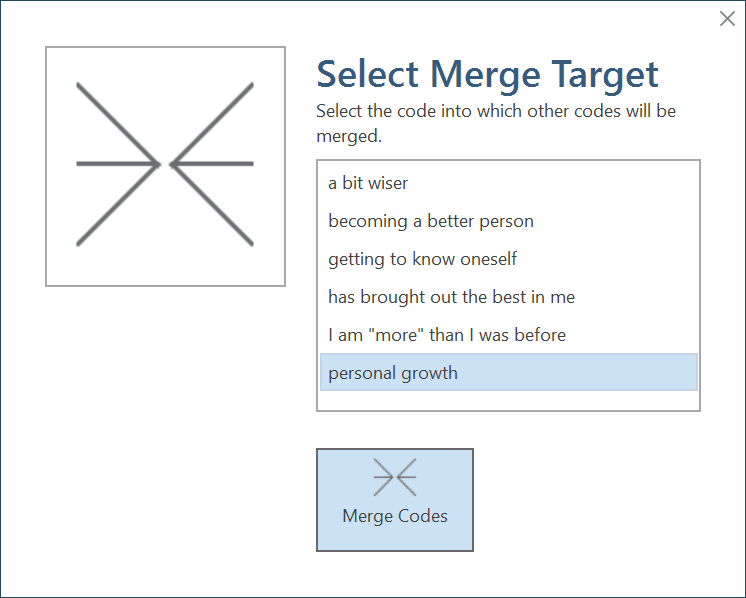
It is also possible to use the network editor for merging codes. This provides a visual space where you can arrange your codes, review, sort and order them and decide which once to merge. See Networks: Further Options.
Splitting a Code
"Inevitably, not all codes you produce will continue to prove useful. Some will be too general, others too specific to one or two segments of data (see Merging Codes). With the exception of contextual codes, a category that is so broad or so vaguely defined that it codes a very large number of passages or very lengthy passages is less likely to be useful in analysis" (Bazeley, 2013:185).
Splitting a code is necessary if you have been lumping together many quotations under a broad theme. This is a suitable approach for a first run through to get an idea about your data. At some point those codes need to be split up into codes with a lower number of codings or into subcodes of a category to be meaningful for analysis.
This can be done in two ways:
- Splitting into independent codes
- Splitting into subcodes (creating a category)
Splitting a code into independent codes
Select a code that you want to split in the Code Manager, and click the Split Code button in the ribbon. Or select a code in the Code Manager, Project Explorer or Code Browser, right-click and select Split from the context menu.
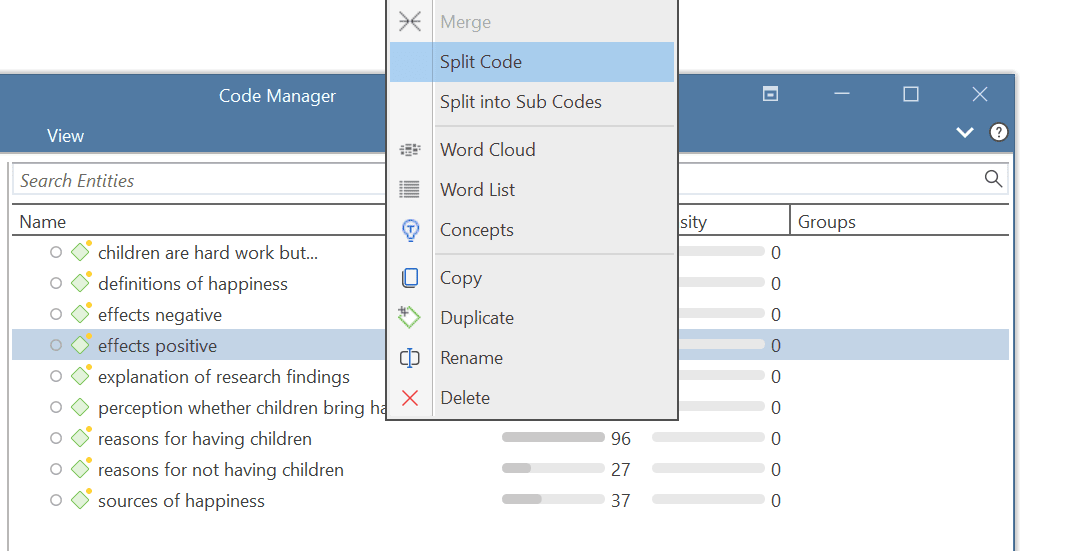
In the Split Code tool, you see the list of the quotations coded with the code.
Click on New Codes to enter the labels for the subcodes. After entering the first code, press the down arrow to move to the next entry field to enter the second label, and so on. Once you are done, click on Create.
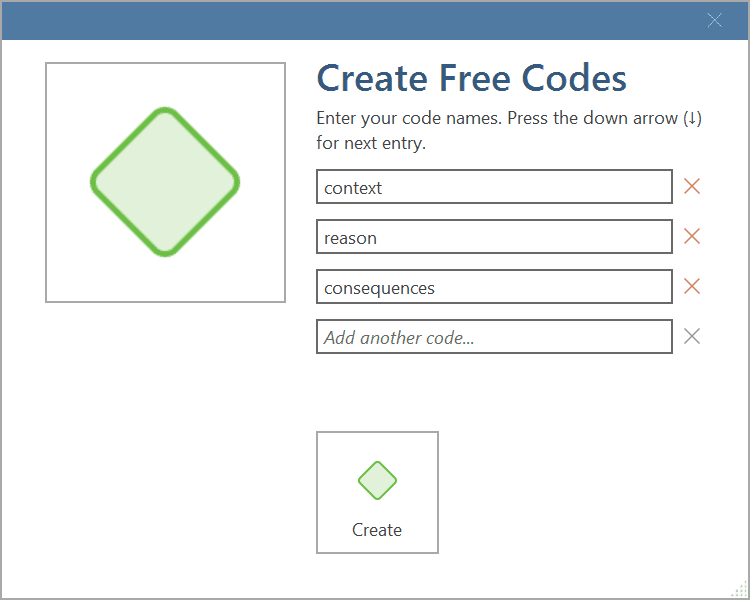
By default, the name of the original codes is added to the first column of the table. All quotations are still linked to it. The next step is to assign the quotations to the new codes you have created. If a quotation does not fit into any of these new codes, you can just leave it linked to the original code.
This is how you assign the quotations to one or more subcodes:
Select a quotation. Its content is shown at the bottom of the screen. Assign the quotation by clicking on the checkbox of the codes that apply. The quotation is automatically unlinked from the code that you are splitting.
To speed up the process, you can press the number keys (1,2,3, usw.) to assign the selected quotation to subcode 1, 2, 3, usw.
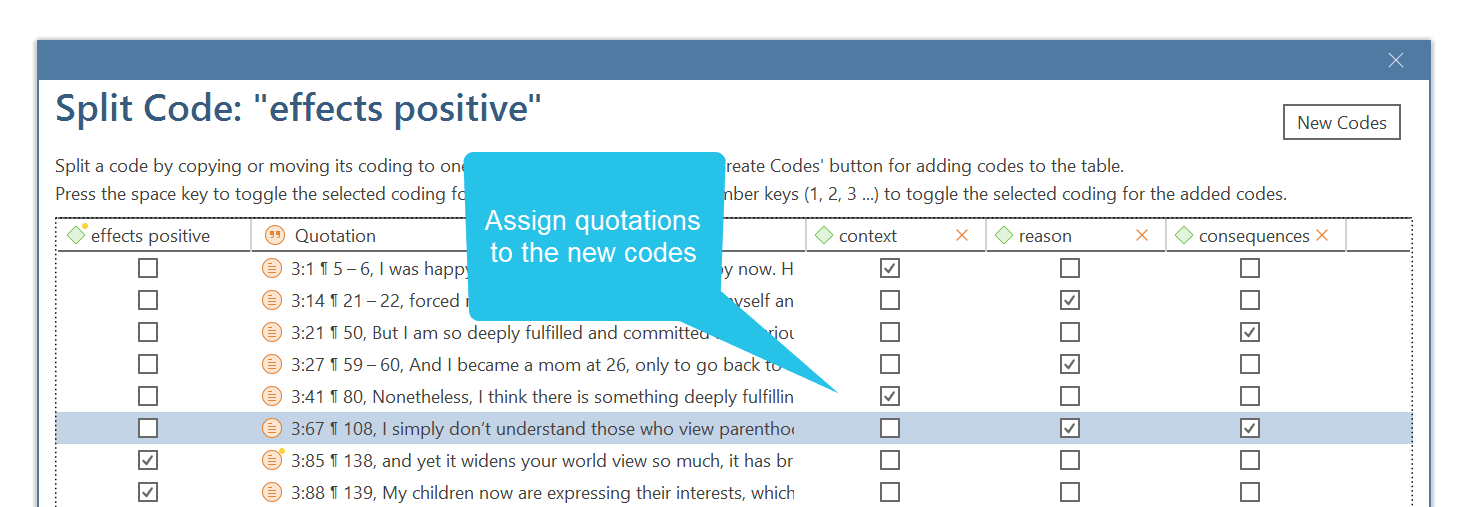
After you have distributed some or all of the quotations into sub codes, click on Split Code. Now the new codes are created, and the quotations are assigned accordingly.
It is not required that you assign all quotations to the new codes. Quotations can remain linked to the original code, or also to the original code and any of the newly created codes.
Options
-
Copy Comments: Select if you want all sub codes to have the same comment as the code you split.
-
Copy links: Select if you want all sub codes to inherit existing links to other codes or memos.
-
Mutually exclusive: If activated, you can assign a quotation to only one sub code. This is a requirement for some content analysis approaches and for calculating inter-coder agreement.
Mutually Exclusive Coding
If you do not want to allow that a quotation is coded with two of the codes, activate the option Mutually Exclusive. This is a requirement for some content analysis approaches and for calculating inter-coder agreement. See Requirements for Coding.

Splitting a code into a category and subcodes
Select a code that you want to split into subcodes.
Right-click and select the option Split into Subcodes, or click on the dropdown next to Split in the ribbon and select Split into Subcodes from there. The Split Code tool opens.
Click on New Codes to enter the labels for the subcodes. After entering the first code, press the down arrow to move to the next entry field to enter the second label, and so on. Once you are done, click on Create.
By default, a subcode with the name Undecided is added to the first column of the table. All quotations are added to this subcode. The next step is to assign the quotations to the new subcodes you have created. If a quotation does not fit into any of these subcodes, you can just leave it in the subcode 'Undecided'.
This is how you assign the quotations to one or more subcodes:
Select a quotation. Its content is shown at the bottom of the screen. Assign the quotation by clicking on the checkbox of the subcodes that apply. The quotation is automatically unlinked from the subcode 'Undecided'.
To speed up the process, you can press the number keys (1,2,3, usw.) to assign the selected quotation to subcode 1, 2, 3, usw.

Mutually exclusive: If you do not want to allow that a quotation is coded with two of the subcodes, activate the option Mutually Exclusive. This is a requirement for some content analysis approaches and for calculating inter-coder agreement. See Requirements for Coding.
Once all quotations have been assigned to one or more subcodes, click on Split Code. The code that you split will be turned into a category. This is indicated by the changed code icon. If you click on the drop-down arrow in front of the code, you can expand the category to see the subcodes.

The groundedness of a category code is the number of quotations coded by all of its subcodes. Since you can apply several codes to the same quotation, the total for a category can differ from simply adding up quotations for all subcodes. Both sums are only equal, if you use subcodes in a mutual exclusive manner.
Display of Codes in the Project Explorer and Code Browser
In the Project Explorer under the main Codes branch, all codes are listed. If you only want to see the list of codes, go to the Home ribbon and select Codes from the Navigator section. The number behind a main codes branch, e.g., (11) is the total number of first level entries. These can be folders, categories and independent codes.
The number behind a folder, is the number of quotations coded by independent codes or sub codes that are contained within the folder. As you can apply multiple codes to the same quotation (i.e., multi-value coding), the total can be different from adding up all the numbers for all independent and all subcodes.
The number behind a category code is the number of quotations coded by all of its sub codes. As you can apply multiple codes to the same quotation, the total for a category can be different from adding up the numbers for each subcode. It is only the same if you apply subcodes in a mutual exclusive manner, as for example required for inter-code agreement analysis
IMAGE
View Options the Code Manager
There are three View Modes: You can view codes in list view (default), as cloud or in form of a bar chart:
Code Cloud
Click on the button Cloud to visualize your code list in form of a word cloud:

If you right-click on a code, the same context menu opens as in 'Details' view. Thus, in the cloud view you can start the same actions as in the regular view. You can for instance rename codes, split or merge codes, or open a network on one or multiple codes.
Code List as Bar Chart
Select Bar Chart to visualize your code list in form of a bar chart:

The codes in the bar chart view also have a context menu. Thus, also from here, you can start the same actions as in standard view. Select multiple codes if you want to merge codes.
The chart "Code Distribution by Document" that you see below the code list is explained in the chapter Analysing Code Distributions ,
Display Code List as Code Cloud or Bar Chart
An alternative way to view your list of codes is in form of a code cloud or a bar chart.
Code Cloud
In the Code Manager, select the Views tab and from there the Cloudoption.
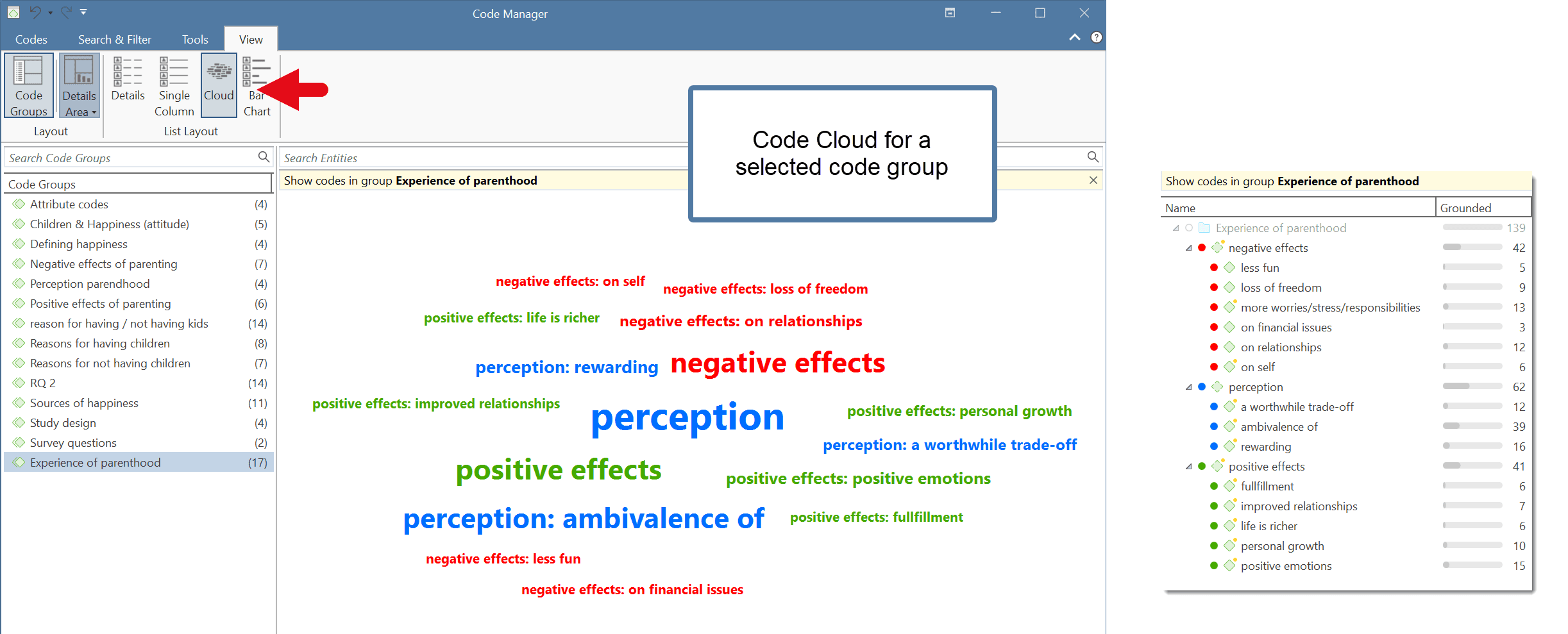
The image above shows a code list filtered by a code group that contains three categories and their subcodes. The subcodes are displayed with their long names in the code cloud (category: subcode).
Code List as Bar Chart
Select the option Bar Chart to visualize your code list in form of a bar chart.
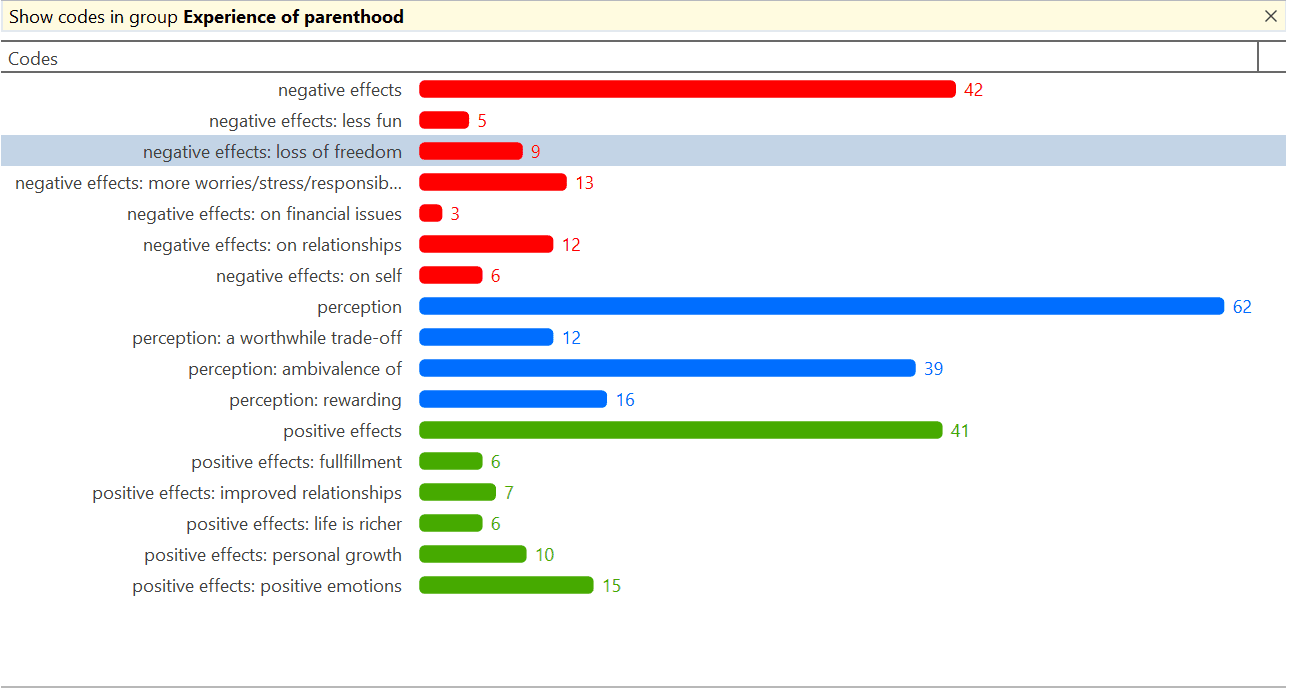
If you right-click on a code, the same context menu opens as in 'List' view. Thus, in the cloud view you can start the same actions as in the regular view. You can for instance rename codes, split or merge codes, or open a network on one or multiple codes.
Printing the Code-Cloud or the Bar Chart View
You can print both the 'Cloud' view and the 'Bar Chart'. In order to do so:
Select the Image button from the main Codes tab.
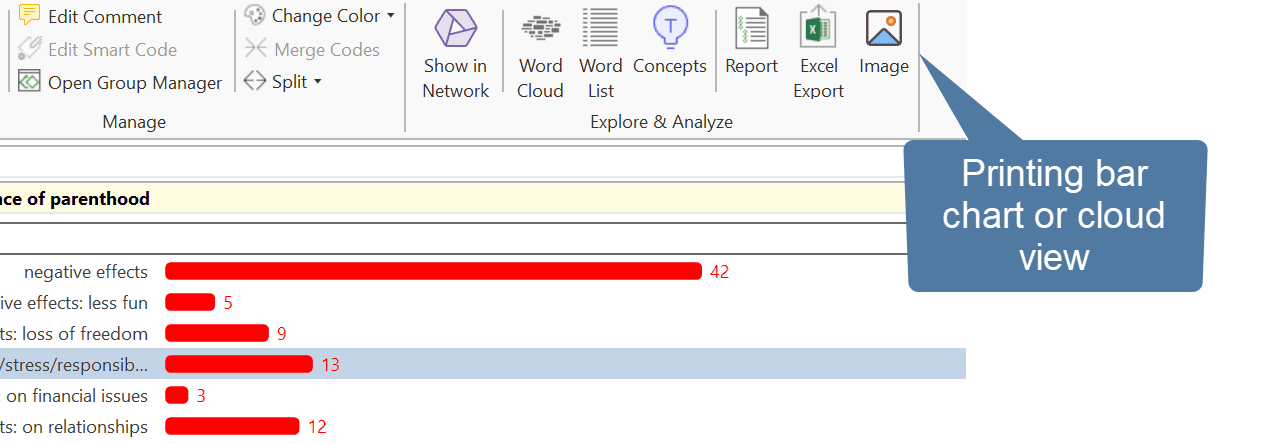
The image will be saved as jpg file in HD resolution 1920 x 1080 and 96 dpi.
Working With Code Groups
Code groups help in organizing codes, they make it easy to access specific codes from a long list of codes, and they allow you to create any kind of filter you need for querying your data.
Code groups can be created in two ways - you can create them in the Code Group Manager, or in the side panel of the Code Manager.
To create a group in the Code Manager, click on the Home tab and open the Code Manager by clicking on the Codes button.
Select a few codes and drag them into the filter area on the left-hand side.
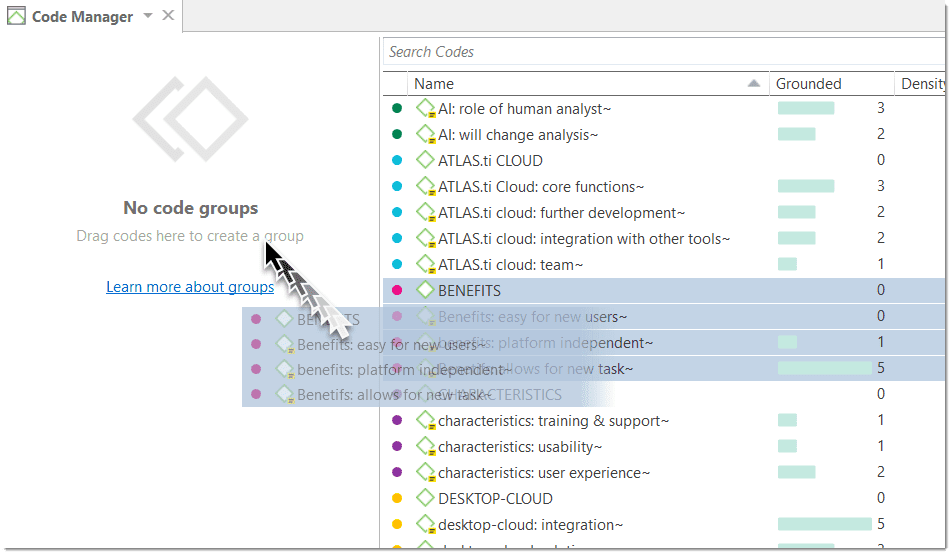
After dropping the codes, enter a name for the code group and click on the button Create.
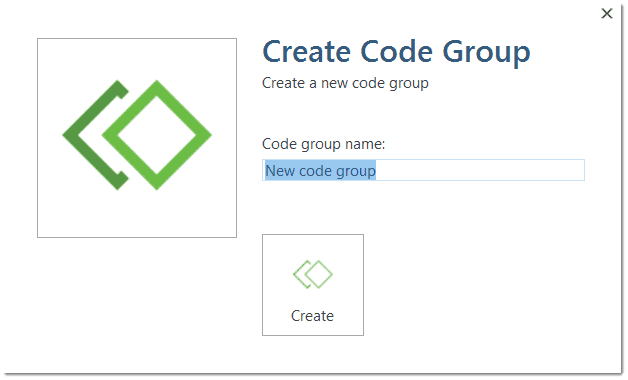
When you click on the newly created code group, only the codes from this group will show up in the list on the right-hand side. This allows you to quickly access codes in your list without having to scroll the list all the time. Above the list of codes, you see a beige bar that shows by which group(s) you have filtered:

To show all codes again, close the yellow pane that shows up on top of the code list when selecting a group.
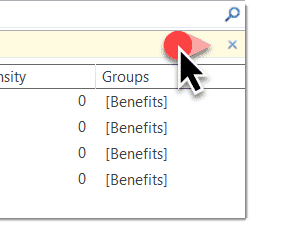
For more information on how to work with groups, see Working With Groups.
If you are interested in learning about the differences between codes, code groups and smart codes, please view this video.
Importing and Exporting a List of Codes
Exporting the List of Codes
Use this option if you want to export a list of codes for re-use in another ATLAS.ti project, or in another software. For the latter, you need to use the QDPX export option. For further information see the chapter on Universal Data Exchange
To export all codes with comments and groups for use in another ATLAS.ti project, select the Import & Export tab and from there Export Codebook / Export to Excel.
Select a location where you find to save the file, and decide whether the Excel file should contain headers for codes, comments and groups, and whether to open the list in Excel immediately.
Importing the List of Codes
For purposes of creating a code book for a report or appendix, we recommend using the Export option offered in the Code Manager. This export is already formatted. See Report Examples.
Importing an already existing code book can be useful for a number of reasons:
- To prepare a stock of predefined codes in the framework of a given theory. This is especially useful in the context of a team project when creating a Master project.
- To code in a "top-down" (or deductive) way with all necessary concepts already at hand. This complements the "bottom-up" orinductive coding stage in which concepts emerge from the data.
You can prepare a code book including code descriptions, code groups and colors in Excel and import the Excel file. This is how you need to prepare the Excel file:
You can enter headings like Code, Code Definition, Code Group 1, Code Group 2, but you do not have to. The headers can be in any language. The columns are interpreted in the following order, whether you add headings or not:
- column 1: code name
- column 2: code description (comment)
- column 3: code group 1
- column 4: code group 2
- all subsequent columns: further code groups
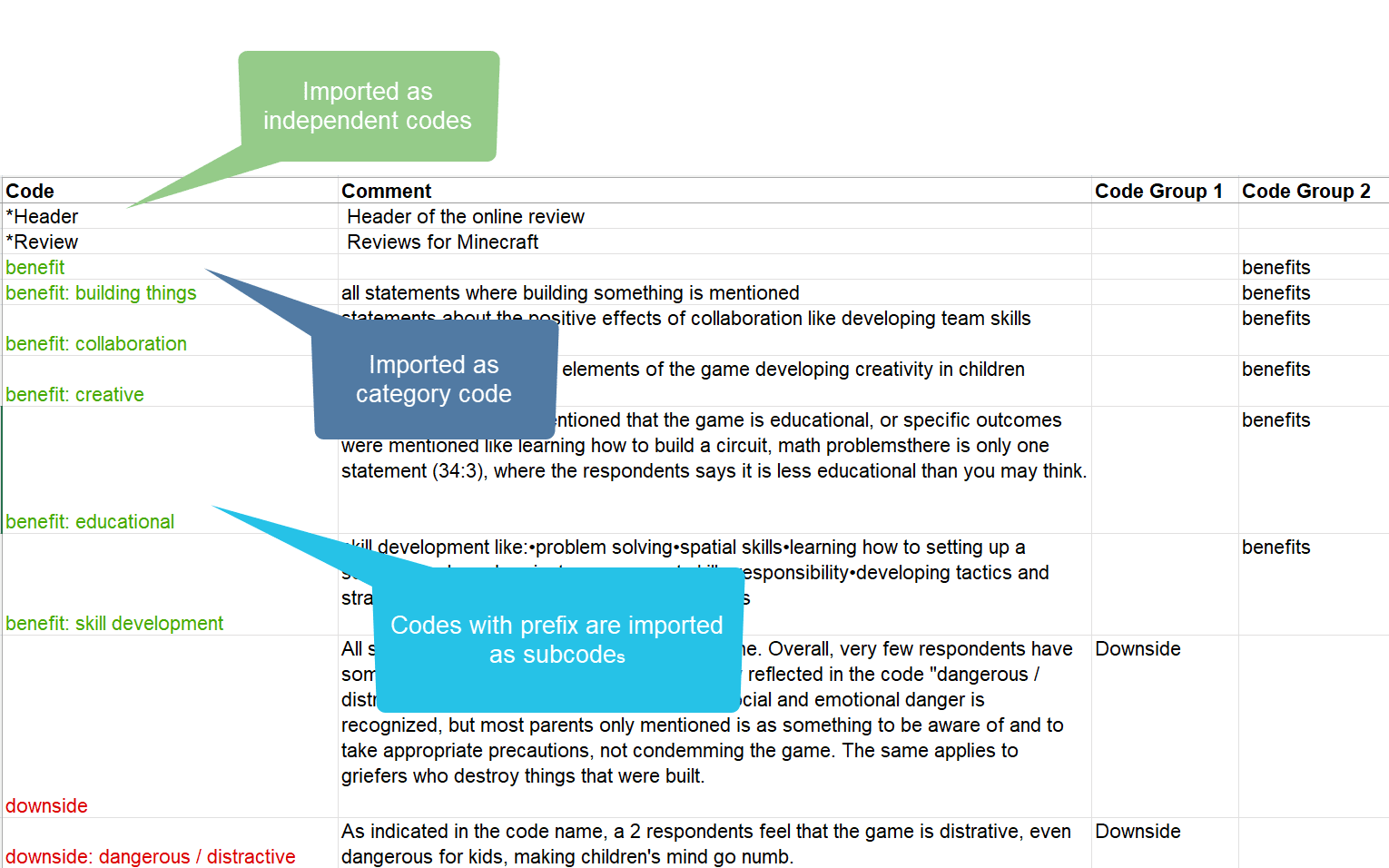
- All single codes are imported as independent codes.
- All codes that have the same prefix will be imported as subcodes. Based on the prefix, ATLAS.ti determines the category codes. As in the example shown here: 'benefit' will become a category code; all codes like 'benefit: creative' or 'benefit: collaboration', will become subcodes of benefit.
- If you color the code names, this color is used in ATLAS.ti as code color.
Folders cannot be imported via the Excel file. They need to be added later.
To import the Excel file, select the Import & Export tab and next Codebook. From the dropdown menu, select Import from Excel
Select a file. Depending on whether you have inserted headers in the Excel file, activate or deactivate the option "My data contains headers."
If your project already has codes, you need to decide what ATLAS.ti should do if the list of codes in the Excel table contains codes that are already in your project. You can update the attributes of the existing codes, i.e., code color and comment, so they match the information that is in the Excel sheet.
Make your choices and click Import.
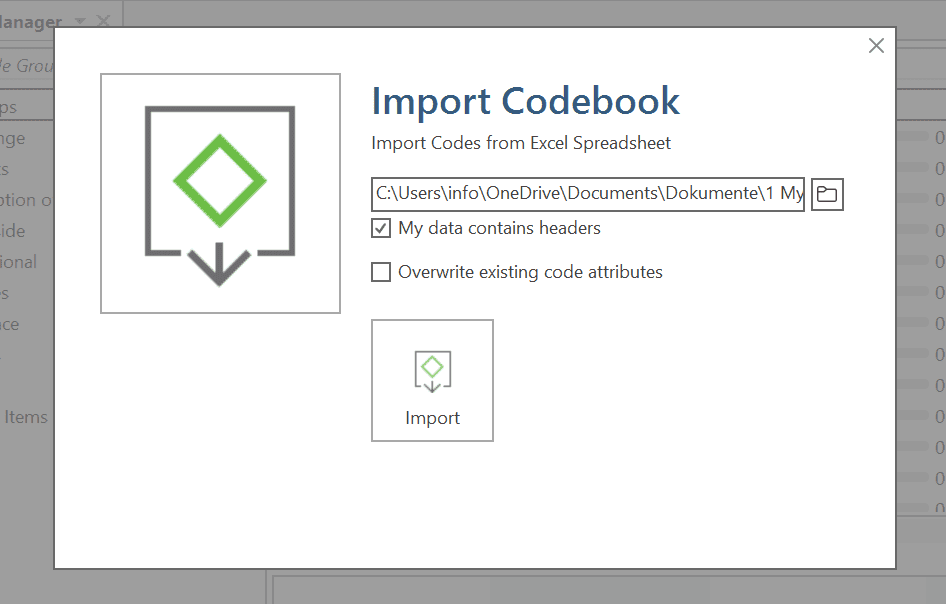
You also find the Import / Export Codebook options in the Tools tab of the Code Manager.
Building a Code System
A well-structured code list is important for further analysis, where you look for relationships and patterns in the data, with the goal of integrating all results to tell a coherent story. If, as in a survey, you only have questions with the answer categories "yes" and "no" in your questionnaire, your data will only consist of nominal variables. This means that the analysis is limited and does not go beyond the descriptive level. This is comparable to a codebook that consists of a set of codes whose analysis level remains indefinite. The aim of building a code system is that you can access your data through the codes and that you can make full use of the analysis tools.
At the end of the chapter you will find a list of articles and books based on which the following recommendations were written.
How to Begin Building a Code System
Unless you are working with theoretically derived a priori codes, to start with, you will be creating codes to catch ideas as they happen. The list of code grows, and it becomes more and more difficult to keep an overview. It is time to begin managing your list of codes. This can be after coding one document, one interview or a few. Managing your code means to start sorting and ordering them into folders, categories and subcodes. Code groups can help in this process as well. Via code groups you can collect codes that are connected. Then set the code group as filter so that you can focus on this smaller subset of codes. Which codes might form a category, which ones need to be merged or split?
Applying a hierarchically organised catalogue to your code system has several benefits. See also Bazely (2013:179-183).
-
It creates order: you know where to look to place or find a particular code
-
It brings conceptual clarity for yourself and others
-
It provides a prompt to code additional aspects as you continue to code. You are for instance reminded to code for 'reasons for having children', 'sources of happiness', 'definition of happiness', etc. because you have a category for these types of things. It also sensitizes you to notice other subcodes that appear in the data.
-
it will assist you in identifying patterns of relationships in your data. Not only will you be able to ask questions about a particular category, this will also allow you to explore relationships between categories, e.g., between emotions and events. You can for instance explorer whether particular events regularly bring forth particular emotions. This can best be achieved if the kinds of things whose associations you want to explore are coded to different categories, in this case a category 'Emotion' with the various types of emotions as subcodes, and a category 'Event' with the various events as subcodes. Hence, you only need a 2-level hierarchy consisting of categories and subcodes.
Several authors provide suggestions in what kind of ways codes in a code system might be grouped. Lofland (1971) for example suggested acts, activities, meanings, participation, relationships, and settings. Bogdan and Biklen (1992) proposed setting/context, definition of the situation, perspectives, understandings of people and objects, process, activities, events, strategies, relationships and social structure. Bazeley (2013) added people/actors/players, issues, i.e., matters raised about which there may be some debate, attitudes, beliefs, ideological positions, frameworks, cultural context, emotional responses or states, personal characteristics, impact/outcomes (facilitator or barriers).
You may find that some of these ideas easily translate into a category with subcodes; others might be too abstract to code with them. Instead, they can be used at the folder level. Within the folder you can develop categories with subcodes which can be applied to code the data.
Below we show you an example. In the first screenshot, you only see the folder and category level. Code groups have been created as means to filter on folder and category level for different purposes. See Further Data Analysis
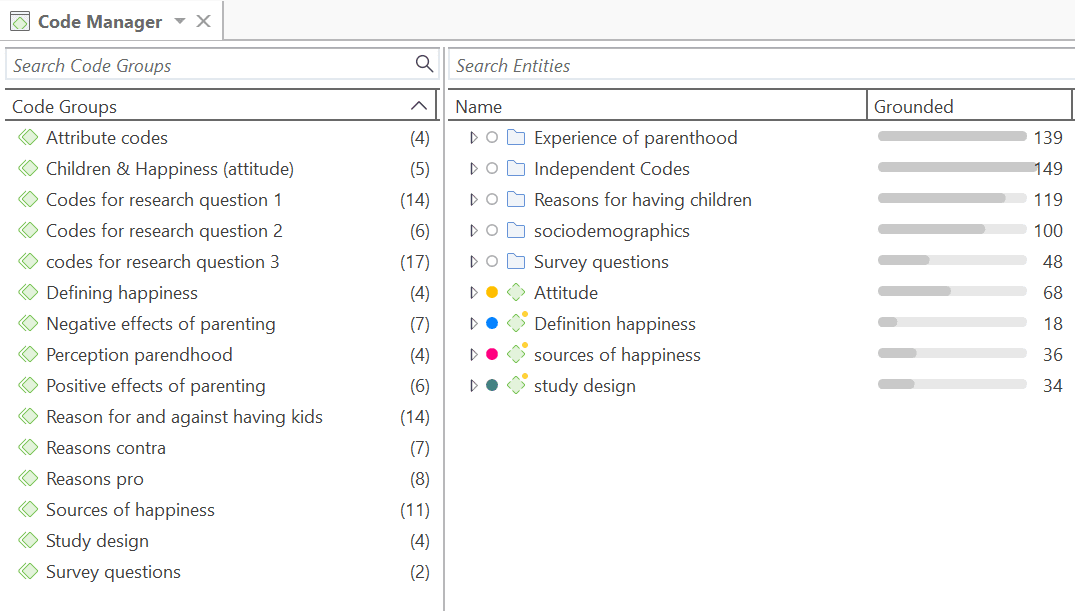 In the second screenshot, the folders have been expanded, and you see the type of categories which were sorted into the various folders.
In the second screenshot, the folders have been expanded, and you see the type of categories which were sorted into the various folders.
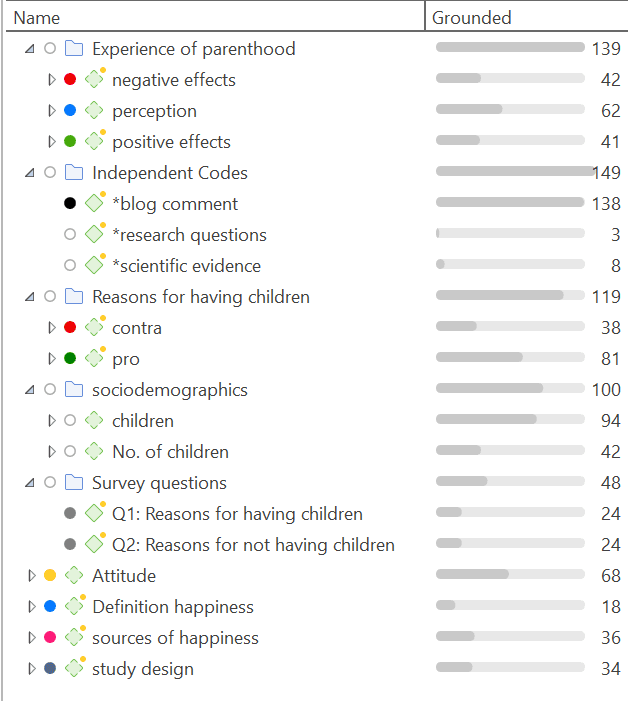
If you have interview transcripts and want to "code" for respondent attributes like gender, age, family status and the like, you need to use document groups. You only code for sociodemographic characteristics if there are multiple respondents in one document as for instance is the case with focus group data.
In the third screenshot, some categories have been expanded, and you see the subcodes. In previous versions of ATLAS.ti it was useful to use the same colour for all codes of a category. Given the new visualizations tools, e.g., in the Document and Code Manager, it can be useful to give each subcode a different color as shown for the category 'sources of happiness'.
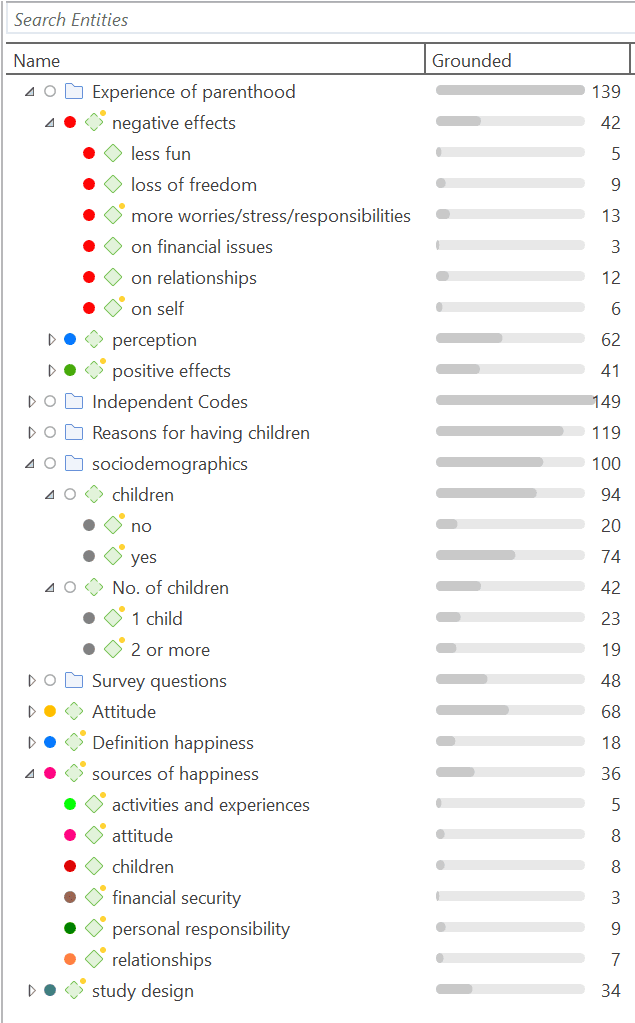
Characteristics of a well-structured code list
- Each code is distinct, its meaning is different from the meaning of any other code.
- The meaning of each code is described in the code comment.
- Each category can be clearly distinguished from other categories.
- All subcodes that belong to a category are similar as they represent the same kind of thing. Nonetheless, each sub code within a category is distinct.
- Each code appears only once in the code system.
- The code system is a-theoretical. This means the code system itself does not represent a model nor a theory. The codes merely describe the data, so that the data can easily be accessed through them.
- The code system should be logical, so you can find what you are looking for.
- The code system contains between 10 and 25 top-level categories.
- The code system is no more than two to three levels deep. Thus, it consists of folders, categories and their subcodes. If there are layers of meaning in a section of your data, it is better to create separate codes and double-code the data. This way you can later associate those layers of meaning, e.g., by using the Code Co-occurrence Table.
Good Practice Tips
Organize your code structure based on conceptual similarities, not observed or theoretical associations, nor according to how you think your will want to write the result chapters.
Use a separate code for each element of what the text is about, i.e., each code should encompass one concept only. If there are multiple aspects, the passage can be coded with multiple codes.
Don't worry if not all of your codes can be sorted into a category. Some codes will remain single codes. In order not to "loose" them collect them in a folder, so they show up in their own section in the code system.
The Role of Code Groups in Building a Code System
If you have a lot of low frequency codes that you want or need to merge, then code groups are a good way to collect them. After you have added all low level codes that belong to the same theme / topic / idea, you can set this code group as filter. This makes it easier to merge the codes. The next most likely step is to create a category and add the merged codes as subcodes. You may want to keep the code group because it will come in handy later in the analysis as filter.
Moving on
Once the data is coded, you have a good overview of your material and can describe it. You can then take the analysis a step further by querying the data. The tools that can be used include the code co-occurrence table, the code document table, the query tool, and the networks.
The goal is to delve deeper into the data and find relationships and patterns. Writing memos is very important at this stage as much of the analysis does not just happen because you apply a tool. The insights come when reading the data resulting from a query, and when writing summaries and interpretations.
Literature
The recommendations in this section are based on the following authors:
Bazeley, Pat (2013). Qualitative Data Analysis: Practical Strategies. London: Sage.
Bernard, Russel H. and Ryan, Gery W. (2010). Analysing Qualitative Data: Systematic Approaches. London: SAGE Publications.
Bodgan, R., and Biklen, S.K. (1992). Qualitative Research for education: An introduction to theory and methods (2nd ed.). Boston: Allyn & Bacon.
Charmaz, Kathy (2006/2014). Constructing Grounded Theory: A Practical Guide Through Qualitative Analysis. London: SAGE Publications.
Corbin, Juliet and Strauss, Anselm (2008/2015, 3rd and 4th ed.). Basics of Qualitative Research: Techniques and Procedures for Developing Grounded Theory. Thousand Oaks, CA: SAGE Publications.
Freeman, Melissa (2017). Modes of Thinking for Qualitative Data Analysis. NY: Routledge.
Friese, Susanne (2019). Qualitative Data Analysis with ATLAS.ti. London: Sage.
Gibbs, G. (2008). Analysing Qualitative Data. London: SAGE.
Guest, G., MacQueen, K.M., and Namey, E.E. (2012). Applied Thematic Analysis. Los Angeles: SAGE Publications.
Guest, G., Kathleen M. MacQueen, and Emily E. Namey (2012). Applied Thematic Analysis. Los Angeles: Sage.
Hammersley M., and Atkinson P. (2007) Ethnography: Principles in Practice. Third edition. London: Routledge.
Johnston, L. (2006). Software and method: Reflections on teaching and using QSR NVivo in doctoral research. International Journal of Social Research Methodology, 9(5), 379–391.
Lofland, J. (1971). Analyzing social settings: A guide to qualitative observation and analysis. CA: Wadsworth.
Miles, Matthew B., Huberman, M., and Saldaña, J. (2014, 3rd ed.). Qualitative Data Analysis. Thousand Oaks, CA: SAGE Publications.
Richards, L., and Morse, J.M. (2013, 3rd ed). Readme first: for a user’s guide to Qualitative Methods. Los Angeles: Sage
Richards, L. (2021, 4ed). Handling qualitative data: A practical guide. London: SAGE Publications.
Saldaña, J. (2021). The Coding Manual for Qualitative Researchers. London: SAGE Publications.
Spradley, James P. (2016). The Ethnographic Interview. Waveland Press.
Strauss, A. (1987). Qualitative analysis for social scientists. Cambridge, UK: Cambridge University Press.
Weston, C., Gandell, T., Beauchamp, J., Beauchamp, C., McApline, L., and Wiseman, C. (2001). Analyzing Interview Data: The Development and Evolution of a Coding System, Qualitative Sociology, 24(3): 381-400.
Creating a Codebook
If you want to create a codebook for the appendix of a report, do not use the Export Codebook option that you find under the Import / Export tab. The purpose of this option is to transfer codebooks between projects or computers. The recommended option to create a code book is to use the Excel export option from the Code Manager:
Open the Code Manager and select Excel Export in the ribbon.
Select all options that you want to include. Essential options for a code book are codes and comments. You may also want to include groundedness, density and code groups.
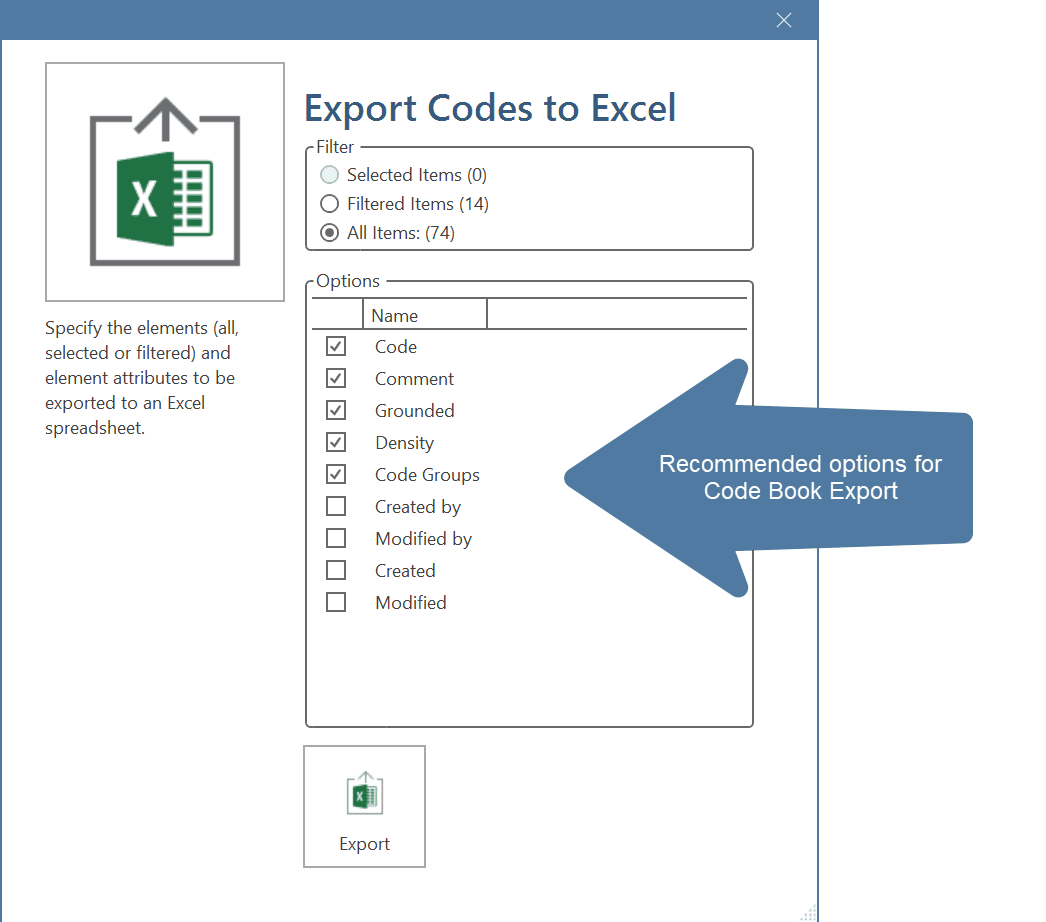
Example Outcome:
Folders and independent codes are listed in the first column, categories in the second column, and subcodes in the third column.

Quotation Reader
The Quotation Reader allows you to conveniently read quotations coded by a selected code or as a result of a query. You can modify existing codes, which means add or remove codes. Elsewhere, this has been referred to as coding on.
In the Quotation Reader, you can:
- change between single line, small and large preview
- add or modify the quotation name
- write a comment for a quotation
- apply new or existing codes
- remove applied codes
- view a quotation in the context of the original document
- delete a quotation
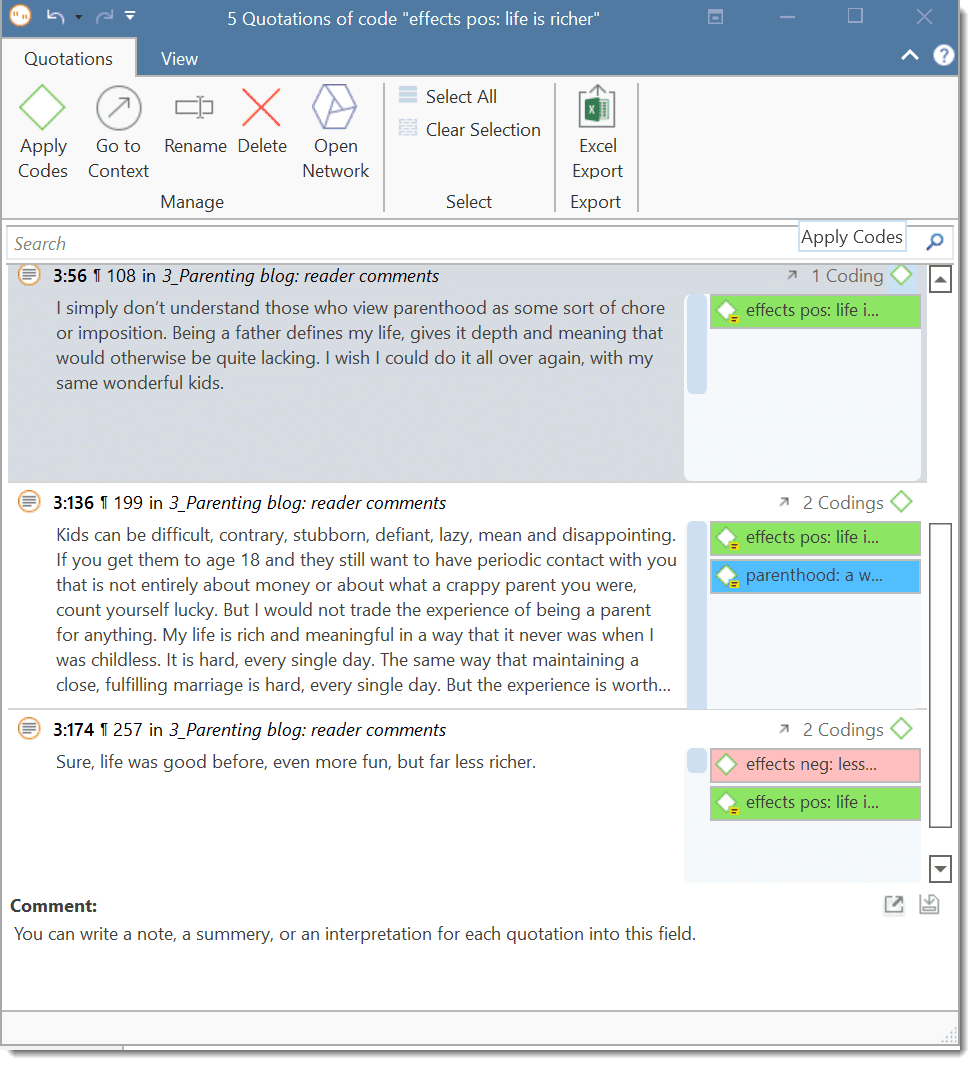
View Options: Depending on the length of your quotations you can adjust the view mode. If you have very short quotations, the single line view might be all what you need to see. It is also useful if you have created your own name for quotations, e.g. to paraphrase textual data or wrote titles for multimedia quotations.
Apply Codes: To change the coding for a quotation, either click on Apply Codes in the ribbon or click on the green code icon. This opens the coding dialogue, and you use all options that are explained in the section Coding Date.
You can also select multiple quotations and code them with a new or an existing code.
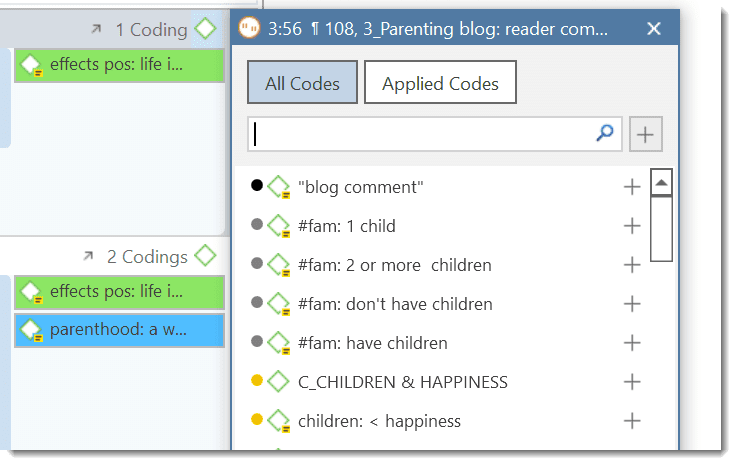
View in Context: If you want to see a quotation in the context of the original document, either click on the up arrow, or the Go to Context button in the ribbon.
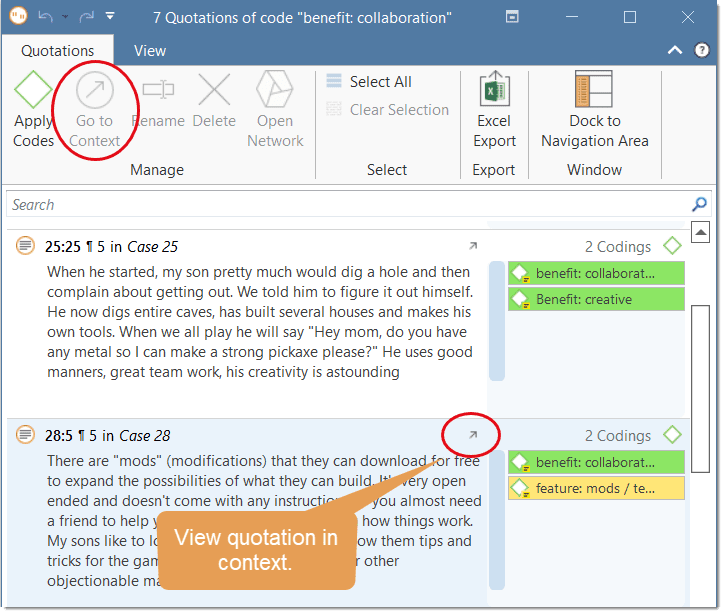
Rename: Select a quotation and click on Rename to add a name for the quotation or to modify a previously entered name.
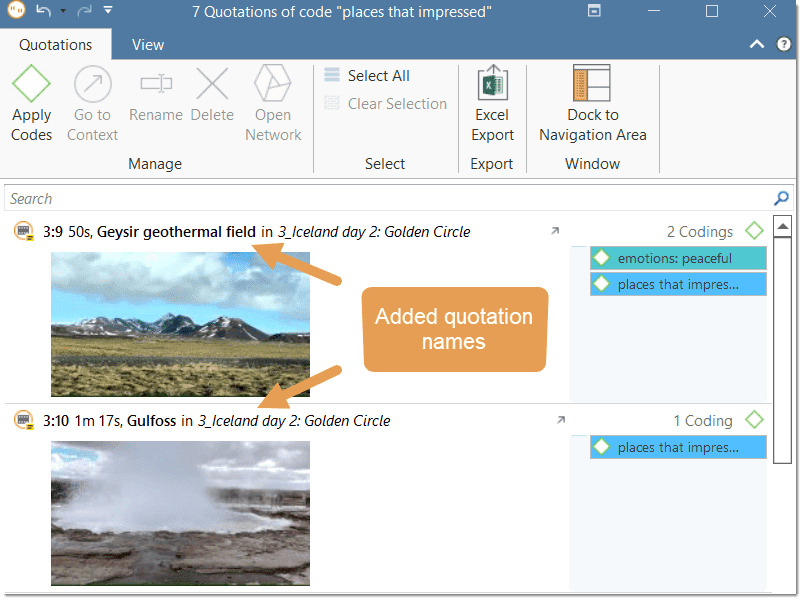
Open Network: If you want to see all links of a quotation, select one or multiple quotations, right-click and select Open Network, or select the Open Network button in the ribbon. See Working with Networks.
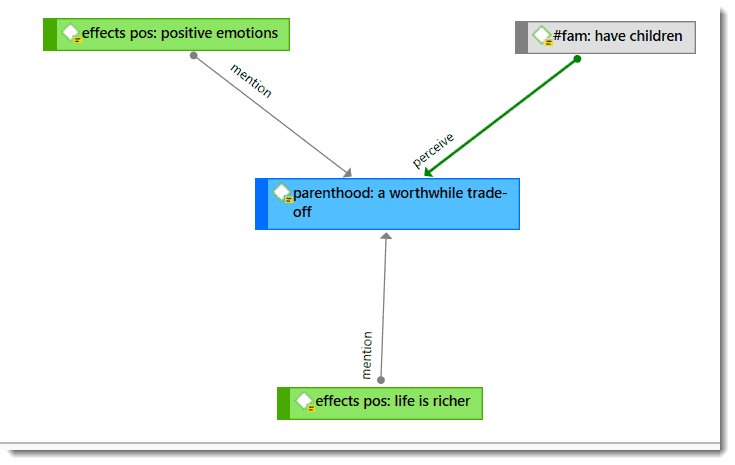
Select All: This option allows you to quickly add or remove codes from all quotations, or to delete all quotations.
If you select all quotations and then the Apply Codes option, you can add a new code or select an existing one. When you click on the + button, all quotations are coded with this code.
Writing Comments for Quotations
If you want to write a comment for a quotation, select it and write a comment in the comment area at the bottom of the Quotation Reader window. Alternatively, right-click and select Edit Comment from the context menu.
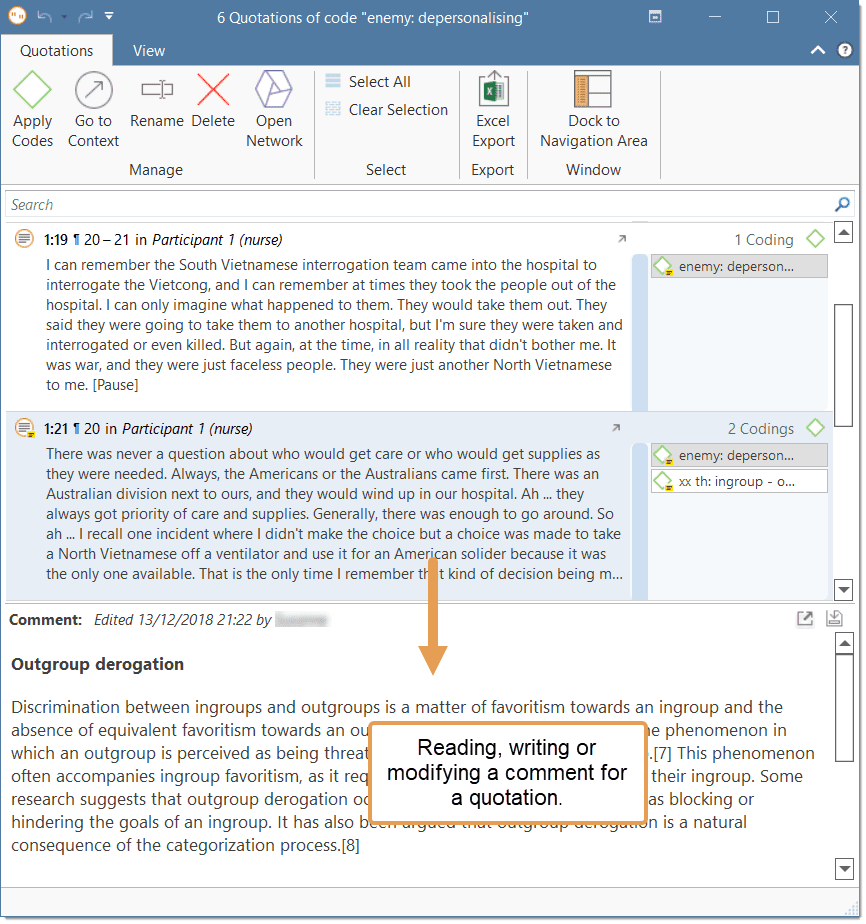
Creating a Report
You can export all or selected quotations from a Quotation Reader in Excel format. To do so, click on the Excel button in the ribbon. Learn more about creating reports here.
Exploring Text Data
A quick way to get a feeling for the content of text documents is by creating a word cloud or word list.
Word lists offer word "crunching" capabilities for a simple quantitative content analysis. This feature creates a list of word frequency counts, and some additional metrics like word length, and percentage of occurrence within or across all selected entities. Word lists can be exported to Excel.
Word clouds are a method for visually presenting text data. They are popular for text analysis because they make it easy to spot word frequencies. The more frequent the work is used, the larger and bolder it is displayed. Word clouds can be exported as image.
Word clouds and word lists can be created for:
- documents and document groups
- quotations
- content of quotations by code and code group
A stop and go list including a list of 'ignorable' characters can be used to control the analysis. Words can also be temporarily removed from a list or cloud without the need to add them to a stop list.
For information see Creating Word Lists and Creating Word Clouds
Creating Word Clouds
To create a word cloud for documents or codes or quotations select one or more items e.g. in the Project Explorer or in the respective manager.
In the Project Explorer, right-click and select the option Word Cloud. In a manager, select the Word Cloud option from the ribbon.
You can always add or remove more items of the same entity type to the cloud or list, once the word cloud has been created.
Other options are:
- to load a document first and select the Word Cloud button in the ribbon.
- to open a manager and select the Word Cloud button in the ribbon.
- You can also access the Word List / Word Cloud via the Search & Code tab.
When you select to create a word cloud from one or multiple codes, the word cloud shows the words of the quotations coded with the selected code(s). If you want your list of codes to be displayed in form of a cloud, you need to select the View tab in the Code Manager and from there the option 'Cloud'. The size of the codes in the Code Cloud is related to its frequency. See Working with Codes.
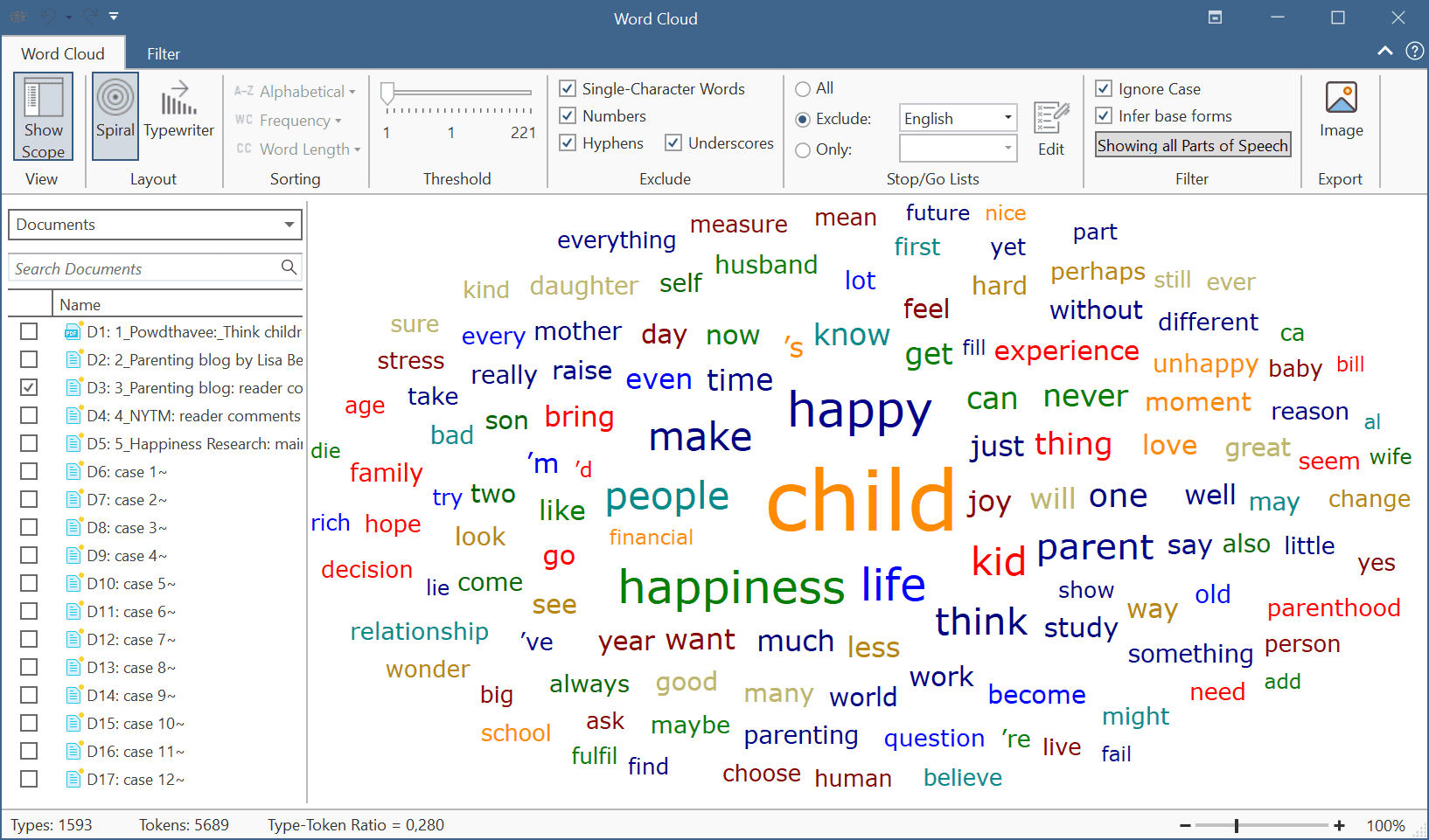
When you hoover over a word, its frequency is shown (= token / number of occurrences of a unique word).
Setting the Scope
Once you created a word cloud, you see a side panel on the left. The check-boxes of the currently active entities are checked. You can check further entities or uncheck already activated entities.
You can also change the entity type. Options are to change between:
- documents
- document groups
- codes
- code groups
- quotations
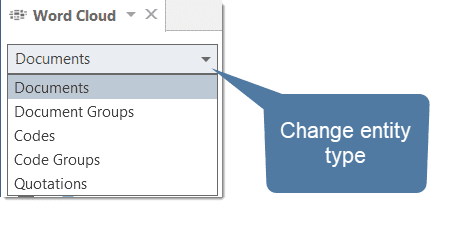
Another scope option is to enter a search term into the search field to look for a specific document, code, or quotations that only contain specific words.
World Cloud Ribbon
The Word Cloud ribbon provides several options:
Show Scope: You can activate or deactivate the side panel that allows you to select the scope.
Spiral: Display of the words in a spiral (default).
Typewriter: Display of words from left to right. You can select whether to list the words in alphabetic order, by frequency of occurrence of by word length in either ascending or descending order.
Sorting: The word cloud can be sorted in alphabetical order, by frequency or word length.
Threshold: My moving the slider from left to right, you can determine that only words with a certain frequency are displayed. The number of the left-hand side shows the lowest, the number on the right-hand side the highest occurring frequency.
Exclude: You can exclude single character words, numbers, hyphens and underscores.
Stop / Go Lists: To exclude particular words, you can select stop lists. If only certain words should be displayed, you can create a Go List. See the section on "Stop and Go Lists" below.
Image: You can save a word cloud as graphic file (.jpg).
Filter
-
Ignore Case: Select this option, if you do not want to count words separately depending on whether they contain upper or lower case letters.
-
Infer base forms: The plural forms of nouns, the past tense, past participle, and present participle forms of verbs, and the comparative and superlative forms of adjectives and adverbs are known as inflected forms. If you activate this options, the word cloud only shows the basic form of the word, e.g. building but not buildings.
-
Parts of Speech: This options allows you to filter your data by specific grammatical elements (parts of speech) like adjectives, nouns, numerals, pronouns, etc. Below you see an example that only shows adjectives:
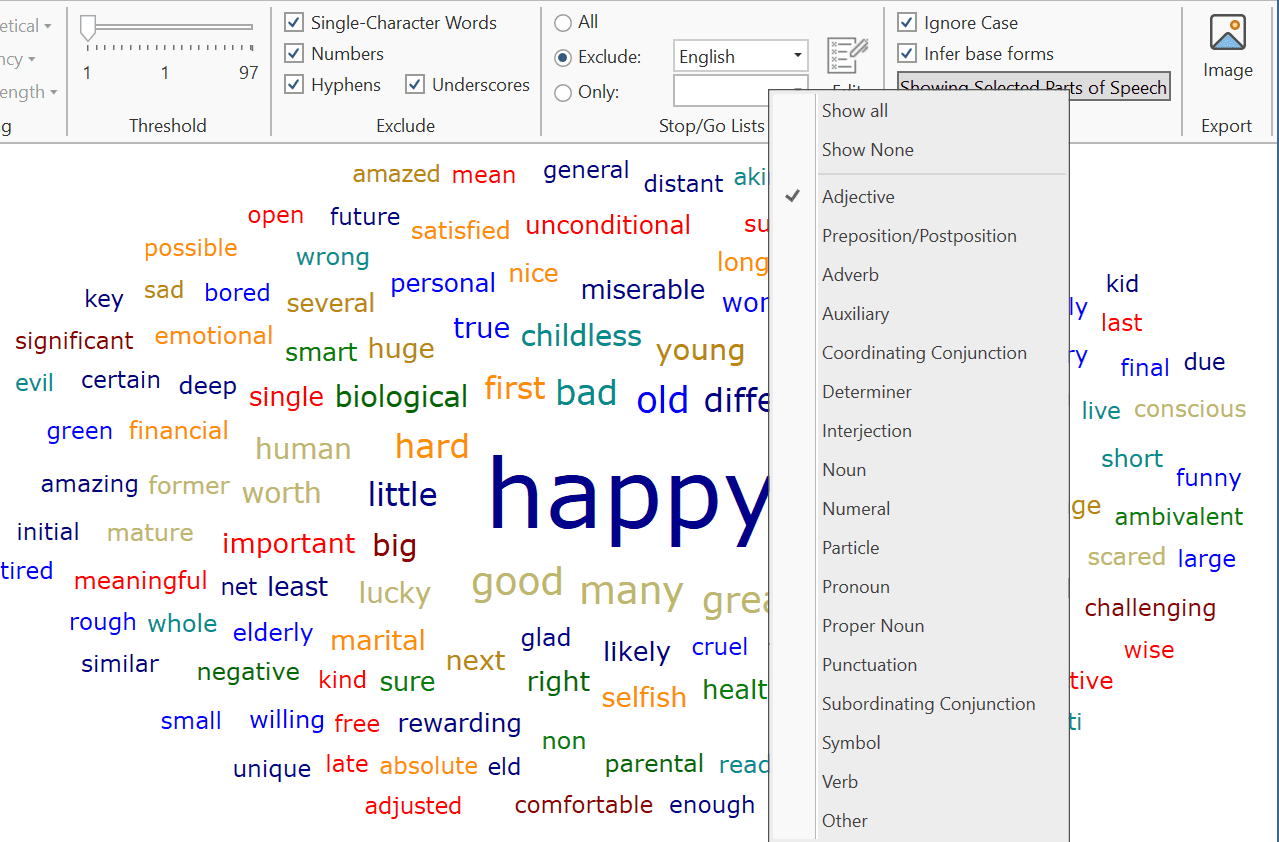
Filter Tab

Character Filter: In this section you can enter special characters that you do not want to be counted and displayed in the word cloud. By default, the following characters are excluded:
|"(){}[]<>/#+-_%$&“”´`@^‘„
You can select whether these characters should generally be removed or only at word ends.
If you add or remove characters, or deactivate the restriction to word ends, you can click on the Reload button. This updates the word cloud.
Context Menu Options
When you right-click on a word, you have the following options:
- Remove from Word Cloud
- Add to Stop List
- Copy to Clipboard
- Search in Context
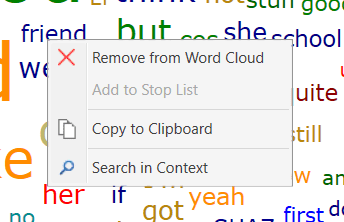
The option Remove from Word Cloud temporarily removes the word from the cloud.
If you have selected a stop list (see below), you can add more words to it. The option will be grayed out as shown in the image above, if no stop list has been selected yet.
The Copy to Clipboard option is useful, if you want to run the auto coding tool based on some words in the word cloud. See Text Search.
The Search in Context option opens the Project Search and shows the selected word in its context.
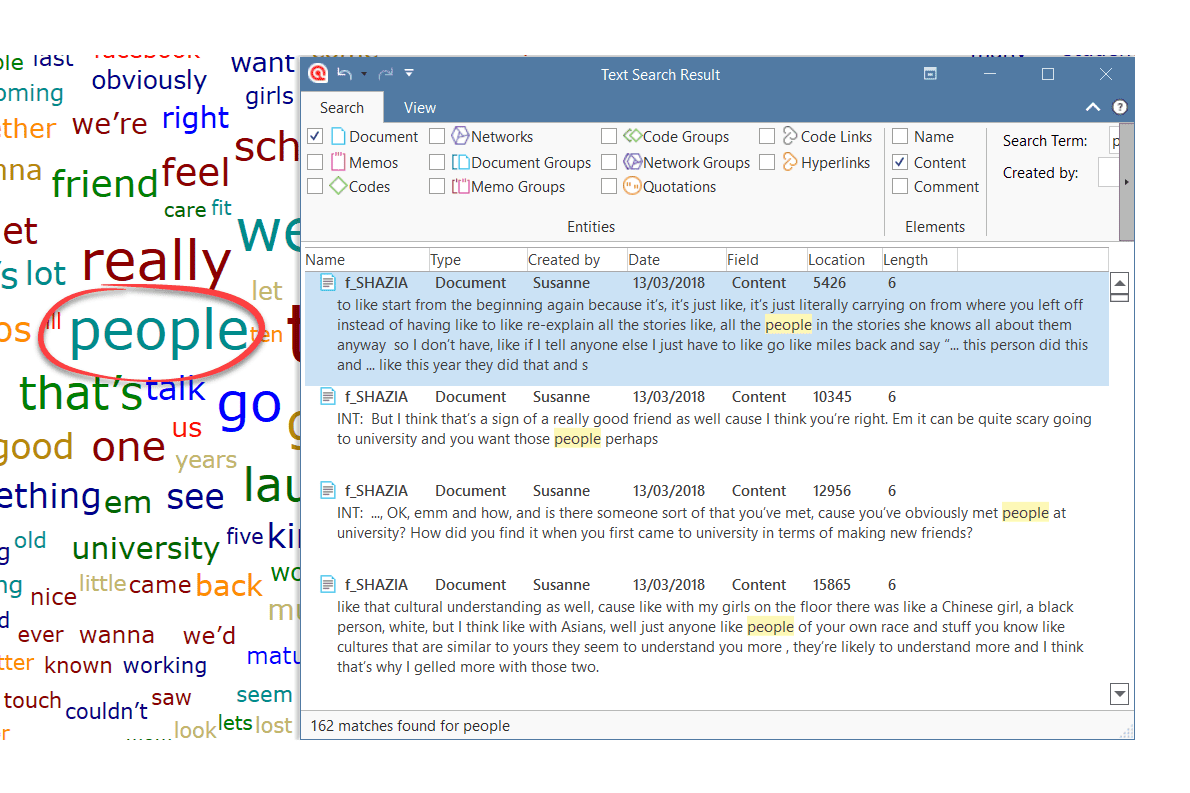
Creating Word Lists
To create a word list for documents or codes or quotations select one or more items e.g., in the Project Explorer or the respective manager.
In the Project Explorer, right-click and select the option Word List. In the Managers, select the Word List option in the ribbon.
You can always add or remove more items of the same entity type to the list, once the word list has been created (see Setting the Scope below).
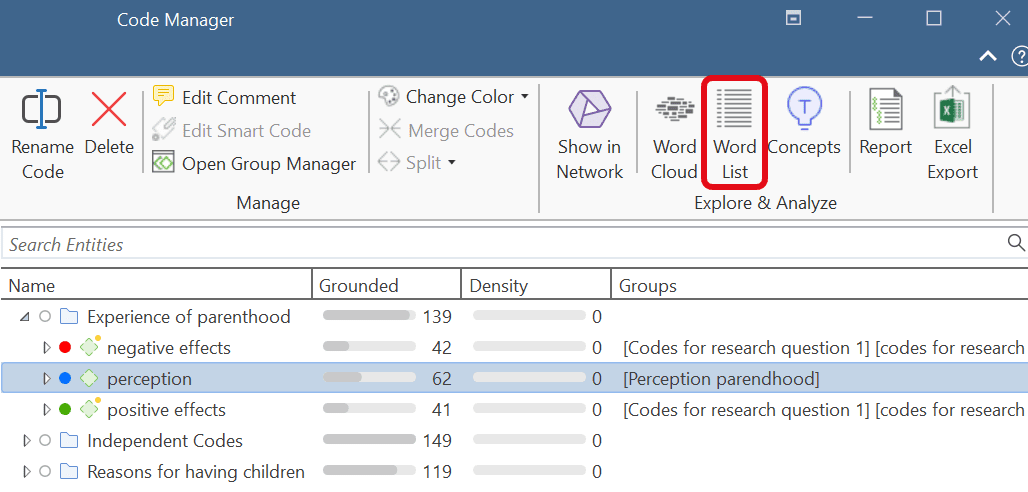
Other options are:
- to load a document first and select the Word List button in the ribbon.
- to open a document, quotation or code manager and select the Word List button in the ribbon.
- You can also access the Word List / Word Cloud via the Search & Code tab.
When you select to create a word list from codes, the word list shows the words of the quotations coded with the selected code(s).
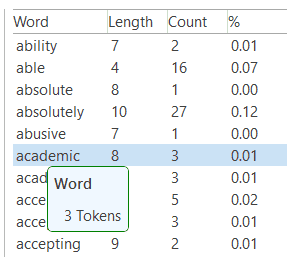
When you hoover over a word, its frequency is shown (= token / number of occurrences of a unique word).
Sorting Word Lists
Be default, word lists are sorted in alphabetic order by the first column 'Word'. You can also sort by any of the other columns by clicking on the column header.
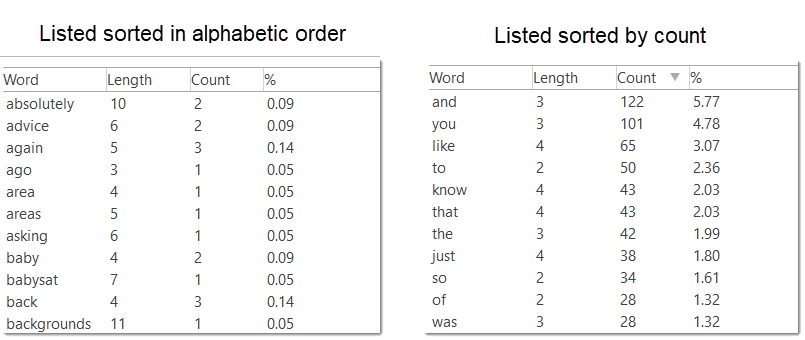
Setting the Scope
Once you created a word list, you see a side panel on the left. The check-boxes of the currently active entities are checked. You can check further entities or uncheck already activated entities.
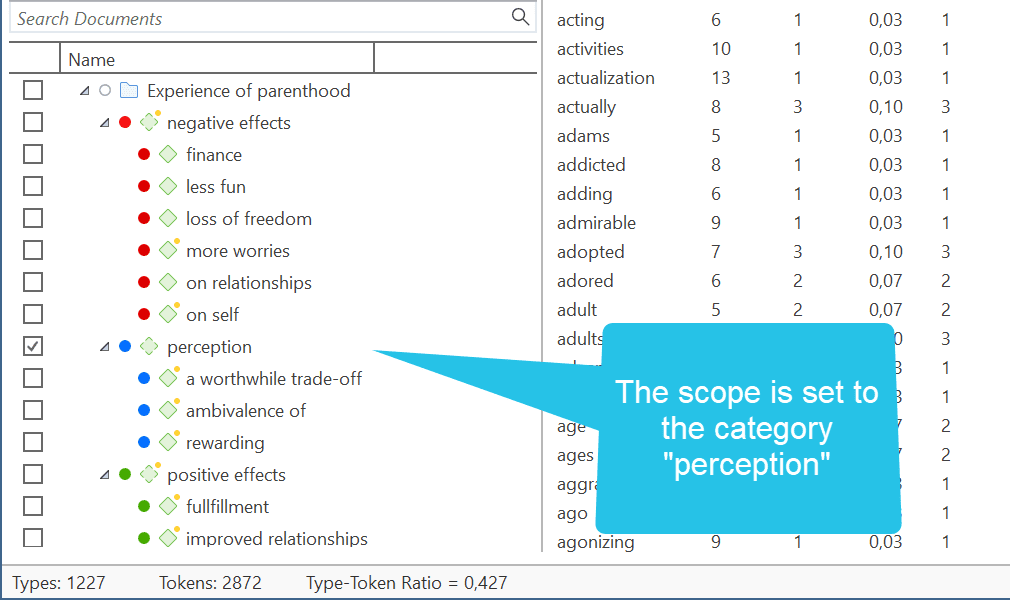
You can also change the entity type. Options are to change between:
- documents
- document groups
- codes
- code groups
- quotations
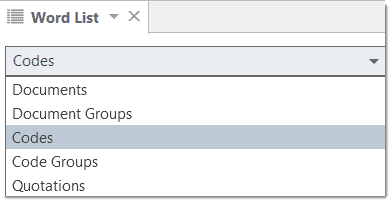
Another scope option is to enter a search term into the search field to look for a specific document, code, or quotations that only contain specific words.
Word List Ribbon

Show Scope: You can activate or deactivate the side panel that allows you to select the scope.
Show Details: Display of the word counts of each document if you have selected multiple documents.
Show Percent: Display the relative frequency of each word (word count relative to the total number of words in the document / all selected documents)
Threshold: My moving the slider from left to right, you can determine that for instance only words with a frequency of at least 10 should be displayed. The number of the left-hand side shows the lowest, the number on the right-hand side the highest occurring frequency.
Exclude: You can exclude single character words, numbers, hyphens and underscores.
Stop / Go Lists: To exclude particular words, you can select stop lists. If only certain words should be displayed, you can create a Go List. See the section on "Stop and Go Lists" below.
Excel: You can export the results of the word list as Excel table. There are limits in terms of how much data can be meaningfully processed, or moreover handled by and displayed in Excel. Assuming there are 2000 unique words in a document, and you process 100 documents, this results in an Excel table consisting of 200.000 cells.
Filter
-
Ignore Case: Select this option, if you do not want to count words separately depending on whether they contain upper or lower case letters.
-
Show Inflected Forms: The plural forms of nouns, the past tense, past participle, and present participle forms of verbs, and the comparative and superlative forms of adjectives and adverbs are known as inflected forms. If you activate this options, the word cloud only shows the basic form of the word, e.g. building but not buildings.
-
Parts of Speech: This options allows you filter your data by specific grammatical elements (parts of speech) like adjectives, nouns, numerals, pronouns, etc. Below you see an example that only shows nouns:
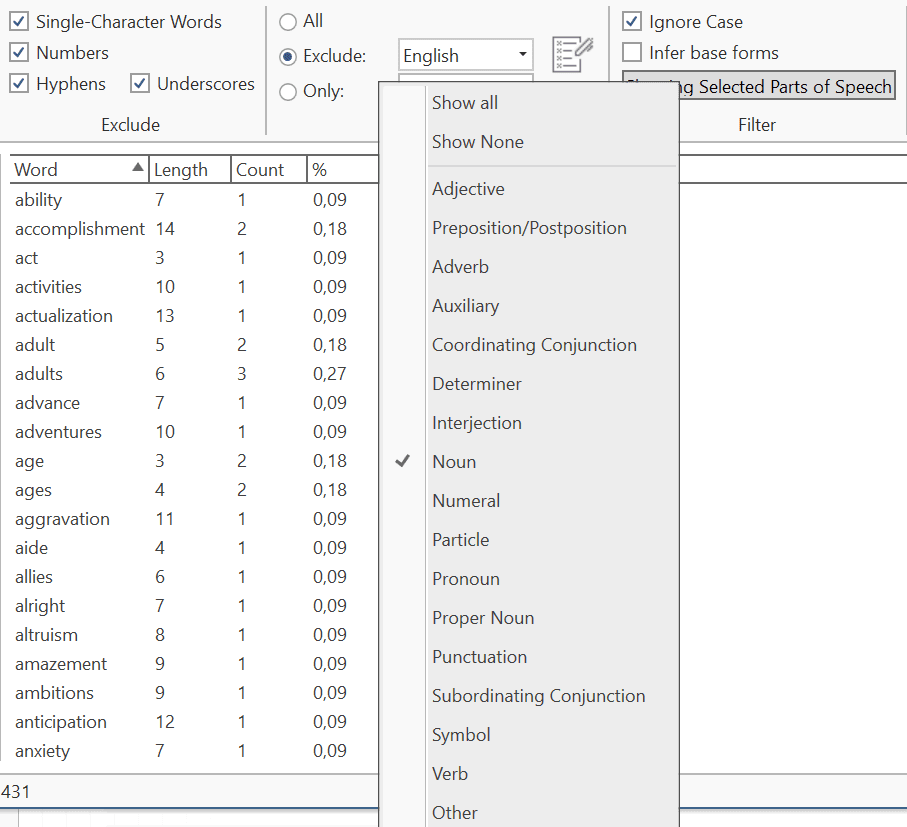
Filter Tab

Character Filter: In this section you can enter special characters that you do not want to be counted and displayed in the word cloud. By default, the following characters are excluded:
|"(){}[]<>/\#+-_%$&“”´`@^‘„
You can select whether these characters should generally be removed or only at word ends.
If you add or remove characters, or deactivate the restriction to word ends, you can click on the Reload button. This updates the word cloud.
Context Menu Options
When you right-click on a word, you have the following options:
- Remove from List
- Add to Stop List
- Copy to Clipboard
- Search in Context
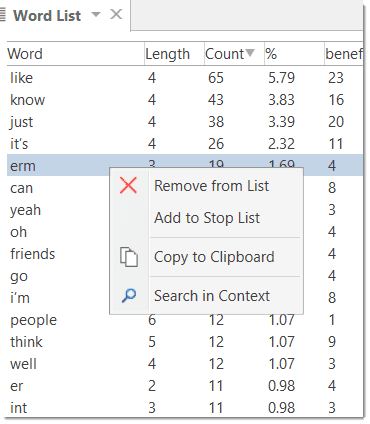
The option Remove from List temporarily removes the word from the list.
If you have selected a stop list (see below), you can add more words to it.
The Copy to Clipboard option is useful, if you want to run the auto coding tool based on some words in the word list. See Text Search.
The Search in Context option opens the Project Search and shows the selected word in its context.
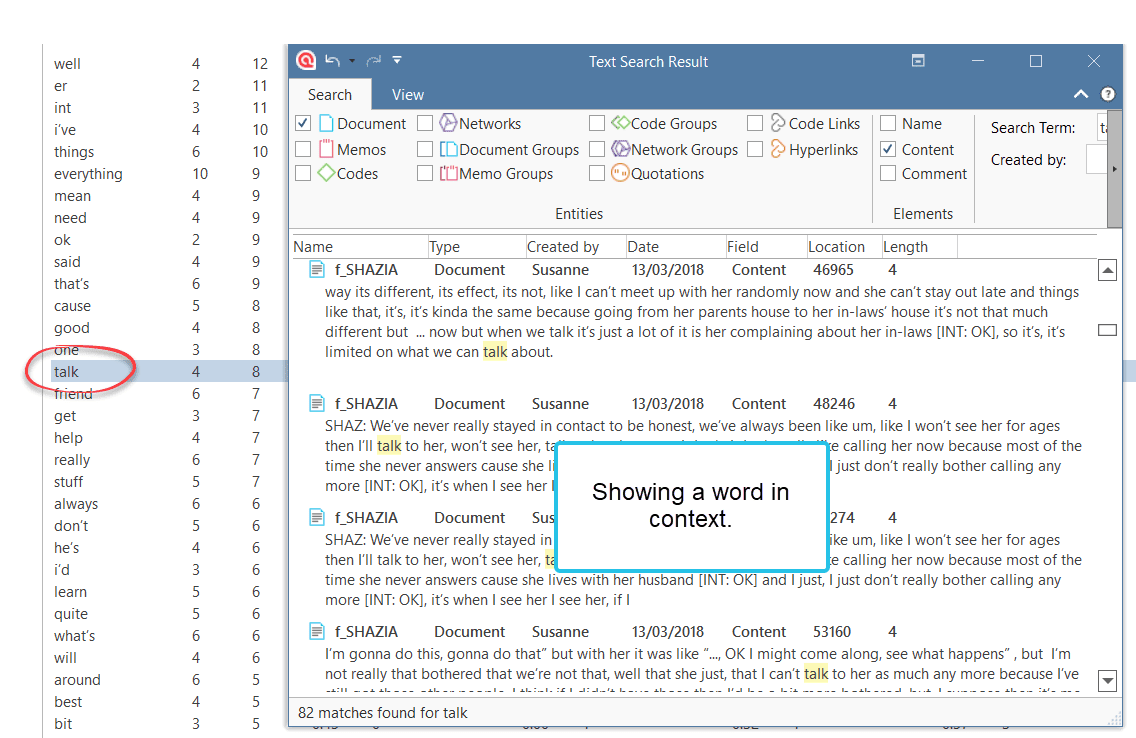
Stop and Go Lists
Working with Stop and Go Lists are explained in detail here.
Stop and Go Lists
Words in stop lists are words which are filtered out when processing text. Stop words are short function words that occur very often and which do not convey any particular meaning. Examples are 'the', 'a', 'you', 'is', 'at', 'on' and 'which'. ATLAS.ti offers predefined stop lists in 35 languages. These stop lists are based on the information provided by Ranks NL.
In contrast, if you set a word list as Go List, then only the words that are in the list are counted.
Selecting a Stop List
To select a stop list, click on the drop-down button for Exclude
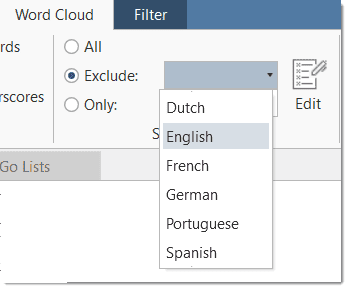
Importing a Stop List
If you have been importing an older version 8 project, the selection list might be empty:
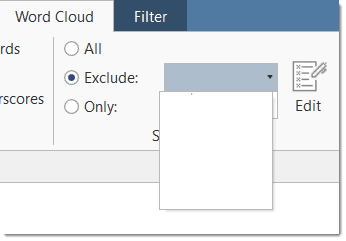
All available stop lists are however already on your computer. They were copied during the installation on ATLAS.ti. To retrieve them:
Click on the Edit button and select Import Lists.

This brings you do the directory where all stop lists that come with ATLAS.ti are stored:
C:\Users...\Documents\Scientific Software\ATLASti.22\Stopwords
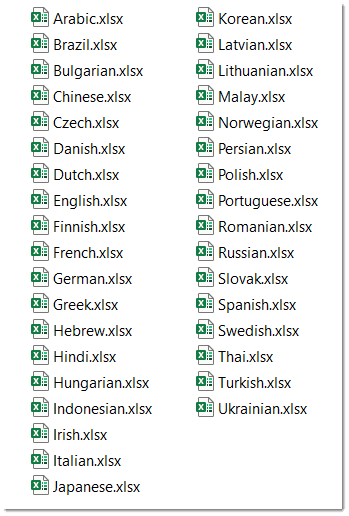
Select all lists that you want to use and click Open.
Close the window, return to the word cloud and select a stop list.
Below you see an example for a word cloud where a stop list was applied:

Cleaning up a Word Cloud
In the word cloud above, there are still a lot of words that distract from the content of the interviews like all speaker IDs: INT, SHAZ, DEB, AL, STU.
You can either remove the words from the current cloud, or add the words the stop list. Then they are also not counted in other word clouds that you create later.
To remove a word from a word cloud temporarily, select the word, right-click and select Remove.
If you want to remove it from all word clouds permanently:
Right-click on a word and select Add to stop list.

The cleaned up word cloud might look as follows:

Creating a New Stop or Go Lists
In the ribbon in the section Stop/Go Lists, click on the Edit button.
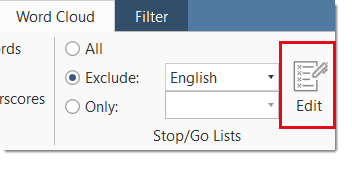
In the next window, select New List from the ribbon.

Enter a name for the list and select as list type: Stop List or Go List. Enter an optional comment to describe the purpose of the list.
Click Create.
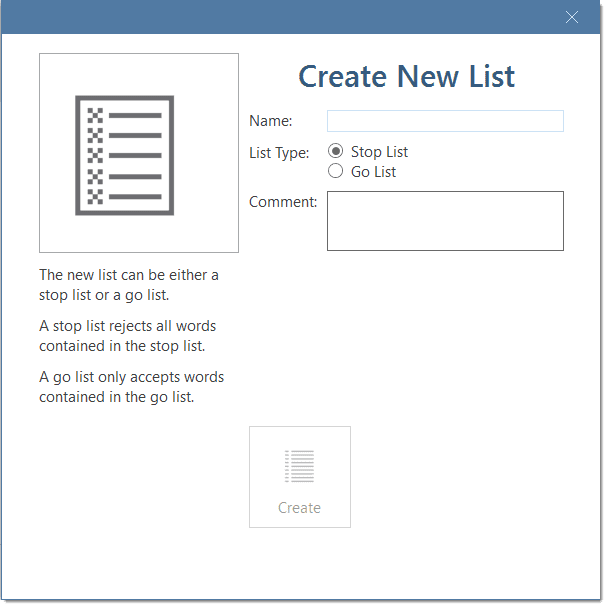
To add words to the newly created list, click on th New Word button a few times. Every time you click, a new field is added where you can enter a word.
RegEx: You can enter regular expressions, if you want to enter specific terms to the list. If so, you need to tick the Regex box. Optionally you can write a comment that explains the regular expression.
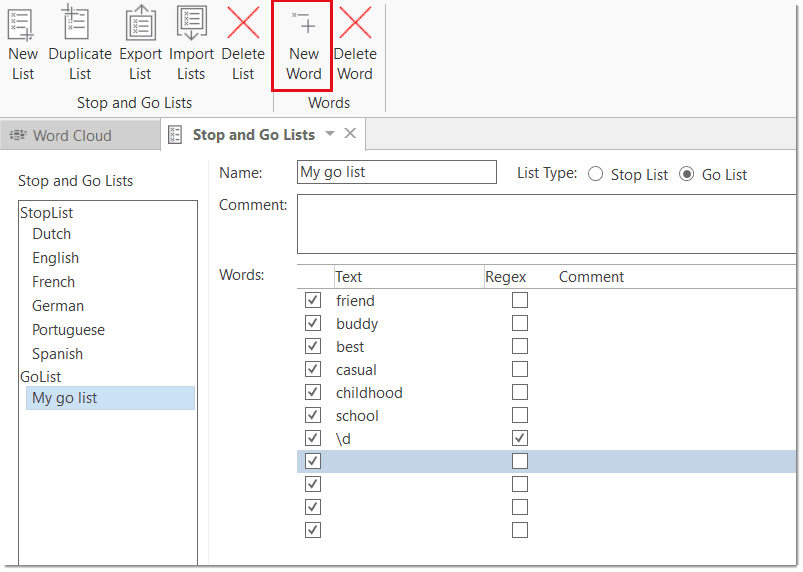
You can turn a stop list into a go list (or vice versa) by changing the List Type. Other options in the ribbon are to duplicate and to delete word lists.

Exporting a Stop or Go List
Exporting a stop or go list allows you to:
- share it with other users
- use it in another project
In the ribbon, click on Export List. A file manager opens. Select a location and enter a name and click on Save.
The list is saved as Excel file.
Creating a User-Defined Stop or Go List in Excel
Importing a user defined list works as follows:
Export an existing list and open it in Excel. It serves as a template.
In Excel, change the name of the list, but leave all the header information as is. If you want to prepare a go list, enter 'no' in the second column/second row under Stop List.
Now delete all words and replace them with new words, one word per row.
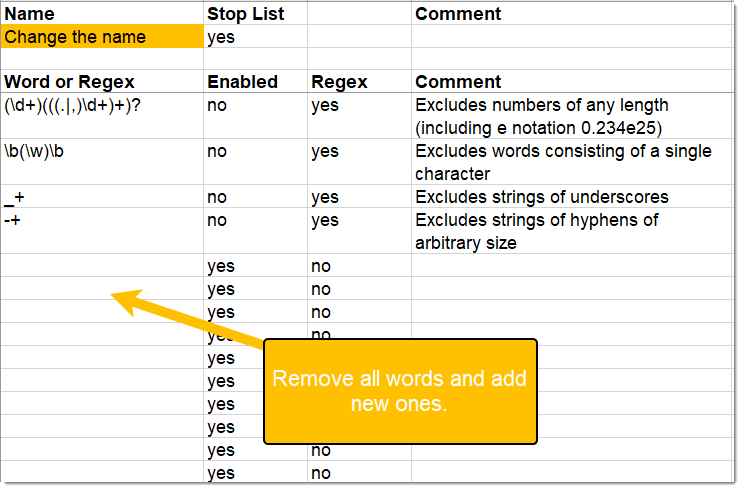
Save the list under a new name and import it.
Type-Token Ratio
The type-toke ration (TTR) is the relationship between the number of unique words that occur in a text and their frequencies. The number of unique words in a text is often referred to as the number of tokens. Several of these tokens are repeated.
- The type-token ratio can vary between 0 and 1.
- The more types there are in comparison to the number of tokens (the higher the value), the more varied is the vocabulary. This means there is greater lexical variety in the text.
The type-token ration is calculated as follows:
Type-Token Ratio = (number of types/number of tokens) * 100
In word lists and word clouds, you find the type-token ratio in the status bar at the bottom.
The type/token ratio (TTR) varies very widely in accordance with the length of the text - or corpus of texts - which is being studied. A 1,000-word article might have a TTR of 40%; a shorter one might reach 70%; 4 million words will probably give a type/token ratio of about 2%.
Automatically Code Data
With the recent advances in deep learning, the ability of algorithms to analyse text has improved considerably. Creative use of advanced artificial intelligence techniques can be an effective tool for doing in-depth research.
Under the Search & Code tab, ATLAS.ti offers five ways of searching for relevant information in your data that can then be automatically coded.

- Find Concepts and Auto-code
- Text search
- Expert search with regular expressions
- Named Entity Recognition (NER)
- Sentiment Analysis
If you enter a term for a text search, you can select similar words from a list of synonyms. Synonyms are available in English, German, Spanish, Portuguese, French, Dutch, Russian and Simplified Chinese.
Language models for the above-listed languages are also available for Named Entity Recognition, Sentiment Analysis, and Concept Search.
As ATLAS.ti is a tool for qualitative data analysis, the process is not fully automated. Before coding the data, you can review all results, make modifications or decide not to code certain finds.
Artificial intelligence techniques have been developed for big data analysis. The data corpora usually handled by ATLAS.ti are considerably smaller. Thus, you cannot expect all results to be perfect. Reviewing the results will be a necessary component of the analysis process when using these tools. When working with the tools, you will see that the tools will add another level to your analysis. You find things that you simply do not see when coding the data manually, or would have not considered to code. We, at ATLAS.ti, consider manual and automatic coding to be complementary; each enhancing your analysis in a unique way.
Text Search and Auto-Code
Video Tutorial: Text search and auto-code. When using this tool, you enter your own search term and can let ATLAS.ti automatically code your data. The tool offers a number of additional functions that make it more than a simple auto coding tool:
- You can select synonyms. Synonyms are available in English, German, Spanish, Portuguese, French, Dutch, Russian and Simplified Chinese.
- You can combine multiple search terms using Boolean operators (AND; OR) to look for occurrences within a sentence or paragraph, or multiple syllabuses in a word.
- You can search for inflected forms, i.e. searching for "run" will also search for running, runs, ran.
- You can use wildcards (*)
- You can search for exact phrases by entering parentheses as in: „limited liability corporations”.
Carrying out a text search
To open the tool, select the Search & Code tab and from there Text Search.
inst
Select documents or document groups that you want to search and click Continue.
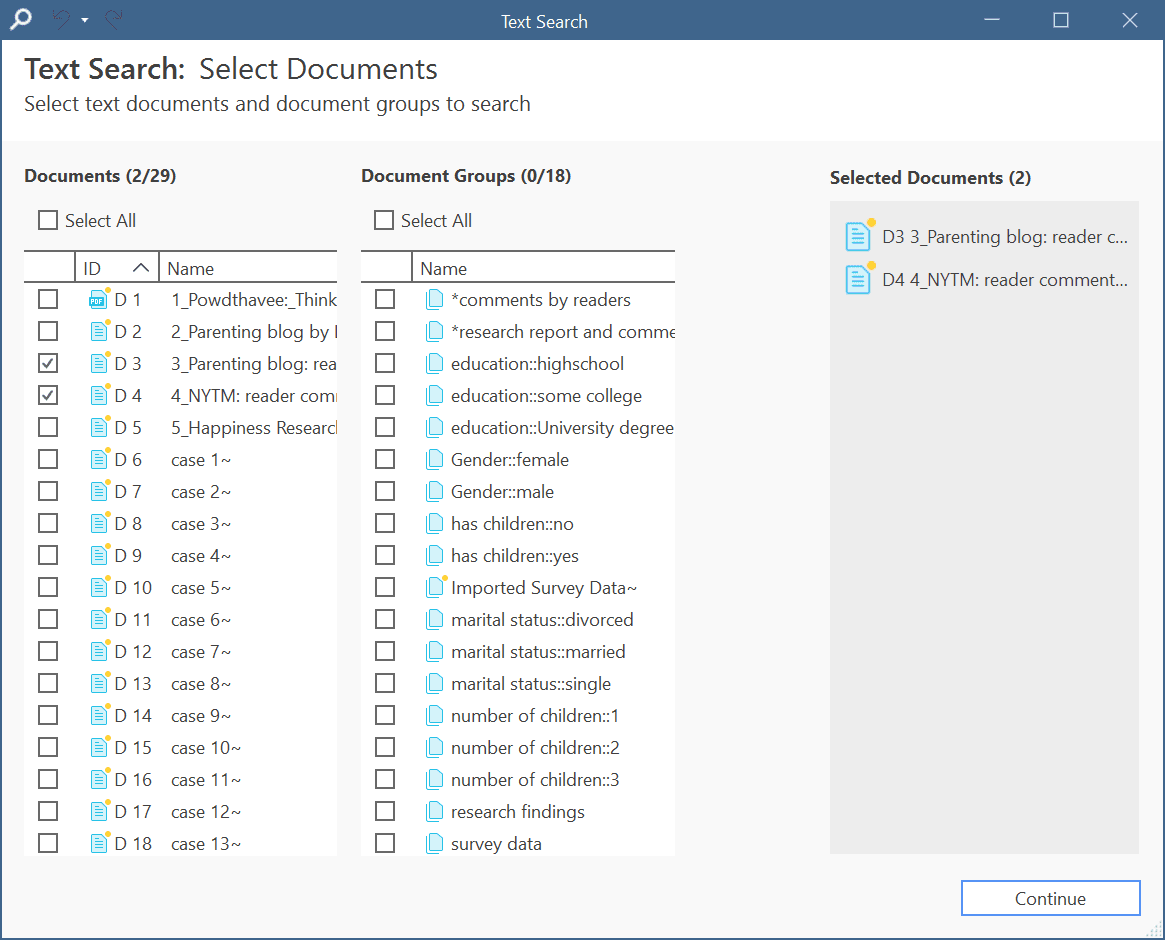
Select the base unit for the search and the coding:
- Paragraphs
- Sentences
- Words
- Exact matches (wild cards can be used)
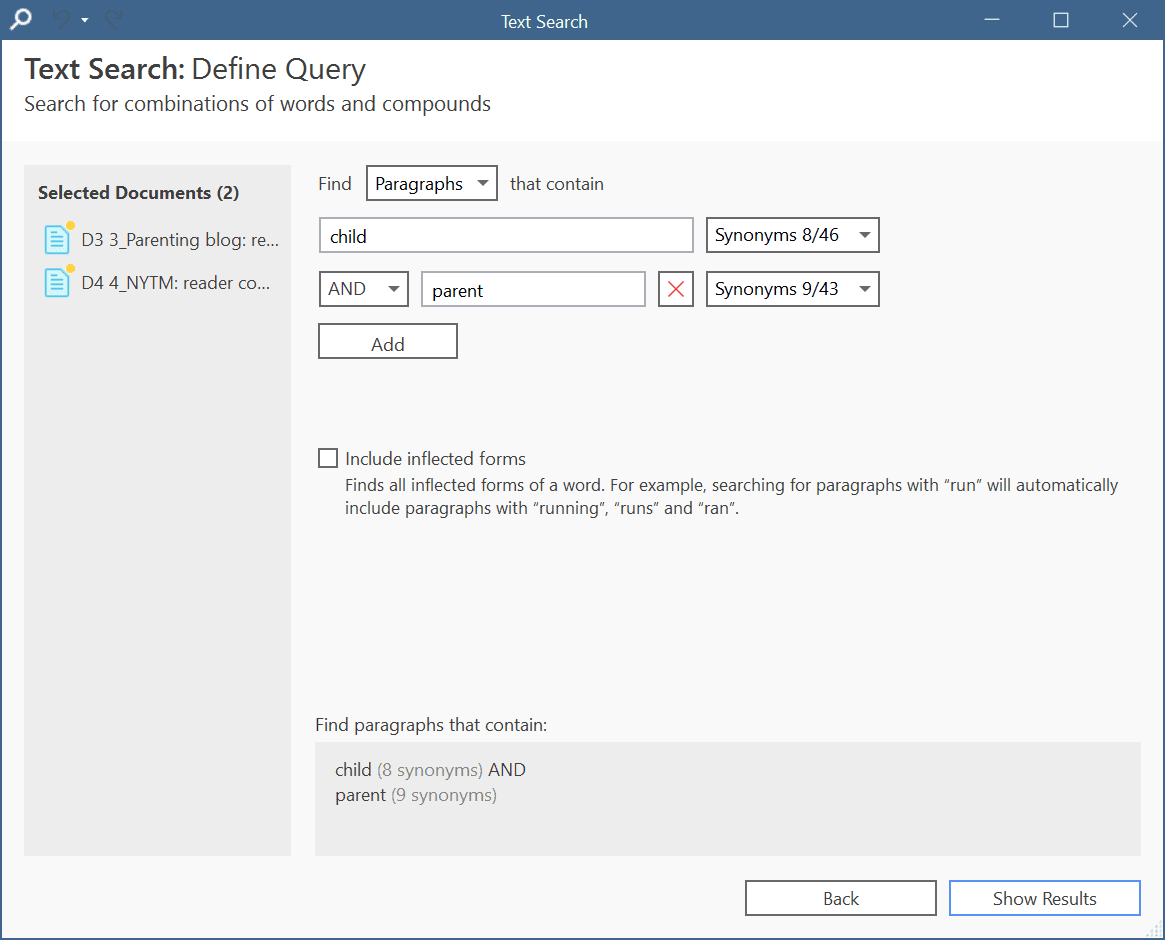
Enter a search term. If synonyms are available, you can select them from the drop-down list right to the search entry field.
You can add more search terms linking them with Boolean operators:
-
AND: All of the entered search terms must occur in the selected context (paragraph, sentence, word).
-
OR: Results are returned if any of the search terms occur in the selected context (paragraph, sentence, word).
Activate the option inflected forms if desired. This option is currently available for all interface languages.
Inflected forms: The plural forms of nouns, the past tense, past participle, and present participle forms of verbs, and the comparative and superlative forms of adjectives and adverbs are known as inflected forms. To improve results you can download and install a more comprehensive model. To do so, click on Manage Models.
To run the search, click on Show Results.
The result page shows you a Quotation Reader indicating where the quotations are when (auto-)coding the data. If coding already exist at the quotation, it will also be shown.
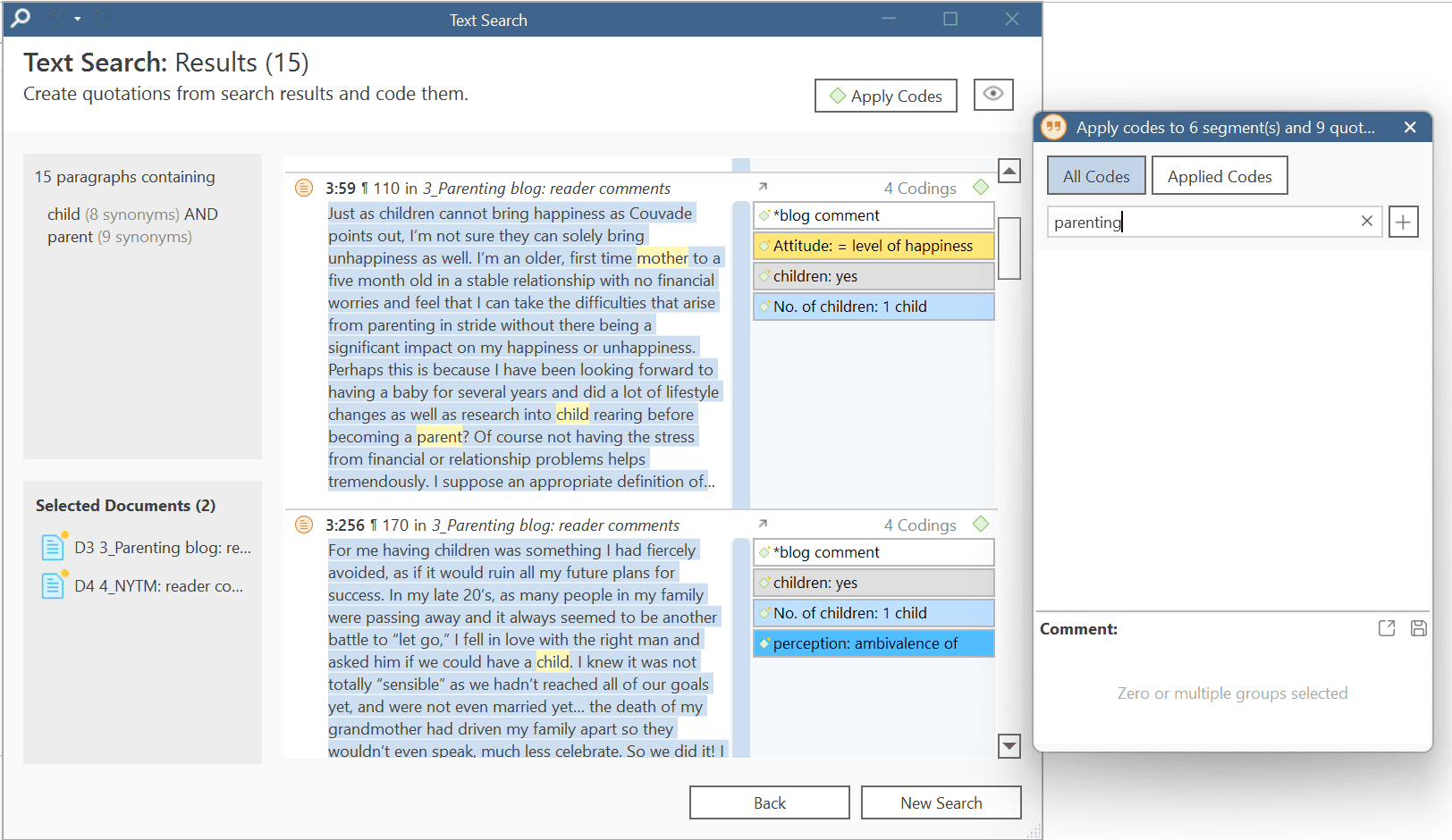
By clicking on the eye, you can change between small and large previews.
You can auto code all results with one code by highlighting all data segments, e.g. via Ctrl+A. Then select Apply Codes, enter a code name and click the plus icon.
Depending on the area you have selected, either the exact match, the word, the sentence or the paragraph is coded.
Another options is to review each find and code it by clicking on the coding icon. This opens the regular Coding Dialogue.
Exact Match Search
An exact match search finds the characters as they are entered into the search field. The search results for 'emotion' could look as follows:
- emotions
- emotionless
- demotion
- demotional
If you only want to find "emotion", you need to add parentheses around the search term. See: Exact Phrase Search.
Exact Phrase Search
When you want to search using an exact phrase, you simply surround your search expression with quotation marks. For example, if you want to search for limited liability corporations but only want to retrieve results in which the terms appear as an exact phrase, type "limited liability corporations" (including the quotation marks) into the search field.
Your search results will only include data segments that contain the exact phrase - limited liability corporations - as typed between the quotation marks, but will not include results where the terms are separated by other words, as in: corporations with limited liability.
For best results, do not include wildcard characters in an exact phrase search unless the wildcard character * is part of the phrase you are looking for.
Expert Search with Regular Expressions (regex)
GREP is a well-known search tool in the UNIX world. The original GREP tool printed each line containing the search pattern, hence the acronym GREP (Globally search for a Regular Expression and Print matching lines).
In ATLAS.ti, the results of a GREP search are not printed line-by-line; rather, the text matching the search pattern is highlighted on the screen, or you can automatically code the results including some surrounding context.
The core of a GREP search is the inclusion of special characters in the search string that control the matching process. GREP finds instances in your data that match certain patterns.
You can test and debug any regular expression you formulate on this website: https://regex101.com/
Carrying out a text search with Regex
To open the tool, select the Search & Code tab and from there Expert Search.
Select documents or document groups that you want to search and click Continue.
Select the base unit for the search and the coding:
- Paragraphs
- Sentences
- Words
- Exact matches
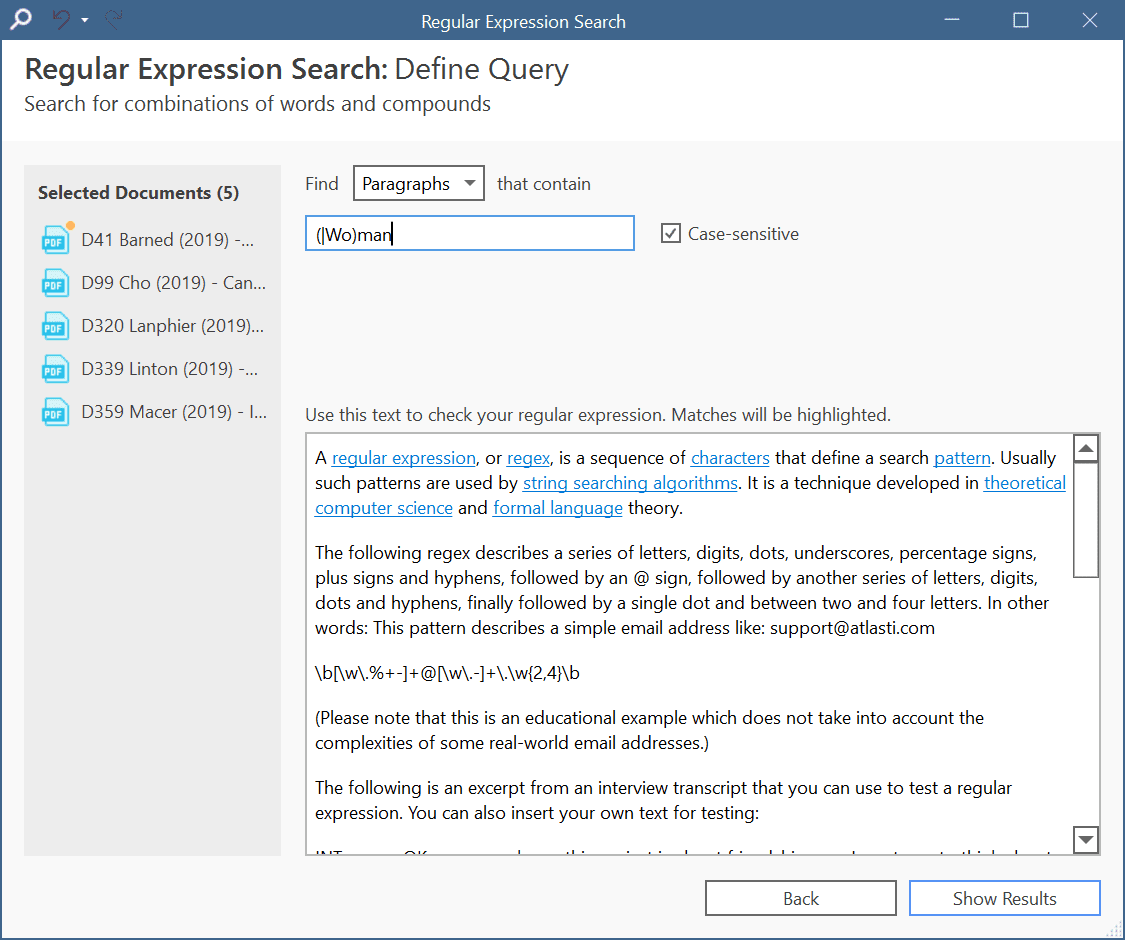
Enter a search term. You can test your search expression in the text that you see in the lower half of the screen.
To run the search, click on Show Results.
The result page shows you a Quotation Reader, indicating where the quotations are when (auto)coding the data. If codings already exist at the quotation, those will also be shown.
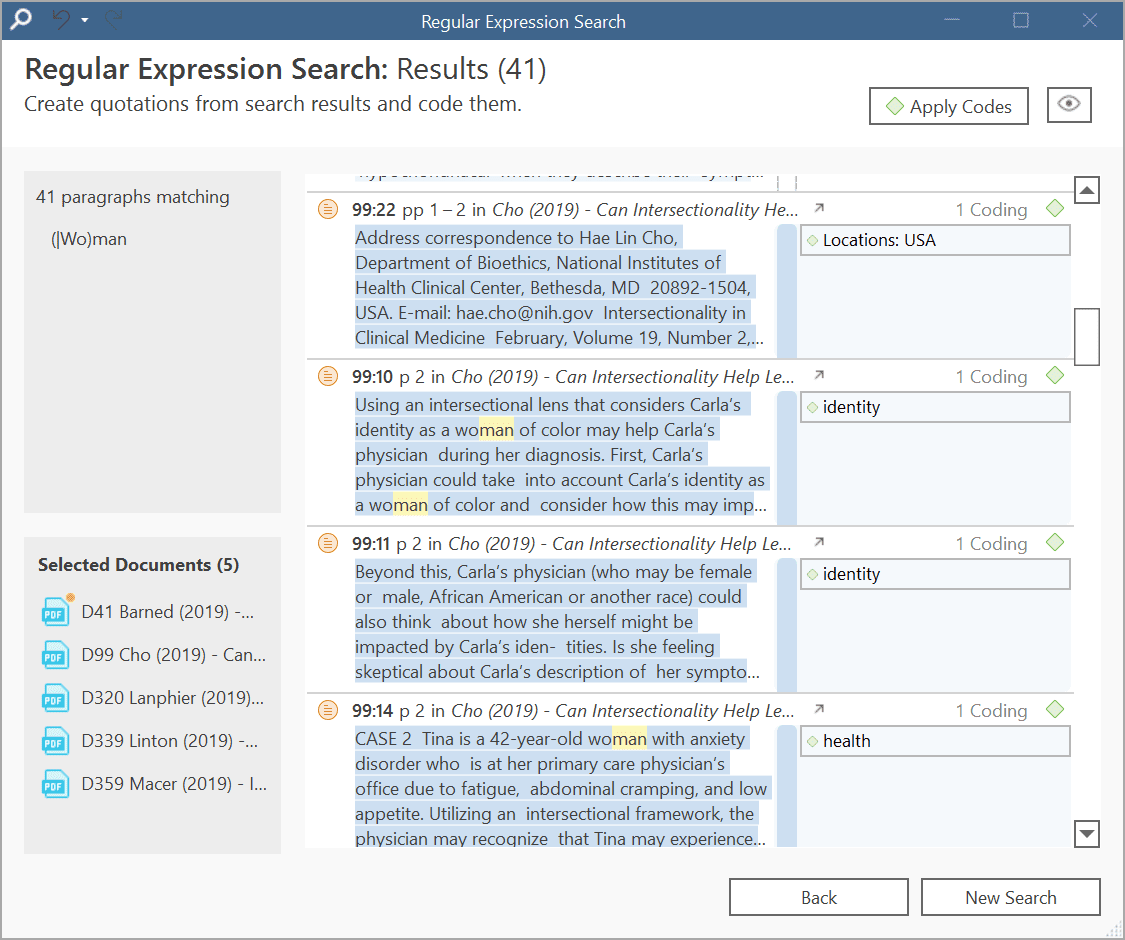
By clicking on the eye icon, you can change between small, medium and large previews.
You can autocode all results with one code by highlighting all data segments, e.g. via Ctrl+A. Then select Apply Codes, enter a code name and click the plus icon. Depending on the area you have selected, either the exact match, the word, the sentence or the paragraph is coded.
Another options is to review each find and code it by clicking on the coding icon. This opens the regular Coding Dialogue.
GREP Examples
| GREP Expression | Description |
|---|---|
^ | Matches an empty string at the beginning of a line. |
$ | Matches an empty string at the end of a line. |
. | Matches any character except a new line. |
+ | Matches at least one occurrence of the preceding expression or character. |
* | Matches the preceding element zero or more times. For example, ab*c matches "ac," "abc," "abbbc," etc. |
? | Matches the preceding element zero or one time. For example, ba? matches "b" or "ba." |
[] | Matches a range or set of characters: [a-z] or [0-9] or [aeiou]. For example: [0-9] finds all numeric characters, while [^0-9] finds all non-numeric character |
\b | Matches an empty string at a word boundary |
\B | Matches an empty string not a word boundary |
< | Matches an empty string at the beginning of a word |
> | Matches an empty string at the end of a word |
Enclose ORed expressions with parentheses if OR should be restricted to certain sequences of characters or expressions. See example below
Backspace character disables the special GREP functionality of the following character:
| GREP Expression | Description |
|---|---|
\d | Matches any digit (equivalent to [0-9]) |
\D | Matches anything but a digit |
\s | Matches a white-space character |
\S | Matches anything but a white-space character |
\w | Matches any word constituent character |
\W | any character but a word constituent |
Character classes
| Character Class | Description |
|---|---|
[:alnum:] | Any alphanumeric, i.e., a word constituent, character |
[:alpha:] | Any alphabetic character |
[:cntrl:] | Any control character. In this version, it means any character whose ASCII code is < 32. |
[:digit:] | Any decimal digit |
[:graph:] | Any graphical character. In this version, this mean any character with the code >= 32. |
[:lower:] | Any lowercase character |
[:punct:] | Any punctuation character |
[:space:] | Any white-space character |
[:upper:] | Any uppercase character |
[:xdigit:] | Any hexadecimal character |
Note that these elements are components of the character classes, i.e. they have to be enclosed in an extra set of square brackets to form a valid regular expression. A non-empty string of digits or arbitrary length would be represented as [[:digit:]]+
Examples of GREP Searches
In the following, a few search examples are presented showing the matching GREP expression in the column on the right.
-
The expression
man|womanmatches "man" and "woman." You could also use(|wo)manto the same effect. -
H(a|e)llomatches "Hello" and "Hallo." -
H(a|e)+llomatches "Haaaaaallo" as well as "Heeeeeaaaaeaeaeaeaello." -
And how about
the (angry|lazy|stupid) (man|woman) (walk|run|play|fight)ing with the gr(a|e)y dog- get the idea?
Named Entity Recognition (NER)
Video Tutorial: Named Entity Recognition.
In natural language processing, Named Entity Recognition (NER) is a process where a sentence, or a chunk of text is parsed through to find entities that can be put under categories like person, organization, location, or miscellaneous like work of arts, languages, political parties, events, title of books, etc.
This function is available for the following languages:
- English
- German
- Spanish
- Portuguese
- French
- Dutch
- Russian
- Simplified Chinese
You can think of it like a special auto coding procedure, where you as the user do not enter a search term. Instead, ATLAS.ti goes through your data and finds entities for you.
You can select which entities you want to search for:
- person
- organization
- location
- miscellaneous (work of arts, languages, political parties, events, title of books, etc.)
After the search is completed, ATLAS.ti shows you what it found, and you can make corrections. In the next step you can review the results in context and code all results with the suggested codes, or decide for each hit whether to code it or not.
To open the tool:
Select the Search & Code tab and from there Named Entity Recognition.
inst
Select documents or document groups that you want to search and click Continue.
Select whether the base unit for the search, and the coding should be paragraphs, sentences, or word, and which entity category you want to search for.
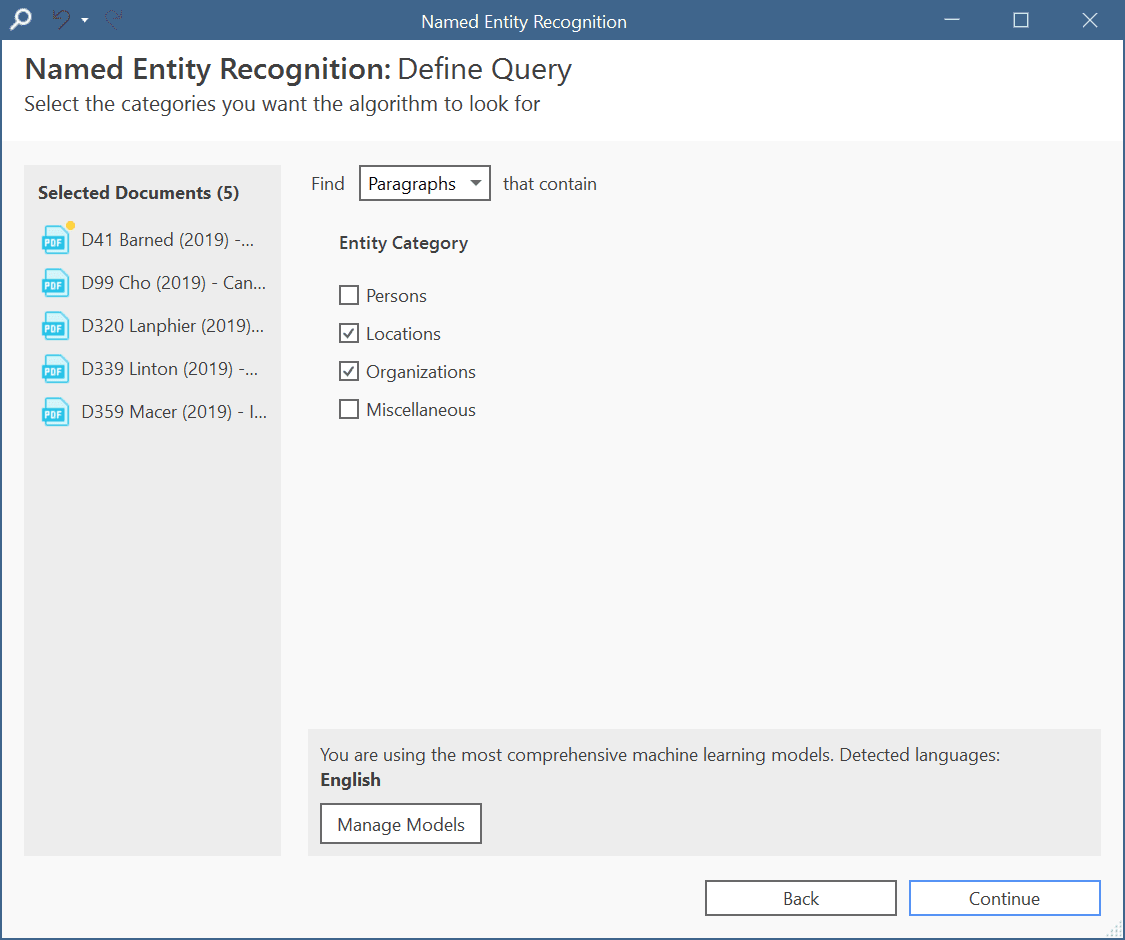
Manage Models: If you want to improve your results, you can download and install a more comprehensive model.
Click on Manage Models if you want to install or uninstall an extended model.
Click Continue to begin searching the selected documents. On the next screen, the search results are presented, and you can review them.
Reviewing Search Results
If you selected to search for all entity types (persons, location, organization and miscellaneous), you can review them all together, or just focus on one entity at a time. To do so, deactivate all other entity types.
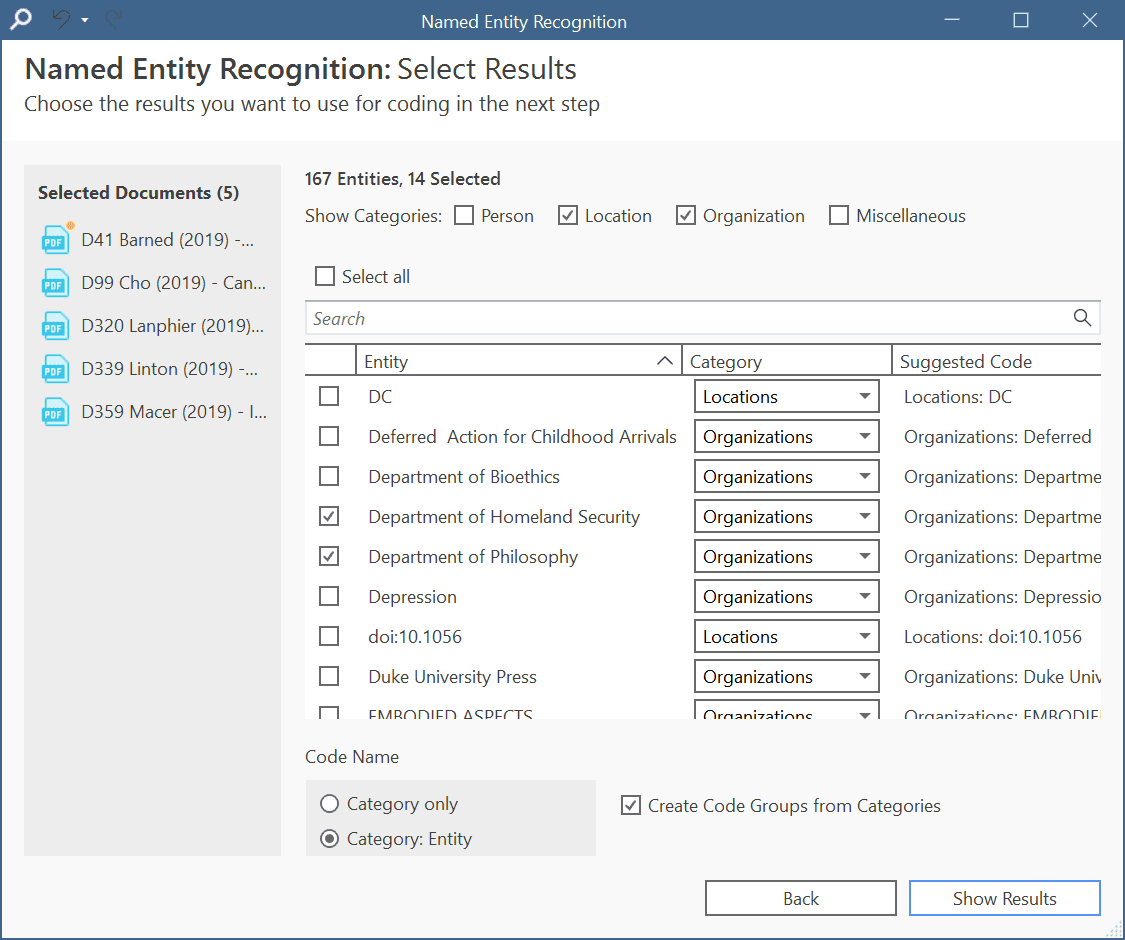
Select all results that you want to code. If a result is interesting but comes up in the wrong category, you can change the category in the second column of the result list. In the third column, the suggested code name is listed.
Autocode results
You have three options for the code name:
-
Category only: If you select this option, all search hits will be coded under the NER category: Person, Location, Organization, Miscellaneous
-
Category: Entity: If you select this option, categories with subcodes will be created for the NEW categories: Person, Location, Organization, Miscellaneous. The entities will become the subcodes.
You also have the option to group all codes of a NER category into a code group. This option is useful if you selected the second option with subcodes.
Click Show Results to inspect the results in context.
The result page shows you a Quotation Reader indicating where the quotations are when coding the data with the proposed code. If coding already exist at the quotation, it will also be shown.
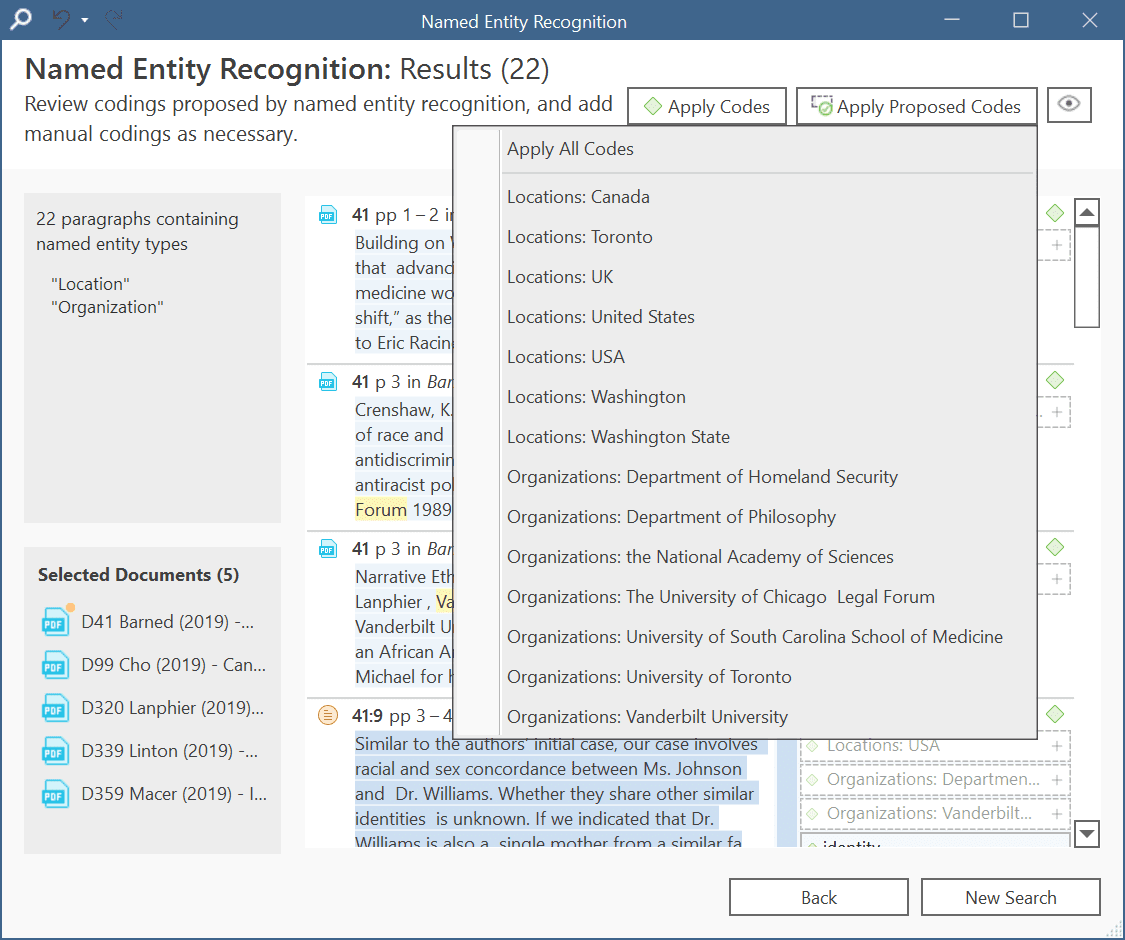
By clicking on the eye, you can change between small and large previews.
You can go through and review each data segment and then code it by clicking on the plus next to the code name. Or, you can code all results at once by selecting Apply Proposed Codes. You can select the first option Apply All Codes, or select only one code from the list.
If you have selected the category: subcode option for coding, the coding results might look as follows:
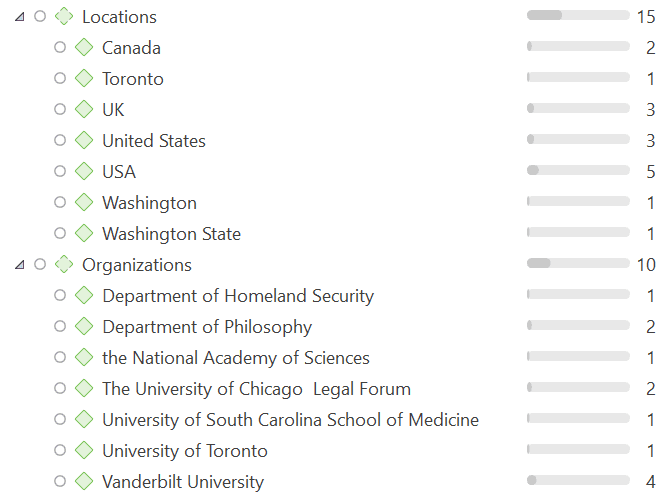
Depending on the area you have selected at the beginning, either the word, the sentence, or the paragraph is coded.
The regular Coding Dialogue is also available to add or remove codes.
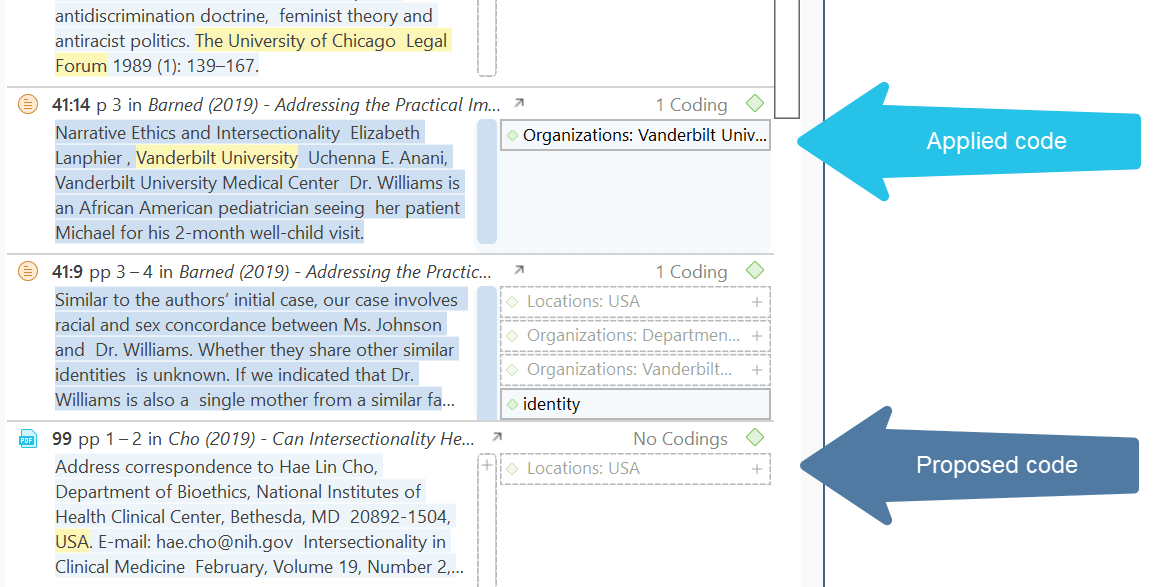
The Search Engine Behind NER
ATLAS.ti uses spaCy as its natural language processing engine. More detailed information can be found here.
Input data gets processed in a pipeline - one step after the other as to improve upon the derived knowledge of the prior step. Click here for further details.
The first step is a tokenizer to chunk a given text into meaningful parts and replace ellipses etc. For example, the sentence:
“I should’ve known (didn't back then).” will get tokenized to: “I should have known ( did not back then ).“
The tokenizer uses a vocabulary for each language to assign a vector to a word. This vector was pre-learned by using a corpus and represents a kind of similarity in usage in the used corpus. Click here more information.
The next component is a tagger that assigns part-of-speech tags to every token and lexemes if the token is a word. The character sequence “mine”, for instance, has quite different meanings depending on whether it is a noun of a pronoun.
Thus, it is not just a list of words that is used as benchmark. Therefore, there is also no option to add your own words to a list or to see the list of words that is used.
The entity recognizer is trained on wikipedia-like text and works best in grammatically correct, encyclopedia-like text. We are using modified pre-trained/built-from-the-ground-up models - depending on the language.
Sentiment Analysis
Video Tutorial: Sentiment Analysis. Sentiment analysis is the interpretation and classification of emotions (positive, negative and neutral) within text data using text analysis techniques.
This function is available for the following languages:
- English
- German
- Spanish
- Portuguese
- French
- Dutch
- Russian
- Simplified Chinese
Application Examples
- identifying and cataloguing a piece of text according to the tone conveyed by it.
- understanding the social sentiment of a brand, product or service.
- identifying respondent sentiment toward the subject that is discussed in online conversations and feedback.
- analysing student evaluations of lectures, seminars, or study programs.
Sentiment analysis works best on structured data like open-ended questions in a survey, evaluations, online conversations, etc.
Carrying out a Sentiment Analysis
To open the tool, select the Search & Code tab and from there Sentiment Analysis.
inst
Select documents or document groups that you want to search and click Continue.
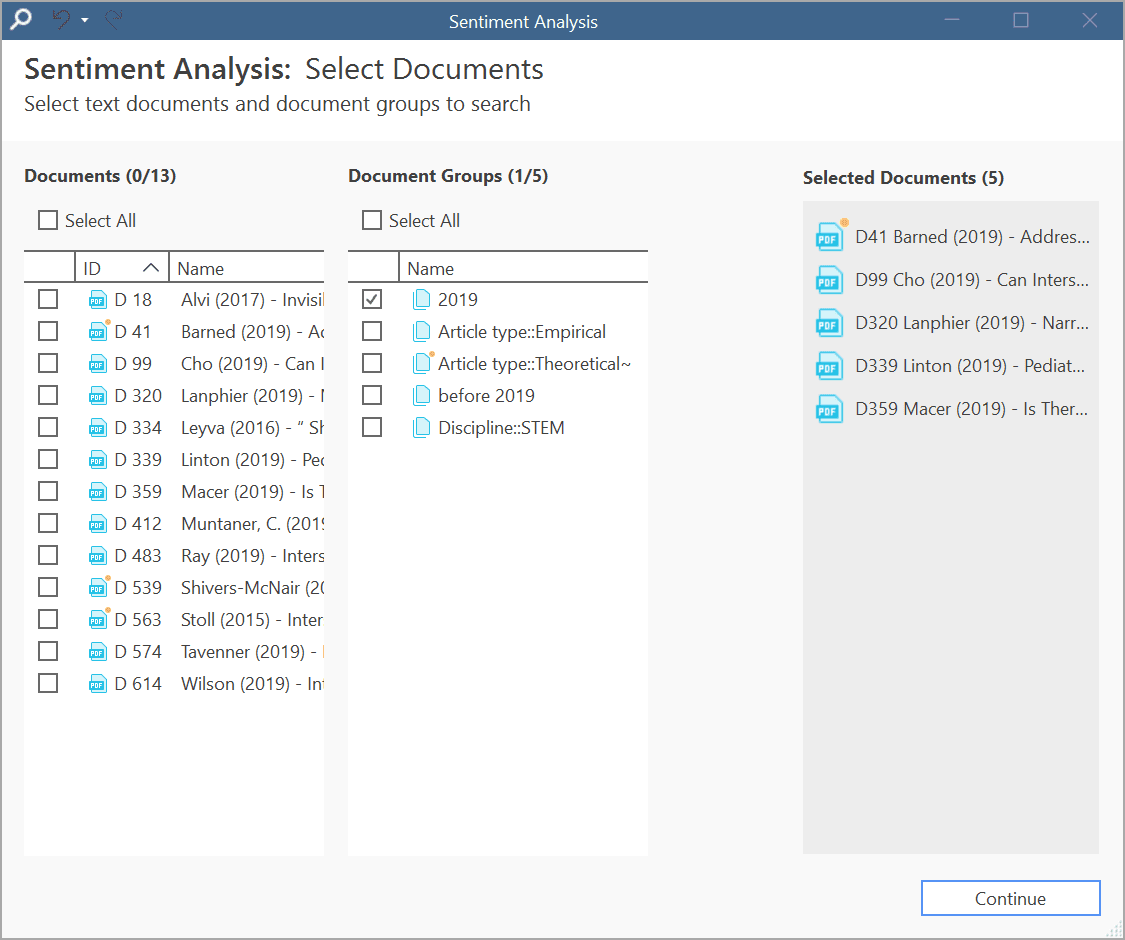
Select the base unit for the search and the coding:
- paragraphs
- sentences
Select the type of sentiment you want to code:
- positive
- neutral
- negative
ATLAS.ti proposes subcode labels for each sentiment: Positive / Neutral / Negative. If you want to use different names, you can change them here.
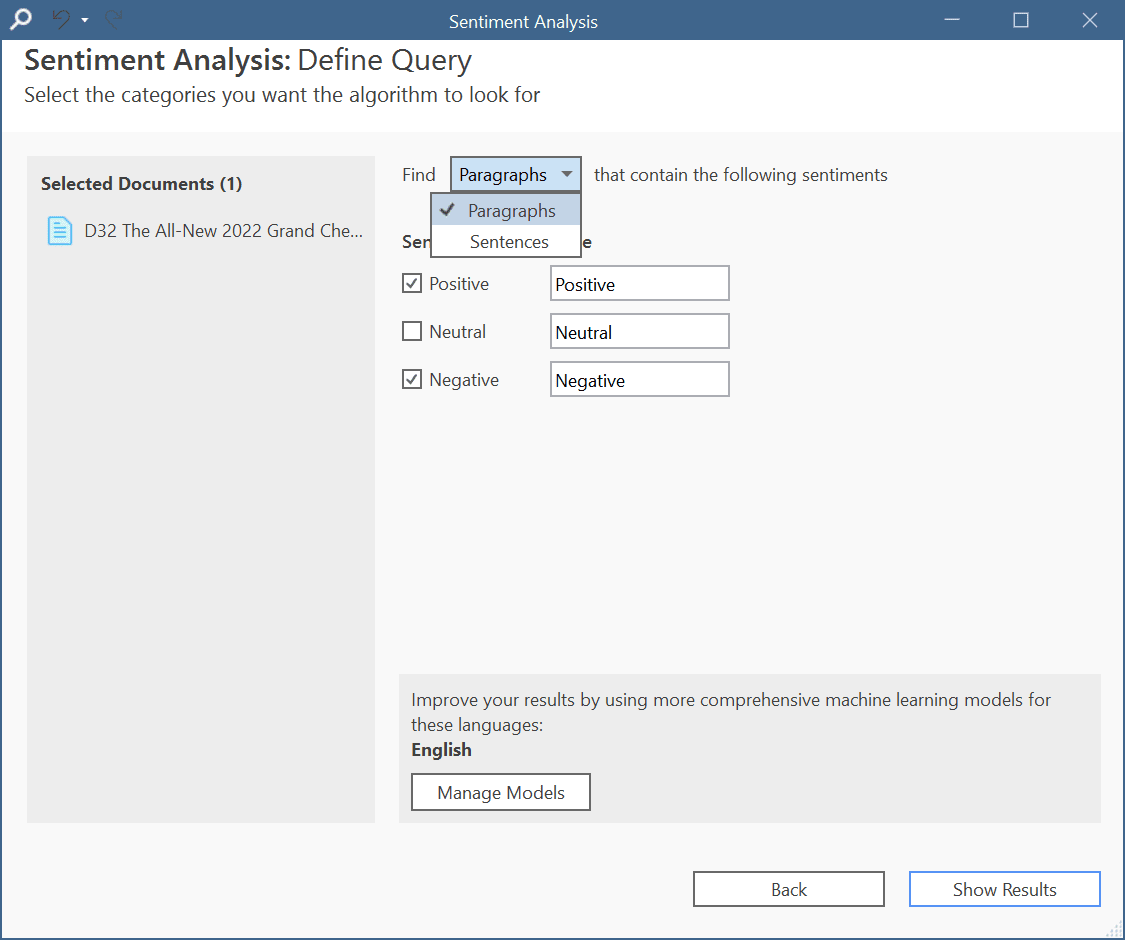
Manage Models: If you want to improve your results, you can download and install a more comprehensive model.
Click on Manage Models if you want to install or uninstall an extended model.
Click Show Results to begin searching the selected documents. On the next screen, the search results are presented, and you can review them.
The result page shows you a Quotation Reader indicating where the quotations are when coding the data with the proposed code. If coding already exist at the quotation, it will also be shown.
By clicking on the eye icon, you can change between small. medium and large previews.
You can code all results with one of the proposed codes or with all proposed codes at once; or you can go through review each data segment and then code it by clicking on the plus next to the code name.
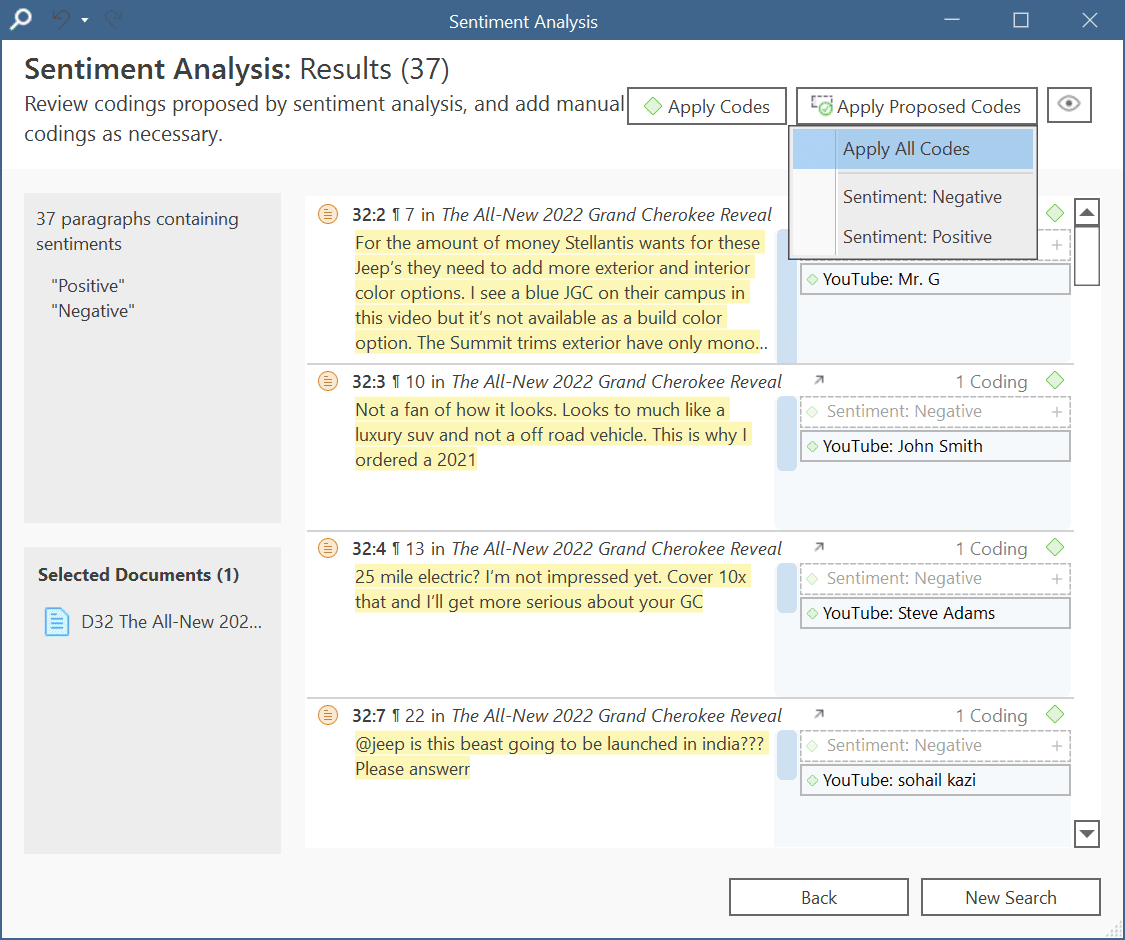 Depending on the area you have selected at the beginning, either the sentence or the paragraph is coded.
Depending on the area you have selected at the beginning, either the sentence or the paragraph is coded.
The regular Coding Dialogue is also available to add or remove codes.
The Search Engine Behind the Sentiment Analysis
We are using spaCy as our natural language processing engine. More detailed information can be found here.
Input data gets processed in a pipeline - one step after the other as to improve upon the derived knowledge of the prior step. Click here for further details.
The first step is a tokenizer to chunk a given text into meaningful parts and replace ellipses etc. For example, the sentence:
“I should’ve known(didn't back then).” will get tokenized to: “I should have known ( did not back then ).“
The tokenizer uses a vocabulary for each language to assign a vector to a word. This vector was pre-learned by using a corpus and represents a kind of similarity in usage in the used corpus. Click here more information.
The next component is a tagger that assigns part-of-speech tags to every token and lexemes if the token is a word. The character sequence “mine”, for instance, has quite different meanings depending on whether it is a noun of a pronoun.
Thus, it is not just a list of words that is used as benchmark. Therefore, there is also no option to add your own words to a list or to see the list of words that is used.
The sentiment analysis pipeline is trained on a variety of texts ranging from social media discussions to peoples’ opinions on different subjects and products. We are using modified pre-trained/built-from-the-ground-up models - depending on the language.
Find Concepts and Auto-Code
Video Tutorial: Concept search. Let ATLAS.ti find relevant concepts for you. Review them in context and auto code.
This function is available for the following languages:
- English
- German
- Spanish
- Portuguese
- French
- Dutch
- Russian
- Simplified Chinese
What makes a concept?
In a first step, the significant noun phrases (for example, health care system) are detected in order to identify the most frequently occurring concepts in the data. In the second step, the concepts and their frequencies are collected across all files in the set being processed.
ATLAS.ti actively filters the concepts — only the most relevant concepts are presented in the results. You can review the concepts in their surrounding context in the Quotation Reader, and then decide which concepts you want to be coded automatically.
You can search for concepts in documents, document groups, codes or code groups for concepts.
There are several ways how you can start a concept analysis:
Select the Search & Code tab and from there Concepts.

or:
Open the Document or Code Manager, select one or more entities and select Concepts in the ribbon.
From the dropdown menu on the top left select where you want to search (documents, document groups, codes or code groups). Then select one or multiple documents, document groups, codes, or code groups.
As soon as you select an entity, ATLAS.ti begins to analyse the data. The results are displayed in form of a word cloud. Optionally you can also view the result as list. Just change the view option to List.
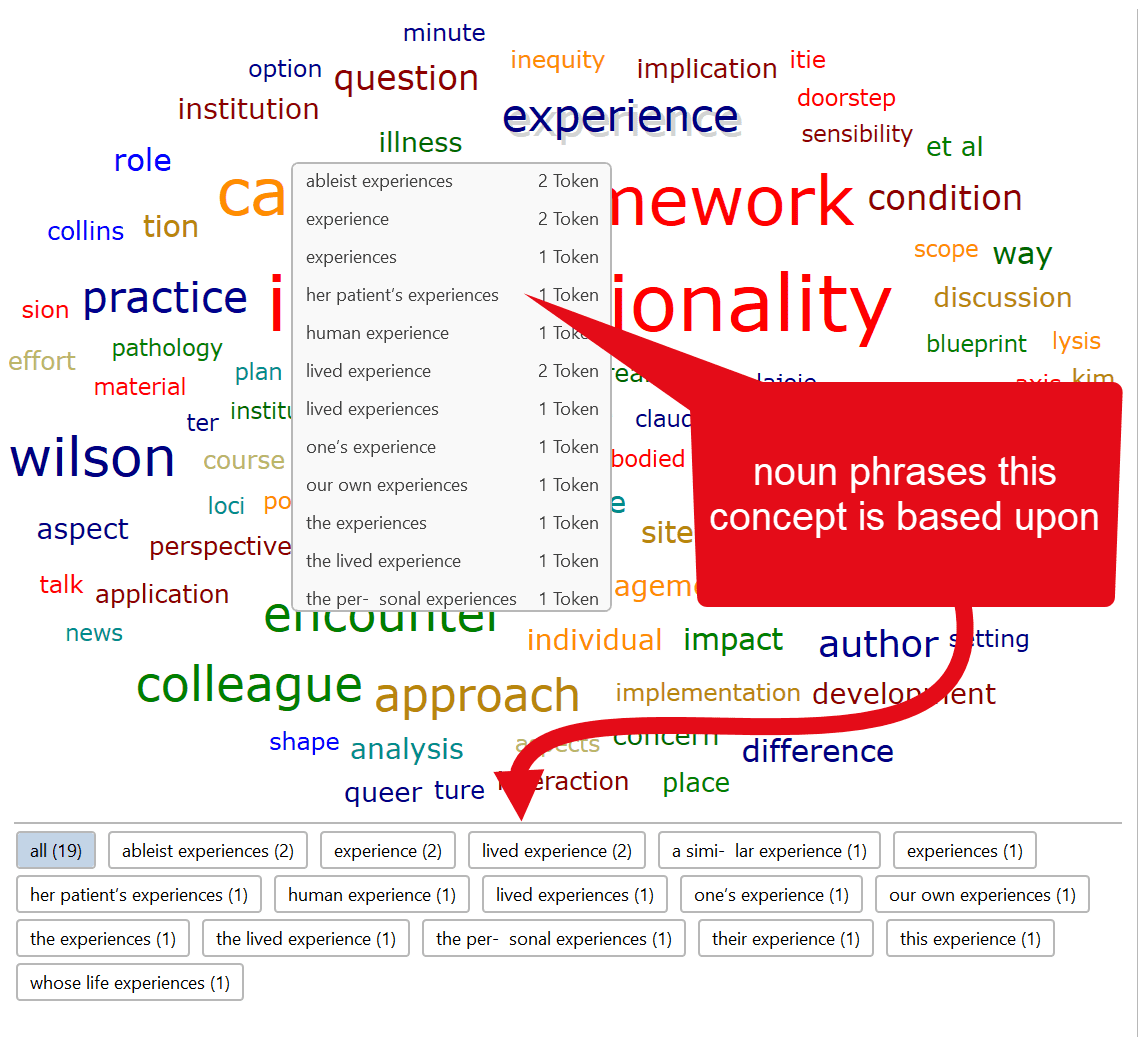 Selecting a concept or any of its noun phrases displays the corresponding text matches on the right-hand side.
Selecting a concept or any of its noun phrases displays the corresponding text matches on the right-hand side.
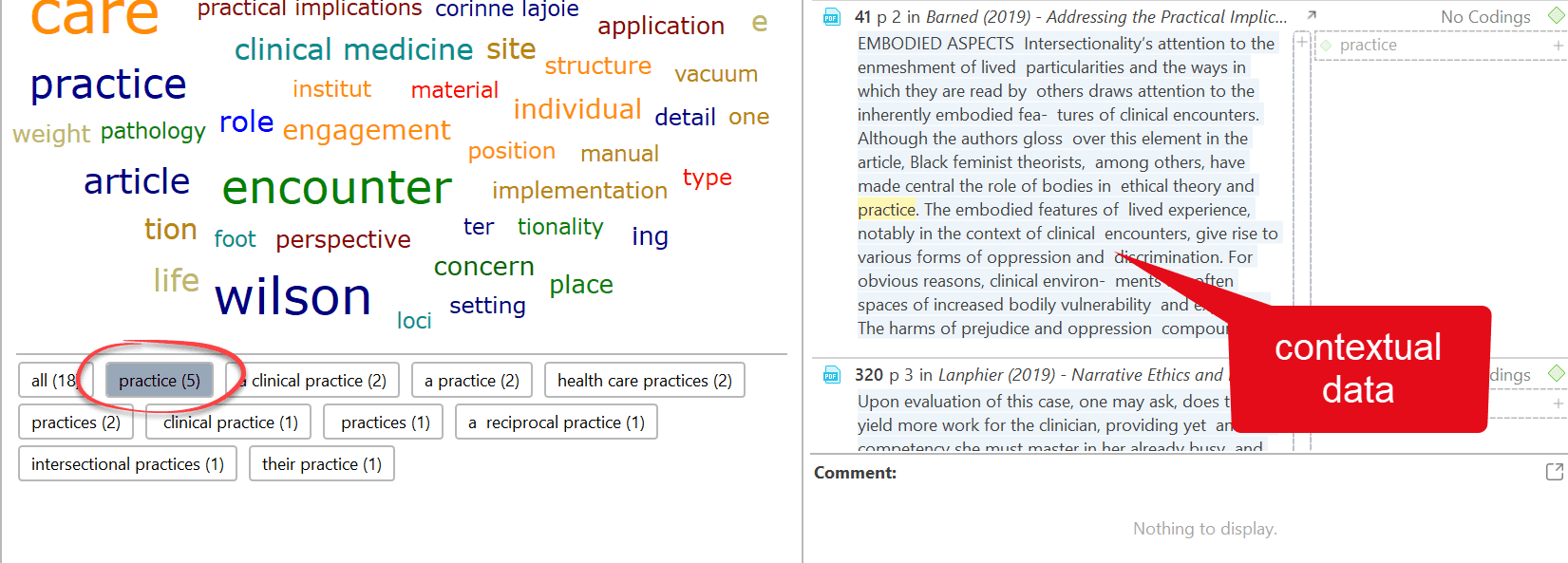
To code a text match, select it and click the Apply Proposed Codes button in the ribbon.
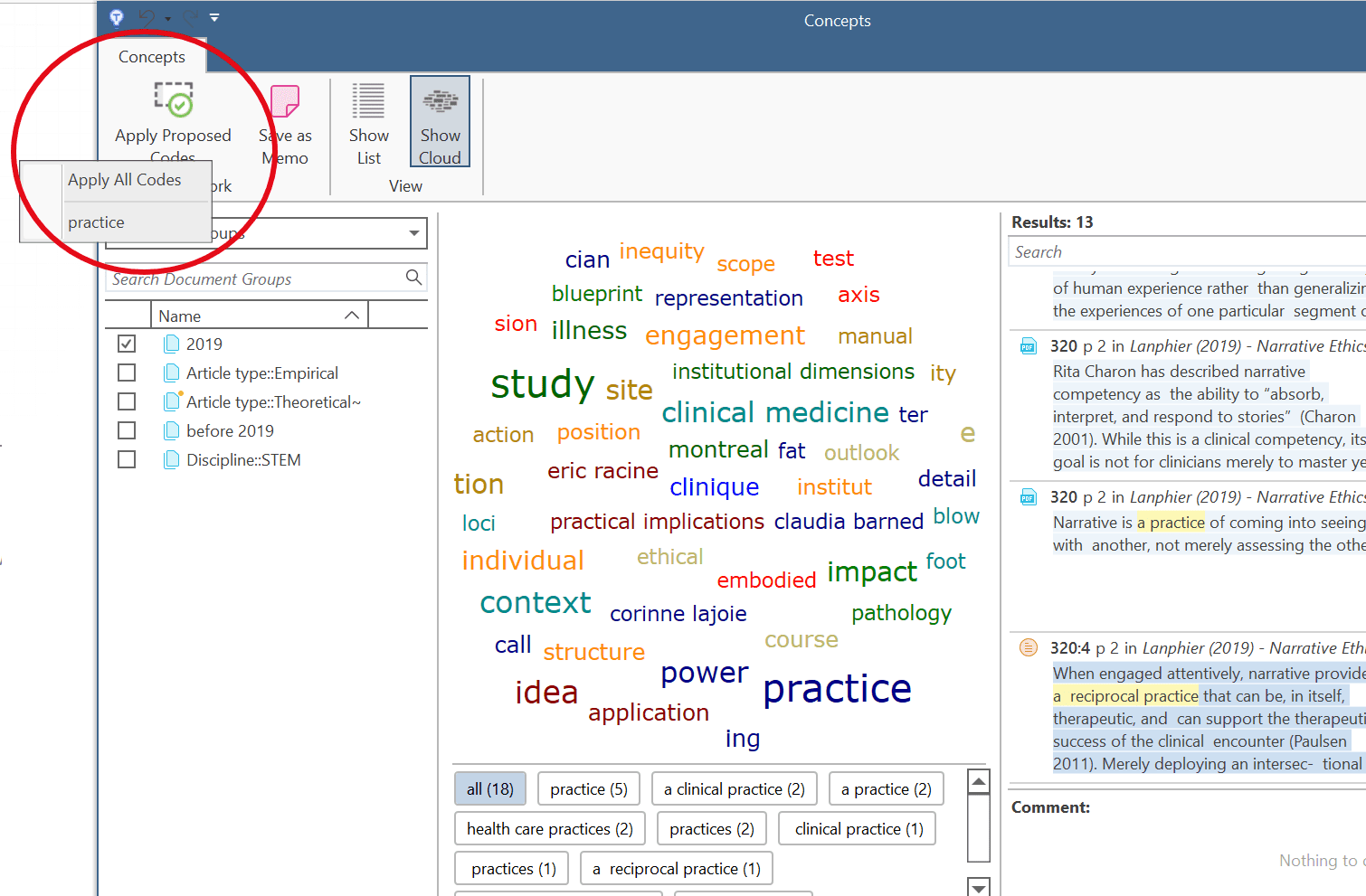
Opinion Mining
Opinion mining performs a sentiment analysis on a given text and then further analyses the positive and negative text segments for their main aspects. These are nouns and verbs that are modified by affections like "superb sound" or "awesome attitude". The result is a visualisation of the most important aspects for positive and negative sentiments. Review them in context and auto code.
This function is available for the following languages:
- English
- German
- Spanish
- Portuguese
- French
- Dutch
- Russian
- Simplified Chinese
You can perform opinion mining on documents, document groups, codes or code groups.
Opinion mining can be launched just like concept analysis:
Select the Search & Code tab and from there Opinion Mining.

or:
Open the Document or Code Manager, select one or more entities and select Opinion Mining in the ribbon.
From the dropdown menu on the top left select where you want to search (documents, document groups, codes or code groups). Then select one or multiple documents, document groups, codes, or code groups.
As soon as you select an entity, ATLAS.ti begins to analyse the data. Detected aspects are displayed in a two-column layout. Aspects with positive sentiment make up the left column, while those with negative sentiment are displayed in the right one. If both positive and negative text segments are found for a sentiment, it will be present in both columns. Since the columns are sorted by number of hits for their respective sentiment, the positive and negative results may occur in different places in each column.
Selecting an aspect will show its affections along the bottom, and the corresponding text matches on the right-hand side. You can further filter these results by selecting an affection.
To code a text match, select it and click the Apply Proposed Codes button in the ribbon.
Analyzing Focus Groups
Generally, it can be said that analyzing focus group data is not much different from the analysis of any other kind of interview data. Most people who ask for specific analytic tools in focus groups do so because they don't have experience with analyzing other kinds of qualitative data, so they think there must be something unique about focus groups.
Focus groups are different to a certain extent as there is more interaction. In the vast majority of studies, researchers are interested in the content of what gets said, rather than the mechanics of how it gets said.
If you are interested in the interaction, then a discourse analysis might be an appropriate method. In addition to the regular tools you use in ATLAS.ti for data analysis, consider using hyperlinks to explore the interaction Quotation Level and Hyperlinks.
The most widely used analysis methods for interview as well as focus group data are versions of content analysis and thematic analysis. For some inspiration, take a look at this chapter on focus group analysis.
ATLAS.ti facilitates the coding of speaker units, so that you can compare responses of different speakers or different group of speakers by attributes like age, gender, etc.
In order for ATLAS.ti to recognize speakers, you need to use speaker IDs or names consistently when transcribing the data. See Guidelines for Preparing Focus Group Data for more detail.
Focus group auto coding requires text documents in doc, docx, rtf, or txt format. You cannot use PDF documents with this function.
Guidelines for Preparing Focus Group Data
There is only one requirement when preparing focus group data: Each speaker or needs to have a unique identifier and this identifier should be applied consistently throughout the entire transcript.
ATLAS.ti offers two default patterns to recognize speakers:
- name: (pattern 1)
- @name: (pattern 2)
Using pattern 2 when transcribing data, it is unlikely that ATLAS.ti finds anything but speakers. Searching for pattern 1, ATLAS.ti also finds things like "for example:....."
Custom Pattern
You can also define your own pattern including the use of regular expressions.
This might be useful if you have previously prepared transcripts and speaker IDs have not been used consistently.
For instance, the regular expression: To+(m|n) matches "Toom," "Ton," or "Toon" to find different spellings of the name 'Tom'.
([A-Z]+): recognizes identifiers consisting of letters from A to Z.
([A-Z]+[0-9]+): recognizes identifiers that consist of a combination of letters and numbers
For more information, see Regular Expressions (GREP).
You can use this functionality to auto code any data that has a specific structure. It does not necessarily have to be a speaker. It could be a date, a number, or any other type of identifier.
Example transcripts
The speaker IDs do not have to be in bold letters. Bold letters are used here only to make it easier for you to see, which ones are the speaker IDs.
Example A (pattern 1)
Alex: I don't know, I'm the sort, I don't really struggle to make friends cos everyone tells me I've got a big mouth, and I don't stop talking [laughs]
Tom: So is that how, is that how you met just, just through you striking up a conversation?
Deb: I'm trying to think exactly [laughs] I think that's what it was, we were both in the same research methods class ...
Example B (pattern 1)
Alex:
I don't know, I'm the sort, I don't really struggle to make friends cos everyone tells me I've got a big mouth, and I don't stop talking [laughs] .
Tom:
So is that how, is that how you met just, just through you striking up a conversation?
Deb:
I'm trying to think exactly [laughs] I think that's what it was, we were both in the same research methods class.
Example C (pattern 1)
It is also possible to add further information to each speaker like their gender, age group, educational level etc. This way, also this information will be automatically coded.
Alex: male: age group 1: high school:
I don't know, I'm the sort, I don't really struggle to make friends cos everyone tells me I've got a big mouth, and I don't stop talking [laughs]
Tom: male: age group 2: high school:
So is that how, is that how you met just, just through you striking up a conversation?
Deb: female: age group 2: some college:
I'm trying to think exactly [laughs] I think that's what it was, we were both in the same research methods class.
Example D (pattern 2)
@Alex: I don't know, I'm the sort, I don't really struggle to make friends cos everyone tells me I've got a big mouth, and I don't stop talking [laughs].
@Tom: So is that how, is that how you met just, just through you striking up a conversation?
@Deb: I'm trying to think exactly [laughs] I think that's what it was, we were both in the same research methods class.
If your data is not transcribed yet, we recommend using pattern 2 as it is unlikely this pattern will find sections that are not speaker units.
Recommendation
For readability, you may want to consider starting each speaker unit on a new line.
Additionally, you may want to enter an empty line between speaker units.
Both is not required. When a pattern is recognized the chosen code(s) are applied from the first letter of the pattern to the start of the next recognized pattern. Therefore, it does not matter whether a new unit starts on a new line or whether there is an empty line in between.
Auto Coding Focus Group Speakers
Focus group auto coding requires text documents in doc, docx, rtf, or txt format. You cannot use PDF documents with this function.
Select a focus group transcript in the Document Manager and select Focus Group Coding from the Documents ribbon.
Alternatively:
Right-click on a document in the Project Explorer and select Focus Group Coding from the context menu.
Next, select a pattern for recognizing speaker units. See Preparing Focus Group Data.
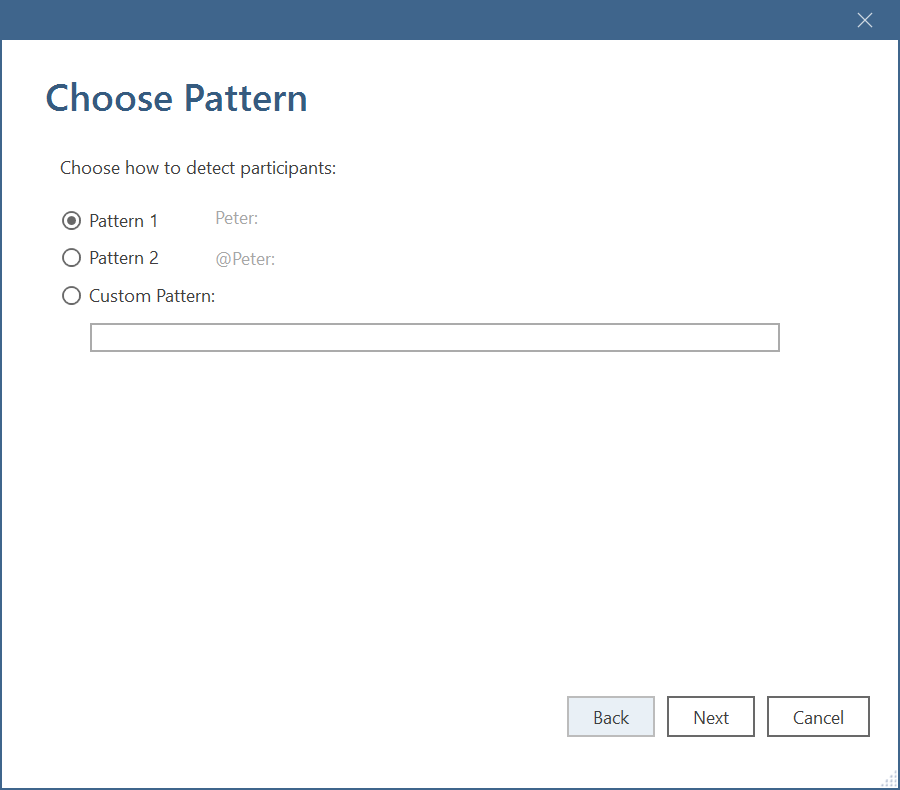
After selecting a pattern, click Next.
ATLAS.ti lists all strings that fit the selected pattern and uses these as code name. If a colon (:) was used also elsewhere in the transcripts, not all finds are speakers.
Deselect all finds that are not speakers, if any.
Check the suggested codes and modify the names if desired.
Add additional codes, if you want to code the speaker units with multiple codes. Each code needs to by separated by a semicolon.
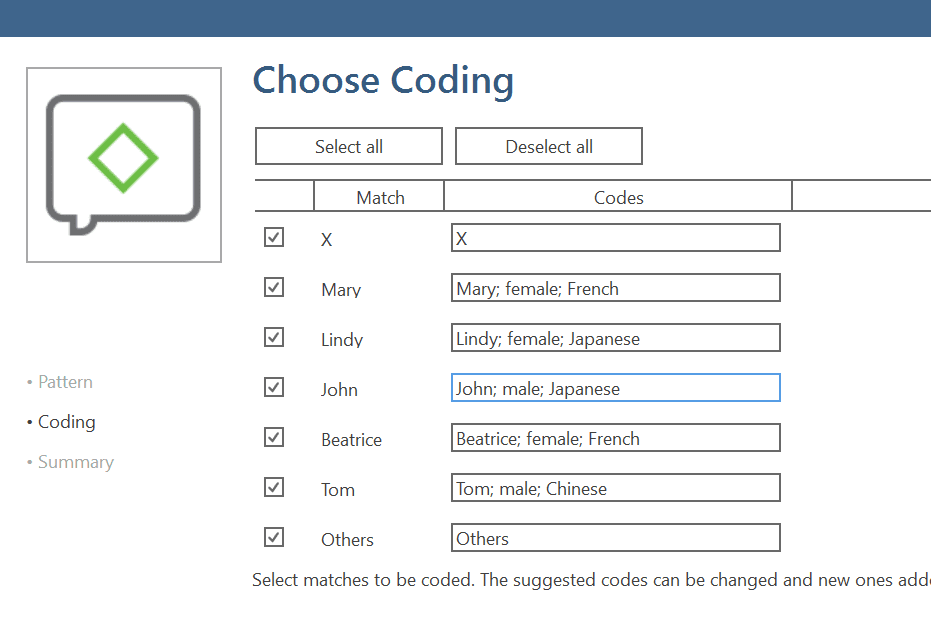 If you enter codes that already exist in your code list, they will not be duplicated.
If you enter codes that already exist in your code list, they will not be duplicated.
Click on the button Code.
ATLAS.ti codes all speaker units. Once it is done, you see a summary screen.
Double-check the results in context and take a look at the Code Manager. ATLAS.ti also creates a code group from all codes. If the results are not what you expected, you can undo all coding at this stage.
ATLAS.ti does not yet organize the focus group into a hierarchical structure by default. We however suggest that you do it manually, similar to the example shown below:
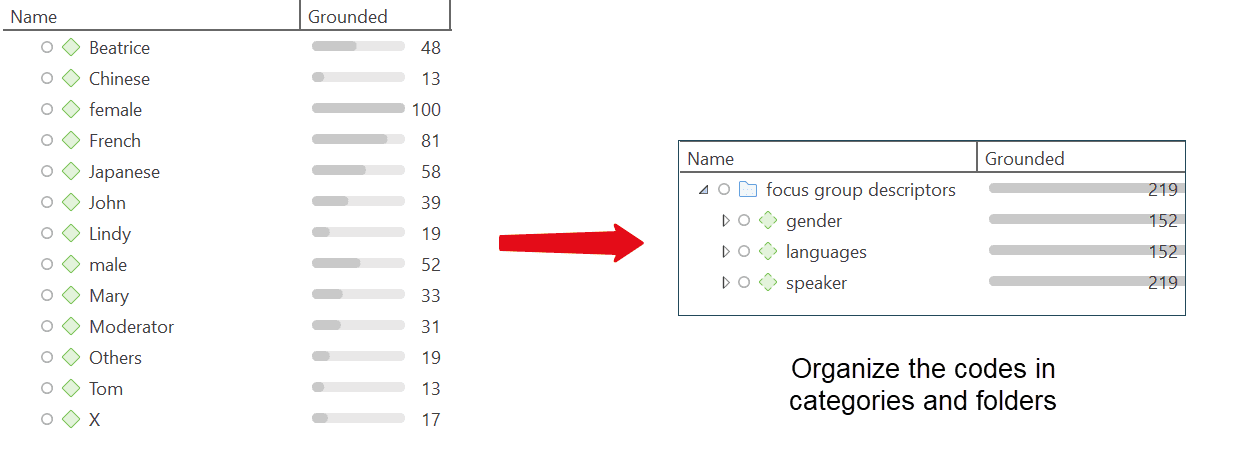
As coding all speakers often result in dense coding, we recommend using this function after you have coded the focus group transcript for content.
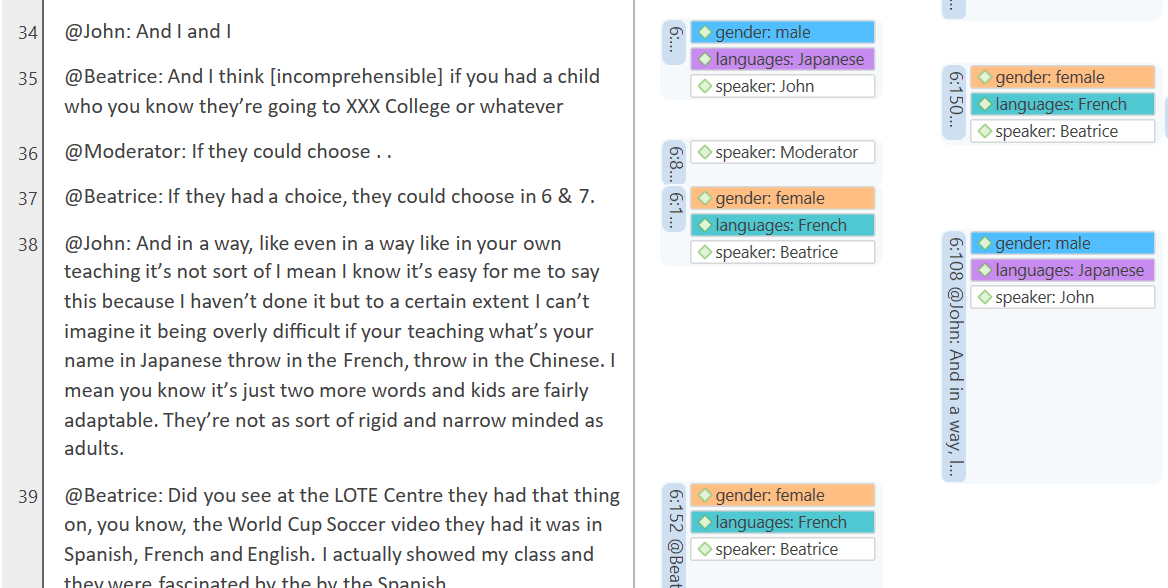
Multimedia Data (Audio & Video)
When we refer to multimedia data, we mean audio and video files. The difference in terms of displaying auto or video files is that there is no picture when working with audio files; the mouse clicks in handling audio files are the same. Therefore, below we describe all steps for both file formats together. For illustration purposes, most figures show video data.
Adding Multimedia Documents to a Project
As multimedia files, especially video files can be quite sizable, it is recommended to link multimedia files to a project rather than to import them.
To link audio or video files to a project, in the Home tab click on the dropdown arrow of the Add Documents button and select Add Linked Video/Audio.
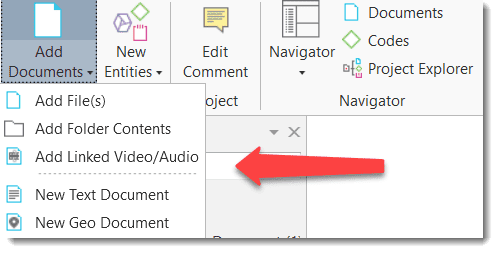
Linked documents remain at their original location and ATLAS.ti accesses them from there. Preferably, these files should not be moved to a different location. If the files need to be moved, you need to re-link the files to your project. ATLAS.ti will alert you, if there is an issue, and a file can no longer be accessed. You find a Repair Link option in the Document Manager under the Tools Tab.
Display of Multimedia Documents
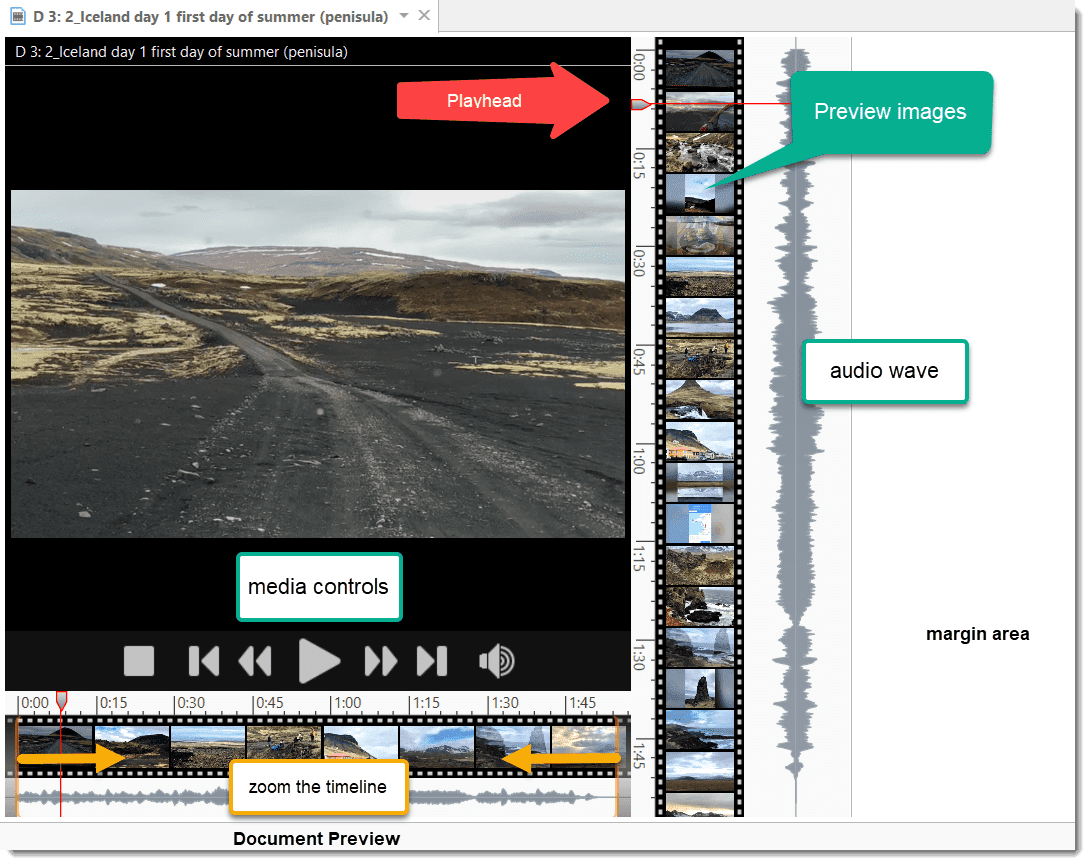
Audio wave: On the right-hand side the audio wave is displayed. You can make is smaller or wider by positioning your mouse on the left-hand side of the audio wave and dragging it either to the right-hand side or the left-hand side.
Preview images: For video files, preview images are displayed in the document preview and the margin area. When you add a new video to a project, you do not immediately see the preview images as they first need to be generated. Depending on the length of the video this may take a few seconds or up to a few minutes.
Preview images are generated from key frames. A key frame is defined as one of the frames in a video, which provides the best summary of the video content. The key frame rate is a variable that you can set in most encoding software when creating the video file. A fast key frame rate (with a lower number on the scale, as this refers to the interval between key frames) means that the video has more frames designated as key frames. A slower key frame rate means that fewer frames are designated as key frames.
If you've got a typical talking head video or something else with little motion, you can get away with a slow key frame rate. If you are shooting something with a lot of motion like a sporting event or a dance recital, a faster key frame rate is necessary. The standard rate is to include a key frame every 5 seconds.
Playhead: The playhead shows the current position in the video or audio file.
Document preview: Below the display area you see a preview of the entire document. You can use it to select the area that should be displayed in the margin area.
Zoom: In most cases, the space from top to bottom of your computer screen will be too small to meaningfully display your audio or video file, you can zoom the file. This is done in the full document preview section. For this you use the two orange lines that you see to the right and left of the full preview. See Zooming the Timeline.
Media Controls
If you move the cursor inside the audio or video pane, the media controls appear, and you can start, stop and pause the video, skip forward and backwards. You can also start and stop the multimedia file by pressing the space bar.

From left to right:
Stop: Stops the multimedia file and set the play head to the beginning.
Skip to previous mark: Moves backward to the last mark, which could be the end or beginning of a selection or a section, or the beginning of the file.
Skip backward: Seek backward in the multimedia file.
Play / Pause
Skip to previous mark: Moves forward to the next mark, which could be the end or beginning of a selection or a section, or the end of the file.
Skip forward: Seek forward in the multimedia file.
Volume: On or Off
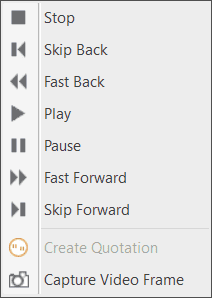
Click the space bar to stop and start an audio or video file.
Multimedia Toolbar

As soon as an audio or video file is loaded, the multimedia options will be displayed in the Document tab. If you hoover over each button with the mouse, a screen tip is displayed explaining each option.
Capture Snapshot: If you want to analyze a particular frame in more detail, you can take a snapshot. If you click on the snapshot option, the frame will be added as a new image document to your project.
Media Controls: See above.
Volume: Set the volume on slider between 0% (mute) and 100%
Playback Rate: If you want the video to play faster or slower, you can select a playback rate between 0,15 times the original speed to 8 times the original speed. The current play back rate is shown in the blue status bar at the bottom of the screen.
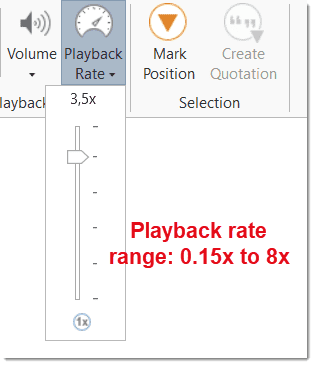
Mark Position: Sets the start position for a quotation. See Working with Multimedia Files.
Create Quotation: Sets the end position for a quotation and creates a quotation at the same time. See Working with Multimedia Files.
You can also access the media controls with by right-clicking on the audio or video area.
Handling Multimedia Data
Zooming the Timeline
A quick way to zoom the timeline is by putting the mouse pointer onto the preview images on the right-hand side or the margin area. Hold down the Ctrl-key and scroll the mouse wheel.
You can also zoom the timeline using the two orange sliders to select just the section of the audio or video you want to see in the margin area:
When you move the mouse pointer over the full preview, two orange sliders appear. Move the right and left slider to the desired position.
Media Controls
If you move the cursor inside the audio or video pane, the media controls appear, and you can start, stop and pause the video, skip forward and backwards. You can also start and stop the multimedia file by pressing the space bar.

From left to right:
Stop: Stops the multimedia file and set the play head to the beginning.
Skip to previous mark: Moves backward to the last mark, which could be the end or beginning of a selection or a section, or the beginning of the file.
Skip backward: Seek backward in the multimedia file.
Play / Pause
Skip to previous mark: Moves forward to the next mark, which could be the end or beginning of a selection or a section, or the end of the file.
Skip forward: Seek forward in the multimedia file.
Volume: On or Off

Click the space bar to stop and start an audio or video file.
Multimedia View Options
If a multimedia document is loaded, you find a number of additional options on the View tab of the contextual document ribbon.
Position of the timeline: The timeline can be positioned at the bottom of the screen horizontally, or vertically next to the audio wave form.
Audio waveform: You can show or hide the audio waveform or the video previews in both the margin or the zoom line.
Auto-scroll: If 'auto-scroll margin' is activated the playhead remains in the middle of the screen and everything else moves (preview images, audio wave form, margin). If 'auto-scroll margin' is deactivated, the playhead moves from the top to the bottom of the screen. This is a lot smoother on your eye. But it means the playhead moves outside the visible area if you have zoomed the video. Which option is more useful depends on what you are currently doing.
Use Arrow Keys to Navigate
Use the right and left arrow keys, to move the position of the playhead by 1/1000th increments of the length of the video that is currently displayed in the margin area.
Use the right and left arrow keys + Ctrl, to move the position of the playhead by 1/20th increments of the length of the video that is currently displayed in the margin area.
Keyboard Shortcuts
| Action | Keyboard Shortcut |
|---|---|
| Pause Play | Space |
| Pause Play | Media Play Pause |
| Pause Play | F4 |
| Play | P |
| Play | Shift+P |
| Play | Play |
| Pause | Pause |
| Stop | S |
| Stop | Shift+ |
| Stop | Media Stop |
| Skip Back | Browser Back |
| Skip Back | Media Previous Track |
| Skip Forward | Browser Forward |
| Forward Command | Media Next Track |
| Small Step Back | Left |
| Small Step Forward | Right |
| Medium Step Back | Ctrl+Left |
| Medium Step Forward | Ctrl+Right |
| Large Step Back | PageUp |
| Large Step Forward | PageDown |
| Playback Rate Normal | Multiply |
| PlaybackRate Up | Plus (+ key on main keyboard) |
| Playback Rate Up | Plus (+ key on numeric keyboard) |
| Playback Rate Down | Minus (- key on main keyboard) |
| Playback Rate Down | Minus (- key on numeric keyboard) |
| Mark Quotation Start | , or < (Depending on your keyboard) |
| Mark Quotation End + Create Quotation | . or > (Depending on your keyboard) |
Working with Multimedia Data
In this section, the following options are discussed:
- Creating multimedia quotations
- Creating multimedia quotations while listening to the audio file or viewing the video file
- Display of multimedia quotations
- Coding multimedia quotations
- Activating and playing multimedia quotations
- Adjusting the size of multimedia quotations
- Renaming a multimedia quotation
- Capturing video snapshots as image documents for further analysis
Creating Multimedia Quotations
You can also immediately code multimedia files. However, as especially video files contain so much more information as compared to text, it is often easier to first go through and segment the audio or video file, i.e. creating quotations before coding.
To create an audio or video quotation, move your mouse pointer on top of the audio waveform and mark a section by clicking on the left mouse button where you want it to start. Then drag the cursor to the end position. The times of the end and start positions are shown, as well as the total length of the segment.
As soon as you let go of the mouse, a quotation is created, and you see the blue quotation boundary in the margin area
If you want to make a selection first and then create a quotation, you can change the default settings. See Project Preferences. If you deactivate Automatically create new quotation on selection, to create a quotation you need to hoover with the mouse over the selection and click Create Quotation.

Creating Multimedia Quotations while Listening / Watching
You can also create an audio or video quotation while listening to or viewing a document. For this, you can use the buttons Mark Position and Create Quotation buttons in the toolbar; or the short-cut keys (see below).
Using the Ribbon Buttons
inst
Play the video. If you find something interesting that you want to mark as a quotation, click Mark Position. This set the start position. To set the end point and create a quotation, click Create Quotation.
Continue listening / watching and setting quotations.
Using Short
To mark the start position: use (<) or (,)
To create a quotation: use (>) or (.)
Which short-cut key to use depends on your keyboard. Use those keys where you do not have to use Shift.
Play the video. If you find something interesting you want to mark as a quotation, click on the (,) or the (<) key. This sets the start position.
To set the end position and create a quotation, click on the (.) or (>) key.
-
A new quotation will be listed in the Quotation Manager, the Project Explorer or Quotation Browser. The quotation ID consists of the number of the document plus a consecutive count in chronological order by time when a quotation was created in the document. The quotation ID 15:5 for examples means that this is a quotation in document 15, and it was the 5th quotation that was created in the document.
-
After the ID you see the quotation reference, which is the start position of the audio or video quotation. The name field is empty. You can for instance add a short title for each multimedia quotation, see below.
-
Depending on the media type, the quotation icon changes.
Audio and video quotations can be easily recognized by their special icon.
Coding Multimedia Quotations
Coding multimedia quotations is not different from coding text or image documents:
Right-click the quotation and select Apply Codes. For further information see: Coding Data.
Activating and Playing Multimedia Quotations
In the Margin Area
To play the quotation, double-click on the quotation bar, or hoover over the audio waveform with the mouse and click on the play icon.
You can move the play-head with the mouse to any position within an audio or video file.
From other Places
- You can double-click on a multimedia quotation in the Project Explorer, the Quotations Browser or the Quotation Manager to play it in context.
- You can preview a multimedia quotation in the preview area of the Quotation Manager.
- You can preview a multimedia quotation if it is part of a hyperlink. See Working with Hyperlinks.
Adjusting the Size of Multimedia Quotations
To adjust or change the length of the quotation, drag the start or end position to the desired position.
Renaming a Multimedia Quotation
When you create audio or video quotation, the name field is empty. You can enter a name for instance to add a short description of what the audio or video quotation is all about.
Right-click on the quotation in the margin area or in the Quotation Manager and select the Rename option. This allows you to create a meaningful text output of coded audio and video segments.
Use the comment area to add further information, e.g. describe the segment and offer a first interpretation
See also Making Use of Quotation Name and Comment for Analytical Purposes.
See Example Reports for an instruction on how to create reports for named and commented multimedia quotations.
Capturing Snapshots of Video Frames as Image Documents
If you want to analyze particular frames of your video in more detail, you can capture a snapshot.
Move the play head to the desired position in the video.
Click on the camera icon in ribbon, or right-click on the video and select the option Capture Video Frame.
The snapshot is automatically added as a new image document to your project. See Creating Quotations im Images for further information on how to work with image files.
Multimedia Preferences
Under File > Options, you can set project specific preferences for multimedia files:
Autopreview
The effect of Autopreview is that the audio or video quotation immediately starts to play when you activate or open a function.
-
When selecting autopreview for documents the multimedia quotation immediately begins to play when selecting a multimedia document in the Document Manager.
-
When selecting autopreview for quotations the multimedia quotation immediately begins to play when selecting a multimedia document in the Quotation Manager.
-
When selecting autopreview for hyperlinks the multimedia quotation immediately begins to play when activating a hyperlink.
Preferences for Creating Quotations
The default option is that a multimedia quotation is created as soon as you have made a selection on the audio wave form. If you prefer to make a selection first before creating a quotation with an additional mouse click, deactivate this option.
The Margin Area
The margin area in ATLAS.ti is an important working space. It is not only used to display entities linked to your data like codes, memos, hyperlinks, groups or networks; it is also a space where you can interact with your data, write and review comments, link and un-link codes, move codes around, replace codes, traverse hyperlinks, and the like.
Depending on the current activity, you can set various display options.
Margin Display Options
To set the display options, right-click on a white space in the margin area. You have the following options:
-
to display codes (default)
-
to display memos (default)
-
to display hyperlinks (default)
-
code groups
-
memo groups
-
networks. The network icon will be display if the quotation or code is part of the network.
-
to show icons (default)
-
to show username. This is a useful option when working with a team and different team members code the same document, e.g. for the purpose of inter-coder agreement analysis.
Margin Drag & Drop
All objects populating the margin area support drag & drop. The effect of a drag & drop operation depends on the entities that are involved as drag sources (those that are dragged) and targets (those onto which entities are dropped).
A large variety of entities from the margin area can be dropped into the margin area.
Furthermore, entities can also be dragged from other entity managers and browsers. Entities can be dragged from the margin into other windows, browsers or even other applications like Word. In the latter case, the ATLAS.ti entity lose their ATLAS.ti specific "objectiveness" but at least they render into something useful, e.g., a formatted title and rich text comment.
Linking
When a code or memo is dropped on a quotation bar, a new link is created between the entity and the quotation represented by the bar.
Dragging a quotation bar onto another quotation bar creates a new hyperlink between the two. See Creating Hyperlinks.
When a margin entity is dropped onto another margin entity it is replaced.
Three operations are accomplished at the same time: the entity is removed from its original quotation, it is linked to the target quotation, and it replaces the entity it was dropped on (the latter is cut from its quotation).
Copying
When you drag and drop a hyperlink, code or memo in the margin to another quotation holding down the CTRL-key, then the hyperlink, code or memo is copied.
Print with Margin
If you want to print a document as you see it on your screen including the margin area, select the Print option in the Document Ribbon.

Then the following dialog opens:
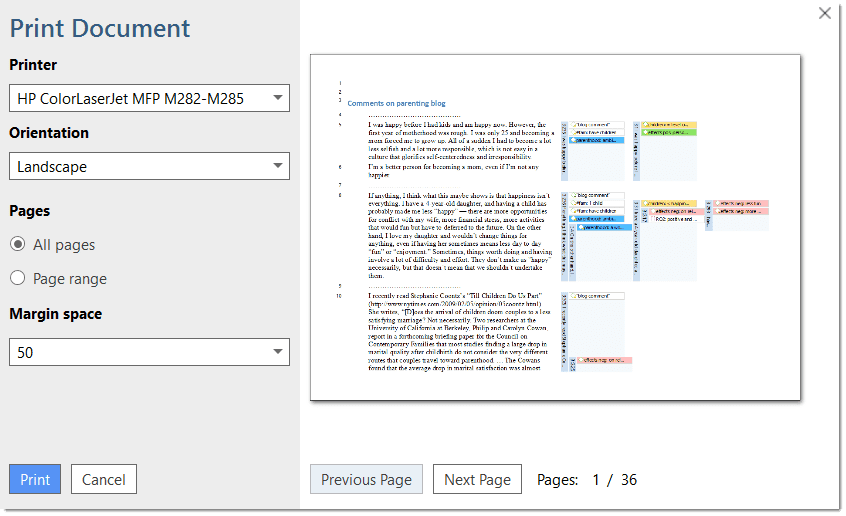
Printer: Select if you want to send the output to a printer or whether you want to save it as PDF document.
Orientation: The default selection is 'Landscape', as this is likely the best option to see the document and all codes in the margin area.
Margin space: Under 'Margin space', you can adjust the width of the margin if you need more or less space.
Pages: You can print all pages, or a page range.
With the 'Previous' and 'Next Page' buttons you can preview all pages.
The print with margin option is available for text, PDF and image documents.
Memos and Comments
Video Tutorial: Using memos at project begin.
Memos
"Memos and diagrams are more than just repositories of thoughts. They are working and living documents. When an analyst sits down to write a memo or do a diagram, a certain degree of analysis occurs. The very act of writing memos and doing diagrams forces the analyst to think about the data. And it is in thinking that analysis occurs" (Corbin & Strauss: 118).
"Writing is thinking. It is natural to believe that you need to be clear in your mind what you are trying to express first before you can write it down. However, most of the time, the opposite is true. You may think you have a clear idea, but it is only when you write it down that you can be certain that you do (or sadly, sometimes, that you do not)" (Gibbs, 2005).
As you see from the above quotes, memos is an important task in every phase of the qualitative analysis process. Much of the analysis 'happens' when you write down your findings, not by clicking buttons in the software.
The ideas captured in memos are often the pieces of a puzzle that are later put together in the phase of report writing.
Theory-building, often associated with building networks, also involves writing memos.
Memos in ATLAS.ti can be just a text on its own, or can be linked to other entities like quotations, codes, or other memos.
Typical Usage of Memos
-
Memos can contain a project description
-
You can list all research questions in a memo.
-
You can use memos to write a research diary.
-
You can use one memo as to do list.
-
Memos can be used as a bulletin board to exchange information between team members.
-
You can store definitions, findings or theories from relevant literature in one or more memos.
-
You can write up your analysis using memos. Those memos will be the building blocks for your research report.
Memos can also be assigned as documents, if you want to code them. See Using Memos as Document .
Differences between Memos and Comments
From a methodological point of view comments are also memos in the sense that comments are also places for thinking and writing.
In technical terms, in ATLAS.ti there is a distinction between comments and memos, as comments exclusively belong to one entity. For example, the document comment is part of the document; a code comment belongs to a particular code and is usually a definition for this code. A quotation comment contains notes or interpretations about the quotation it belongs to.
Comments are not displayed in browsers separately from the entity to which they are attached.
Quotation comment
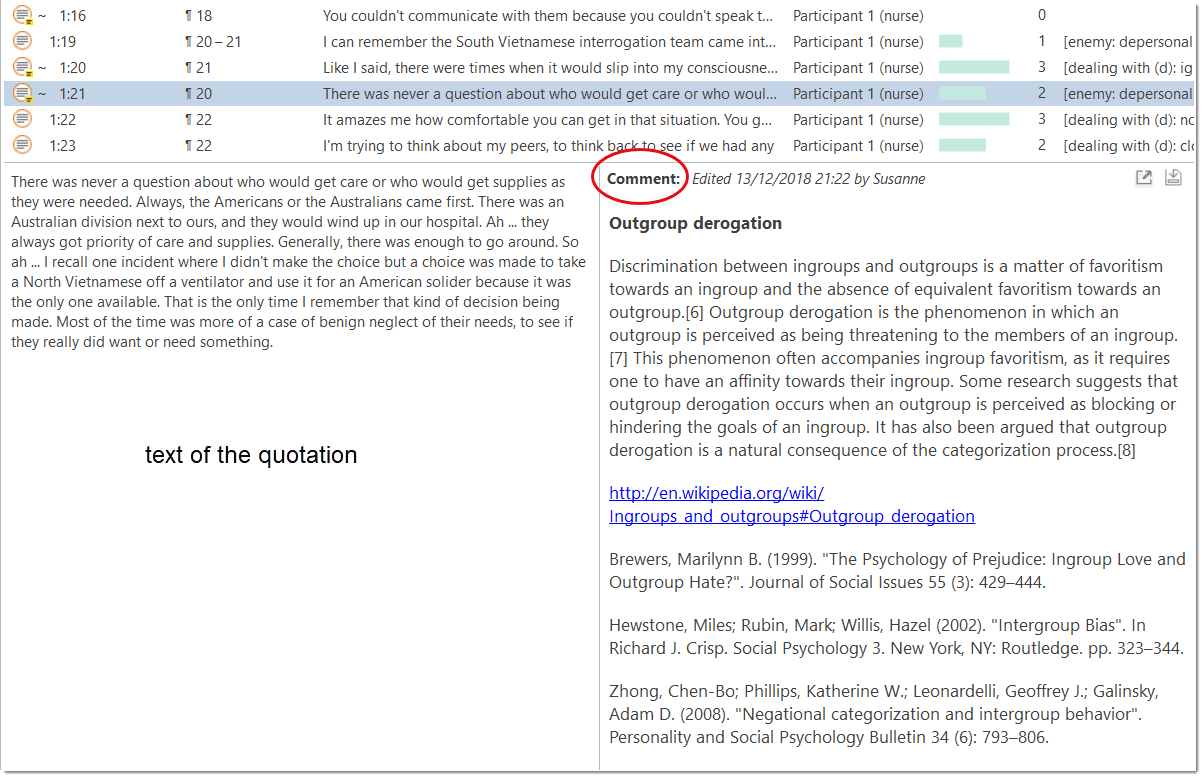
Code comment
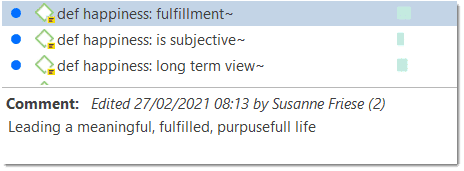
Memos
ATLAS.ti memos in comparison can be freestanding.
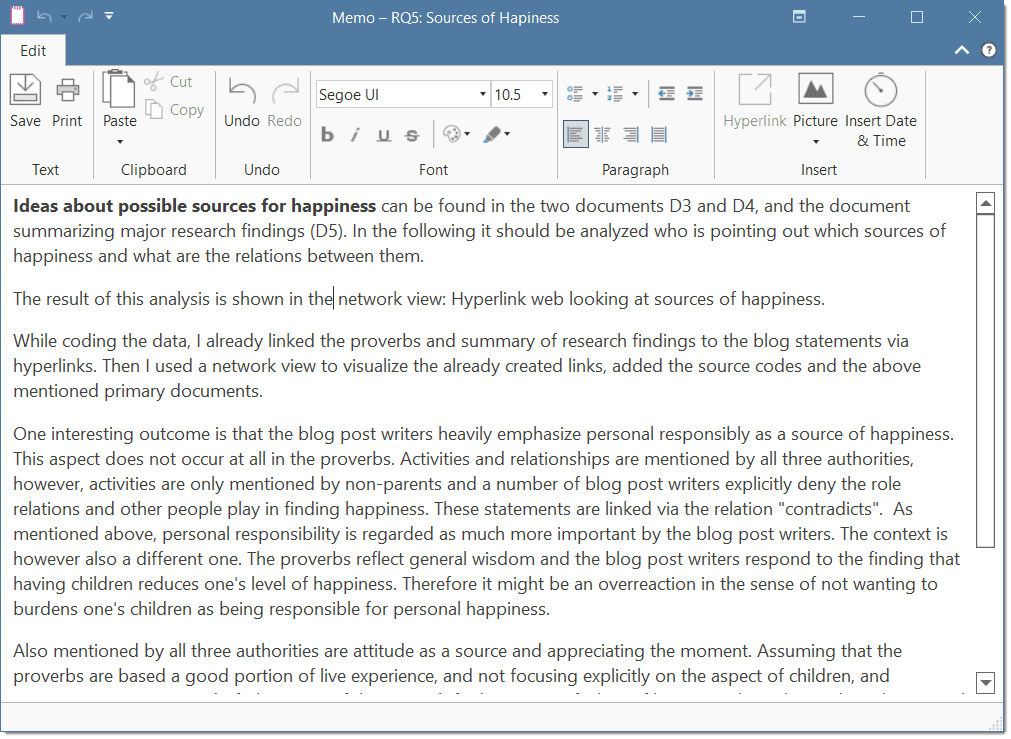
-
You can write a comment for a memo, for example: use this memo for section 2 in chapter 4 in my thesis.
-
Memos have a type attribute. This means you can label them as methodological memo, as theoretical memo, organizational memo, and the like.
-
Memos can be linked to quotations, codes and other memos (see Grounded and Density column in the Memo Manager).
-
Memos can be grouped.
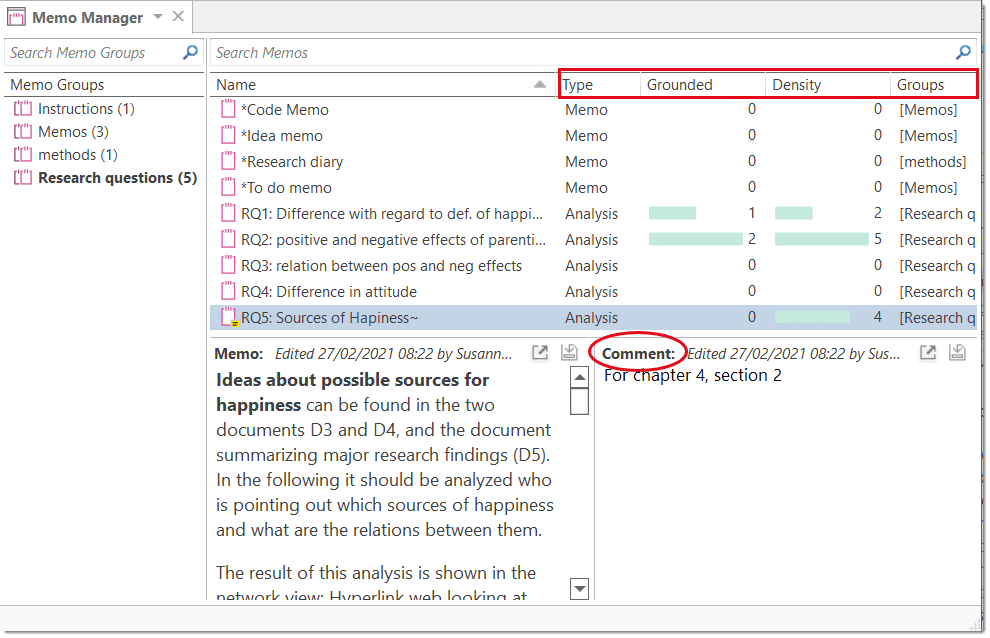
Typical Usage of Comments
Below some ideas are listed for what you can use comments:
Project comment
- project description
Document comment
- Meta information about a document: source, where and how you found or generated it
- Interview protocols
Information about a respondent like gender, age, profession etc., are best handled by document groups. There is no need to write this type of information into the comment field.
Quotation Comment
- interpretations that only concern a specific data segment
- ideas how a quotation might be related to another quotation
- summaries for what you hear or see in the multimedia quotation
- interpretations of image quotations
- notes on a geo position
Code Comment
- first ideas what you mean by a code
- a code definition
- a coding rule, especially when working in a team
- an example of what kind of data can be coded with this code
- summary of coded segments
Memo Comment
- note to yourself where you want to use the memo in a report
- comments from supervisors or team members
- links to or notes about relevant literature Network Comment
- description of the network
- idea how you want to develop it further
Link Comment
- Explaining why the two entities are linked in a specific way.
Difference between Memos and Codes
Code names are (or should be) succinct, dense descriptors for concepts emerging during the stage of closely studying the data. They often reduce complex findings to crisp placeholders and/or theoretically relevant concepts.
Beginners often stuff lengthy treatises into a code name, blurring the distinction between codes, comments, and memos and thereby mistaking codes for their more appropriate siblings.
If you find yourself using more than a few words as a code label, consider making use of the quotation name or comment. See Working with Quotations, or write more extensive thoughts about a code as code comment.
Like codes, memos have names. These names, or titles, are used for displaying memos in browsers, and help to find specific memos.
Just like code names, a memo's title should be short and concise. Don't confuse the name with its content! The purpose is to fill the memo with content, which is a longer text that goes beyond just describing the memo title. If all what you want to write in the memo fits into the title, use a quotation comment instead.
References
Corbin, Juliet and Strauss, Anselm (2008). Basics of Qualitative Research: Techniques and Procedures for Developing Grounded Theory (3rd and 4th ed.). Thousand Oaks, CA: Sage.
Gibbs, Graham (2005). Writing as analysis. Online QDA.
Working with Comments and Memos
Writing a Comment
You find a field for writing comments in every Entity Manager.
To write a comment, select an item and type something in to the comment field. As soon as you select another item, the comment is automatically saved.
inst
Changes can also explicitly be saved by clicking on the Save icon int the top right of the text pane.
All items that have a comment display a yellow post-it within their icon.
If you want to add formatting,
click on the icon with the arrow in the top right-hand corner. This opens a text editor that offers a number of formatting option.
Alternatively, you can right-click on any entity and select the Edit Comment option from the context menu and write a comment for the selected entity.
Creating Memos
Memos can be created from the Home tab, or in the Memo Manager.
To create a memo from the Home tab
Click the drop-down menu for New Entities and select Free Memo.
Enter a name for the new memo and click Create.
Depending on your last settings, the memo editor may open as floating or docked window. If you want to change between floated and docked windows, see Interface Navigation,
To create a memo in the Memo Manager
Open the Memo Manager and select Create Free Memo in the ribbon.
Enter a name for the new memo and click Create.
Begin to write your memo. When you are done, click the Save button and close the window.

Changing the Memo Type
Memos can be organized, sorted and filtered by the type attribute.
Several standard memo types are offered by ATLAS.ti: commentary, memo and theory. You can add new types or modify existing ones. The default type is memo.
To change the memo type or create a new one:
Select a memo in the Memo Manager and click on the Set Type button in the ribbon (or select it from the context menu).
Select one of the existing types, or add a new one.
Click the Set Type.
Opening an Exis
You can access memos from everywhere: the Project Explorer, the Memo Manager, in the margin area if you linked a memo to a quotation, or from within a network.
If you want to review or continue to work on a memo, just double-click the memo.
Link
Memos can be linked to quotations, codes and other memos. You can link memos per drag & drop basically anywhere in the program, or visually in networks. See Linking Nodes. Below a few examples are given.
Linking Memos to Quotations

The following options are available:
-
Drag & Drop a memo from the Project Explorer or Memo Manager onto a highlighted quotation, or on a quotation in the margin area. You can also drag the quotation to the memo.
-
Drag & Drop a memo from the Project Explorer or Memo Manager to a quotation in a result list (or vice versa) in the query tool, the Code Document Table, Code Co-occurrence Table, or results from a project search.
-
Drag & Drop a memo from the Project Explorer or the Memo Manager to a quotation in the Quotation Manager (or vice versa).
-
Link a memo to a quotation (or vice versa) in a network. See Linking Nodes.
Reviewing Quotations Linked to a Memo
To review all quotations linked to a memo, hold down the Ctrl key + double-click. This opens the Quotation Reader, and you can read all quotations that you have linked to the memo.
warn
Do not drop a memo onto a code in the margin area. This action will replace the code with the memo, which in most cases is not the wanted outcome.
Linking Memos
The following options are available:
-
Drag & Drop a memo from the memo branch in the Project Explorer or the Memo Manager to the code branch in the Project Explorer (or vice versa).
-
Drag & Drop a memo from the Memo Manager to a code in the Code Manager (or vice versa).
-
Link a memo to a code (or vice versa) in a network. See Linking Nodes.
Linking Memos to Memos
The following options are available:
-
Drag & Drop a memo to another memo in the memo branch of the Project Explorer.
-
Drag & Drop a memo to another memo in the Memo Manager.
-
Link a memo to a memo in a network. See Linking Nodes.
Converting a Memo into a Document
As a lot of the analysis happens while you write memos, in some cases you may wish to convert a memo into a document as secondary data so that you can code it.
Select a memo in the Memo Manager and click on the Convert to Document button in the ribbon, or select it from the context menu. Alternatively, right-click on a memo in the Project Explorer and select the option Convert to Document from the context menu.
The memo is then added to your list of documents.
You can continue to use the memo as memo. The memo comment is not transferred. It is treated independently of the comment that you may want to write for the memo document.
Hyperlinks
Representing the Rhetoric of Data
A network based on text segments that are linked to each other is often referred to as a hypertext. The original sequential text is de-linearized, broken down into pieces that are then reconnected, making it possible to traverse from one piece of data to another piece of data regardless of their original positions.
As in ATLAS.ti, you cannot only work with text, this also applies to other data sources like images, audio, video or geo data.
Cross-references between text passages are very common also in conventional media like books - just think of religious and juridical texts, literature, journals etc. Footnotes and end notes are another common deviation from the pure linearity of sequential text. However, in conventional media, not much navigational support is provided for "traversing" between the pieces of data that reference each other.
This manual for example is a computer-related hypertext application that displays operational information in suitable small chunks (compared to lengthy printed information), but with a considerable amount of linkage to other pieces of information.
Another well-known hypermedia structure is the World Wide Web with its textual, graphical and other multimedia information distributed world-wide.
What are the advantages of direct connections between text segments, compared to the traditional procedures of qualitative text analysis?
What Codes Can't Do
The code & retrieve paradigm, which is so prevalent for many systems supporting the qualitative researcher, is not adequate for certain types of analysis. In formal terms, attaching codes onto segments of data creates named sets of segments with almost no internal structure. This is not to say that partitioning lots of text segments into sets is not useful. On the contrary, classification leads to manageable amounts of segments that later can be retrieved with the help of the attached code words. But this may not be the only way you want to look at your data.
The concept of hypertext introduces explicit relations between passages. These links have to be built manually and result from an intellectual effort. The system cannot decide for you that segment x is in contradiction to segment y. After the work of establishing the links, you can make semantically richer retrievals like: "Show statements contrary to statement x." See Manager for Links and Analytic Functions of Networks. A code offers fast access to a set of data segments that are similar, defined by a simple relation between them, namely equivalence.
Hypertext allows you to create different paths through the data you are analyzing. For example, you may create a timeline different from the strict sequence of the original text.
Hyperlinks can express more differentiated relationships between quotations, for example:
- statement A contradicts / supports / refers to statement B.
- Image quotation X in document 7 illustrates what has been said in quotation Y in document 12.
The data segment that you can relate to each other can be from the same or different documents.
Mapping Hyperlinks in Networks
ATLAS.ti incorporates procedures for creating and browsing hypertext structures. It allows for two or more quotations being connected using named relations. See About Relations.
Further, you can create graphical maps - using Networks - to make parts of your hyperspace accessible easily.
Hyperlinks may connect quotations (textual, graphical, multimedia) across documents (intertextual links) or may link segments within the same document (intra-textual links). The natural boundary for hyperlinks, like all structures in ATLAS.ti, is the project.
Creating Hyperlinks
A hyperlink is a named linked between two quotations. If, for instance, you notice that one statement in a report or interview is explaining a previous statement in a bit more detail, you can link the two using the relation "explains." Or you may find a contradictory or supporting statement. These are just a few of the default relations that come with the software. If they do not fit what you want to express, you can create user-defined relations in the Relation Manager. See Creating New Relations.
ATLAS.ti offers a variety of options for creating and traversing hypertext links. Similar to the linking of codes, you may create hyperlinks in the network editor. See Linking Nodes.
In addition, hypertext links can be created while you work with your documents. How this works is described below.
Terminology
-
The start of a hyperlink is called source
-
The end of a hyperlink is called target.
When creating a hyperlink you first create the link source, next you select the link target and then you select the relation that defines how these two quotations are linked.
Display of Hyperlinks
In the Margin Area
In the margin area, hyperlink labels show the quotation icon, the name of the relation, the quotation ID and the first letters of the quotation name. The label is visualized as an arrow. Source links point to the right, target links to the left.
In the Quotation Manager
All hyper-linked quotations can easily be recognized in the Quotation Manager. All source quotations are marked with an opening angle bracket <, all target quotations with a closing bracket >. If a quotation is both, source and target (as the case when creating chains), then both brackets are used as prefix <>.
| Symbol | Explanation |
|---|---|
| < | Quotation is source of a hyperlink |
| > | Quotation is target of a hyperlink |
| <> | Quotation is both start and target, thus at least two other quotations are linked |
Creating Hyperlinks in a Document
Open a document.
Select a data segment as source for the hyperlink. It can be an existing quotation, or a highlighted section of your data. Right-click the highlighted document area and select the option Create Link Source from the context menu.
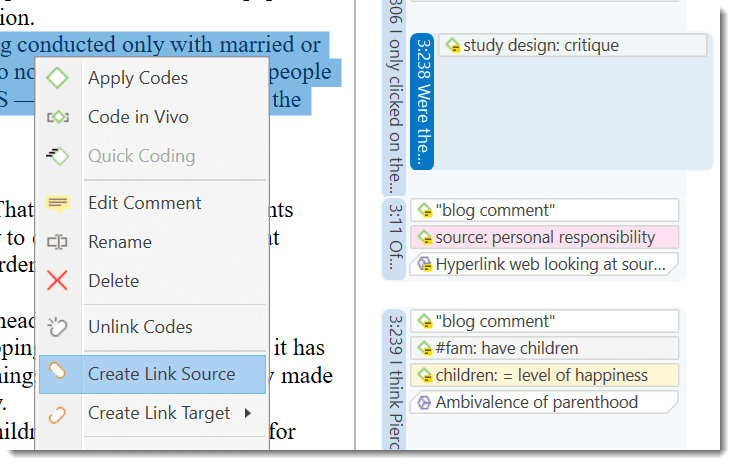
If you select a data segment as source that was not yet a quotation, ATLAS.ti automatically creates a quotation from it.
Select an existing quotation as target, or highlight a segment in your data, right click and select the option Create Link Target.
The list of available relations opens up. Select a relation with a left-click. Now the hyperlink is created.
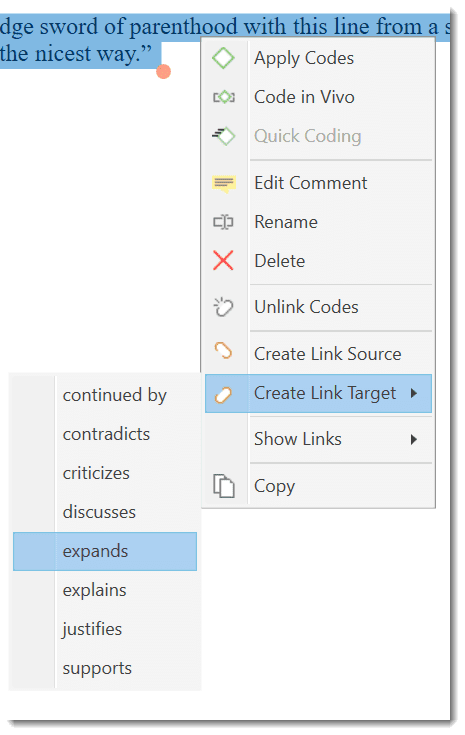
If you select a data segment as target that was not yet a quotation, ATLAS.ti automatically creates a quotation from it.
If none of the existing relations fit, create a new relation in the Relation Manager. See Defining New Hyperlink Relations.
After creating a hyperlink, you see the following in the margin area: the hyperlink label show the quotation icon, the name of the relation, the quotation ID and the first letters of the quotation name. The label is visualized as an arrow. Source links point to the right, target links to the left.
If you double-click on a hyperlink, the hyperlinked quotation is shown. You have the option to directly jump to the linked quotation by clicking on the option Go to Quotation.
Creating Hyperlinks in the Quotation Manager
This method can be applied to connect one or more existing quotations to one target quotation.
Select one or more source quotations in the Quotation Manager (multiple selections can be done in the standard way).
Hold down the left mouse button and drag the quotation(s) to a target quotation in the Quotation Manager.
Release the left mouse button. The relation menu opens, and you can specify the relation to be used for the hyperlinks.
Creating Hyperlinks in the Margin Area
Creating hyperlinks in the margin area is suitable for connecting two quotations that are close to each other:
Select a quotation bar in the margin area.
Hold down the left mouse button and drag the bar onto another quotation bar.
Release the left mouse button. The relation menu opens. Select a relation.
Creating Hyperlinks across Documents
This is a good method if you want to create hyperlinks between two documents.
Load two documents side-by-side. This means you load two documents into different tab groups. See Working With Tabs And Tab Groups .
Left-click a quotation bar in the margin area of one document and drag it to a quotation bar in the margin area of the other document. Release the left mouse button, and select a relation.
Working with Hyperlinks
Traversing Hyperlinks
Traversing hyperlinks means you view or jump to the linked quotations. To do so:
Double-click on a hyperlink.
A window pops showing you the content of the linked quotation.
To view the content of the linked quotation, select the option Go to Quotation.
Alternatively, you can also use 'Ctrl + double-click' to immediately jump to a linked quotation.
Modifying Hyperlinks
You can modify existing hyperlinks, i.e. cutting a link, flipping (reversing) a link, or changing the relation at various places.
In the Margin Area
In the margin area, you can unlink or change the direction of a hyperlink:
Right-click on a hyperlink in the margin area and select either the Unlink, or the Reverse option from the context menu.
In the Hyperlin
In the Hyperlink Manager, you can unlink or change the direction of a hyperlink, or change the relation.
To open the Hyperlink Manager, go to the Home tab, and click on the Links button.
inst
By default the Link Manger shows the code-code links. To change to view the hyperlinks, click on the Hyperlinks button on the right-hand side of the ribbon.
inst
To modify a hyperlink, select it, right-click and chose one of the following options: Cut, Flip or Change Relation from the context menu.
See also Links Manager.
Modifying Hyperlinks in the Netwo
Open a network on a hyperlink, e.g. right-click and select Open Network from the context menu, or click on the Open Network button in the ribbon. See Ad-hoc networks.
inst
In the network editor, right-click on a link label and select one of the following options: Flip Link, Cut Link or Change Relation from the context menu.
For more information see Linking Nodes.
Editing Hyperlink Comments
The links between quotations use fully qualified relations, like the links between codes. As a hyperlink is a "first-class" entity, you can write a dedicated comment for each hyperlink.
Such a comment could explain why quotation A has been linked to quotation B. Link comments can be accessed, displayed and edited from three locations: the margin area, the Hyperlink Manager and the Network Editor.
The margin area has the advantage that it is readily available during scrolling through the documents.
The network editor method offers a visual approach to accomplishing this goal.
Editing a Hyperlink Comment in the Margin Area
Right-click a hyperlink in the margin and select the option: Edit Hyperlink Comment.
Editing a Hyperlink Comment in the Hyperlin
Open the Hyperlink Manager.
inst
Select a hyperlink. Edit the comment in text pane below the link list.
Alternatively:
Right-click and select the Edit Comment option in the context menu, or click on the Editor comment button in the ribbon to open a text editor.
Editing a Hyperlink Comment in
Open a network on a hyperlink, e.g. right-click and select Open Network from the context menu, or click on the Open Network button in the ribbon. See also Ad-hoc networks.
inst
Move the mouse pointer to the link between two quotations, right-click and select Edit Comment.
Creating New Relations for H
New relations can be defined in the Relation Manager. See Creating New Relations. The procedure for defining or editing hyperlink relations is equivalent to defining or editing code-code relations.
Further Data Analysis
ATLAS.ti offers several tools that support you in querying your data:
Simple Boolean Retrieval.
Analysing Code Distributions
Code distributions are displayed in the Document Manager and in the Code Manager in the form of bar charts. In the document manager you will see a bar for each code. The higher the bar, the more often the code was used. In the Code Manager each bar stands for a document. Within the bar you can see how the codes are distributed in the document.
After you've encoded the data, a look at the code distribution gives you a feel for the data. Which topics were mentioned more or less frequently, by whom, is there a difference between different groups of respondents? How are the topics distributed? For further information see Analysing Code Distributions.
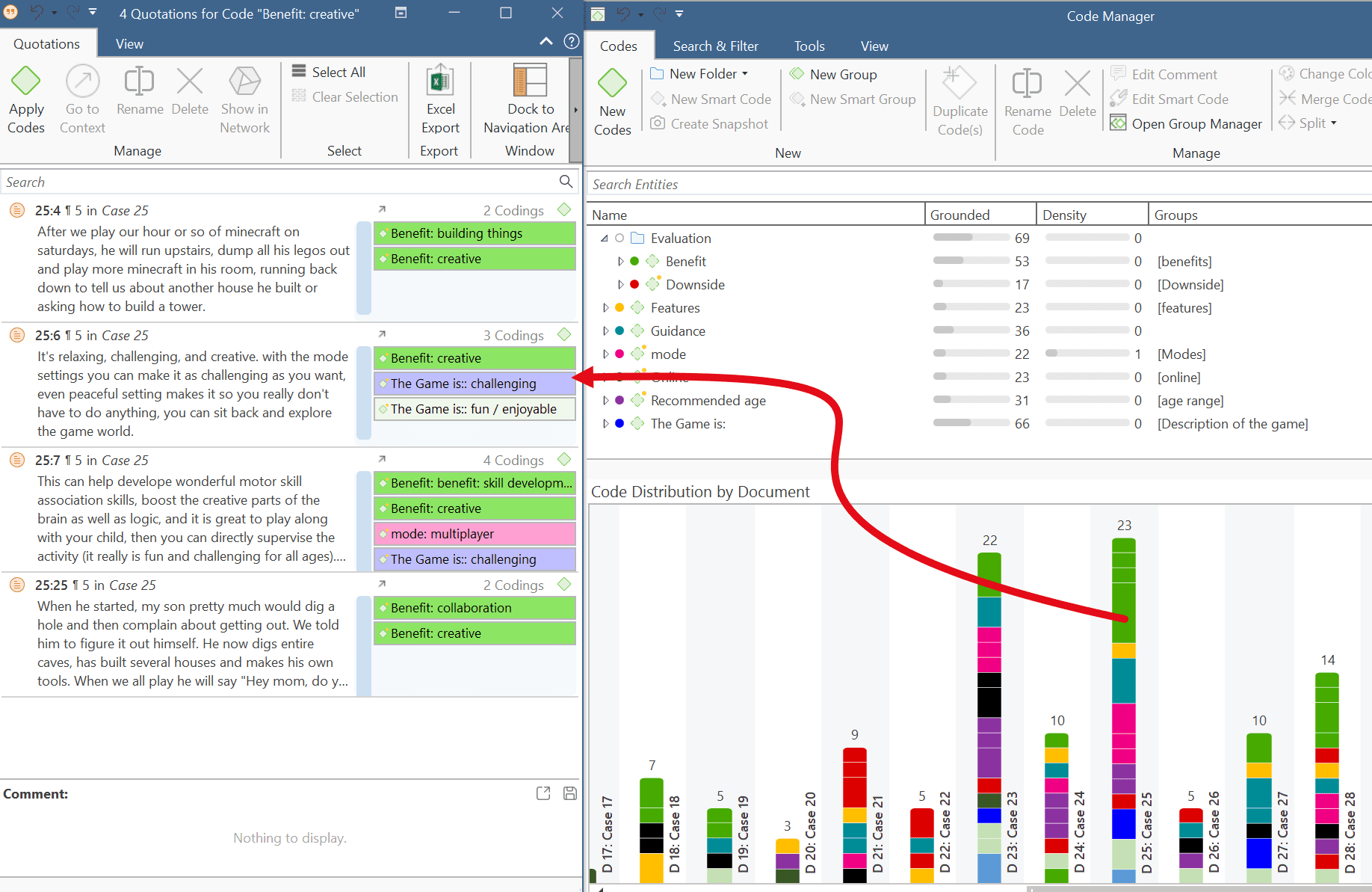
Code-Document Table
The Code Document Table is a cross-tabulation of codes or code groups by documents or document groups. It shows how often a code (codes of a code group) has (have) been applied to a document or document group. See Code Document Table.
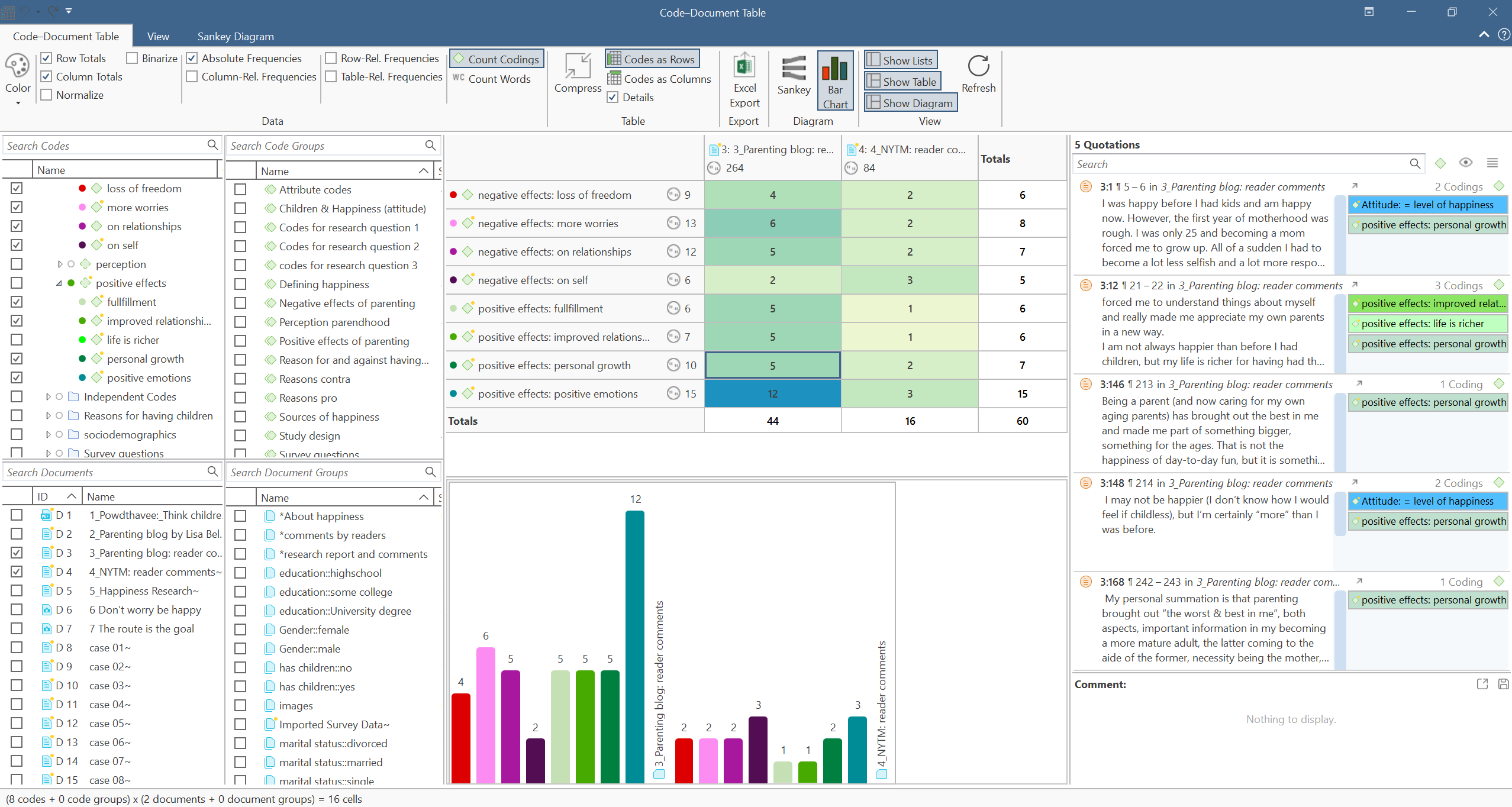
Co-occurrence Analysis
Use the Code Co-occurrence Explorer to explore coded data to get a quick overview where there might be interesting overlaps. If you are looking for specific co-occurrences and for accessing the quotations of co-occurring codes, the Code Co-occurrence Table is the better choice. See Code Co-Occurrence Tools.
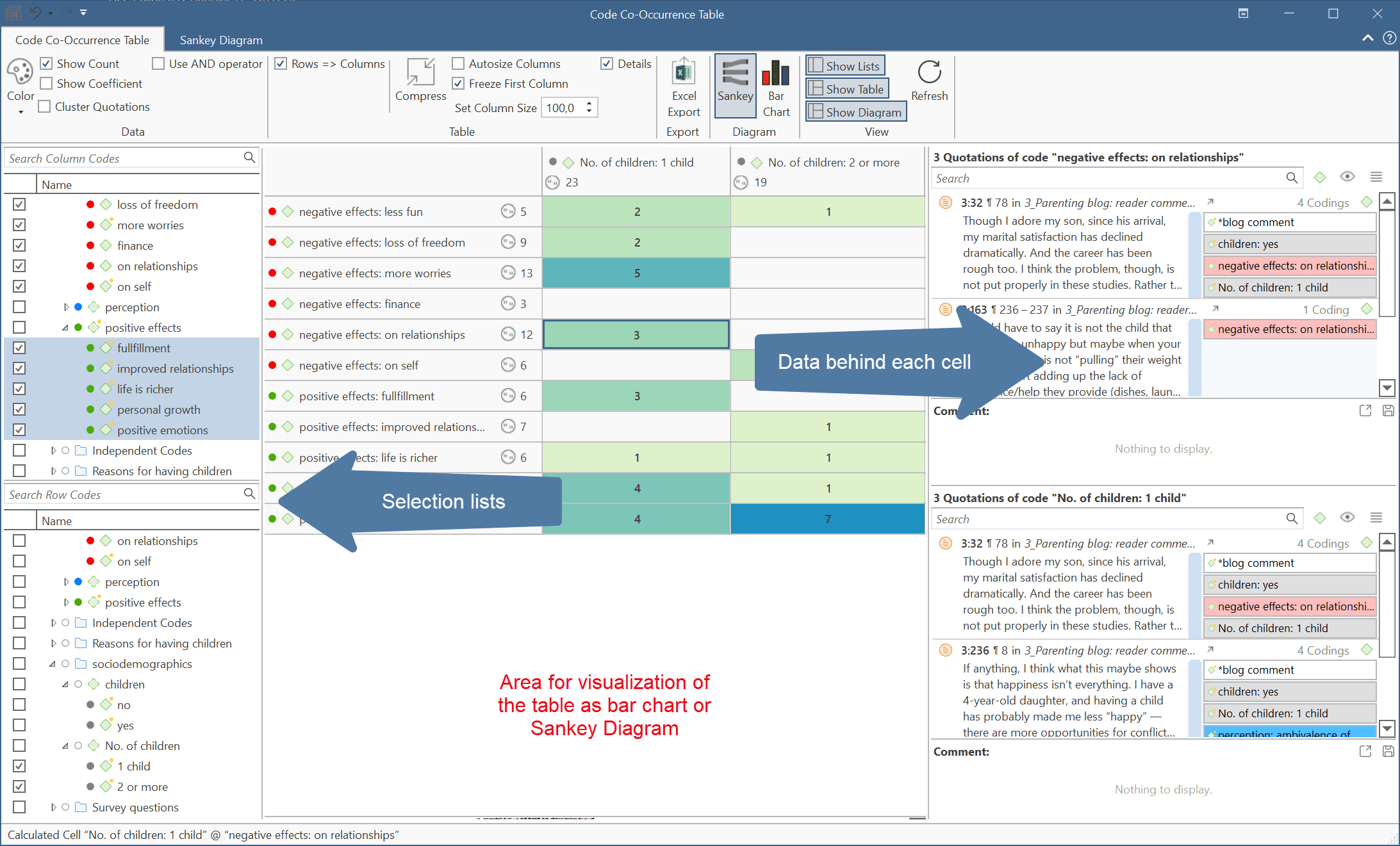
The Query Tool
The Query Tool finds quotations based on a combination of codes using Boolean, Proximity or Semantic operators. Example: Show me all quotations where both Code A and Code B have been applied.
Such queries can also be combined with variables in form of documents or document groups. This means that you can restrict a query to parts of your data like: Show me all quotations where both Code A and Code B have been applied, but only for female respondents between the age of 21 and 30. See The Query Tool.
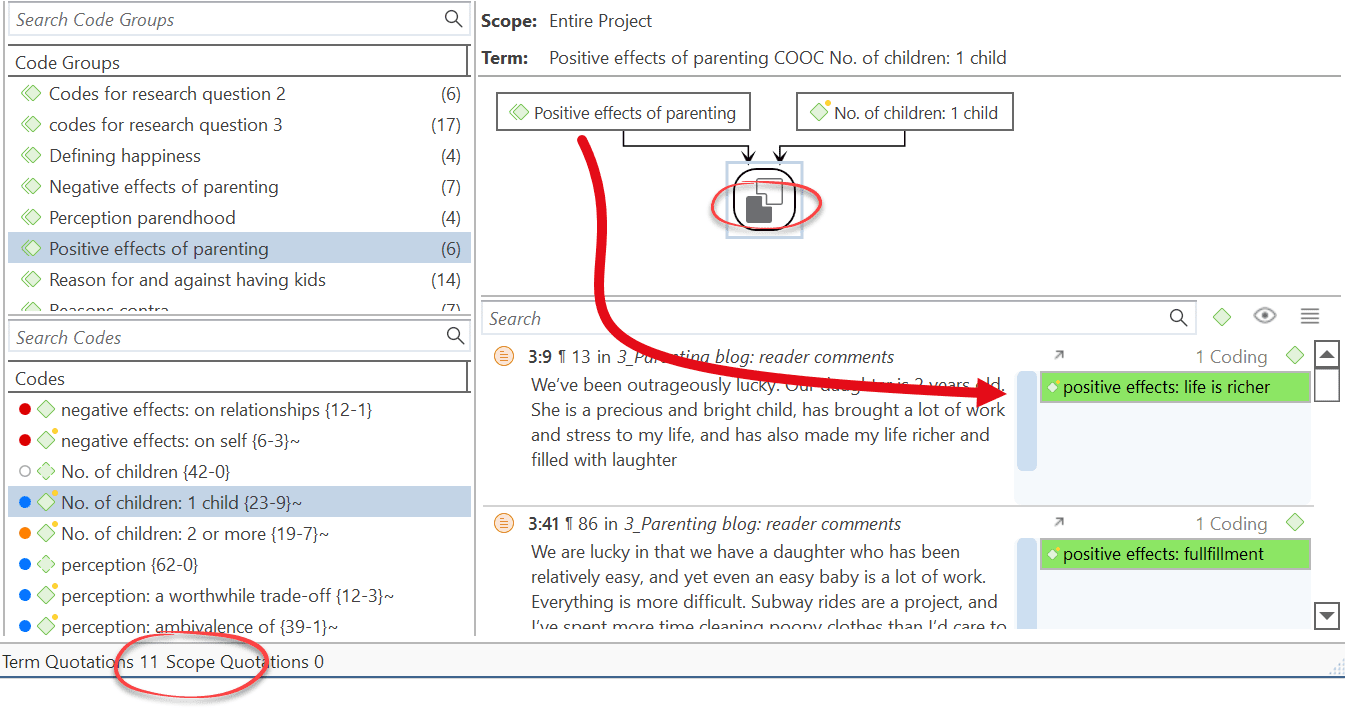
Smart Codes
Smart Codes are stored queries. They can be reused and always reflect the current state of coding, e.g. after more coding has been done or after coding has been modified. They can also be used as part of other query, thus, you can build complex queries step-by-step. See Working With Smart Codes.
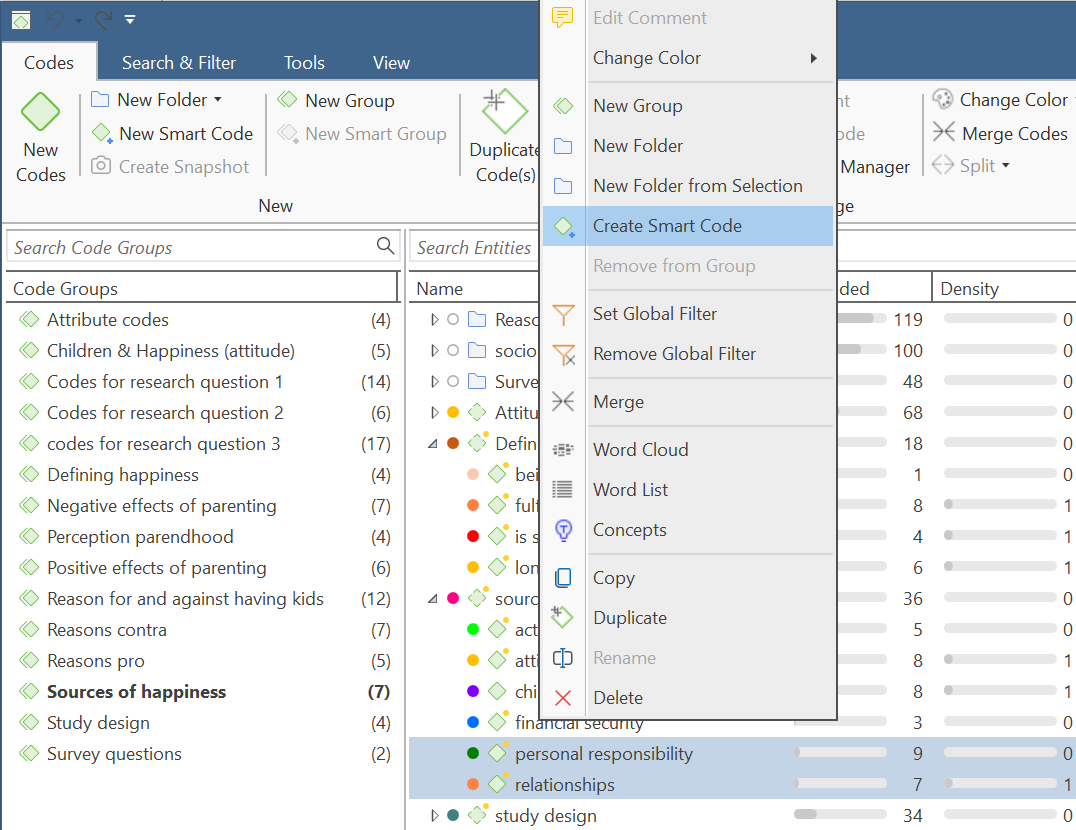
Smart Groups
Like smart codes, smart groups are stored queries based on groups. The purpose is to create groups on an aggregate level. For instance, if you have groups for gender, age and location, you can create smart groups that reflect a combination of these like all females from age group 1 living in city X. See Working With Smart Groups.
Global Filters
Global filters allow you to restrict searches across the entire project. If you set a document group as global filter, the results in the Codes-Document or Code Co-occurrence Table will be calculated based on the data in the filter and not for the entire project. Global filters effect all tools, windows, and networks. See Applying Global Filters For Data Analysis.
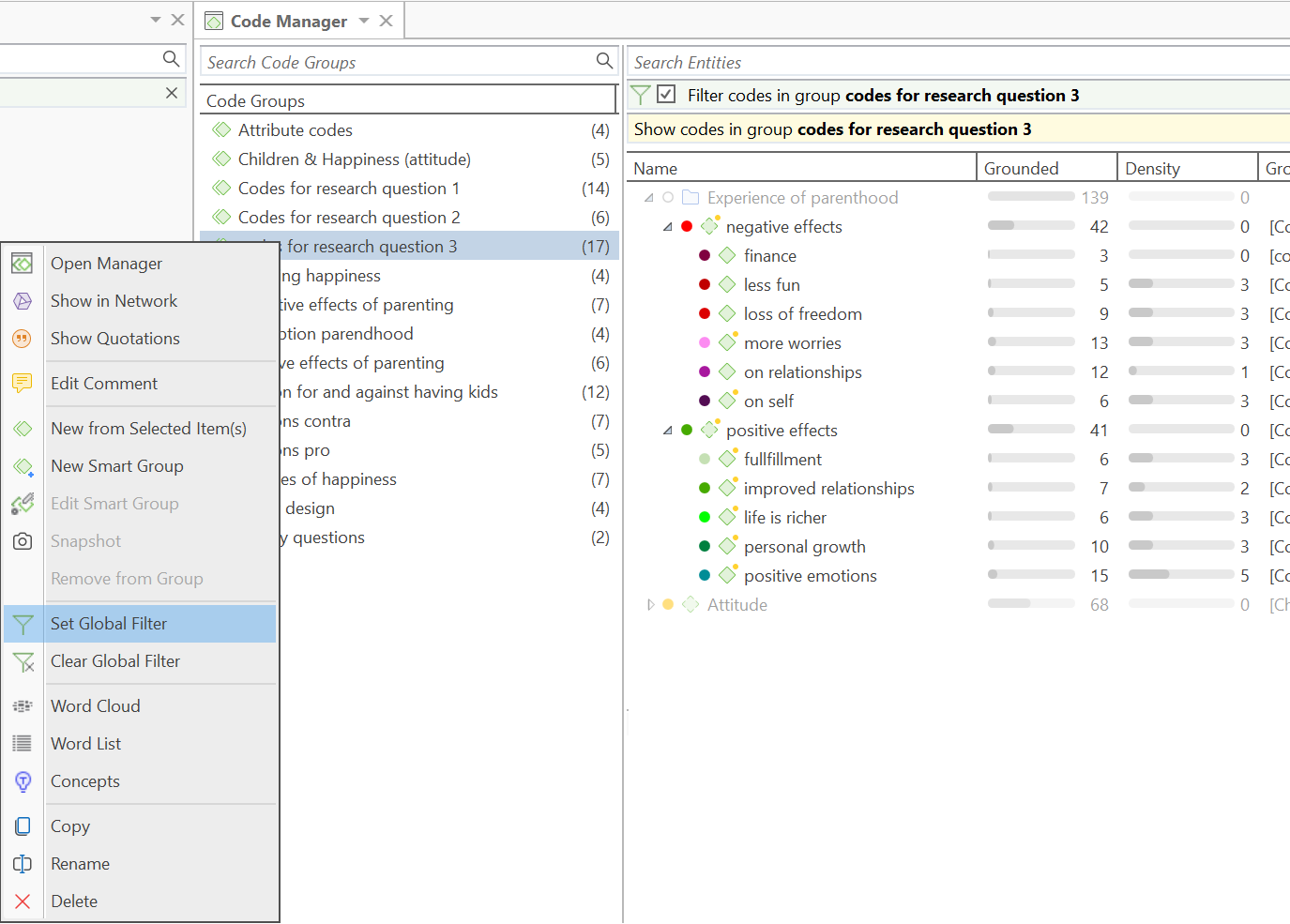
Available Operators for Querying Data
Knowing about the available operators is important when using the Code Co-occurrence Tools, the Query Tool, when creating Smart Codes and Smart Groups. The following types of operators are available:
-
Boolean operators allow combinations of keywords according to set operations. They are the most common operators used in information retrieval systems.
-
Proximity operators are used to analyze the spatial relations (e.g., distance, within/enclosing, overlapping, co-occurrence) between coded data segments.
Boolean Operators
Video Tutorial: Explaining Boolean Operators
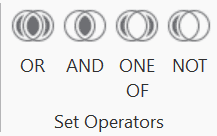 OR, AND, ONE OF (exactly one of the following is true) and NOT
OR, AND, ONE OF (exactly one of the following is true) and NOT
- OR, AND, and ONE OF (exactly one of the following is true) are binary operators which need exactly two operands as input.
- NOT needs only one operand.
- Codes, code groups, or smart codes can be used as operands in a query.
AND: ALL of the following are true
The AND operator finds quotations that match ALL the conditions specified in the query. This means you have applied two or more codes to the same quotation.
Example: All quotations coded with both 'code A' AND 'code B' .
The AND operator is very selective and often produces an empty result set as it requires that the selected codes have all been applied to exactly the same data segment. It produces best results when combined with less restrictive operators or when the overall number of the available text segments is large.
OR: ANY of the following are true
The OR operator does not really match the everyday usage of OR. Its meaning is At least one of..., including the case where ALL conditions match. The OR operator retrieves all quotations that are coded with any of the codes used in the expression.
Example: All quotations coded with 'code A' OR 'code B'. The result list will contain all quotations coded with 'code A' and all quotations coded with 'code B', or quotations coded with both codes.
ONE OF: Exactly one of the following is true
The ONE OF operator asks that EXACTLY one of the conditions must meet. It translates into the everyday either-or.
Example: All quotations coded with EITHER 'code A' OR 'code B' (but not with both).
NOT: None of the following are true
The NOT operator tests for the absence of a condition. Technically, it subtracts the findings of the non-negated term from all data segments available. Given 1000 quotations in the project and 20 quotations assigned to 'code A', the query NOT 'code A' retrieves 980 quotations - those which are not coded with 'code A'.
The operator can be used with an arbitrary expression as in the argument NOT ('code A' OR 'code B') which is the equivalent of neither 'code A' nor 'code B'.
See Example 2 in the section Building Complex Queries.
Proximity Operators
Video Tutorial: Proximity Operators and Example Queries
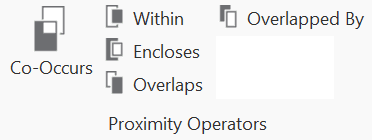
Proximity describes the spatial relation< between quotations. Quotations can be embedded in one another, one may follow another, etc. The operators in this section exploit these relationships. They require two operands as their arguments.
Proximity operators differ from the other operators in one important aspect: Proximity operators are non-commutative. This property makes their usage a little more difficult to learn.
-
Quotations enclosing quotations: A ENCLOSES B retrieves all quotations coded with A that contain quotations coded with B.
-
Quotations being enclosed by quotations: A being enclosed by B (WITHIN) retrieves all quotations coded with A that are contained within data segments coded with B.
-
Overlaps (quotation overlapping at start): A OVERLAPS B retrieves all quotations coded with A that overlap quotations coded with B
-
Overlapped by (quotations overlapping at the end): A OVERLAPPED BY B retrieves all quotations coded with A that are overlapped by quotations coded with B.
-
Co-Occurs: Often when interested in the relation between two or more codes, you don't really care whether something overlaps or is overlapped by, or is within or encloses. It this is the case, you simply use the Co-occurs operator.
Co-occur is essentially a short-cut for a combination of the four proximity operators discussed above, plus the operator AND. AND is a Boolean operator, but also finds co-occurrence, namely all coded segments that overlap 100%.
The more general co-occurrence operator is quite useful when working with transcripts. In interviews, people often jump back and forth in time or between contexts, and therefore it often does not make much sense to use the very specific embedding or overlap operators. With other types of data they are however quite useful. Think of video data where it might be important whether action A was already going on before action B started or vice versa. Or if you have coded longer sections in your data like biographical time periods in a person's life and then did some more fine-grained coding within these time periods. Then the WITHIN operator comes in very handy. The same applies when working with pre-coded survey or focus group data. Using WITHIN, you can for instance find all data segments coded with 'topic x' WITHIN 'question 5'; or all data segments coded with 'code A' WITHIN 'speaker unit: Tom'.
Non-commutativity of proximity operators
Non-commutativity requires a certain input sequence for the operands. While A OR B is equal to B OR A, this does not hold for any of the proximity operators: A FOLLOWS B is not equal to B FOLLOWS A. When building a query, always enter the expressions in the order in which they appear in their natural language manifestation.
Another important characteristic for these operators when using the query tool is the specification of the operand for which you want the quotations retrieved. A WITHIN B specifies the constraint, but you must also specify if you want the quotations for the As or the Bs. This is done implicitly by the sequence.
If you enter the query 'A Co-occur B', all quotations coded with A are retrieved.
If you enter 'B co-occur A', all quotations coded with B are retrieved.
For example, if you want to retrieve all segments coded with codes of the code group 'Positive effects of parenting' for all comments written by people with 1 child: 'No. of children: 1 child', the query yields 11 quotations:
 As results, you will get all quotations coded with the codes of the code group 'Positive effects of parenting'.
As results, you will get all quotations coded with the codes of the code group 'Positive effects of parenting'.
If you enter the codes in a different order - the code 'No. of children: 1 child' first - then the query retrieves 10 quotations. This is not a mistake, because this time the result will be all quotations coded with the code 'No. of children: 1 child'.
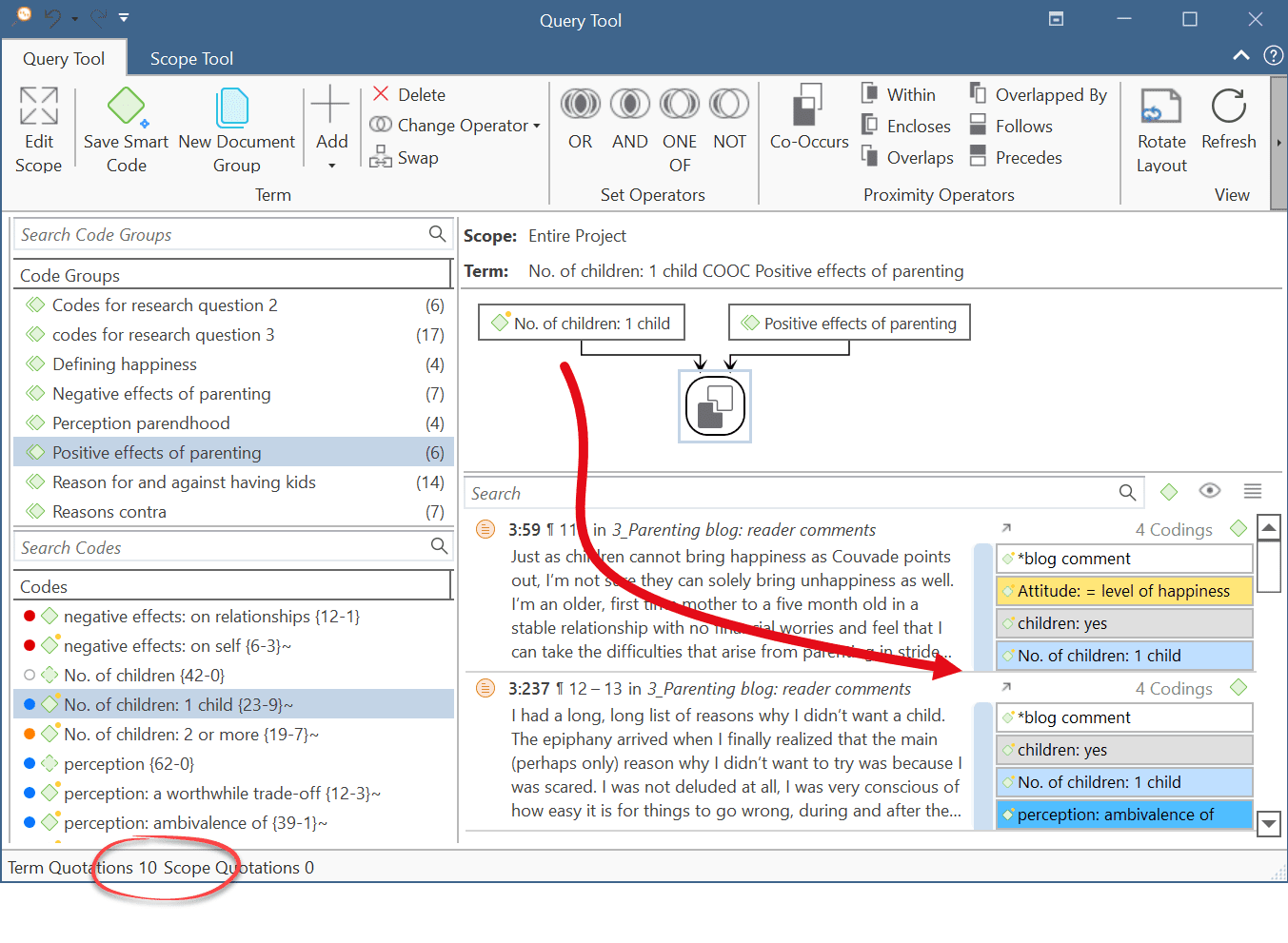
In the Query Tool, you need to enter the code whose content you are most interested in on the right-hand side of the query.
The Query Tool
The Query Tool is used for retrieving quotations using the codes they were associated with during the process of coding. The simplest retrieval of this kind - search for quotations with codes- is what you frequently do by double-clicking ona Code in the Code Manager or a code browser. See Retrieving Coded Data. This may already be regarded as a query, although it is a simple one. The Query Tool is more complex in that it can be used to create and process queries that include a variety of combinations of codes.
A query is a search expression built from operands (codes and code groups) and operators (Boolean, proximity or semantic operators) that define the conditions that a quotation must meet to be retrieved, for example "All quotations coded with both codes A and B".
A query can be built incrementally which is instantaneously evaluated and displayed as a list of quotations. This incremental building of complex search queries gives you an exploratory approach toward even the most complex queries.
To open the Query Tool:
Select the Analyze tab and click Query Tool.
The query tool ribbon contains all available operators for querying data, plus a few options that help you build a query. At the left-hand side you see the list of folders, categories, subcodes and code groups that can be used as operands in a query. The main space is reserved for displaying the query and the results. At the top right-hand side you find a number of different output options to create a report of the query results.
Remember the results of a query in the query tool are always quotations.
How to Build a Query Using Boolean Operators
Video Tutorial Creating a Boolean OR query in the Query Tool
The examples shown are based on the Children & Happiness sample projects part 1. You can download and import it, if you want to follow along.
Example 1
Open the Query Tool by selecting the Analyze tab and from there click Query Tool.
Question
The aim is to find all statements where people wrote about the two positive effects of parenting: 'fulfillment' and 'life is richer'.
Next, select the operator OR from the ribbon. It will be added into the white field.
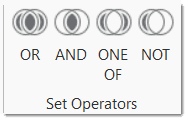
As OR needs two arguments, you see two nodes with a red dot that can be filled with codes or code groups. You recognize the active node by the blue frame. Double-click on a code or code group to fill it. You can also drag and drop a code or code group to the node, or click on the Add button in the ribbon. The results of this first part of the query will immediately be displayed in the result pane.
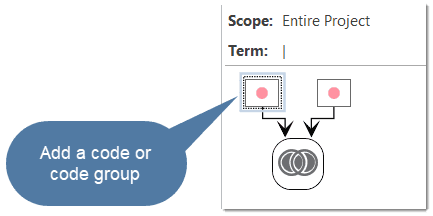
Click on the second node to activate it and enter a second code or code group. If you double-click a third code or code group, it will be added to the OR query. Another double-click will add a fourth node to the term, and so on.
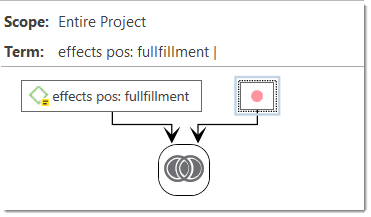
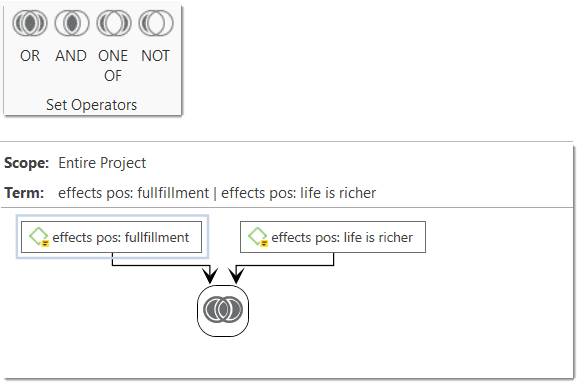
Inspecting the Results of a Query
If you click on an operator node, the quotations resulting from the query will be displayed in the bottom pane. If you click on any other node in the query, the respective results of the selected node will be shown.
The results of a query are shown in the Quotation Reader. The full functionality of the quotation reader is also available here.
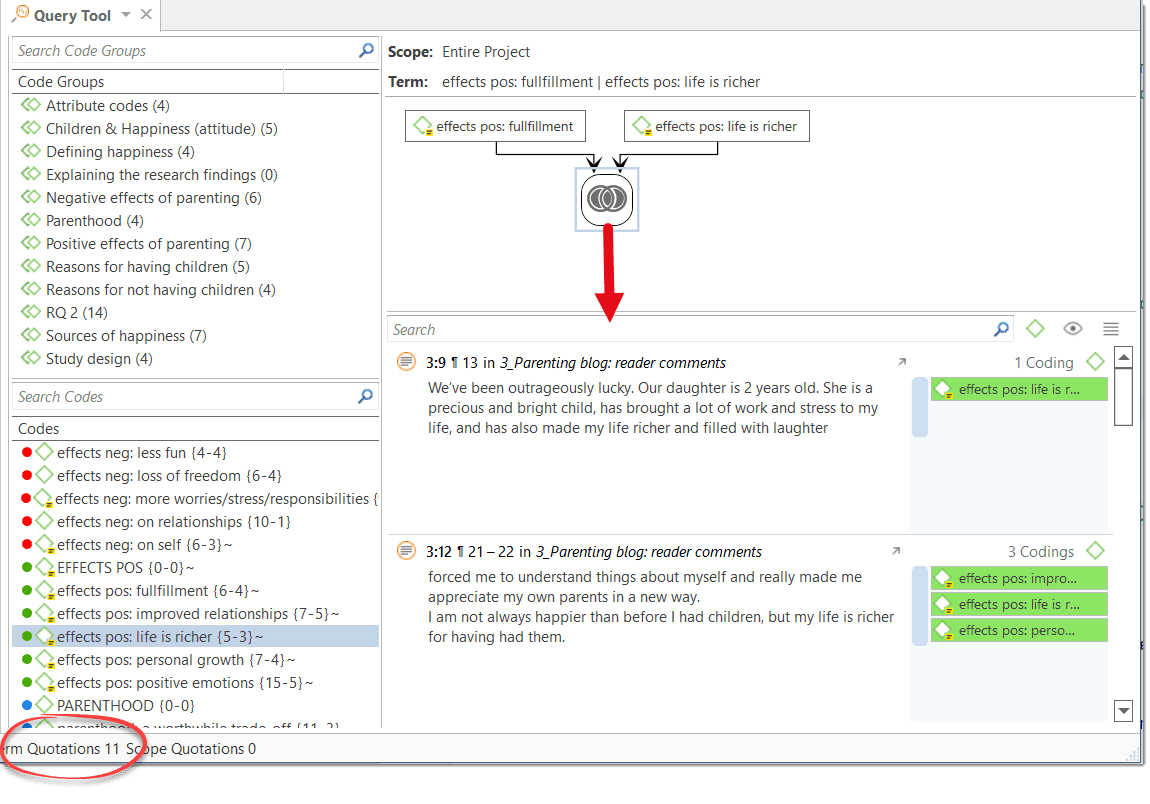
If you want to read the results in a detached Quotation reader, click on the burger menu and select the option Open in new window:
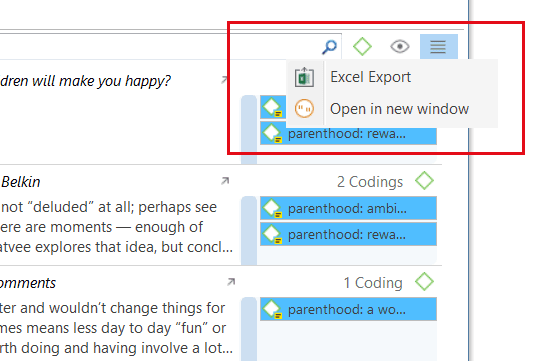
The status bar at the bottom of the screen shows the total number of quotations this query results in
If you click on any one of the node in a query, the respective results of this node will be shown:
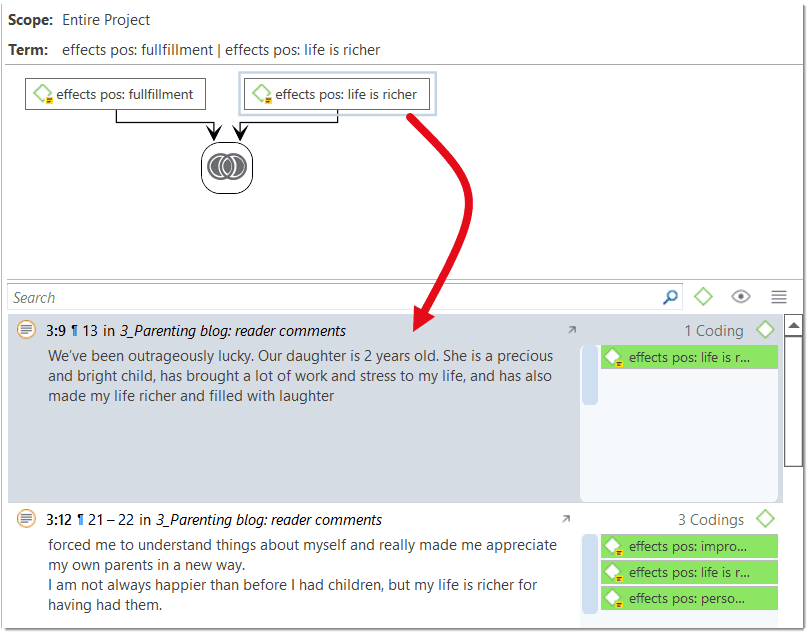
Options of the Result Pane
If you click on the Eye icon, you can change the view mode. Available options are:
- single line
- small preview
- large preview
- show quotation comments
- show margin
When you click on the Burger icon you can export the results of the query to Excel.
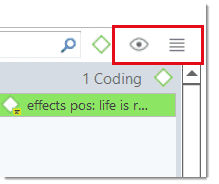
Removing or Modifying a Query
To delete a query, click on the operator node and select Delete in the ribbon, or the Delete key on your keyboard.
If you only want to delete an argument (i.e. a code or code group) from the query, click on the respective node and then on the Delete button in the ribbon, or the Delete key on your keyboard.
If you want to change the operator, click on the Change Operator button in the ribbon. Changing operators is only available for Boolean queries.

Example 2
In this example, we show how to build a query with two Boolean operators.
Question
The aim is to find all statements coded with:
("children = level of happiness" OR "children > happiness")
that have also been coded with codes of the code group "sources of happiness".
Select the operator OR from the ribbon.
Add the two codes "children = level of happiness" and "children > happiness" into the two empty nodes as described above.
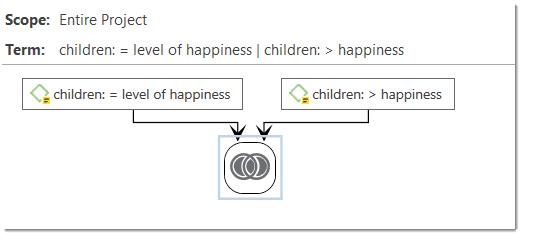
Select the operator AND to extend the query. The result of the first query is now one of the two arguments needed. Activate the empty node by clicking on it and add the code group "sources of happiness".
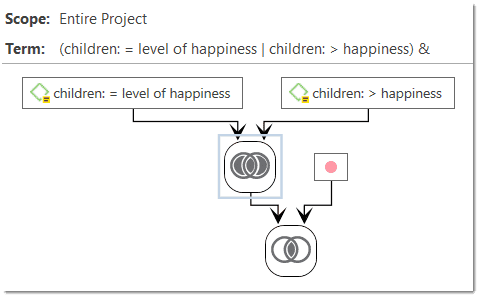
Activate the empty node by clicking on it and add the code group "sources of happiness".
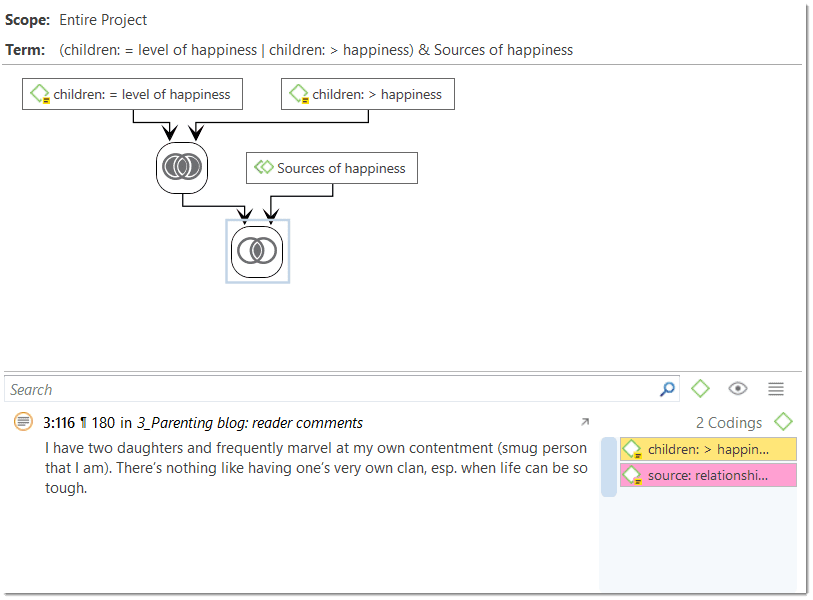
You can read the query as follows: Find all statements where people wrote that children either make them more happy, or they experience equal level of happiness and where they also mentioned a source of happiness. This query yields one quotation as result.

You can rotate the layout of a query by clicking on the Rotate Layout button in the ribbon.
If you selected the wrong Boolean operator, you can exchange it by clicking on Change Operator in the ribbon. This saves you from rebuilding the query from scratch if you made a mistake.
How to Build a Query using Proximity Operators
Video Tutorial: Proximity Operators and Example Queries
The examples shown are based on the Children & Happiness sample projects part 1. You can download and import it, if you want to follow along.
Example 1
Open the Query Tool by selecting the Analyze tab and from there click Query Tool.
Question
Is positive and negative perception of parenthood related to the attitude whether having children contribute to happiness?
These aspects are captured by the code groups: "positive effects of parenting" and "negative effects of parenting", and the codes "children > happiness" and "children < happiness"
Select the operator Co-occurs in the ribbon.
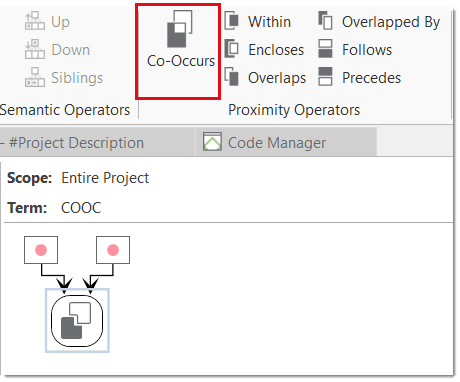
As all proximity operators need two arguments, you see two nodes with a red dot that can be filled with codes or code groups. You recognize the active node by the blue frame.
Select the code "children > happiness" to fill the node on the left-hand side. You can also drag and drop a code or code group to the node, or click on the Add button in the ribbon. The results of this first part of the query will immediately be displayed in the result pane.
Select the code group "Positive effects of parenting" to fill the node on the left-hand side. The result of this query are 8 quotations.
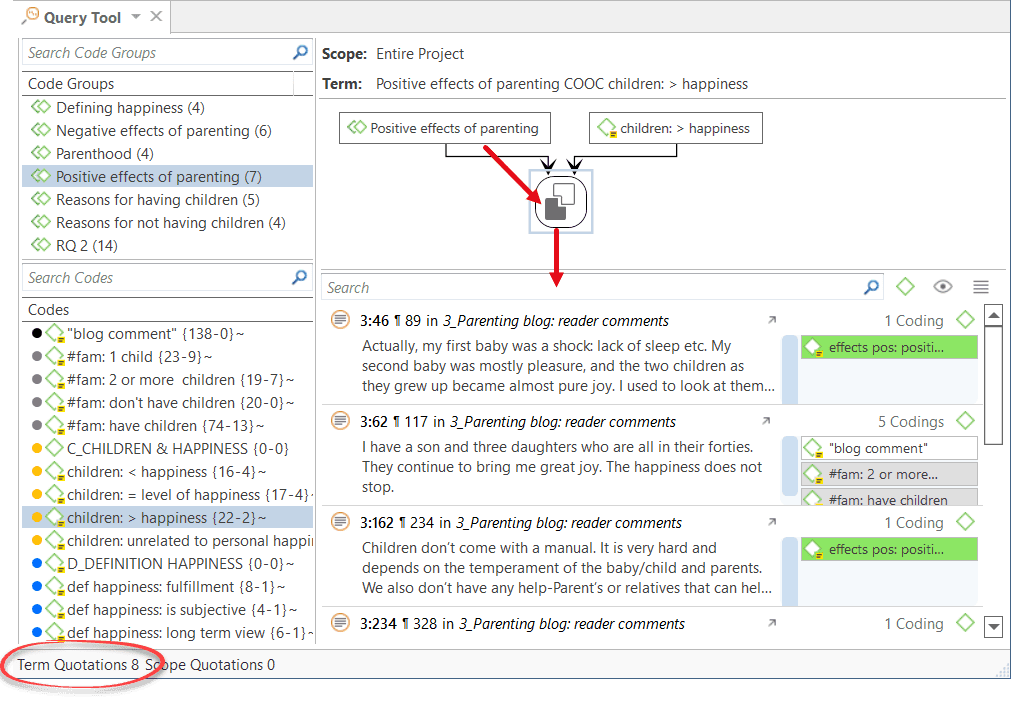
The status bar at the bottom of the screen shows the total number of quotations this query results in.
You can read the query as follows:
Remember that the position of the code or code group in a query with proximity operators matters. The quotations displayed in the result pane are those quotations linked to the code (or argument) on the left-hand side of the query. Note that the Co-occurs icon shows a black and white field. The black field represents the quotations that are shown (see image).
If you got the arguments the wrong way around, you can swap them by clicking on the Swap button in the ribbon.
To see how the attitude "children > happiness" relate to "Negative effects of parenting", select the code group "Positive effects of parenting" and Delete it from the query.
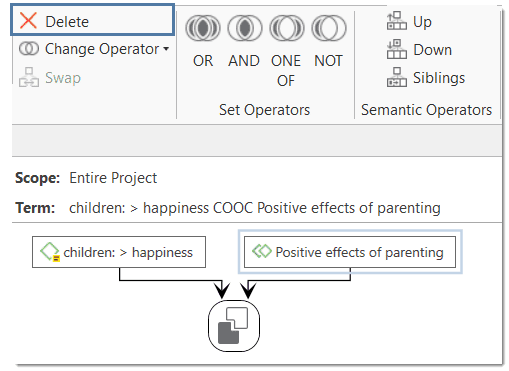
Replace it with the see code group "Negative effects of parenting". The result will be 0 quotations.
Next, test whether there is a relation between the attitude "children < happiness" and a negative perception of parenting by replacing the code on the left-hand side:
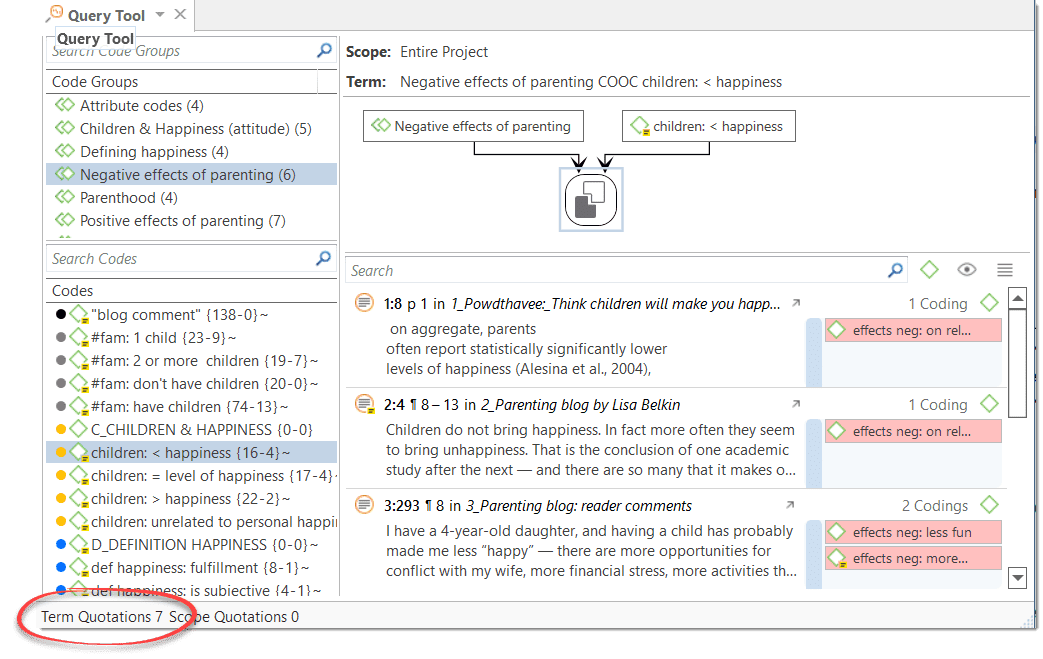
Example 2
In the following example, two proximity operators are used in one query.
Question Do respondents who mentioned positive effects of parenting also mention negative aspects?
As mentioned positive and negative effects do not necessary co-occur directly, the task is to find both aspects in the larger context of the entire comment written by each person. This larger context has been coded with the code "blog comment".
Select the operator Encloses in the ribbon. Enter the code "Blog comment" on the left-hand side, and the code group "Positive effects of parenting" on the right-hand side.
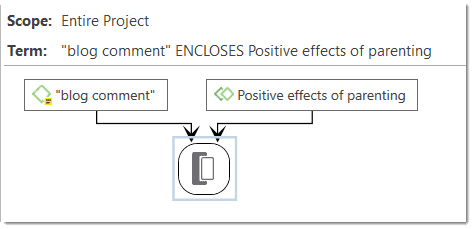
Next, select the operator Co-occurs from the ribbon. The first query now becomes one of the arguments for the second part of the query. Add the code group "Negative effects of parenting" to the empty node.
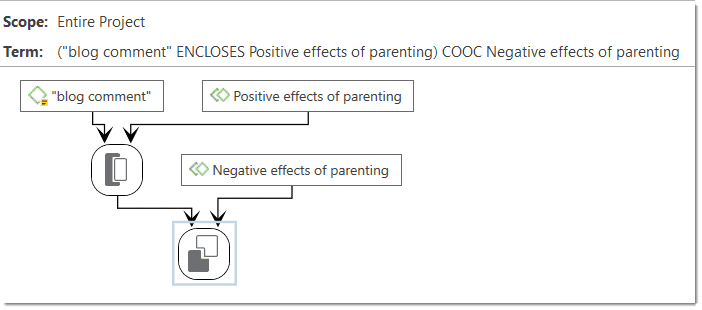
The result shows 11 quotations (if you check the status bar on your screen). As the code "blog comments" has been entered on the left-hand side, each results reflects one comment. So we know that 11 respondents have been writing about both positive and negative effects of parenting.
You can rotate the layout of a query by clicking on the Rotate layout button in the ribbon.
Inspecting the Results of a Query
If you click on an operator node, the quotations resulting from the query will be displayed in the result pane. If you click on any other node in the query, the respective results of the selected node will be shown.
The results of a query are shown in the Quotation Reader. The full functionality of the quotation reader is also available here.
Options of the Result Pane
If you click on the Eye icon, you can change the view mode. Available options are:
- single line
- small preview
- large preview
- show quotation comments
- show margin
When you click on the Burger icon you can export the results of the query to Excel.

Removing a Query or an Argument
To delete a query, click on the operator node and select Delete in the ribbon, or the Delete key on your keyboard.
If you only want to delete an argument (i.e. a code or code group) from the query, click on the respective node and then on the Delete button in the ribbon, or the Delete key on your keyboard.

How to Build a Query using a Mix of Operators
The examples shown are based on the Children & Happiness sample projects part 1. You can download and import it, if you want to follow along.
The instructions below are not as detailed, as it is assumed that you have read the examples for Boolean Queries and Proximity Queries.
Example 1
Question: Find all blog comments written by people who have one child AND who expressed the ambivalence of parenthood that contain a statement that having children made them happier.
The AND query needs to be embedded within the co-occurrence query:
Select the operator AND in the ribbon.
Add code or code groups to the empty nodes via double-click or drag and drop (here: "#fam: 1 child" and "parenthood: ambivalence").
Select the operator Co-occurs and enter a code/code group to the empty node (here: "children: > happiness"). Since the first AND query makes up the argument for the left-hand side of the query, the final query finds all quotations that are co-occurring with the quotations of the first argument.
Remember that the position of the code or code group in a query with proximity operators matters. The quotations displayed in the result pane are those quotations linked to the code (or argument) on the left-hand side of the query.
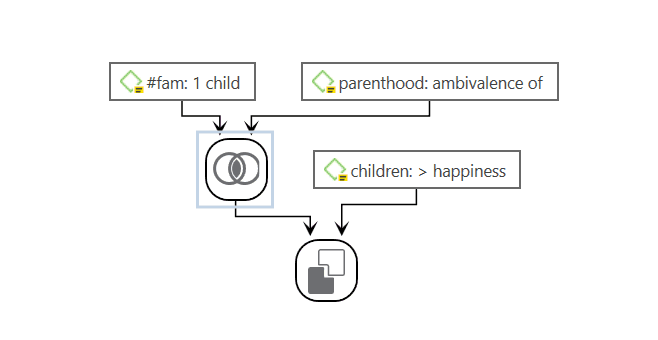
You can read the query as follows: Find all blog comments written by people who have one child AND who expressed the ambivalence of parenthood that contain a statement that having children made them happier.
To explore the data further, you can exchange the single nodes of the query, for example to see whether there are also comments that match the same criteria for people with two children; or to find comments where people with 1 / 2 or more children write that having children made them less happy.
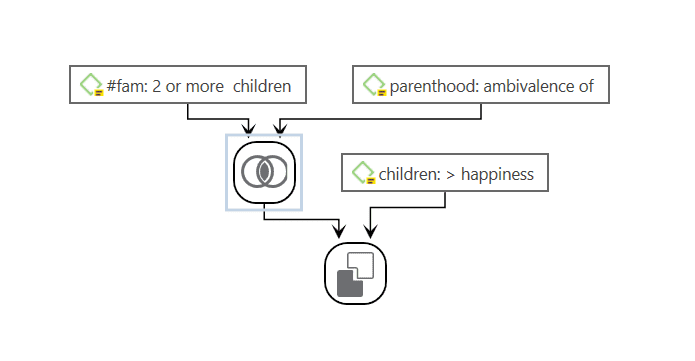
If you got the arguments the wrong way around, you can swap them by clicking on the Swap button in the ribbon.
Example 2
The aim is to find all blog comments written by people who have expressed that children make them happy, that are NOT coded with the code 'parenthood: ambivalence'
Here we have to define two conditions that both must apply:
- Blog comments that enclose statements that children mean > happiness.
- All quotations that have not been coded with 'parenthood: ambivalence' As both conditions must be true, we need to use the AND operator to combine them:
Select the operator NOT in the ribbon.
Add code or code groups to the empty node via double-click or drag and drop (here: "parenthood: ambivalence")
Select the operator AND and instead of adding a code or code group to the empty node, extend the query by selecting the operator Encloses.
Add a code/code group to the empty nodes (here: "blog:comment" and "children: > happiness"). Here it matters again which code/code group is entered on the right or left-hand side of this sub query.
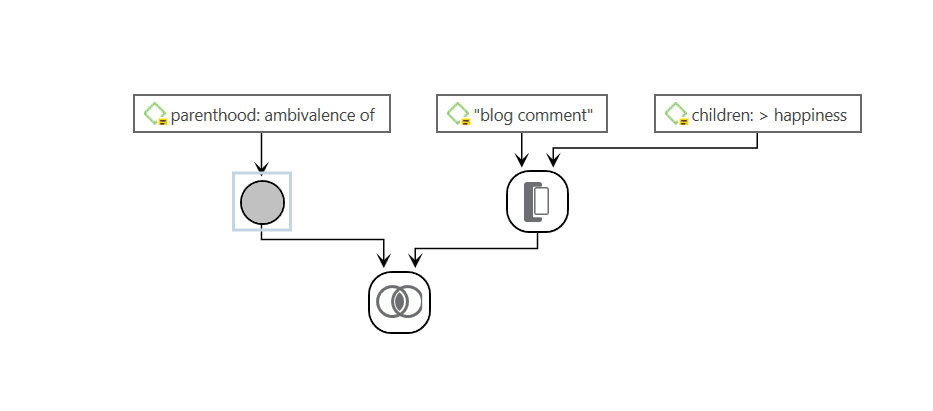
You can read the query as follows: Find all blog comments written by people who have expressed that children make them happy, that are NOT coded with the code 'parenthood: ambivalence'
To explore the data further, you can exchange for instance the code 'children: > happiness' with 'children: < happiness'.
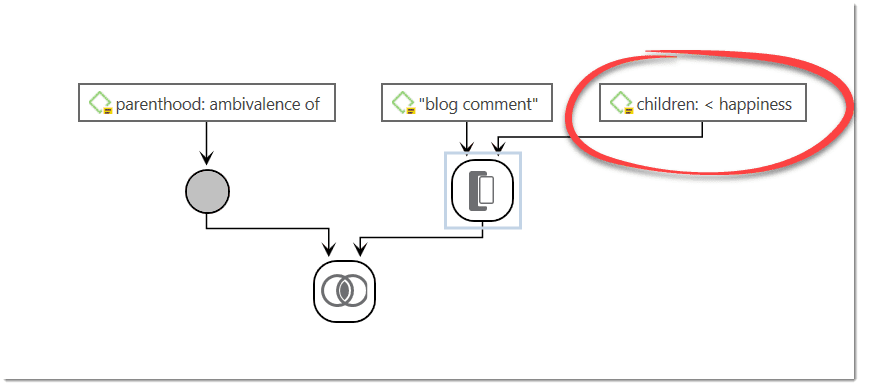
Restrict a Query to Sub Groups in your Data
Video Tutorial: Query Tool with Scope
Opening the Scope Tool
If you want to restrict a search to a particular document or document group, e.g. because you are interested in comparing male and female respondents, you need to open the scope tool.
Click on Edit Scope in the ribbon of the query tool.
After selecting the Edit Scope option, an additional region opens on the left-hand side. The ribbon also changes.
You can select a document or document group to restrict a search, or you can build a query using Boolean operators if you need a combination of documents or document groups, e.g. all female respondents who have children. Creating a query consisting of documents or document groups works in the same way as creating a code query. See Example Boolean Query.
Select a single document/document group or build a Boolean query. The result pane in the Scope area shows all quotations of the documents you have set as scope. The filtered results are shown on the left-hand side below the code query.
Changing the Scope
To change the scope, click on the Delete button in the scope tool.
Closing the Scope Tool
To close the scope tool, click again on Edit Scope in the ribbon.
To see the results of a restricted search, always look at the list of quotations below the code query on the left-hand side of the Query Tool window.
Storing the Results of a Query
You can store the results of a query as a smart code for further re-use. You can learn more about smart codes here
After you have created a query, click on the Save Smart Code button in the Query Tool tab.
inst
Enter a name for the smart code and click Create.
warn
A smart code always contains the quotations of the entire project. If you set a scope to restrict the query to certain document or document groups, this is not saved in the smart code!
You can now review all quotations of this query, e.g. in the Code or Quotation Manager, at any time. If you make some changes in your coding, the smart code will always give you the up-to-date results.
Smart codes can be recognized by the gray dot at the bottom left-hand side of the code icon. See Working With Smart Codes for further information.
If a query result delivers the quotations that are necessary to answer a research question, a smart code can be a convenient way to store this result. This can be reflected in the name of the smart code, e.g. Research question 3: Positive & negative views on parenting.
Creating Document Groups from Results
When you add documents to a project, it is easy to create document groups based on sample characteristics like gender, age, profession, location, etc.
At times, you first need to code the data to find relevant information like years of working experience, special skills, attitudes about something, relationship to other people, etc. For this you need an option to create document groups based on query results.
Create a query. See for instance Example Boolean Query. Make sure your mouse pointer selects the query and not a quotation n the result list. Click on the New Document Group button in the ribbon and enter a name for the new group.
ATLAS.ti creates a new group from all documents that yield quotation results based on the query.
The query might be as simple as just selected one code.
For instance, if you have coded for work experience:
- work experience: 0 - 5 years
- work experience: 6 - 10 years
- work experience: 10 - 15 years
- work experience: > 15 years
You would simply add the code 'work experience: 0 - 5 years' and click on the Create Document Group button to create a document group of all respondents who have a work experience of 0 - 5 years. Then you add the code 'work experience: 6 - 10 years' and create a document group, and so on.
Query Tool Reports
Excel Report
To export the list of quotations that result from a query to Excel, click on the 'burger menu' (next to the eye) on the top right-hand side of the quotation list.

Text Report
To create a text report, click on the Report button in the ribbon. The drop-down menu offers the following options:
-
Report: This is a report that you can customize. It is explained in more detail in the section Creating Reports.
-
List: This report only includes the quotation ID, name, reference and document name. This is a useful report option if you work with audio and video data that have no textual content. It is also useful if you worked intensively with the quotation level and added your own quotation names and comments. See Quotation Level.
-
List With Comments: Same as 'list' plus quotation comments.
-
Full Content: Includes the full content of text and image quotations, plus the full quotation reference, any codes, memos and hyperlinks that apply.
-
Content plus Comments: Same as 'full content' plus quotation comments.
Code-Document Table
You can use the Code-Document Table for within and across documents or group comparisons by relating codes or code groups and documents or document groups to each other.
The table cells contain:
-
frequency count of the number of codings. This can be different from the number of quotations, if a quotation is coded by multiple codes. Counted is each link between a code and a quotation.
-
word count of the quotations coded by the selected code or code group.
Running an Analysis in the Code-Document Table
In the Home ribbon, select the Analyze tab and from there the Code Document Table.
Select codes or code groups for the table rows. The selected codes / code groups are added to the table.
Select documents or document groups for the table columns. The selected documents / document groups are added to the table.
How to make selections: To select an item, you need to click the check-box in front of it. It is also possible to select multiple items via the standard selection techniques using the Ctrl/Cmd or Shift-key. After highlighting multiple items, push the space bar to activate the checkboxes of all selected items, or right click and chose Check Selected.
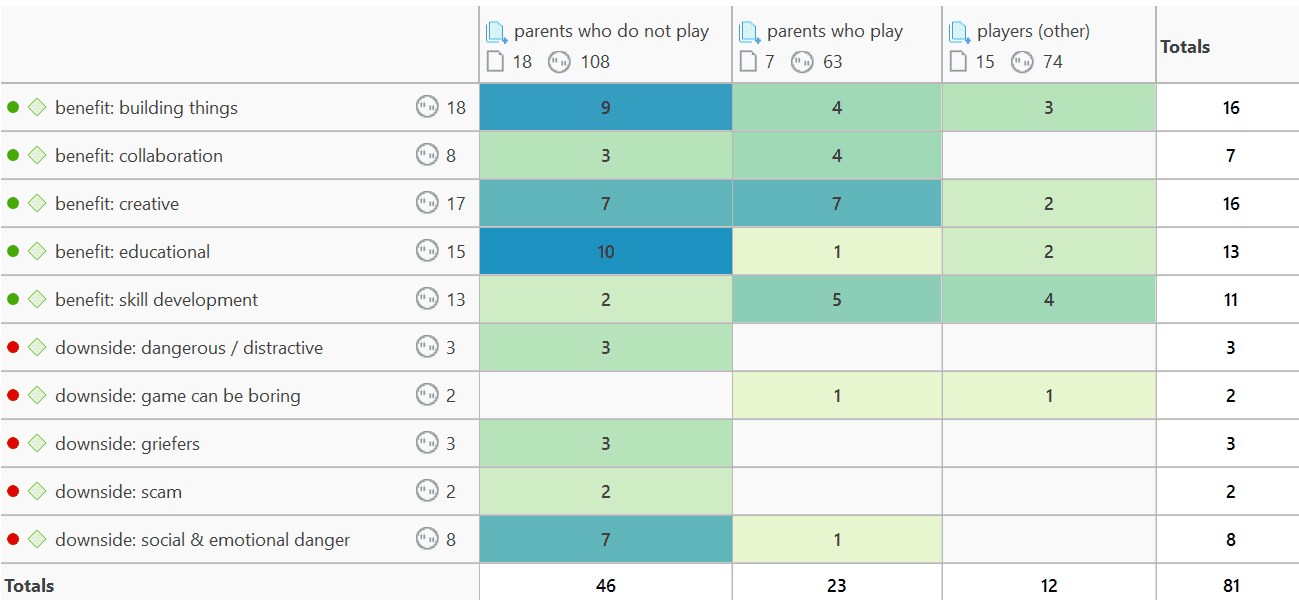
How to read the table
By default, the codes / code groups are displayed in the left column, and the documents / document groups in the top row.
Left column
-
Next to each code, the number indicates how often the code is applied in the entire project.
-
Next to a code group, you see two numbers: The first one tells you how many codes are in the group, the second numbers gives you the number of codings. This is different from the number of quotations, as multiple codes from the same code group could be linked to the same quotation.
Top row
-
Below a document, you see the total number of quotations in each document.
-
Below a document group, you see two numbers: the first one tells you how many documents are in the document group, and the second number gives you the number of quotations for all documents in the group.
The additional information you get for each selected row or column item allows you to better evaluate the numbers inside the table cells. If the value in the table cell is 10, but the code overall was applied 100 times, this leads to a different interpretation as if the code was only applied 12 times in the entire project.
Table cells
-
The results in the table cells show how often each selected code was (or the codes of a code group were) applied in each document or document group. Counted are the number of codings, unless you select to count words (see options).
-
If you click on a cell in the table, the quotation content is shown in the Quotation Reader on the left-hand side.
-
Below the table a Sankey Diagram is shown. You can see both at the same time, or view either the table or the Sankey Diagram. See below.
Code-Document Table Ribbon

Colors: You can choose among three colors for the table cells (blue, red and green), a color map, and no coloring. If you select a color or the color map, the table cells are colored in different shades.
Row Totals: Display the row total table (default).
Column Totals: Display the column total in the table (default).
Normalize: If documents are of unequal length, or document groups of unequal size, the absolute frequencies might be misleading as a measure of comparison. Indicative are the total number of quotations in a document or document group (see first row).
If you normalize the data the number of codings are adjusted. As benchmark, the document / document group column or row with the highest total is used. For example, if you compare two documents, and the total number of codings for the first document is 100 and for the second document it is 50, then all codings of the second document are multiplied by 100/50 = 2. See Code Document Table: Normalizing Data.
Binarize: This option reduces all cell values to 0 and 1. It shows whether a code, or codes of a code group, occur or do not occur in a document, or a document group. If they occur a black dot is shown; if not, the cell is empty. This makes it easier to identify patterns in the data.
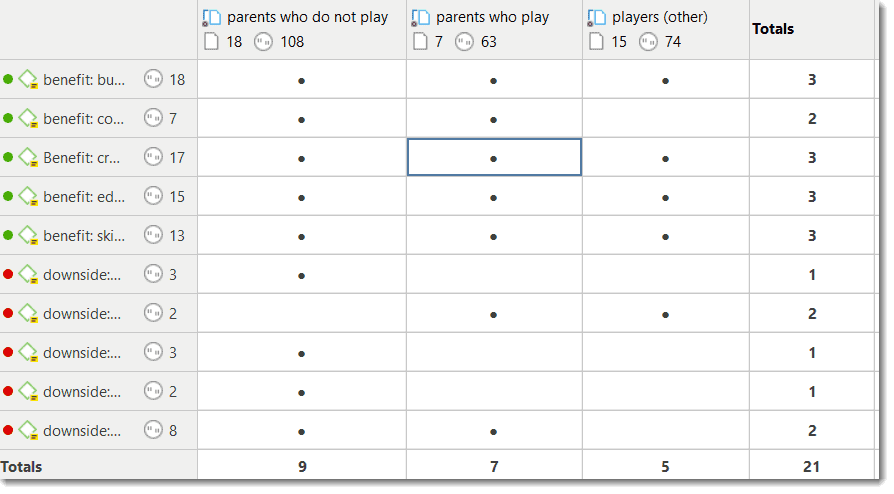
When you export the table to Excel, the dots are turned into 1s and the empty cells into 0s. This allows, for example, a discriminant analysis to be carried out in a statistical program.
Absolute Frequencies: The table cells show the number of codings. This is the number of times a code is linked to a quotation. For single codes the number of codings is the same as the number of quotations, but for code groups it can differ if codes that are in the same code group have been applied to the same quotation.
- Column Rel.-Frequencies: The table cells show relative frequencies based on the column cells. The total of each column will add up to 100%.
- Row Rel.-Frequencies: The table cells show relative frequencies based on the row cells. The total of each row will add up to 100%.
- Table Rel.-Frequencies: Display relative frequencies based on all codes used in the table. The totals of all row and column codes will add up to 100%.
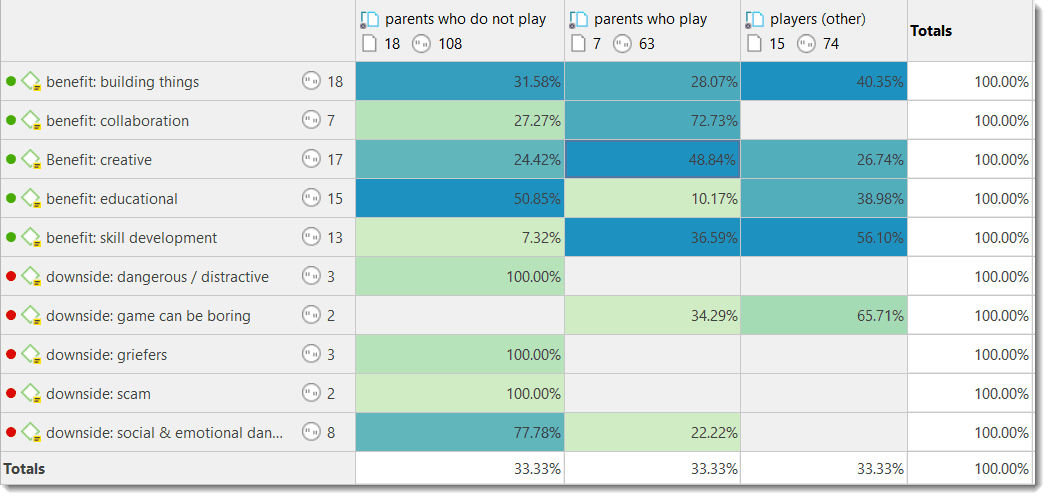
Count Codings: Count the number of times a code has been applied to a quotation. Please note, the number of codings can be higher than the number of quotations if code groups are used as you can apply multiple codes to one quotation.
Count Words: Count the words of the quotations coded by the selected code, or the codes of the selected code group.
Compress: This is a quick way to remove all rows or columns that only show empty cells. This is the same as manually deactivating codes or documents that yield no results. Thus, you cannot "uncompress" a table.
Codes as Rows: Display all selected codes / code groups in the rows of the table.
Codes as Columns: Display all selected codes / code groups in the columns of the table.
Details: You can deactivate the quotation count that is shown after each code/code group, or below each document / document group.
Export: You can export the table to Excel.
Sankey: Visualize the table as Sankey Diagram. See more in the chapter on Visualizing the Code-Document Table.
Bar Chart: Visualize the table as bar chart. See more in the chapter on Visualizing the Code-Document Table.
Show Lists: If you only want to see the table and/or the graphs and not the selection lists, deactivate this option.
Show Table: If you only want to see the bar chart or the Sankey Diagram without the table, deactivate this option.
Show Diagram: If you only want to see the table, deactivate this option.
Refresh: If you make modifications to your codings while the table is open, you can click the Refresh option to update the results.
View Tab
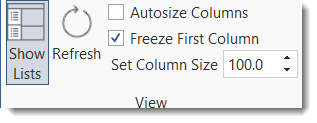
Show Lists: If you only want to see the table and not the selection lists, deactivate this option.
Refresh: If you make modifications to your codings while the table is open, you can click the Refresh option to update the results.
Auto size Columns: Adjust the size of the columns automatically so that the full label is shown.
Freeze first Column: Set if you do not want the auto size option to affect the first column.
Set Column Size: You can manually set the column size. 100 means that the column is as wide as the full label.
Code-Document Table: Relative Frequencies
Relative frequencies are useful for comparing code distributions across or within documents or document groups, as percentages are easier to comprehend.
If documents are of unequal length, or if document groups have an unequal number of members, it is recommended to normalize the counts as absolute counts may distort the results. See Data Normalization.
Across Group Comparison: Row Relative Frequencies
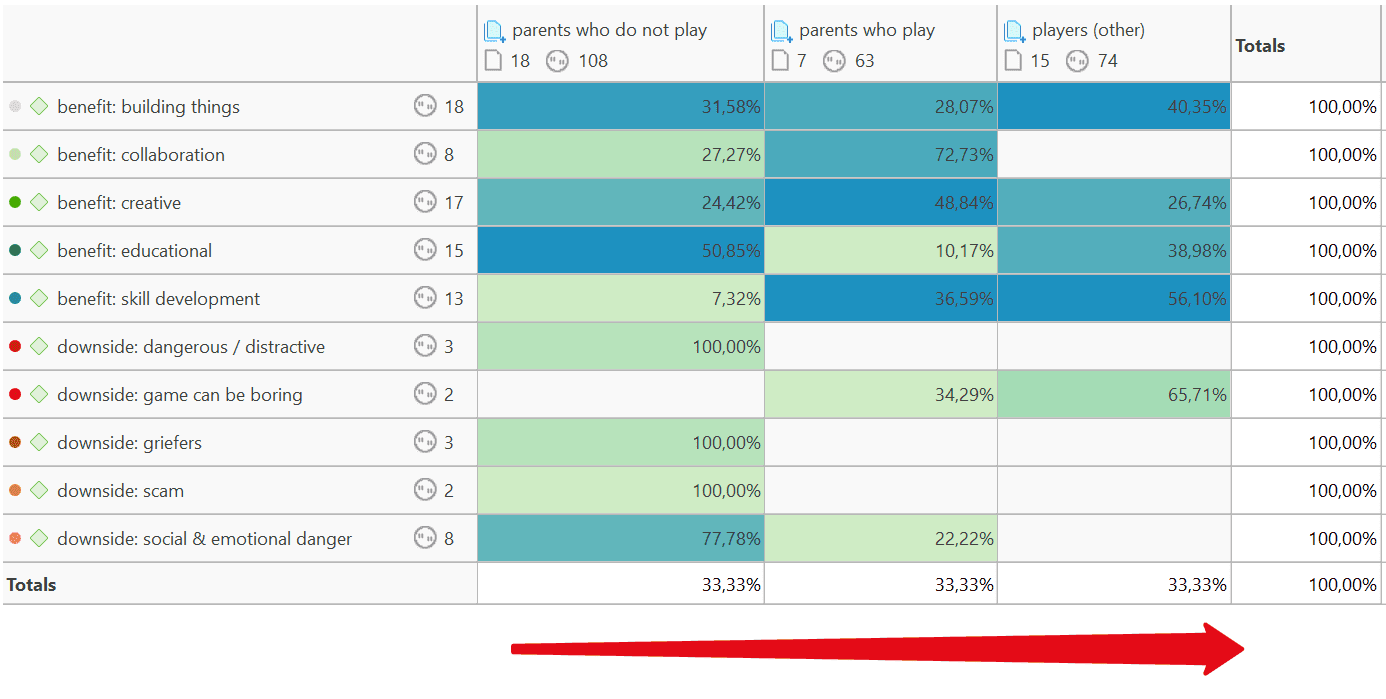 Code-Document Table showing an example of an across-group-comparison
Code-Document Table showing an example of an across-group-comparison
The table shows data from a survey with open-ended questions where people evaluate the computer game Minecraft. You can download the project here.
You must read this table from left to right along the rows. It shows the distribution of the selected codes across the following three document groups:
- parents who do not play Minecraft themselves
- parents who play
- player, who are not also parents
A quick glance of the heat map indicates that people who play (parents or others) mention more benefits than parents who do not play. The latter group appears more concerned with the downsides of playing a computer game, especially with the social and emotional dangers. Players mention very few downsides.
Whether you need to select row or column relative frequencies depends on which way around the table is displayed. If documents/document groups are listed as rows and the codes as columns, you use row relative frequencies for a within group comparison.
Within Group Comparisons: Column Relative Frequencies
The following example is from the sample project: Children & Happiness. Compared are in what kind of relations the readers wrote about positive and negative experience of parenthood.
 As can be seen from the table, the readers from the parenting block write relatively speaking more about positive aspects of parenting as compared to the readers of the NYTM article.
As can be seen from the table, the readers from the parenting block write relatively speaking more about positive aspects of parenting as compared to the readers of the NYTM article.
Total Relative Frequencies
If you select total relative frequencies, the calculation is based on the total number of codings of all selected codes in the table. Below it is compared who has provided more or fewer reasons for having or not having children:
 Example application of total relative frequencies
Example application of total relative frequencies
Readers of the parenting blog have given 38 / 94 = 40,43% of the reasons for having children and 9/94 = 9.57% of the reasons for not having children
Readers of the NYTM article have contributed 24,7/94=26,32% of the reasons for having children and 22,26/94=23,68% of the reasons for not having children (the data have been normalized).
Thus, comparatively, the readers of the NYTM articles have given quite a few more reasons for not having children, which fits the results reported above that they also wrote more about negative effects of parenting.
You can display all values: absolute frequencies and all relative frequencies in one table by selecting all options. It depends on the purpose for which you want to use the table. For interpreting the data, it is probably easier if you look at each of the relative frequency counts separately. For a comprehensive report for an appendix, you may want to export the table with all options included.
Code-Document Table: Normalization
If documents are of unequal length, or document groups of unequal size, the absolute frequencies might be misleading as a measure of comparison. If you conduct interviews, and some interviews are only half an hour long and others 2 hours, the chance someone talks about certain issues and how often during the interview is higher in the long interviews. Thus, if you were to compare absolute numbers, the results might just reflect the different durations of the interviews. The same applies if you analyse reports. If one report is 25 pages long and another 100 and the full reports are coded, absolute frequencies are not a valid measure for comparison. The total number of quotations in a document, or a group of documents (see first row) can help you to decide whether normalization of the data is appropriate.
If you normalize the data the number of codings are adjusted. As benchmark, the document / document group column or row with the highest total is used. The images below show an example.
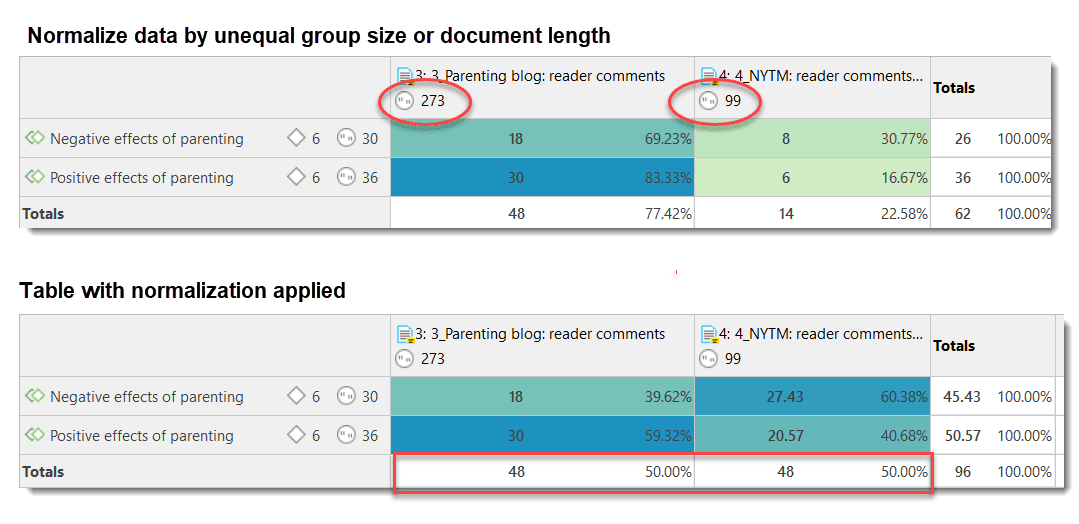 The number of quotations in each document is very different, 273 vs. 99. In fact document 3 is also three times as long as document 4. Therefore, it is not surprising that it contains more quotations. Interpreting the numerical results based on absolute numbers would be misleading. When normalizing the data, the quotation count for the selected code for the document with the lower number of quotations is adjusted; here by the factor 48/14 = 3,428 (rounded at the third digit).
The number of quotations in each document is very different, 273 vs. 99. In fact document 3 is also three times as long as document 4. Therefore, it is not surprising that it contains more quotations. Interpreting the numerical results based on absolute numbers would be misleading. When normalizing the data, the quotation count for the selected code for the document with the lower number of quotations is adjusted; here by the factor 48/14 = 3,428 (rounded at the third digit).
As you can see from the table with the normalized data, this changes the results and also the interpretation. As you don't have to rely on the numbers when working with ATLAS.ti, you can click on each cell and read the data behind it, before you then write up the results in a memo.
As normalization often results in uneven numbers, it is useful to work with relative rather than absolute frequencies. See Relative Frequencies.
Binarize the Results of a Code-Document Table
At times, you might only be interested to see whether a code occurs in a document or not.
To activate this option, click Binarize in the ribbon of the Code Document Table.
The table will show black dots if a code or codes from a code group have been applied to a document or document group. If it has not been applied, the cell is empty.
The row and column totals count the number of yes / no occurrences. Such a table can for instance be used for discriminant analysis in a statistical program.
If you export the table to Excel, the Excel table shows 1s and 0s. This allows, for example, a discriminant analysis to be carried out in a statistical program.
 Table exported to Excel:
Table exported to Excel:
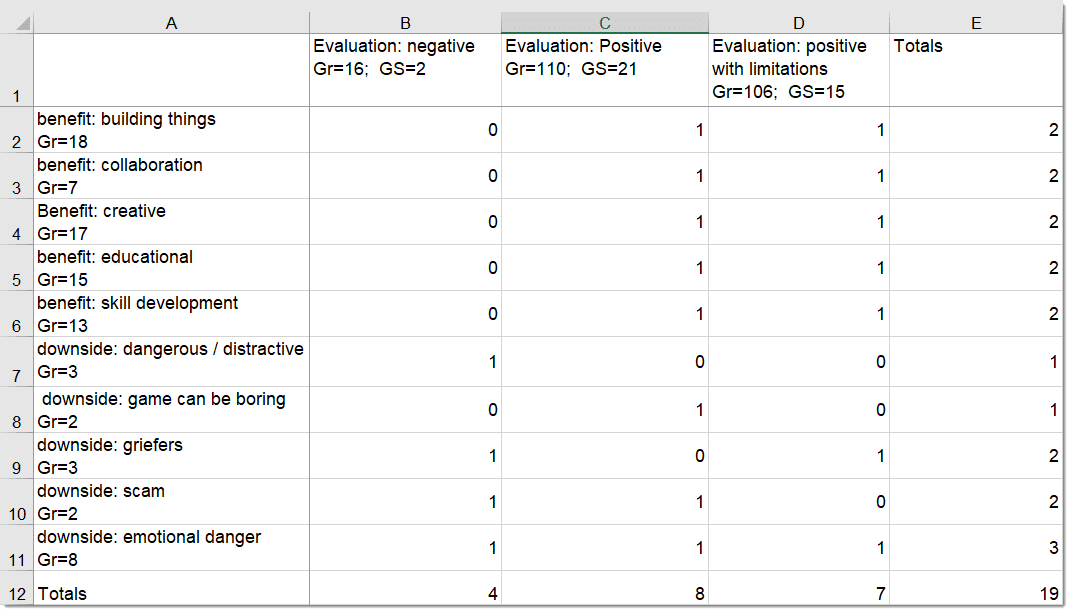
Visualizing the Code-Document Table
Sankey Diagram
Video tutorial: Sankey Diagrams in ATLAS.ti Windows
Data Visualization is a great way to simplify the complexity of understanding relationships among data. The Sankey Diagram is one such powerful technique to visualize the association of data elements. Originally, Sankey diagrams were named after Irish Captain Matthew Henry Phineas Riall Sankey, who used this type of diagram in 1898 in a classic figure showing the energy efficiency of a steam engine. Today, Sankey diagrams are used for presenting data flows and data connections across various disciplines.
-
Sankey diagrams allow you to show complex processes visually, with a focus on a single aspect or resource that you want to highlight.
-
They offer the added benefit of supporting multiple viewing levels. Viewers can get a high level view, see specific details, or generate interactive views.
-
Sankey diagrams make dominant factors stand out, and they help you to see the relative magnitudes and/or areas with the largest contributions.
In ATLAS.ti, the Sankey diagram complements the Code Co-occurrence Table. As soon as you create a table, a Sankey diagram visualizing the data will be shown below the table.
Further Reading
As soon as you create a table, a bar chart will be shown in the area below the table. To see a Sankey Diagram instead, click the Sankey button in the Diagram section of the ribbon.
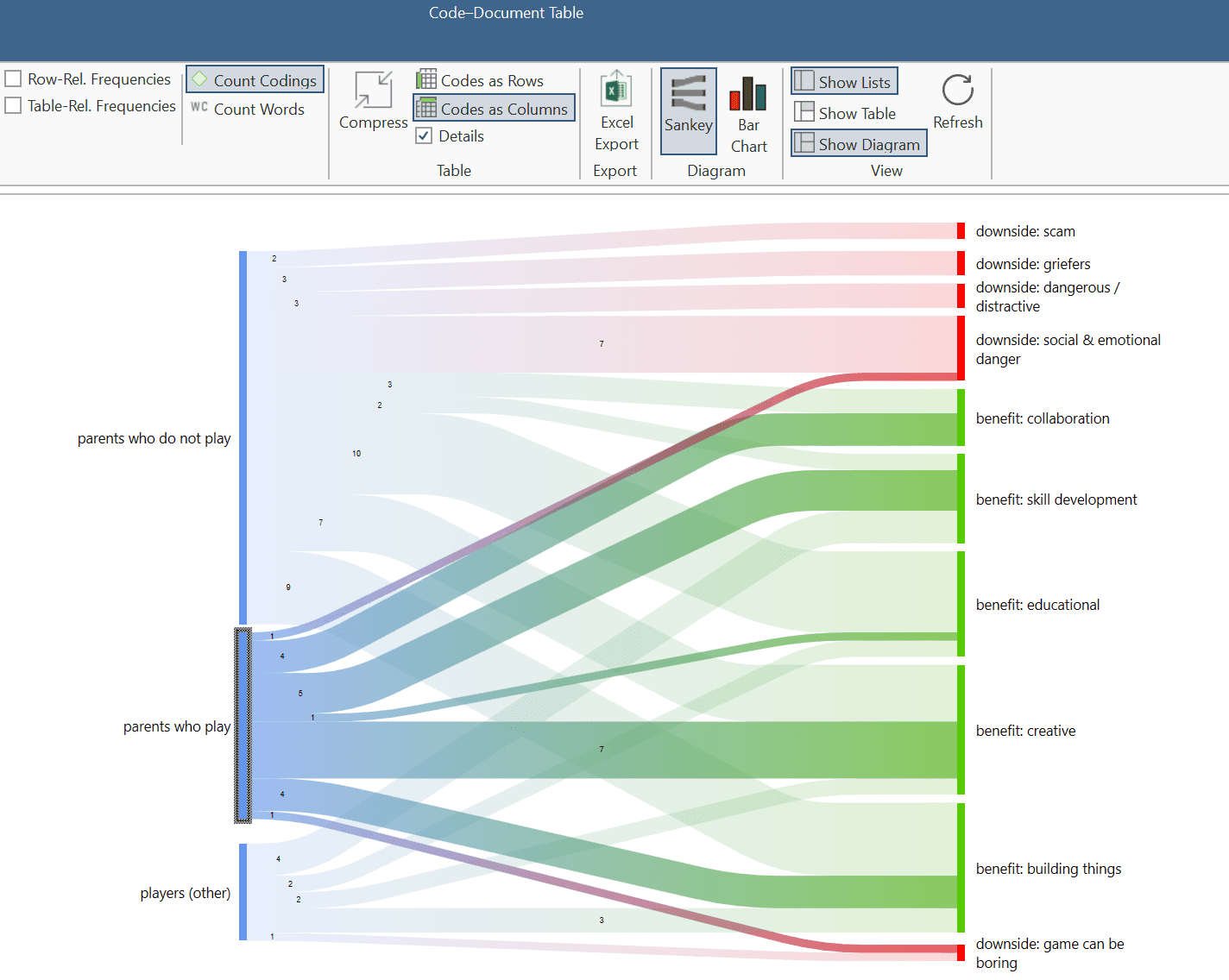
If you need more space on your screen for the diagram, you can deactivate the lists and/or the table in the ribbon. The row and column entities of the table are represented in the Sankey model as nodes and edges, showing the strength of co-occurrence between the pairs of nodes. In the Code-Document Table, the connecting pairs can consist of:
- codes - documents
- codes - document groups
- code groups - documents
- code groups - document groups
Edge: For each table cell containing a value, an edge is displayed between the diagram nodes. The thickness of the edges resemble the cell values of the table. Cells with value 0 are not displayed in the Sankey view.
The key to reading and interpreting Sankey Diagrams is to remember that the width is proportional to the quantity represented.
Layout
The Sankey diagram, similar to the network editor, applies a layout for its nodes and consequently to the edges connecting nodes to create an easy to comprehend visualization of the data. This basic layout places the selected entities (nodes in Sankey terminology) into vertical „layers“ with the row entities placed to the left and the column entities to the right. If nodes have incoming as well as outgoing links in the currently visible set of nodes, they will be placed in intermediate lanes or layers.
In many situations, the initial layout already meets the researchers requirements. However, there are some options to modify the initial layout.
Swapping columns and rows for the table will also affect the Sankey diagram and result in a 180° rotation.
Interactivity
-
To display the quotations that are responsible for the co-occurrence of two entities, click on the connecting edge. This has the same effect as clicking a table cell. You see the quotations displayed in the Quotation Reader to the right.
-
If you hover an edge with your mouse, the numbers that you also see in the table cells are shown. Be default, these are the number of codings in the selected document or document group.
-
To support finding the correct link, moving the mouse highlights the hovered edges. After selecting an edge, the unselected edges are dimmed to further increase the visibility of the edge under consideration.
-
Selecting a node will highlight this node as well as all its incoming and outgoing edges. This makes it easy to spot areas of connectivity.
-
You can also use the nodes label for selection. This allows you to do a „single-handed“ multi-selection which otherwise would require pressing the Ctrl-key.
Removing edges
To unscramble a potentially cluttered diagram, you can remove selected nodes or edges by pressing the Delete key on your keyboard. You can undo this via Ctrl-Z.
The same may be accomplished by modifying the selection lists, but this is a bit „heavier“, and it may not be clear which entities need to be deselected.
Sankey Diagram Ribbon

Fit to Window: When the Sankey diagram is created (concurrently with the respective tools’ table) it may display a bit too tiny in its reserved window pane. There are several options to fix this: Switch off the table view and the selection lists, maximize the project window or float the tool with the diagram. The Sankey diagram itself will not resize to the freed space automatically. Click Fit-to Window to fit the current diagram to the available window area.
Refresh Layout: This will also move nodes to their original places if moved in the meantime. The edges will also be recalculated for best entanglement. This option can also be activated by double-clicking the diagrams background.
Auto Layout: This option is activated by default. It will instantly recompute the diagram’s layout if:
- Nodes are moved
- Nodes are removed
- Edges are removed
Respect Node Placement: You might not always be happy when the nodes you shifted to other locations are instantly moved back to their original locations. To prevent this, you either need to disable the Auto Layout or select Respect Node Placement.
Note, that the Respect Node Placement option will not let you place nodes to arbitrary positions but will find the nearest lane and relayout the diagram to make it nice looking again. Shortcut: Double-click the diagram background while pressing the left Shift key.
Rotate Diagram: Sometimes the horizontal left-to-right layout may not always give the most optimal visualization of your data (depending on available screen space, monitor size). Click this button to toggle between a vertical (top-down) and the original horizontal layout. Shortcut: Double-click the diagram background while pressing the left Ctrl-key.
Display Icons: This display the entities type icons preceding the labels. This makes most sense when the diagram contains multiple types of entities as in the Code Document Table. By default, this option is not activated.
Link Color Mode: The coloring of the links and edges between the nodes can be set to:
-
Use the color of the source node, either the user provided color for codes, or the type dependent color of other entities.
-
Use the color of the target node
-
Use a color gradient starting with the source and ending with the target color. This is the default. It makes tracking the endpoint of an edge quite comfortable. Shortcut: Double-click the diagram background while pressing the left Alt key.
-
None: Use a gray shade independent of any node coloring.
Short-cut: If you double-click on an edge while pressing the left Alt-key, you switch between the different color modes.
Print Diagram: Creates an output of the current diagram respecting both the selected background, and the visual selection state of both nodes and edges. The printout will not contain any quotations.
Printing can also create high quality PDFs if an appropriate printer driver is installed.
Miscellaneous
The diagram is integrated into the table tools and responds to certain options:
-
Compress, that is removing empty rows or columns, will remove corresponding elements in the diagram.
-
Clustering may reduce the number of co-occurrences and thus affects the size of edges in the diagram.
-
Swapping rows and columns reverts the original layout by 180°.
Bar Chart
To visualize the table as bar chart, click on Bar Chart in the Diagram section of the ribbon.
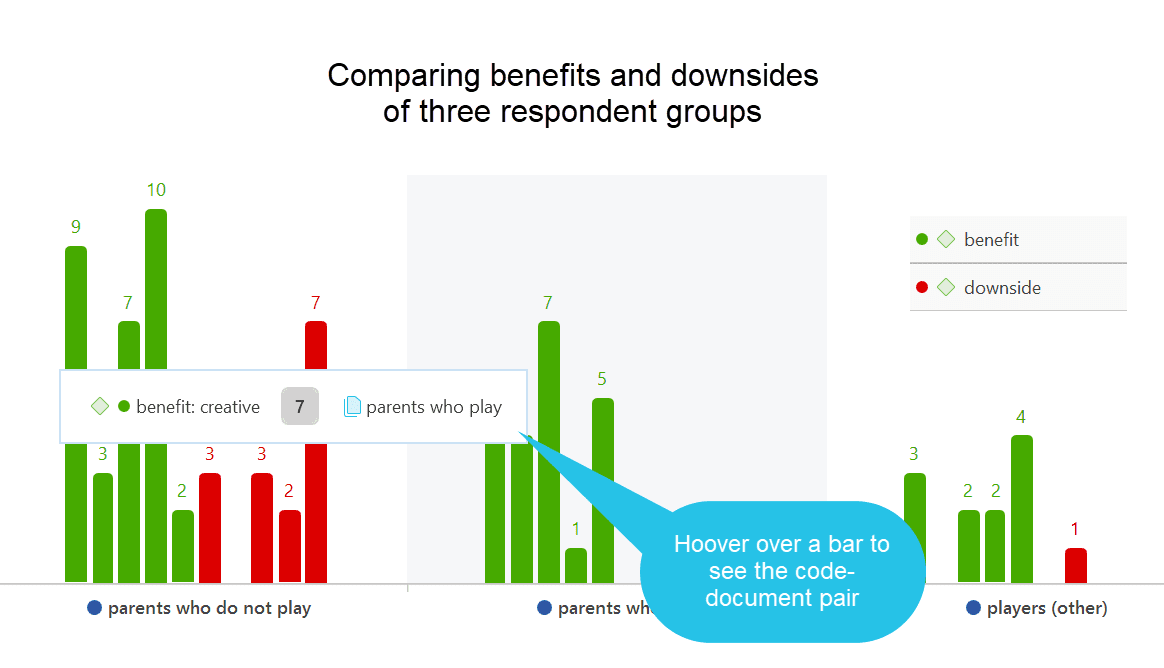
If you hoover over a bar, the code (code group) - document (document group) pair will be shown.
For the visualization as bar chart, it is often preferable to change the code colors. You may also want to switch around the rows and the columns. You find this option in the ribbon of the Code-Document Table.
.
The table below shows the same comparison as above, only this time each subcode was given a different color. The subcodes for benefits range from grey to blue; the subcodes for downside are red to orange.
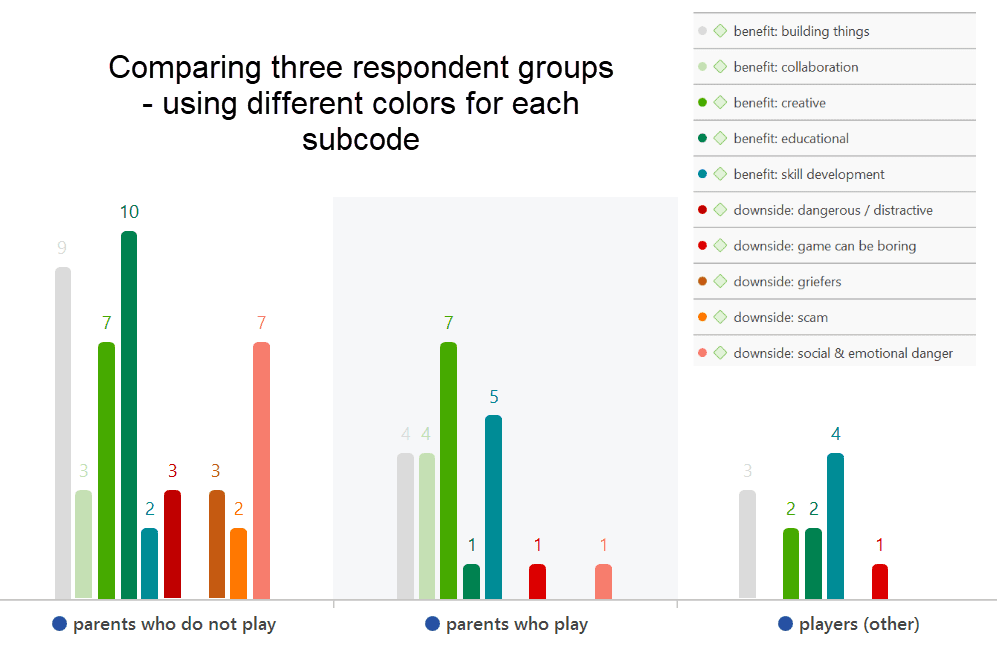
There is currently no legend. The one you see in the images are copy & pasted screenshots. Also, the code colours have to be changed manually. For a more convenient work with the graphics there will be further options in future updates.
Code Co-Occurrence Tools
The co-occurrence tools search for codes that have been applied either to the same quotation or to overlapping quotations. Using these tools you can find out which topics are mentioned together or close to each other.
The co-occur operator is a combination of the WITHIN, ENCLOSES, OVERLAPS, OVERLAPPED BY and the AND operator.
By default, the table searches for all co-occurrence, but you can also ask more specifically only for AND occurrences. An 'AND' occurrence means that two codes code exactly the same quotation.
See available operators for further information.
The results depend on how you have coded the data. If you want to examine the proximity of certain issues, then you have to code overlapping segments, or create one quotation and apply multiple codes.
If issues that you want to code occur very close to each other in the data, the recommendation is to create one quotation and apply two or more codes to it. If these issues are spread over a long paragraph or section, the recommendation is to create multiple overlapping quotations so that the precision of coding is higher.
Code Co-occurrences can be displayed in a tree view, see Code Co-Occurrence Explorer, or as a data matrix, see Code Co-Occurrence Table.
The Explorer in addition to code co-occurrences also displays documents and their codes.
The Code Co-Occurrence Explorer
Use the Code Co-occurrence Explorer to explore coded data to get a quick overview where there might be interesting overlaps. If you are looking for specific co-occurrences and for accessing the quotations of co-occurring codes, the Code Co-occurrence Table is the better choice.
To open the tool, select the Analyze tab and click Co-Oc Explorer.
The Code Co-occurrence Explorer can also be loaded from the Home tab into the navigator on the left hand side by clicking on the drop-down arrow of the Navigator button.
The Codes Branch
Open the branches by clicking on the arrow in front the root for Codes.
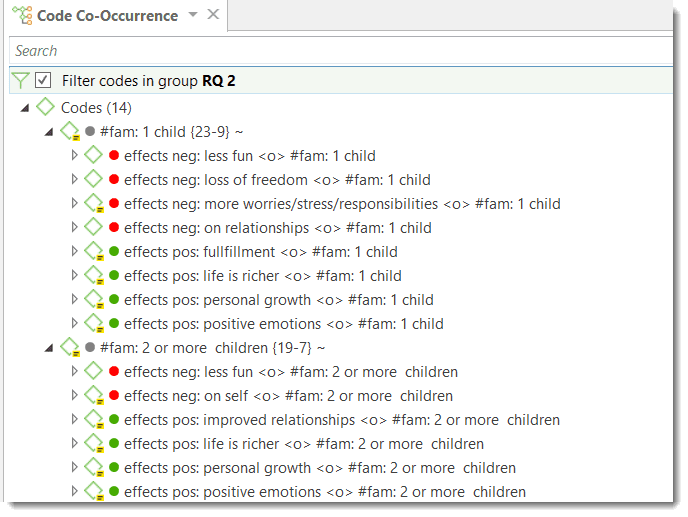
The Codes Branch
On the first level of the code branch all codes are listed. If you expand the tree further, you see all co-occurring codes. On the third level, you can access the quotations of the co-occurring codes.
If you double-click on a quotation, it is displayed in the context of the document.
The Documents Branch
When you open the 'Documents' branch, you see the documents of your project on the first level. On the next level, you see the codes that have been applied to the document. On the third level, you see the quotations coded with those codes.
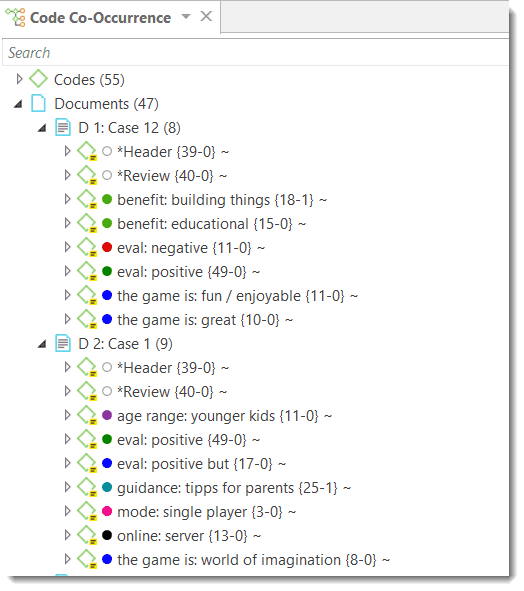
The Code Co-Occurrence Table
The Co-occurrence Table in comparison to the Code Co-occurrence Explorer shows the frequencies of co-occurrence in form of a matrix similar to a correlation matrix that you may know from statistical software.
The aim is to relate codes to each other that have been applied either to the same quotations or to overlapping quotations. You can find out which topics are mentioned together or are in proximity to each other. Thus, the results depend on how you have coded the data.
The Co-occurrence Table shows the frequencies of co-occurrence in form of a matrix similar to a correlation matrix that you may know from statistical software.
To open the tool, select the Analyze tab and from there the Co-Oc Table.
Next you need to select the codes that you want to relate to each other:
Select one or multiple codes from the first list for table columns, and from the second list for the table rows. You can switch around the rows and codes after the table has been created.
To select an item, you need to click the check-box in front of it. It is also possible to select multiple items via the standard selection techniques using the Ctrl or Shift-key. After highlighting multiple items, push the space bar to activate the checkboxes of all selected items, or right click and chose Check Selected from the context menu.
The context menu in each of the selection list also allows you to uncheck all selected codes, to select all codes, to unselect all codes, to invert the selection, or to invert the checked codes.

Below each table, you can select to see a Sankey Diagram or a Bar Chart that visualize the data in the table. See below for further information.
The table approach reduces the analysis to a pairwise comparison. If you need a higher order co-occurrence you can use the category codes instead of the subcodes.
If you want to compare code co-occurrences within subsets of your data, you can set a document group as global filter
How to Read the Table
-
First column / first row: The number below and behind each code shows how often the code is applied the entire project. This helps you to better evaluate the number of co-occurrences in the table cells.
-
The number in the cell indicates the number of hits, how often the two code co-occur. This means that the number of co-occurring „events" and not the number of quotations are counted. If a single quotation is coded by two codes or if two overlapping quotations are coded by two codes, this counts in both cases as a single co-occurrence.
-
If you click on a cell, the quotations of the corresponding row and column codes are displayed next to the table in the Quotation Reader. The quotation reader here always displays two lists of quotations: the quotations of the column code, and the quotations of the row code.
Code Co-Occurrence Table Ribbon

Colors: You can choose among three colors for the table cells (blue, red and green), the ATLAS.ti color palette (default), and no coloring. If you select a color, or the ATLAS.ti color map, the table cells are colored in different shades.
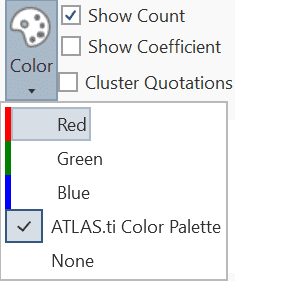
Show count: Show the number of co-occurrences (=number of hits, see above: How to read the table).
Show Coefficient: The c-coefficient gives you an indication of the strength of the relationship between the pair of codes. See C-Coefficient for more detail.
Cluster quotations: Activate this option, if you want to count embedded quotations only once. If code 'A' codes a larger segment and within this segment, there are three quotations coded with a code 'B', the number of co-occurrences is 3. With clustering activated, the count is 1.
Use AND operator: If you activate this option, the table values are calculated based on an 'AND' occurrence and not the more general code 'co-occurrence' operator. See the section on Proximity Operators for further detail.
Rows => Columns: Select to switch row and column codes.
Compress: This is a quick way to remove all rows or columns that only show empty cells. This is the same as manually deactivating codes that yield no results. Thus, you cannot "uncompress" a table.
Auto Size Columns: Adjust the size of the columns automatically so that the full label is shown.
Freeze first column: Set if you do not want the auto size option to affect the first column.
Set Column Size: You can manually set the column size. '100' means that the column is as wide as the full label.
Details: If activated, you see the total number of times the code has been applied to a quotation. This helps you to better evaluate the numbers in each cell. The interpretation is likely different if the number of hits is 10 and if each of the codes have been applied 50 or only 15 times.
Export: You can export the table to Excel.
- If Show Count is selected, only the number of co-occurrences are exported.
- If Show Coefficient is selected, only the c-coefficient and not the absolute number of hits are exported.
- If you have selected both, both are exported.
Sankey: Visualize the table as Sankey Diagram. See more in the chapter on co-occurrence visualization.
Bar Chart: Visualize the table as bar chart. See more in the chapter on co-occurrence visualization.
Show Lists: If you only want to see the table and/or the graphs and not the selection lists, deactivate this option.
Show Table: If you only want to see the bar chart or the Sankey Diagram without the table, deactivate this option.
Show Diagram: If you only want to see the table, deactivate this option.
Refresh: If you make modifications to your codings while the table is open, you can click the Refresh option to update the results.
Code Co-occurrence Coefficient
The c-coefficient indicates the strength of the relation between two codes.
This option can be activated in the ribbon of the Code Co-occurrence Table.
 The range of the c-coefficient is between 0 and 1:
The range of the c-coefficient is between 0 and 1:
- 0 mean codes do not co-occur
- 1 means these two codes co-occur wherever they are used
The calculation of the c-coefficient is based on approaches borrowed from quantitative content analysis. It is calculated as follows:
c = n12 / (n1 + n2 - n12)
n12 = number of co-occurrences for code n1 and n2
The c-coefficient is useful when working with larger amounts of cases and structured data like open-ended questions from surveys. If you use the c-index, pay attention to the additional colored hints. As your database is qualitative, the c-coefficient is not the same as for instance a Pearson correlation coefficient and therefore also no p-values are provided.
Distortion due to unequal frequencies
An inherent issue with the c-index and similar measures is that it is distorted by code frequencies that differ too much. In such cases the coefficient tends to be much smaller than the potential significance of the co-occurrence. For instance, if you had coded 100 quotations with code 'A' and 10 with code 'B', and you have 5 co-occurrences, then the c-coefficient is:
c = 5/(100 + 10 - 5) = 5/105 = 0.048
A coefficient of only 0.048 may slip your eye easily, although code B appears in 50% of all its applications with code A.
If one of the codes of one pair has been applied more than 5 times than the other code, a yellow dot appears in the top right of the table cell. So whenever a cell shows the yellow marker, it should invite you to look into the co-occurrences of this cell despite a low coefficient.
When you hover with the mouse over a cell, a pop-up note displays the ratio of the two codes.

Out of Range
The c-index assumes separate non-overlapping text entities. Only then can we expect a correct range of values.
The coefficient can exceed the 0 - 1 range it is supposed to stay with, if there is redundant coding. Let's take a look at the following example:
- A quotation 1 is coded with codes A and B
- an overlapping quotation 2 is coded with Code B.
Then quotation 1 counts for 1 co-occurrence event and the overlapping quotation 2 for another. This results in a value of twice the allowed maximum:
c = 2/(1 + 2 - 2) = 2
All cells displaying an out-of-range number (> 1) show a red dot in the top right corner.
In case the c-coefficient exceeds 1, you need to do some cleaning-up and eliminate the redundant codes. See Finding Redundant Codings .
Summary of Color Indicators
Yellow dot: Unequal quotation frequencies - the ration between the frequencies of the code and row code exceeds the threshold of 5.
Red dot: The C-index exceeds the 0 - 1 range.
Orange dot: The orange dot is simply a mixture of the red and yellow conditions.
Visualizing the Code Co-Occurrence Table
Sankey Diagram
Video Tutorial: Sankey Diagrams in ATLAS.ti Windows
Data Visualization is a great way to simplify the complexity of understanding relationships among data. The Sankey Diagram is one such powerful technique to visualize the association of data elements. Originally, Sankey diagrams were named after Irish Captain Matthew Henry Phineas Riall Sankey, who used this type of diagram in 1898 in a classic figure showing the energy efficiency of a steam engine. Today, Sankey diagrams are used for presenting data flows and data connections across various disciplines.
-
Sankey diagrams allow you to show complex processes visually, with a focus on a single aspect or resource that you want to highlight.
-
They offer the added benefit of supporting multiple viewing levels. Viewers can get a high level view, see specific details, or generate interactive views.
-
Sankey diagrams make dominant factors stand out, and they help you to see the relative magnitudes and/or areas with the largest contributions.
In ATLAS.ti, the Sankey diagram complements the Code Co-occurrence Table. As soon as you create a table, a Sankey diagram visualizing the data will be shown below the table.
Further Reading
As soon as you create a table, a bar chart will be shown in the area below the table. To see a Sankey Diagram instead, click the Sankey button in the Diagram section of the ribbon.

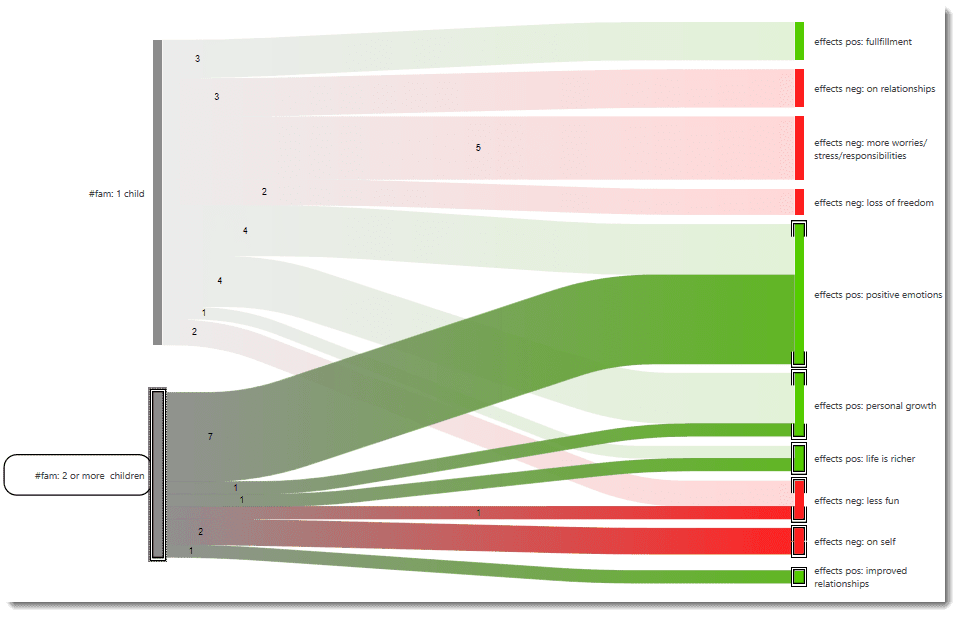
If you need more space on your screen for the diagram, you can also deactivate the lists and/or the table in the ribbon.
The row and column entities of the table are represented in the Sankey model as nodes and edges, showing the strength of co-occurrence between the pairs of nodes. In the Code Co-occurrence table, the connecting pairs are codes for both rows and columns.
Edge: For each table cell containing a value, an edge is displayed between the diagram nodes. The thickness of the edges resemble the cell values of the table. Cells with value 0 are not displayed in the Sankey view.
The key to reading and interpreting Sankey Diagrams is to remember that the width is proportional to the quantity represented.
Layout
The Sankey diagram, similar to the network editor, applies a layout for its nodes and consequently to the edges connecting nodes to create an easy to comprehend visualization of the data. This basic layout places the selected entities (nodes in Sankey terminology) into vertical „layers“ with the row entities placed to the left and the column entities to the right. If nodes have incoming as well as outgoing links in the currently visible set of nodes, they will be placed in intermediate lanes or layers.
In many situations, the initial layout already meets the researchers requirements. However, there are some options to modify the initial layout.
Swapping columns and rows for the table will also affect the Sankey diagram and result in a 180° rotation.
Interactivity
-
To display the quotations that are responsible for the co-occurrence of two entities, click on the connecting edge. This has the same effect as clicking a table cell. You see the quotations displayed in the Quotation Reader to the right.
-
If you hover over an edge, you see the number that is also displayed in the table cell, which are the number of times the pair of codes co-occur.
-
To support finding the correct link, moving the mouse highlights the hovered edges. After selecting an edge, the unselected edges are dimmed to further increase the visibility of the edge under consideration.
-
Selecting a node will highlight this node as well as all its incoming and outgoing edges. This makes it easy to spot areas of connectivity.
-
You can also use the nodes label for selection. This allows you to do a „single-handed“ multi-selection which otherwise would require pressing the Ctrl-key.
Removing edges
To unscramble a potentially cluttered diagram, you can remove selected nodes or edges by pressing the Delete key on your keyboard. You can undo this via Ctrl-Z.
The same may be accomplished by modifying the selection lists, but this is a bit „heavier“, and it may not be clear which entities need to be deselected.
Sankey Diagram Ribbon

Fit to Window: When the Sankey diagram is created (concurrently with the respective tools’ table) it may display a bit too tiny in its reserved window pane. There are several options to fix this: Switch off the table view and the selection lists, maximize the project window or float the tool with the diagram. The Sankey diagram itself will not resize to the freed space automatically. Click Fit-to Window to fit the current diagram to the available window area.
Refresh Layout: This will also move nodes to their original places if moved in the meantime. The edges will also be recalculated for best entanglement. This option can also be activated by double-clicking the diagrams background.
Auto Layout: This option is activated by default. It will instantly recompute the diagram’s layout if:
- Nodes are moved
- Nodes are removed
- Edges are removed
Respect Node Placement: You might not always be happy when the nodes you shifted to other locations are instantly moved back to their original locations. To prevent this, you either need to disable the Auto Layout or select Respect Node Placement.
Note, that the Respect Node Placement option will not let you place nodes to arbitrary positions but will find the nearest lane and relayout the diagram to make it nice looking again. Shortcut: Double-click the diagram background while pressing the left Shift key.
Rotate Diagram: Sometimes the horizontal left-to-right layout may not always give the most optimal visualization of your data (depending on available screen space, monitor size). Click this button to toggle between a vertical (top-down) and the original horizontal layout. Shortcut: Double-click the diagram background while pressing the left Ctrl-key.
Display Icons: This display the entities type icons preceding the labels. This makes most sense when the diagram contains multiple types of entities as in the Code Document Table. By default, this option is not activated.
Link Color Mode: The coloring of the links and edges between the nodes can be set to:
-
Use the color of the source node, either the user provided color for codes, or the type dependent color of the entities.
-
Use the color of the target node
-
Use a color gradient starting with the source and ending with the target color. This is the default. It makes tracking the endpoint of an edge quite comfortable. Shortcut: Double-click the diagram background while pressing the left Alt key.
-
None: Use a gray shade independent of any node coloring.
Short-cut: If you double-click on an edge while pressing the left Alt-key, you switch between the different color modes.
Print Diagram: Creates an output of the current diagram respecting both the selected background, and the visual selection state of both nodes and edges. The printout will not contain any quotations.
Printing can also create high quality PDFs if an appropriate printer driver is installed.
Miscellaneous
The diagram is integrated into the table tools and responds to certain options:
-
Compress, that is removing empty rows or columns, will remove corresponding elements in the diagram.
-
Clustering may reduce the number of co-occurrences and thus affects the size of edges in the diagram.
-
Swapping rows and columns reverts the original layout by 180°.
Bar Chart
To visualize the table as bar chart, click on Bar Chart in the Diagram section of the ribbon.
 For the visualization as bar chart, it is often preferable to change the code colors. You may also want to switch around the rows and the columns. You find this option in the ribbon of the Code Co-occurrence Table.
For the visualization as bar chart, it is often preferable to change the code colors. You may also want to switch around the rows and the columns. You find this option in the ribbon of the Code Co-occurrence Table.
To create the table below, the color of the two subcodes '1 child' and '2 or more' were changed to orange and blue. The result is of course the same - for people with two or more children the table shifts significantly to the right towards the codes coding the positive experiences. Or to put it the other way around, for those with one child, both positive and negative experiences are reported with somewhat more emphasis on the negative experiences.
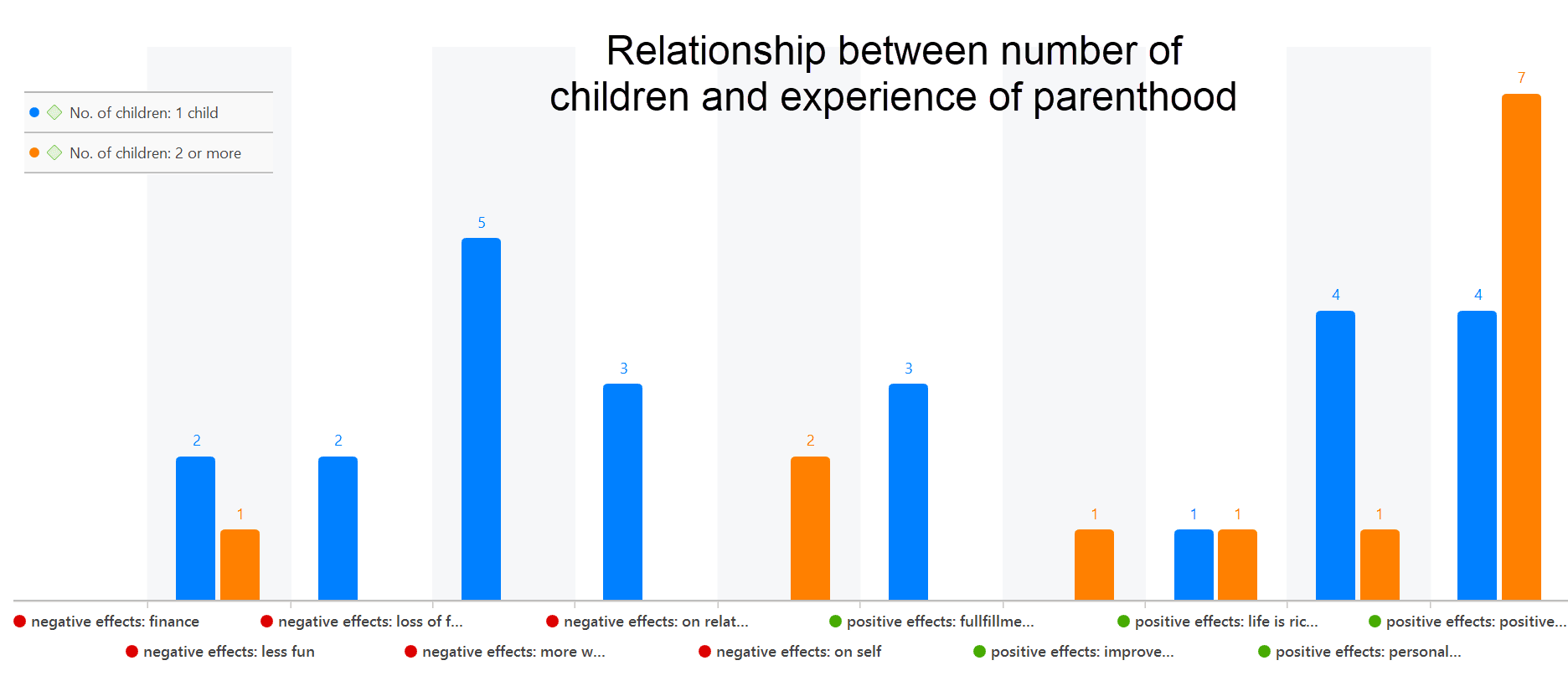 If we change the rows and the columns, so that the number of children is on the x-axis, we get a more meaningful graph if we change the code colors for the subcodes of positive and negative effects. The negative effects have colors ranging from yellow to pink, the colors for positive effect range from green to blue.
If we change the rows and the columns, so that the number of children is on the x-axis, we get a more meaningful graph if we change the code colors for the subcodes of positive and negative effects. The negative effects have colors ranging from yellow to pink, the colors for positive effect range from green to blue.
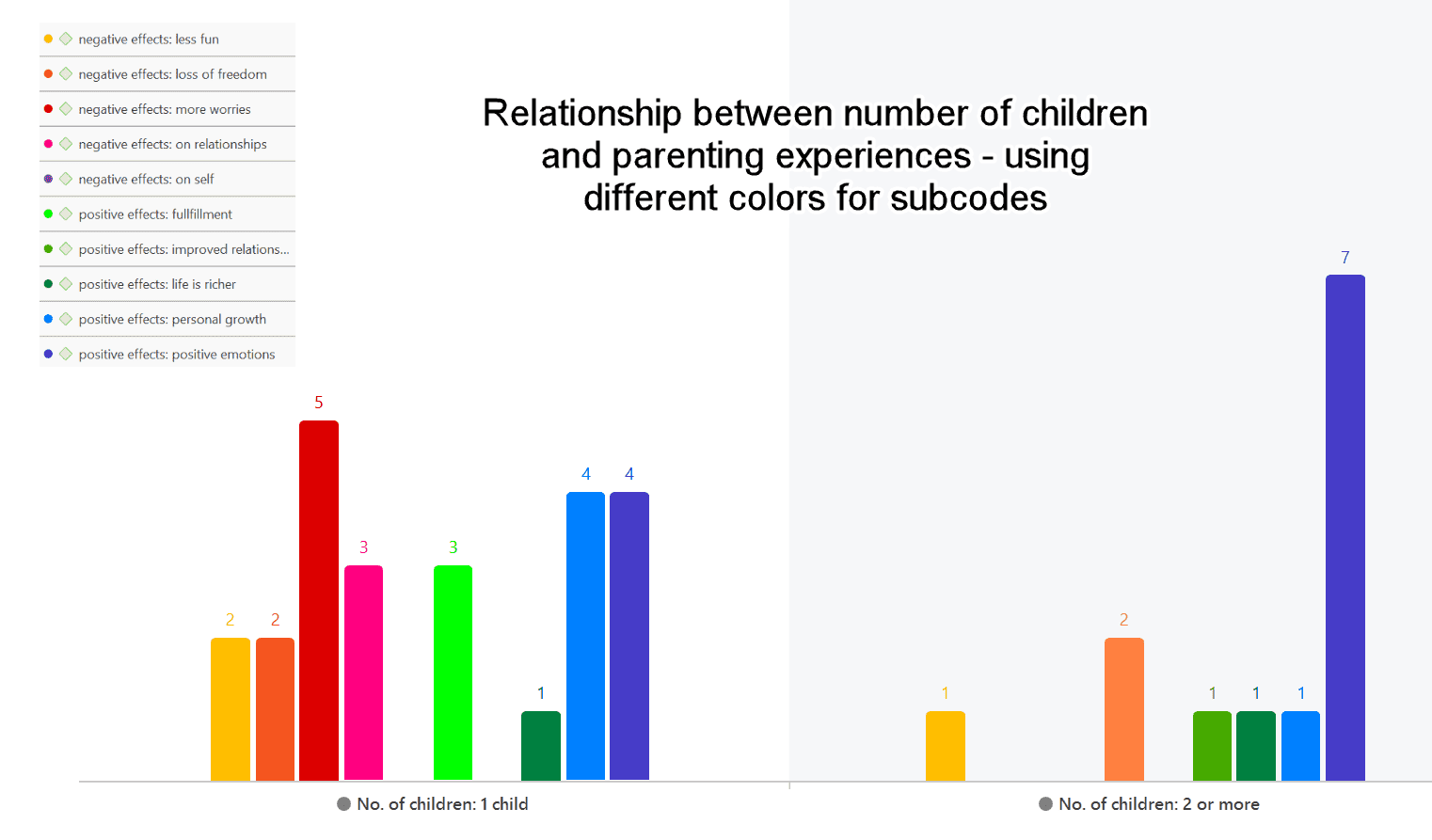
There is currently no legend. The one you see in the images are copy & pasted screenshots. Also, the code colours have to be changed manually. For a more convenient work with the graphics there will be further options in future updates.
Smart and Snapshot Entities
A smart entity in ATLAS.ti is always a query. You can create smart entities for codes and groups.
In the Code Manager you can create smart codes using the operator OR. This is useful if you need a combination of two or more codes for data analysis. In the Query Tool, a smart code can be used to store query results. Smart groups can be created in the Group Managers. They are especially useful for document groups when used as variables. They allow you to create combination of variables.
The reason for naming such codes and groups smart is because they change along with your project. If you change any of the codings of a code that is part of a smart code, this will be reflecting in the smart code when retrieving its quotations. If you add or remove documents that are members of the groups that make up a smart group, the smart group retrieves those documents that reflect the current state of your project.
Every time you click on a smart code or smart group, the underlying query is run, and you see the up-to-date results.
A snapshot entity turns a smart entity into a regular code or code group. You can think of it like a snapshot you take with a camera - it preserves the current moment. Thus, snapshot entities do no longer change automatically.
What are Smart Codes?
Smart Codes are a convenient way to store queries. They are very similar in look and feel to normal codes, with one important difference: instead of hardwired connections to quotations smart codes store a query to compute their virtual references whenever needed.
-
Smart codes automatically change their behavior during the analysis. If you have a smart code based on a query like: (Code A | Code B) COOCCUR Code C), and you add or delete quotations linked to either Code A, B or C, then the smart code will automatically be adjusted.
-
As a smart code is a query, it cannot be used for coding. For the same reason, smart codes are not displayed in the margin area.
-
Smart codes are displayed in the Code Manager. They can be recognized by a gray dot at the bottom left of the code icon.
-
If you double-click on a smart code, you can retrieve all quotations that are the result of the underlying query.
-
You can change the query that is underlying a smart code by editing the query.
-
Smart codes can be used in code groups, networks, and, last but not least, as powerful operands in queries, allowing you to incrementally build complex queries.
-
Smart codes can be transferred into a regular code by creating a snapshot code.
What you cannot do with Smart Codes
As smart codes are not directly associated with quotations, certain restrictions apply.
-
Coding: You cannot link a smart code directly to a quotation. Therefore, smart codes are not shown in the list of codes when coding your data. Drag & drop operations from code lists to other lists are not possible.
-
Merging: You cannot merge a smart code with other codes.
-
You cannot include a code group in the query for the smart code and assign the smart code to this code group later. This would create a cyclical structure and is therefore not allowed.
Working With Smart Codes
Creating an ORed Smart Code in the Code Manager
If you only need a simple OR combination of two or more codes as smart code, the easiest way is to use the Code Manager.
Open the Code Manager, select two or more codes, right-click and select the Create Smart Code option from the context menu or the ribbon.

If you wonder why an OR combination is useful rather than just merging the codes, at times you want to keep the codes as regular codes in the code list. If you merge codes, only the merged codes remains. For example, if you code the speakers in a focus group transcript, you can create smart codes for all male and female speakers without losing the code for each individual speaker. If you add these attributes to each speaker unit, the margin becomes very cluttered. Smart codes are not displayed in the margin.
Creating a Smart Code in the Quotation Manager
You can also create smart codes in the Quotation Manager. There you can combine codes using the Boolean operators AND and OR. See Available Operators for Querying Data > Boolean Operators.
Use AND to:
- narrow your results
- tell the database that ALL search terms must apply. This means that the smart code only retrieves quotations that are linked to all codes in the query. In other words, the quotation is coded with multiple codes.
Use OR to:
- connect two or more similar concepts
- broaden your results, telling the database that ANY of the search terms apply. This means the smart code retrieves all quotations of all codes in the query. It is additive.
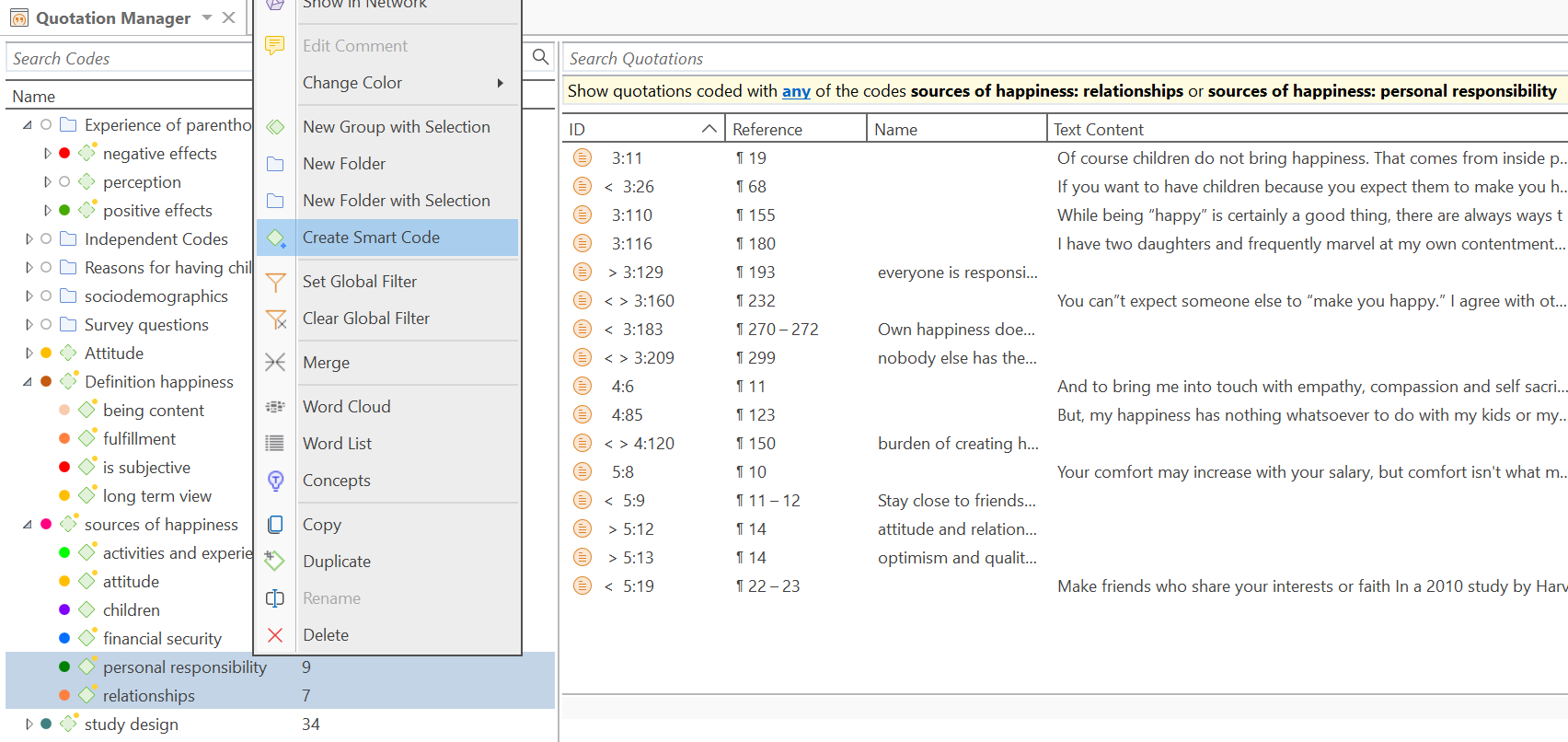
Open the Quotation Manager and select two or more codes in the filter area on the left.
The default operator in the yellow filter bar above the quotation list is 'ANY'. If you want to change, click on it and select the 'ALL' operator.
To save the results as smart code, click on the Smart Code button in the ribbon; or right-click on any of the selected codes in the side panel and select the option Create Smart Code from the context menu.
Enter a name or use the default name and click Create.
Creating a Smart Code in the Query Tool
Open the Query Tool and build a query.
To save the query, click the Save Smart Code button in the ribbon, enter a name and click Create.
Editing a Smart Code
If you want to see the query that is underlying a smart code, of if you want to modify the query, you can edit the smart code.
Open the Code Manager, select the smart code and in the ribbon click on the button Edit Smart Code.
This opens the query tool where you can review and modify the smart code. See How to build a query.
You cannot delete a code, if it is part of a smart code query. If you want to remove a code that is part of a smart code query, you first must delete the smart code. If you do not want to lose the results stored by the smart code, you can turn it into a snapshot code before deleting it.
What are Smart Groups
Smart Groups are very similar in look and feel to normal groups, with one important difference: instead of hardwired connections to their members, smart groups store a query to compute their virtual references whenever needed.
Although also an option for code, memo and network groups, the most common application for smart groups are smart document groups. They allow you to combine two or variables. For instance gender and location. This requires that you have document groups for the basis variables. Here for gender: male and female and for location: urban and rural. If you need the combination of gender and location more often, a good way to do this is to create smart groups:
- female respondents from urban areas
- female respondents from rural areas
- male respondents from urban areas
- male respondents from rural areas
For creating smart groups Boolean operators are used. See Available Operators for Querying Data > Boolean Operators for further information.
A reason for creating a smart group is to apply them as global filter. See Applying Global Filters For Data Analysis. Another application is to add them to a network and display document group - code connections.
Working With Smart Groups
A reason for creating a smart group is to apply them as global filter. See Applying Global Filters For Data Analysis. Another application is to add them to a network and display document group - code connections.
Creating a Smart Group
To create a new smart group, open a Manager and select two or more groups. Click on New Smart Group in the ribbon, or right-click select this option from the context menu.
inst
Accept the suggested name or enter a new one, and click Create.
tip
Smart entities can be recognized by the little gray circle at the bottom left of the icon.
Editing a Smart Group
Smart groups can only be edited in their respective group managers.
Go to the Home ribbon, click on the drop-down of the appropriate entity and select [ ] Groups.
inst
Select the smart group you want to edit and click Edit Smart Group in the ribbon.
This opens the Smart Group Editor that looks similar to the query tool.
The following operators are available:
OR: combines all selected groups and forms a larger group AND: creates a smart group consisting of the intersection of the selected groups like 'female respondents from urban areas'. ONE OF (Exactly one of the following is true): creates a smart group only containing members that are unique to each group and do not occur in any of the other selected groups. Example: In the sample project Evaluation of a computer game, respondents evaluate the game in different ways. If you want to find those respondents who either evaluate the game as being creative or educational (and not both), you can use the one of operator.
IMAGE
NOT (None of the following are true): creates a smart group excluding the members of the selected group. Example: The sample project children and happiness contains two document groups that have been created based on the issues coded in the data. These are: documents that contain codings on positive and negative effects of parenting. There are some documents that only contain codings on positive effects, others that only contain codings on negative effects, and yet some that contain both. If you want to find only those documents that contain codings on positive effects, you can create the following smart document group:
NOT negative effects AND positive effects.
IMAGE
See how to build a query for further information on how to understand and modify the query of a smart group.
What are Snapshot Codes and Groups?
Snapshot Codes
A snapshot code transforms a smart code into a regular code. This code preserves the current state of a smart code at the moment of its creation, like taking a photograph that captures the moment, and creates direct links to all quotations.
- A snapshot code is displayed in the margin area.
- A snapshot code can be used for coding.
You can create a snapshot code from a smart code. This can be useful for data analysis when you build queries.
Another application is to use this option for fixing code systems when code groups have been used as categories. This often leads to underdeveloped code systems, long list of codes and limited use of the further analysis tools. To fix this, you first need to turn all code groups into smart codes using the query tool. Then you create snapshot codes from these smart codes, transforming the code groups into regular codes. In the next step, the members of the code groups can be turned into sub codes by adding prefixes and merged as appropriate. See Building a Code System.
Snapshot Groups
A snapshot group transforms a smart group into a regular group. This group preserves the current state of a smart group at the moment of its creation, like taking a photograph that captures the moment, and creates direct links to all members.
Application: It can for example be useful if you want to remove documents from a project that are part of a smart group. As long as they are part of the smart group, this is not possible. In order not to lose the combination of documents as defined by the smart group, you can turn it into a snapshot group, delete the smart group and then delete the document(s) that you no longer want from the project.
Creating Snapshots
You can create snapshots from smart codes and smart groups.
Creating a Snapshot Code
Open the Code Manager and select a smart code. Click on the button Create Snapshot in the ribbon.
The default name for the snapshot code is the name of the smart code plus the suffix [SN 1]; [SN 2] if you create second snapshot code of the same smart code and so on.
Creating a Snapshot Group
Open the Group Manager either by selecting the option in the ribbon of the respective manager, or from the drop-down of the entity type button in the Home ribbon.
Select the smart group and then Create Snapshot from the ribbon.
Working with Global Filters
Global filters are a powerful tool to analyze your data. As compared to local filters that you can invoke in each manager, global filters have an effect on the entire project.
All groups, documents and codes can be set as global filter.
To set a global filter
Right-click on a code, document or group in the Project Navigator or in a Manager and select the option Set Global Filter from the context menu.
After setting a global filter, one or multiple rows will appear in all windows affected by the global filter. The rows have the color of the entity that are filtered.
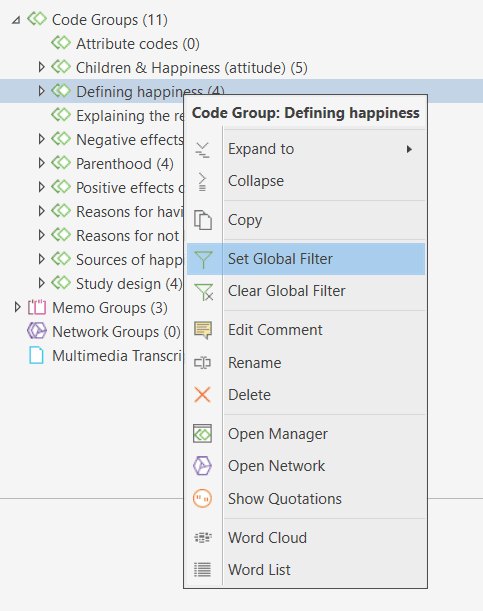
In the ribbon of the Managers, you can also set and remove global filters in the Search & Filter tab.
In the screenshot below, you see that codes (green), documents (blue) and quotations (orange) are filtered in the Project Navigator, and codes and quotations are filtered in the main work space.
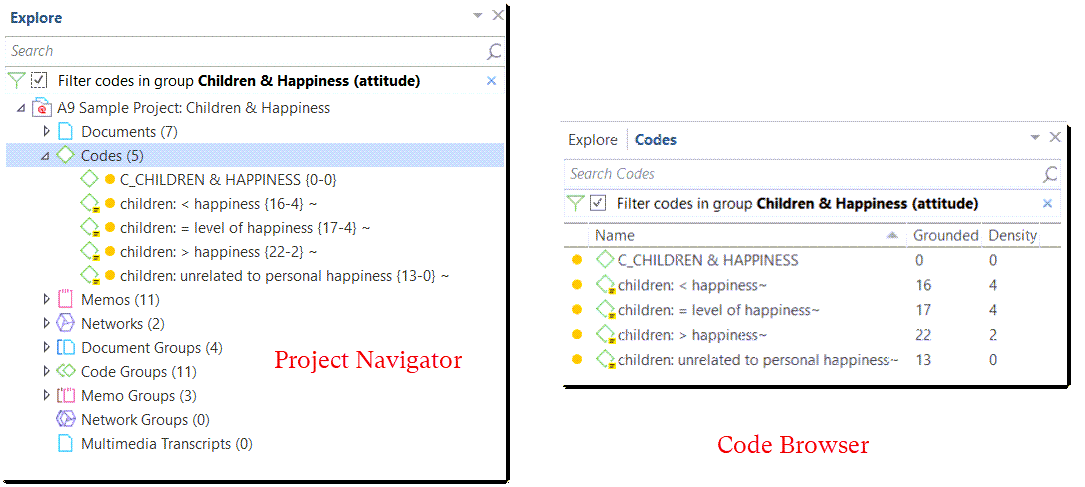
- The screenshot below shows the coding dialogue, and it currently only shows the codes of a one code group that was set as global filter.
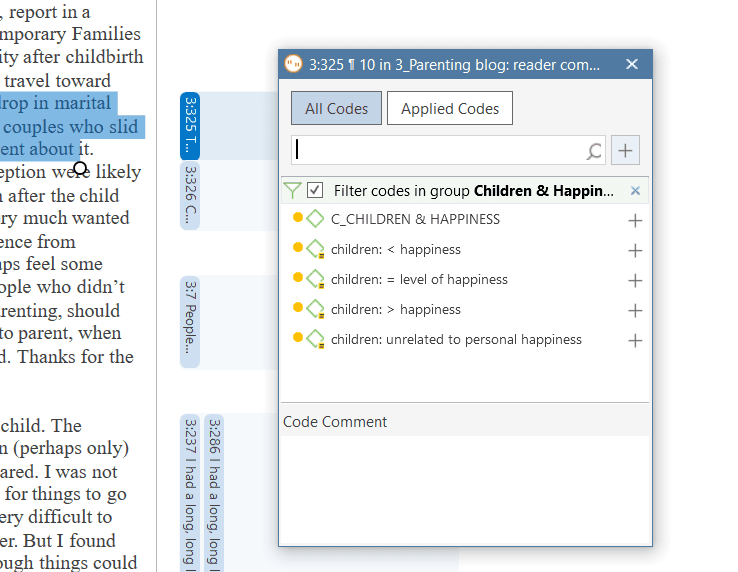
Activating / Deactivating Global Filters
While a global filter is active, you can temporarily deactivate it by clicking on the check-box in the global filter bar you see above each filtered list or table.
Changing a Global Filter
To change a global filter, just select another entity as global filter.
Removing a Global Filter
To remove a global filter, click on the x on the right-hand side of the global filter bar. Another option is to right-click on the group you have filtered and select Clear Global Filter from the context menu.
Documents as Global Filter
Document groups as global filter affect the list of documents and quotations. Thus, the list of quotations shown in the quotation manager or as results of queries is reduced to those documents that are in the filter.
-
When retrieving quotations by double-clicking on a code in the code manager, the quotation reader will only show quotations from the documents that are in the filter.
-
In the Code-Document Table, it allows you to add a layer to the analysis. If for instance you compare the frequency of codes by respondents with different educational levels, you can set a document group gender::male as global filter to refine the analysis to only male respondents.
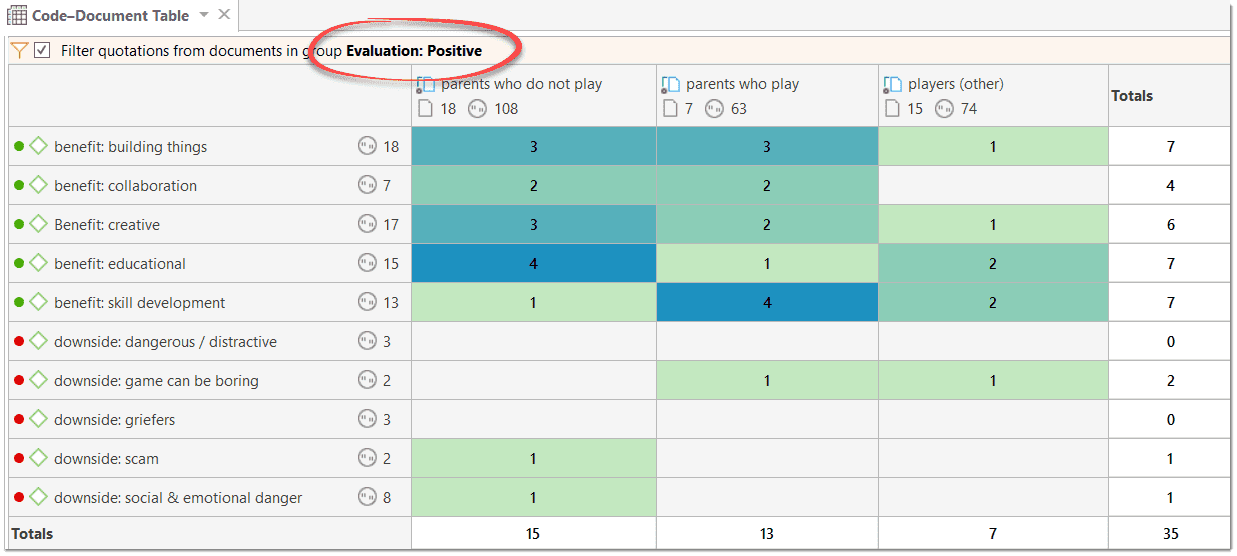
-
If you run a Code Co-occurrence Analysis it will apply to all data in your project. If you want to restrict the analysis, to only a particular group of respondents or type of data, you can set a document group as global filter.
-
In a network, all documents that are not in the document group set as global filter are faded out.
Filtering the code distribution across documents in the Document Manager
The code distribution across documents diagram in the Document Manager shows you the frequency of each code used in a document. These can be many codes; it isn’t easy to compare documents without zooming in on particular codes. This can be done by setting a code group as a global filter.
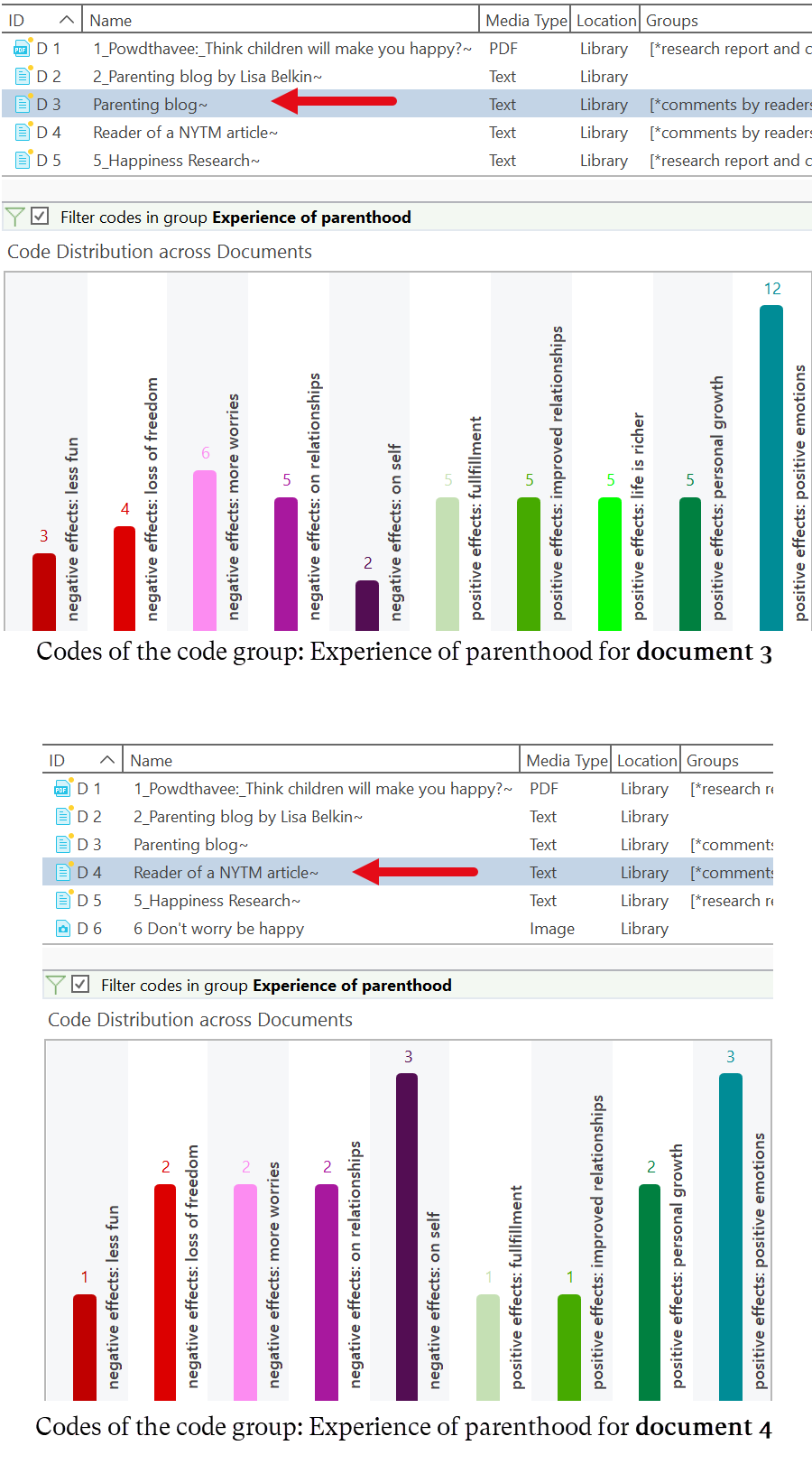
Global filters in networks
- Code groups as global filters are very useful in networks when you use the options: Add Neighbors and Add Co-occurring Codes. Then only the codes of the code group set as global filter are added.
- In a network, all codes that are not in the code group set as global filter are faded out.
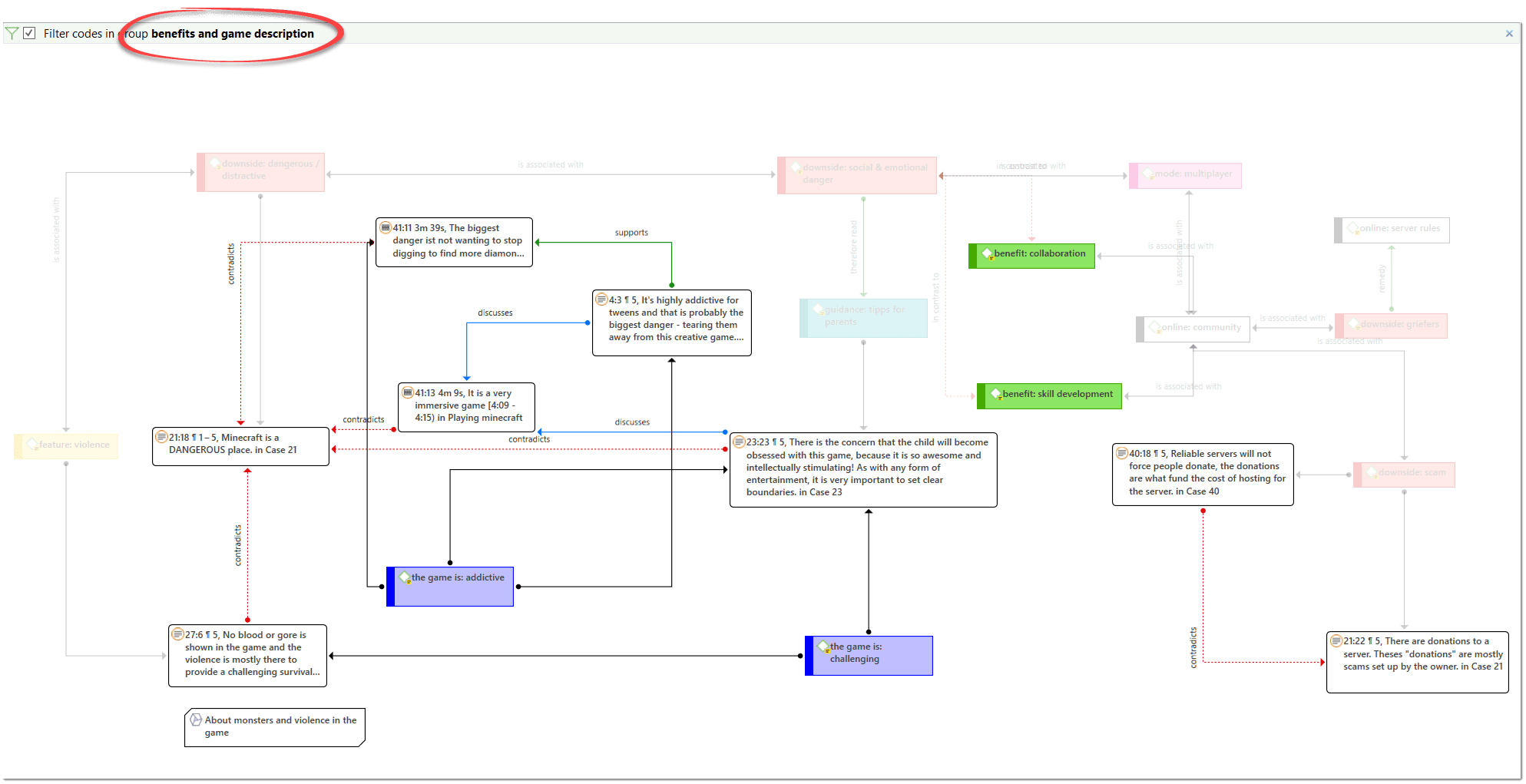
Memo Groups as Global Filter
- Memo groups as filters affect the list of memos you see in the memo manager and all selection lists.
- Only memos that are in the memo group set as global filter are shown in the margin area.
- In a network, all memos that are not in the memo group set as global filter are faded out.
Network Groups as Global Filter
- Network groups as filters affect the list of networks you see in the network manager and all selection lists.
- In the margin area, only networks that are in the network group set as global filter are shown.
- In a network, all networks that are not in the network group set as global filter are faded out.
Creating a Global Filter
Creating a global filter means creating a group.
- Document groups as global filter, filter documents and their quotations.
- Code groups as global filter, filter codes.
- Memo groups as global filter, filter memos.
- Network groups as global filter, filter networks.
Analysing Code Distributions
Code distributions are displayed in the Document Manager and in the Code Manager in the form of bar charts. In the document manager you will see a bar for each code. The higher the bar, the more often the code was used. In the Code Manager each bar stands for a document. Within the bar you can see how the codes are distributed in the document.
After you've encoded the data, a look at the code distribution gives you a feel for the data. Which topics were mentioned more or less frequently, by whom, is there a difference between different groups of respondents? How are the topics distributed?
Code Distribution across Documents
In the first image below, you see the distribution of three categories: benefits, downsides and features of the computer game Minecraft across all documents. In the second image, the data have been filtered a) by respondents who evaluated the game positively, and b) by respondents who evaluated the game negatively. You can see very quickly that there is a difference. Respondents who evaluated the game negatively did not mention any benefits (green bars).
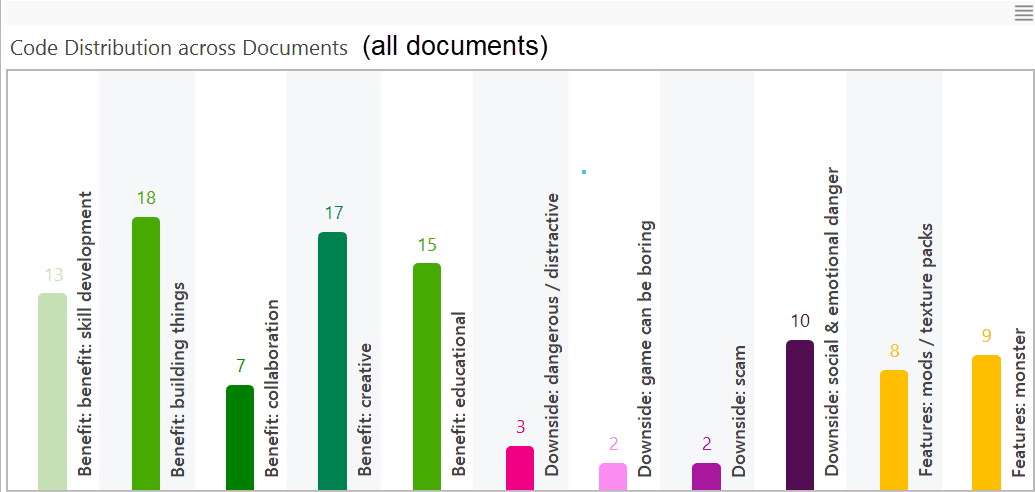
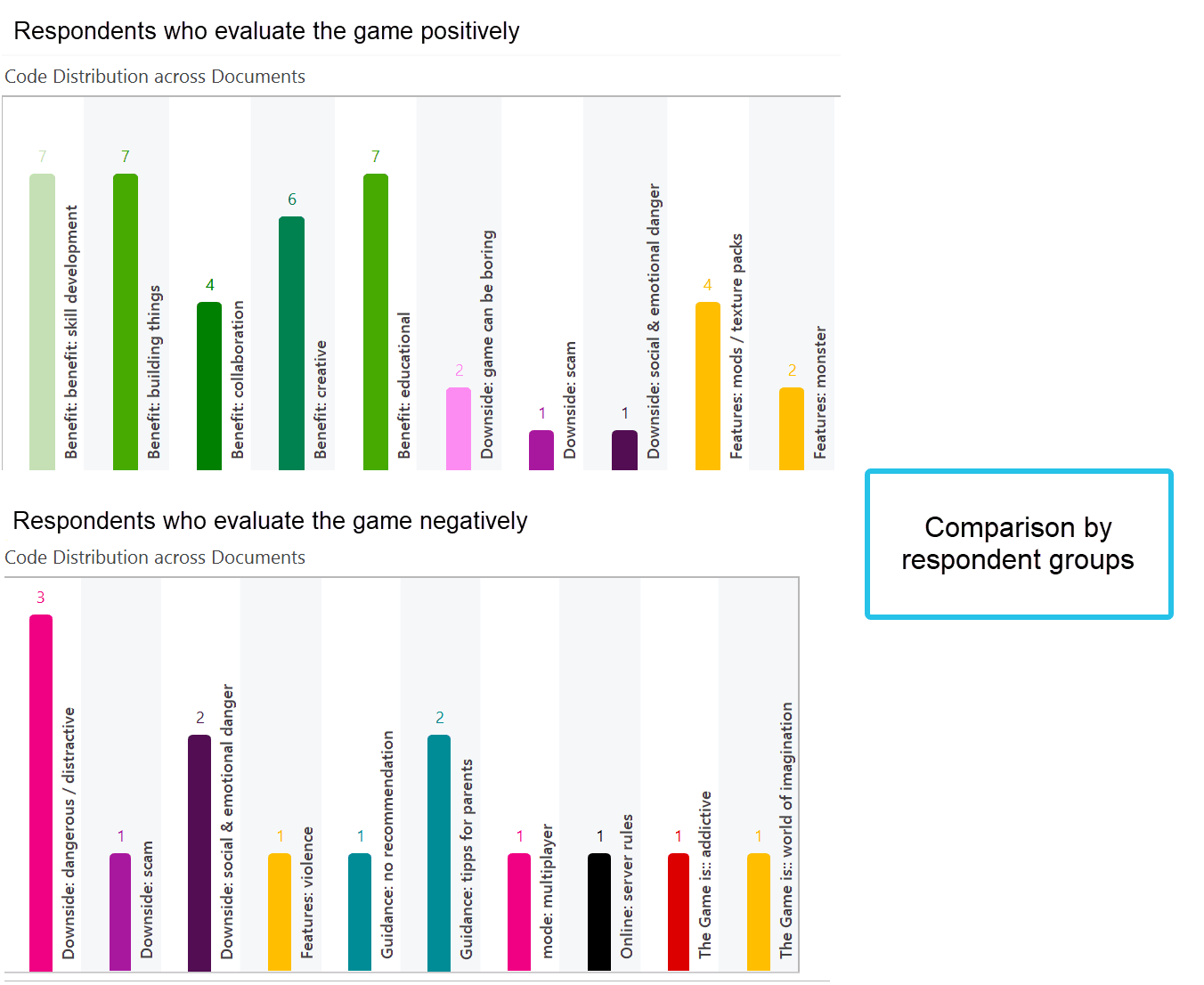
Code Distribution by Documents
In the image below you see the distribution of the various high level topic within each document. We see for instance that case 23 and case 25 talk about a wider variety of topics than the other respondents. In order to generate this graphic, each category has a different color and all subcodes within a category are also colored with the same color.
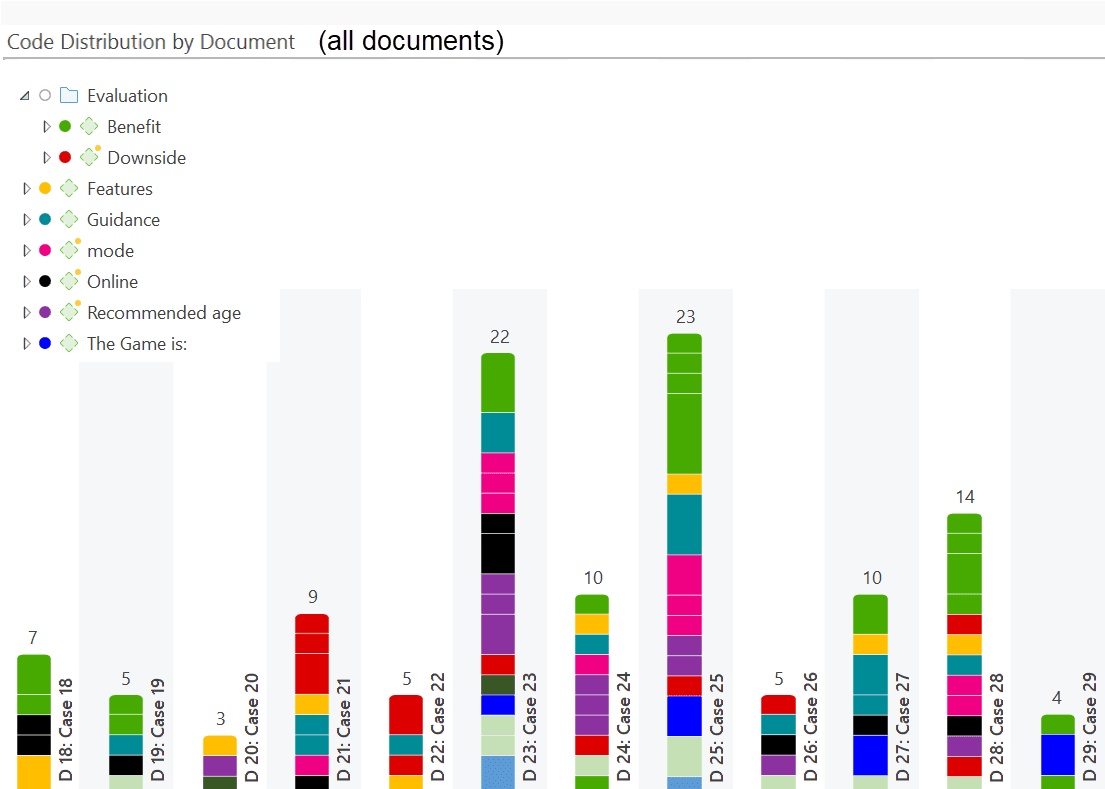 In the image below, the focus is on two categories, benefits and downsides. In order to be able to differentiate between the various subcodes of a category, each subcode has a different color. If you analyse interview data for instance, this is a great way to go through your data, category for category and compare the respondents' answers. You see who talked about benefits or downsides, strategies or consequences and about which aspects of those major themes they talked about.
In the image below, the focus is on two categories, benefits and downsides. In order to be able to differentiate between the various subcodes of a category, each subcode has a different color. If you analyse interview data for instance, this is a great way to go through your data, category for category and compare the respondents' answers. You see who talked about benefits or downsides, strategies or consequences and about which aspects of those major themes they talked about.
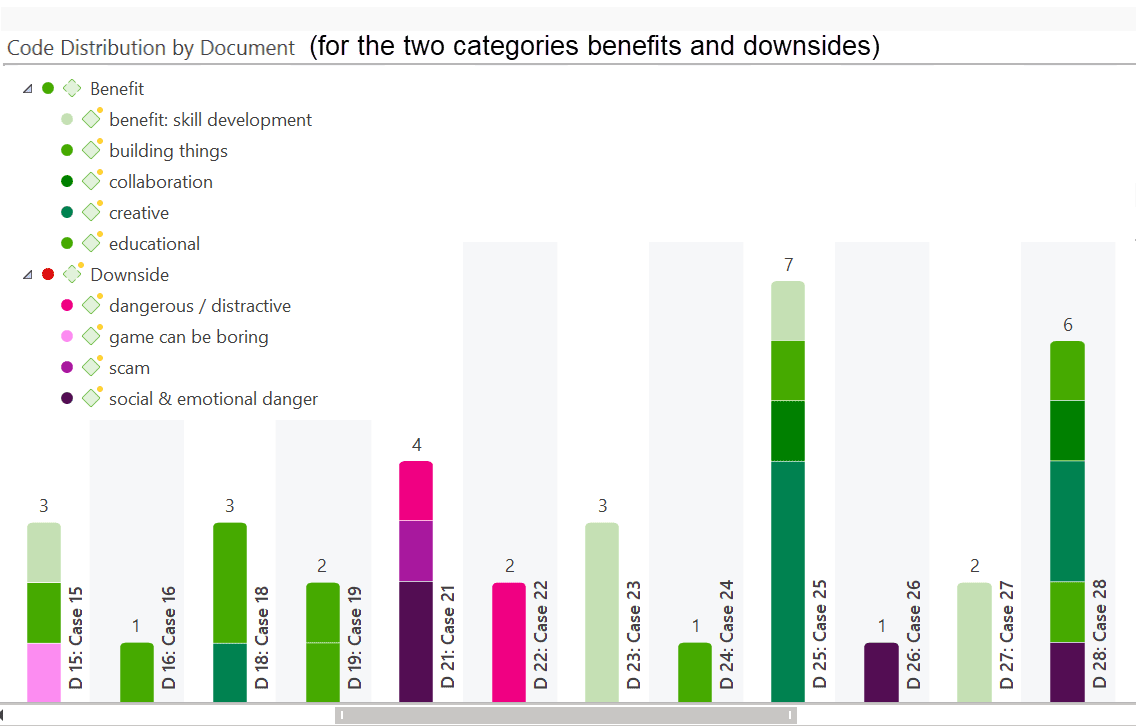 With a click on a bar, you can retrieve the coded data per code for each respondent.
With a click on a bar, you can retrieve the coded data per code for each respondent.

Setting a Global Filter
Global filters can be set in the Project Explorer on the left, and in each Manager.
Right-click on a group in the Document Group section of the Project Explorer and select the option Set Global Filter.
In the ribbon of the Managers, you can also set and remove global filters in the Search & Filter tab.
Display Of Globa
If a global filter is set, all affected managers, browsers, lists and tools show a colored bar on top indicating which filter has been set.
- global document filters are blue.
- global quotations filters are orange.
- global code filters are green.
- global memo filters are magenta.
- global network filters are purple
Activating / Deactivating Global Filters
While a global filter is active, you can temporarily deactivate it by clicking on the check-box in the global filter bar that you see above each filtered list or table.
Changing a Global Filter
To change a global filter, right-click on a different group of the same type and set it as global filter. This will automatically deactivate the currently active filter.
Removing a Global Filter
To remove a global filter, click on the x on the right-hand side of the global filter bar. Another option is to right-click on the group you have filtered and select Clear Global Filter from the context menu.
Removing / Changing / Activating / Deactivating a Global Filter
If you change a global filter, the currently active filter is automatically reset (see below).
Removing a Global Filter
Click on the x on the right-hand side of the global filter bar.
Another option is to right-click on the group you have filtered and select Clear Global Filter from the context menu.
Changing a Glob
To change a global filter, right-click on a different group of the same type and set it as global filter. This will automatically deactivate the currently active filter.
Activating or Deactivating Global Filters
While a global filter is active, you can temporarily deactivate it by clicking on the check-box in the global filter bar you see above each filtered list or table.
Global Filters in the Code Co-occurrence Table
The screenshot below shows an active global filter in the Code Co-occurrence Table. You will see a bar on top of the table that shows what kind of filter is set. The results of the table will only show the data that passes the filter.
If you deactivate the filter by unchecking the box, you will see the results as they apply to the entire project.
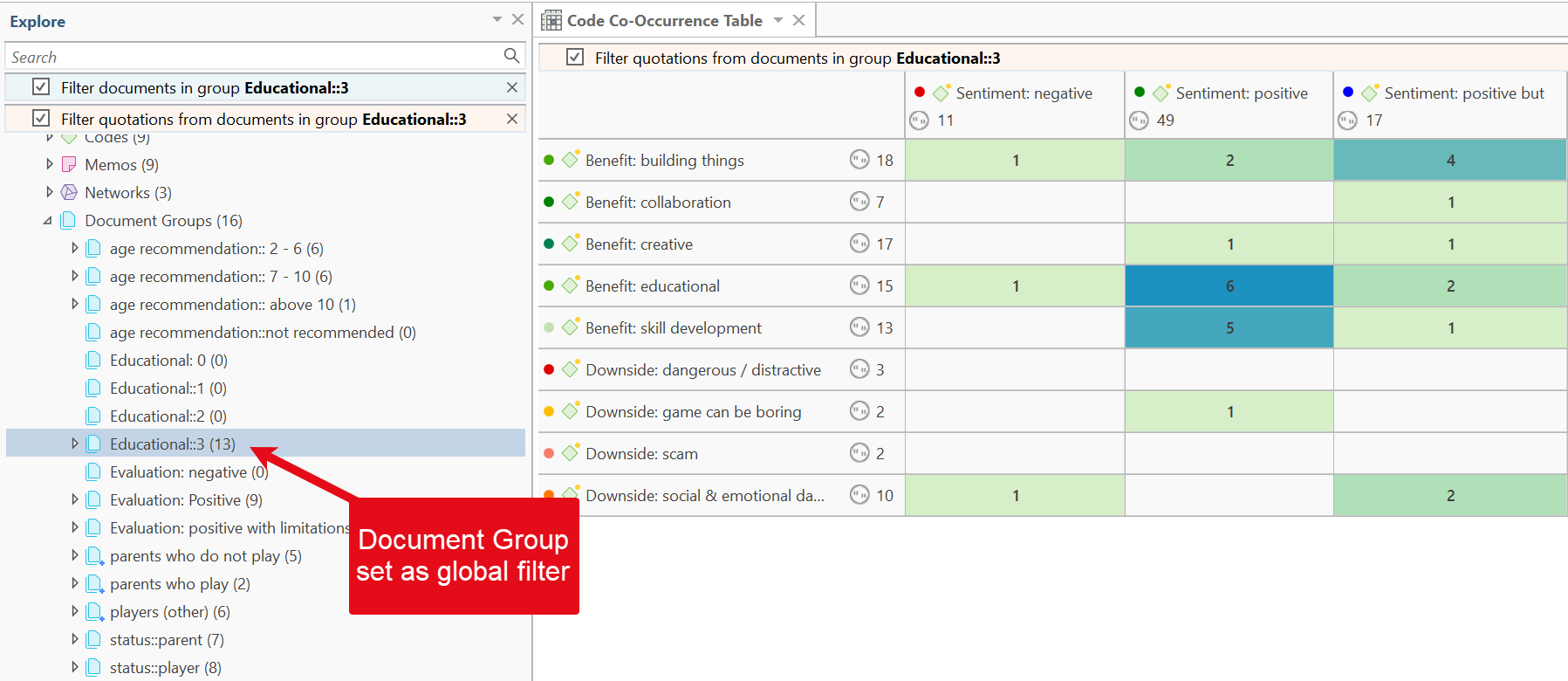
Global Filters in the Code Document Table
The screenshot below shows an active global filter in the Code-Document Table. You will see a bar on top of the table that shows what kind of filter is set. The results of the table will only show the data that passes the filter.
If you deactivate the filter by unchecking the box, you will see the results as they apply to the entire project.
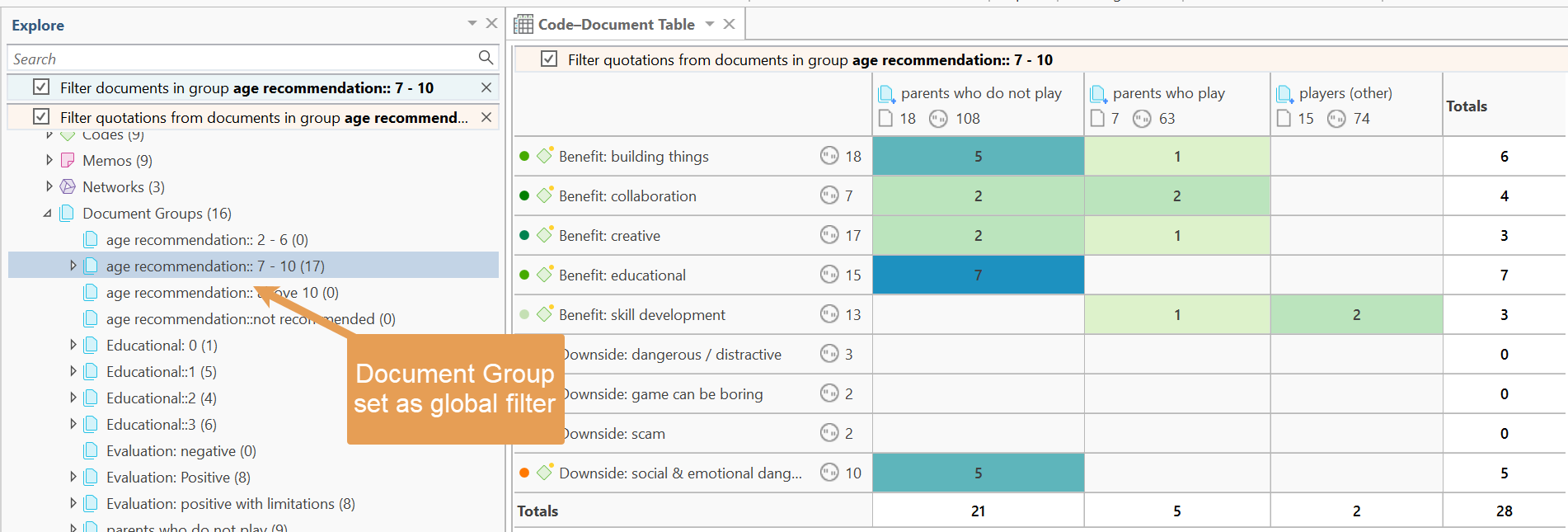
ATLAS.ti Networks
Video utorial: Visualizations in Building the Understanding
Visualization can be a key element in discovering connections between concepts, interpreting your findings, and effectively communicating your results. Networks in ATLAS.ti allow you to accomplish all three of these important objectives. These small segments of your larger web of analysis are modeled using the network editor, an intuitive work space we also like to think is easy on the eye.
The word network is a ubiquitous and powerful metaphor found in many fields of research and application. Flow charts in project planning, text graphs in hypertext systems, cognitive models of memory and knowledge representation (semantic networks) are all networks that serve to represent complex information by intuitively accessible graphic means. One of the most attractive properties of graphs is their intuitive graphical presentation, mostly in form of two-dimensional layouts of labeled nodes and links.
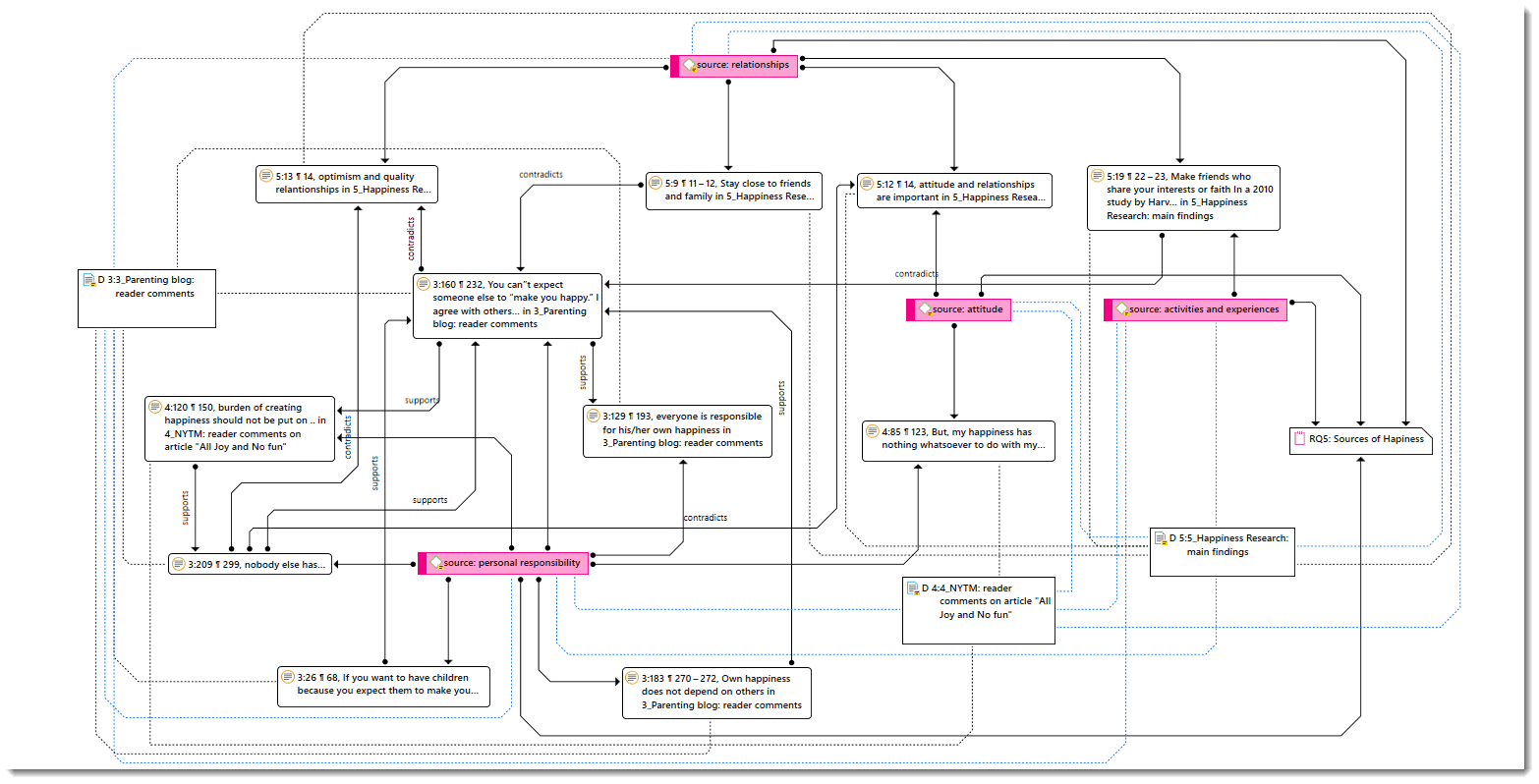 In contrast with linear, sequential representations (e.g., text), presentations of knowledge in networks resemble more closely the way human memory and thought is structured. Cognitive "load" in handling complex relationships is reduced with the aid of spatial representation techniques. ATLAS.ti uses networks to help represent and explore conceptual structures. Networks add a heuristic "right brain" approach to qualitative analysis.
In contrast with linear, sequential representations (e.g., text), presentations of knowledge in networks resemble more closely the way human memory and thought is structured. Cognitive "load" in handling complex relationships is reduced with the aid of spatial representation techniques. ATLAS.ti uses networks to help represent and explore conceptual structures. Networks add a heuristic "right brain" approach to qualitative analysis.
The user can manipulate and display almost all entities of a project as nodes in a network: quotations, codes, code group, memos, memo groups, other networks, documents, document groups and all smart entities.
Nodes And Links
The term network is formally defined within graph theory, a branch of discrete mathematics, as a set of nodes (or "vertices") and links. A node in a network may be linked to an arbitrary number of other nodes.
The number of links for any one node is called its degree; e.g., a node with a degree of zero is not linked at all. Another simple formal property of a network is its order: the number of its nodes. You may make practical use of the degree of nodes by using it as a sorting criterion in the codes list window. The column 'Density' in the Code Manager represents the degree of a code.
Directed and Non-Directed Links
Links are usually drawn as lines between the connected nodes in graphical presentations of networks.
Furthermore, a link between two nodes may be directed or not. A directed connection is drawn with an arrow. With directed links, source and target nodes must be distinguished. The source node is where the link starts, and the target node is where it ends: the destination to which the arrow points.
Links are created either implicitly (e.g., when coding a quotation, the quotation is "linked" to a code), or explicitly by the user. See Linking Nodes.
Strictly speaking, code-quotation associations ("codings") also form a network. However, you cannot name these links, the code is simply associated with a quotation through the act of coding. In a network you can visualize these links. In ATLAS.ti all unnamed links are referred to as second class links, all named links are referred to as first-class links.
First-Class Links
First-class links are links based on relations. They are entities by themselves, with names, authors, comments, and other properties. They are available for:
-
Links between two codes. These include:
- links between two category codes
- links between two subcodes (within or across categories)
- links between a subcode and its own or other category codes
-
Links between two quotations. The latter are called hyperlinks. See Working With Hyperlinks.
Second-Class Links
Second-class links are links that do not have individual properties; These are:
-
links between quotations and codes
-
all links to memos
-
all links between a group and its members
-
all hierarchical links:
- links between categories and their subcodes
- links between folders
- links between folders and categories
- links between folders and independent codes
- links between folders and subcodes
- links between folders
If you change hierarchical links in the network, this has an effect on the hierarchy of codes and folders in the entire your project!
Why Groups Cannot be Linked
Groups cannot be linked as by definition, they are not mutually exclusive. You can add a document to as many document groups as you want. This also applies to code groups. A code can be a member of multiple code groups.
Groups are filters. Code groups are at times regarded by users as a higher order category, which they are not. See Building a Code System for further detail.
In order to compare and analyze documents by certain criteria like sociodemographic characteristics, you add them to document groups like gender::male / female, family status::single / married / separated / divorced, etc. This allows you also to combine certain criteria, e.g., to run an analysis for all female respondents that are married. See Working with document groups and Working with Smart Groups.
Likewise, the purpose of code groups is to be used as filters. A useful filter could be all codes of a category, but also all codes that are relevant for a certain research questions, or all codes that could be classified as coding a strategy, or a consequence or a context across different categories.
So you might have a code group containing codes A, B, C and D, and another code group containing codes B, D, E and F. If you now were to relate these two code groups to each other, you end up with circular or illogical relations.
Relations
ATLAS.ti allows you to establish named links to more clearly express the nature of the relationships between concepts. With named links, you may express a sentence like "a broken leg causes pain" by two nodes (the source node "broken leg" and the target node "pain") connected with a named link ("causes" or "is-cause-of").
The name of a link is displayed in the network editor as a label attached to the link midway between the two connected nodes.
Six pre-set relations are available in ATLAS.ti. These standard relations can be substituted, modified, or supplemented by user-defined relations.
Link vs. Relation
It is important to understand the difference between a relation (or a link type), and the link itself: There is only one "is part of" relation, but potentially many links that can use it.
If you take a look at the Code-Code Link Manager below, you can easily see how it works:
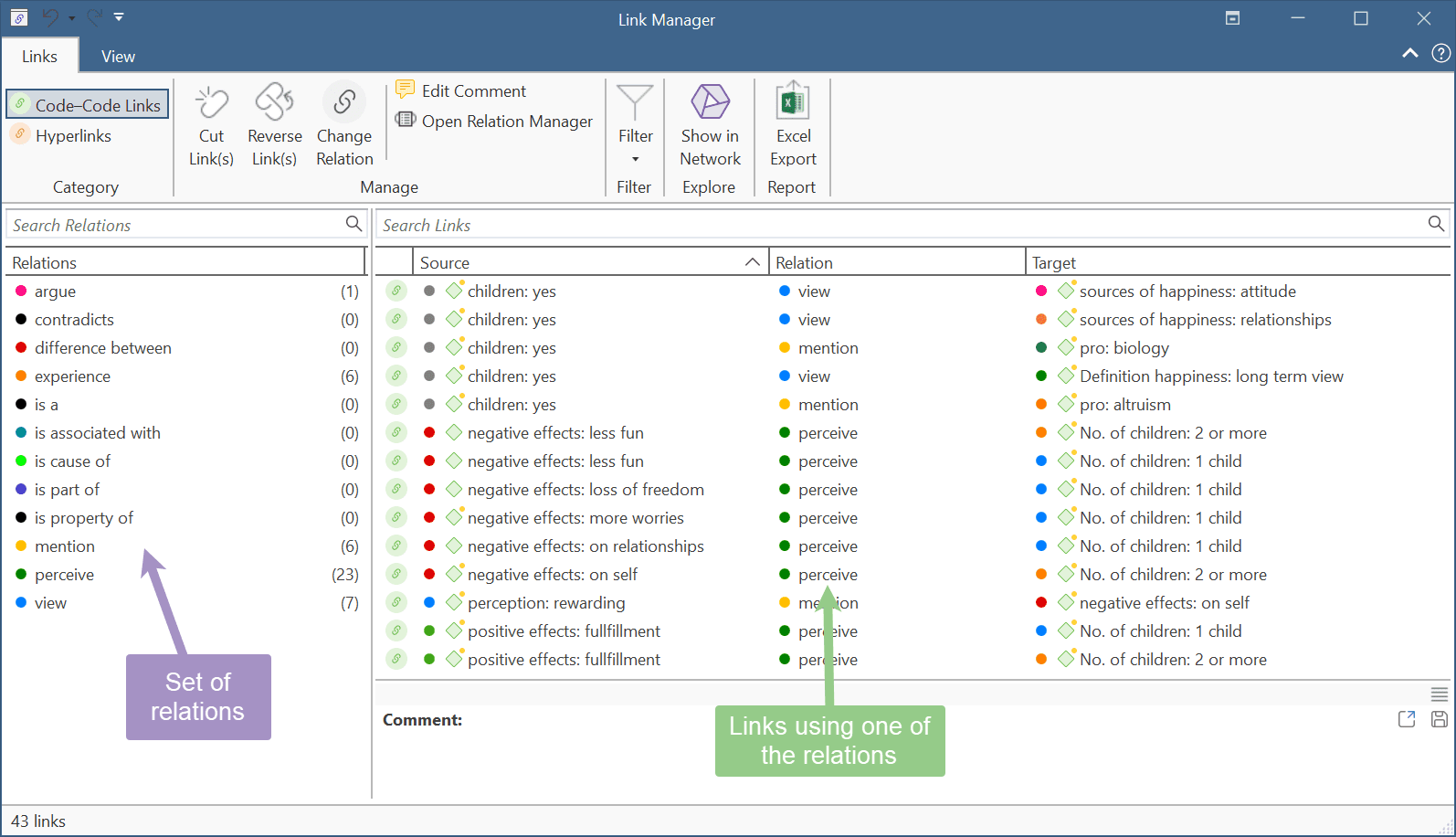 Another way to think of links and relations is to view links as instances of relations. Links are informed about the characteristics of relations, which define their styles. If a characteristic of a relation is changed (e.g., line width, color, symbol), these changes are propagated to all links using it.
Another way to think of links and relations is to view links as instances of relations. Links are informed about the characteristics of relations, which define their styles. If a characteristic of a relation is changed (e.g., line width, color, symbol), these changes are propagated to all links using it.
ATLAS.ti Default Relations
The default relations that come with the software are listed in the table below. C1 and C2 are source and target nodes, respectively.
| Relation Name | short name | symbolic name | width | color | property |
|---|---|---|---|---|---|
| is associated with | R | == | 1 | Black | Symmetric |
| is part of | G | [] | 1 | Black | Asymmetric |
| is cause of | N | => | 1 | Black | Asymmetric |
| contradicts | A | <> | 1 | Black | Symmetric |
| is a | Isa | 0 | 2 | Black | Asymmetric |
| noname | 1 | Black | Symmetric | ||
| is property of | P | *} | 1 | Black |
Some of these characteristics directly affect the display of links, while others affect processing (e.g., search routines, automatic layout). A link between concepts is displayed in a network editor by a line with the relation's label. You can choose from three different labels (name, short and symbolic). The relation property affects the display a relation. All asymmetric relations are symbolized in the network editor with an arrow pointing toward the target code. Symmetric relations are displayed as a line with two arrows pointing to both ends of the link.
The following properties are user-definable: the labels, the width and color of the line linking two nodes, the property, and the preferred layout direction.
The preferred layout direction affects the layout of a network when opening an ad hoc network.
Formal Properties - Some Definitions
Symmetric Relationship
A relation R is symmetric if it holds for all A and B that are related via R. A is related to B if, and only if, B is related to A.
Examples:
- A is married to B (in most legal systems)
- A is a fully biological sibling of B
- A is a homophone of B
QDA Examples:
- walking the talk is associated with role model
- having a clear vision is related to performance orientation
- communicating well is associated with empowerment
Asymmetric Relations
A graph is asymmetric if:
- for every edge, there is not an edge in the other direction, then the relation is asymmetric
- loops are not allowed in an asymmetric digraph
If x has a relation R to y, but y does not have a relation R to x.
Examples:
- Martin is a child of Marilyn: If Martin is the child of Marilyn, then Marilyn cannot be the child of Martin.
QDA Examples:
If we use the same example as above, but instead define the relation results in being an asymmetric one, then you do not infer that nice weather is necessarily related to you being a happy person, or that you being a happy person has any effect on the weather. The later would be the case if you used a symmetric relation.
The relations in the following example are defined as asymmetric relations: Supportive environment motivates learning & development results in higher job satisfaction. This does not imply that a supportive environment results in higher job satisfaction.
Relation Manager
The Relation Manager is used to review the properties of existing relations, to edit existing relations, or to create new relations. You can switch between relations for code-code links and relations for hyperlinks. As the column information and the ribbon options are the same for both, below you find only one description. For further information see Working With Networks.
You can access the Relation Manager from within networks or via the drop-down option of the Links button in the Home ribbon.

Usage: Number of times it is used in the project.
Style: Preview of line: direction, color, width and property (directed, non-directed)
Layout: Automatic layout direction if you open a network on an entity.
Short: Short name as an alternative to the full name. You can either display full names, short names or the symbolic name for all relations in a network.
Symbol: Symbolic name as an alternative to the full name. You can either display full names, short names or the symbolic name for all relations in a network.
Formal Property: The formal property of a relation: symmetric or asymmetric. See About Relations.
Relation Manager Ribbon

From left to right:
New Relation: Select to create a new relation.
Duplicate Relation(s): Duplicate a relation, e.g., if you want to create a new relation based on an already existing relation with a few modifications.
Rename Relation: Select a relation and rename it.
Delete Relation(s): Select on or more relations that you want to delete.
Line Color: Select the line color.
Line Width: Select the line width.
Line Style: Select the line style(solid or dashed).
Layout Direction: Select the layout direction. If you open an ad-hoc network, the layout directions are used to position the nodes in the network.
Formal Property: Select the property for the relation. Options are: symmetric (non-directed) and asymmetric (directed). This is further explained in the section About Relation
Filter: You can filter relations based on the following options: created today, created this week, created by yourself, or all relations that have a comment. An additional option is to invert the filter.
Excel Export: You can export the information you see in the manager as Excel table.
View Tab
As the View tab is the same in all manager, it has been described here Entity Manager.
The Network Editor
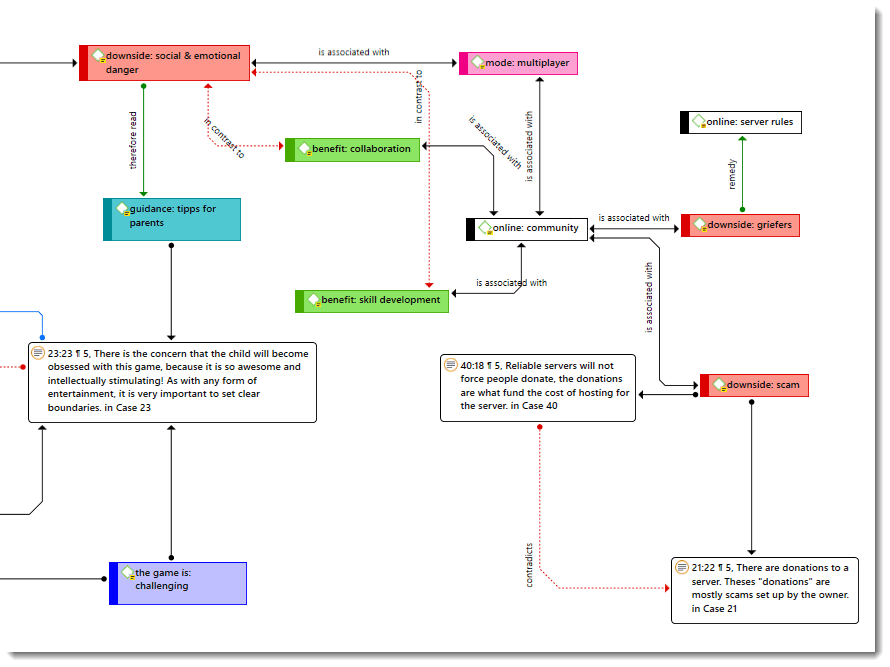 The network editor offers an intuitive and powerful method to create and manipulate network structures. It favors a direct manipulation technique: You can literally "grab" codes, quotations, memos, or other entities using your cursor and move them around the screen as well as draw and cut links between them.
The network editor offers an intuitive and powerful method to create and manipulate network structures. It favors a direct manipulation technique: You can literally "grab" codes, quotations, memos, or other entities using your cursor and move them around the screen as well as draw and cut links between them.
Networks have certain important characteristics:
- Networks can be given names under which they are stored and accessed inside the project.
- Networks can be commented.
- Networks are displayed and edited in the network editor.
- Networks allow individual layouts of the nodes.
- As a node, a single entity can be a member of any number of networks.
- An entity, e.g. a specific code, can only appear once in any network.
Networks allow for a flexible but logically consistent display of links and relations, so there are a few constraints to keep in mind:
- If code A is linked to code B using the relation is associated with, then every network that contains code A and code B will necessarily include the relation is associated with between the two.
- Furthermore, as only one link can exist between any two nodes at any given time, no network will display any other relation between those two nodes.
If you want to link code A and code B in different ways in different networks, you need to work with "dummy" codes that modify a relation. For example:
A specific context X results in emotion A leading to behaviour B, then linking A to B directly would be false:
Emotion A ---- leading to ----> Behavior B
However, you can express it like this:
Emotion A ---- if ----> context X -----leading to -----> Behaviour B
'Context X' is a dummy code as it did not already exist in the code system. It needed to be added in order to express a relationship that emerges while you were working with and interpreting the data.
In order to visualize such relationships, you have the option to create new codes in the network editor. These will show up in your list of codes with 0 groundedness and a density of 1 or more, depending on their connectedness in the network.
Node Types
The following object classes can be displayed and edited as nodes within the network editor.
Codes as Nodes
Codes are probably the most prominent objects in ATLAS.ti networks. They provide the main ingredients for models and theories.
Memos as Nodes
Memos in networks are often an important supplement to code networks.
Several theoretical memos can be imported into a network to map out their relationship. The visual layout provides comfortable territory for moving from memo to memo, in order to read and contemplate each individually and the relationship(s) between them.
Documents as Nodes
Documents as nodes are useful for case comparisons paired with the option to add code neighbors.
Documents as nodes make a nice graphical content table for graphical documents when selecting the preview.
The icons for document nodes vary by media type.
Quotations As Nodes
Quotations and codes have one thing in common, which is different for the other entities. They can link to each other (quotations to quotations and code to codes) with fully qualified "first class" links. See Nodes and Link.
The inclusion of quotations in a network supports the construction and inspection of hyperlink structures. The icons for quotation nodes vary by media type.
Groups as Nodes
Displaying groups, and their members in networks are useful to present all members that are part of the group. The links between a group and its members are depicted by a dotted red line. The line property cannot be changed.
Network as Nodes
Networks as nodes allow the inclusion of networks in other networks. They cannot be linked to anything, but via the context menu you can open the network in a separate network editor.
If you double-click on a network node, its comment is displayed and from there you can click to open it. This is for instance useful if you are running out of space on your screen. Instead of trying to represent everything in one network, you can create several networks that build on each other. Via a network node in a network, you can continue to tell the story you want to tell.
Network View Options

The display characteristics of the nodes can be altered in a variety of ways.
To change the node or link style, select the View tab in a network editor.
Overview: If you select this option, a schematic overview of the network is shown.
Fit to Window: This option adjusts the network to fit the size of the currently opened network editor.
Grid: The grid helps you to position nodes.
Snap: Snapping allows an object to be easily positioned in alignment with grid lines, guidelines or another object, by causing it to automatically jump to an exact position when the user drags it to the proximity of the desired location.
Link Label: You can define three labels for each relation:
- (relation) name
- short name
- symbolic name
See Creating & Modifying Relations. Depending on what you want to see in your network, you can switch the label that is shown. If you change to a different label, this applies to all relations in the network.
Node Styles: Nodes can be displayed in four different styles:
- simple
- flat (default)
- gradient
- shadow
Instead of describing the various looks, go ahead and try out each style and select the one that you like best or that is most suitable for the task at hand.
Some of these options you also find in the Layout/Style section in the main Network ribbon.
Style
Comments: If activated the comments of all nodes that have comments are displayed.
Code-Document Connections: At times it is interesting to see which codes have been applied to a document, or a document group. When coding the data, you apply codes to quotations, which are part of documents, but you do not directly apply codes to a document. Therefore, there are no direct links between documents and codes. In order to see those connections, you need to activate this option.
Code-Document and Code-Document Group connections are shown as blue lines.
Preview: You can activate a preview for documents, quotations and memos. Audio and video documents or quotations can be played in the preview window. If you only want to see the preview of selected entities, right-click the entity and select the Preview option from the context menu.
In ATLAS.ti Windows, there is no preview for audio and video quotations in networks.
Frequencies: If activated it displays the groundedness and density of code and memo nodes in the network.
-
Groundedness: It shows how many quotations are linked to a code or memo.
-
Density:
- Number of code - code connections.
- Number of codes and memos a memo is connected to.
- Number of codes a quotation is coded to.
Show Node Icons: The node type icon can be switched on and off for all nodes. The small image used as a node icon increases the distinctiveness of the nodes, especially when a mixture of node types exists in a network. Nonetheless, when space runs low, you may prefer to switch off the icons.
Network Editor - Layout And Routing Options
You can select among twelve automatic layout options. The results of the automatic layout procedure are typically quite usable and provide a good starting point for subsequent manual refinement. They can be combined with four routing options that are responsible for an optimal placement of the links.
The Layout and routing options are available from the Network Editor via the main Network Tab, and the View Tab. By moving nodes to different positions, you can modify an initial layout created by the automatic layout procedure. For precision placement of nodes, use the Grid and Snap option under the View Tab.
Layout Options
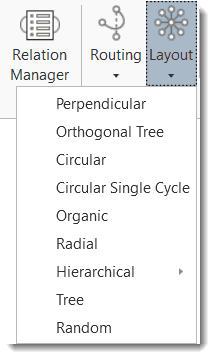
Perpendicular Layout: Orthogonal layouts allow the edges of the graph to run horizontally or vertically, parallel to the coordinate axes of the layout. It produces compact drawings with no overlaps, few crossings, and few bends.
Orthogonal Tree Layout: Same as the standard perpendicular layout, but larger subtrees are processed using a specialized tree layout algorithm, which is better suited for tree-like structures.
Circular Layout: The circular layout places the nodes on a circle, choosing carefully the ordering of the nodes around the circle to reduce crossings and place adjacent nodes close to each other. It emphasizes group and tree structures within a network. It creates node partitions by analyzing the connectivity structure of the network, and arranges the partitions as separate circles. The circles themselves are arranged in a radial tree layout fashion. This algorithm suits social network analysis quite well.
Circular Single Cycle Layout: This is similar to the circular layout, only subgroups are not created and all nodes are placed on a single circle. Useful for creating an overview and for shallow hierarchies.
Organic Layout: The organic layout style is based on the force-directed layout paradigm. When calculating a layout, the nodes are considered to be physical objects with mutually repulsive forces, like, e.g., protons or electrons. The connections between nodes also follow the physical analogy and are considered to be springs attached to the pair of nodes. These springs produce repulsive or attractive forces between their end points if they are too short or too long. The layout algorithm simulates these physical forces and rearranges the positions of the nodes in such a way that the sum of the forces emitted by the nodes, and the edges reaches a (local) minimum. Resulting layouts often expose the inherent symmetric and clustered structure of a graph, they show a well-balanced distribution of nodes and have few edge crossings.
Radial Layout: When applying the radial layout style, the nodes of a graph are arranged on concentric circles. The layout calculation starts by conceptually reducing the graph to a tree structure whose root node is taken as the center of all circles. Each child node in this tree structure is then placed on the next outer circle within the sector of the circle that was reserved by its parent node. All edges that were initially ignored are re-established, and the radii of the circles are calculated taking the sector sizes needed by each whole subtree into account. This layout style is well suited for the visualization of directed graphs and tree-like structures.
Hierarchical Layout: The hierarchical layout style aims to highlight the main direction or flow within a directed graph. The nodes of a graph are placed in hierarchically arranged layers such that the (majority of) edges of the graph show the same overall orientation, for example, top-to-bottom. Additionally, the ordering of the nodes within each layer is chosen in such a way that the number of edge crossings is small.
-
Hierarchical Layout (Top-Bottom): Prefers to place nodes downwards from top to bottom along directed links.
-
Hierarchical Layout (Bottom-Top): Prefers to place nodes upwards from bottom to top along directed links.
-
Hierarchical Layout (Left-Right): Prefers to place nodes from left to right along directed links.
-
Hierarchical Layout (Right-Left): Prefers to place nodes from right to left along directed links.
Tree Layout: The tree layout is designed to arrange directed and non-directed trees that have a unique root node. All children are placed below their parent in relation to the main layout direction. A child-parent relation in ATLAS.ti is defined via a transitive. Before applying the layout all nodes compromising a strict tree are removed and added after the tree layout by connecting them with curved edges. Tree layout algorithms are commonly used for visualizing relational data. The layout algorithm starts from the root and recursively assigns coordinates to all tree nodes. In this manner, leaf nodes will be placed first, while each parent node is placed centered above its children.
Random Layout: Randomly places the nodes every time this layout is invoked.
Routing
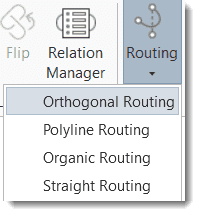
The positions of the nodes in the network are not altered by rerouting the edges.
Orthogonal Routing: This is a versatile and powerful layout algorithm for routing a diagram's edges using vertical and horizontal line segments only. The positions of the diagram's nodes will remain fixed. Usually, the routed edges will not cut through any nodes or overlap any other edges.
Poly Line Edge Routing: Polyline edge routing calculates polyline edge paths for a diagram's edges. The positions of the nodes in the diagram are not altered by this algorithm. Edges can be routed orthogonally, i.e., each edge path consists of horizontal and vertical segments, or octilinear. Octilinear means that the slope of each segment of an edge path is a multiple of 45 degree.
Organic Routing: This algorithm routes edges organically to ensure that they do not overlap nodes and that they keep a specifiable minimal distance to the nodes. It is especially well suited for non-orthogonal, organic or cyclic layout styles.
Straight Routing: Draw the links between nodes as straight lines without any consideration of node and edge crossing.
The routing layout is not saved. If you close the network and open it again, the routing is lost, and you have to select a routing option again. If you are happy with the layout and want to keep the network as it, you need to export it.
Basic Network Procedures
Two methods for creating networks are available. The first one creates an empty network, and you begin to add entities as sequential steps. The other method creates a network from a selected entity and its neighbors.
Creating a New Network
In the Home tab open the drop-down menu for New Entities and select New Networks.
Enter a name for the network and click Create. Another option is to open the Network Manager with a click on the Networks button and select New Network in the ribbon of the Network Manager.
Adding Nodes to a Network
You can add nodes via the option Add Nodes or via drag-and-drop.
Adding Nodes Using the Selection List
Select the Nodes tab in the ribbon and from there the Add Nodes button.
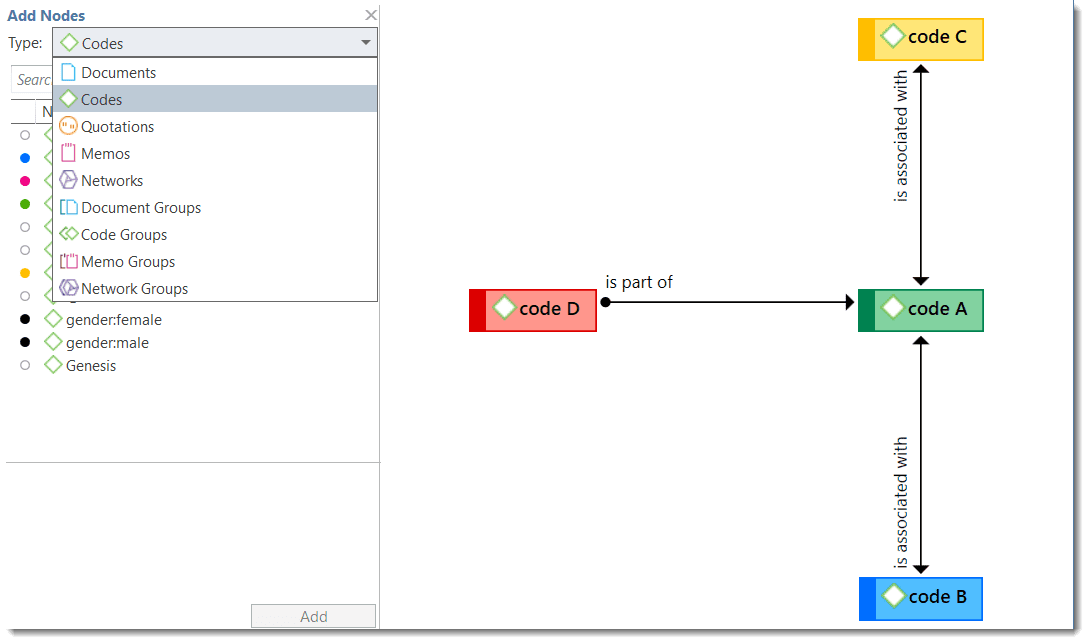
Adding Nodes Using the Selection List
Select the Nodes tab in the ribbon and from there the Add Nodes button.
 This opens a selection list that is docked to the left-hand side of the network. At the bottom of the selection list you see the comments of an entity. Use the search fields to find entities faster.
This opens a selection list that is docked to the left-hand side of the network. At the bottom of the selection list you see the comments of an entity. Use the search fields to find entities faster.
Select the entity type and then the entities that you want to add to the network. Double-click to add the entity to a network; or drag-and-drop the selected entities to the network; or click on the Add button.
Adding Nodes via Drag & Drop
You can add nodes by dragging entities into the network editor from entity managers, group managers, the margin, the project explorer, or any of the browsers.
Open a network and position it for example next to the Project Explorer.
Select the node(s) you want to import into the network and drag-and-drop them into the editor.
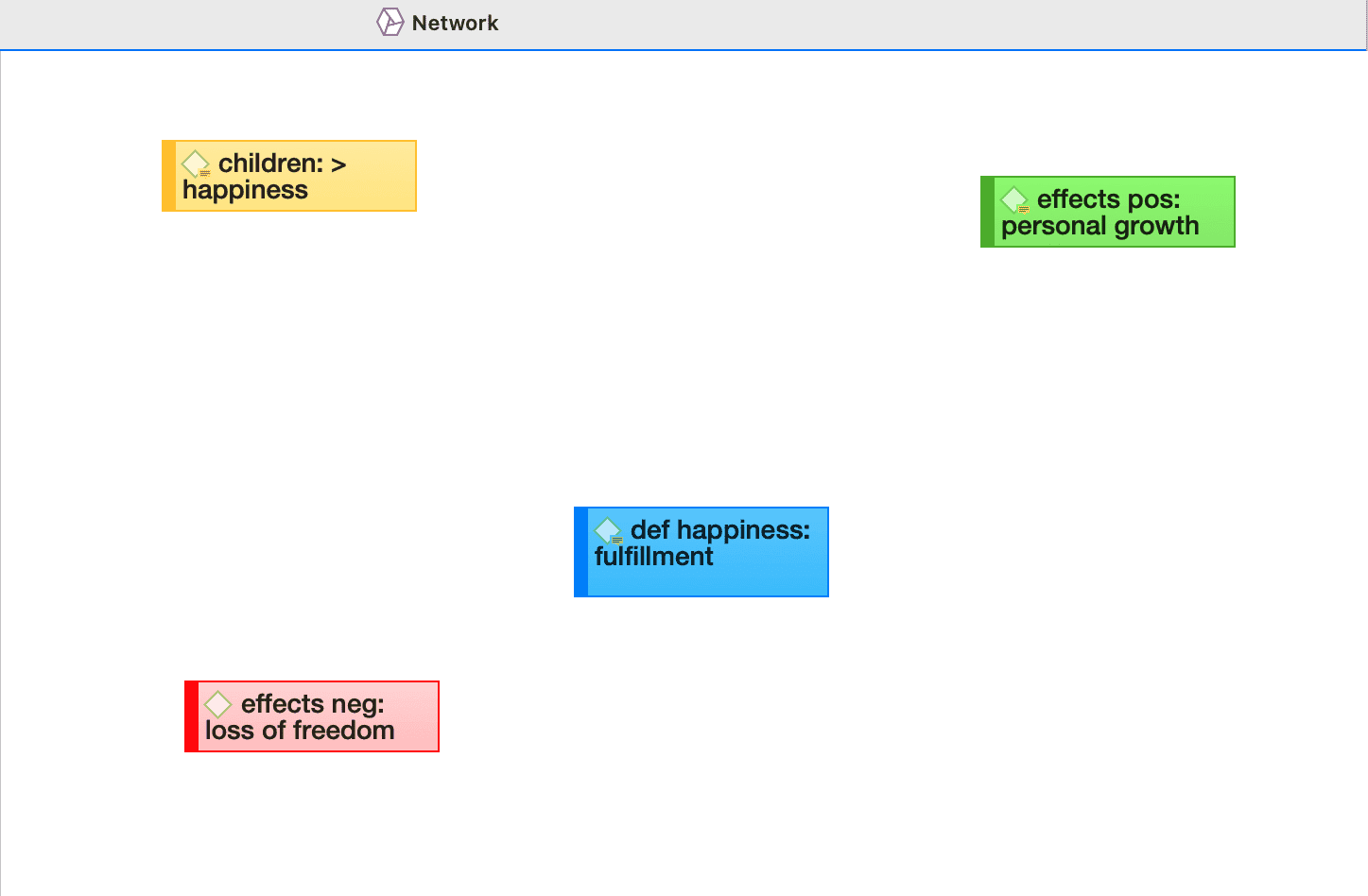
Selecting Nodes
Selecting nodes is an important first step for all subsequent operations targeted at individual entities within a network.
Selecting a Single Node
Move the mouse pointer over the node and left-click.
All previously selected nodes are deselected.
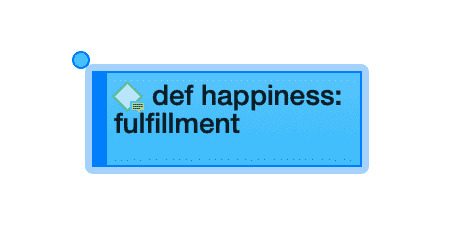
Selecting Multiple Nodes
Method 1
Hold down the Ctrl key on your keyboard, move the mouse pointer over the node and left click. Repeat this for every node you want to select.
Method 2
This method is very efficient if the nodes you want to select fit into an imaginary rectangle.
Move the mouse pointer above and left to one of the nodes to be selected. Hold down the left mouse button and drag the mouse pointer down and right to cover all nodes to be selected with the selection marquee. Release the mouse button.
Opening Ad-hoc Networks
An ad-hoc network is when you open a network on an entity. This will show the entity in a network with all the directly linked neighbors, except when you open a network for a document or multiple items. In the latter two cases, only the selected entities open in a network. More nodes can be added to such networks using different techniques. See Adding Nodes To Network and Adding Neighbors.
Select an entity in the margin area, a manager, the project explorer or any browser, right-click and select Show in Network. Another option is to select the Open Network button in the ribbon after selecting one or more entities in a manager.
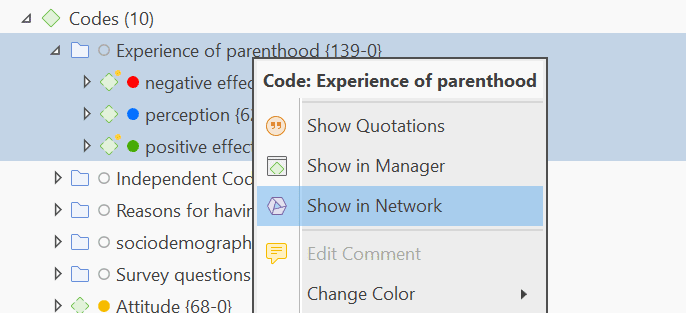
The nodes are initially placed using a default layout procedure, but can be rearranged manually or using any of the other layout procedures. See Layout And Routing.
Below you see an ad-hoc network of a folder containing three categories and their subcodes (Hierarchical layout: left-to-right):
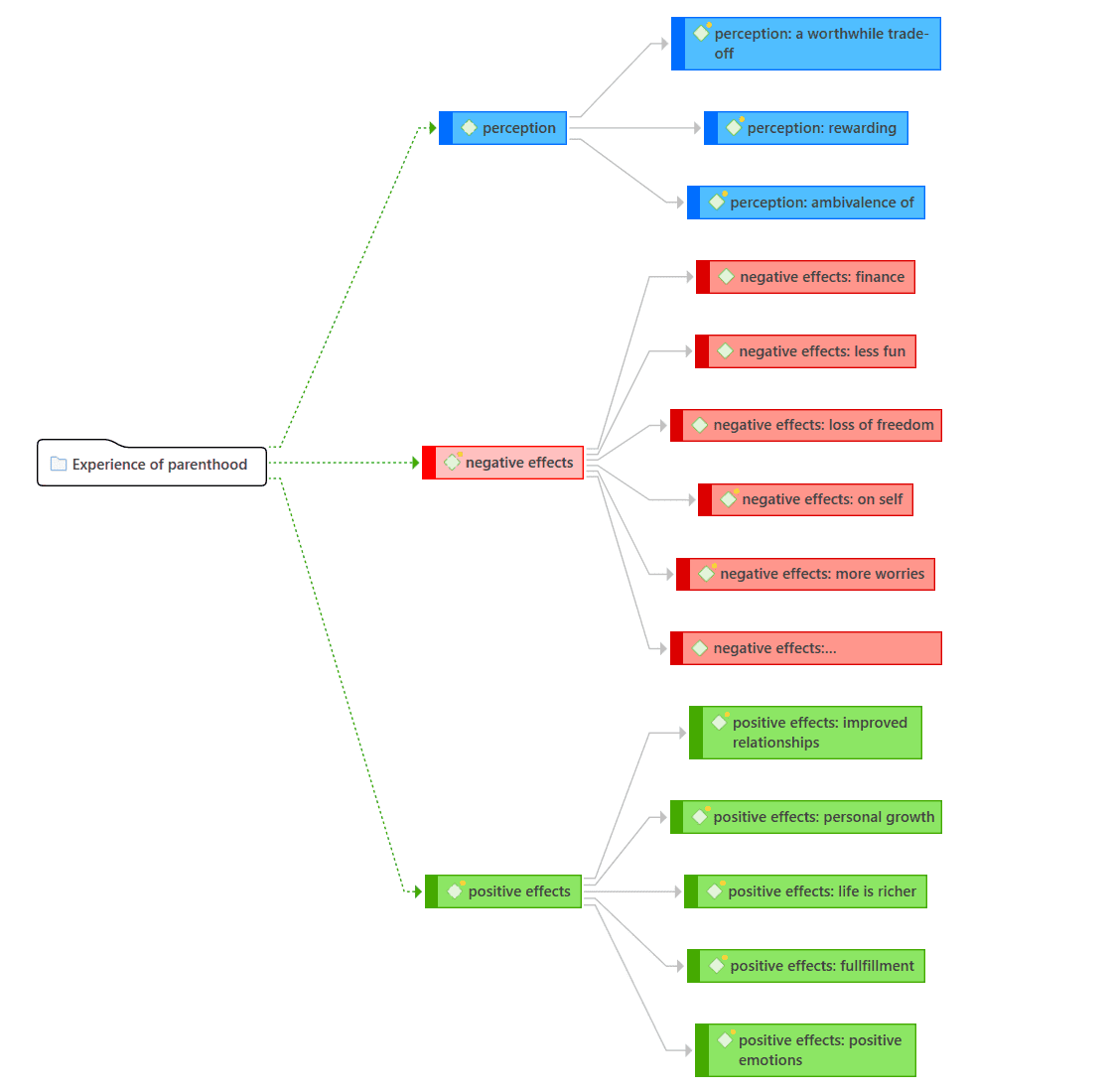
Each time a network is opened on a selected entity, a new network is created. There is no need to save it, as you can easily display it at any time by opening it again. If, however, you rearranged the nodes and want to preserve the new layout, or if you add or remove nodes, then you need to save it explicitly: To do so, select Save in the Network ribbon and enter a name for the network. Saved networks can be selected from the Project Explorer, the Network Manager, and the Networks Browser.
Linking Nodes and Entities
There are several ways to link nodes:
Linking via Drag & Drop
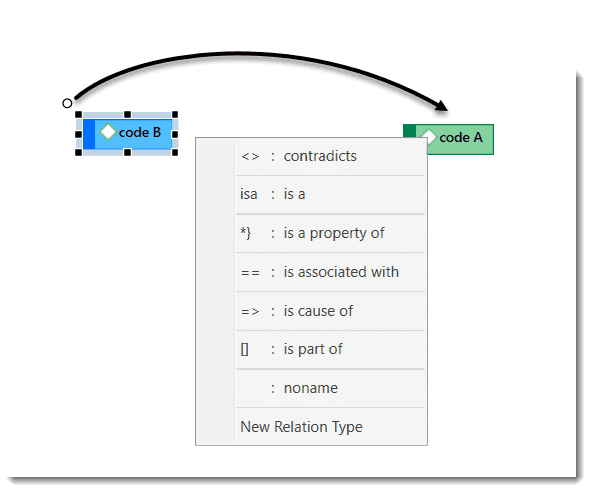
Select a node. A white dot appears in the top left corner of the node. Click on the white dot with the left mouse button and drag the mouse pointer to the node that you want to link.
Release the left mouse button on top of the node. If you link codes to codes or quotations to quotations, a list of relation opens. Select a relation.
The two nodes are now linked to each other. In case you linked two codes or two quotations to each other, the relation name is displayed above the line.
If none of the existing relations is suitable, select New Relation Type and create a new relation. The new relation will immediately be applied to the link.
Linking Two Nodes Using the Ribbon Icon

Select a node in a network and click on the Link button in the ribbon.
A black line appears. Move the end on top of another node and left-click.
If you link codes to codes or quotations to quotations, a list of relation opens. Select a relation.
You need to use the method for linking if you want to link more than two nodes at a time.
When you link two codes to each other, the Density counts goes up. For instance, if six source codes are linked to one target code, the density for the target code is 6; If the source codes have no other links, then their density count is 1. The density count for memos counts the connection to other memos and codes. If a memo is linked to two codes and one other memo, its density is 3.
Linking Three or More Nodes
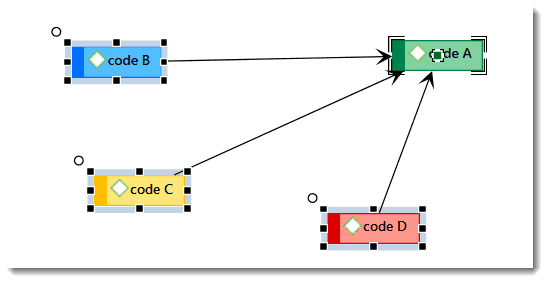
Select all nodes that you want to link to one other node. See Basis Network Procedures > Selecting Nodes for further information on how to select multiple nodes.
In the ribbon, click on the Link button. A black line appears. Move the end on top of the node you want the other nodes to be linked with and left-click. If you link codes to codes or quotations to quotations, a list of relation opens. Select a relation. Only one relation for all links can be selected.
Editing a Link
Move the mouse pointer to the line and left-click. The selected link label will be displayed boxed.
Right-click and open the context menu, or select the available options in the ribbon.
-
Open Network: opens a new network for the two nodes linked by this link.
-
Edit Comment: Use the comment field to explain why these two nodes are linked-
-
Flip Link: Use this option if you want to change the direction of a transitive or asymmetric link.
-
Cut Link: removes the link between the two nodes
-
Change Relation: Select a different relation from the list of available relations or create a new one and apply it.
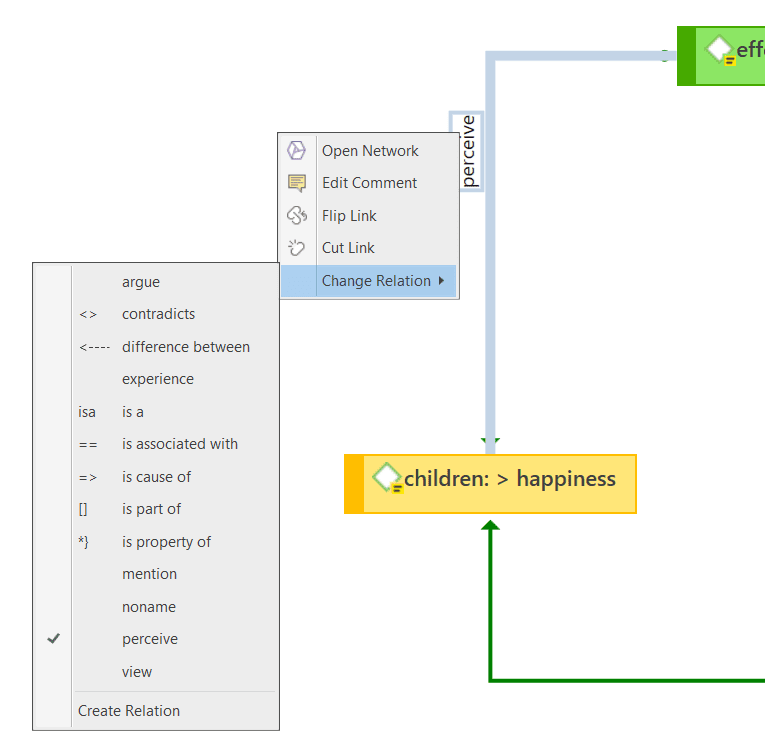
For second class links that do not have a name, only the cut link option is available.
Cutting Multiple Links
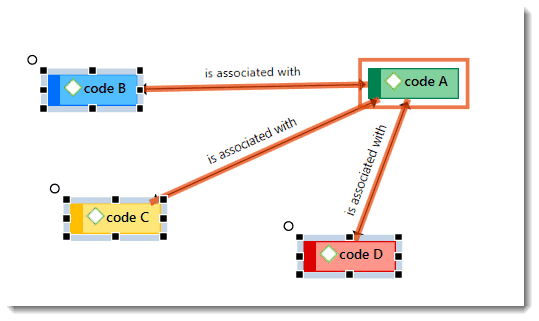
Select one or more nodes (= source) whose connections to another node (= target) you want to remove.
Click the Cut Links button in the ribbon and move the mouse pointer over the target node. If you do the target node is boxed, and the links to be cut are colored in orange. Click the left mouse button on the target node.
The links between nodes in a network are real connections between the entities. Therefore, creating and removing links should not be regarded as solely "cosmetic" operations. Links make permanent changes to the project.
Linking Codes to Codes, Quotations to Quotations, Memos to Memos in Managers and Browsers
Quotations, codes and memos can also be linked to each other in the Manager, the Project Explorer, or the respective entity browsers.
Select one or more source items in the list pane of the Manager, in the respective sub-branches of the Project Explorer, or in the entity browsers and drag them to the target item in the same pane.
Select a relation from the list of relations in case you link two codes or two quotations, or select New Relation Type and create a new relation.
Linking Entities of Different Types
When you code your data reading through a document, listening to audio data, viewing an image or video file, you are linking codes to quotations. This can also be done via drag & drop from the Project Explorer or any of the entity browsers to the list of codes or quotations in a manager.
This also applies to linking memos to codes, or memos to quotations.
Creating & Modifying Relations
User-defined relations are available for code-code and quotation-quotation links. All other links cannot be named.
New relations are created in the Relation Manager. You can define how a relation should look like in terms of color, width and line style. Further you can select the layout direction and the property. The property defines whether a relation is directed (transitive, asymmetric), or non-directed (symmetric). See About Relations.
Creating New Relations
Go to the Home tab, click on the drop-down arrow in the Links button and select Relations. Another option is to select the Relation Manager button in the ribbon of a network.
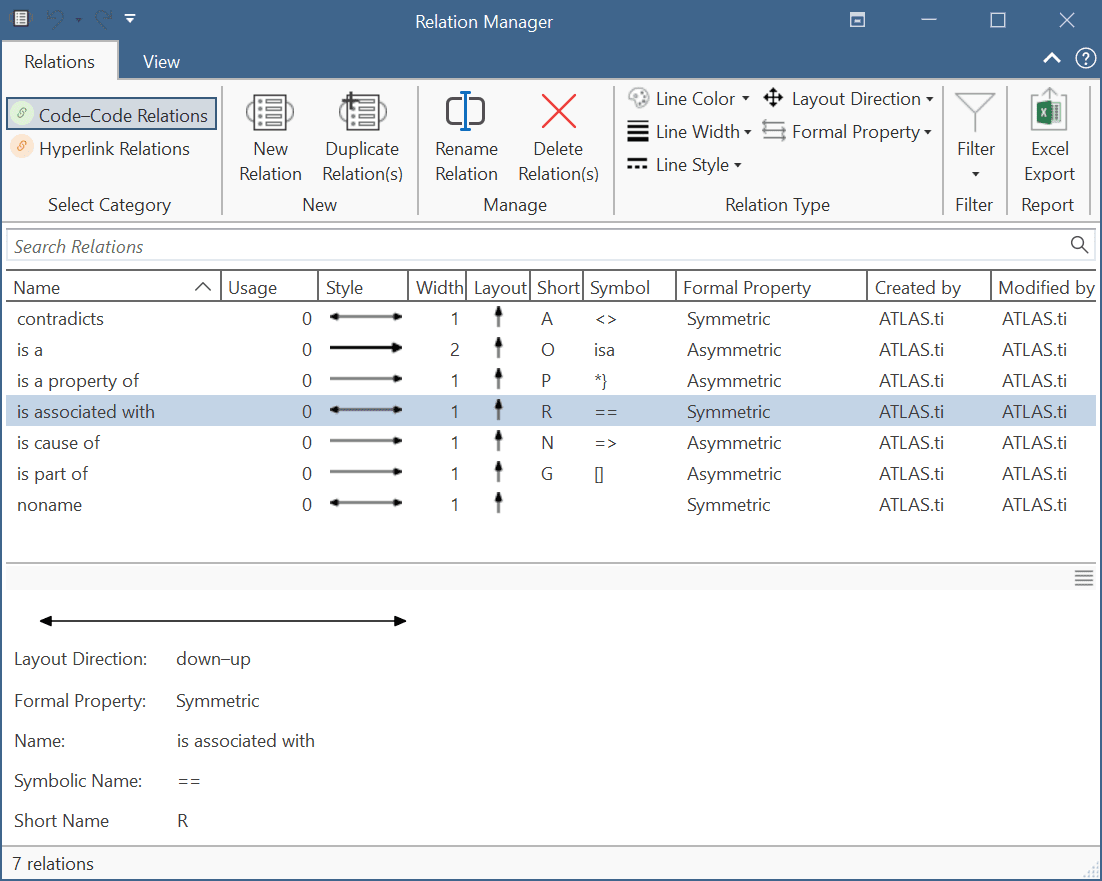
There are two Relations Managers, one for code-code relations and one for hyperlinks (quotation-quotation relation):
On the left-hand side in the ribbon of the relation manager, select either Code-Code Relations or Hyperlink Relations.
Click on the button New Relation.
Enter a name for the relation, select a color and a property. Then click Create. If you need more information on relation properties, see About Relations.
New relations are stored together with the project in which they are used. Thus, you can create a unique set of relations for each project.
Editing Existing Relations
To modify an existing relation, open the Relation Manager for codes or quotations (see above).
On the left-hand side in the ribbon of the relation manager, select either Code-Code Relations or Hyperlink Relations.
Select the relation that you want to modify and change its properties like the line color, the line width, the line style, layout direction or property. You can also rename the relation. You find all options in the ribbon of the Relation Manager.
If the relation you are modifying is already in use by the currently loaded project, the changes will take immediate effect and are stored along with the project when saving it.
Analytic Functions in Networks
The Network tool is an analytical tool in itself. You will learn a lot about your data by building conceptual networks. The two options that we would like to present here are:
- Add Neighbors
- Add Co-occurring Codes
These two options are the visual equivalent of the Code-Document Table and the Code Co-occurrence Table.
For both options it is often useful to set a global filter first as otherwise too many items are imported. This results in a very crowded network that might look nice but is of little analytical value. See Applying Global Filters.
Add Neighbors
The add neighbors option allows you to construct a connected network step-by-step. It imports all direct neighbors of the selected nodes into the network.
-
When applying it to document nodes, it is the visual equivalent to the Code Document Table. ATLAS.ti draws a blue lines between the codes, and the documents / document groups in which they occur.
-
When applying it to hyperlinks, it allows you to bring into a network all connected quotations.
-
When applying it to codes, you can successively bring in connected codes to support data modelling and theory building.
How to add neighbors
Select one or more nodes, right-click and select the option Add Neighbors from the context menu and then the type of entity that you want to import.
You also find the 'Add Neighbors' option in the Nodes ribbon of the network editor.
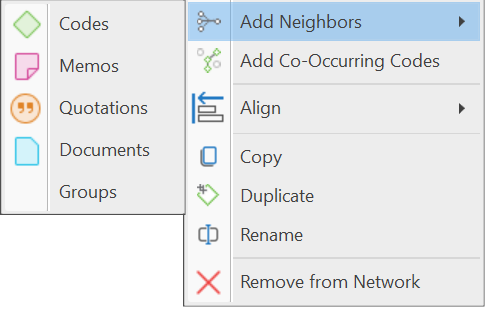
For documents when adding codes, make sure that Show Code-Document Connections is selected under the View tab in the ribbon.
Depending on the entity type, possible neighbors are:
- Documents
- Quotations
- Codes
- Memos
- Groups
The option all common imports all those that are applicable.
Application: Comparing Cases
Adding code neighbors to a document node, or a document group node allows creating case-based network. You can ask questions like: Which of the codes have been applied in which document or document groups. ATLAS.ti draws a blue lines between the codes, and the documents / document groups in which they occur. Make sure that Show Code-Document Connections is selected in the View options.
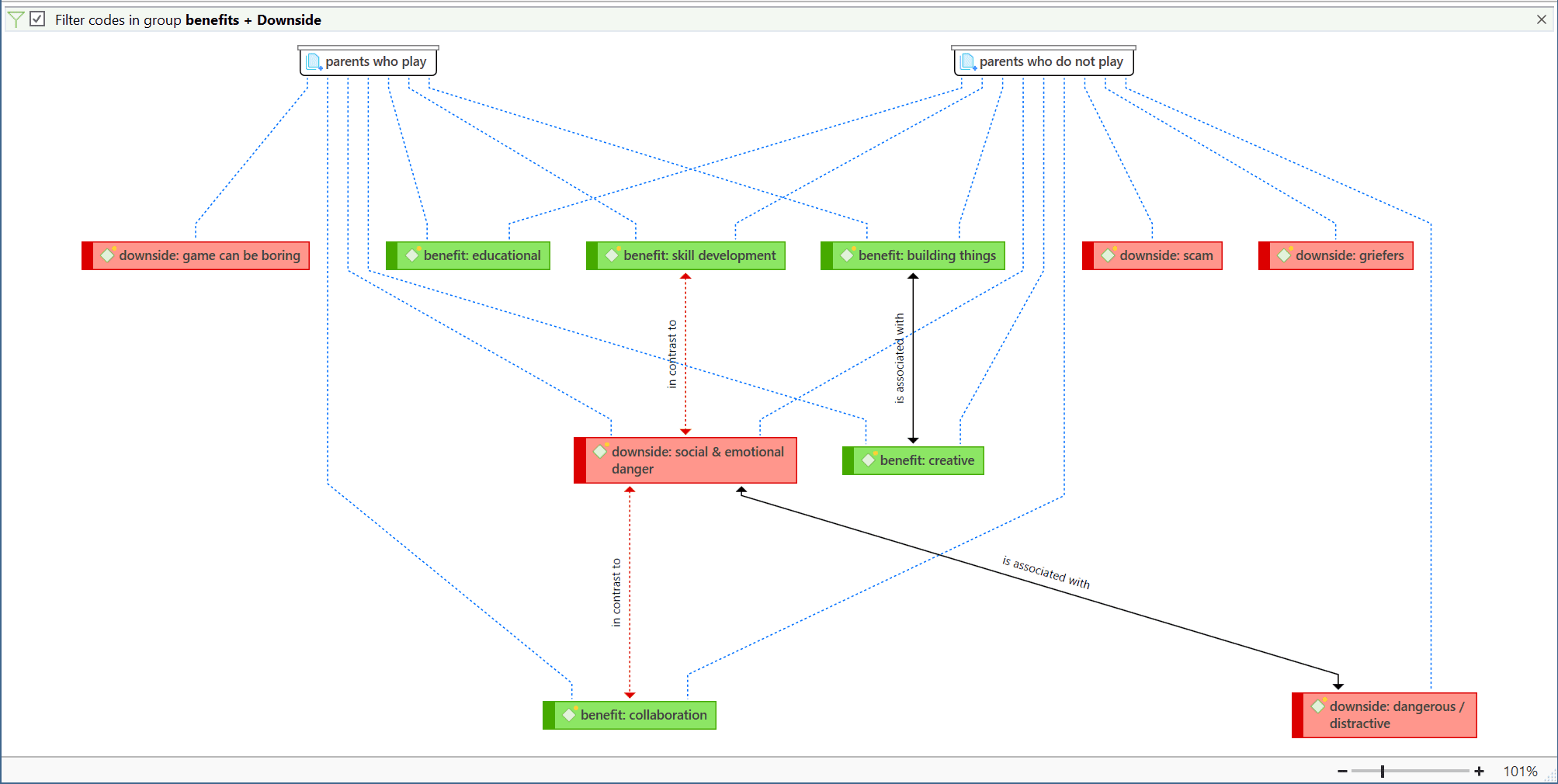
When you have applied lots of codes to a document, it is useful to set a global filter when adding codes. Otherwise, your network will be too crowded, and it will be difficult to interpret it or to see any meaningful pattern. See Applying global Filters.
Add Co-occurring Codes
The add co-occurring codes option is the visual equivalent of the Code Co-occurrence Tools. It allows you to explore code co-occurrence spatially, which is different from looking at numbers in a table, and different from exploring code co-occurrence in a Sankey diagram. The recommendation is to use these functions in combination to look at data from different perspectives in the sense of a triangulation.
Co-occurring codes are those that code the same or overlapping quotations. When importing co-occurring codes, ATLAS.ti checks all five possible ways that a code can co-occur:
-
quotations coded with a code A overlap quotations coded with a code B
-
quotations coded with a code A are overlapped by quotations coded with a code B
-
quotations coded with a code A occur within quotations coded with a code B
-
quotations coded with a code A enclose quotations coded with a code B
-
quotations coded with a code A code the same quotations coded with a code B
See Available Operators > Proximity Operators.
Select one or more codes in a network editor, right-click and select Add Co-occurring Codes. This option is also available from the Nodes ribbon.
tip
In order to achieve meaningful results, it is often useful to set a code group as global filter first. Think about which concepts you want to relate to each other and add those to a code group. See Applying Global Filters.
Below you see a network with global filter setting. Only the full colored nodes pass the filter. It helps you to focus on what is relevant in your network:
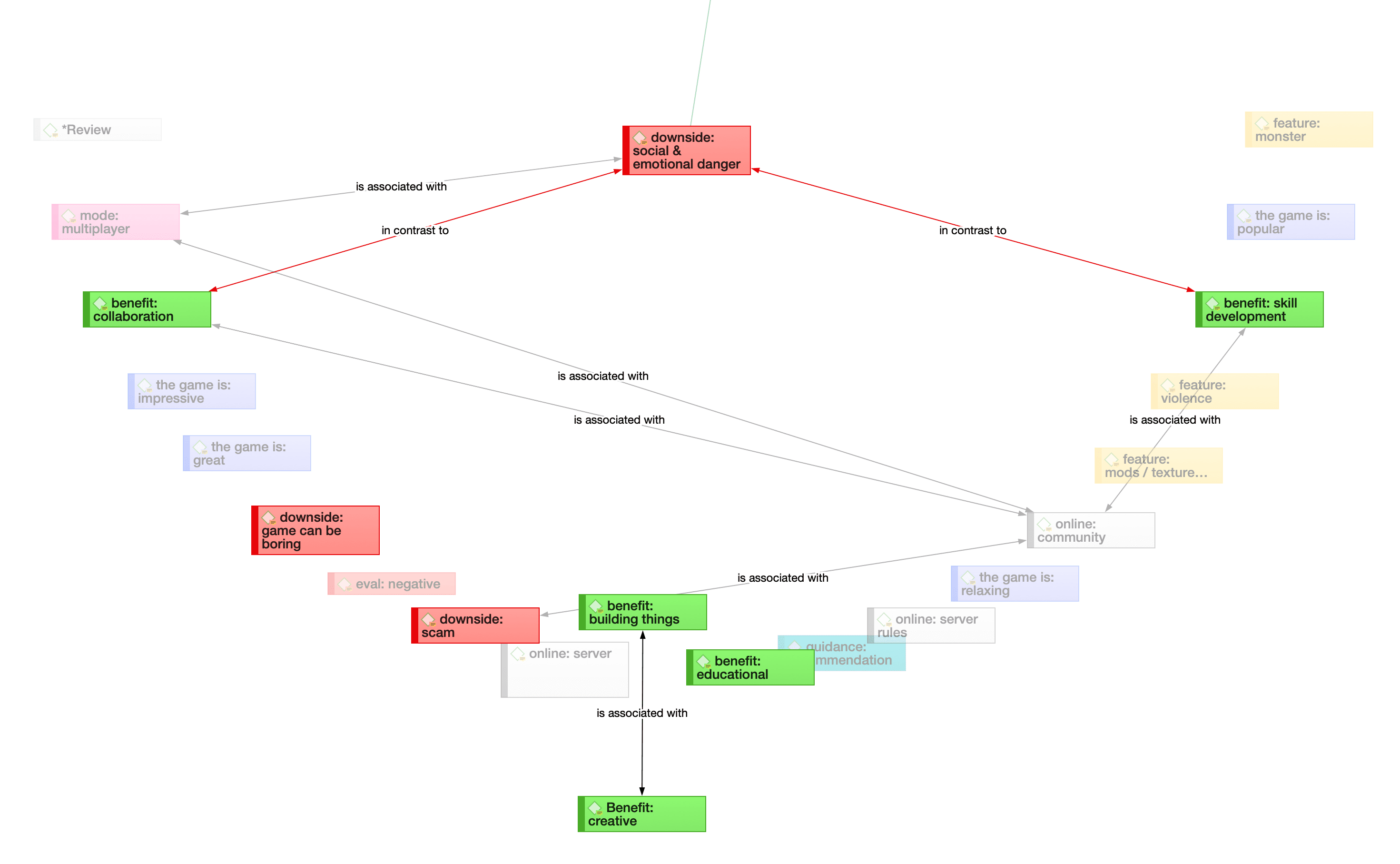
If you have no idea which codes co-occur, using the Code Co-occurrence Explorer is a good starting point. If you have a more specific idea which codes do co-occur, the Code Co-occurrence Table, and the "Add Co-occurring Codes" option in networks become more useful.
Exporting Networks
Networks can be saved as graphic file, or exported as XPS or PDF file, or printed.
Saving a Network as Graphic File
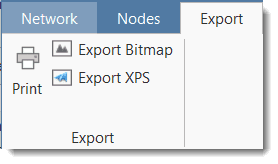
Open the network.
In the ribbon of the network, select the Export tab and then Export Bitmap.
When saving the file, you can choose among the following graphic file formats:
- *.png
- *.jpg
- *.gif
- *.tif
- *.bmp
Saving a Network in the Microsoft XPS format
The XPS format is Microsoft’s alternative to PDF.
To save a network in the Microsoft XPS format, select the Export XPS option.
Saving a Network in PDF format
If you want to create a PDF file, a PDF writer needs to be installed on your computer (e.g. Adobe).
To create a PDF file from your network, select the Print option and chose your PDF Writer as printer.
Network Editor - Further Options
Changing Code Color
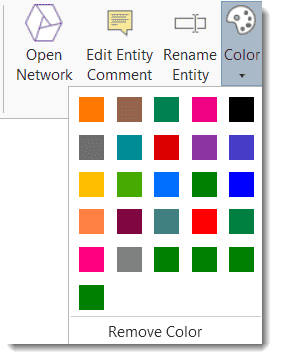
Select a code node. In the main network ribbon, click on the dropdown arrow below the color palette and select a color.
Merge Codes
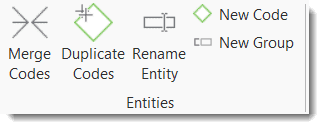
Select all code nodes that should be merged into another code. If you select multiple code notes, hold down the Ctrl-key.
Select the Nodes tab and click on the Merge button. Move the mouse pointer to the node with which you want to merge the selected code(s). You will see a light green frame around this node. When you left-click on the node, all the other selected code nodes will be merged.
Duplicate Codes
A duplicated code is an exact clone of the original code including color, comment, code-quotation links, code memo links and code-code links. Duplicating a code can be a useful option to clean up or modify a code system.
Select one or more codes in a network, select the Nodes tab and from there Duplicate Code(s) option. Duplicated codes have the same name plus a consecutive number, i.e. (2).
Create Groups
You can also create groups in networks. As everywhere else in the software, a group consists of entities of the same type. Thus, you can create a document group base don document nodes, a code group based on code nodes, a memo group based on memo nodes, and a network group based on network nodes. It is not possible to create a group that contains different entity types.
Select one or more nodes of the same entity type and click the New Group option in the Nodes tab.
Enter a name for the group and click Create. The group will be added to the network, and the linkages to its members are displayed.
Traversing Hyperlinks in Networks
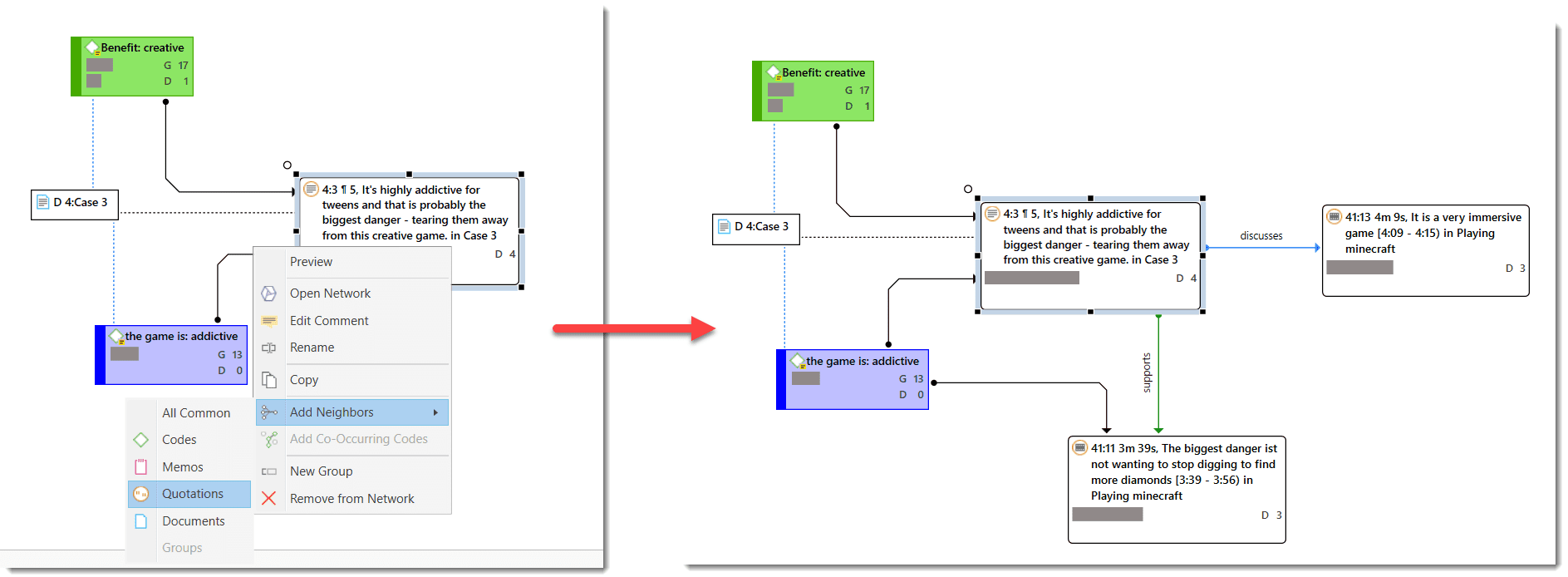
To expand the hyperlinks you see in a network, or to see which other entities are linked to a hyperlinked quotation, you can import its neighbors:
Right-click on a hyperlink and select Import Neighbors > Quotations.
Team Work
The kind of team work supported is asynchronous shared coding and analyzing. This means if you have a lot of data you can spread the coding work across different team members. Each team member codes parts of the data, and the work of all coders is put together via merging the various subprojects.
Each team member needs to work on his or her copy of the project. The location where the project data for each user is stored can be selected. However, this is always a personal, not a shared space. See Working with ATLAS.ti Libraries.
When working on a team project, team members must not edit documents (unless everyone works in different documents). If team members edit the same documents, these cannot be merged; instead they are duplicated. If document editing is necessary, this needs to be done by the project administrator in the Master project!
Workflow
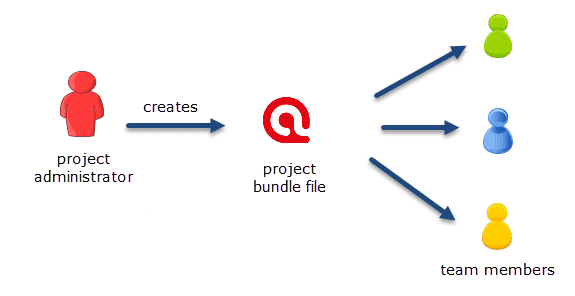
-
The project administrator sets up a Master project. See Creating a New Project.
-
The project administrator adds documents to the project and possibly a list of codes.
-
The project administrator saves the project and exports it. This means creating a project bundle file
-
All team members import the project bundle file and begin their work.
-
To combine the work of all team members, each team member creates a project bundle file and sends it to the project administrator.

-
The project administrator merges all subprojects, and creates a new Master file.
-
The project administrator exports the new Master file and distributes it to all team members. See Transfer Projects.
-
The team members continue their work.
This cycle continues. If new documents need to be added to the project, this needs to be done by the project administrator. A good time for doing this is after merging and before creating the new Master file.
You find step-by-step instructions here:
Important to Know
-
If all team members should work on the same documents, it is essential that only the project administrator is setting up the project adding all documents. Otherwise, the documents are duplicated or multiplied during the process of merging. See Adding Documents.
-
Team members must not edit documents. If they do, the edited documents cannot be merged, and you end up with duplicates. If document editing is necessary, this needs to be done by the project administrator in the Master project!
-
The location of where ATLAS.ti stores project related data can be determined by each user. See Working with ATLAS.ti Libraries.
-
Document libraries CANNOT be shared. Each person always works with her/his own copy of the data set within her/his own environment of ATLAS.ti.
Our support team will reject any repair requests that are caused by attempts to share libraries.
User Accounts
ATLAS.ti automatically creates a user account based on the name that you use on your computer.
To check who is currently logged in:
Select the Tool tab and select Manage Users.

The currently logged-in user is displayed in bold letters:
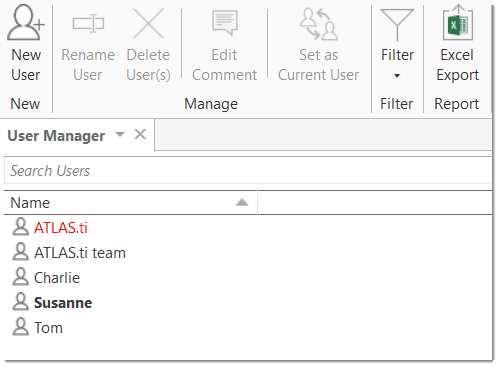
Change the Current User
Select the Tool tab and select Manage Users.
Select the User you who should be indicted as creator /modifier in the project from this moment onward and click Set as Current User.
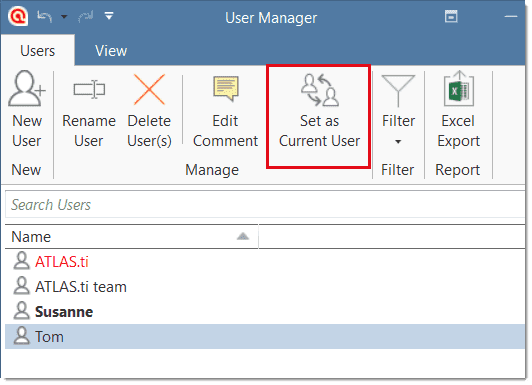
Creating a new user account
A reason for creating a new user account is if two persons on a team have the same name, or if you want to use a different name than the automatically assigned name.
Select the Tools tab and select Manage Users.
Click on the button New User, enter a name and click Create.
After creating a new account, select the Switch User option from the ribbon to log in using the new name.
Switching user accounts
Select the Tools tab and select Switch Users.
Select another user from the list.
When merging projects that come from different computers and that use the same username, the username will be duplicated, e.g., Tom and Tom (2). This means you can still distinguish the two users. However, it may be a bit cumbersome to always remember who is who.
Merging Users
Reasons for wanting to merge users:
- If you are using two computers, and you import a project from computer A into computer B, this results in the duplication of your own username. ATLAS.ti adds a (2) behind the duplicate username.
- You want to run and inter-coder agreement analysis and realize that there is something wrong with the usernames of the coders.
To merge two users drag the username that you want to get rid of onto the username that you want to keep.
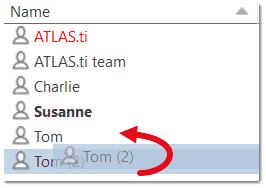
Setting Up a Team Project
When you work in a team with shared document and codes, you need to start with a MASTER project that contains all documents and codes that you want to share with your team. See Work Flow. If all team members start independently, you end up with duplicate documents and codes after merging the projects.

The instructions are organized by the various tasks involved when working in a team. Below you find operating instructions for project administrator. For team member instructions, see Tasks for Team Members.
Tasks of the Project Administrator
Creating and distributing the project
If you open ATLAS.ti, select the New Project button from the Welcome Screen.
Alternatively:
If a project is already open, select File > New > Create New Project.
Inst
Enter a project name and click Create.
Next, add everything that should be shared by the team:
-
add documents. See Adding documents to a project.
-
create document groups. See Working with groups.
-
add codes and code groups. You can prepare a list of codes including code descriptions, code groups and colors in Excel and import the Excel file. See Importing A List Of Codes.
If a common set of codes and code groups is to be used, they must be added to the project at this stage. If each team member were to add codes and code groups individually to each subproject, all codes and groups are multiplied during the merge.
To save a project, click on the Save icon in the Quick Access toolbar, or select File > Save (Short-cut: Ctrl+S).
Inst
To export the project for distribution to all team member, select File > Export. See also Project Transfer.
Inst
Distribute the project bundle file to all team members: e.g., via email, a folder on a server that everyone can access, or also via a cloud link or cloud folder.
The project bundle file shows the ATLAS.ti icon, has the file extension .atlproj and can be read by both ATLAS.ti Windows and Mac.
 The default name of the bundle is the project name + author and date. Renaming the bundle does not change the name of the project contained within the bundle. Think of the project bundle file as a box that contains your ATLAS.ti project plus all documents that you want to analyze. Putting a different label on the outside of the box will not change the name of the project file, which is contained inside the box.
Ask each team member to change the name of the project file when importing the project bundle, i.e. adding their name or initial to the project name, so that the projects of the various team members can easily be identified.
The default name of the bundle is the project name + author and date. Renaming the bundle does not change the name of the project contained within the bundle. Think of the project bundle file as a box that contains your ATLAS.ti project plus all documents that you want to analyze. Putting a different label on the outside of the box will not change the name of the project file, which is contained inside the box.
Ask each team member to change the name of the project file when importing the project bundle, i.e. adding their name or initial to the project name, so that the projects of the various team members can easily be identified.
Project bundle files can be shared via a cloud services like Dropbox, OneDrive, GoogleDrive, etc. Another option is to upload the project bundle file to a server of your choice and send a link to all team members so that they can download the file.
Team Project: Tasks for Team Members
As a team member you must not edit documents in a team project. If you do, the document cannot be merged later on, instead it will be duplicated. If text needs to be modified, this needs to be done in the Master Project by the project administrator.
ATLAS.ti automatically creates a user account based on your computer login when you start ATLAS.ti.
Check your username before you start working. Is this the name you want to use in the team project? If not, modify the name or create a new user account and log in with the new account. See User Accounts.
As team member, you receive a project bundle from the project administrator.
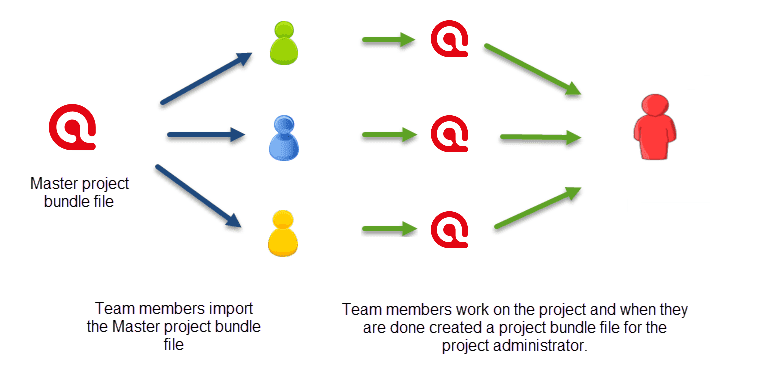
Save the project bundle file on your computer, or personal space on a server.
Open ATLAS.ti and select the Import Project button. If another project is currently open, select File > New > Import Project.
inst
Rename the project by adding your name or initials to the project name. This is important for the project administrator later when he or she merges the projects of all team members. If you forget this step, see below how you can rename a project after having imported it.
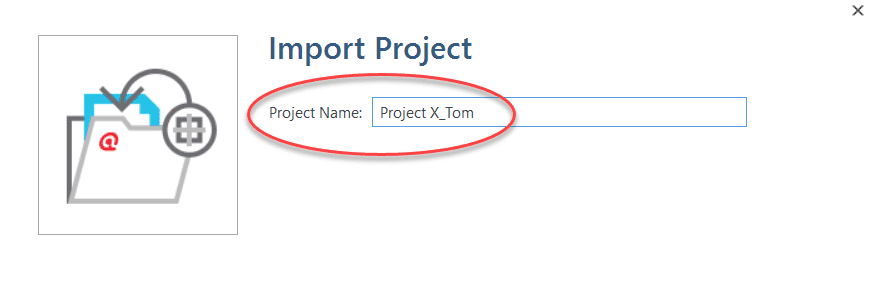
If this is the second or third time around that you import the Master project, the project name with the added coder name/initials already exists. ATLAS.ti will recognize this and offers the following two choices:
- Keep current project as a snapshot.
- Overwrite existing project.
As you previously exported your project to send it to the project administrator, you already have a backup of your project. Therefore, it will be OK in most cases to overwrite the existing project.

Make the appropriate choice and click Import.
After you have done some work on the project, you need to send it back to the project administrator for merging. This is what you need to do:
Select File > Export > Project Bundle. See Project Transfer.
The name of the exported bundle file will include your user name and the date, e.g. 'Project X_Tom (TM 2020-04-30)'.
Continue the cycle of project exchange and merging between project administrator and team members as needed.
Renaming Projects after Import
If you forgot to rename the project when importing it, you can change the name after it has been imported. You need to do this in the opening screen after starting ATLAS.ti or after closing all projects.
On the opening screen, right click on the project that you want to rename and select Rename Project.
If the project is already open, you need to close it to return to the opening screen.
Merging Projects
The Master project is the project into which another project, called the Import project is merged. The Master project has to be loaded first before invoking the Merge Project option.
The default option is to unify all entities that are identical, and to add all other items that do not yet exist in the Master project.
You can only merge ATLAS.ti desktop and ATLAS.ti Web projects if the projects contain different documents and codes. When merging entities, they need to have the same ID and this is only given if you start with a common Master project. As it is currently not possible to import a Desktop project into the Web version, you cannot share a Master project with a person using the Web version. Thus, even if you add the same documents and codes to both Desktop and Web project, the IDs for all entities will be different. When you merge these projects, all entities will be duplicated because they have different IDs rather than merged. Codes can be manually merged by the user, but you cannot merge documents manually.
Identical Entities Explained
When an entity is created in ATLAS.ti - regardless if it is a document, a code, a quotation, a memo, a network, a group, or a comment - this entity receives a unique ID, comparable to a fingerprint.
When merging projects, ATLAS.ti compares the IDs of the various entities. If they have the same ID, they are unified. If the ID is not the same, they are added. Thus, the name of an entity is not the decisive factor.
For example: If a user Tom has created a code with the name sunshine, and a user Anne also has created a code with the same sunshine in her project, these two codes are not identical as they have been created on different computers and in different project. Therefore, they will have a different ID.
If you merge Tom's and Anne's project, the merged project will contain two codes: sunshine and sunshine (2). If the meaning of both codes is the same, and you want to keep one sunshine code only, you can merge the two codes manually. See also Housekeeping below.
Groups are Additive
A Group B with documents {1, 2, 3} in the Master project merged with a Group B containing documents {3, 4} in the Import project will result in Group B= {1, 2, 3, 4} in the merged project.
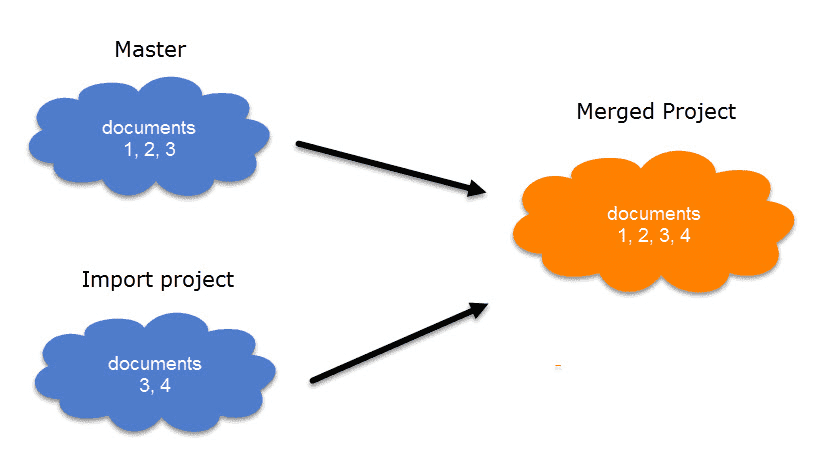
Entities with and without Comments
If there is a code C in the Master project that has no comment, and a code C in the Import project that has a comment, the merged procedure will add this comment to the merged project.
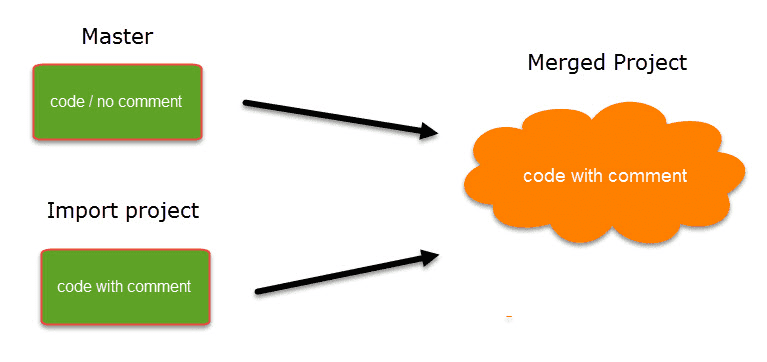 In the case of an unsolvable conflict - code C in the Master project has a comment, and code C in the Import project also has a comment - the user can define which of the two conflicting entities will win.
In the case of an unsolvable conflict - code C in the Master project has a comment, and code C in the Import project also has a comment - the user can define which of the two conflicting entities will win.
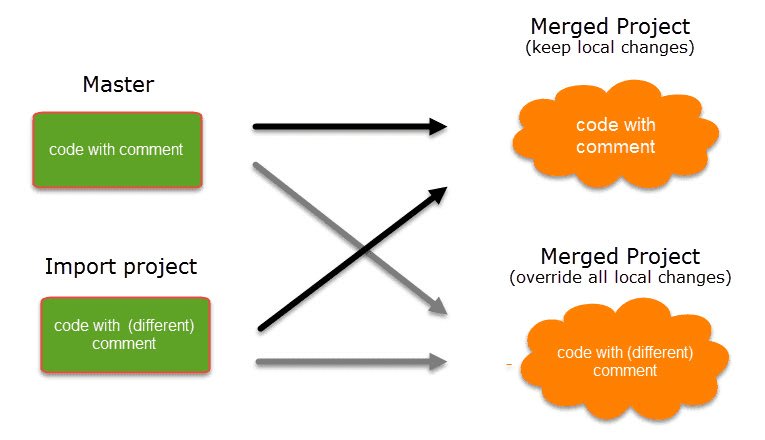 If the comment of the Master project should be kept, you need to select the option Keep. If the comment of the Import project should be kept, you need to select the option Override.
If the comment of the Master project should be kept, you need to select the option Keep. If the comment of the Import project should be kept, you need to select the option Override.
Currently you can only decide for all conflicts whether the Master project should "win", or the import project.
Handling of Deleted Entities
It is not possible to "subtract" entities.
If one team member has deleted a code or some codings, and these entities still exist in another project, the merged project will contain those codes or codings again.
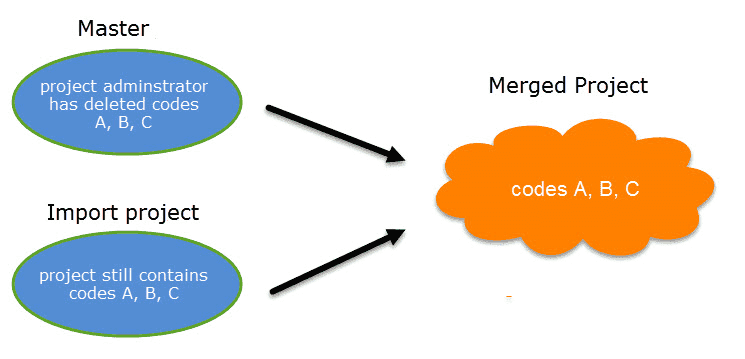 If you want to clean up a project, this is best done in a fresh Master-project after merging and before distributing the new Master-file to all team members.
If you want to clean up a project, this is best done in a fresh Master-project after merging and before distributing the new Master-file to all team members.
How to Merge
The Merge Tool reunites projects that were originally divided for analytical or economic reasons. It brings together the contributions of different members of a research team.
Before you merge, the recommendation is that you import all project bundle files first and take a look at the projects. If a conflict arises during the process of merging, you need to decide whether to keep the version in the Master or the Import project. If you do not know what is contained in import project, you cannot make an informed decision. Principally, it is possible to merge project bundle files without importing them prior to merging.
To begin the merge process:
Open the Master project.
Select File > Merge.
You have the option to select either a project, or a project bundle file.
If you have previously imported the bundle files of all team members, select Merge Project, otherwise Merge Project Bundle.
Select a project from the list offered by ATLAS.ti, or load a project bundle file.
If you have a long list of projects, just enter the first few letters of the project name into the Search field.
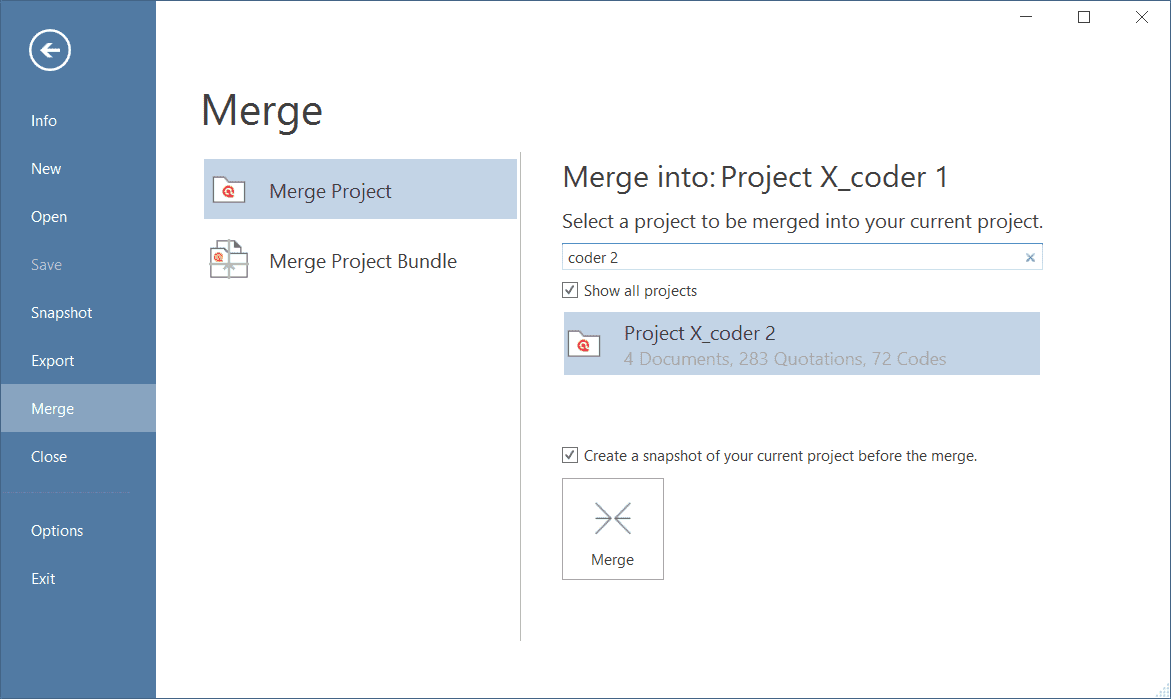
You have the option to create a snapshot of the current project before merging. There may be times, when you want or need to go back to an older version of your project. The default name for snapshot project is: project name (Snapshot--date-time).
After selecting a project or project bundle, click on the Merge button.
ATLAS.ti checks the two projects for identical and different items. After this process is completed, you see a Pre-Merge Summary.
If there are no conflicts, you can proceed with merging the two projects by clicking Merge.
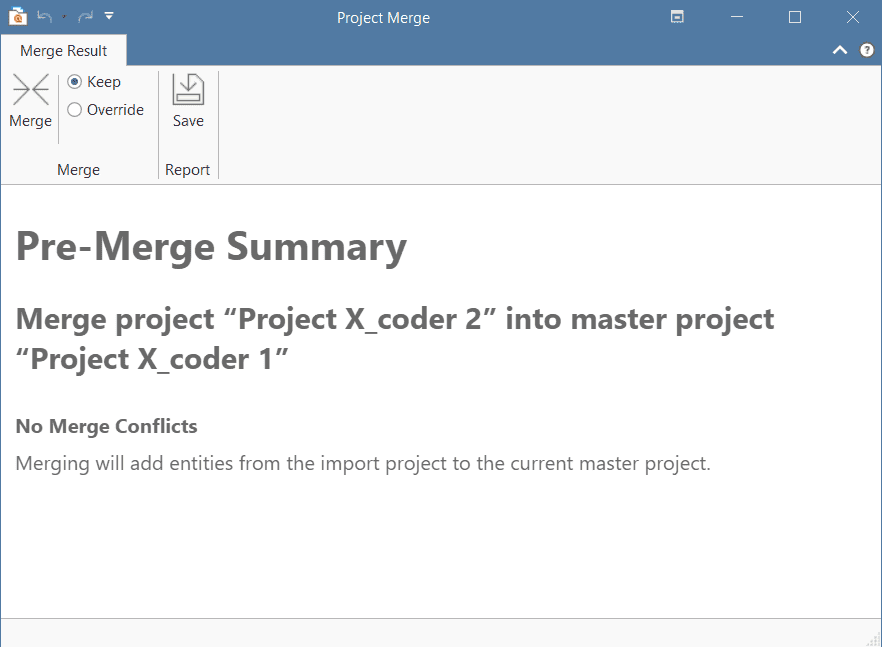 If there are conflicts between the Master project, and the project that you import, you can solve the conflict in two ways:
If there are conflicts between the Master project, and the project that you import, you can solve the conflict in two ways:
- Keep: the Master project 'wins', and the changes made in the Import project are ignored.
- Override: the version in the Master project will be overridden, and the changes made in the Import project 'win'. If all team members have been coding different documents, merge conflicts are unlikely to occur.
A conflict could arise, for instance, if someone changed the code colour, comment or code name. As project administrator, you will have to decide whether to accept these changes or not. In the example below the code color for a number of codes and two code labels are different in the Master and Import project. The project administrator has decided to keep the changes from the import project and selected Override. All entries in the column Import are shown in bold as this is what will be used in the merged project.
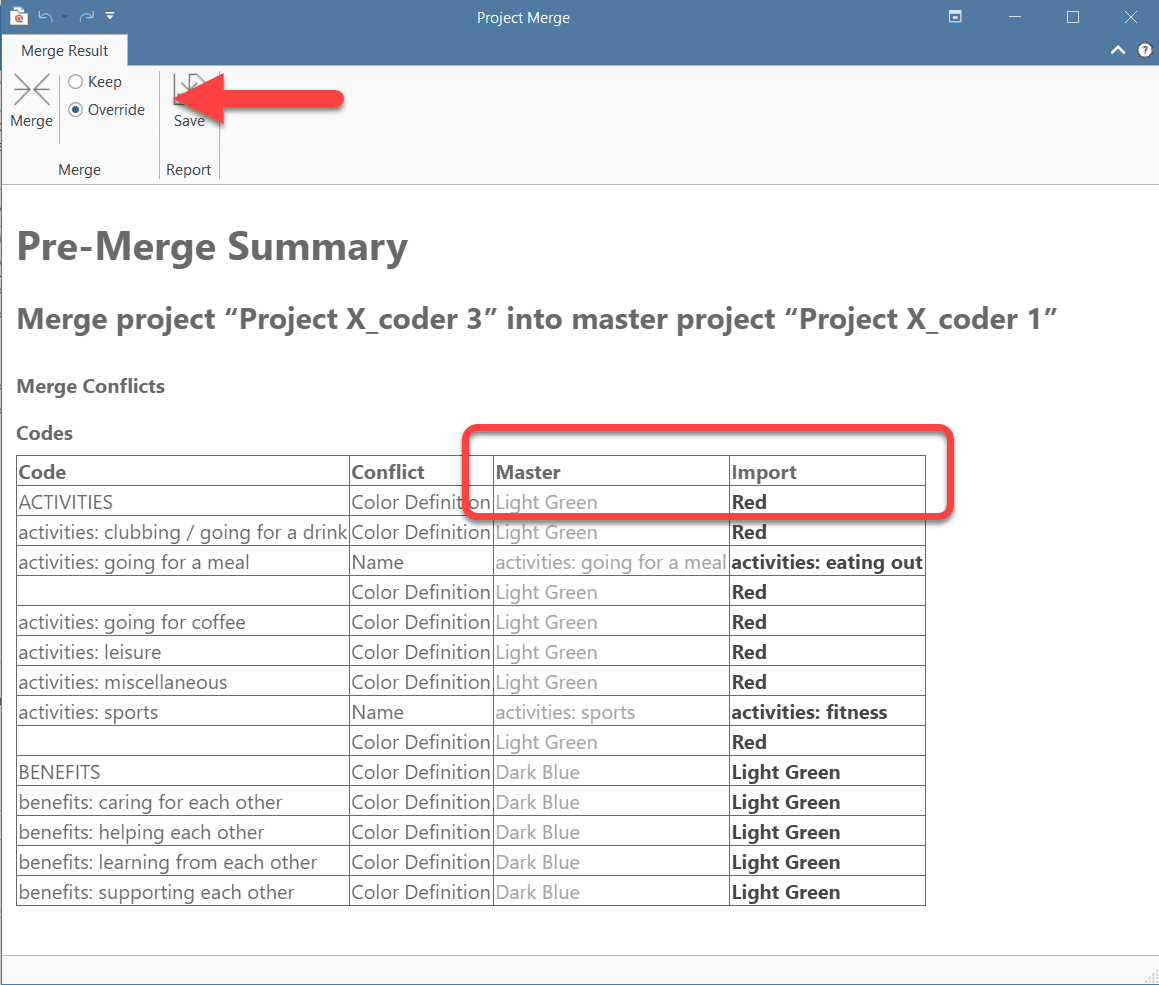
You currently cannot chose for each conflict how to solve it. All conflicts need to be solved by either selecting the strategy 'keep', or the strategy 'override'.
inst
After merging, check the final merge report, and the merged project for plausibility. If you are satisfied with the results, save the project. If not, you can always select Undo.
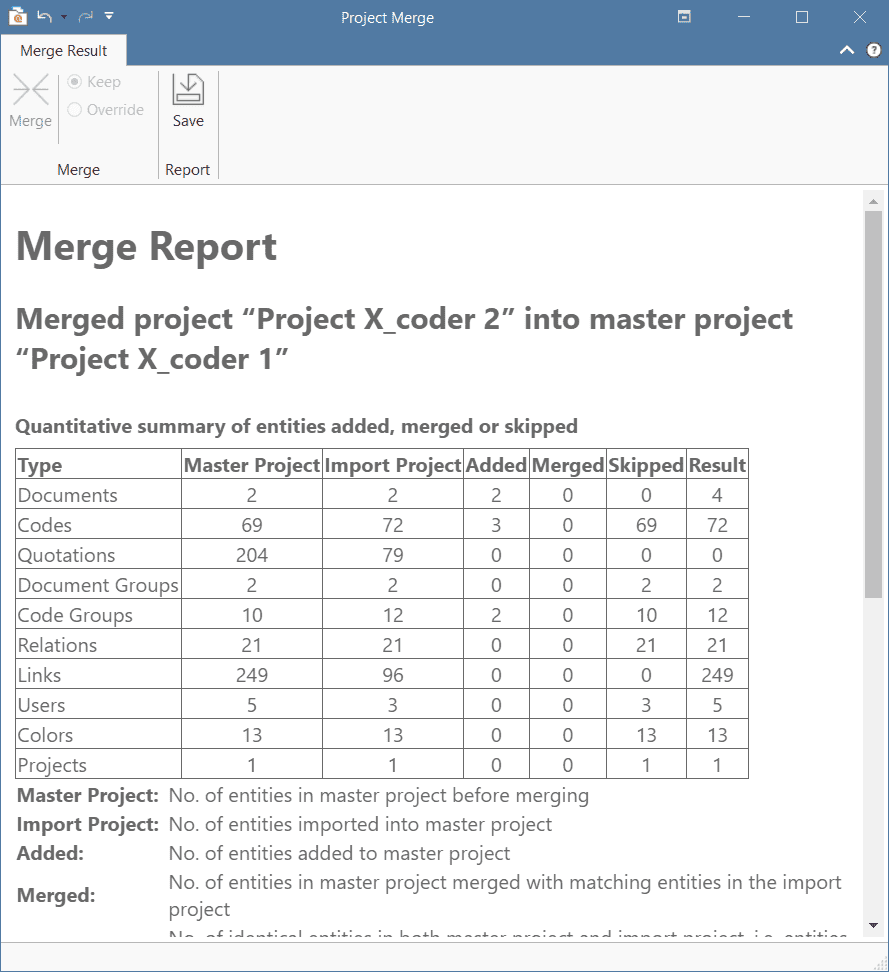
If applicable, continue with merging the next subproject or project bundle file.
A common mistake is that team members set up their own projects, adding documents and codes. This will result in duplicated documents and codes after merging. Issues around duplicated codes you can solve yourself by merging those codes (see below Housekeeping). You can however not merge duplicated documents. Please follow the recommended workflow described under Team Work.
Housekeeping
After merging all projects, the project administrator may need to perform some housekeeping work, such as:
- cleaning up the code list
- adding or modifying code groups
- adding a memo with information for the team
- adding new documents and document groups
Merging Duplicate Codes
You need to do some housekeeping if you find duplicate codes in the merged project. This can happen, for instance, if team members independently have added codes that have the same name. As these codes have been created in different projects, they have different IDs, and therefore they are added, not merged. The naming convention for duplicate codes is as follows:
- code A
- code A (2)
Duplicate codes can be merged as follows:
Open the Code Manager. Highlight the codes that you want to merge, right click and select the Merge Codes option from the context menu, or click on the Merge Codes button in the ribbon.
Merging Users
If you realize that usernames have been duplicated during the merge process, you can merge them as follows:
Select the Tools tab and from there Manage Users.
To merge two users drag the username that you want to get rid of onto the username that you want to keep.

Inter-coder Agreement (ICA)
You can test inter-coder agreement in text, audio and video documents. Image documents are not supported. This also applies to image quotations in text PDF documents.
As you need to start from a common Master project when setting up a project for ICA analysis, you cannot check for inter-coder agreement if one of the coders is using the Web version. All coders need to use the desktop version (Mac or Windows). For a more detailed explanation, see Merging Projects.
Why It Matters
The purpose of collecting and analyzing data is that researchers find answers to the research questions that motivated the study in the first place. Thus, the data are the trusted ground for any reasoning and discussion of the results. Therefore, the researchers should be confident that their data has been generated taking precaution against distortions and biases, intentional or accidental, and that the mean the same thing to anyone who uses them. Reliability grounds this confidence empirically (Krippendorff, 2004).
Richards (2009) wrote: "But being reliable (to use the adjective) beats being unreliable. If a category is used in different ways, you will be unable to rely on it to bring you all the relevant data. Hence, you may wish to ensure that you yourself are reliably interpreting a code the same way across time, or that you can rely on your colleagues to use it in the same way" (p. 108).
There are two ways to rationalize reliability, one routed in measurement theory, which is less relevant for the type of data that ATLAS.ti users have. The second one is an interpretivist conception of reliability. When collecting any type of interview data or observations, the phenomena of interest usually disappears right after it has been recorded or observed. Therefore, the analyst's ability to examine the phenomena relies heavily on a consensual reading and use of the data that represent the phenomena of interest. Researchers need to presume that their data can be trusted to mean the same to all of their users.
This means "that the reading of textual data as well as of the research results is replicable elsewhere, that researchers demonstrably agree on what they are talking about. Here, then, reliability is the degree in which members of a designated community agree on the readings, interpretations, responses to, or uses of given texts or data. [...] Researchers need to demonstrate the trustworthiness of their data by measuring their reliability" (Krippendorff, 2004, p. 212).
Testing the reliability of the data is a first step. Only after establishing that the reliability is sufficiently high, it makes sense to proceed with the analysis of the data. If there is considerable doubt what the data mean, it will be difficult to justify the further analysis and the results of this analysis.
ATLAS.ti's inter-coder agreement tool lets you assess the agreement of how multiple coders code a given body of data. In developing the tool we worked closely together with Prof. Klaus Krippendorff, one of the leading experts in this field, author of the book Content Analysis: An Introduction of Its Methodology, and the originator of the Krippendorff's alpha coefficient for measuring inter-coder agreement.
The need for such a tool as an integrated element in ATLAS.ti has long been evident and has been frequently requested by users. By its nature, however, it could not and cannot be a magic "just click a button and hope for the best" solution kind of tool. If you randomly click on any of the choices that ATLAS.ti offers to calculate an inter-coder agreement coefficient, ATLAS.ti will calculate something. Whether the number you receive will be meaningful and useful depends on how you have set up your project and the coding.
This means if you want to test for inter-coder agreement, it requires at least a minimal willingness to delve into the basic theoretical foundations of what inter-coder agreement is, what it does and can do, and what it cannot do. In this manual, we provide some basics, but this cannot be a replacement for reading the literature and coming to understand the underlying assumptions and requirements for running an inter-coder agreement analysis.
Please keep in mind that the inter-coder agreement tool crosses the qualitative-quantitative divide. Establishing inter-coder agreement has its origin in quantitative content analysis (see for instance Krippendorff, 2018; Schreier, 2012). If you want to apply it and want to adhere to scientific standards, you must follow some rules that are much stricter than those for qualitative coding.
If you want to develop a code system as a team, yes, you can start coding independently and then see what you get. But this approach can only be an initial brainstorming at best. It cannot be used for testing inter-coder agreement.
A good time for checking inter-coder agreement is when the principal investigator has built a stable code system and all codes are defined. Then two or more additional coders that are independent of the person who developed the code system code a sub-set of the data. This means, this is somewhere in the middle of the coding process. Once a satisfactory ICA coefficient is achieved, the principal investigator has the assurance that his or her codes can be understood and applied by others and can continue to work with the code system.
Literature
Guba, Egon G. and Lincoln, Yvonna S. (2005). Competing paradigms in qualitative research, in Denzin, N. and Lincoln, Y.S. (eds) The Sage Handbook of Qualitative Research, 191–225. London: Sage.
Harris, Judith, Pryor, Jeffry and Adams, Sharon (2006). The Challenge of Intercoder Agreement in Qualitative Inquiry. Working paper.
Krippendorff, Klaus (2018). Content Analysis: An Introduction to Its Methodology. 4th edition. Thousand Oaks, CA: Sage.
MacPhail, Catherine, Khoza, Nomhle, Abler, Laurie and Ranganathan, Meghna (2015). Process guidelines for establishing Intercoder Reliability in qualitative studies. Qualitative Research, 16 (2), 198-212.
Rolfe, Gary (2006). Validity, trustworthiness and rigour: quality and the idea of qualitative research. Methodological Issues in Nursing Research, 304-310.
Richards, Lyn (2009). Handling Qualitative Data: A Practical Guide, 2nd edn. London: Sage.
Schreier, Margrit (2012). Qualitative Content Analysis in Practice. London: Sage.
ICA - Requirements For Coding
If you are not yet familiar with the coding process in ATLAS.ti, please see Coding Data
Sources for unreliable data are intra-coder inconsistencies and inter-coder disagreements.
To detect these, the coding process needs to be replicated. Replicability can be assured when several independently working coders (at least two) agree:
- on the use of the written coding instruction
- by highlighting the same textual segments to which the coding instructions apply
- by coding them using the same codes, or by identifying the same semantic domains that describe them and code them using the same codes for each semantic domain.
Semantic Domains
A semantic domain is defined as a set of distinct concepts that share common meanings. You can also think about them as a category with sub codes.
Examples of semantic domains are:
EMOTIONS
- emotions: joy
- emotions: excitement
- emotions: surprise
- emotions: sadness
- emotions: anger
- emotions: fear
STRATEGIES
- strategies: realize they are natural
- strategies: have a Plan B
- strategies: adjust expectations
- strategies: laugh it off
- strategies: get help
ACTOR
- actor: partner
- actor: mother
- actor: father
- actor: child
- actor: sibling
- actor: neighbour
- actor: colleague
Each semantic domain embraces mutually exclusive concepts indicated by a code. If you code a data segment with 'emotions: surprise', you cannot code it also 'emotions: fear'. If both are mentioned close to each other, you need to create two quotations and code them separately. You can however apply codes from different semantic domains to one quotation. See multivalued coding below.
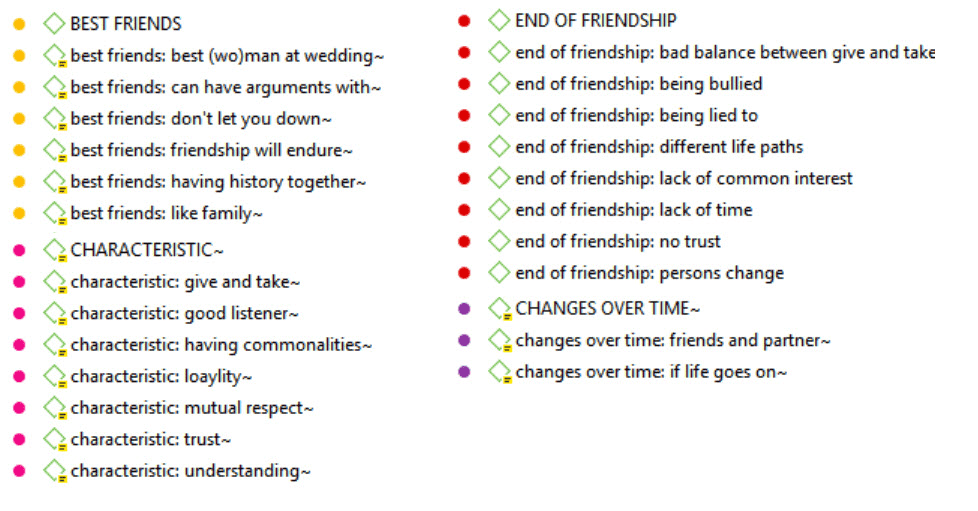
Semantic domains are context dependent
At times, it might be obvious from the domain name what the context is. The sub code 'good listener' in the image above belongs to the context 'Characteristics (of friendship)', and it is not about conversations with work colleagues. If the context is still unclear and could be interpreted in different ways, you need to make it unambiguous in the code definition.
Semantic domains need to be conceptually independent
Conceptual independence means:
- a sub code from one domain is only specific for this domain. It does not occur in any other domain.
- thus, each code only occurs once in the code system
This is also a rule that you should generally apply when building a code system. See Developing a Code System.
Therefore, as semantic domains are logically or conceptually independent of each other, it is possible to apply codes from different semantic domains to the same or overlapping quotations. For instance, In a section of your data, you may find something on the benefits of friendship, and some emotional aspects that are mentioned. As these codes come from different semantic domains (BENEFITS and EMOTIONS), they can both be applied.
Developing the Code System and Semantic Domains
Semantic domains can be developed deductively or inductively. In most studies applying a qualitative data analysis approach, development is likely to be inductive. This means, you develop the codes while you read the data step by step. For example, in an interview study about friendship, you may have coded some data segments 'caring for each other', 'supporting each other' and 'improve health and longevity'. Then you realize that these codes can be summarized on a higher level as 'BENEFITS OF FRIENDSHIP'. Thus, you set up a semantic domain BENEFITS with the sub codes:
- benefits: caring for each other
- benefits: supporting each other
- benefits: improve health and longevity
You continue coding and come across other segments that you code 'learning from each other'. As this also fits the domain BENEFITS, you add it to the domain by naming it:
- benefits: learning from each other
And so on. This way you can build semantic domains step by step inductively while developing the code system.
Once the code system is ready, and the code definitions are written in the code comment fields, you can prepare the project for inter-coder agreement testing. At this stage, you can no longer expand a semantic domain. See Project Setup.
When developing a code system, the aim is to cover the variability in the data so that no aspect that is relevant for the research question is left-out. This is referred to as exhaustiveness. On the domain level this means that all main topics are covered. On the sub code level, this means that the codes of a semantic domain cover all aspects of the domain, and the data can be sorted in the available codes without forcing them. An easy way out is to include a catch-all 'miscellaneous' code for each domain into which coders can add all data that they think does not fit anywhere else. However, keep in mind that such catch-all codes will contribute little to answering the research questions.
Rules for Applying Codes
- codes from one domain need to be applied in a mutually exclusive manner.
- codes from multiple semantic domains can be applied to the same or overlapping data segments.
Mutual exclusiveness: You can only apply one of the sub codes of a semantic domain to a quotation or to overlapping quotations. Using the same code colour for all codes of a semantic domain will help you to detect possible errors.
If you find that you have coded a quotation with two codes from the same semantic domain, you can fix it by splitting the quotation. This means, you change the length of the original quotation and create one new quotation, so you can apply the two codes to two distinct quotations.

If codes within a semantic domain are not applied in a mutually exclusive manner, the ICA coefficient is inflated - and in the current implementation of the tool cannot be calculated!
Multi-Valued Coding: This means that you can apply multiple codes of different semantic domains to the same quotation. For instance, a respondent talks about anger in dealing with her mother and mentions that she had to adjust expectations, this can be coded with codes from the three semantic domains EMOTIONS; ACTOR and STRATEGIES.
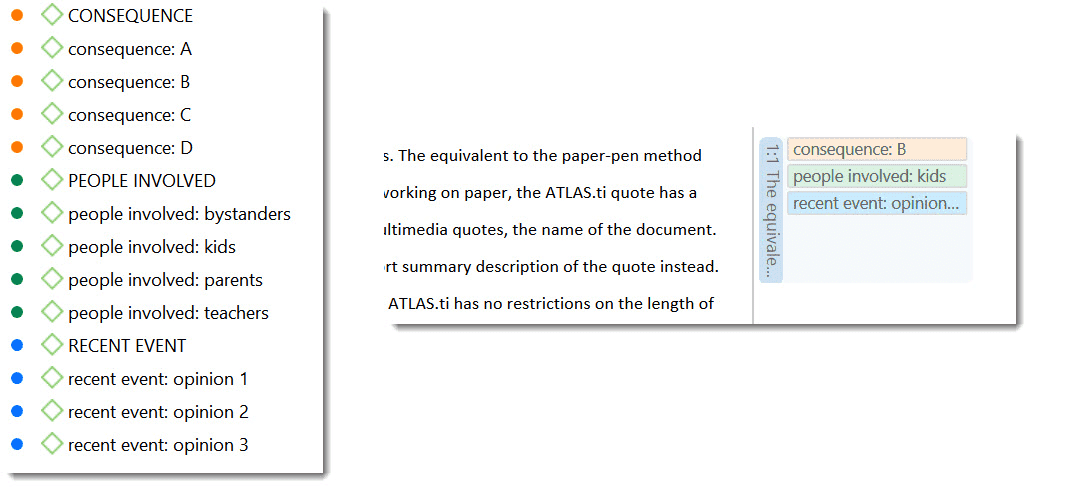 Coding with codes from multiple semantic domains will allow you to see how the various semantic domains are related for other analyses than inter-coder agreement. For example, what kind of emotions are mentioned in relation to which actor and which strategies are used to deal with them. For this you can use the code co-occurrence tools. See Code Co-Occurrence Tools.
Coding with codes from multiple semantic domains will allow you to see how the various semantic domains are related for other analyses than inter-coder agreement. For example, what kind of emotions are mentioned in relation to which actor and which strategies are used to deal with them. For this you can use the code co-occurrence tools. See Code Co-Occurrence Tools.
Instructions for Coders
An important requirement for inter-coder agreement analysis is the independence of the coders. Thus, the person who has developed the code system cannot be one of the coders whose coding goes into the ICA analysis. In addition to the principal investigator who develops the code system, two or more persons are needed who apply the codes.
The coders will receive a project bundle file from the principal investigator (see Project Setup). It is recommended to provide the coders with the following instruction:
- When importing the project that you receive from the principal investigator, add your name or initials to the project name.
- After opening the project, double-check your username.
- Apply all codes of a semantic domain in a mutual exclusive manner.
- If fitting you can apply codes from multiple semantic domains to the same or overlapping quotations.
- Do not make any changes to the codes - do not alter the code definition, do not change the code name, or the code color.
- If you do not understand a code definition, or find a code label not fitting, create a memo and name it 'Comments from coder name'. Write all of your comments, issues you find and ideas you have into this memo.
- Do not consult with other coders. This is important for your coding to remain unbiased. The data must be coded by all coders independently.
- Once you are done coding, create a project bundle file and send it back to the principal investigator.
How Agreement and Disagreement is Measured
The coefficients that are available measure the extent of agreement or disagreement of different coders. Based on this measure one can infer reliability, but the coefficients do not measure reliability directly. Therefore: what is measured is inter-coder agreement and not inter-coder reliability.
Agreement is what we measure; reliability is what we infer from it.
Suppose two coders are given a text and code it following the provided instructions. After they are done, they give you the following record of their coding:

-
There is agreement on the first pair of segments in terms of length and location (agreement: 10 units).
-
On the second pair they agree in length but not in location. There is agreement on an intersection of the data (agreement; 12 units, disagreement: 2 + 2 units).
-
In the third pair, coder 'A' finds a segment relevant, which is not recognized by coder 'B' (disagreement: 4 units).
-
The largest disagreement is observed in the last pair of segments. Coder 'A' takes a narrower view than coder 'B' (agreement: 4 units, disagreement: 6 units).
In terms of your ATLAS.ti coding, you need to think of your document as a textual continuum. Each character of your text is a unit of analysis for ICA, starting at character 1 and ending for instance at character 17500. For audio and video documents, the unit of analysis is a second. Images can currently not be used in an ICA analysis.
The quotation itself does not go into the analysis, but the characters or seconds that have been coded. In other words, if each coder creates quotations, it is not a total disagreement if they have not highlighted the exact same segment. The part of the quotations that overlap go into the analysis as agreement; the other parts as disagreement.
Another option is to work with pre-defined quotations. So that coders only need to apply the codes. For more information see Project Setup.
You can test inter-coder agreement in text, audio and video documents. Image documents are not supported. This also applies to image quotations in text PDF documents.
Example Application
Why are many business instilling a DevOps culture into their organization? written by: Jessica Diaz, Daniel López-Fernández, Jorge Perez and Ángel González-Prieto.
Methods For Testing ICA
“An inter-coder agreement coefficient measures the extent to which data can be trusted to represent the phenomena of analytical interest that one hopes to analyze in place of the raw phenomena” (Krippendorff, 2019).
ATLAS.ti currently offers three methods to test inter-coder agreement:
-
Simple percent agreement
-
Holsti Index
-
Krippendorff's family of alpha coefficients.
All methods can be used for two or more coders. As the percent agreement measure, and the Holsti index do not take into account chance agreement, we recommend the Krippendorff alpha coefficients for scientific reporting.
Percent Agreement
Percentage Agreement is the simplest measure of inter-coder agreement. It is calculated as the number of times a set of ratings are the same, divided by the total number of units of observation that are rated, multiplied by 100.
The benefits of percentage agreement are that it is simple to calculate, and it can be used with any type of measurement scale. Let's take a look at the following example: There are ten segments of text and two coders only needed to decide whether a code applies or does not apply:
Example Coding of Two Coders
| Segments | 1 | 2 | 3 | 4 | 5 | 6 | 7 | 8 | 9 | 10 |
|---|---|---|---|---|---|---|---|---|---|---|
| Coder 1 | 1 | 1 | 0 | 0 | 0 | 0 | 0 | 0 | 0 | 0 |
| Coder 2 | 0 | 1 | 1 | 0 | 0 | 1 | 0 | 1 | 0 | 0 |
1 = agreement, 0 = disagreement
This is how you calculate it:
 PA = 6 / 10
PA = 6 / 10
PA = 0.6 = 60%
Coder 1 and 2 agree 6 out of 10 times, so percent agreement is 60%.
One could argue that this is quite good. This calculation, however, does not account for chance agreement between ratings. If the two coders were not to read the data and would just randomly code the 10 segments. we would expect them to agree a certain percentage of the time by chance alone. The question is: How much higher is the 60% agreement over the agreement that would occur by chance?
The agreement that is expected by mere chance is 56% = (9.6 +1.6)/20. If you are interested in the calculation, take a look at Krippendorff (2004, p. 224-226). The 60% agreement now does not look so impressive after all. Statistically speaking, the performance of the two coders is equivalent to having arbitrarily assigned 0s and 1s to 9 of the 10 segments, and only 1 of the 10 segments is reliably coded.
For calculating percent agreement you can add single codes in place of semantic domains.
Holsti Index
The Holsti index (Holsti, 1969) is a variation of the percent agreement measure for situations where coders do not code precisely the same data segment. This is the case if coders set their own quotations/. Like Percent Agreement, also the Holsti index does not take into account chance agreement.
The formula for the Holsti Index is:
 The results for Percentage agreement and the Holsti Index are the same when all coders code the same data segments.
The results for Percentage agreement and the Holsti Index are the same when all coders code the same data segments.
Cohen's Kappa
We acknowledge that Cohen’s Kappa is a popular measure, but we opted for not implementing it because of the limitations identified in the literature.
"It is quite puzzling why Cohen’s kappa has been so popular in spite of so much controversy with it. Researchers started to raise issues with Cohen’s kappa more than three decades ago (Kraemer, 1979; Brennan & Prediger, 1981; Maclure & Willett, 1987; Zwick, 1988; Feinstein & Cicchetti, 1990; Cicchetti & Feinstein, 1990; Byrt, Bishop & Carlin, 1993). In a series of two papers, Feinstein & Cicchetti (1990) and Cicchetti & Feinstein (1990) made the following two paradoxes with Cohen’s kappa well-known: (1) A low kappa can occur at a high agreement; and (2) Unbalanced marginal distributions produce higher values of kappa than more balanced marginal distributions. While the two paradoxes are not mentioned in older textbooks (e.g. Agresti, 2002), they are fully introduced as the limitations of kappa in a recent graduate textbook (Oleckno, 2008). On top of the two well-known paradoxes aforementioned, Zhao (2011) describes twelve additional paradoxes with kappa and suggests that Cohen’s kappa is not a general measure for inter-rater reliability at all but a measure of reliability under special conditions that are rarely held. Krippendorff (2004) suggests that Cohen’s Kappa is not qualified as a reliability measure in reliability analysis since its definition of chance agreement is derived from association measures because of its assumption of raters’ independence. He argues that in reliability analysis raters should be interchangeable rather than independent and that the definition of chance agreement should be derived from estimated proportions as approximations of the true proportions in the population of reliability data. Krippendorff (2004) mathematically demonstrates that kappa’s expected disagreement is not a function of estimated proportions from sample data but a function of two raters’ individual preferences for the two categories." (Xie, 2013).
In addition, Cohen's kappa can only be used for 2 coders, and it assumes an infinite sample size. See also the article in our research blog: Why Cohen's Kappa is not a good choice.
Krippendorff's Family of Alpha Coefficients
The family of alpha coefficients offers various measurement that allow you to carry out calculations at different levels. They can be used for more than two coders, are sensitive to different sample sizes and can be used with small samples as well.
Alpha binary
At the most general level, you can measure whether different coders identify the same sections in the data to be relevant for the topics of interest represented by codes. All text units are taken into account for this analysis, coded as well as not coded data.
You can, but do not need to use semantic domains at this level. It is also possible to enter a single code per domain. You get a value for alpha binary for each code (or each semantic domain) in the analysis, and a global value for all codes (or all domains) in the analysis.
The global alpha binary value might be something you want to publish in a paper as an overall value for inter-coder agreement for your project.
The values for each code or semantic domain provide feedback which of the codes / domains are satisfactory in terms of inter-coder agreement, and which are understood in different ways by the different coders. These are codes / domains you need to improve and test gain, albeit with different coders.
If you work with pre-defined quotations, the binary coefficient will be 1 for a semantic domain if only codes of the same semantic domain have been applied, regardless which code within the domain has been applied.
The value for global alpha binary will always be 1 when working with pre-defined quotations as all coded segments are the same.
cu-alpha
The cu-alpha/Cu-alpha coefficients can only be used on combination with semantic domains. They cannot be used to test agreement/disagreement for single codes!
Another option is to test whether different coders were able to distinguish between the codes of a semantic domain. For example, if you have a semantic domain called 'type of emotions' with the sub codes:
- emotions::contentment
- emotions::excitement
- emotions::embarrassment
- emotions::relief
The coefficient gives you an indication whether the coders were able to reliably distinguish between for instance 'contentment' and 'excitement', or between 'embarrassment' and 'relief'. The cu-alpha will give you a value for the overall performance of the semantic domain. It will however not tell you which of the sub codes might be problematic. You need to look at the quotations and check where the confusion is.
The cu-alpha coefficient can only be calculated if the codes of a semantic domain have been applied in a mutually exclusive manner. This means only one of the sub codes per domain is applied to a given quotation. See also Requirements for Coding.
Cu-alpha
Cu-alpha is the global coefficient for all cu-alphas. It takes into account that you can apply codes from multiple semantic domains to the same or overlapping quotations. See multivalued coding. Thus, Cu-alpha is not just the average of all cu-alphas.
If codes of a semantic domain 'A' have been applied to data segments that are coded with codes of a semantic domain 'B', this does not affect the cu-alpha coefficient for either domain A or B, but it effects the overall Cu-alpha coefficient.
You can interpret the Cu-alpha coefficient as indicating the extent to which coders agree on the presence or absence of the semantic domains in the analysis. Formulated as a question: Could coders reliably identify that data segments belong to a specific semantic domain, or did the various coders apply codes from other semantic domains?
In the calculation for both the cu- and Cu-alpha coefficient, only coded data segments are included in the analysis.
Calculation of Krippendorff's Alpha
For a full mathematical explanation on how the alpha coefficients are calculated see ICA Appendix.
The basic formula for all Krippendorff alpha coefficients is as follows:
alpha = 1 - observed disagreement (Do)) / expected disagreement (De)
 whereby 'De' is the expected disagreement by chance.
whereby 'De' is the expected disagreement by chance.
α = 1 indicates perfect reliability. α = 0 indicates the absence of reliability. The units and the values assigned to them are statistically unrelated. α < 0 when disagreements are systematic and exceed what can be expected by chance.
When coders pay no attention to the text, which means they just apply the codes arbitrarily, their coding has no relationship to what the text is about, then the observed disagreement is 1. In other words, the observed disagreement (Do) equals the maximum expected disagreement (De), which is 1. If we enter this in the formula, we get:
α= 1 – 1/1 = 0.000.
If on the other hand, agreement is perfect, which means observed disagreement (Do) = 0, then we get:
α= 1 – 0 / expected disagreement = 1.000.
To better understand the relationship between actual, observed and expected agreement, let's take a look at the following contingency table:
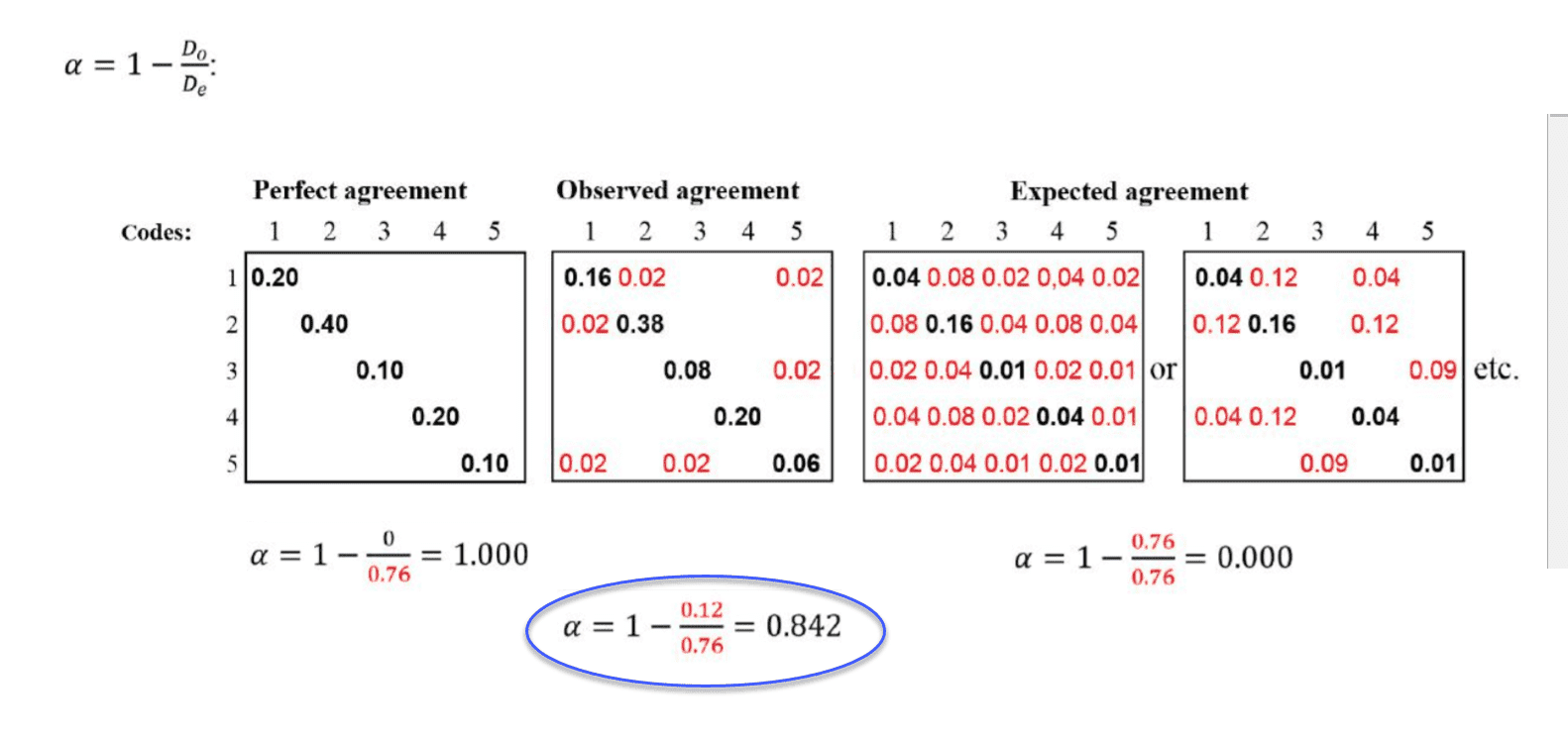 In the example above, the tables represent a semantic domain with five codes. The matrices with perfect and expected agreement/disagreement serve as a benchmark what could have been if agreement either was perfect or if coders had applied the codes randomly. There are two matrices for expected agreement/disagreement indicating that statistically speaking there are many possibilities for a random attribution of the codes.
In the example above, the tables represent a semantic domain with five codes. The matrices with perfect and expected agreement/disagreement serve as a benchmark what could have been if agreement either was perfect or if coders had applied the codes randomly. There are two matrices for expected agreement/disagreement indicating that statistically speaking there are many possibilities for a random attribution of the codes.
The black numbers show agreement, the red numbers disagreement.
In the contingency table for observed agreement, we can see that the coders agree in applying code 4. There are no red numbers, thus no disagreement.
There is some disagreement about the application of code 2. Agreement is 38% percent. In 2 % of the cases, code 1 was applied instead of code 2.
There is a bit more confusion regarding the application of code 5. The coders have also applied code 1 and code 3.
If this were a real life example, you would take a look at the code definitions for code 5 and code 2 and ask yourself why coders had difficulties to apply these codes in a reliable manner. The coefficient, however, is acceptable. See Decision Rules. There is no need for re-testing.
References
Banerjee, M., Capozzoli, M., McSweeney, L., Sinha, D. (1999). Beyond kappa: A review of interrater agreement measures. The Canadian Journal of Statistics, Vol. 27 (1), 3-23.
Cohen, Jacob (1960). A coefficient of agreement for nominal scales. Educational and Psychological Measurement. 20 (1): 37–46. doi:10.1177/001316446002000104.
Holsti, O. R. (1969). Content analysis for the social sciences and humanities, Reading, MA: Addison-Wesley.
Krippendorff, Klaus (2004/2012/2018). Content Analysis: An Introduction to Its Methodology. 2ed /3rd /4th edition. Thousand Oaks, CA: Sage.
Zwick, Rebecca (1988). Another look at interrater agreement. Psychological Bulletin, 103, 347-387.
Xie, Q. (2013). Agree or disagree? A demonstration of an alternative statistic to Cohen's kappa for measuring the extent and reliability of agreement between observer. In Proceedings of the Federal Committee on Statistical Methodology Research Conference, The Council of Professional Associations on Federal Statistics, Washington, DC, USA, 2013.
Sample Size and Decision Rules
A number of decisions have to be made when testing for inter-coder agreement. For instance, how much data material needs to be used, how many instances need to be coded with any given code for the calculation to be possible, and how to evaluate the obtained coefficient.
Sample size
The data you use for the ICA analysis needs to be representative of the total amount of data you have collected, thus of those data whose reliability is in question. Furthermore, the number of codings per code needs to be sufficiently high. As a rule of thumb, the codings per code should at least yield five agreements by chance.
Krippendorff (2019) uses Bloch and Kraemer's formula 3.7 (1989:276) to obtain the required sample size. The table below lists the sample size you need when working with two coders:

-
the three smallest acceptable reliabilities α min: 0.667 / 0.800 / 0.900
-
for four levels of statistical significance: 0.100 / 0.050 / 0.010 / 0.005
-
for semantic domains up to 10 codes (=probability pc):
Example: If you have a semantic domain with 4 codes and each of the codes are equally distributed (pc = 1/4 = 0,25), and if the minimum alpha should be 0.800 at a 0.05 level of statistical significance, you need a minimum of 139 codings for this semantic domain. For a lower alpha of 0.667, you need a minimum of 81 codings at the same level of statistical significance.
 It applies to 2 coders, and for semantic domains up to 10 sub-codes. If you have more than two coders, more than 10 sub-codes in a domain, or an unequal distribution within a domain, you need to adjust the equation and calculate the needed sample size yourself.
It applies to 2 coders, and for semantic domains up to 10 sub-codes. If you have more than two coders, more than 10 sub-codes in a domain, or an unequal distribution within a domain, you need to adjust the equation and calculate the needed sample size yourself.
-
More than two coders: You need to and multiply Z square by the number of coders.
-
More than 10 sub-codes per domain: You need to adjust the value for pc. The value for pc = 1/number of sub-codes.
-
Unequal distribution of codings within a domain: By 4 codes in a semantic domain, the estimated proportion pc of all values c in the population is 0.250 (¼); by 5 codes, it is 0,200 (1/5); by 6 codes 0,167 (1/6) and so on. If the distribution of your codes in a semantic domain is unequal, you need to make a new estimate for the sample size by using a pc in the formula that is correspondingly less than 1/4, 1/5, 1/6 and so on.
You can see the corresponding z value from a standard normal distribution table. For a p-value of 0,05, z = 1,65.
Acceptable Level of Reliability
The last question to consider is when to accept or reject coded data based on the ICA coefficient. Krippendorff (2019) recommends:
- Strive to reach α = 1,000, even if this is just an ideal.
- Do not accept data with reliability values below α = 0.667.
- In most cases, you can consider a semantic domain to be reliable if α ≥ 0.800.
- Select at least 0.05 as the statistical level of significance to minimize the risk of a Type 1 error, which is to accept data as reliable if this is not the case.
Which cut-off point you choose always depends on the validity requirements that are placed on the research results. If the result of your analysis affects or even jeopardizes someone's life, you should use more stringent criteria. A cut-off point of α = 0.800 means that 80% of the data is coded to a degree better than chance. If you are satisfied with α = 0.500, this means 50% of your data is coded to a degree better than chance. The sounds a bit like tossing a coin and playing heads or tails.
Setting Up a Project for Inter-coder Agreement Analysis
You can test inter-coder agreement in text, audio and video documents. Image documents are not supported. This also applies to image quotations in text PDF documents.
When you want to run an inter-coder agreement analysis, you are working in a team. Therefore, you need to know how to set up a team project, distribute and collect team projects for merging. Please read the chapter on Team Work for further information. Here, you find the information that is specific to inter-coder agreement analysis only.

As you need to start from a common Master project, you cannot perform an ICA analysis if one of the coders is using the Web version. All coders need to use the desktop version (Mac or Windows). For further information see Merging Projects.
Instructions for the Principal Investigator (PI)
-
The PI develops the code system adding clear definitions for each code. This means, the PI has likely coded the data as well. See also Requirements for Coding. This is the Master Project.
-
Based on the master project, the PI creates a subproject for the ICA analysis. This is easiest be done by creating a project snapshot. Usually, the coders for the ICA analysis code 10-20% of the material. Another approach is the number of codings you need to achieve a certain level of significance. See Sample Size and Decision Rules.
-
The PI deletes all documents from the snapshot project that coders should not code. See Document Management.
Option A
Next, the PI can either remove all quotations, so that the snapshot project for the coders only contain the documents that need to be coded, and the codes with the definitions. The coders then need to find and mark text segments they find relevant and apply one or more codes from the list. This option is best used for longer documents where you are interested in seeing whether other coders find the same passages relevant for a given topic. For example, you have a number of reports, and the aim is to identify all segments related to business strategies, labour laws and gender issues. If this is the question of interest, it is necessary that all coders set quotations themselves (Option A: Delete all Quotations).
The PI deletes all quotations: Open the Quotation Manager, select all quotations and click on the Delete button.
The PI saves the project, creates a project bundle file and sends it to the coders.
Option B
Another option is to leave the quotations in the project, but to remove all codings. This means, the coders get a project that contains the documents to be coded, pre-defined quotations and a list of codes. This is useful if the aim is to see whether different coders understand the codes in the same way and apply them to the same data segments. This assures that the code system is replicable and that also others see the same or similar things in the data as the principal investigator (Option B: Remove all codings).
inst
The PI removes only the codings: Open the Document Manager, select all documents, click on the Tools tab and from there select Remove codings.
inst
The PI saves the project, creates a project bundle file and sends it to the coders.
Instructions f
An important requirement for inter-coder agreement analysis is the independence of the coders. Thus, the person who has developed the code system cannot be one of the coders whose coding goes into the ICA analysis.
It is recommended to provide the coders with the following instructions.
-
As coder, you receive a project bundle file from the principal investigator.
-
When importing the project, add your name or initials to the project name.
-
After opening the project, double-check your username.
-
Open the Code Manager and familiarize yourself with the code system. Read all code definitions.
-
Depending on the aim of the analysis and how the project was set up, you either need to set your own quotations and apply the codes; or you need to apply codes to pre-defined quotations.
-
When applying codes, never apply more than one code from a specific semantic domain to a single or overlapping quotations. This is referred to as mutual exclusive coding.
-
If fitting you can apply codes from multiple semantic domains to the same or overlapping quotations (multivalued coding).
-
Do not make any changes to the codes - do not alter the code definition, do not change the code name, or the code color.
-
If you do not understand a code definition, or find a code label not fitting, create a memo and name it 'Comments from coder (your name)'. Write all of your comments, issues you find and ideas you have into this memo.
-
Do not consult with other coders. This is important for your coding to remain unbiased. The data must be coded by all coders independently.
-
Once you are done coding, create a project bundle file and send it back to the principal investigator.
Continues Workflow
-
Once the coders are done with they work, they prepare a project bundle file and send it back to the PI.
-
The PI imports the project bundle files from each coder, checks the work of each coder and reads the memo they have written (if any).
-
Next the projects need to be merged. See Merging projects for ICA analysis.
-
Then the PI can run the ICA analysis.
Merging Projects For ICA Analysis
The following instructions assume 2 independent coders. If you work with more coders, you have to repeat the merge process. You can only merge two projects at a time.
We recommend that you import the project bundle files of coder 1 and 2 before merging them for inspection. Did the coders do what they were supposed to do? Did they send you the correct project? Project bundle files can also be merged directly. However, if a merge conflict occurs you may not know why because you have not looked inside the projects you are merging.
Open the project of coder 1 and create a snapshot. Name the copy something like 'Project for ICA XY coder 1 and 2'. Merge the project of coder 2 into this version of the project.
Close the project of coder 1 and open the snapshot.
Before the project merge, set the project into inter-coder mode:
Select Analyze / Enable Intercoder Mode.
Select File / Merge and select the project of coder 2 to be merged. This is the import project. Follow the instructions on the screen. There should be no merge conflicts. For more detail see Project Merge.
When you set up the project correctly and all coders did what they were supposed to do, then there should be no merge conflict!
After merging in ICA mode, The codings of all coders will become visible.
Open one document and take a look at the margin area. If you see the same codes applied to the same quotations, this is good. It means the two coders agree.
Click on the View tab and instead of displaying the code icons, select Show User.
Now you see coder icons. Each coder is indicated by a different color. Hover over the coder icon to see the name of the coder.
The ability to see who has coded what in the margin area is useful for some purposes, e.g., if you want to discuss data segments where coders did not agree. However, there is no need to manually check all codings in the margin. For this you can run the inter-coder agreement analysis. See Running an Inter-coder Agreement Analysis.
A coding is the link between a code and a quotation. In ICA mode, you can see which coder has applied which code to a quotation.
Running an ICA Analysis
A good time to have your coding checked by other coders is when you have built a stable code system and all codes are defined. This means, this is somewhere in the middle of the coding process. Once a satisfactory ICA coefficient is achieved, the principal investigator has the assurance that his or her codes can be understood and applied by others and can continue to work with the code system.
Click the Analyze tab and select the option Inter-coder Agreement.
inst
Click on the Add Coder button and select two or more coders.
inst
Click on the Add Documents button and select the documents that should be included in the analysis. Only those documents are listed that have been coded by all selected coders.
Click on the Add Semantic Domain button and add one or more codes to the domain. Alternatively, you can drag and drop codes from the Project Explorer or the code list into the semantic domain field.
inst
Repeat this process for each semantic domain.
If you are not sure, what a semantic domain is, you find more information here.
Whether you add semantic domains or only a single code in place of a domain, this has an effect on the type of analysis you can run. If you only add one code per semantic domain, you cannot calculate Cu/cu-alpha coefficients. See Methods for Testing ICA.
After you have added coders, documents and codes, your screen looks similar to what is shown in:
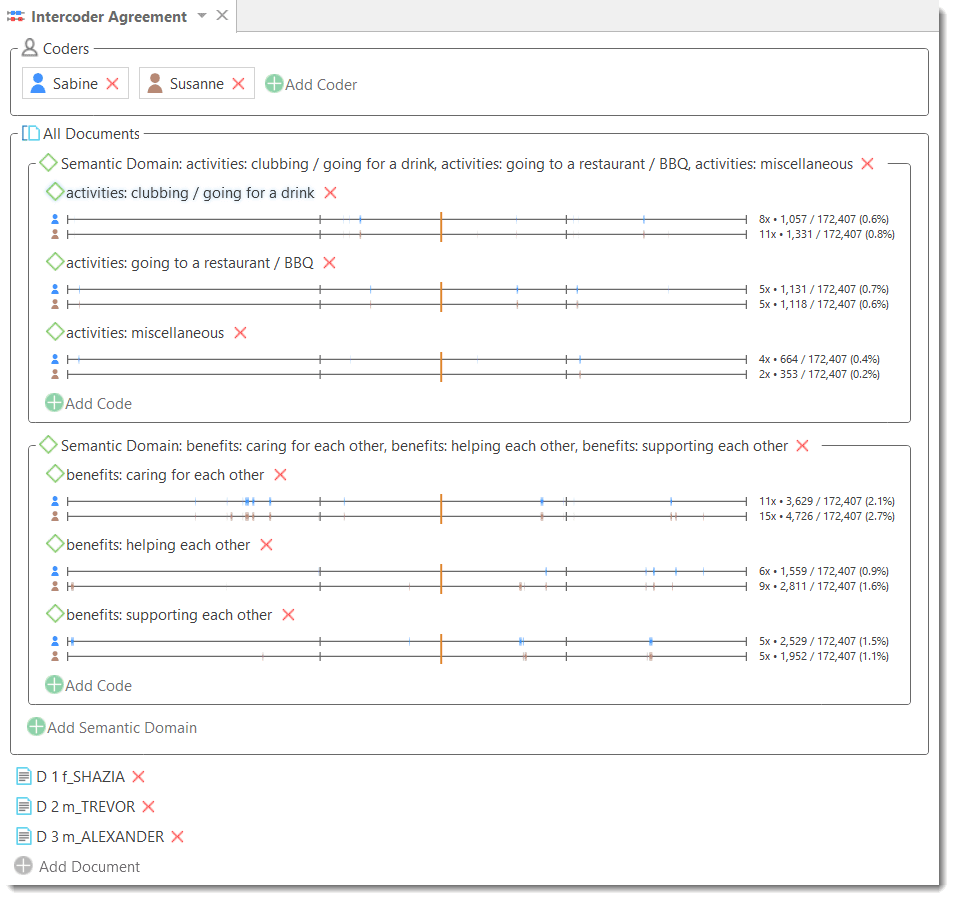
-
The documents are represented by a line for each coder and code. If you have added multiple documents into the analysis, you see a black vertical line that marks the beginning of the next document.
-
The quotations for the code are marked on the line in the same color as the coder icon.
-
To the right of each coder line you see some descriptive statistics: The coder Sabine (blue) has applied the code "activities clubbing / going for a drink" 8 times. The number of characters that are coded with this code are 1057 out of a total of 172.407 characters in all three selected documents, which is 0,6%.The coder Susanne (blue) has applied the code "activities clubbing / going for a drink" 11 times. The number of characters that are coded with this code are 1331 out of a total of 172.407 characters in all three selected documents, which is 0,8%.
-
If you click on one of the lines, only the quotations of the selected code and coder are shown in the Quotation Reader on the right-hand side.
-
If you click on the line for the semantic domain, all quotations of the semantic domain are shown in the Quotation Reader.
You can remove coders, codes or documents from the analysis by clicking on the red x.
Calculating an ICA Co
To calculate ICA, click on the button Agreement Measure in the ribbon and select one of the four methods.
See Methods For Testing ICA for more detail.
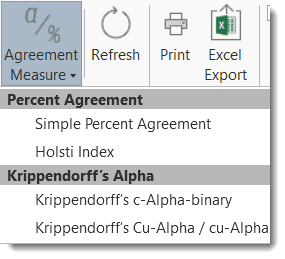
Selecting the Krippendorff's Cu /cu-alpha coefficient for the above example, yields the following results:
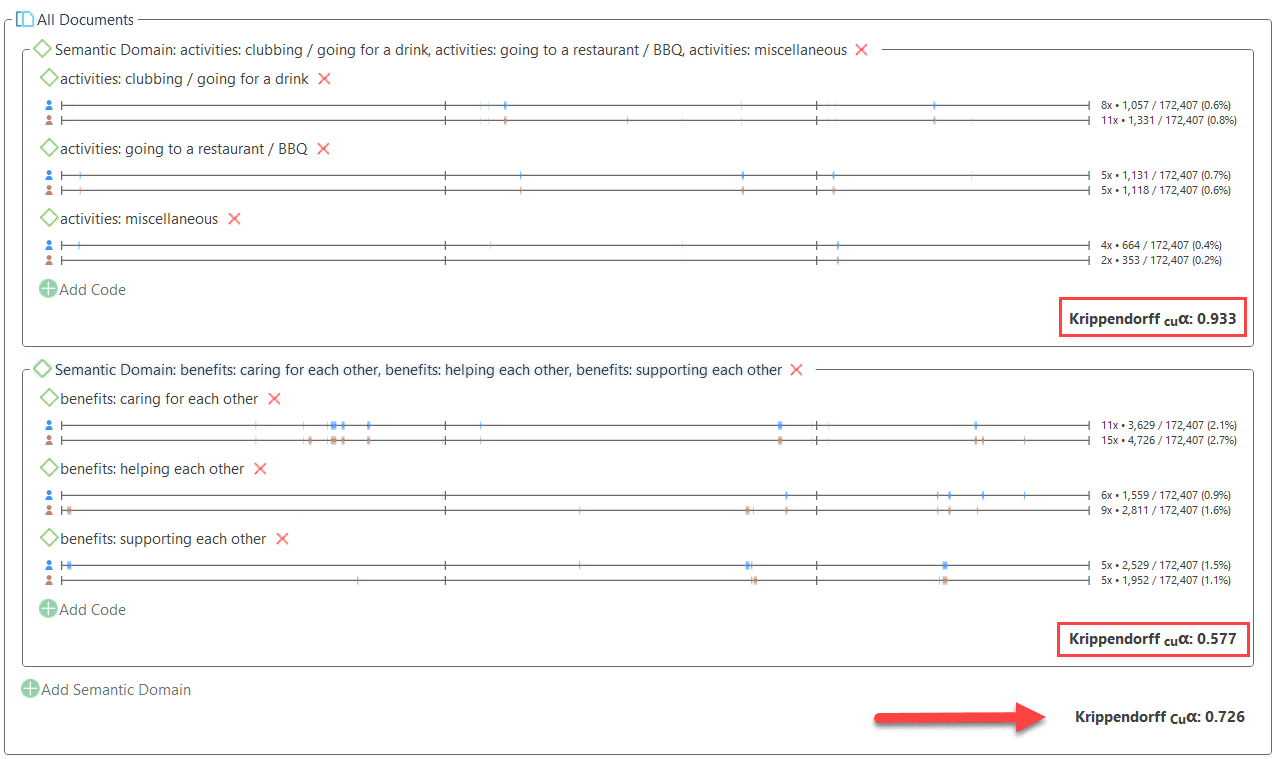
Tools
The following tools are available:
The redundant codings' analyzer finds overlapping quotations that have been coded with the same code. You may have coded a long segment, e.g. from paragraph 5 to 15 and then a shorter segment within this section from paragraph 7 to 8, not realizing you have attached the same code already to the surrounding segment. This leads to confusing or even false results if you are counting segments. The redundant codings' analyzer finds these segments, and you can correct it.
The project search tool allows you to search through all entities in your project. You can specify whether you want to search for a word or expression in all entities, or only in documents, only in codes, on in memos, only in the names, only in the comments, etc. Search terms can include regular expressions.
Project Search
Use the Project Search tool to search for text and patterns in all elements of your project, not only in the documents that you added. The search can be restricted to certain fields, like name, author, date, comments, and content. Search terms can contain regular expressions (GREP). See Regular Expressions (GREP).
To open the tool select Tools and from there the Project Search option.
Select the entities you want to search in. You can also restrict the search to items created by a specific user.
Enter a search term. If you use regular expression, activate the Use GREP option. You can also select whether a search term should be case-sensitive or not.
To start the search, click Enter or the search icon.
The results of the search are listed in an interactive list, where you can click on a specific hit, and you will be able to see the term within its larger context.
All entities that do not include the search term are grayed out.
When you double-click on a result, it will be displayed in your project.
Searching in Selected Entities
If you only want to search for instance in the comments of codes, click on Show None and then activate the entity type and elements you are interested in, e.g. code and comment.
Refining a Search
If you want to refine an existing search, click on the Search tab in the Text Search Result window and enter a modified search and press Enter or the Search icon.
Finding Redundant Codings
Redundant codings are overlapping or embedded quotations that are associated with the same code. Such codings can result from normal coding but may occur unnoticed during a merge procedure when working in teams. The Codings Analyzer finds all redundant codings and offers appropriate procedures to correct it. An example of a redundant coding is shown below.
To find all redundant codings, select Find Redundant Codings under the Tools & Support tab, or open the Code Manager and select the options from the Tools tab there.
The upper pane lists all codes for which redundant codings were found. The Redundancy column displays the number of pairs of redundant quotations found for the codes. If you select one of the codes, the redundant quotations are listed in pairs, in the middle pane. If you select a pair, you see a preview of the quotation in the bottom pane. Double-clicking on a listed quotation displays it in context.
You can correct the redundancy in the following ways:
Unlink from Left Quotation removes he selected code from the quotation shown on the left-hand side.
Merge Quotations melts the two quotations shown on the right- and left-hand side. All references to and from the merged quotation are "inherited" by the other. If the two quotations overlap, the resulting quotation includes all data from both quotations.
Unlink from Right Quotation removes the selected code from the quotation shown on the right-hand side.
If you hover over a quotation you see some information about the Connectivity of the quotation: number of connections to codes (=codings), number of connections to other quotations (=hyperlinks), and number of connections to memos (=memo links). The connectivity information provides an additional clue about the best action how to resolve the redundancy.
If you see a quotation listed more than once, it means that three or more quotations are involved in a redundant coding. You will notice that merging one pair of quotations may have the effect that other pairs are removed from the list as well, as the redundancy assertion does not hold any longer for the remaining pairs of quotations for this code.
Creating Reports
ATLAS.ti offers user configurable reports in Word, PDF or Excel format. This means you can decide what should be displayed in the report. You find a report option in each browser at the top right-hand side in the ribbon.

If there is no ribbon option, and you want to export quotations from a result of a query, look for the burger menu:

In addition, predefined reports are available in the Query Tool under the Report button. If you hover over an option with your mouse, the screen tip explains what each of the report contains.
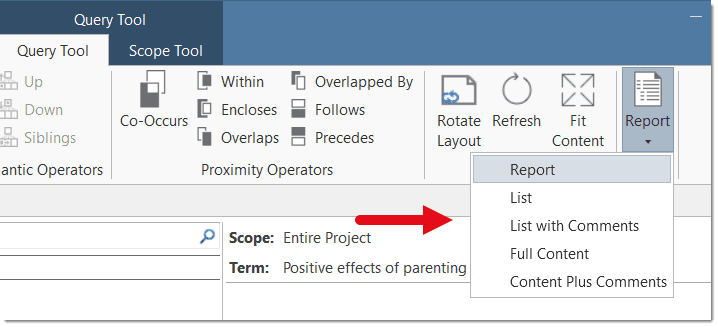
Tables can be exported as Excel file. See Code Document Table and Code Co-Occurrence Table.
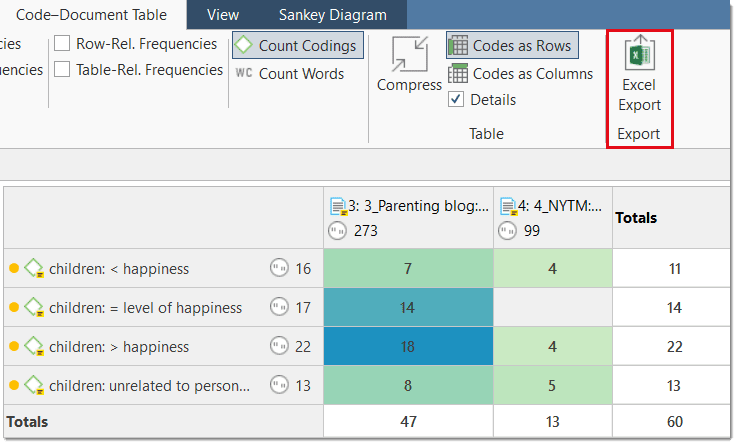
Types of Reports
You have the following export options:
Reports
- Reports from managers as text or PDF, or as spreadsheet.
- Reports from the Quotation Reader as spreadsheet.
- Reports from the Query Tool as spreadsheet.
See Creating Reports for further information.
Data Export
- You can export all documents
- You can export all data for further use in SPSS in form of a syntax file.
- You can create a generic export of all data for further use in a statistical software like R, SAS, etc. in form of a spreadsheet.
Project Export
- You can export the entire project in QDPX format for use in another QDAS (qualitative data analysis software) that supports QDPX import.
Tables
- All tables can be exported as spreadsheet. See Code Document Table and Code Co-Occurrence Table.
Exports in PDF Format
- The document with margin and networks can be exported in PDF format via the menu option Project > Print.
Exports as Image Document
- Sankey diagrams can be exported as graphic file.
Create Word / PDF Reports
Creating Report from the Code Manager
If you want a text report of quotations for selected codes, then creating a report form the Code Manager is the best option.
Open the Code Manager. Select one or multiple codes or set a code group as filter if you do not want to create a report for all codes.
Select a filter option: If you selected some codes or set a code group as filter, you can still change and export all codes.
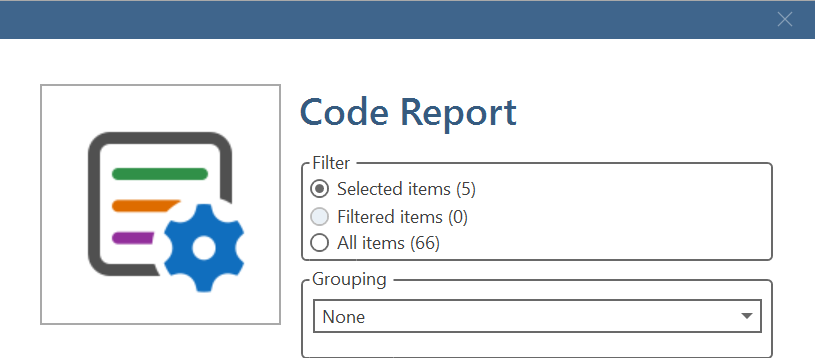
You can group the report by:
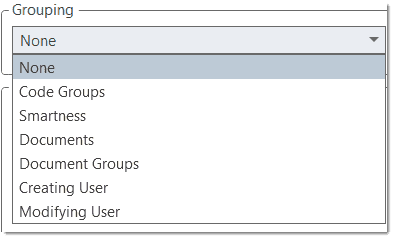
By "smartness" means that quotations of smart codes are listed first in the report.
When you select a grouping option, further options are presented to you, e.g. whether you want to also export the comment of the code group or document.
If a selected code is in multiple code groups, then the quotations for this code will occur multiple times in the report.
Next select what should be included in report. When selecting Groups, Quotations, Memos or Codes, you can select further options. To do so, click on the small triangle before the item to open the branch. For Quotations for instance 'Content' is already pre-selected. You may further want to select to also include quotation comments, other linked codes or memos in the report.
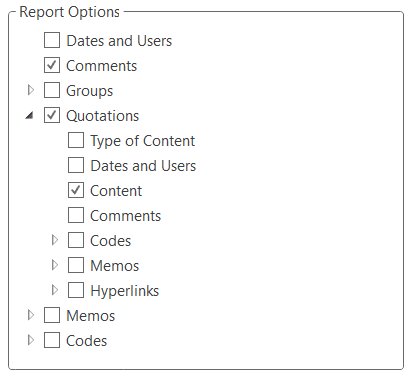
After you made your selections, click Create Report to open the report. It is a read-only report. You can save it as rtf file or copy and paste it into a Word document.
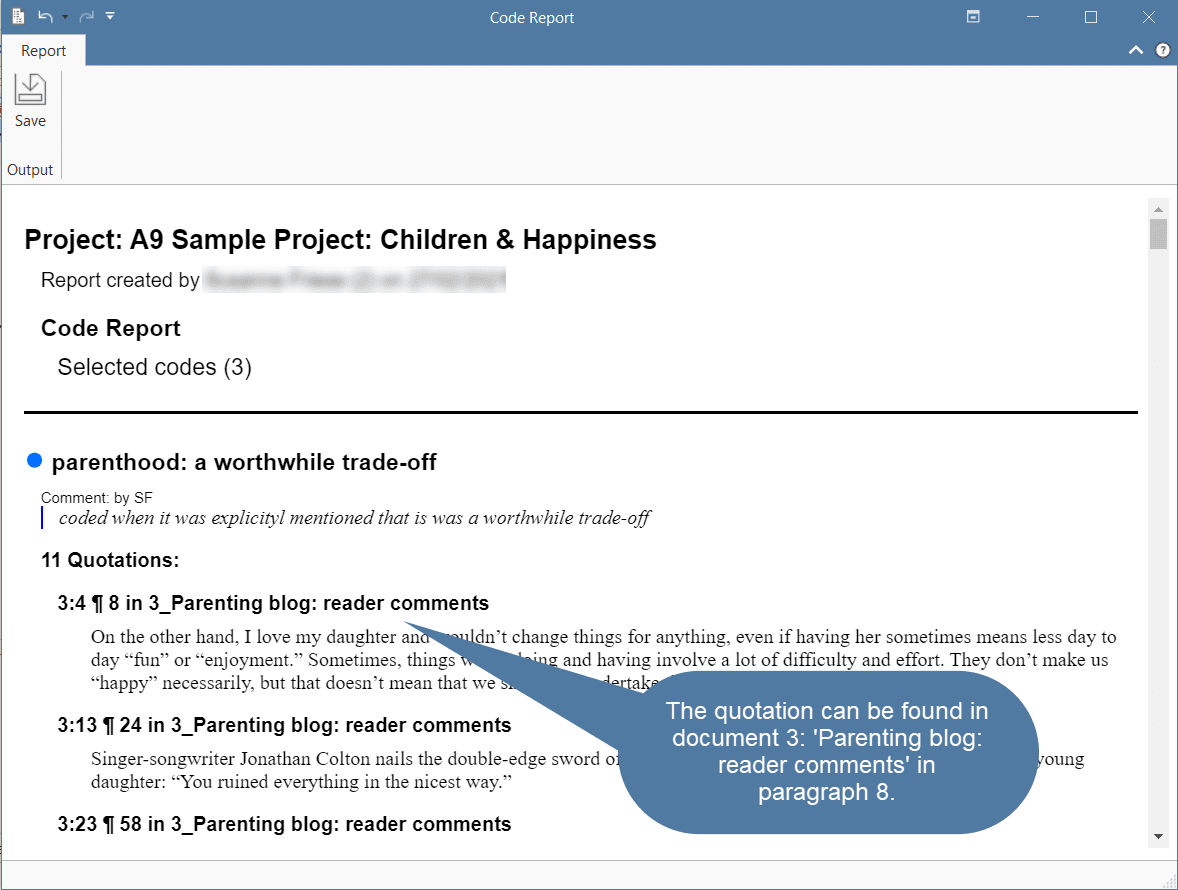
Creating Reports from the Quotation Manager
Open the Quotation Manager. Select one or multiple quotations or set one or more codes as filter if you do not want to create a report for all quotations.
Select a filter option: If you selected a few quotations or set a code as filter, you can still change and export all quotations.
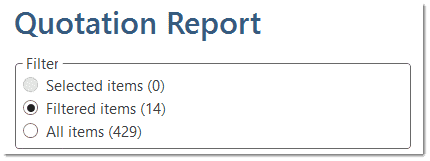
You can group the report by:
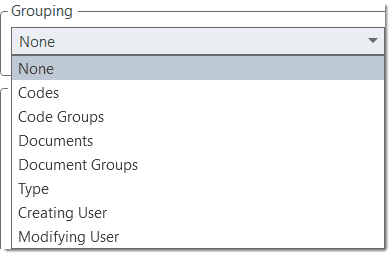
When you select a grouping option, further options are presented to you, e.g. whether you want to also include the comment of the code group or document.
Note, if you group by documents or code groups, and a document or code is in multiple groups, then the quotation will occur twice or more times in the report. The same applies if a quotation is coded by multiple codes. If you group by codes, the quotation will be listed under each code that applies.
Next select what should be included in report:
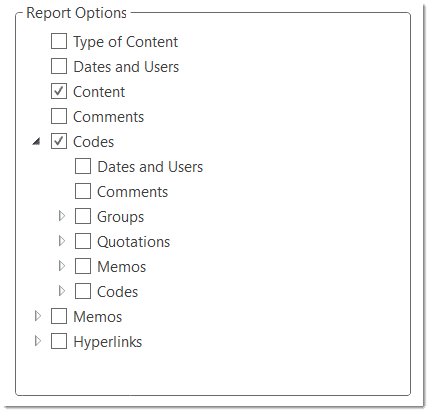
When selecting Codes, Memos or Hyperlinks, you can select further options. To do so, click on the small triangle before the item to open the branch.
After you made your selections, click Create Report to open the report. It is a read-only report. You can save it as rtf or PDF file or copy and paste it into a Word document.
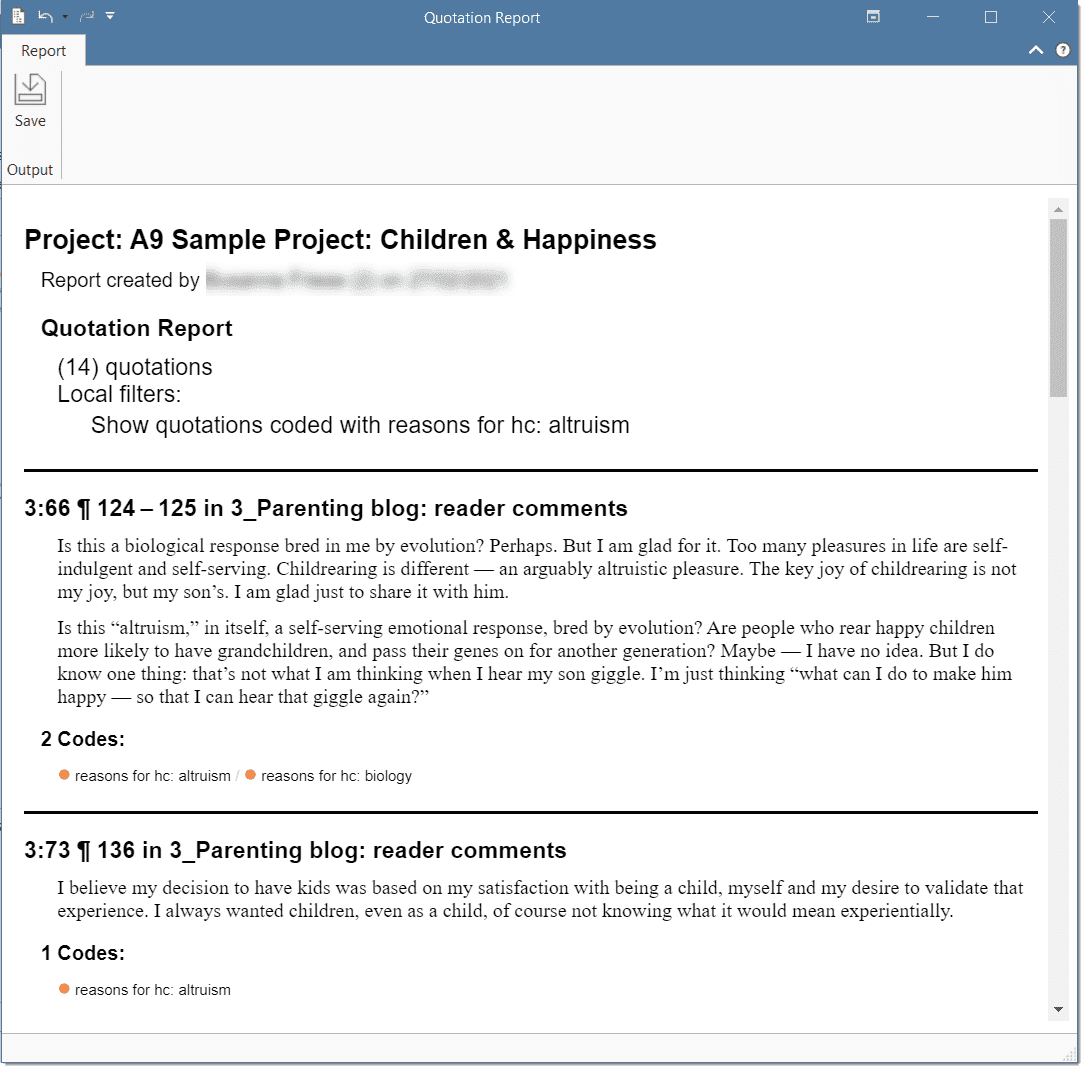
Below each quotation you see the codes that have been applied.
Document Reports
You may for example print a report that lists all documents with their comments.
Open the Document Manager. Select one or multiple documents or set a document group as filter if you do not want to create a report for all documents.
Select a filter option: If you selected some documents or set a document group as filter, you can still change and export all documents.
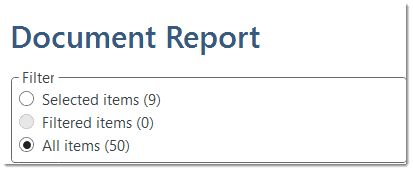
You can group the report by:
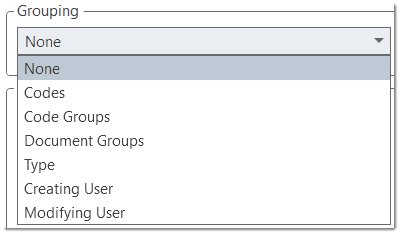
When you select a grouping option, further options are presented to you, e.g. whether you want to include the comment of the entity you group by.
If you group by document groups and a document is in multiple document groups, the document will occur multiple times in the report. If you group by codes, then the document will be listed under each code that applies, and so on.
Next select what should be included in report:
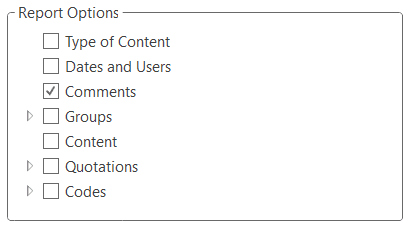
When selecting Groups, Quotations or Codes, you can select further options. To do so, click on the small triangle before the item to open the branch.
After you made your selections, click Create Report to open the report. It is a read-only report. You can save it as rtf file or copy and paste it into a Word document.
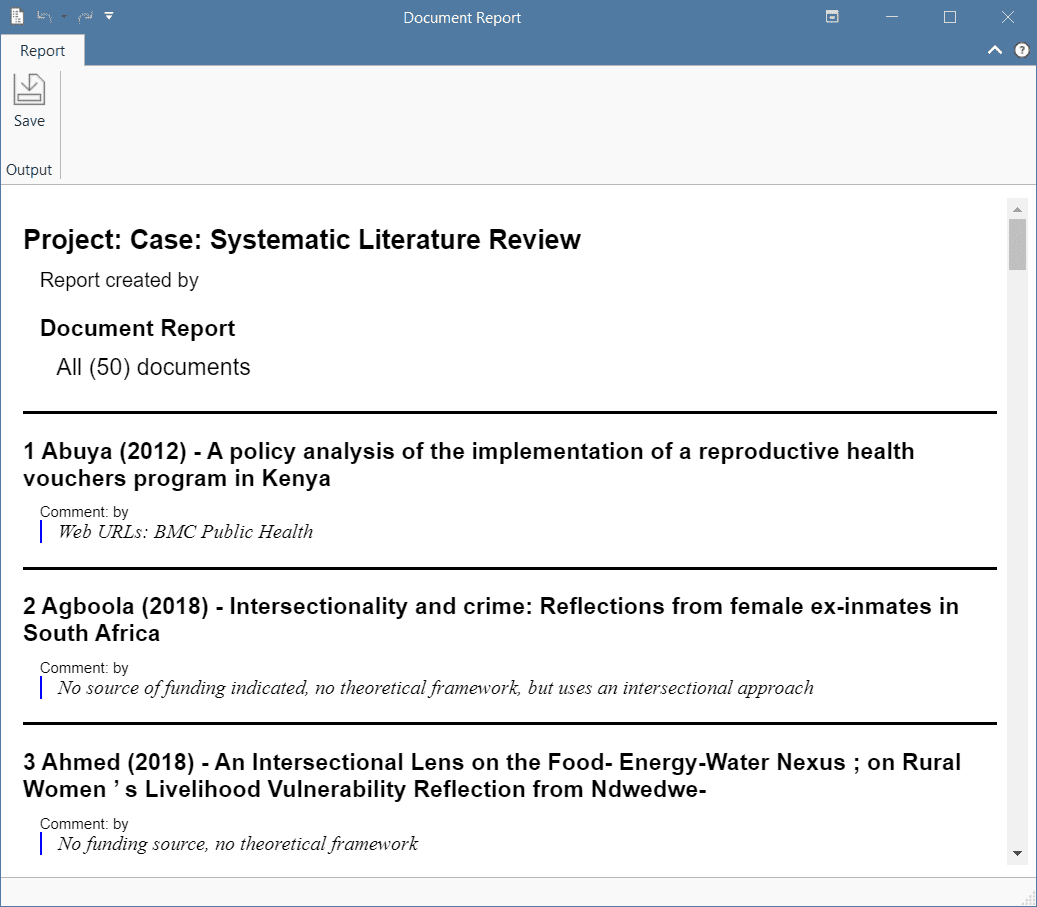
Memo Reports
A useful memo report could be a report of all memos with their comments, or a report of a memo with all linked quotations.
Open the Memo Manager. Select one or multiple memos or set a memo group as filter if you do not want to create a report for all memos.
Select a filter option: If you selected some memos or set a memo group as filter, you can still change and export all documents.
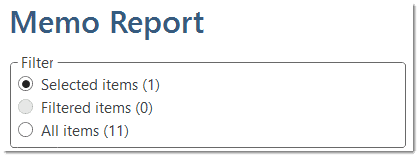
You can group the report by:
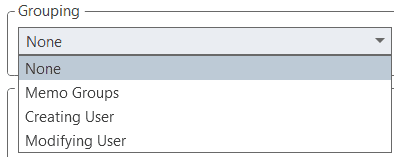
When you select a grouping option, further options are presented to you, e.g. whether you want to include the comment of the entity you group by.
If a selected memo is in multiple memo groups, then the memos will occur multiple times in the report.
Next select what should be included in report:
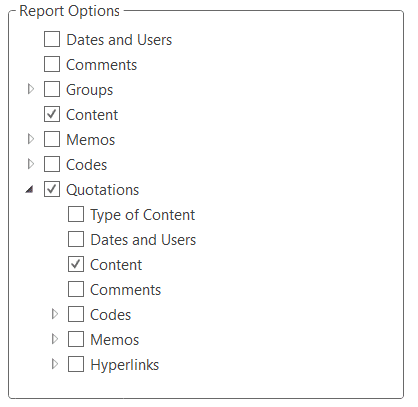
When selecting Groups, Memos, Codes or Quotations, you can select further options. To do so, click on the small triangle before the item to open the branch.
After you made your selections, click Create Report to open the report. It is a read-only report. You can save it as rtf file or copy and paste it into a Word document.
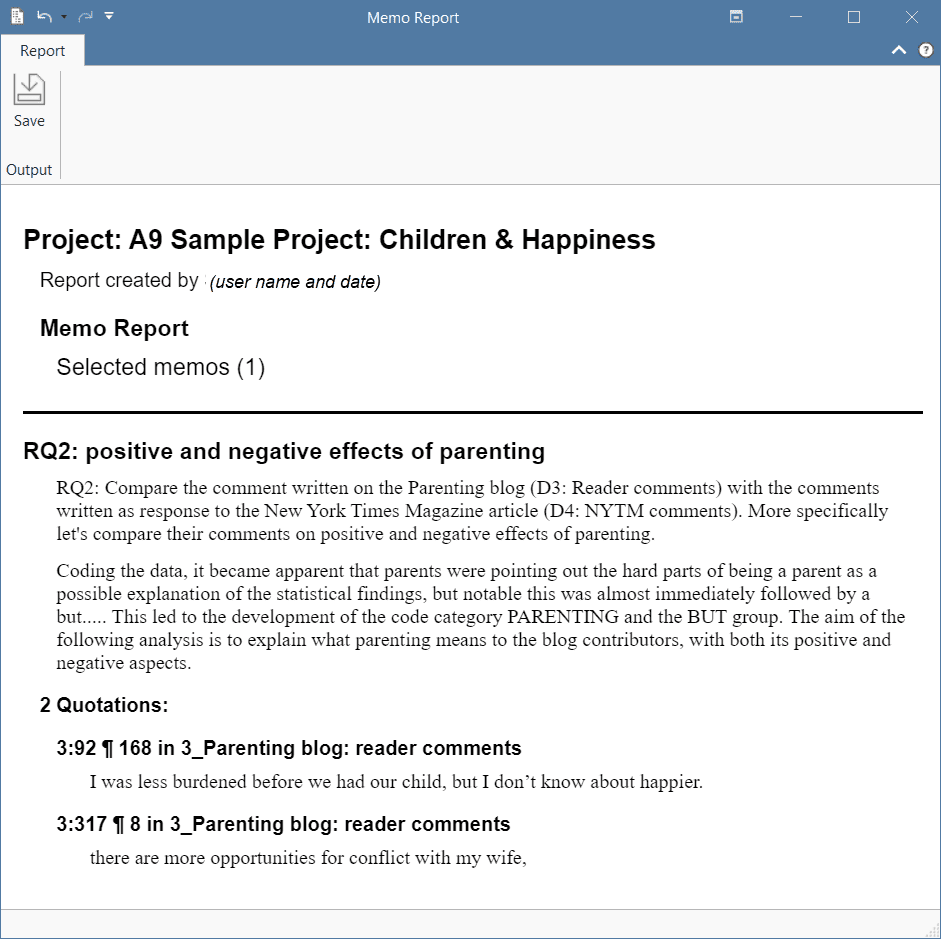
Creating Excel Reports
In every manager you find a button to create an Excel report. A frequently used report for example is a Quotation Report by Codes. This is how you can generate such a report:
Report: All Quotations for a Code
Open the Quotation Manager. Select a code in the filter area on the left.
Click on the Excel Export option and select the following options:
-
ID
-
Select Quotation Name only when you have renamed the quotation.
-
Document
-
Quotation Content
-
Quotation Comment (optional)
-
Select Codes if you want to see other codes that have been applied to a quotation
-
Reference (start and end position of the quotation in the document)
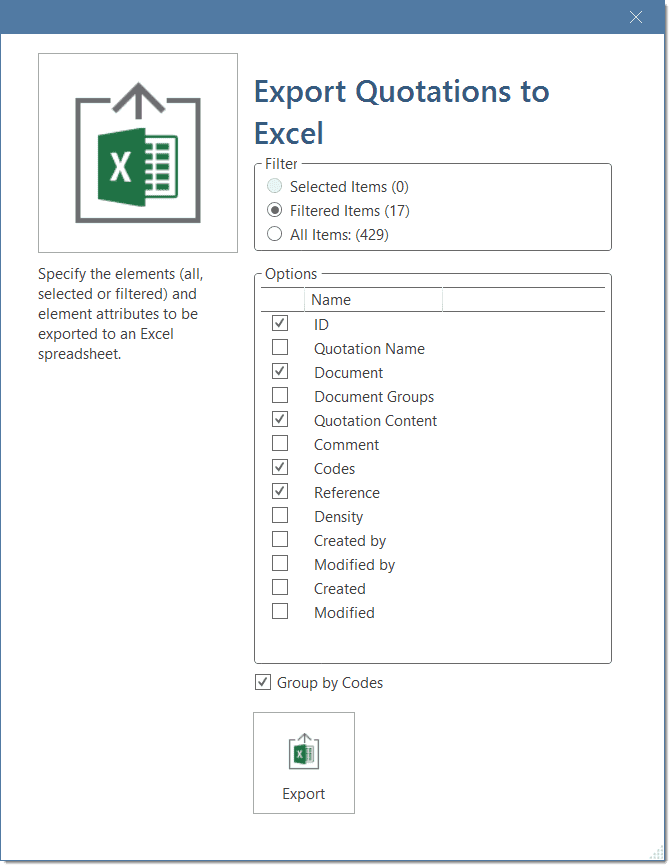
For further examples see Report Examples
Info Sheet for Excel Reports
All Excel reports have an additional sheet that shows meta information like the type of the report, the project name, date of export and name of exporting user.
The info sheets for reports based on the Code Document- and the Code Co-occurrence Table, and Inter-coder Agreement Analysis contain further information.
-
abbreviations that are used
-
Code Document Table: Information about which relative frequency count is used
-
Code Co-occurrence Table: whether the c-coefficient was selected
-
ICA reports: coder names
Info Sheet in Excel
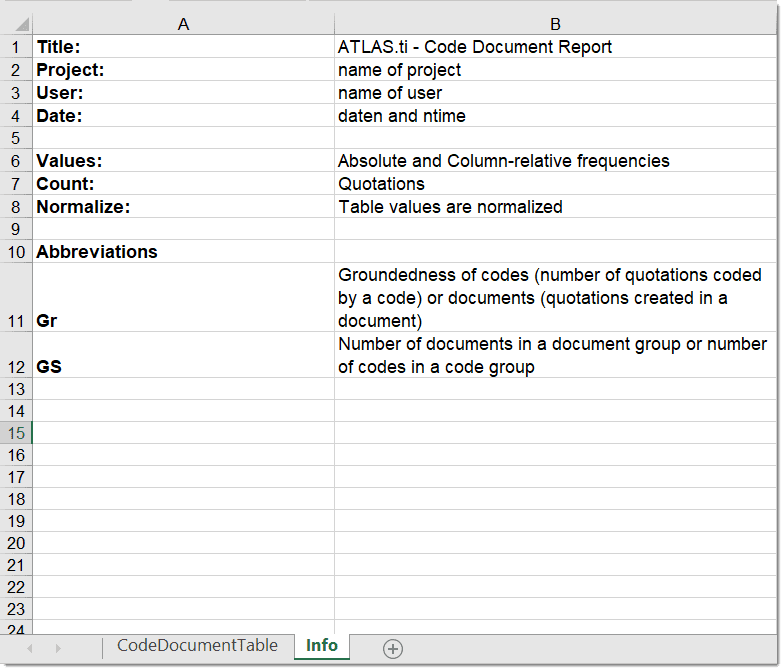
Example Reports
All quotations for one or multiple codes (Option 1)
Open the Quotation Manager. Select one or multiple codes in the filter area on the left. To select multiple codes, hold down the Ctrl-key.
Click on the Excel Export button and select everything that you want to be included:
-
Select ID
-
Select Quotation Name only if you have renamed quotations.
-
Select Document (optional: you may recognize the document by the quotation ID)
-
Select Quotation Content
-
Select Comment (in case you have been writing lots of quotation comments)
-
Select Codes if you want to see other codes that have been applied to a quotation
-
Select Reference = start and end position of the quotation in the document
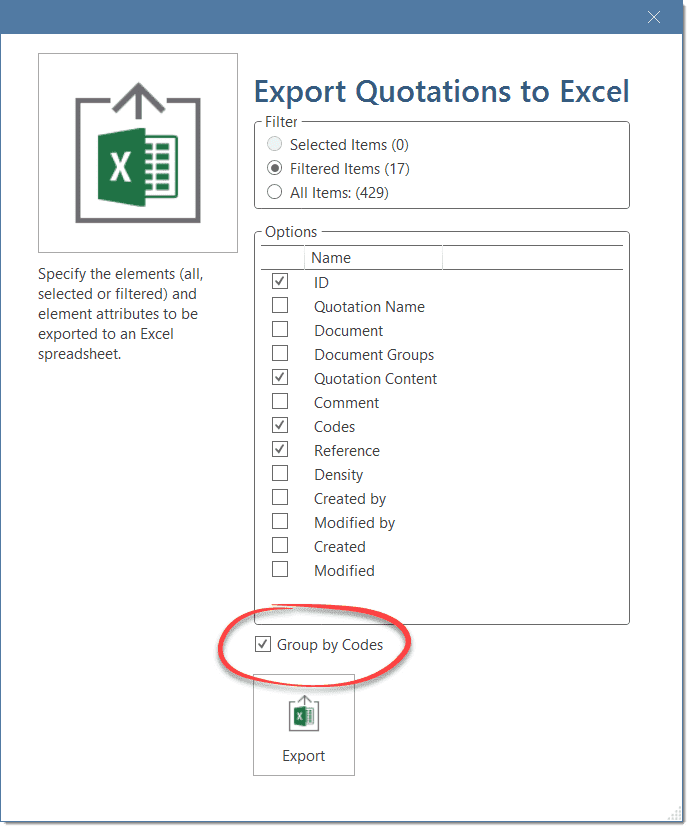
If you want to export the quotations for multiple codes, activate the Group by Codes option so that ATLAS.ti creates different sheets for each code in the Excel table.
All quotations for one or multiple codes (option 2)
Open the Code Manager. Select one or multiple codes. To select multiple codes hold down the Ctrl-key.
Click on the Report button and select everything that you want to be included in the report (see explanation above).
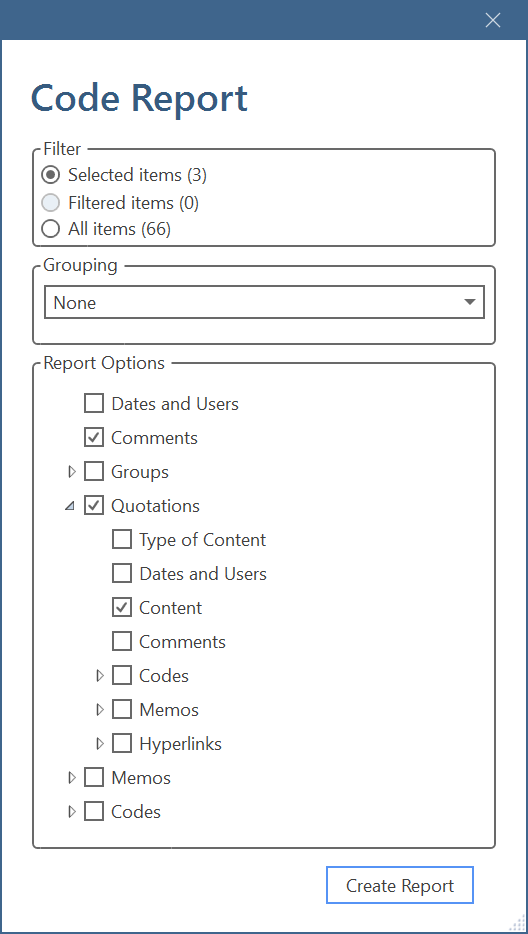
Report: Documents and their codes
Open the Document Manager and select all documents that you want to export with their codes.
Click Excel Report in the ribbon and select the following options:
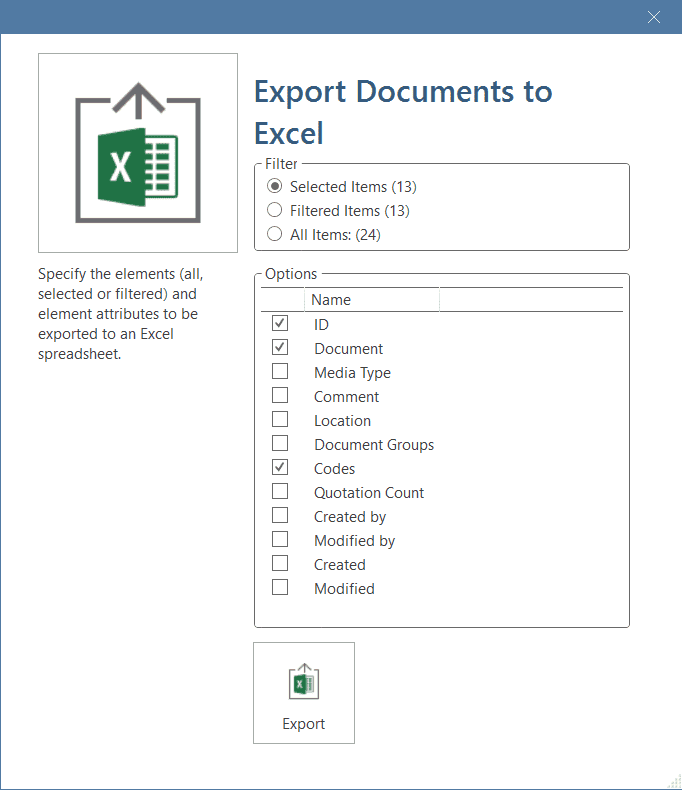
Resulting report
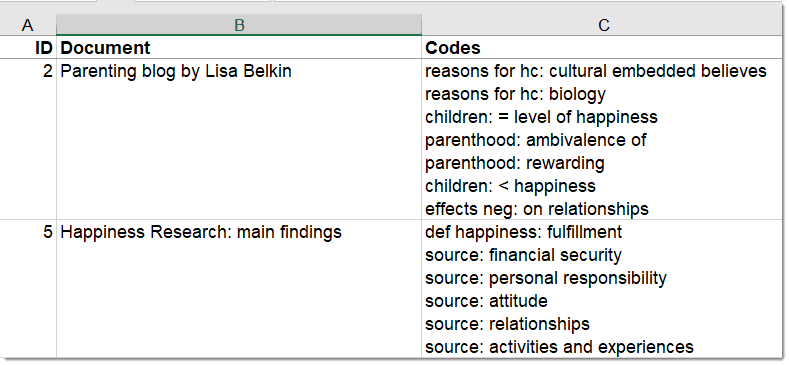
Report: For multimedia data
If you have utilized the quotation level when working with multimedia data and have replaced the default quotation name with summaries of what can be seen or heard in the multimedia quotation, this is how you create a useful report:
Select multimedia quotations in the Quotation Manager.
Select the Excel Report button in the ribbon and select the following options:
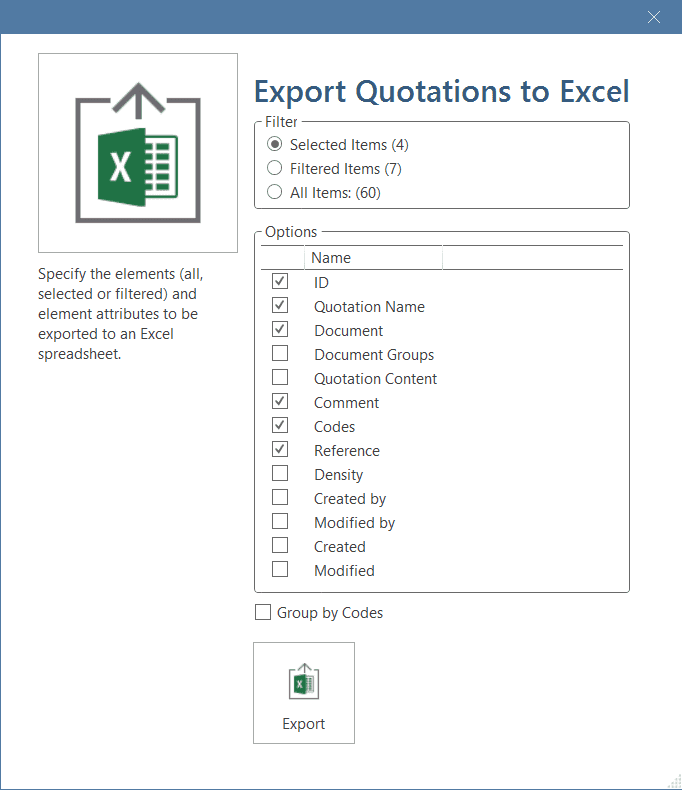
The report will show an overview of all the titles you have created for your image, audio or video segments and the comments you have written. Plus, it provides the exact position within the multimedia file.

Print Documents with Margin
If you want to print a document as you see it on your screen including the margin area, select the Print option in the Document Ribbon.

Then the following dialog opens:

Printer: Select if you want to send the output to a printer or whether you want to save it as PDF document.
Orientation: The default selection is 'Landscape', as this is likely the best option to see the document and all codes in the margin area.
Margin space: Under 'Margin space', you can adjust the width of the margin if you need more or less space.
Pages: You can print all pages, or a page range.
With the 'Previous' and 'Next Page' buttons you can preview all pages.
The print with margin option is available for text, PDF and image documents.
Exporting Data
ATLAS.ti offers various ways to export your data for use in other programs.
- a SPSS syntax file
- a Excel file for use in other statistical software like R, STATA, etc.
- a project file in the QDPX universal data exchange format for importing your projects in other QDA software
- an export of all documents that have been added to a project
Exporting Documents
You can export all documents that you have added to an ATLAS.ti project.
-
PDF and multimedia files (audio, video, images) are exported in their original format.
-
Text documents are exported as Word (docx) files. The formatting of the exported document may differ from the original, as all text documents are converted to html when they are imported.
To export documents:
Open the Document Manager and select all documents that you want to export.
Select the Tools tab in the Document ribbon, and from there the Document Export button.
Data Export For Further Statistical Analysis
ATLAS.ti is intended primarily for supporting qualitative reasoning processes. On the other hand, especially with large amounts of data, it is sometimes useful to analyze the data using statistical approaches. ATLAS.ti can export your data in form of a syntax file for SPSS®, and a generic Excel format that can be imported into software like R, SAS, STATA as well as SPSS.
The basic components for statistics are cases and variables. The statistic export function in ATLAS.ti treats codes as variables and data segments (quotations) as cases.
The notion of a "case" here is rather fine-grained and differs from the common understanding of this term. Usually cases in qualitative research refer to persons, interviews, or documents. We chose to treat the smallest unit as a case for the statistical export, to ensure that no data is lost. Broader information, e.g., which document or document group a quotation belongs to, is coded into the various variables.
In contrast to the dichotomous treatment of codes within ATLAS.ti, you can use codes for further statistical analysis as ordinal or interval scaled variables by using a specific code-naming convention.
Scaled vs. Dichotomous Codes
Within ATLAS.ti, a code is always dichotomous, because it either refers to a given quotation ("1"), or it does not ("0"). Each case (= quotation) can, in respect to the codes, be described as a vector of 0's and 1s. The concept of scaled codes/variables requires a special syntax.
If you for instance want to code for three different levels of evaluating something: very good, good, neither god nor bad, bad, very bad, A special naming convention (name%value) is necessary to let ATLAS.ti identify scaled codes from dichotomous codes. When coding the data, the code category needs to look as follows:
EVALUATION
- evaluation%1 very bad
- evaluation%2 bad
- evaluation%3 neither good nor bad
- evaluation%4 good
- evaluation%5 very good
This notation allows the system to construct one variable from all codes with the same prefix. The variable name will be "evaluation", and the values for this variable are:
- 1 very bad
- 2 bad
- 3 neither good nor bad
- 4 good
- 5 very good
Instead of the % as separator, you can also choose a different separator. If so, you need to indicate this when preparing the SPSS syntax file.
You can use string or numerical values; anything that follows the special symbol is interpreted as a value.
Keep in mind that ordinal codes only have meaning in the context of the statistic program you are using. Within ATLAS.ti, the differently valued codes are treated like every other code - as 0 or 1: has been applied, or has not been applied.
Do not assign more than one scaled variable value to the same quotation. Although ATLAS.ti permits an arbitrary number of codes to be attached to a quotation, this would not make much sense with mutually exclusive values of scaled variables. If you do so, the SPSS generator will simply ignore additional values after processing the first one it finds for a given quotation. Since it cannot be guaranteed which value will be detected first, this will most likely produce unpredictable results.
SPSS Syntax Export
ATLAS.ti can export your coded data in form of an SPSS syntax file as plain ASCII text file. This allows you to modify the syntax before running it in SPSS.
When transforming your data into numbers, codes and code groups become variables and all quotations become cases. Additional variables like document numbers, document groups and document type indicating where a quotation belongs to and document groups allow you to aggregate your data in SPSS.
Creating a Syntax File
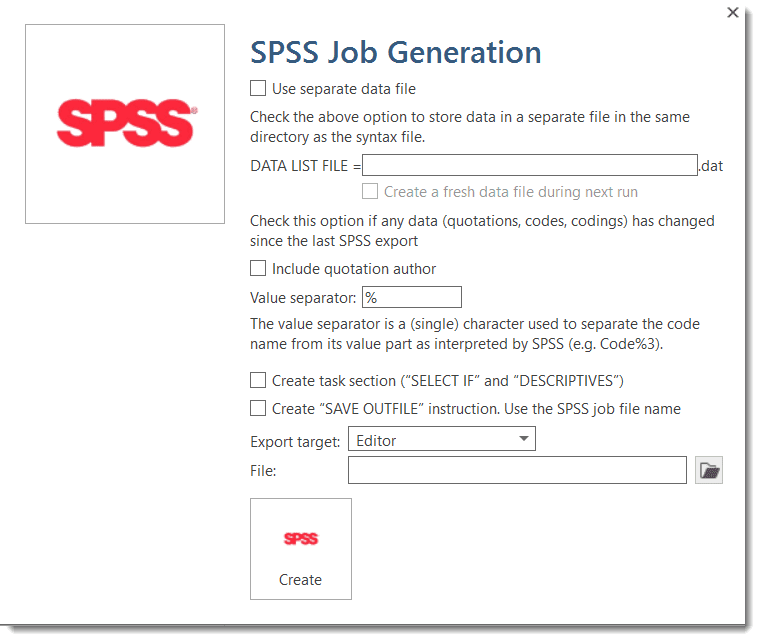
From the Import & Export tab select SPSS Job.
The SPSS Job Generation Window opens. You have the following options:
-
Use separate file: When checked, the data matrix is written to a separate file. This is mandatory if the size of the matrix exceeds a certain size. SPSS cannot handle large data sets within a syntax file. For regular size projects, leave this option unchecked.
-
Specify the name of the data set. This name is used as the file name and as the FILE reference from the DATA LIST section. You only need to enter a name here if you generate separate data files.
-
Create a fresh data file during next run can be unchecked if the data has not changed since it was last created. This may save some processing time.
-
Include quotation's author. Check if you want to export an additional variable that indicates the author for each quotation. This is for example useful if you want to use SPSS to calculate inter-coder reliability.
-
The value separator is % by default, but can be changed to something else. See Naming Convention For Scaled Codes.
-
Create task section. Enable this option if you want templates for procedures included at the end of the syntax file.
-
Create SAVE OUTFILE instruction. Enable this option if you want SPSS to save the data as *.sav file after running the syntax file.
Specify all desired properties and click Create.
You can now run the file in SPSS, or make some changes to the syntax file before you run it.
The Syntax File Explained
The output of the SPSS generator is a complete SPSS syntax file containing variable definitions, optionally the data matrix and some default jobs statements:
VARIABLE LABELS are taken from code and code group names.
VALUE LABELS for variables created from codes are:
-
Yes (1) - code is assigned
-
No (0) - code is not assigned
Every case (quotation) is described by the codes that are attached it to, the document,the position in the document (start and end position), author, media type and date of creation.
Start and End Positions
There are two variables for the start position (SY and SX) and two variables for the end position (EY and EX) for a quotation. Depending on the media type, they are used for different start and end coordinates.
| Data Type | SY (start) | SX (start) | EY (end) | EX (end) |
|---|---|---|---|---|
| Text (rich text) | paragraph | Column character, quotation based | paragraph | Column character, quotation based |
| page | character count, page based | page | character count, page based | |
| Audio | --- | milliseconds | --- | milliseconds |
| Video | --- | milliseconds | --- | milliseconds |
| Image | SX and SY indicate the position of the upper left hand corner of the image | EX and EY indicate the position of the lower right hand corner of the image | ||
| Geo | --- | --- | --- | --- |
Creation Date
The date of creation is shown in the unix timestamp format. You can convert it into human-readable time by using a converter, for instance: https://www.epochconverter.com/
Variable Labels
An example:
VARIABLE LABELS D 'Document'.
VARIABLE LABELS QU 'Q-Index'.
VARIABLE LABELS SY 'Start y-Pos'.
VARIABLE LABELS SX 'Start x-Pos'.
VARIABLE LABELS EY 'End y-Pos'.
VARIABLE LABELS EX 'End x-Pos'.
VARIABLE LABELS TI 'Creation Date'.
VARIABLE LABELS C1 'Audio'.
VARIABLE LABELS C2 'just a name'.
VARIABLE LABELS C3 'Evaluation'.
VARIABLE LABELS C4 'Buddha'.
VARIABLE LABELS C5 'Code name with more than 40 characters'.
VARIABLE LABELS C6 'Fish'.
VARIABLE LABELS C7 'Geo Code'.
VARIABLE LABELS C8 'Octopus'.
VALUE LABELS C1 to C2 1 'YES' 0 'NO'.
VALUE LABELS C3 0 'NO' 1 'bad' 2 'good' 3 'not so good'.
VALUE LABELS C4 to C8 1 'YES' 0 'NO'.
VARIABLE LEVEL C3 (ORDINAL).
Document Type Declaration.
IF (D = 5) MediaType = 1.
IF (D = 4) MediaType = 2.
IF (D = 6) MediaType = 3.
IF (D = 1) MediaType = 4.
IF (D = 3) MediaType = 5.
IF (D = 2) MediaType = 6.
VALUE LABELS
- 1 'text'
- 2 'PDF'
- 3 'graphic'
- 4 'audio'
- 5 'video'
- 6 'geo'
Treatment of Code Groups
Code groups in SPSS jobs count how many of the codes in the code group have been assigned to the quotation.
Code groups are named: CG1, CG2 and so on.
Calculation: COMPUTE CG1 = C10 + C11 + C12 + C13 + C14 + C15.
VARIABLE LABELS CG1 'name of code group'.
Scaled codes are ignored in the computation of code groups variables. See Export for further Statistical Analysis.
Treatment of Document Groups
For each case (= quotation) there is a document and document group variable. If the document a quotation is part of also belongs to a document group, the value for the document group is 1.
Calculation: COMPUTE DG1 = 0. IF (D = 5 or D = 4) DG1 = 1.
VARIABLE LABELS DG1 'DG_Document group name'.
Generic Export for further Statistical Analysis
If you are using statistical software like SAS, STATA or R; or do not want to run a syntax file in SPSS, you can create a generic export. The generic format needs to be imported using the Excel import option of the software you are using.
To prepare a generic export, select the Import & Export tab and from there Statistical Data.
The exported file contains the following data:
-
CASENO: each quotation is a case
-
D: document number
-
Document name: name of the document
-
Media type: type of document
-
quote_start: start position of a text quotation
-
quote_end: end position of a text quotation
-
start_time: start position of
-
end_time: end position of an audio- or video quotation
-
SY / SX / EY / EX:coordinates of an image quotation
-
DG_name: quotation occurring in a document of the document group
-
code: assigned / not assigned to the code
-
CG_name: assigned / not assigned to a code of the code group
To import the data for instance to RStudio, select File/Import Data Set in RStudio.
QDPX - Universal Data & Project Exchange
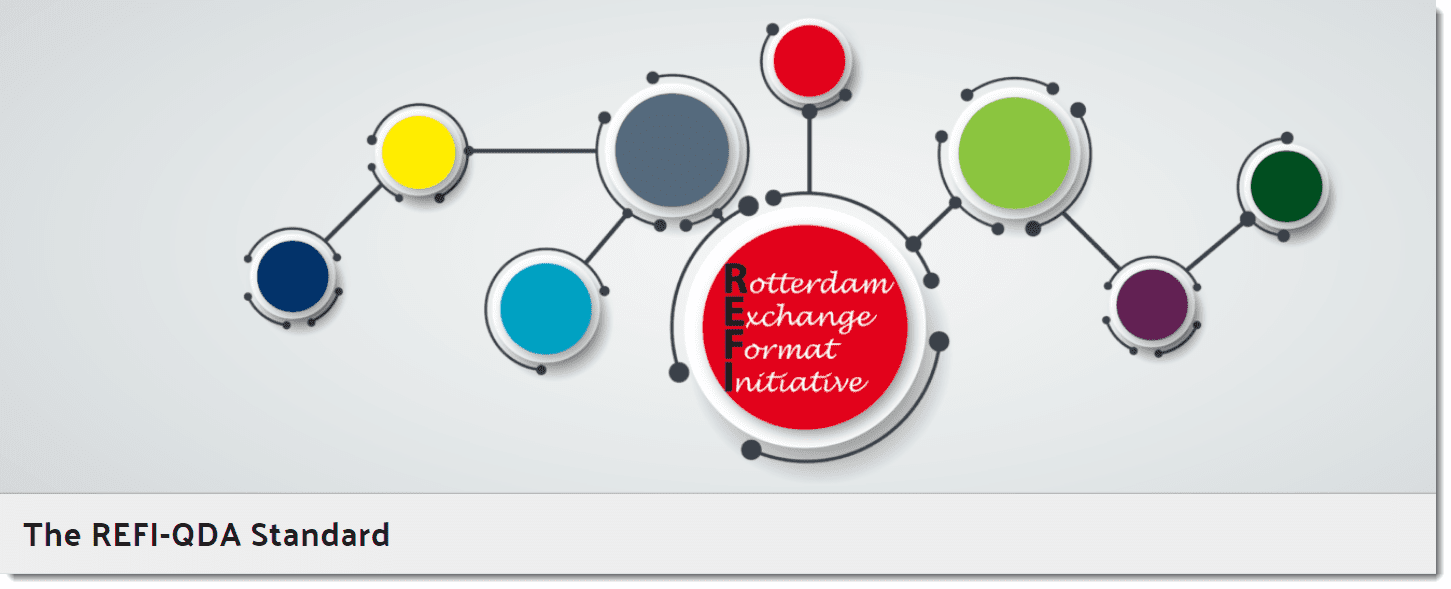 The QDPX data format allows for full project exchange with other CAQDAS packages. This is a major step toward a new degree of freedom in research and opens new dimensions for all practitioners of qualitative data analysis.
The QDPX data format allows for full project exchange with other CAQDAS packages. This is a major step toward a new degree of freedom in research and opens new dimensions for all practitioners of qualitative data analysis.
"We are very excited to see that - after fifteen years of ATLAS.ti being the only manufacturer to steadfastly champion universal data exchange - other software makers are now coming around to seeing the benefit of not holding users' data hostage any longer.
ATLAS.ti responded to the wishes of researchers early on by offering an open, application-independent export format for universal use. This long-standing commitment to academic openness and the free flow of ideas is now being recognized as an important value in itself.
I am convinced that being able to move projects seamlessly between different applications will be of great benefit to the research community. We are extremely proud to have been pioneers of this movement, and we are looking forward to the many advancements it will bring!" Thomas Muhr, March 18, 2019.
What is QDPX
ATLAS.ti is a founding member of the Rotterdam Exchange Format Initiative (REFI), the consortium that designs and governs the interoperability standard QDPX. At the heart of the matter, QDPX is an XML-based structured data format that permits not only long-term product storage and product-independent archival of qualitative research projects, but also aims at the exchange of projects between different software products.
ATLAS.ti has long championed the idea of universal exchange of qualitative research data between different applications and was the first manufacturer to introduce a full XML project export in their software as early as 2004. The idea of a universal data export was always a very obvious feature for us, considering the immense value that is added to data that have been processed, analyzed, and structured in the qualitative analysis process.
In the past fifteen years, we have demonstrated through many exemplary applications the additional value the data has when used and re-purposed through direct transformation into visually oriented presentations formats like web pages, printable reports, or ebooks, or other data formats like .rtf, csv, or sql. Despite the wide spectrum of these sample applications, they barely scratch the surface of what further powerful uses will still be possible in the future.
The most immediate benefit of QDPX quite obviously lies in the fact that it enables users of various QDA software products to migrate their research projects between different packages. As more manufacturer join the initiative and implement the new standard, its usefulness to researchers will doubtlessly grow exponentially.
Why is QDPX Great for You?
Find below some general arguments for QDPX and descriptions of some of its practical benefits:
- Because I don't like to be locked in a specific QDAS solution, particularly if there are problems with it; I don't want my data to be held hostage. Interoperability nudges me through the point of sale because I'm less worried that I'll be stuck in something I don't like.
- Now I can move to another software for reasons beyond my control (e.g., funding, new employer, new mandates).
- The data and coding may be the same, but I want to use different types of output/representation/visualisation that are available in one program but not another.
- I'm working on my dissertation, and I want to use software XY. My committee members, however, are more familiar with software Z. No problem. I'll just transfer my data over at a few key phases, so they can understand and comment on the database, or the output and reports. Moreover, I might be able to demonstrate why software XY was the better choice for my project.
- As a researcher who has become familiar with a particular CAQDAS package as a result of the product that is available to me through a site license at my institution, I need to be able to continue working with my research data in a different product if I move to an institution that has a different site license.
- Funding bodies increasingly look favorably on proposals that involve multiple research partners. This poses issues for users working in different institutions, who are familiar with or have access to different products. As a researcher I therefore need to be able to exchange my analysis between my product and those of my co-researchers. This will significantly facilitate collaborative research. For example, I want to collaborate with teams in three different countries; but they are all experts in a different program. In my grant proposal I want to be able to say that this is no problem and part of the reason I should be funded.
- Each QDAS package has its own particular strengths. Users often need to be able to undertake an analytic task which is not supported by their chosen product, or is enabled in a more appropriate way for their needs in another product. As a researcher being able to move to an alternative product in order to undertake a specific task would facilitate higher quality research.
Find further information on the standard, find more information here.
Exporting a Project in QDPX Format
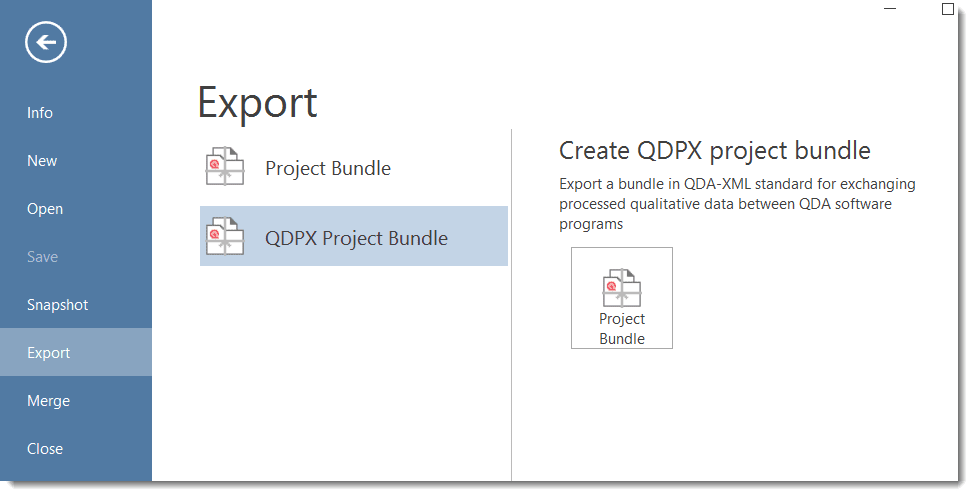
Select File / Export and then the QDPX Project Bundle option.
Appendix
The following information has been compiled for the appendix:
-
Useful Resources: Here you find links to the ATLAS.ti website, the Helpdesk, video tutorials, manuals in PDF format to download, the research blog and publications on the use of ATLAS.ti, including an article by Prof. Krippendorff about the implementation of inter-coder agreement in ATLAS.ti.
Language Settings
ATLAS.ti recognized the language or your Operating System and will set the language accordingly. Currently, the following user interface languages are available:
- English
- German
- Spanish
- Portuguese
- Simplified Chinese
For all other OS languages that are not listed above, the default language is English.
Changing the Display Language
To change the user interface language, select File > Options > Application Preferences > Display Language.
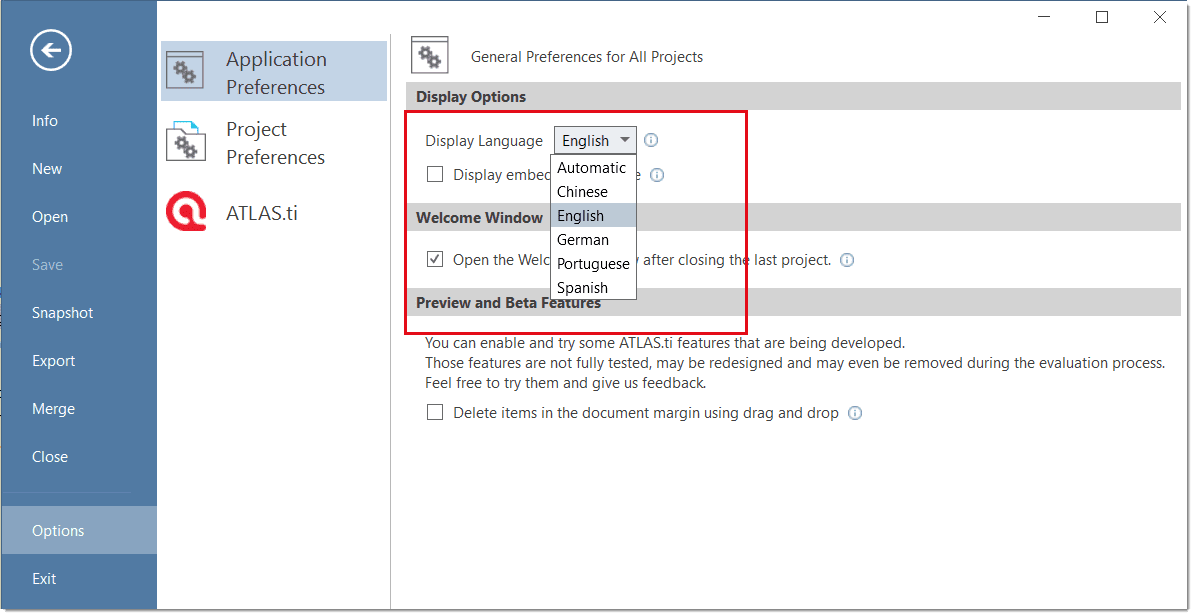
System Requirements
The system requirements are:
Hardware: Intel-based PC, 2GHz, Intel Core or compatible CPU, 4GB RAM minimum (8-16GB strongly recommended), 1.5 GB free hard disk. Operating systems: Windows 11 64-bit; Windows 10 64-bit, at least Version 1607, "Anniversary Update." - NOTE: Some special Windows editions, such as Windows 10N and Windows 10 for Virtual Desktops, are NOT supported.
For better natural language processing results, ATLAS.ti can optionally use bigger machine learning models, which require at least 8 GB of RAM.
Options
Application Preferences
You have the following options:
- Changing the Display Language
- Change the location where ATLAS.ti stores data. See Switching Libraries.
- Manage Models for the embedded AI tools. See Named Entity Recognitionand Sentiment Analysis.
Project Preferences
The following settings are available:
- You can specify which lists and managers should be automatically opened when starting the program
- For lists and the Project Explorer you can specify whether they should be opened docked, or floated, or whether ATLAS.ti should remember their last state.
- For Managers you specify whether they should be opened docked, or floated, or whether ATLAS.ti should remember their last state.
- For multimedia files you can specify whether the previews for documents, quotations or hyperlinks should automatically begin to play.
- When creating multimedia quotations a quotation is immediately created when selecting a data segment. If you prefer to create quotations manually, you can change the behaviour here.
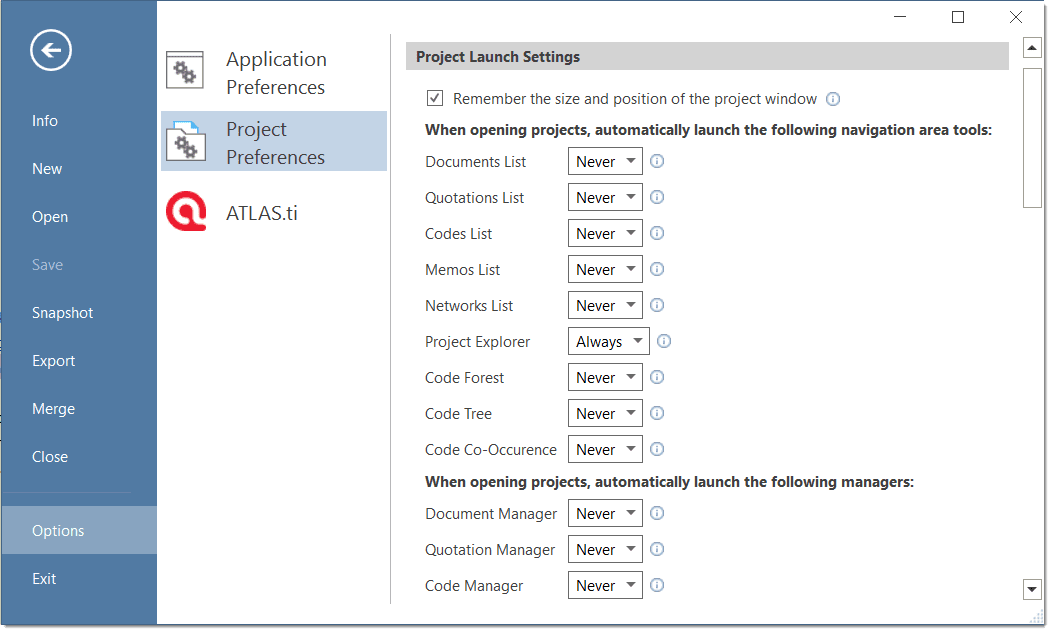
Service Packs & Patches - Live Update
Program updates (patches and service packs) are regularly available to update your installation. The program downloads and installs these service packs automatically.
Provided you have administrative rights to your computer, ATLAS.ti checks for new service packs upon start up (this requires an Internet connection). If a new service pack is found, you will be informed and asked to install it.
To update ATLAS.ti manually, go to File > Options > ATLAS.ti > Check for Updates.
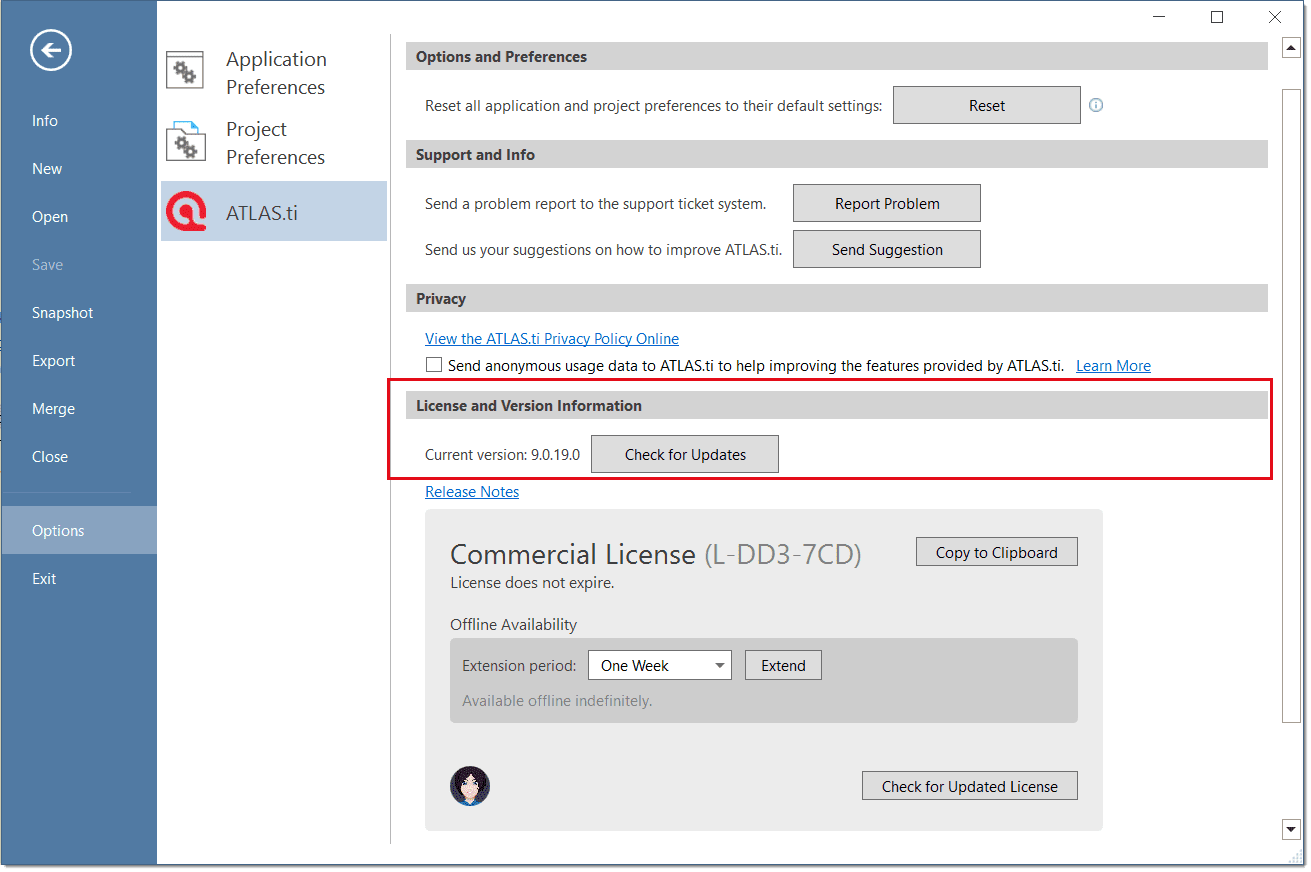
Useful Resources
The ATLAS.ti Welcome Screen contains links to manuals, sample projects and video tutorials. The News sections informs you about current developments, updates that are released, interesting papers we have come across, use cases, and our newsletter.
The ATLAS.ti Website
The ATLAS.ti website should be a regular place to visit. Here you will find important information such as video tutorials, additional documentation of various software features, workshop announcements, special service providers, and announcements of recent service packs and patches.
Getting Support
From within ATLAS.ti, select Help > Online Resources / Contact Support. Or access the Support Center directly via the above URL.
Video Tutorials
If you like to learn via video tutorials, we offer a range of videos covering technical as well as methodological issues.
Sample Projects
You can download a number of different sample projects from our website. Currently English and Spanish language projects are available. The projects feature different types of data sources:
- text
- image
- video
- geo data
.... and different data types:
- interview transcripts
- reports
- online data
- evaluation data
- survey
- literature review
You can use them for yourself to get to know ATLAS.ti, or you can use them for teaching purposes. If available, also the raw data are provided.
PDF Manuals
ATLAS.ti 22 Full Manual and other documentations.
Research Blog
The ATLAS.ti Research Blog plays a very important role in the development and consolidation of the international community of users. Consultants, academics, and researchers publish short and practical articles highlighting functions and procedures with the software, and recommending strategies to successfully incorporate ATLAS.ti into a qualitative data analysis process. We invite you to submit short articles explaining interesting ways of making the best use of ATLAS.ti, as well as describing how you are using it in your own research. To do so, please contact us.
Inter-coder Agreement in ATLAS.ti by Prof. Krippendorff
We have been closely working with Prof. Krippendorff on the implementation to make the original Krippendorff alpha coefficient useful for qualitative data analysis. This for instance required an extension and modification of the underlying mathematical calculation to account for multi-valued coding.. You can download an article written by Prof. Krippendorff about the implementation of the alpha family of coefficients in ATLAS.ti.
Publications
-
Friese, Susanne (2022). Role and Impact of CAQDAS Software for Designs in Qualitative Research. In Uwe Flick (ed). The SAGE Handbook of Qualitative Research Design. Chapter 19. London: Sage.
-
Friese, Susanne (2021).Grounded Theory Analysis and CAQDAS: A happy pairing or remodeling GT to QDA? In: Antony Bryant and Kathy Charmaz (eds.). The SAGE Handbook of Current Developments in Grounded Theory, 282-313. London: Sage.
-
Friese, Susanne (2019). Qualitative Data Analysis with ATLAS.ti. London: Sage. 3. edition.
-
Friese, Susanne (2019). Grounded Theory Analysis and CAQDAS: A happy pairing or remodelling GT to QDA? In: Antony Bryant and Kathy Charmaz (Eds.). The SAGE Handbook of Current Developments in Grounded Theory, 282-313. London: Sage.
-
Friese, Susanne (2018). Computergestütztes Kodieren am Beispiel narrativer Interviews. In: Pentzold, Christian; Bischof, Andreas & Heise, Nele (Hrsg.) Praxis Grounded Theory. Theoriegenerierendes empirisches Forschen in medienbezogenen Lebenswelten. Ein Lehr- und Arbeitsbuch, S. 277-309. Wiesbaden: Springer VS.
-
Friese, Susanne, Soratto, Jacks and Denise Pires (2018). Carrying out a computer-aided thematic content analysis with ATLAS.ti. MMG Working Paper 18-0.
-
Friese, Susanne (2016). Grounded Theory computergestützt und umgesetzt mit ATLAS.ti. In Claudia Equit & Christoph Hohage (Hrsg.), Handbuch Grounded Theory – Von der Methodologie zur Forschungspraxis (S.483-507). Weinheim: Beltz Juventa.
-
Friese, Susanne (2016). Qualitative data analysis software: The state of the art. Special Issue: Qualitative Research in the Digital Humanities, Bosch, Reinoud (Ed.), KWALON, 61, 21(1), 34-45.
-
Friese, Susanne (2016). CAQDAS and Grounded Theory Analysis. Working Papers WP 16-07
-
McKether, Will L. and Friese, Susanne (2016). Qualitative Social Network Analysis with ATLAS.ti: Increasing power in a blackcommunity.
-
Friese, Susanne & Ringmayr, Thomas, Hrsg (2016). ATLAS.ti User Conference proceedings: Qualitative Data Analysis and Beyond. Universitätsverlag TU Berlin. https://depositonce.tu-berlin.de/bitstream/11303/5404/3/ATLASti_proceedings_2015.pdf
-
Paulus, Trena M. and Lester, Jessica. N. (2021). Doing Qualitative Research in a Digital World. Thousand Oaks, CA: Sage.
-
Paulus, Trena M., Lester, Jessica. N. and Dempster, Paul (2013).Digital Tools for Qualitative Research. Thousand Oaks, CA: Sage.
-
Silver, Christina and Lewins, Ann (2014). Using Software in Qualitative Research. London: Sage.
-
Konopásek, Z. (2008). Making Thinking Visible with Atlas.ti: Computer Assisted Qualitative Analysis as Textual Practices. Forum Qualitative Sozialforschung / Forum: Qualitative Social Research, 9(2).
-
Woolf,Nicholas H. and Silver, Christina (2018). Qualitative Analysis Using ATLAS.ti: The Five Level QDA Method. New York: Routledge.
Get In Touch
Reporting A Problem
Select the Help tab and from there Report Problem.
The problem report goes straight to our technical team. Please use this option to report technical issues.
Be sure to include a description of the problem that allows our technicians to reproduce the issue, and do not forget to enter a valid email address.
Sending Suggestions
We are interested in reading about your ideas and suggestions you may have. Please feel free to use this as a wish list. While we cannot grant all wishes, knowing about what you need will help us to continuously improve the program to fit your needs.
Select the Help tab and from there Send Suggestions.
Stay updated with the latest news on product updates, special offers, new training materials, or interesting articles and links we find. We are also happy to hear from users via these channels. Stop by and let us know about your projects and experience with ATLAS.ti!
The ATLAS.ti YouTube channel offers a variety of video materials:
- Overview of the software functionality
- Recorded webinars
- Video tutorials that help you to learn the software.
Videos are available in English and Spanish.